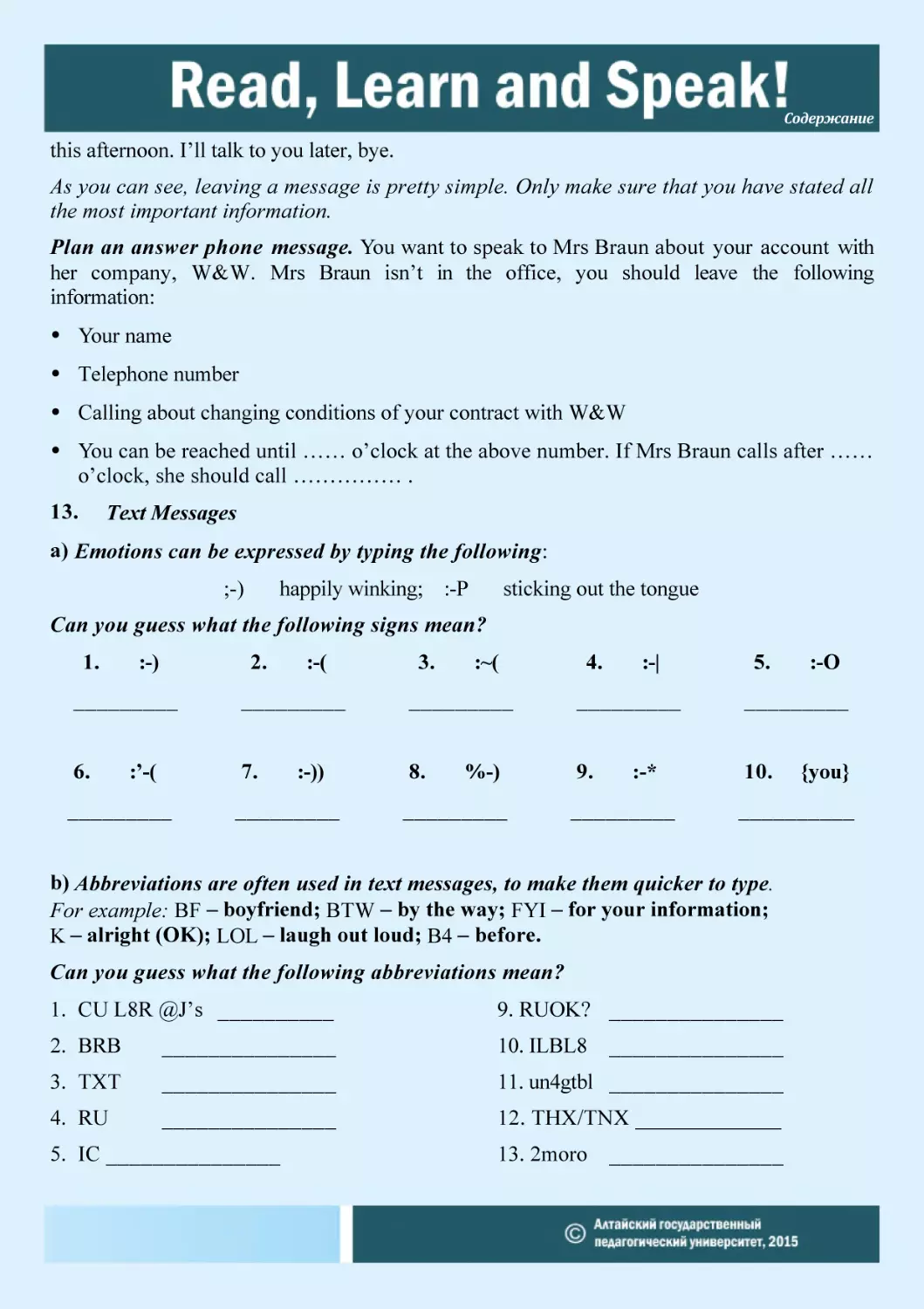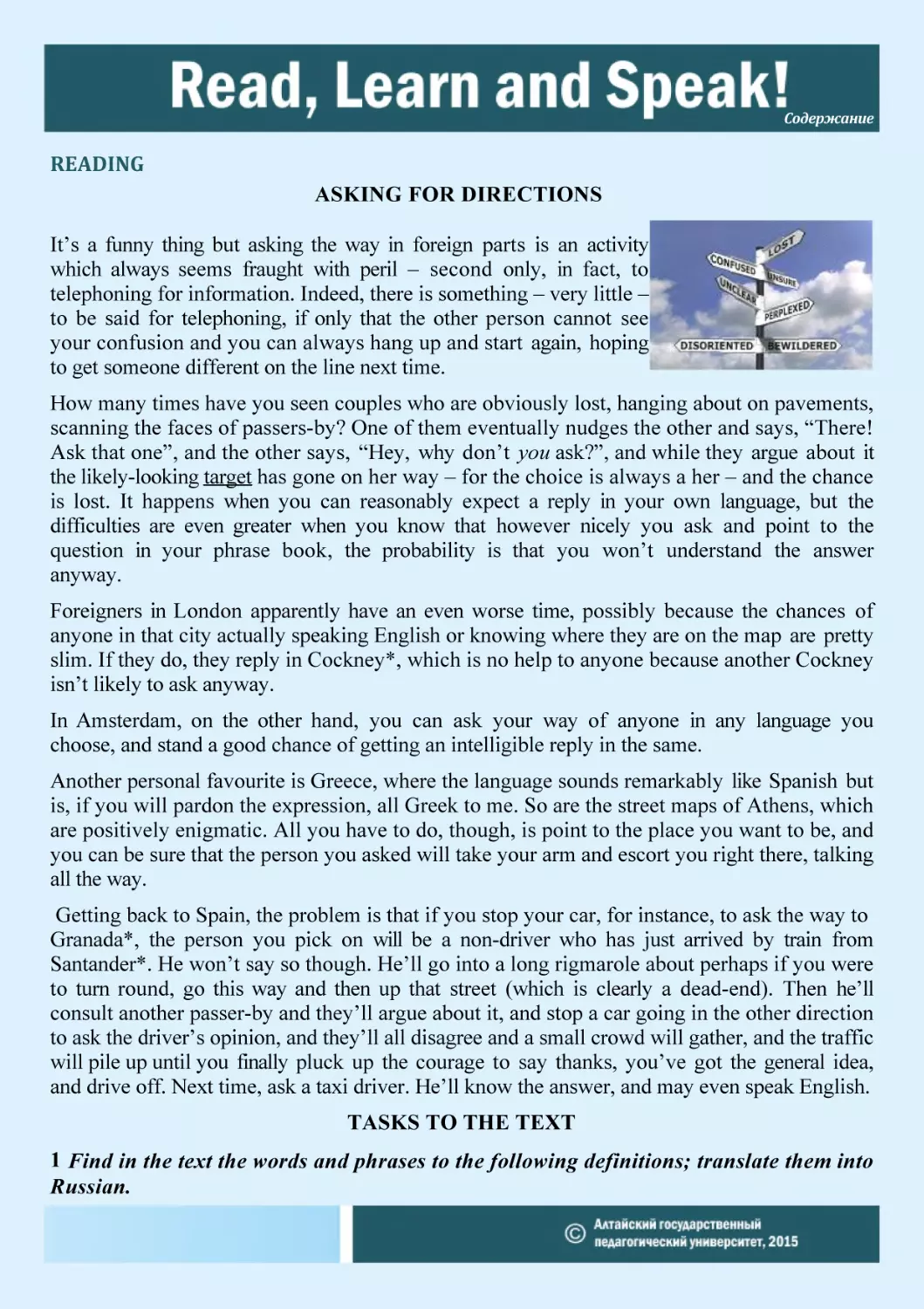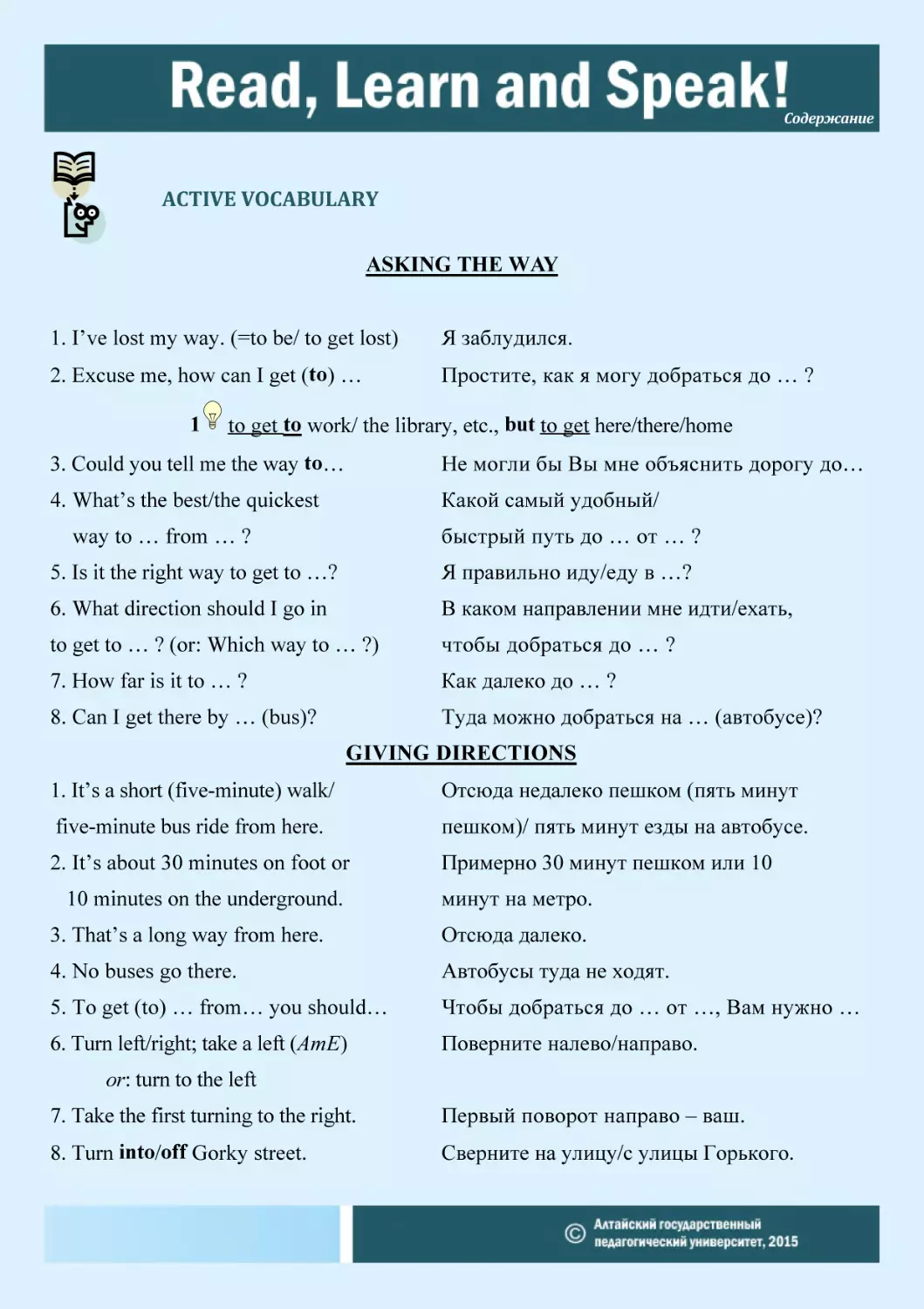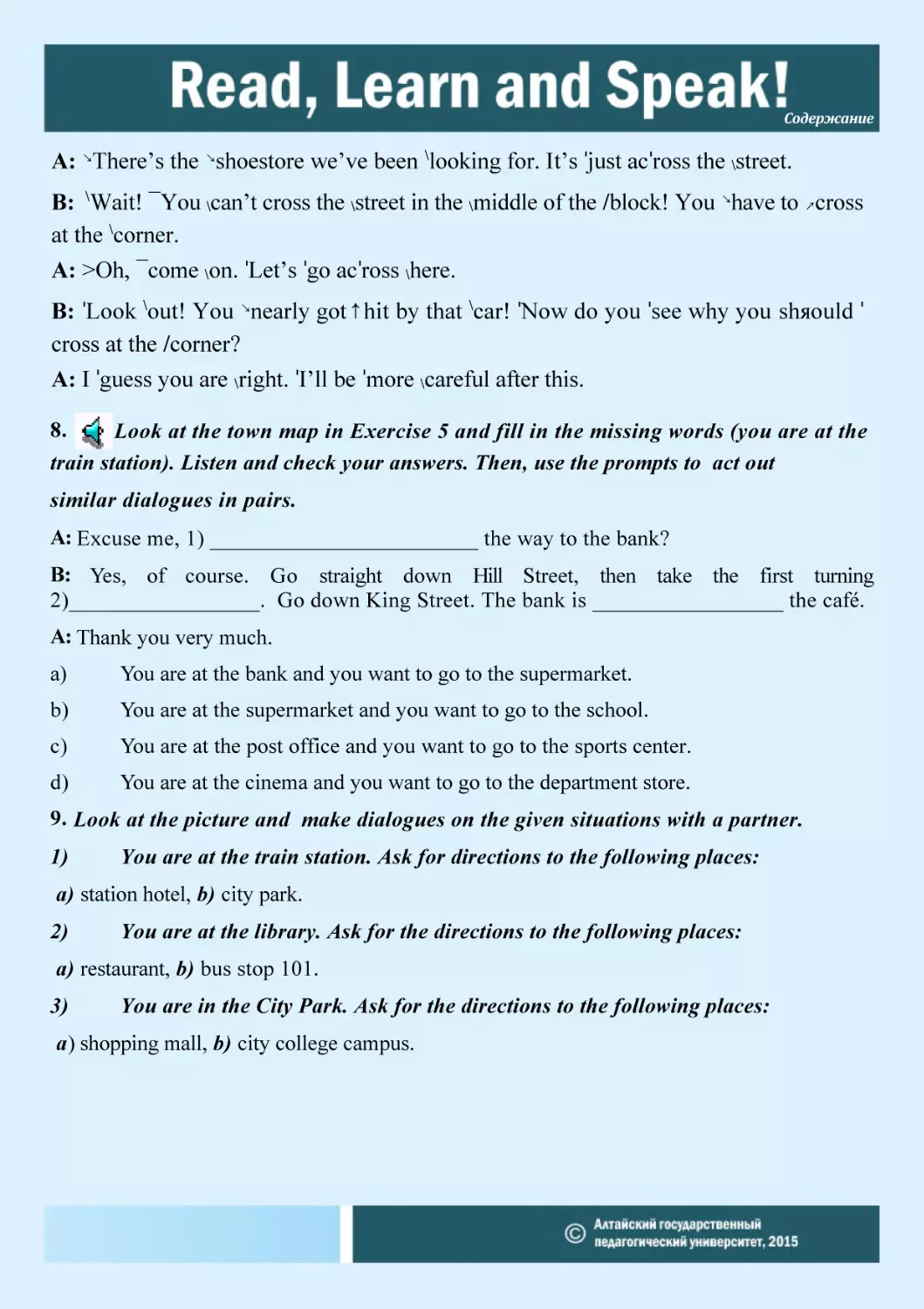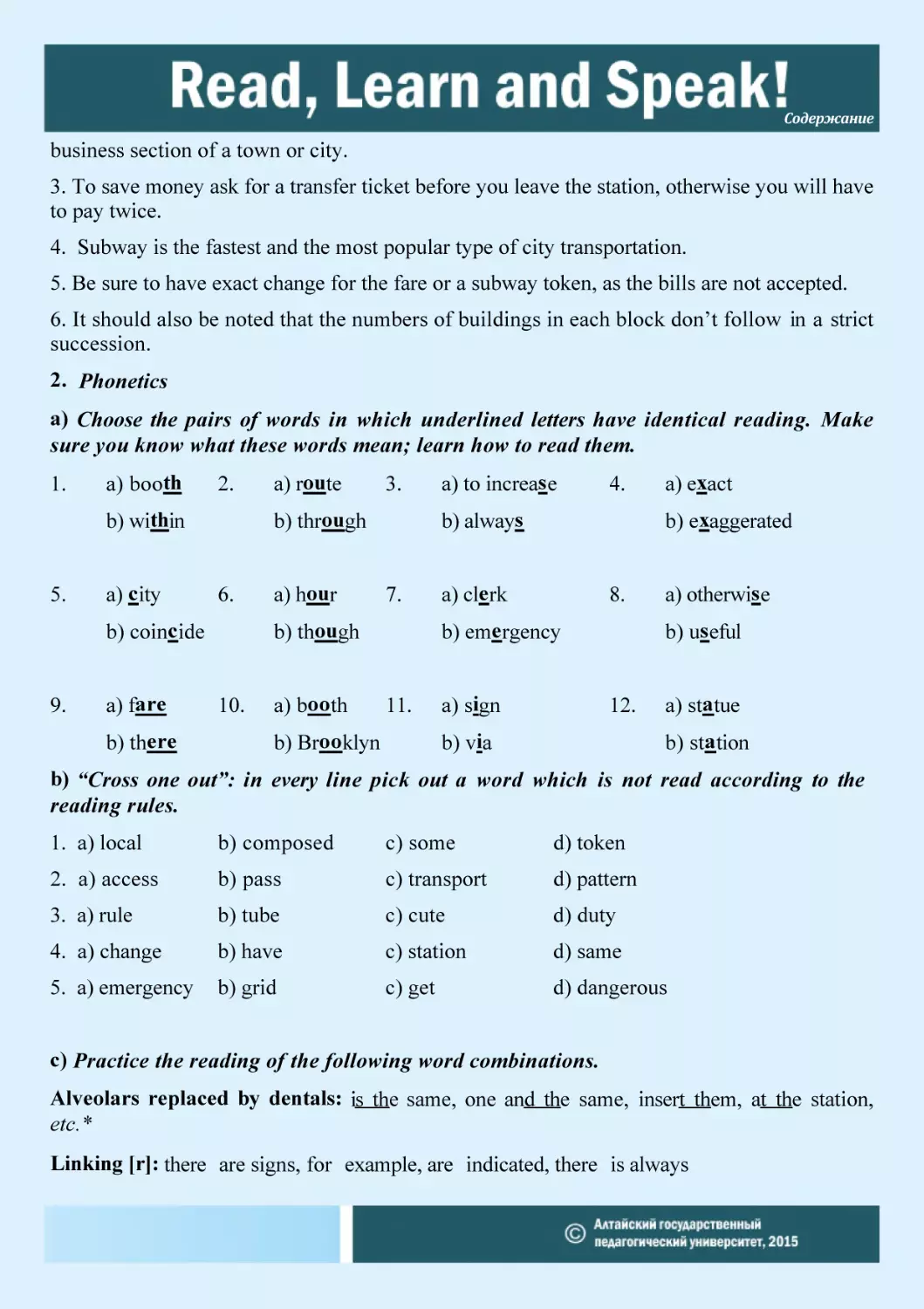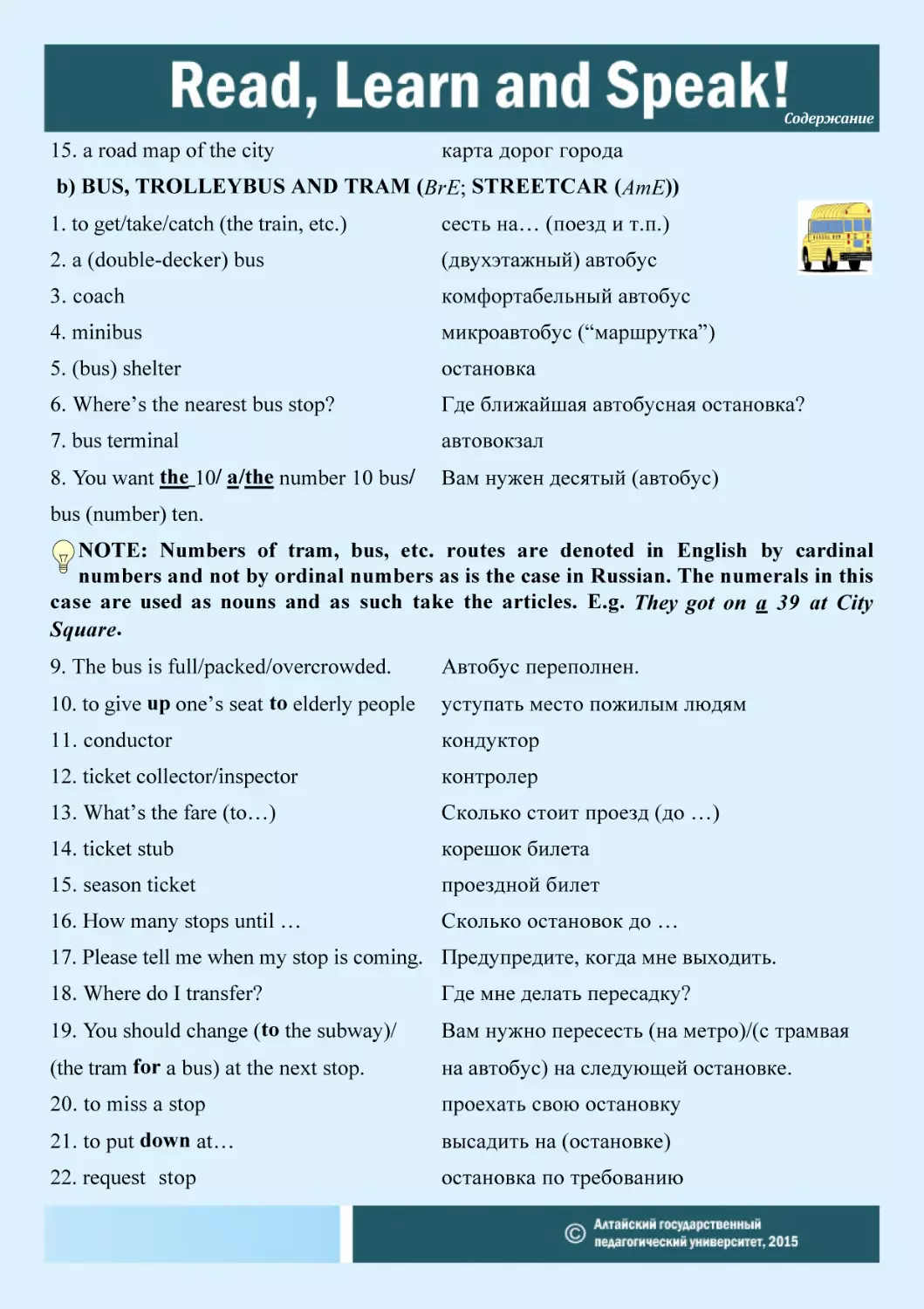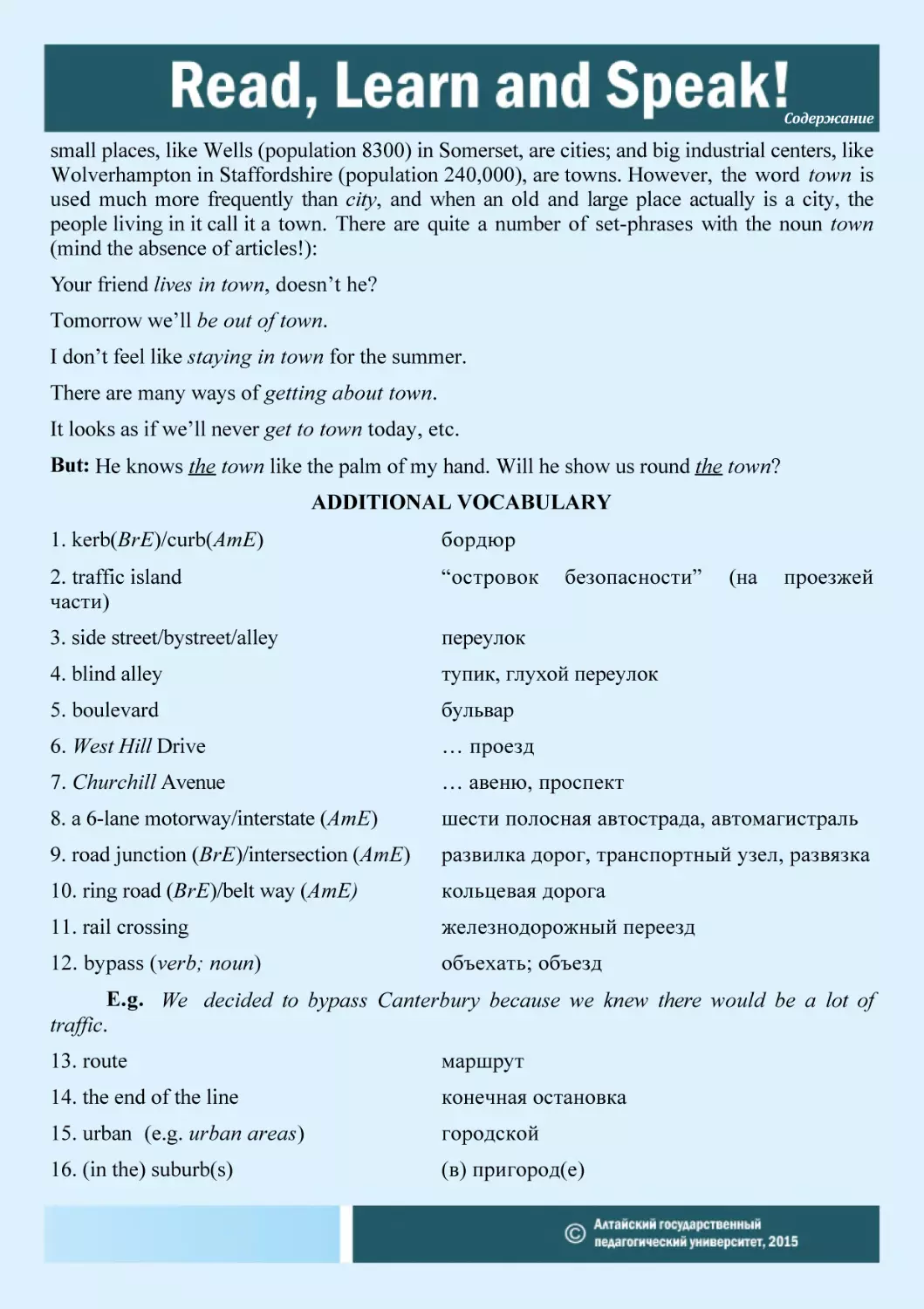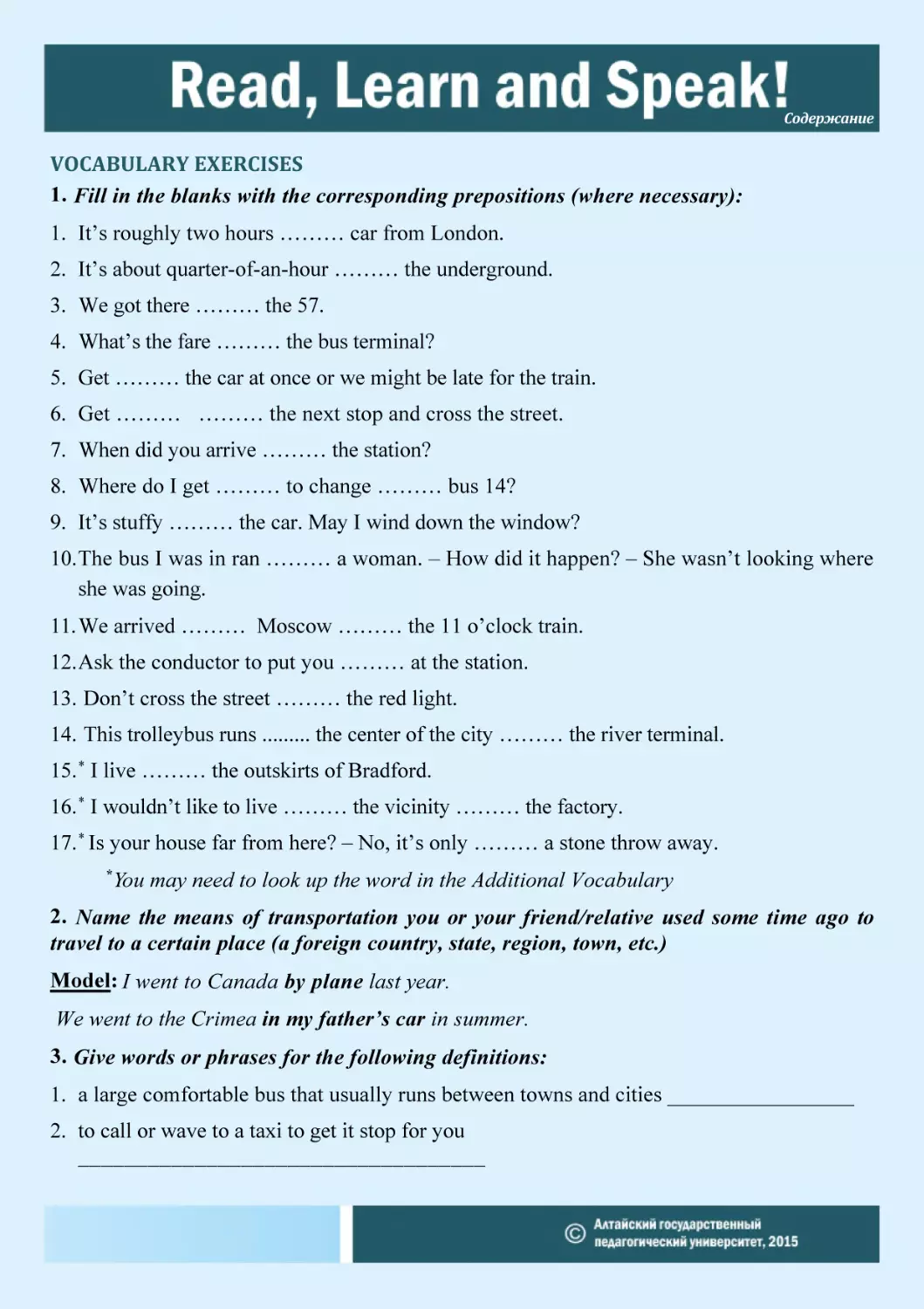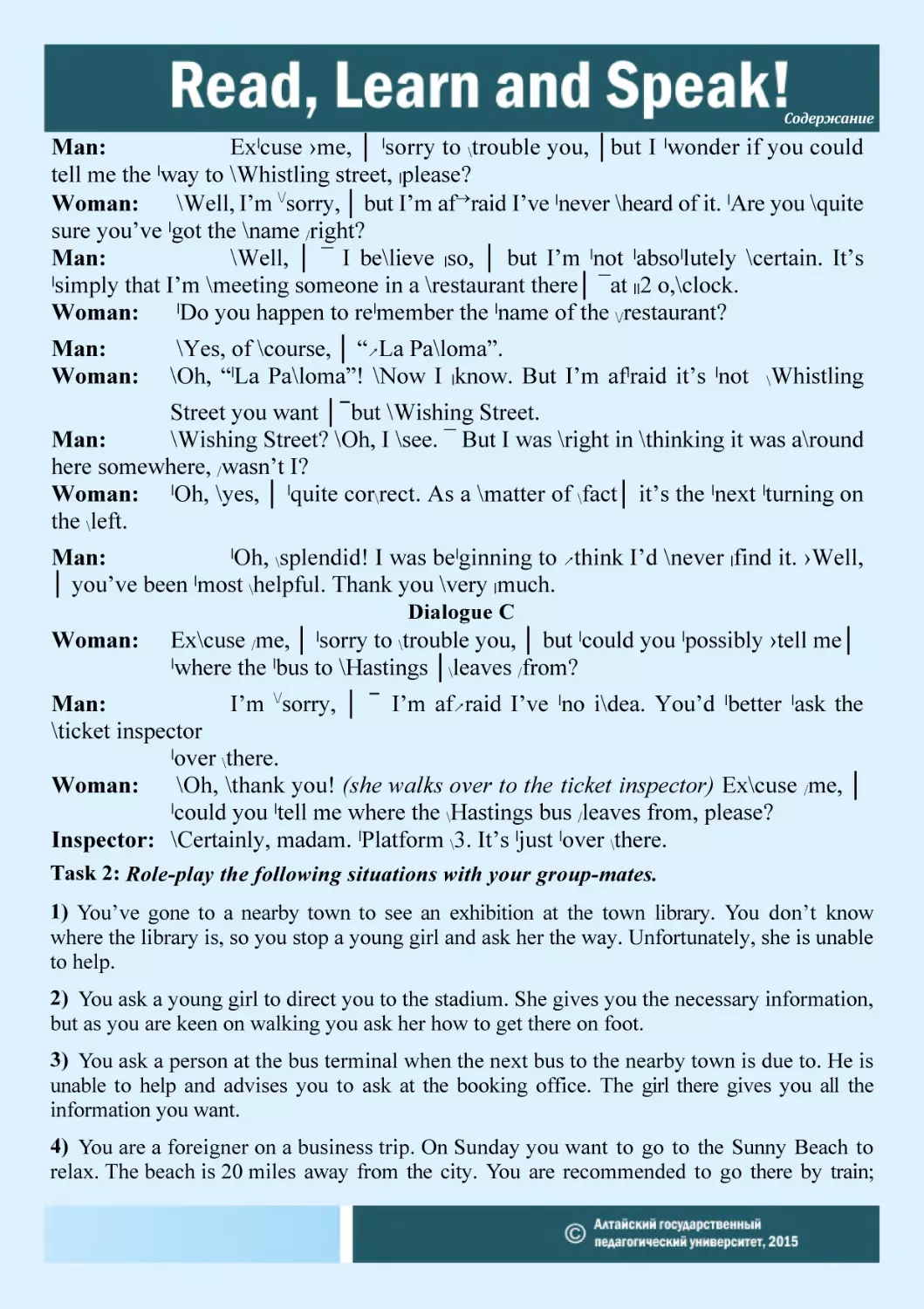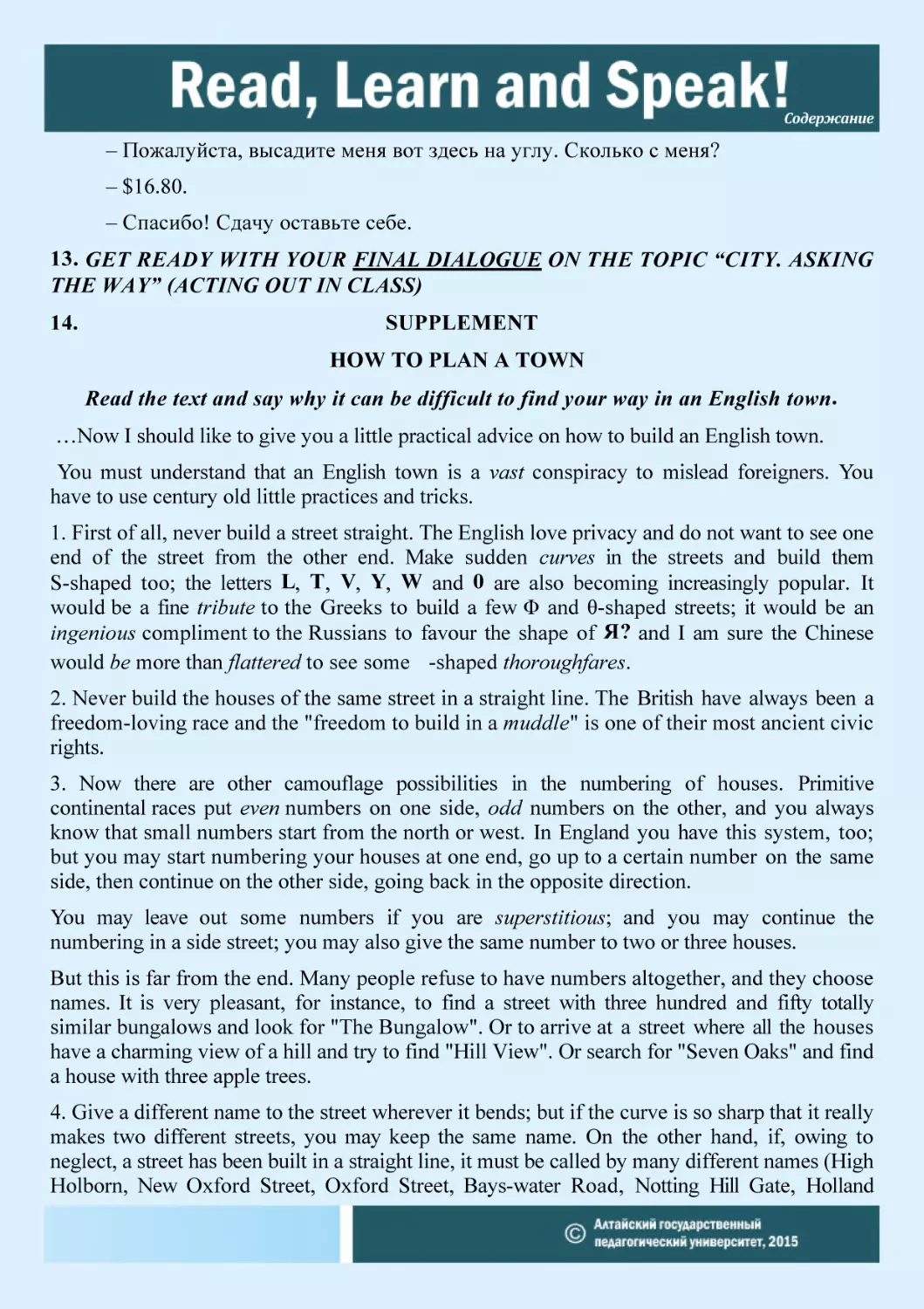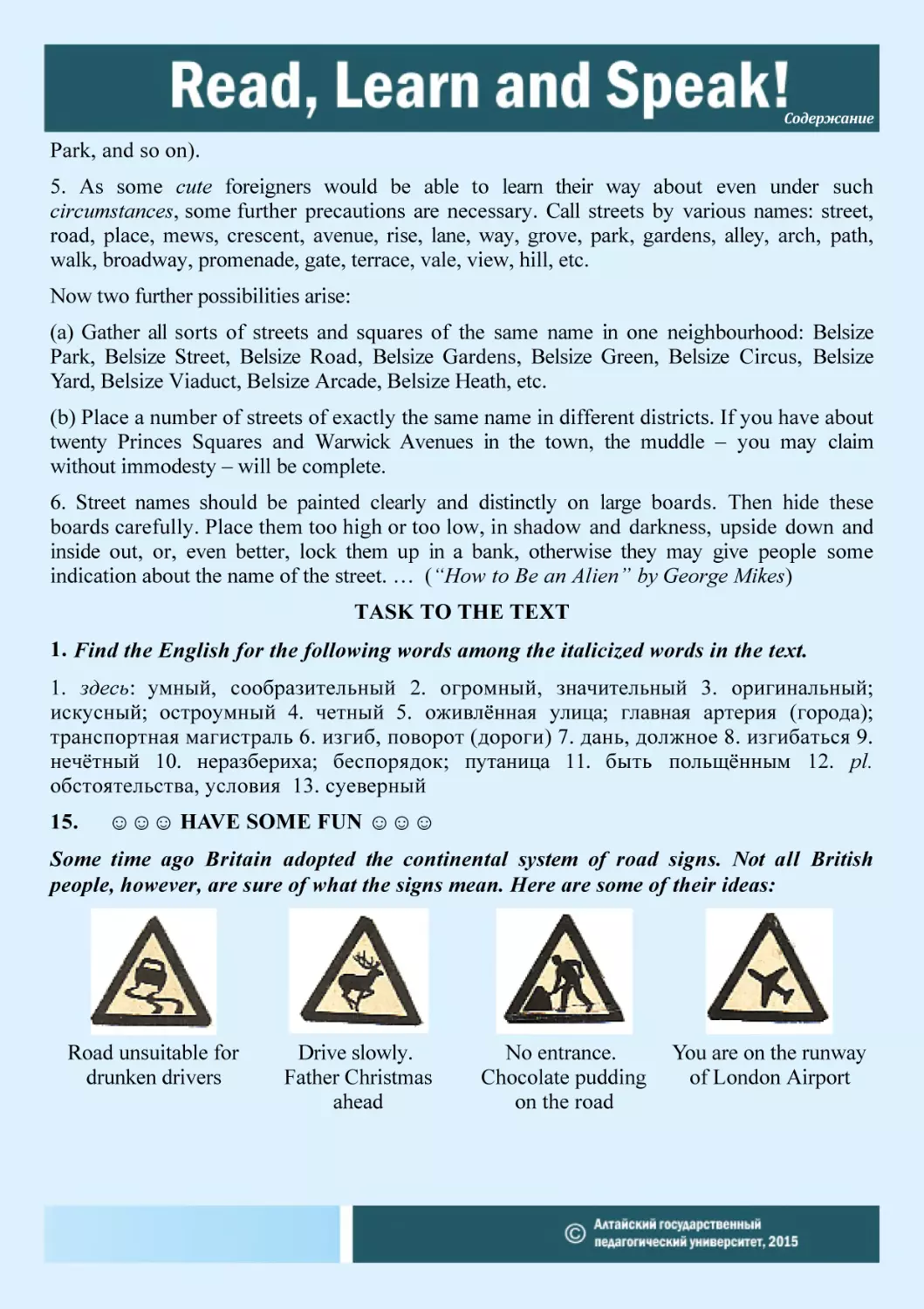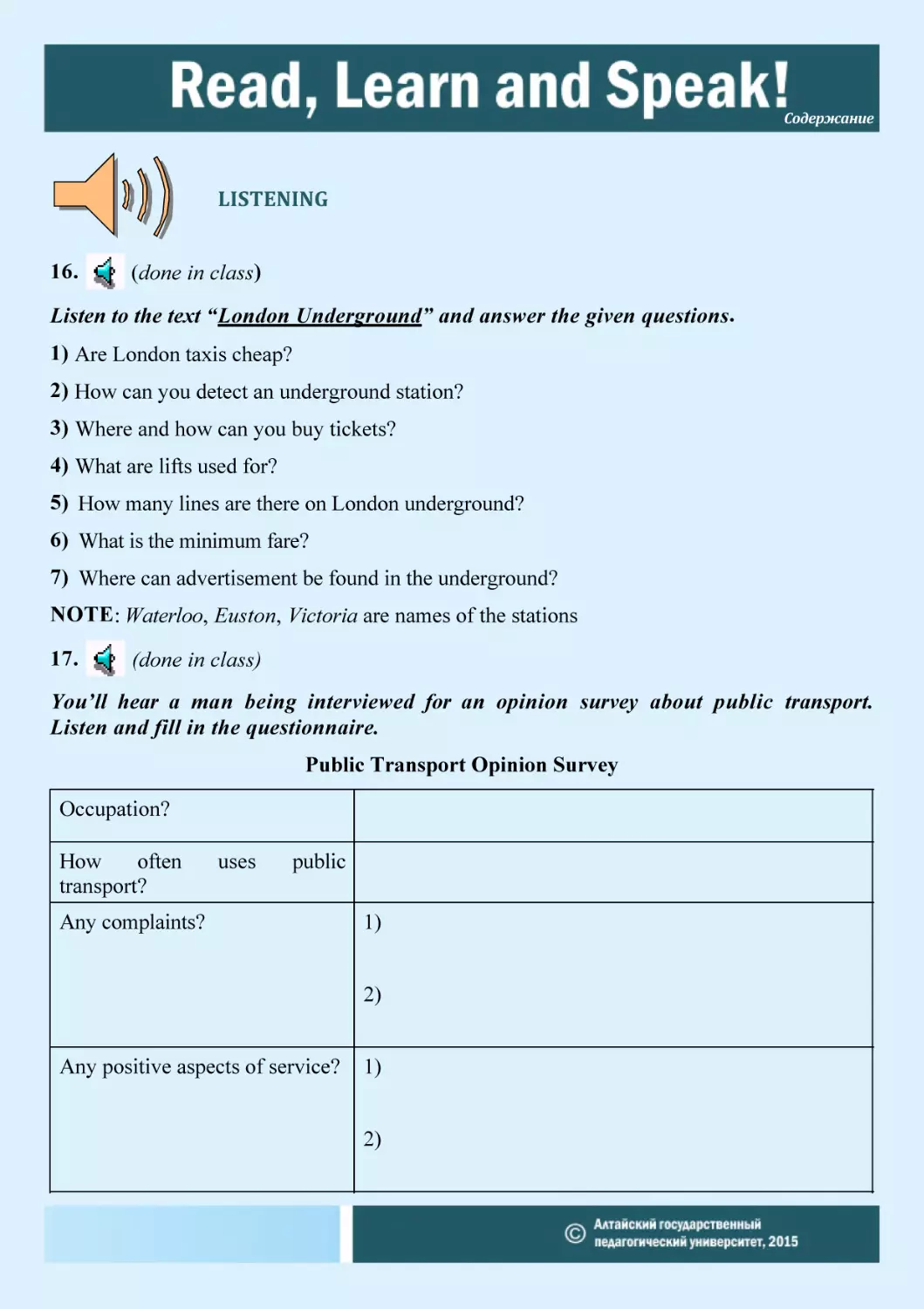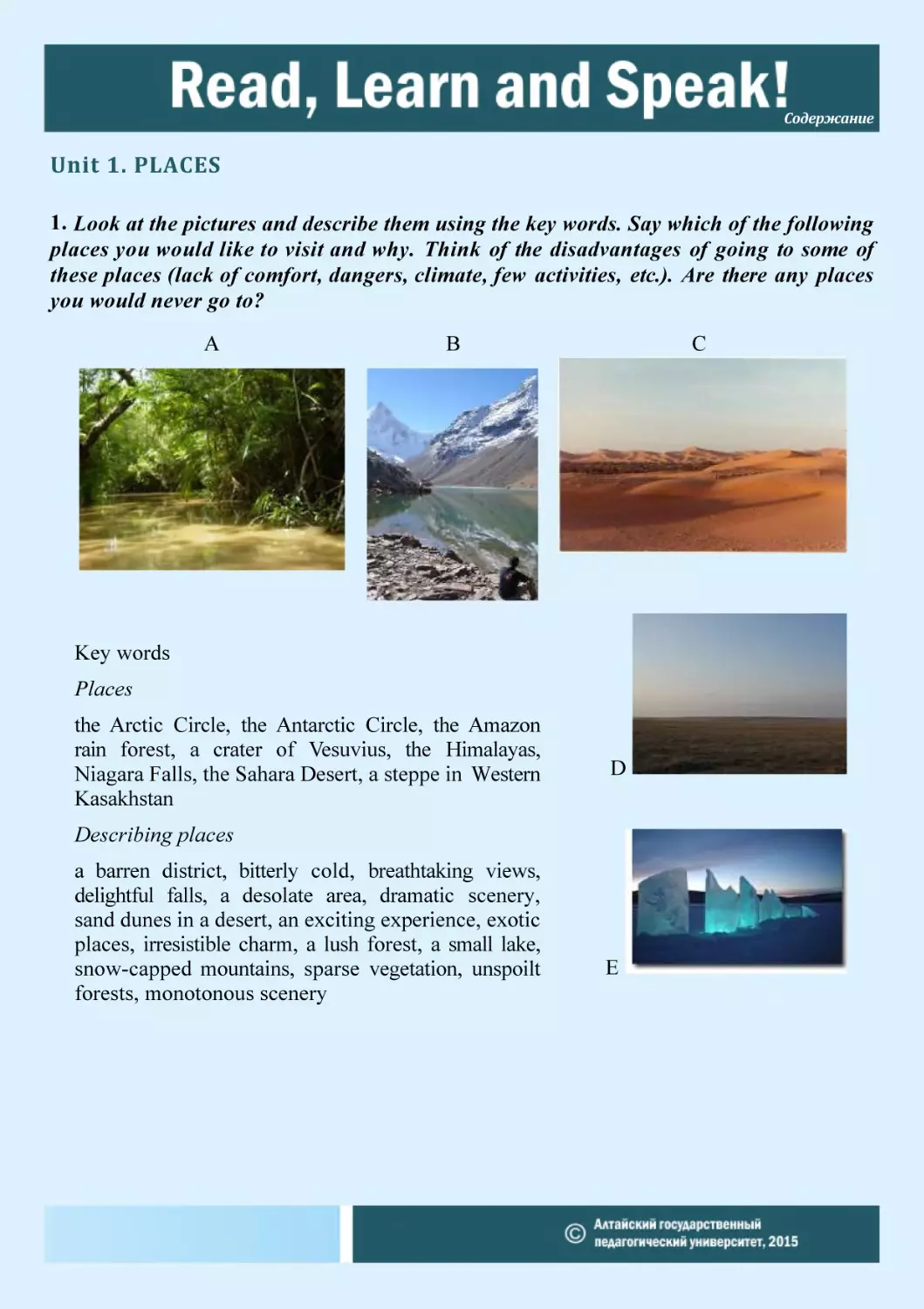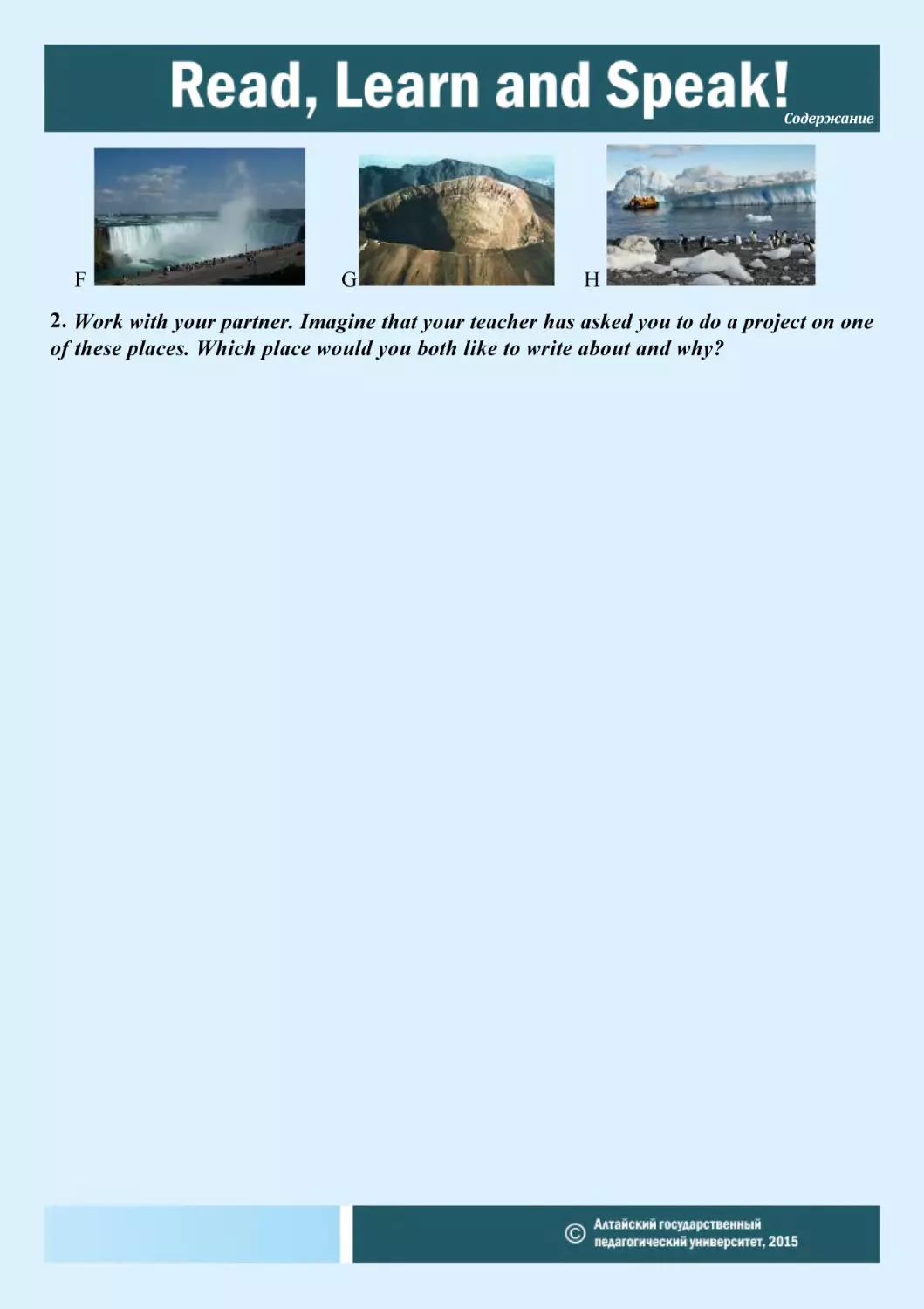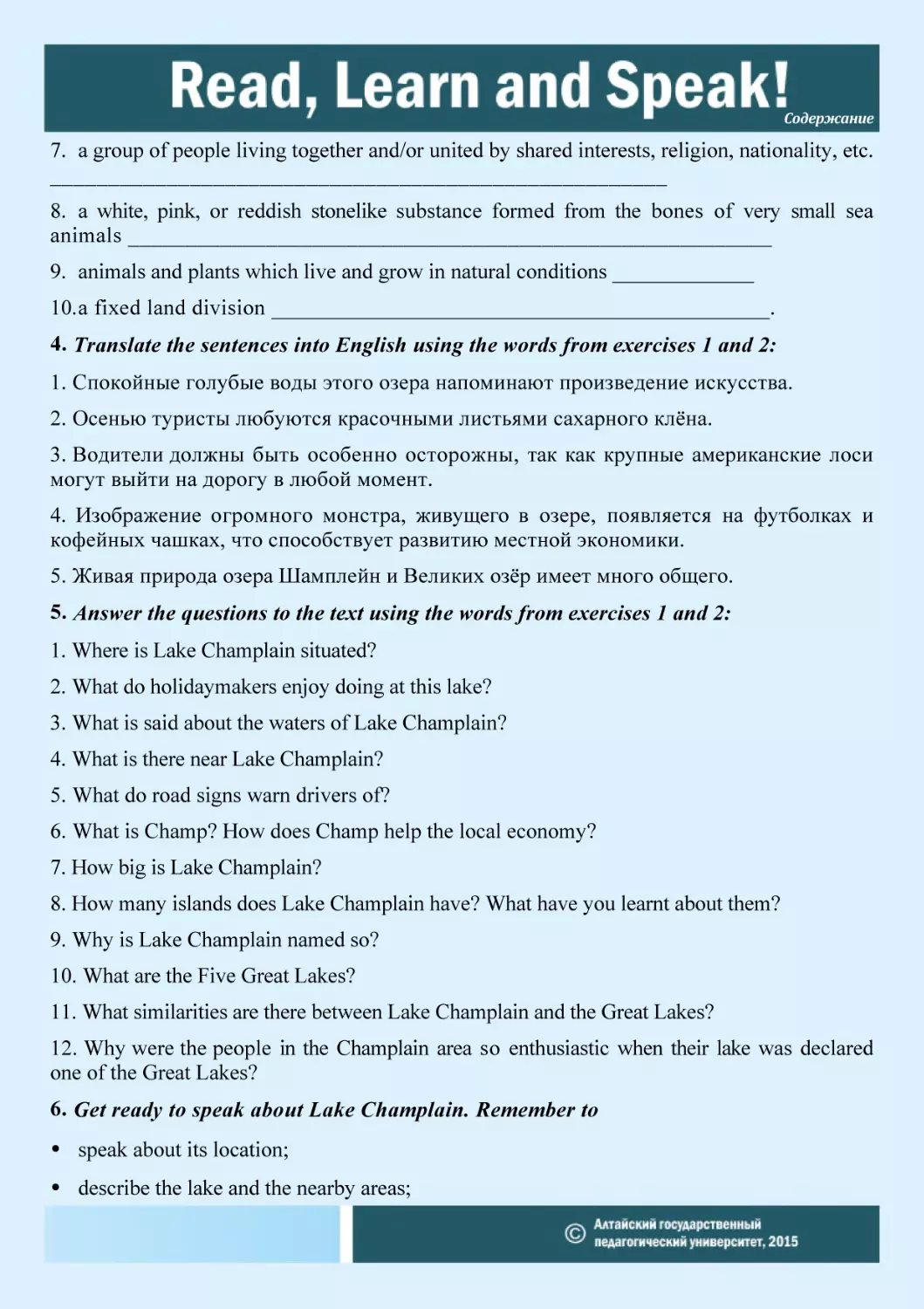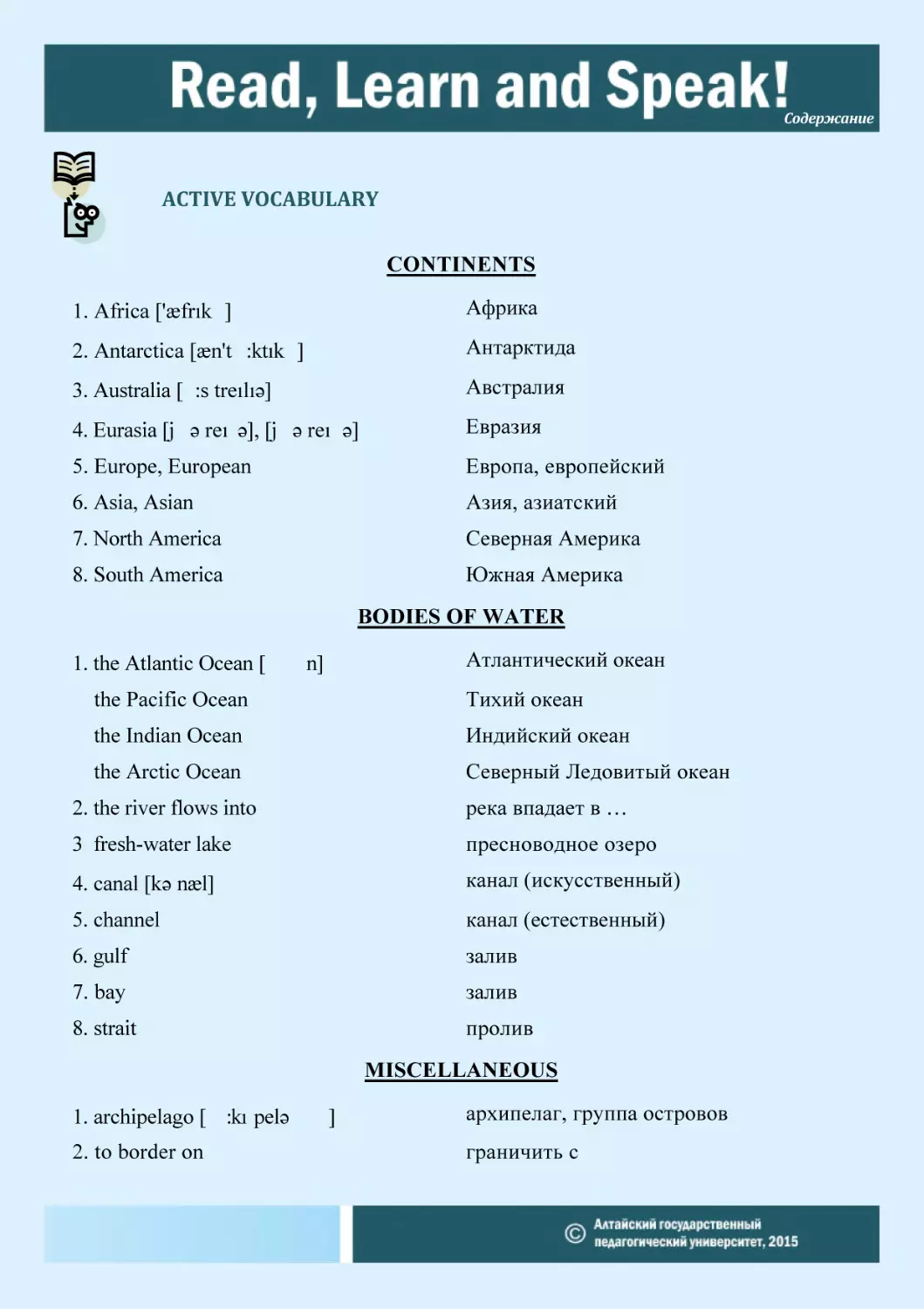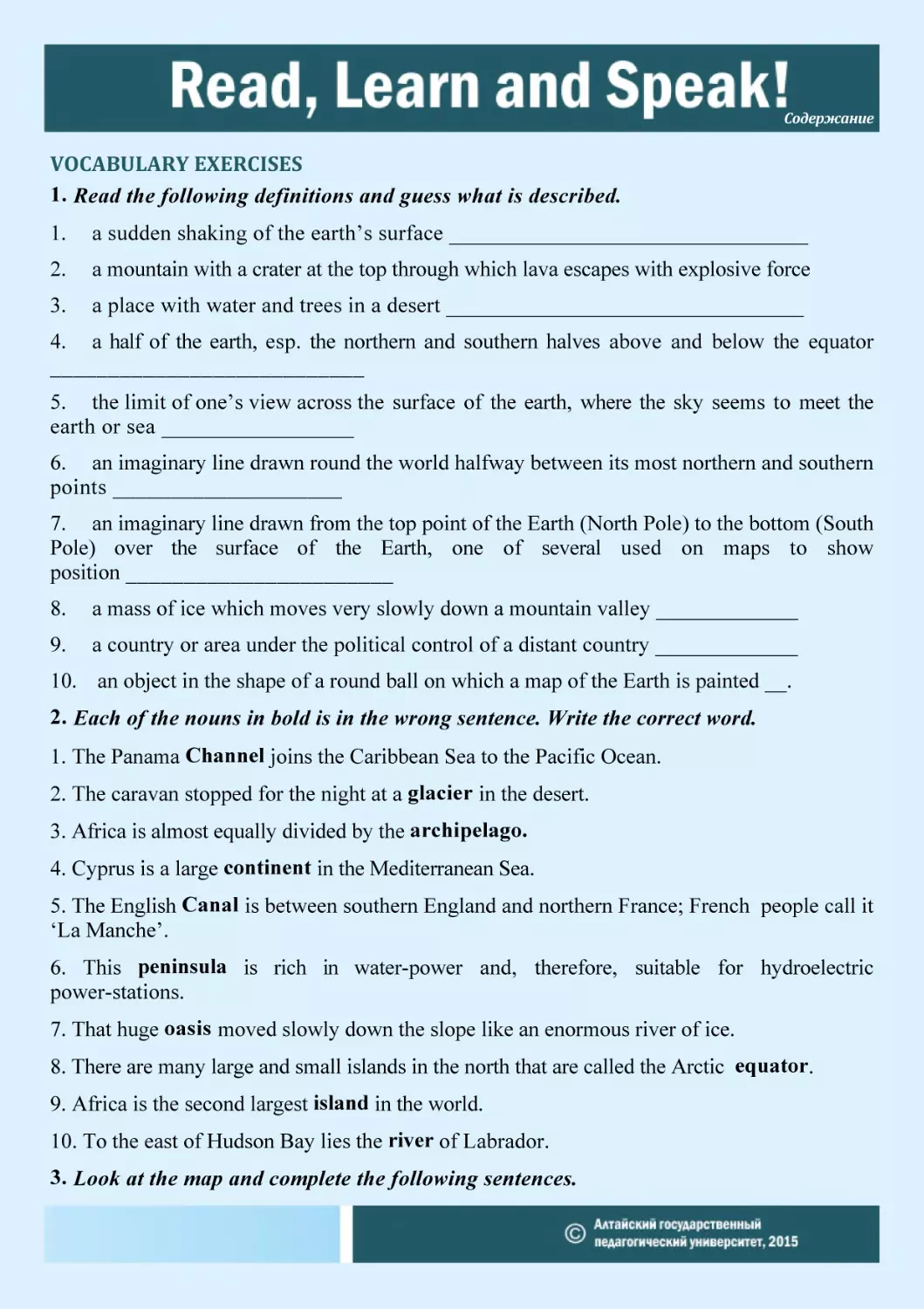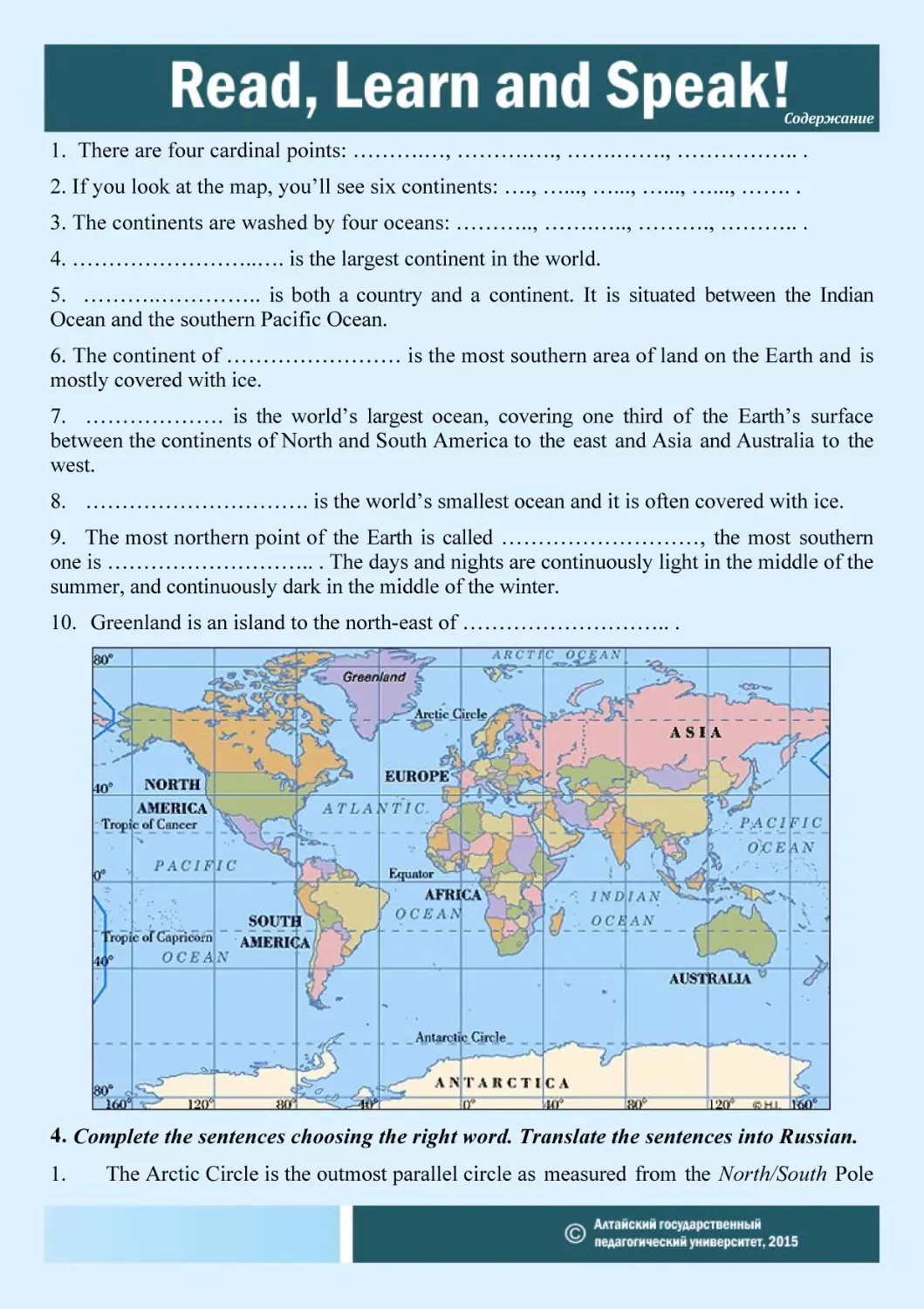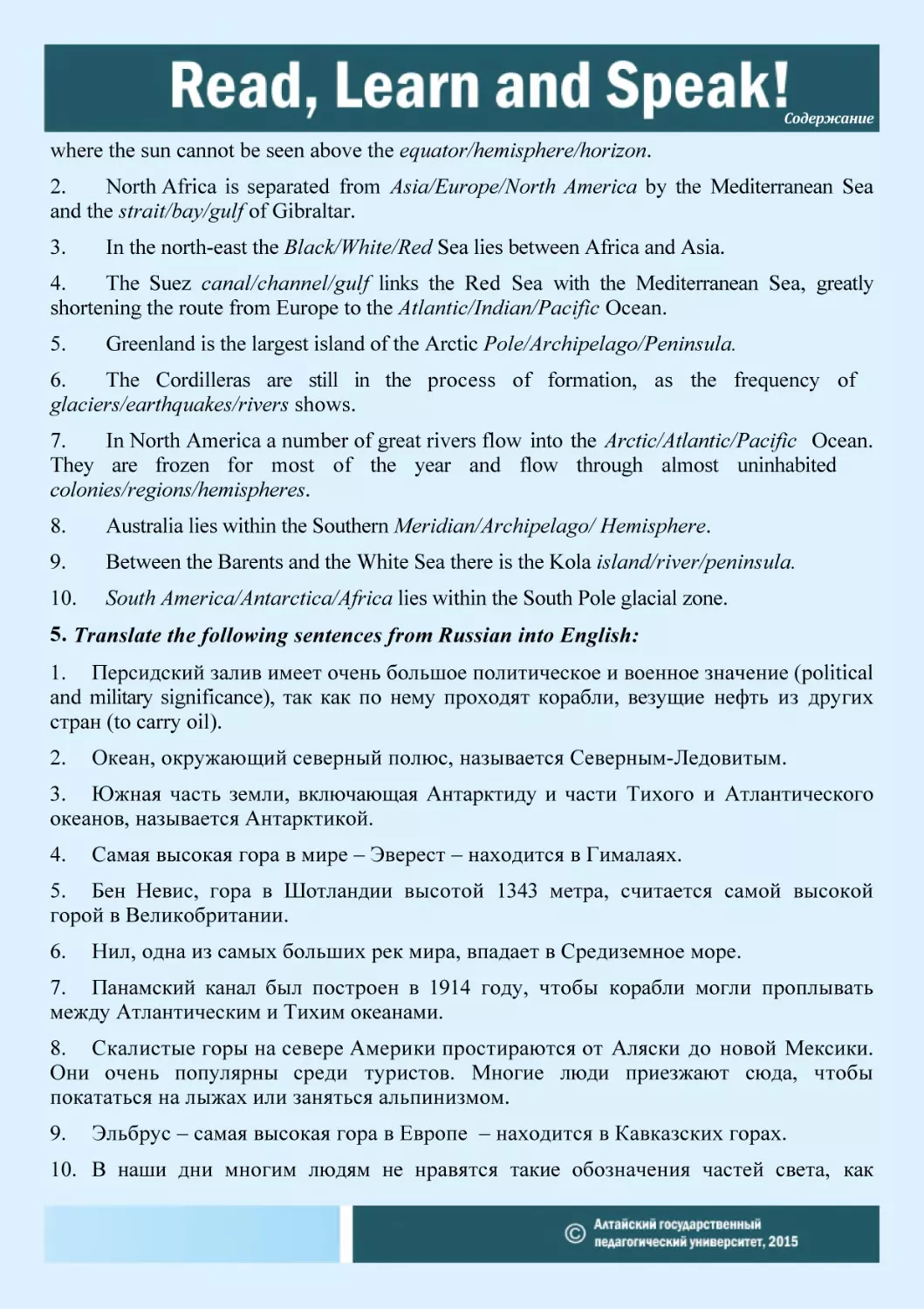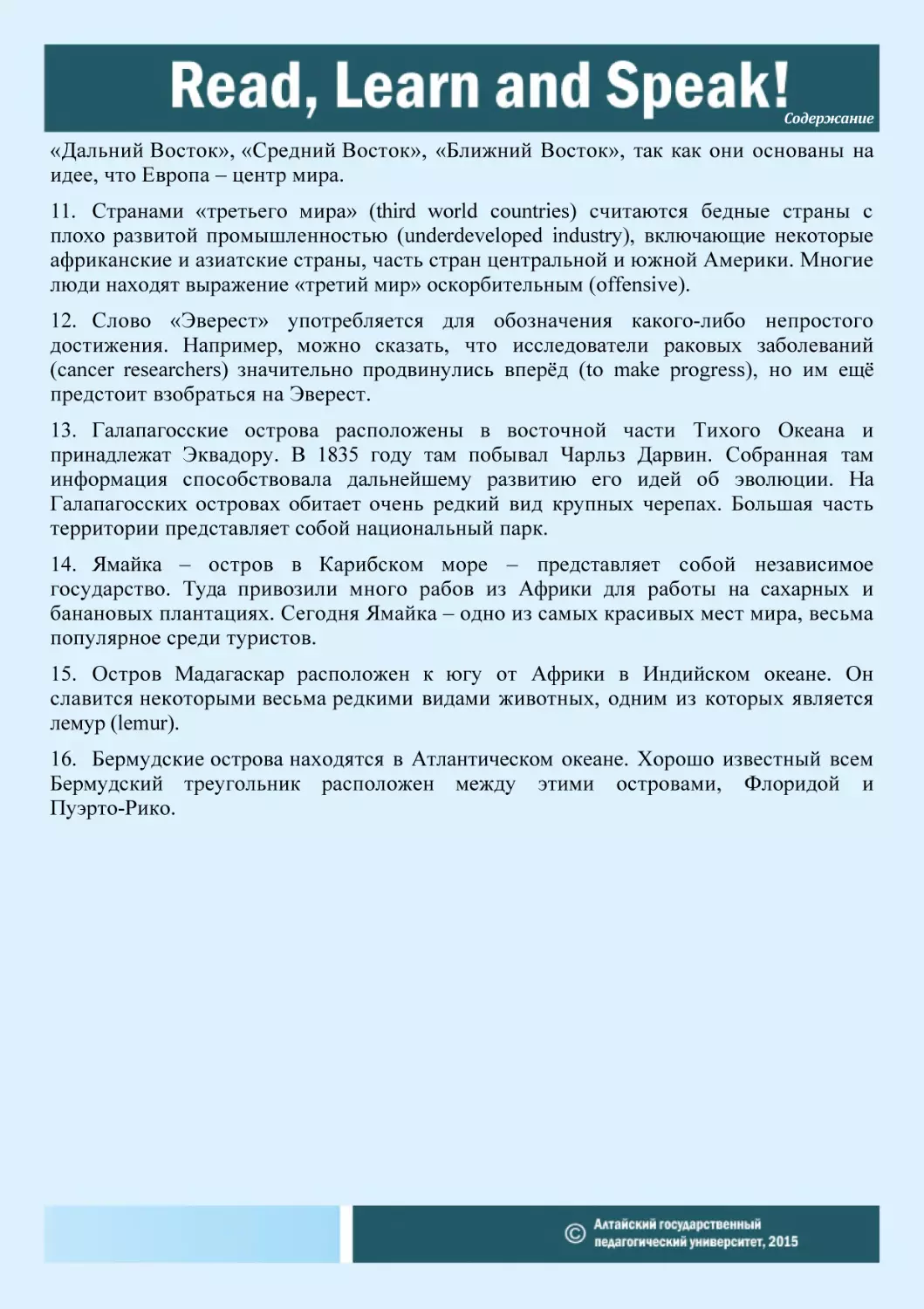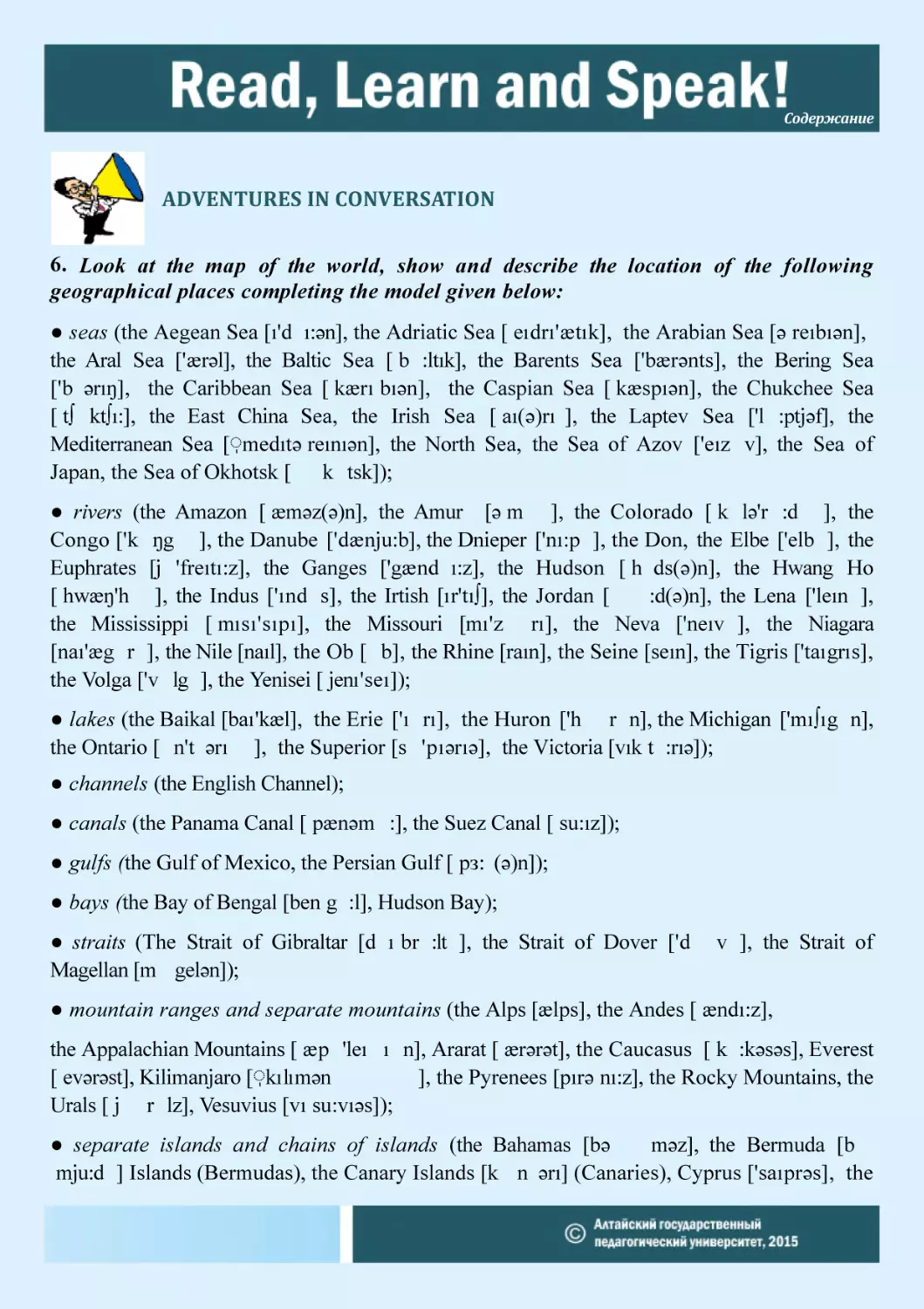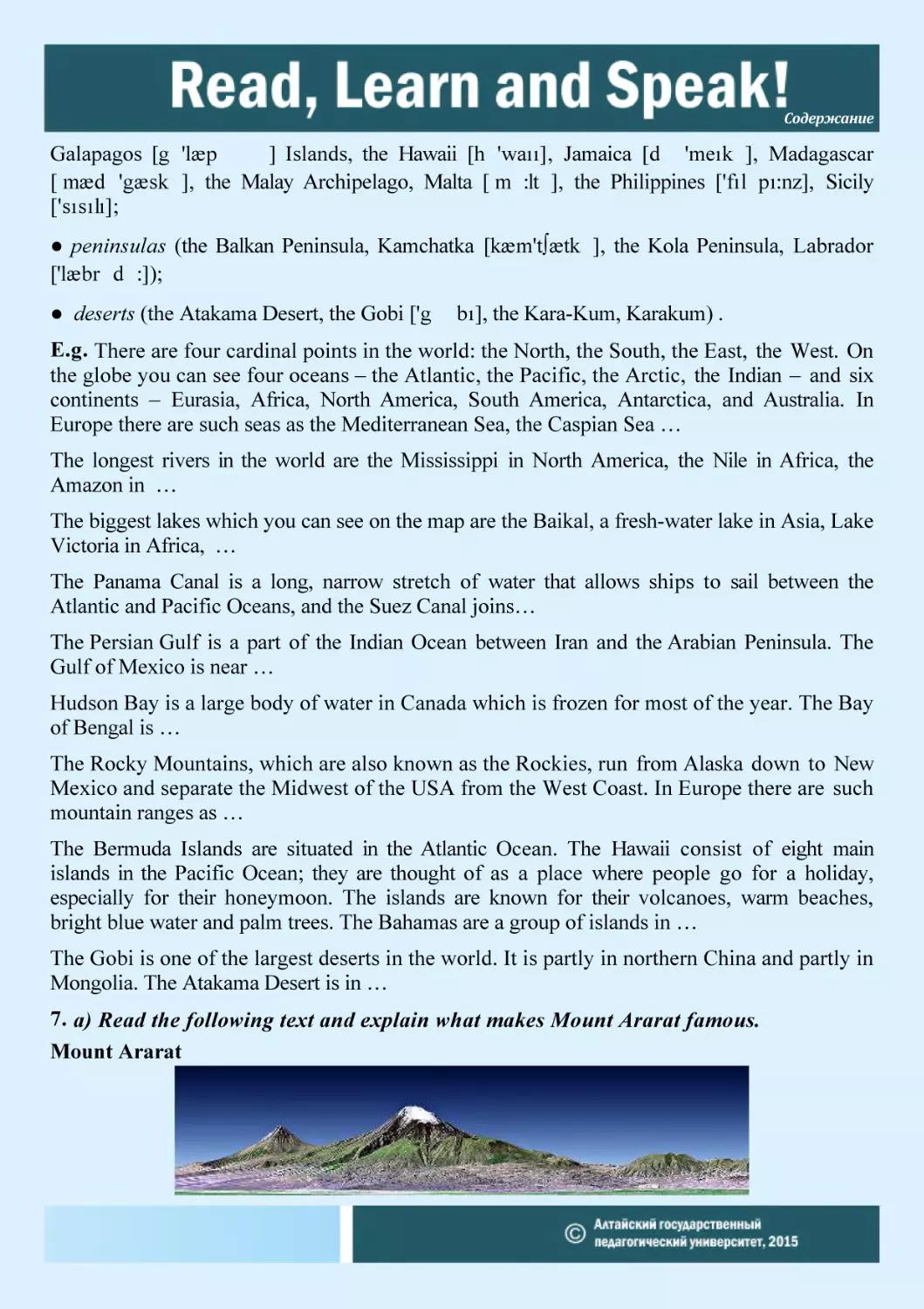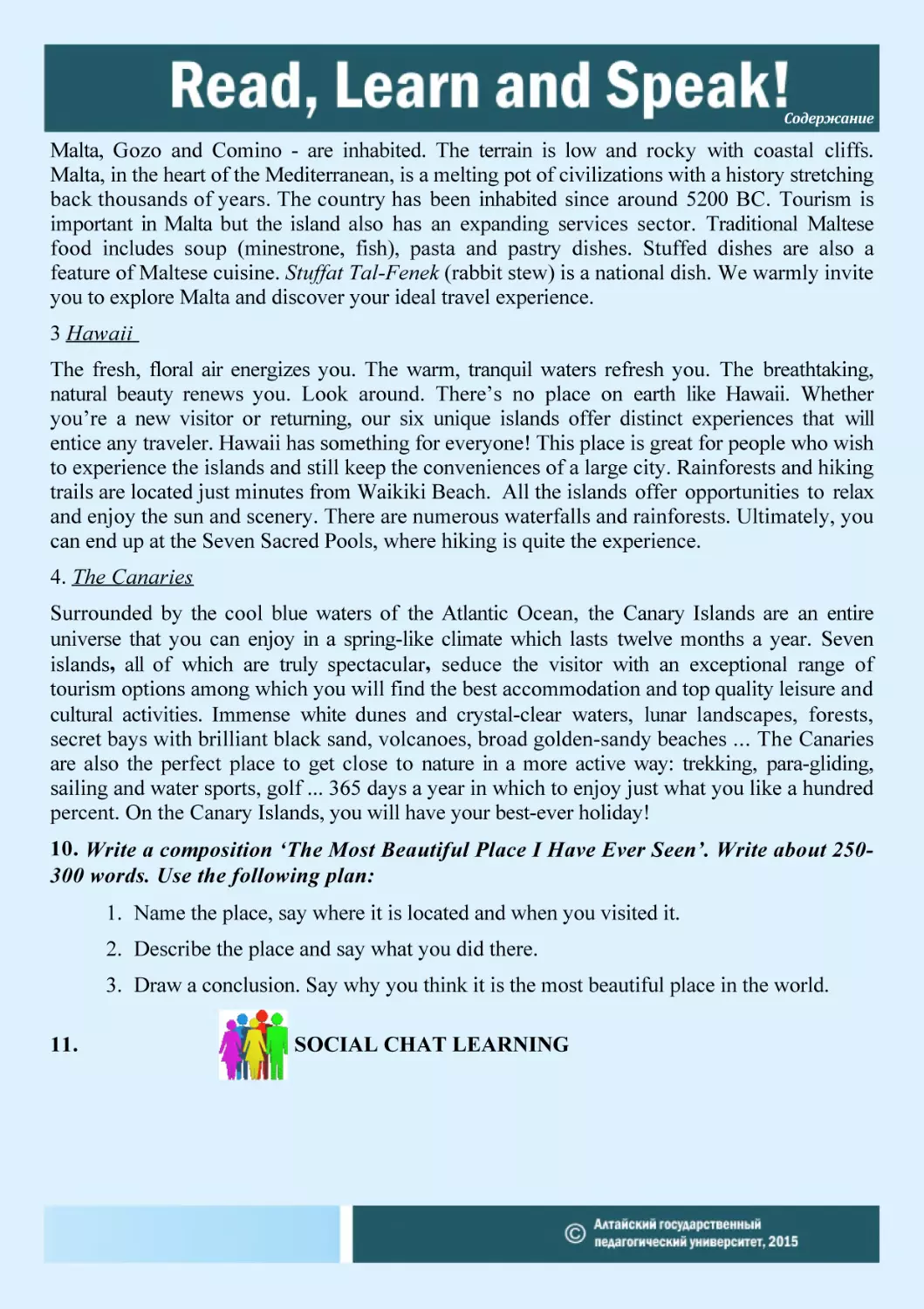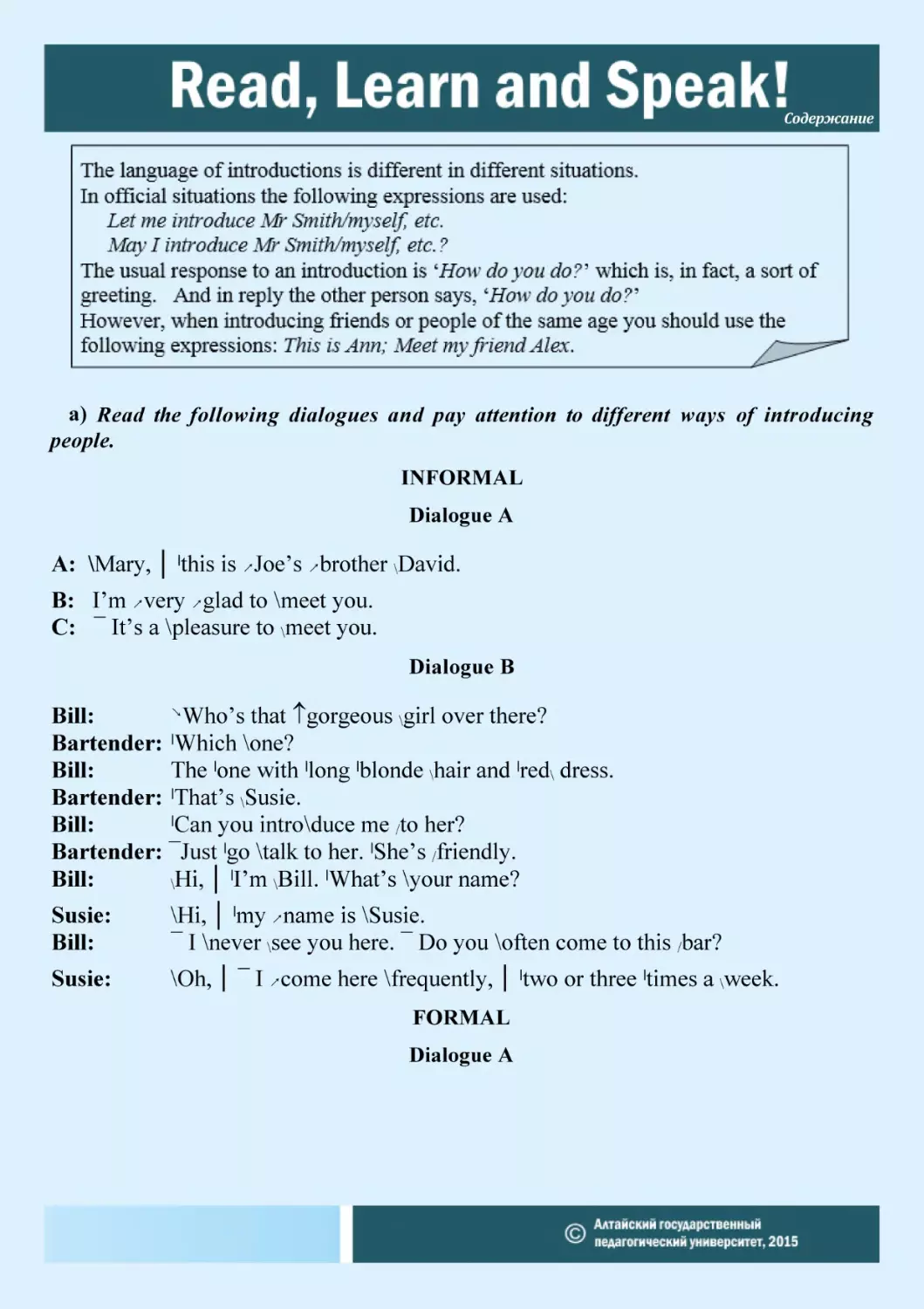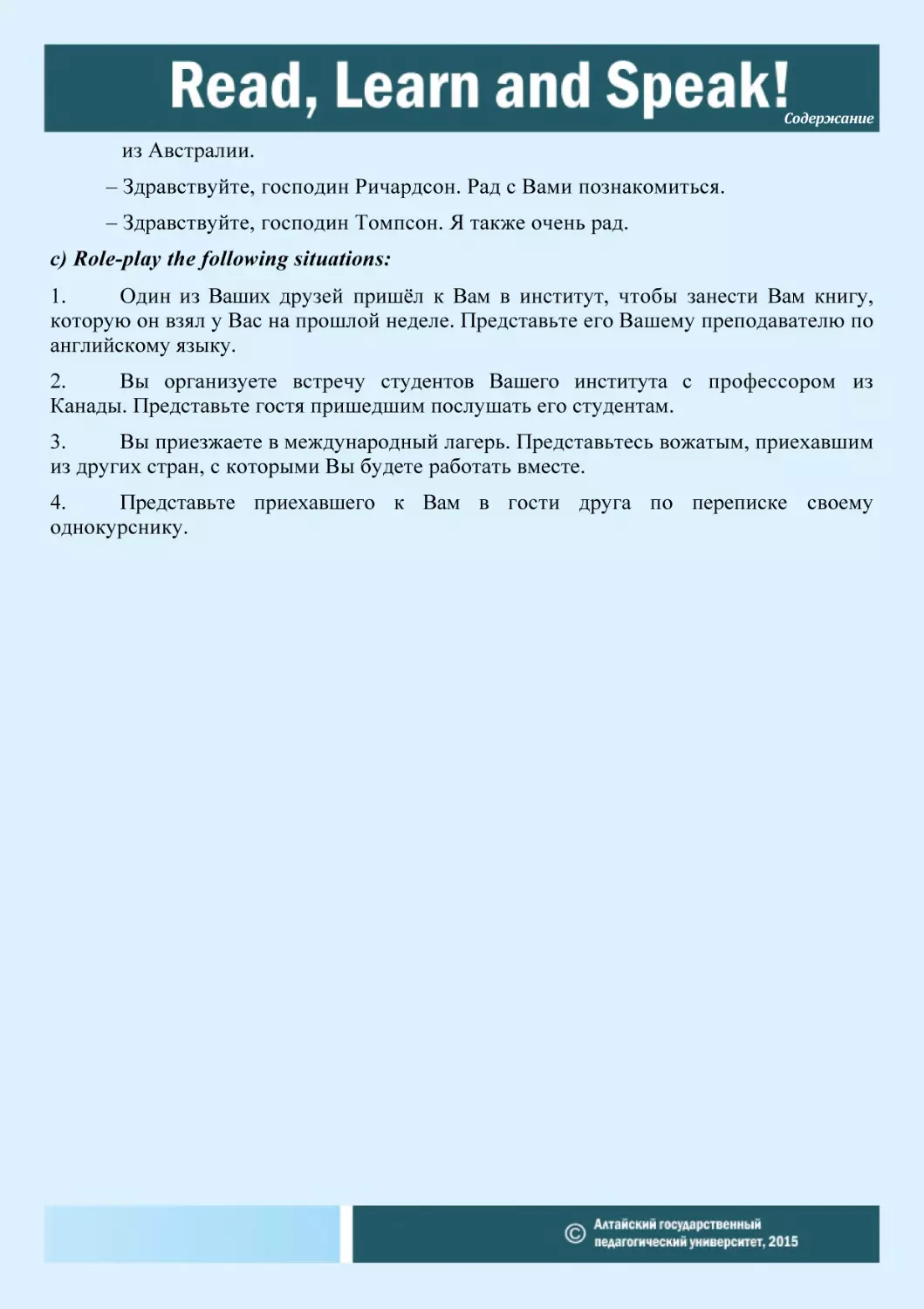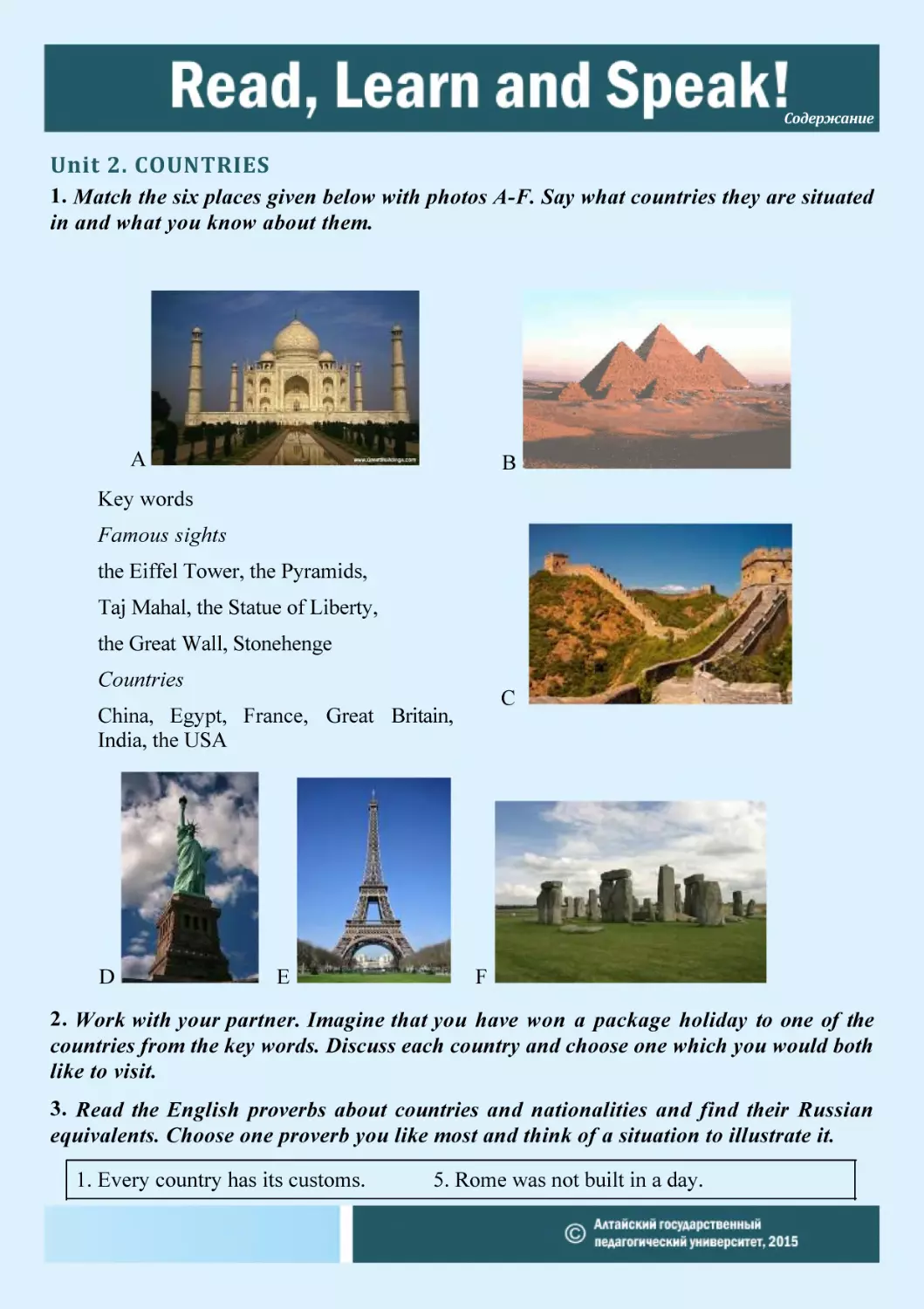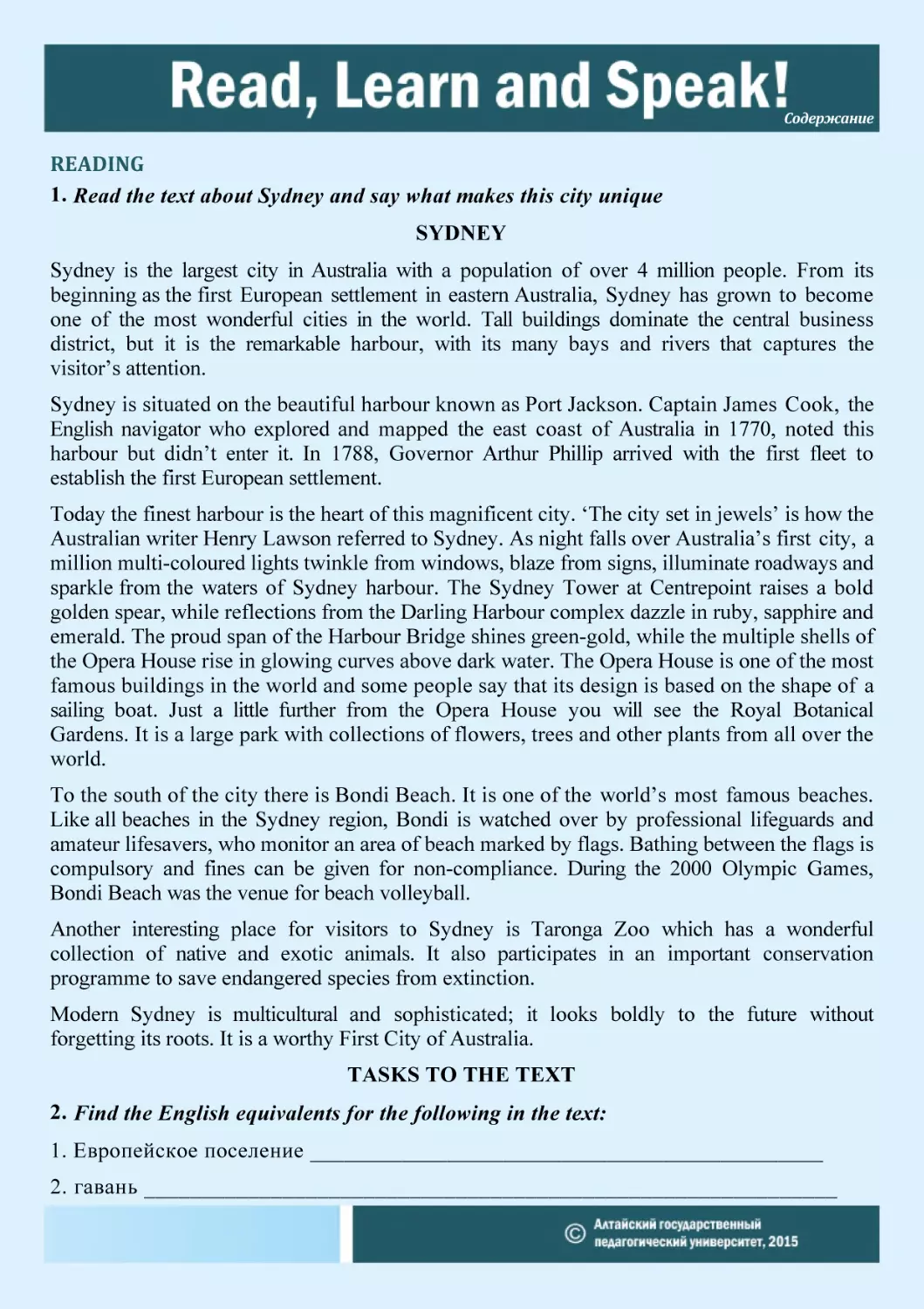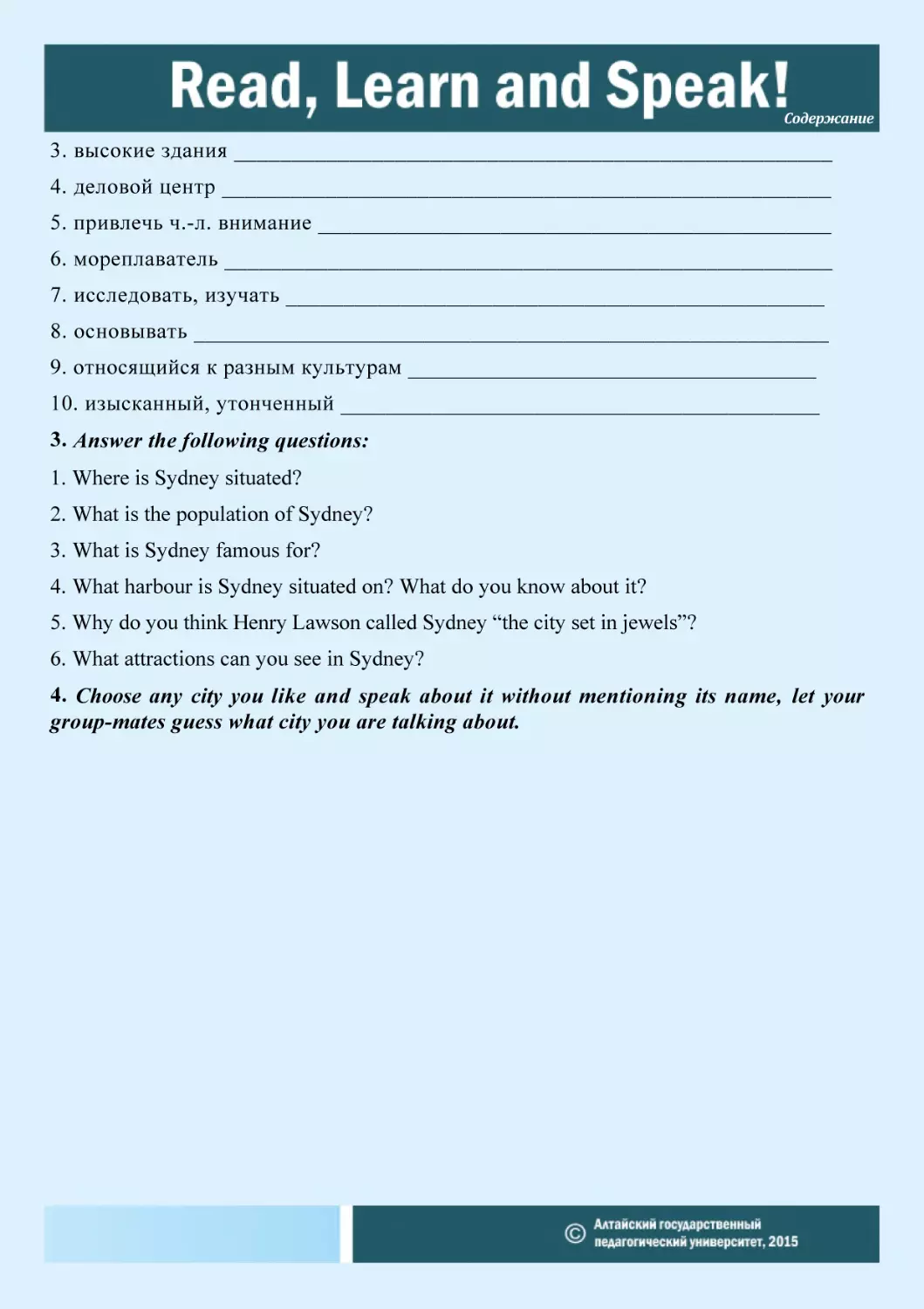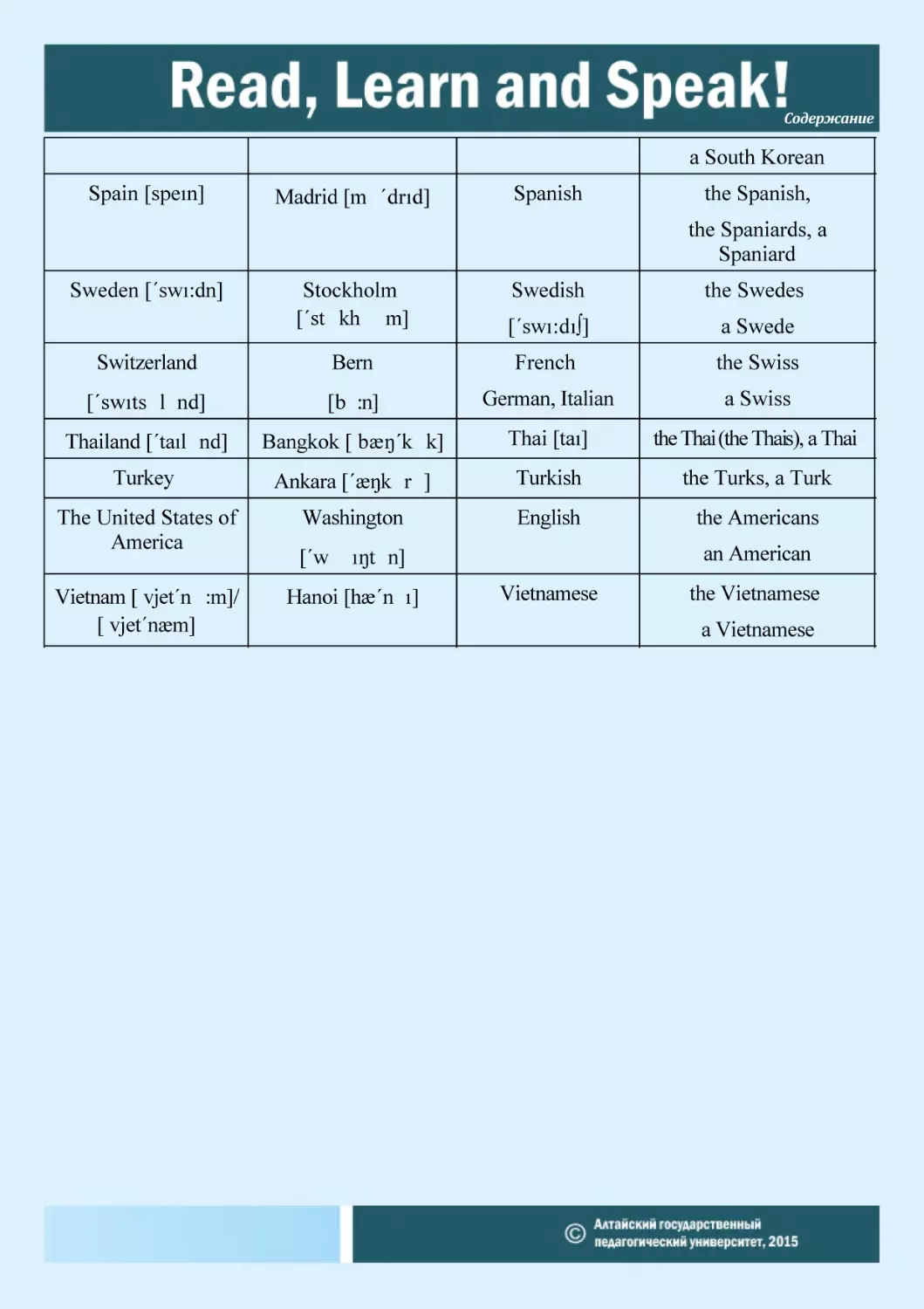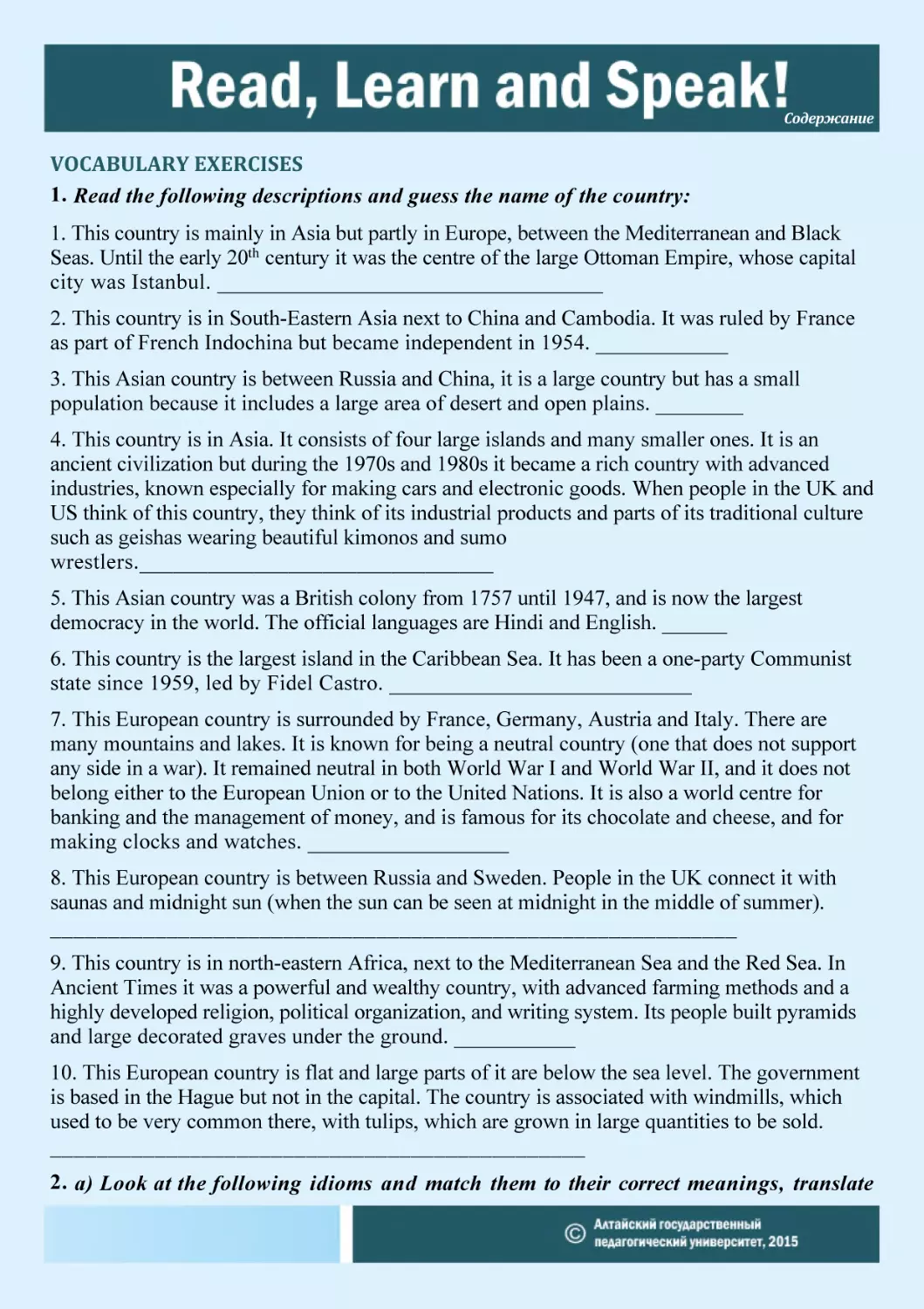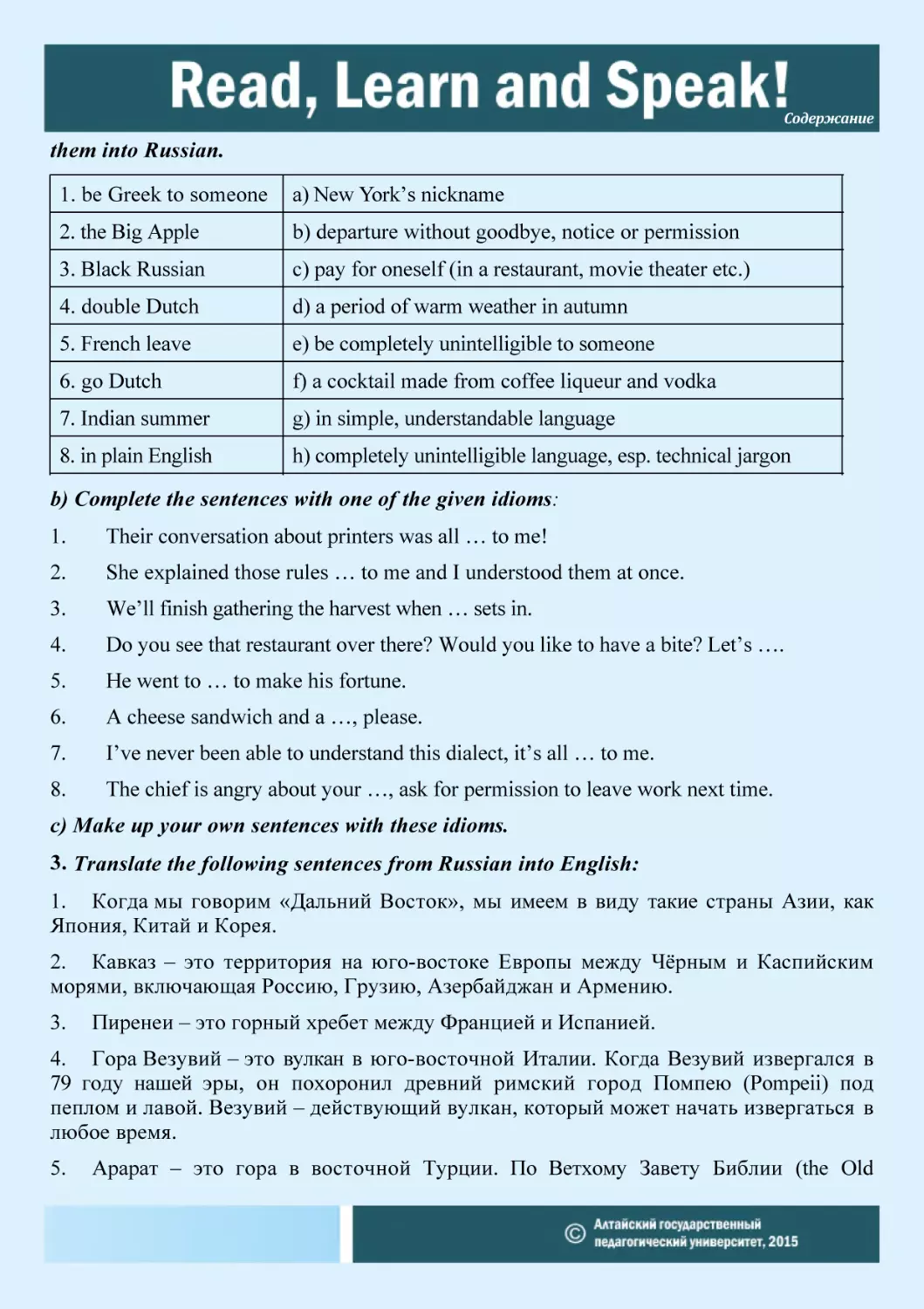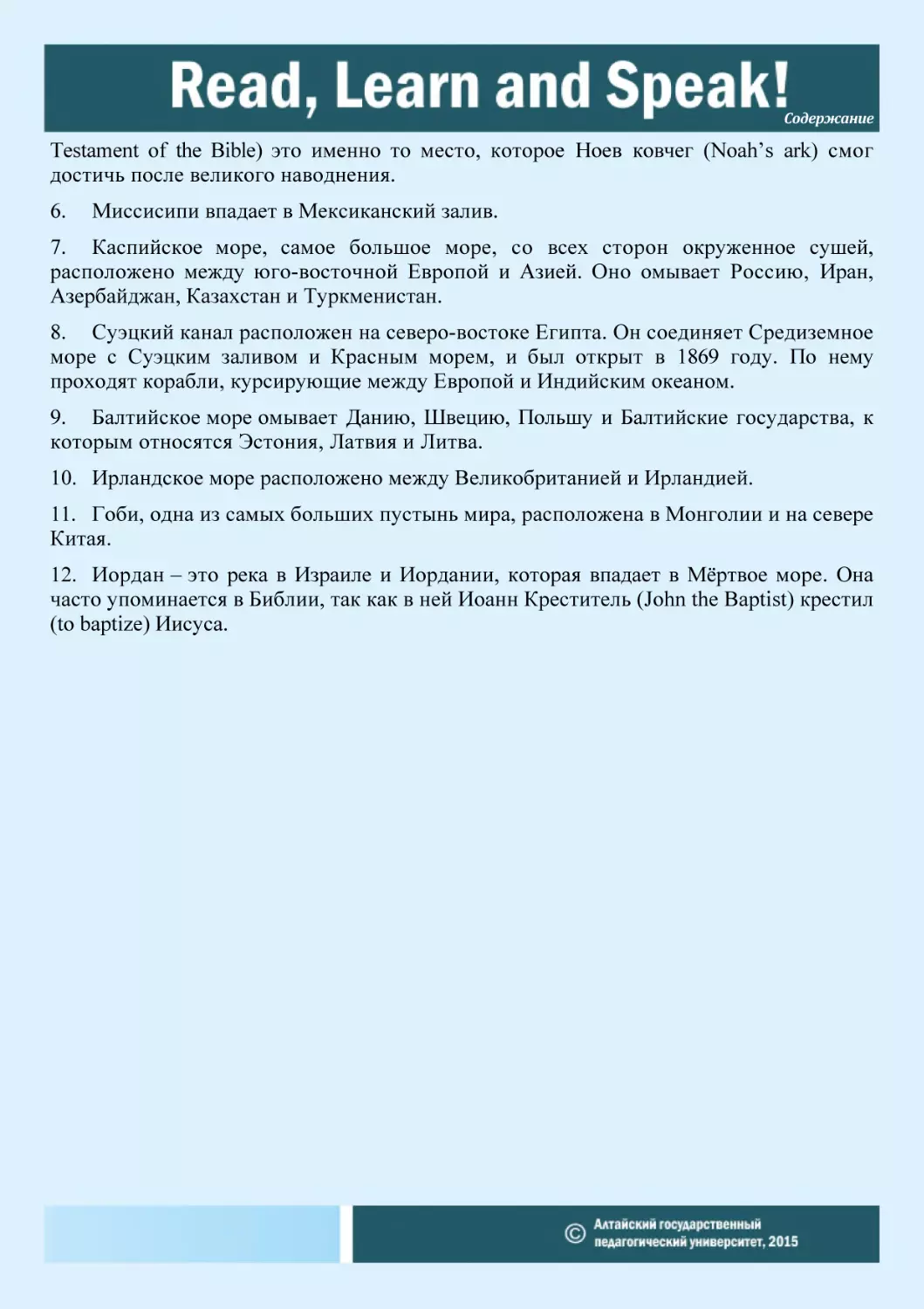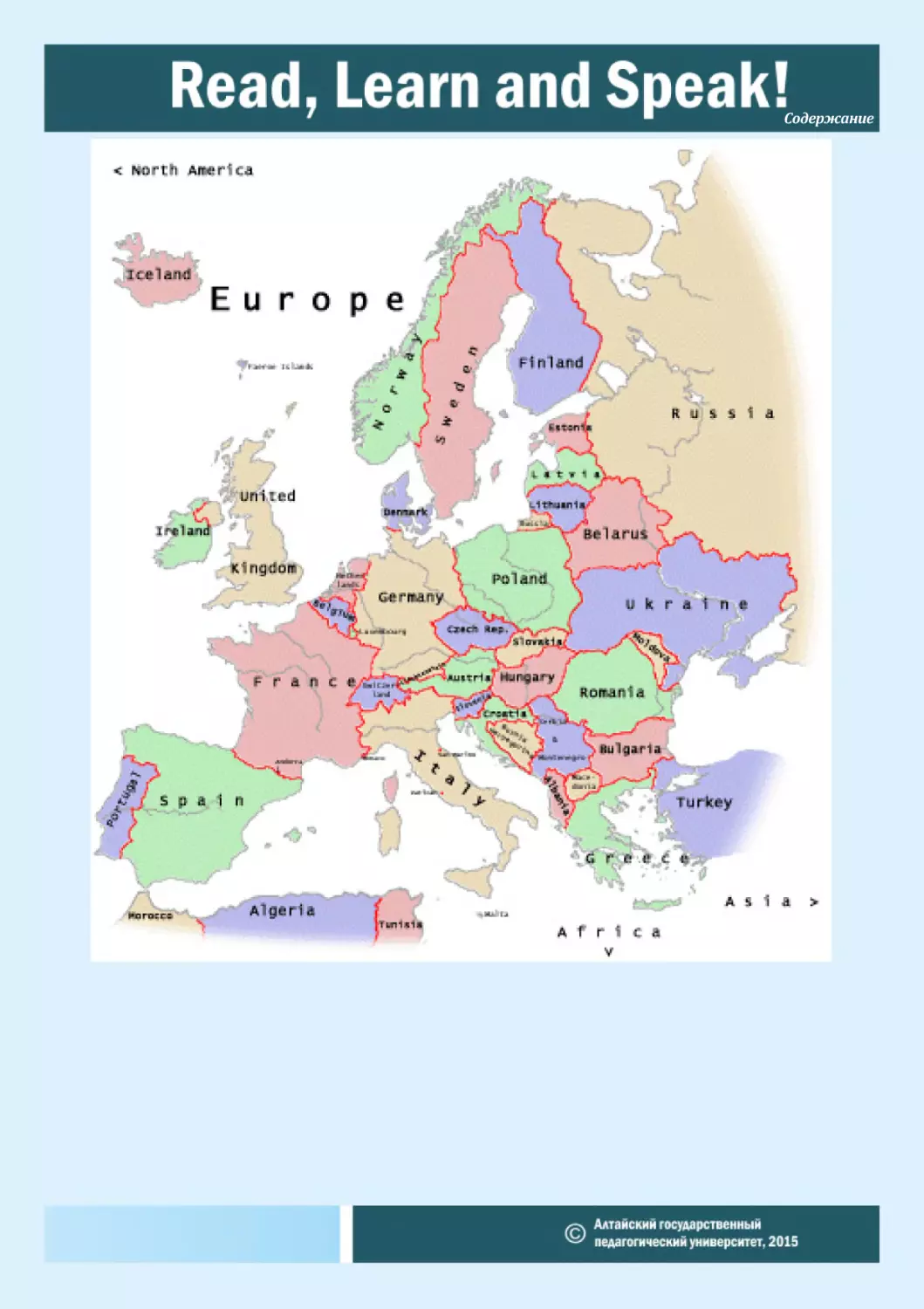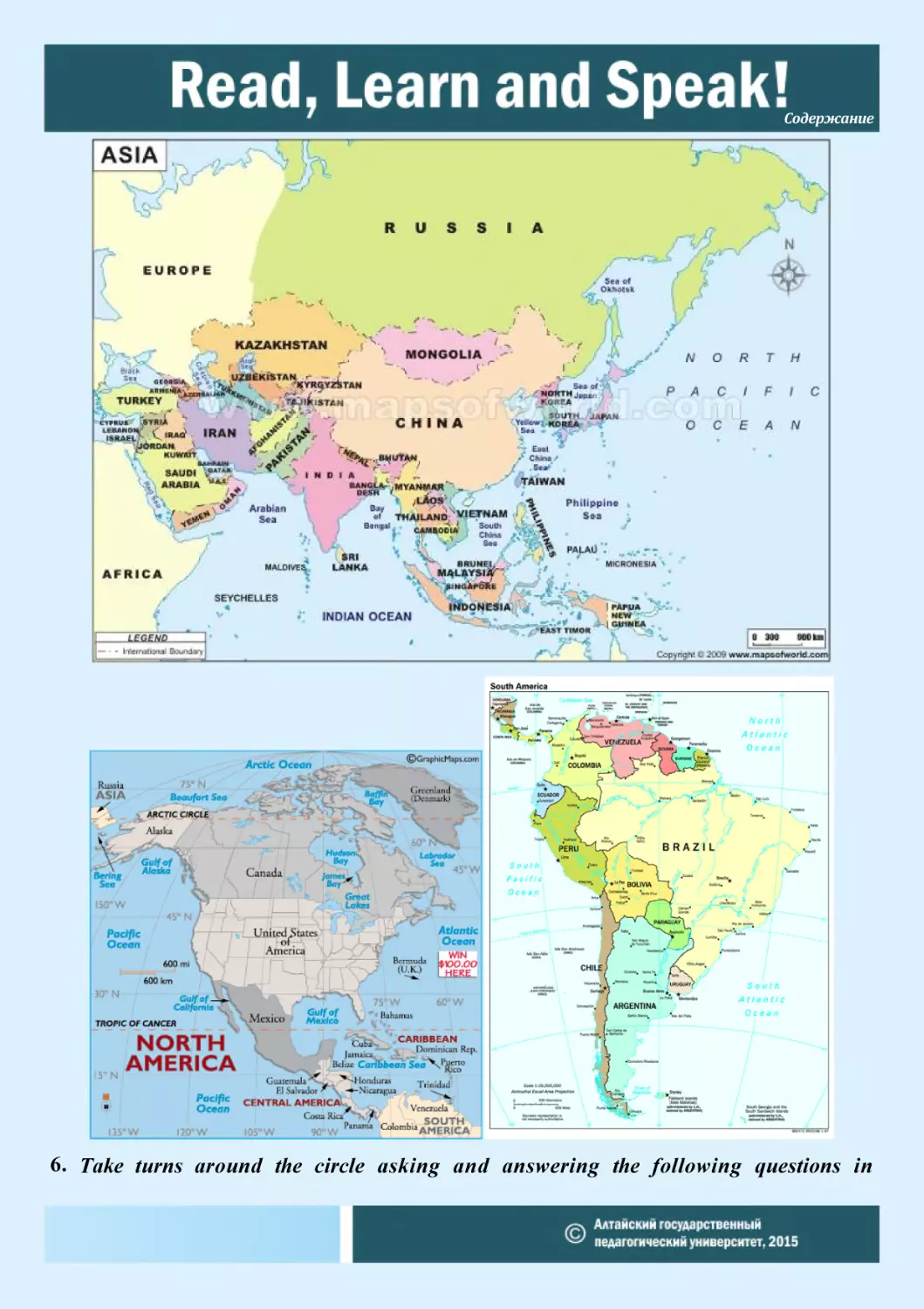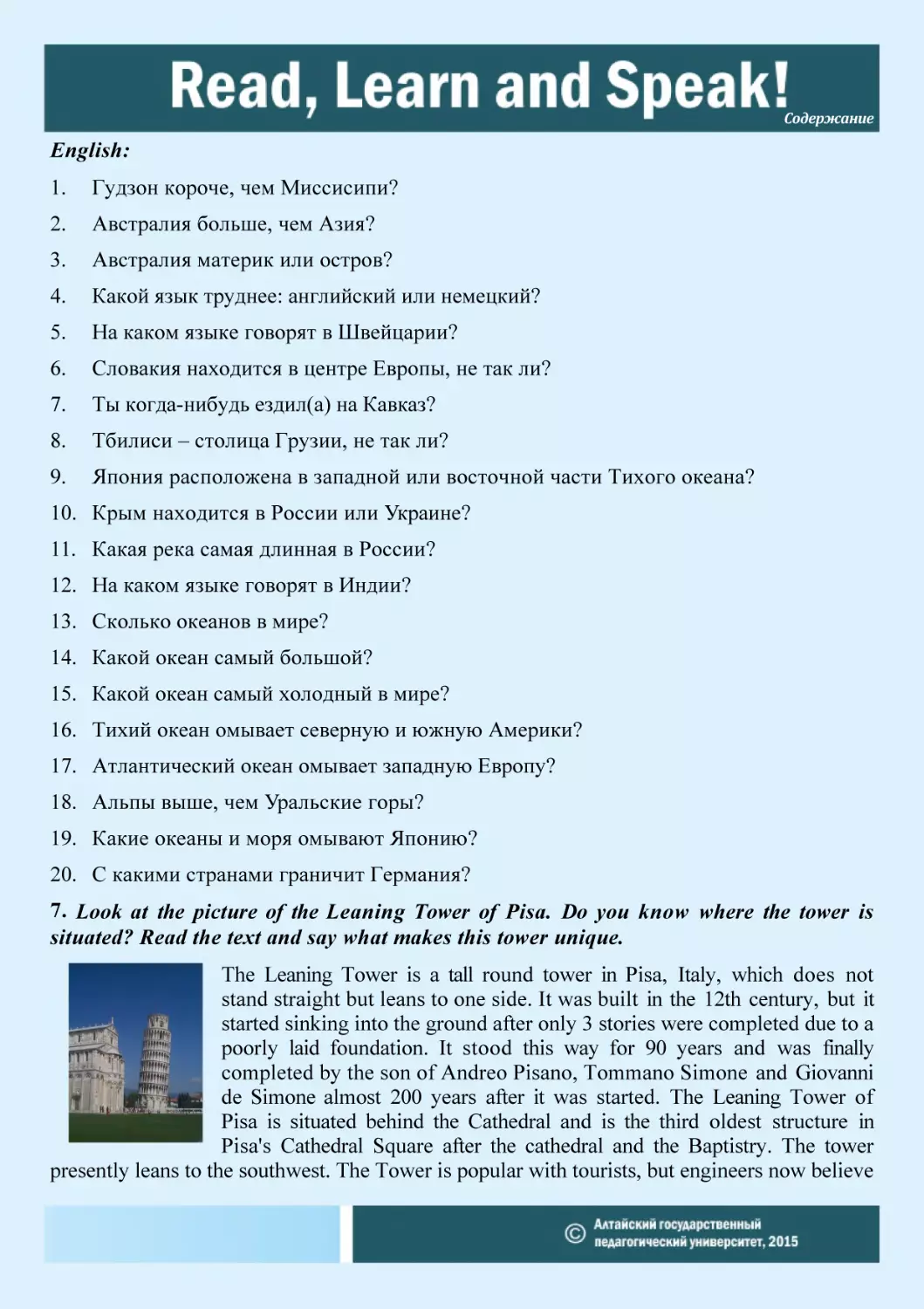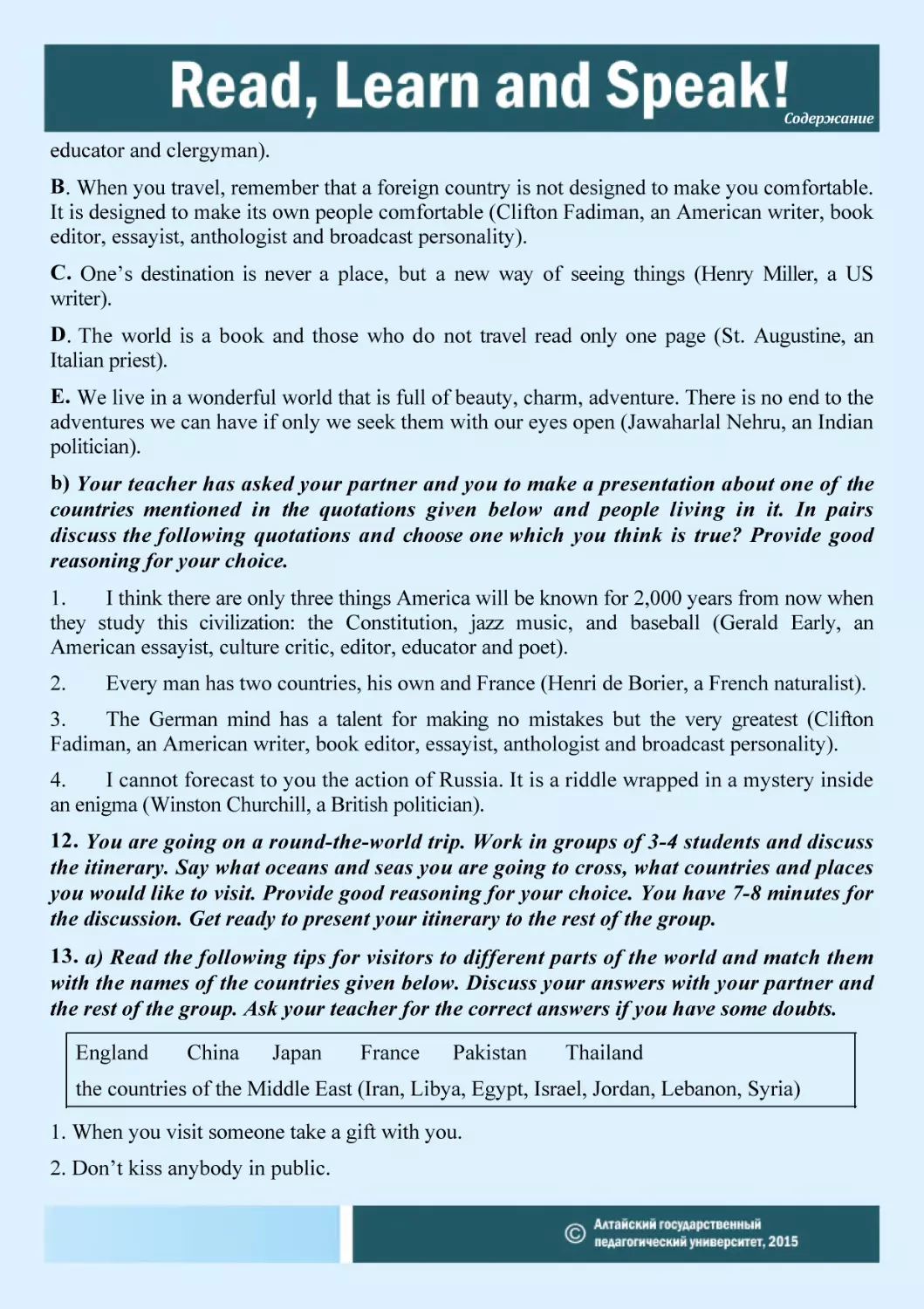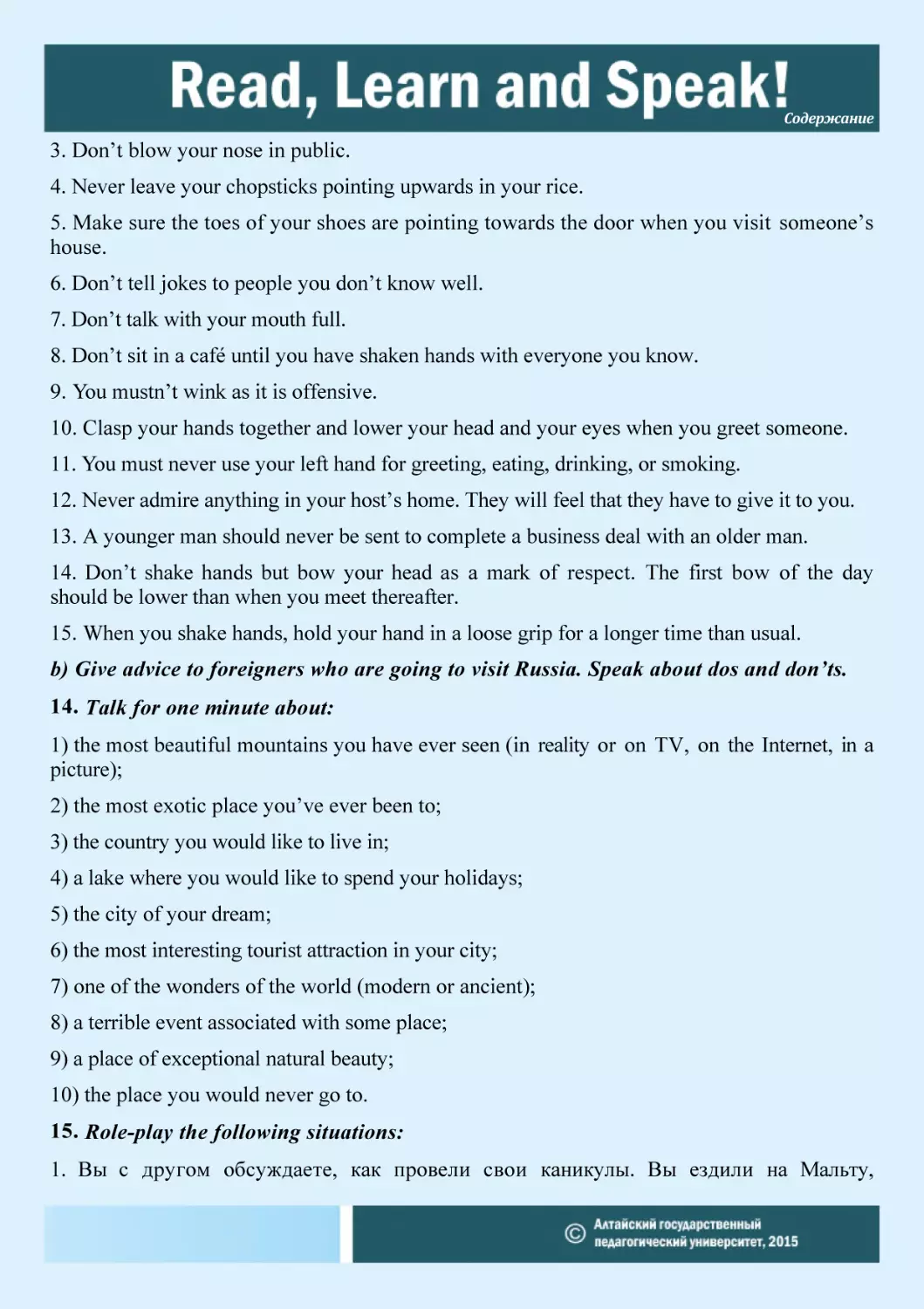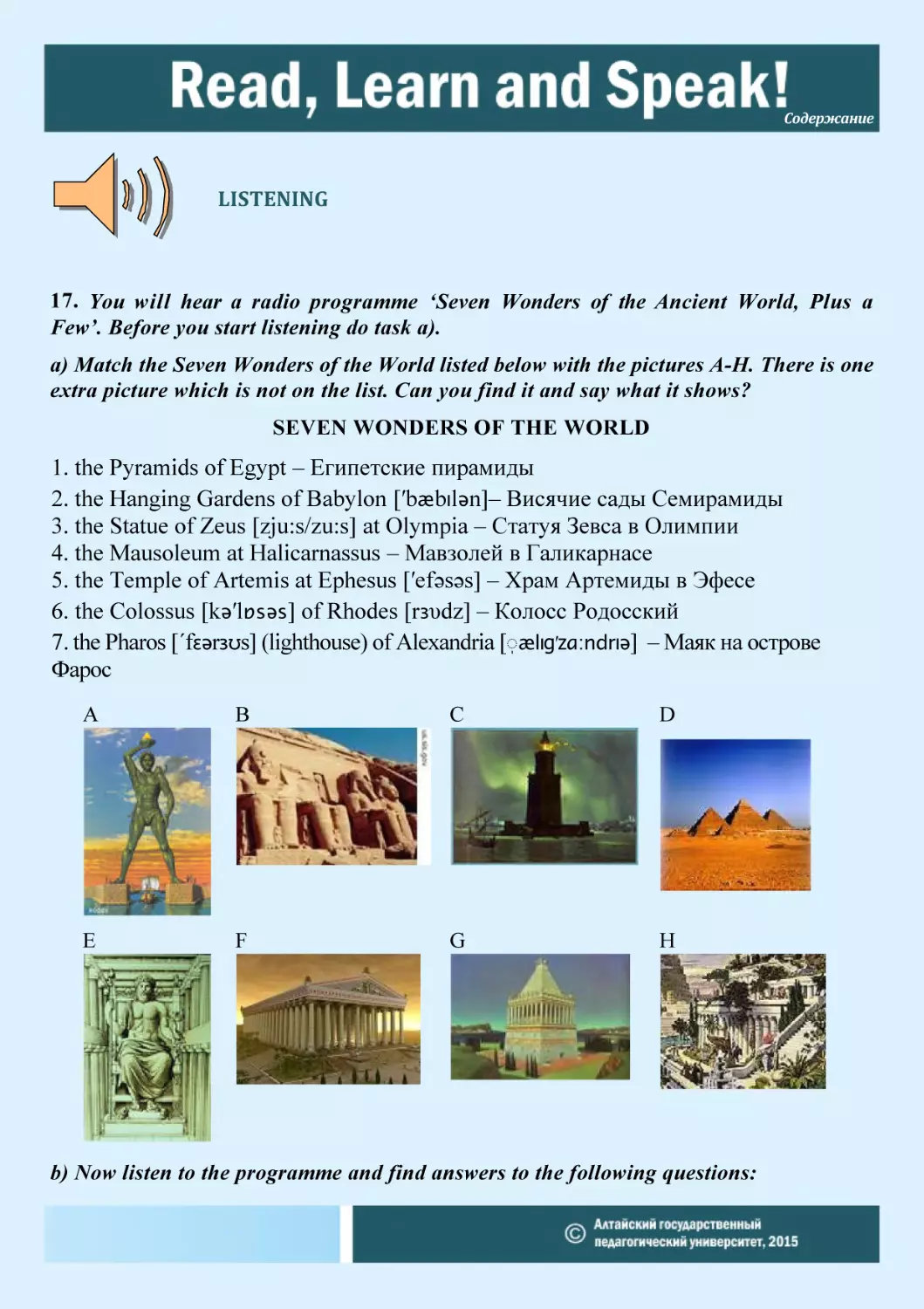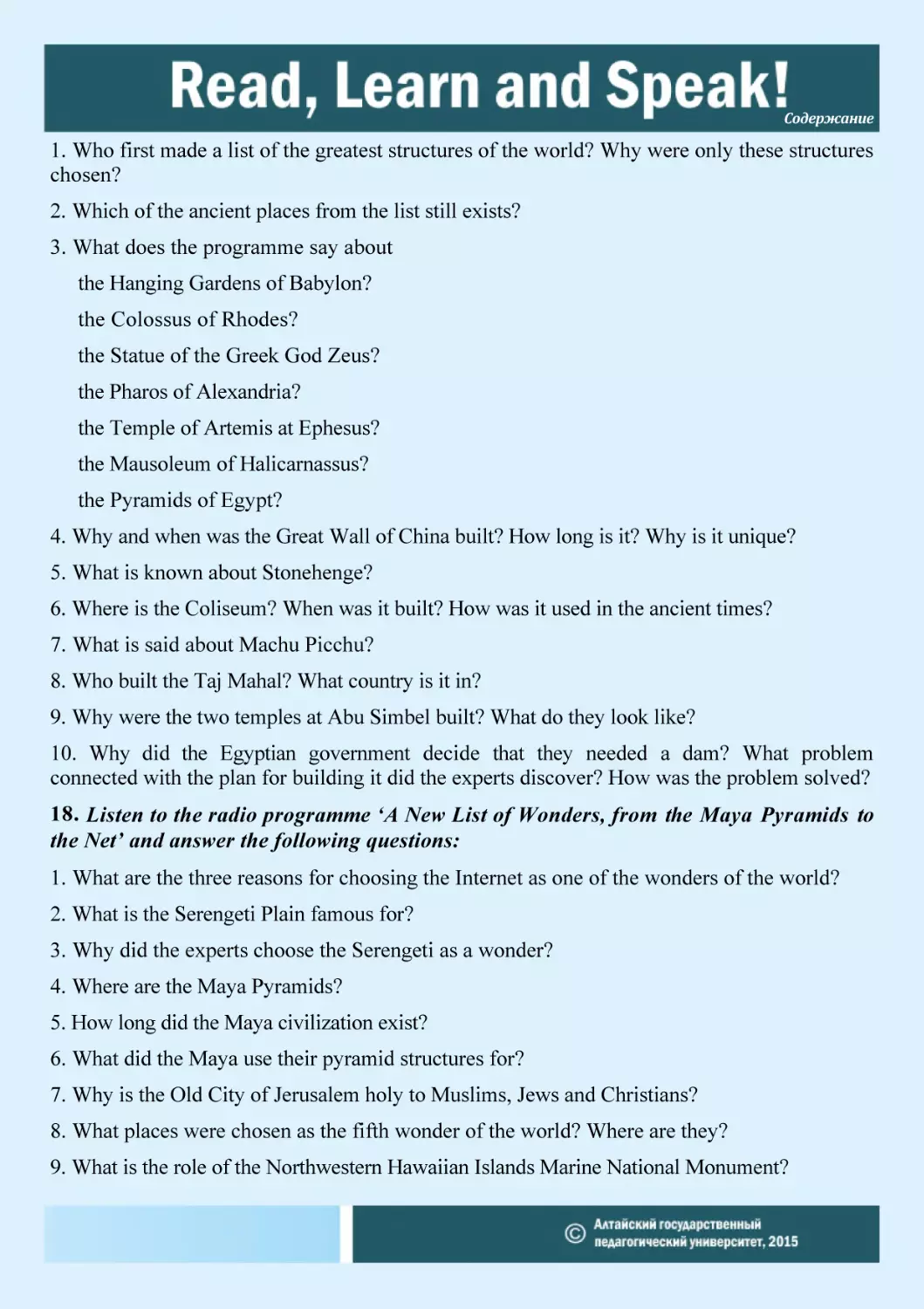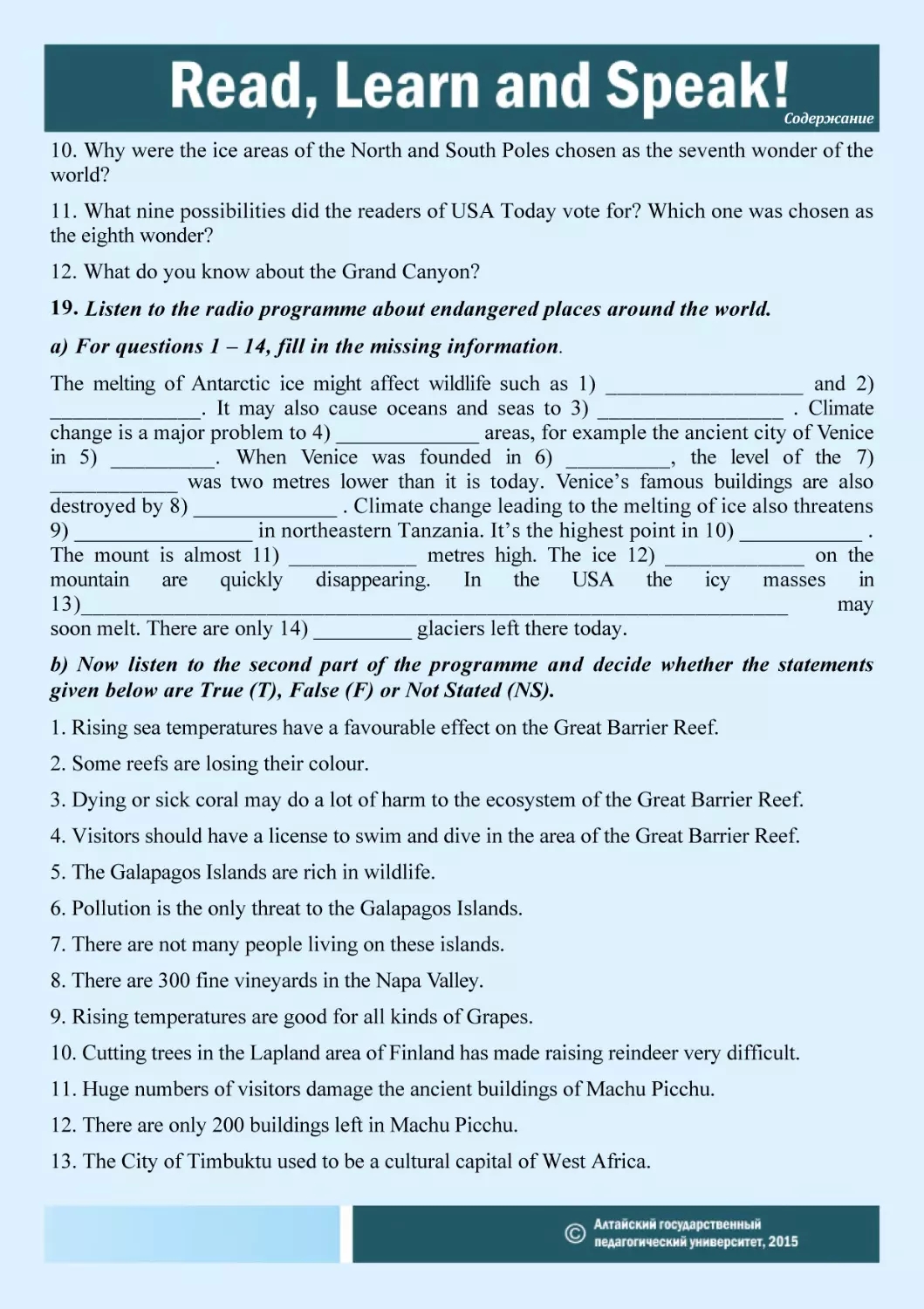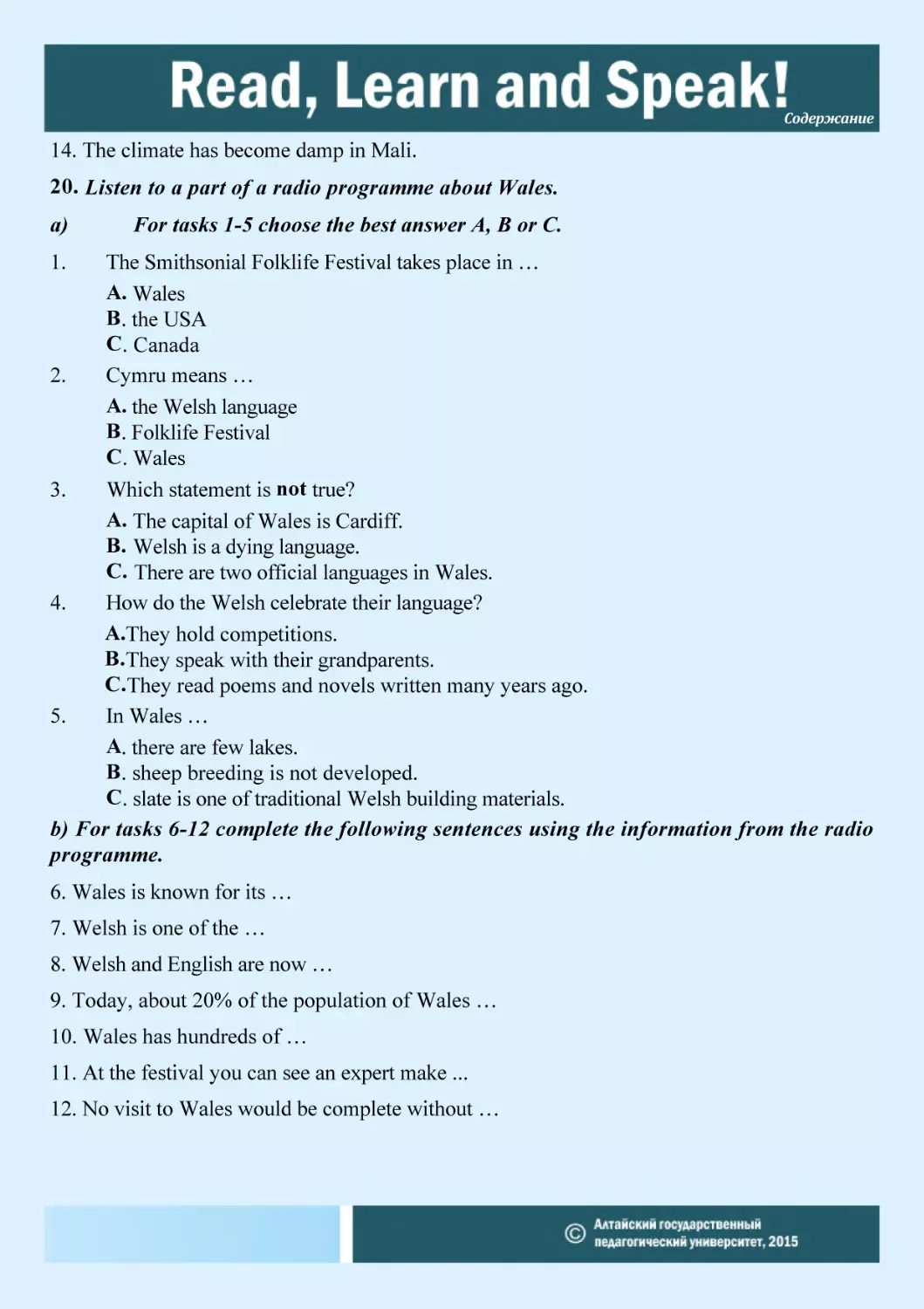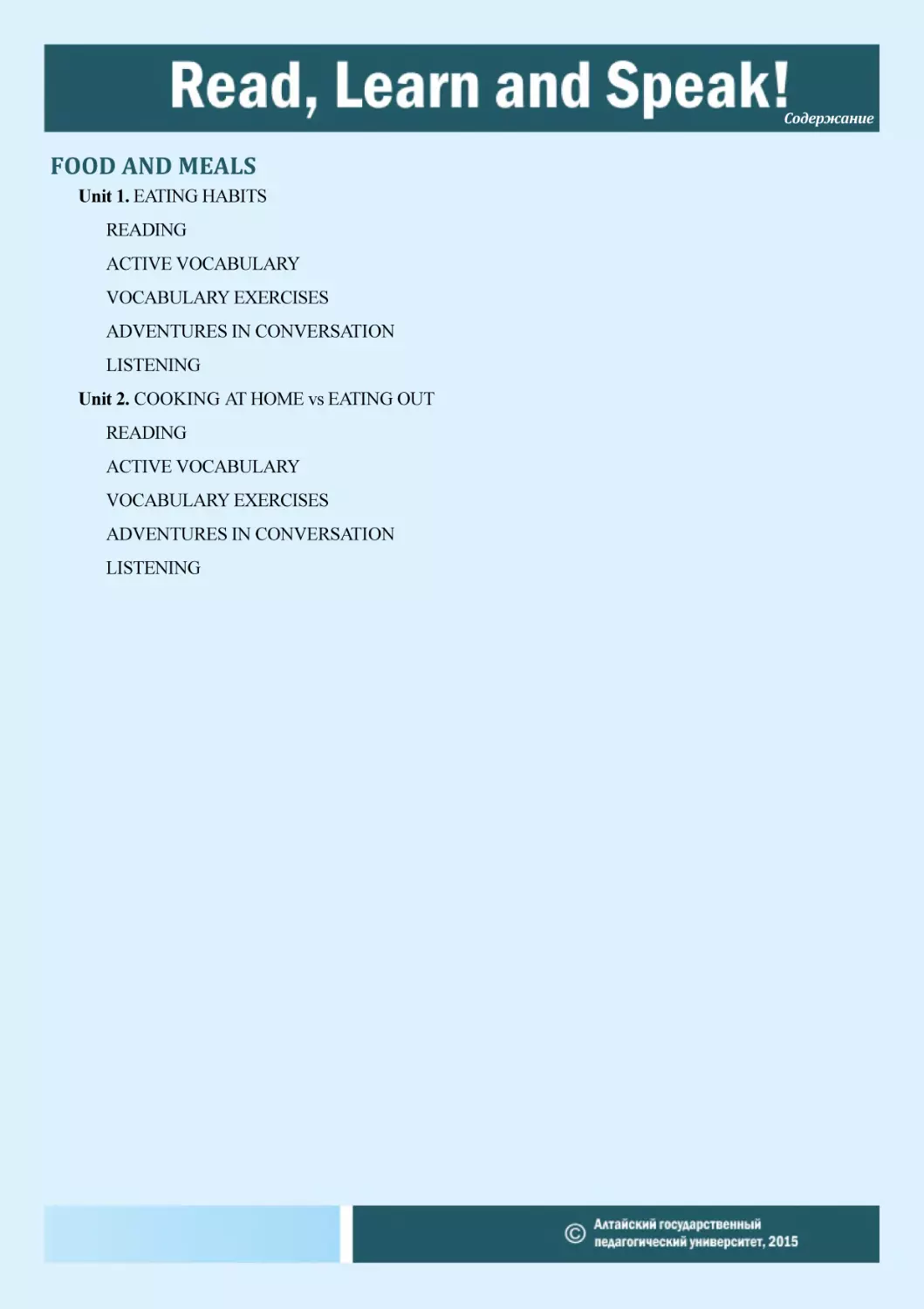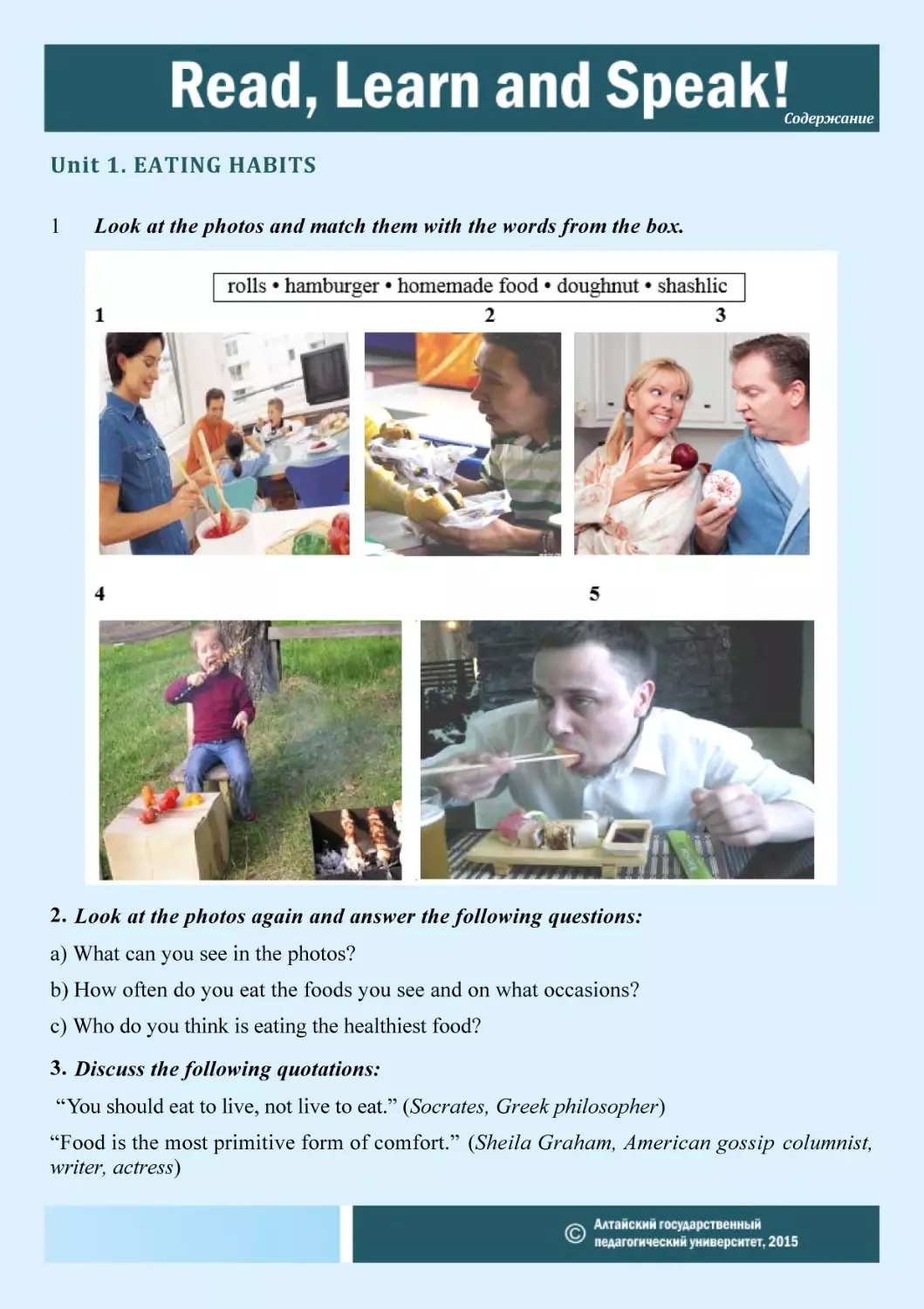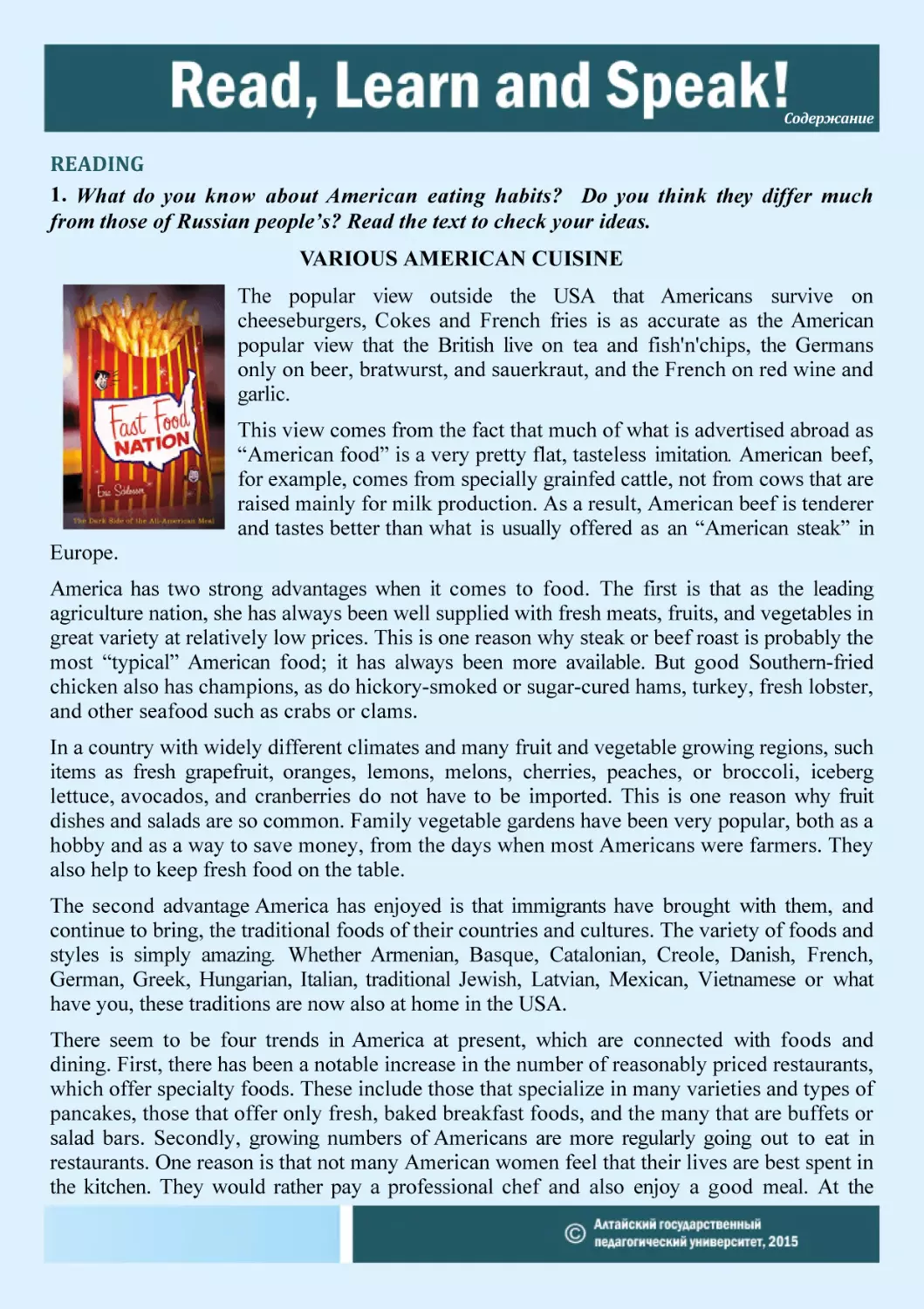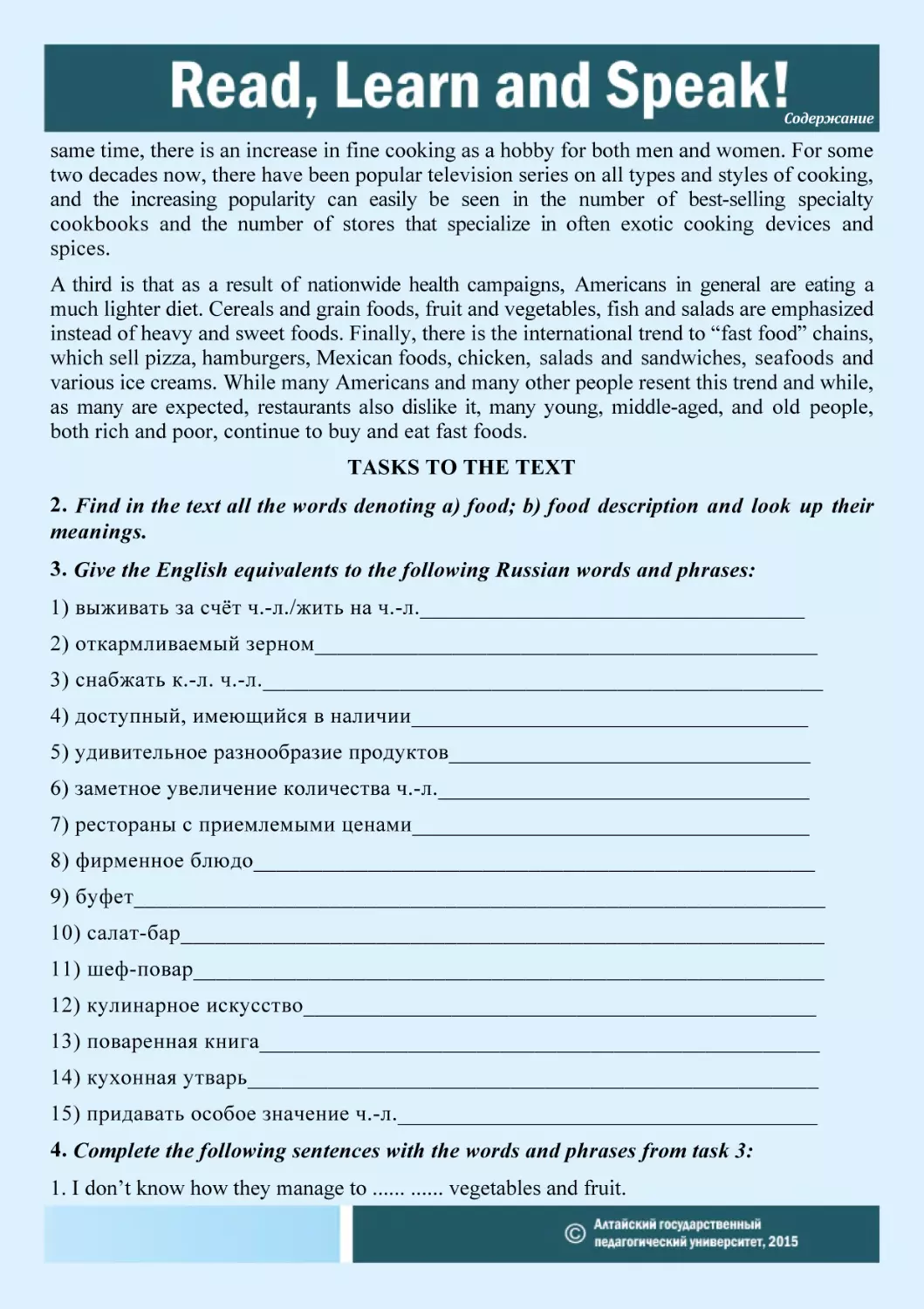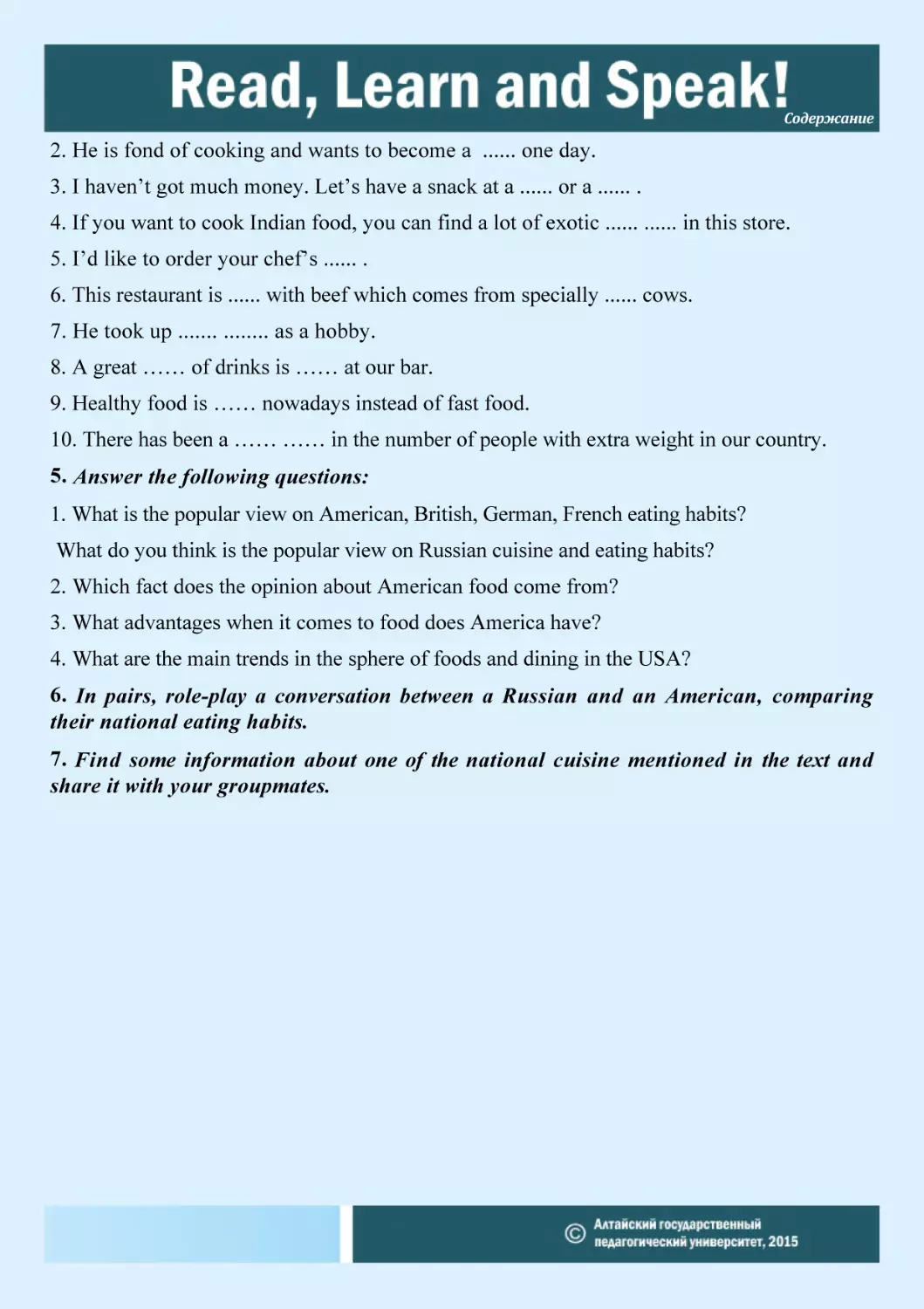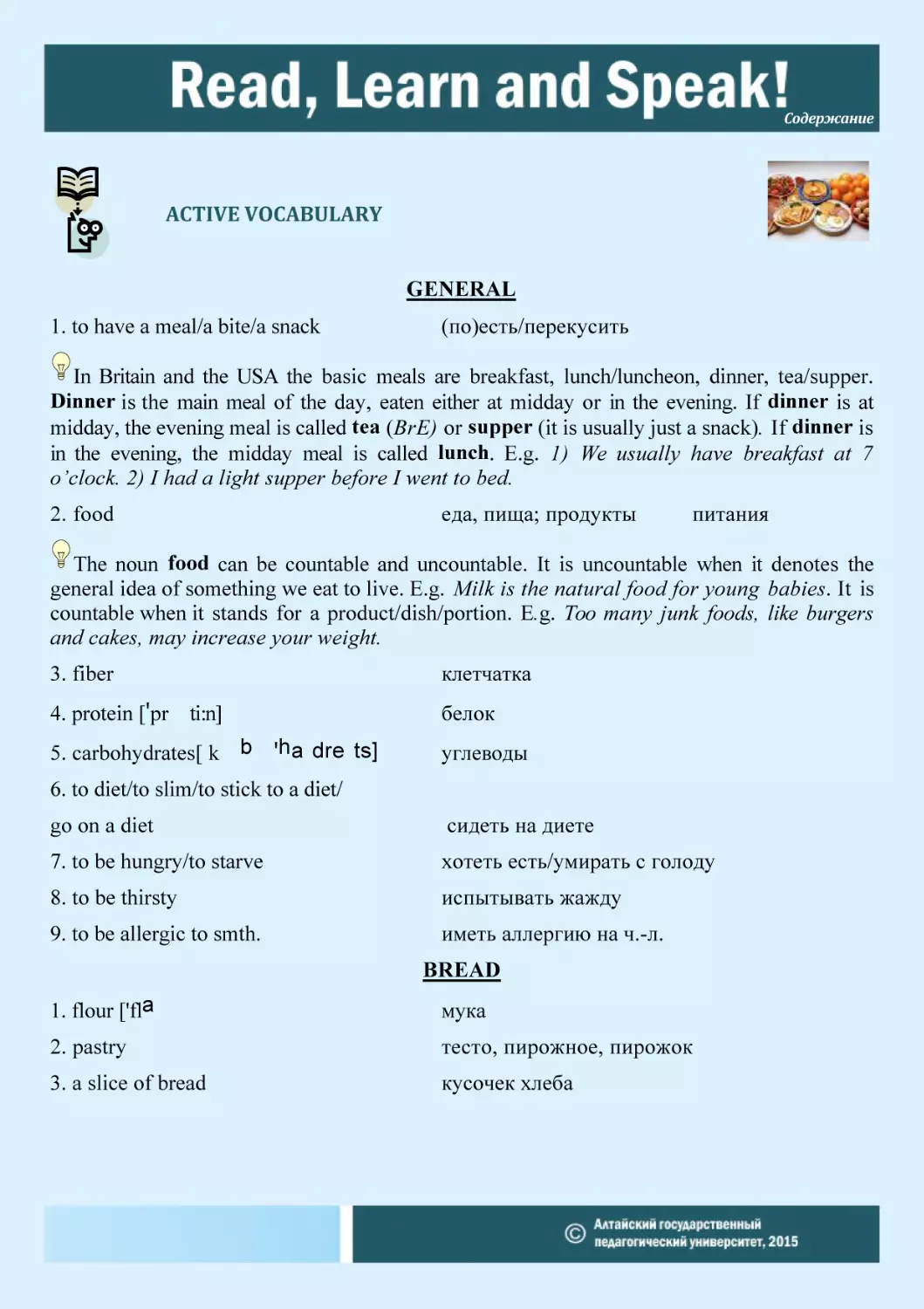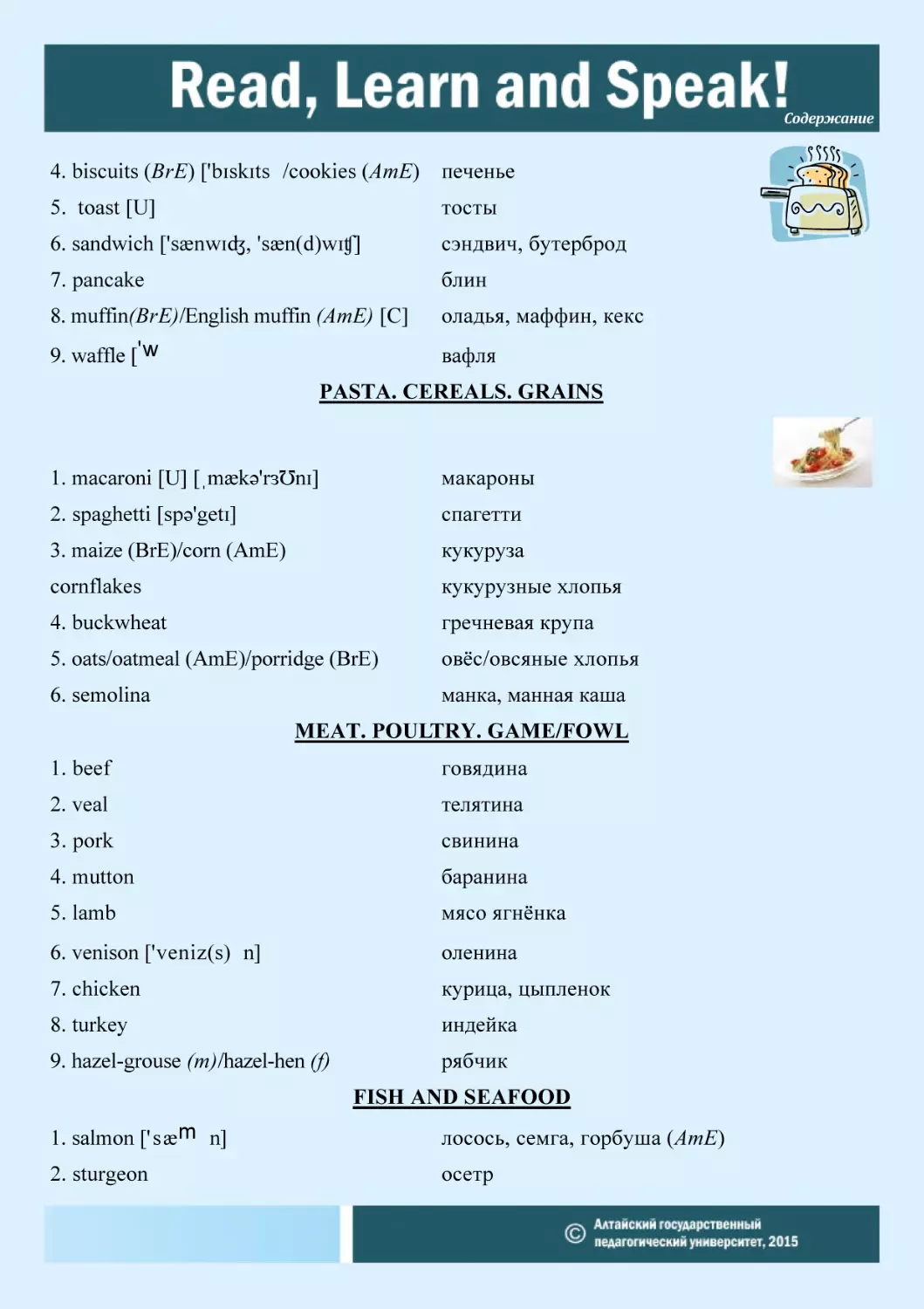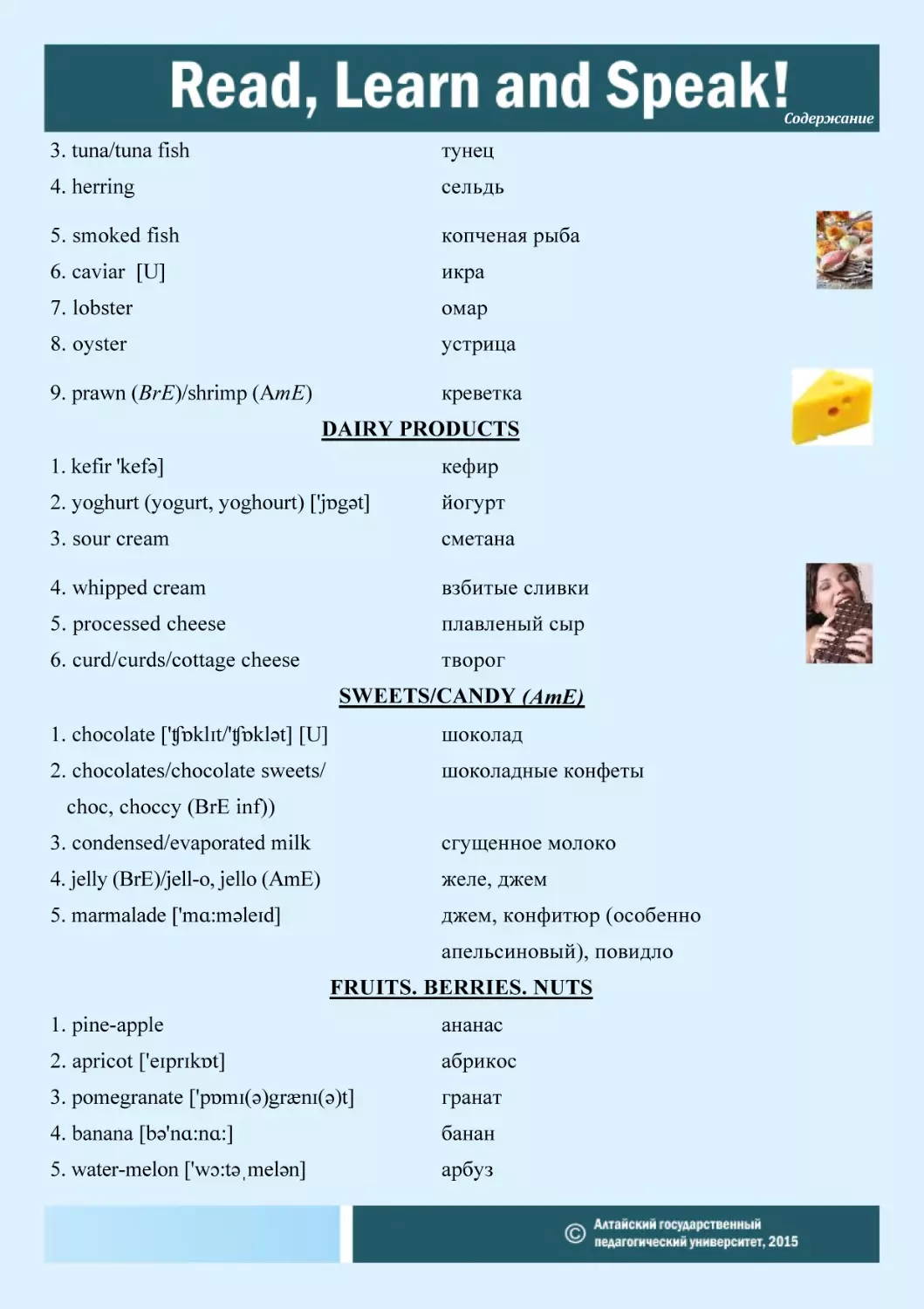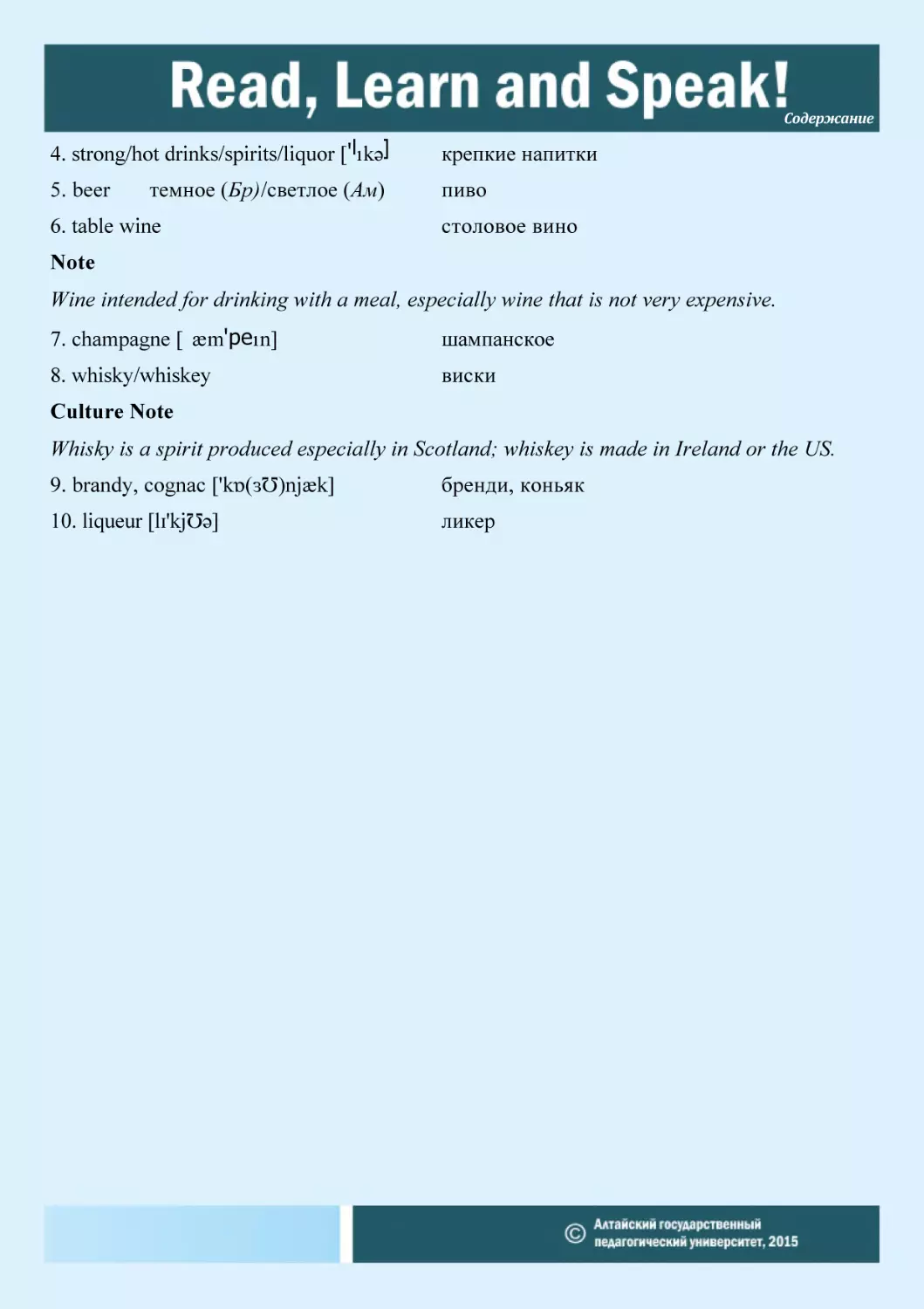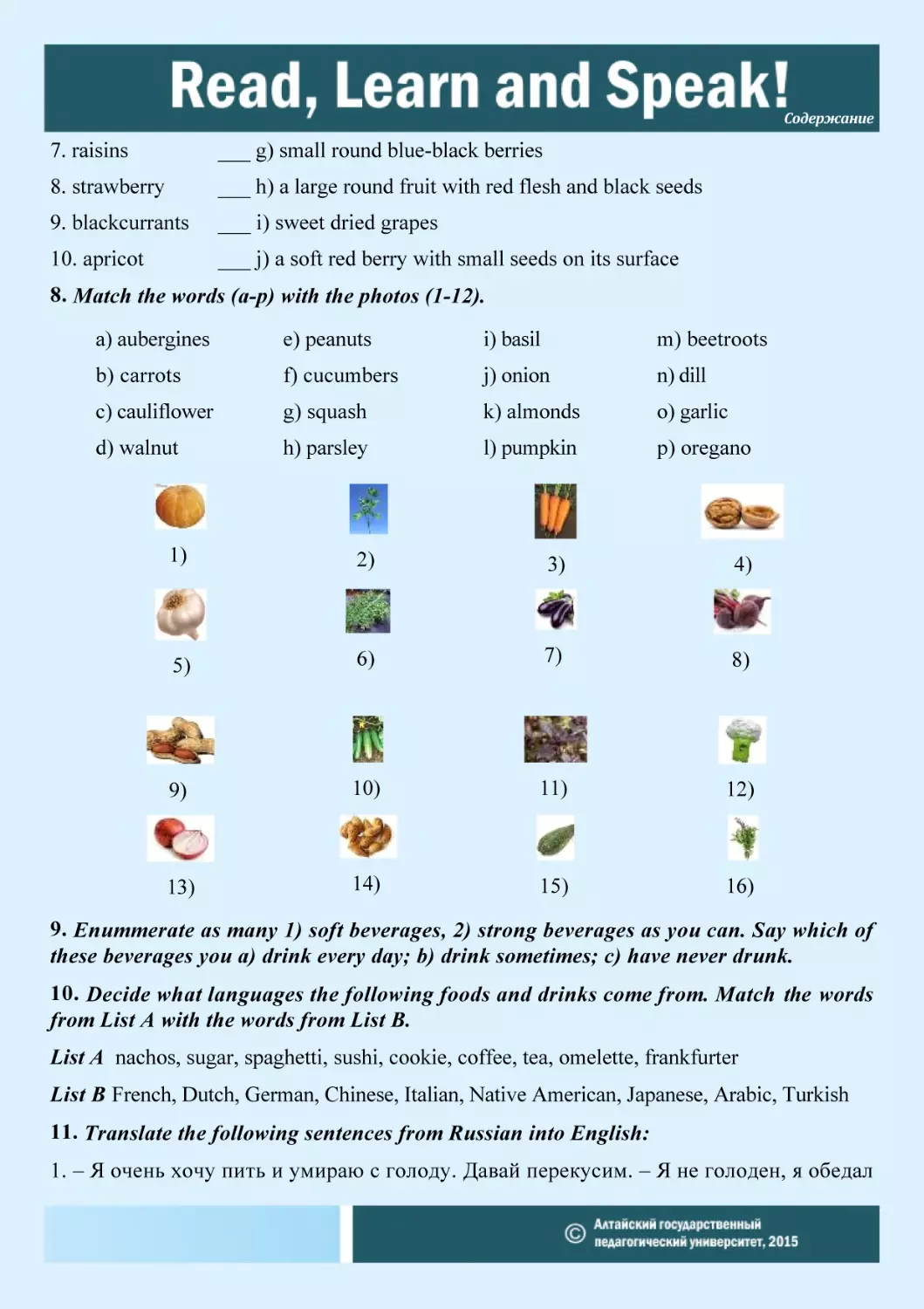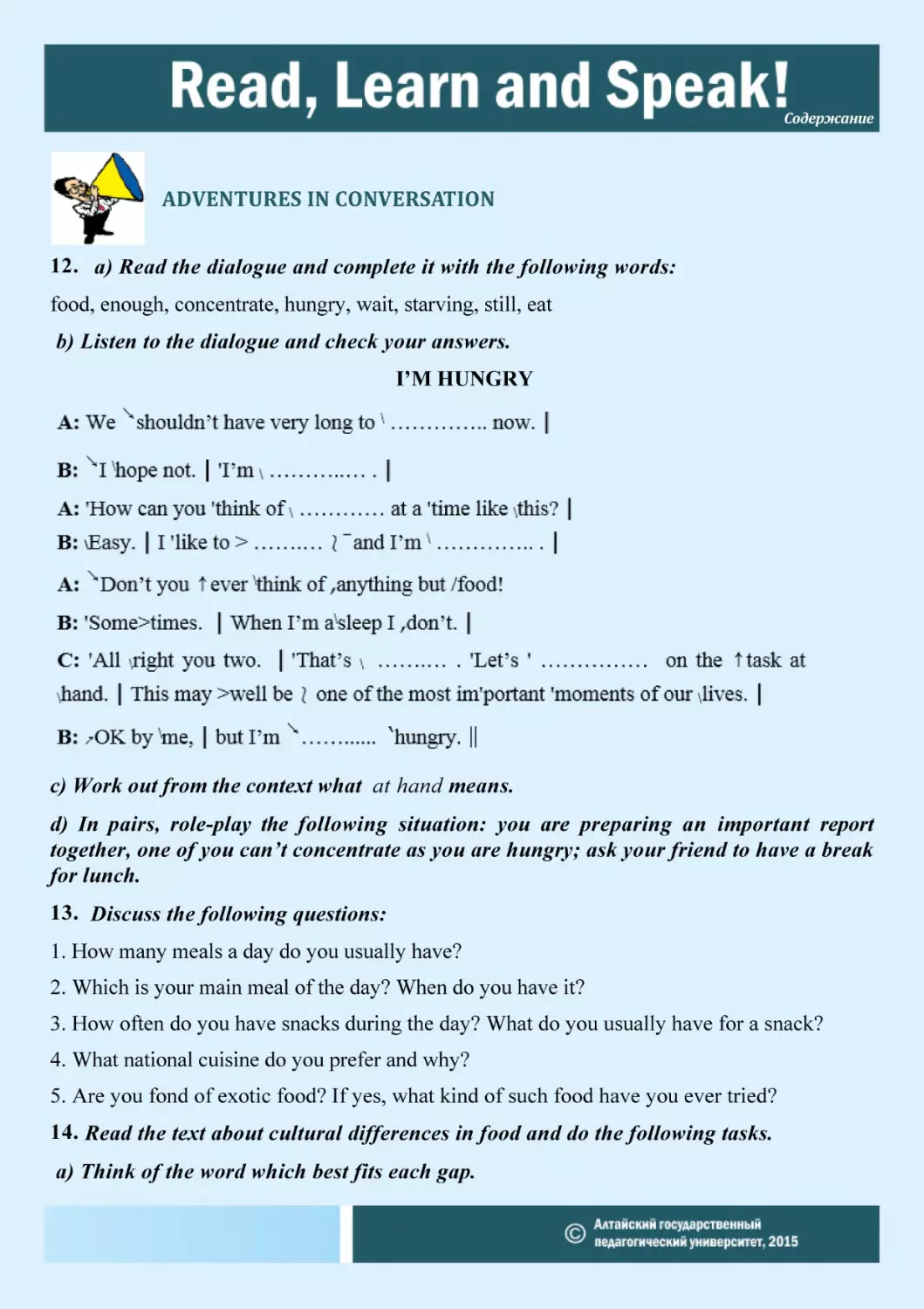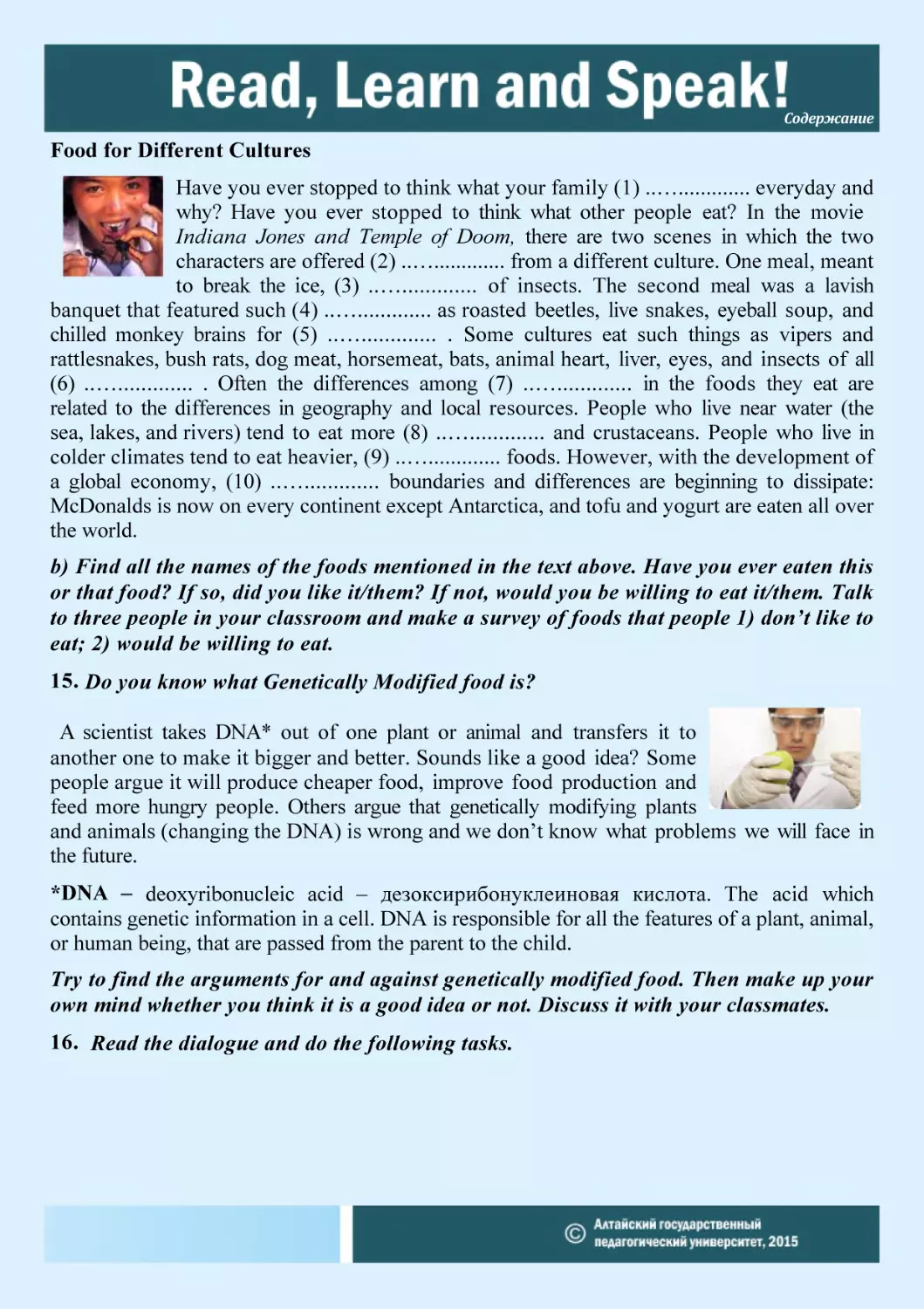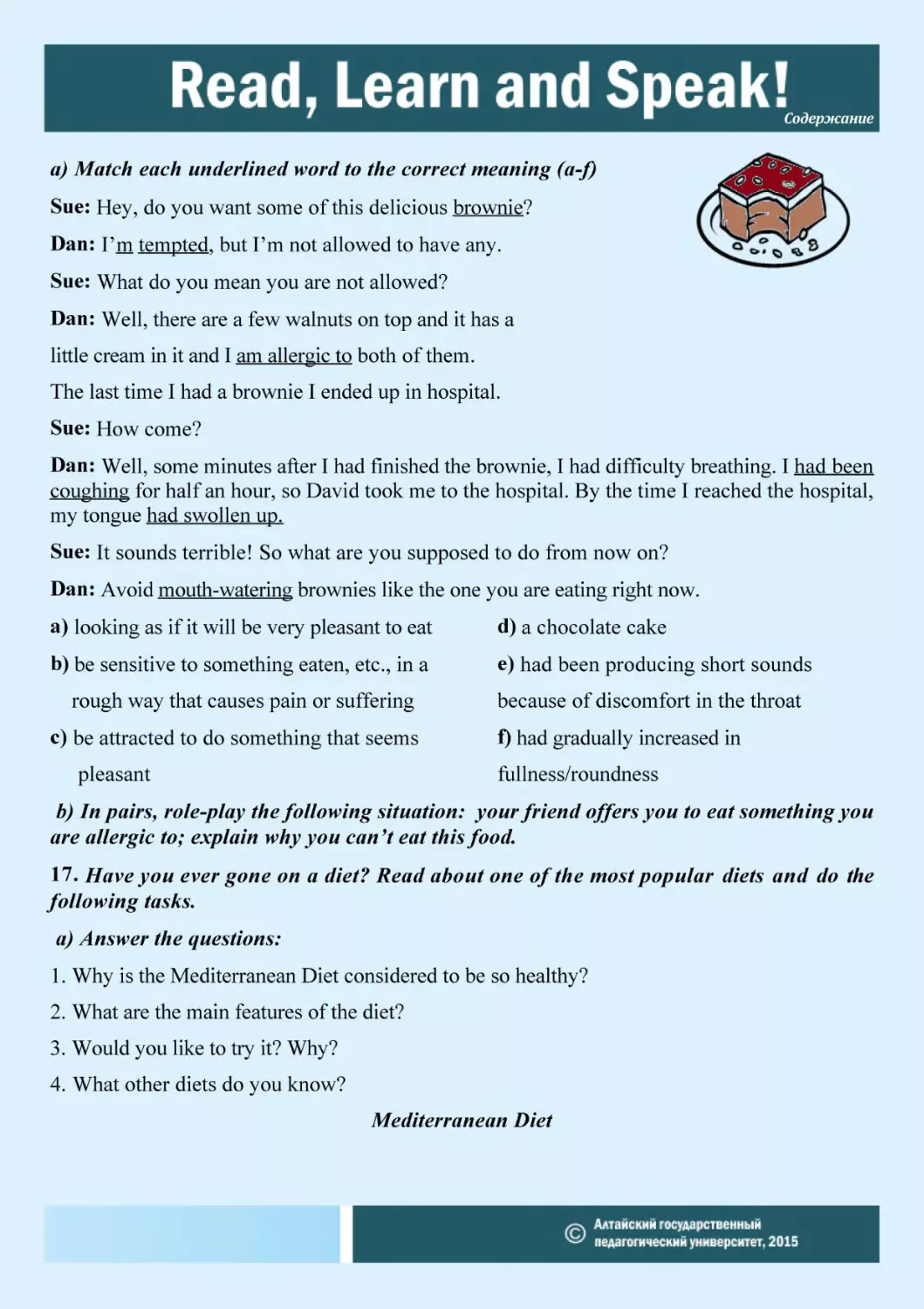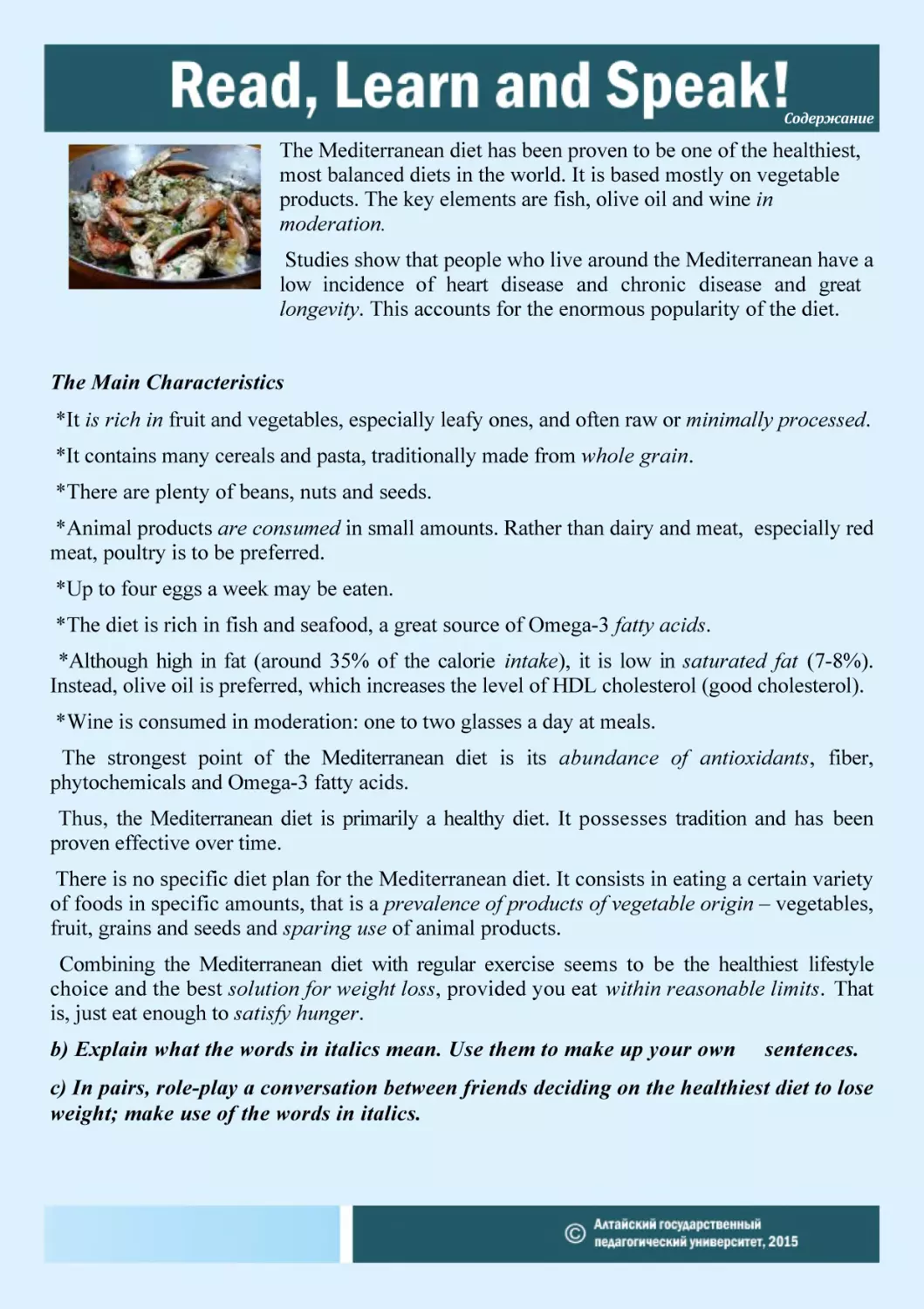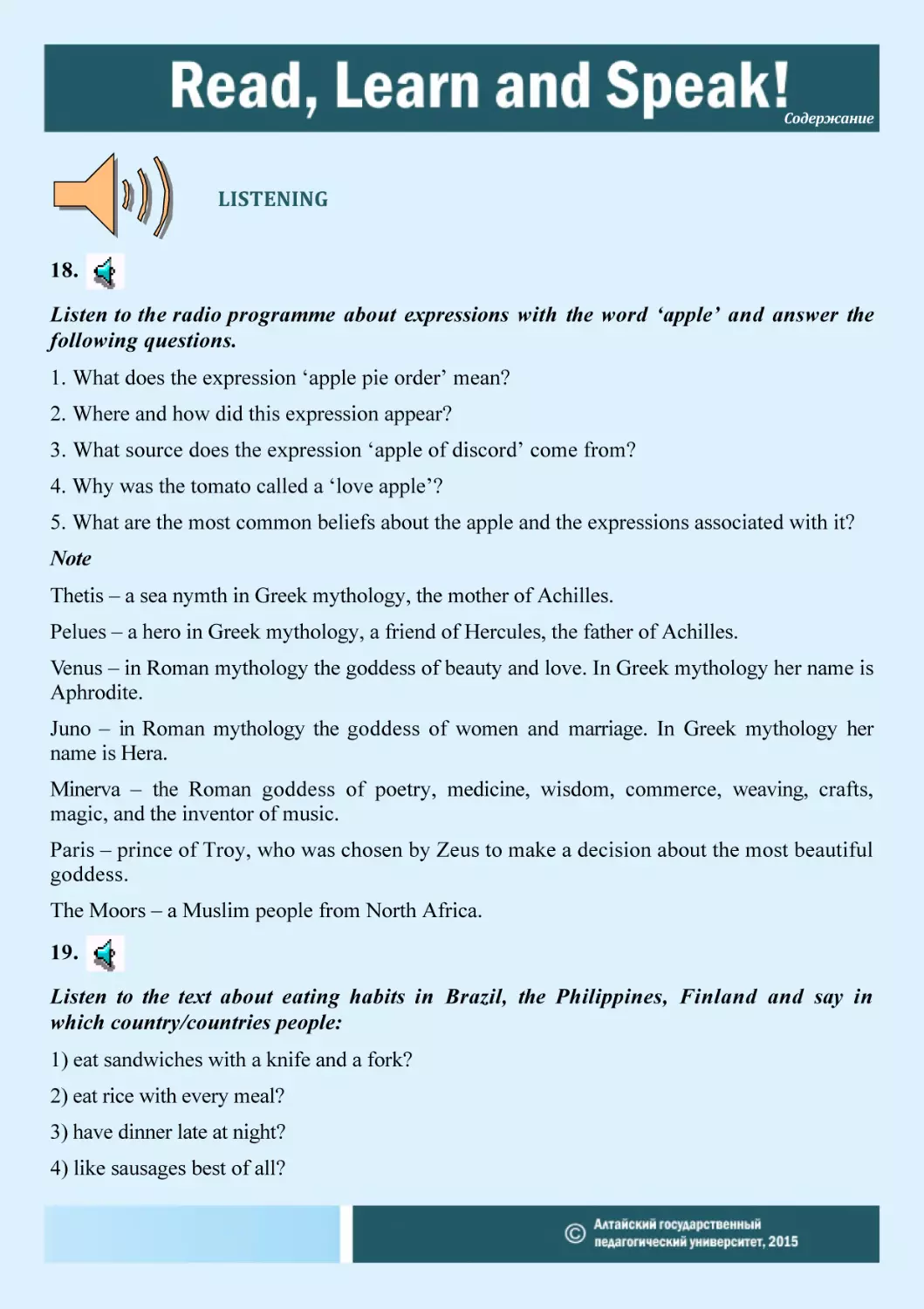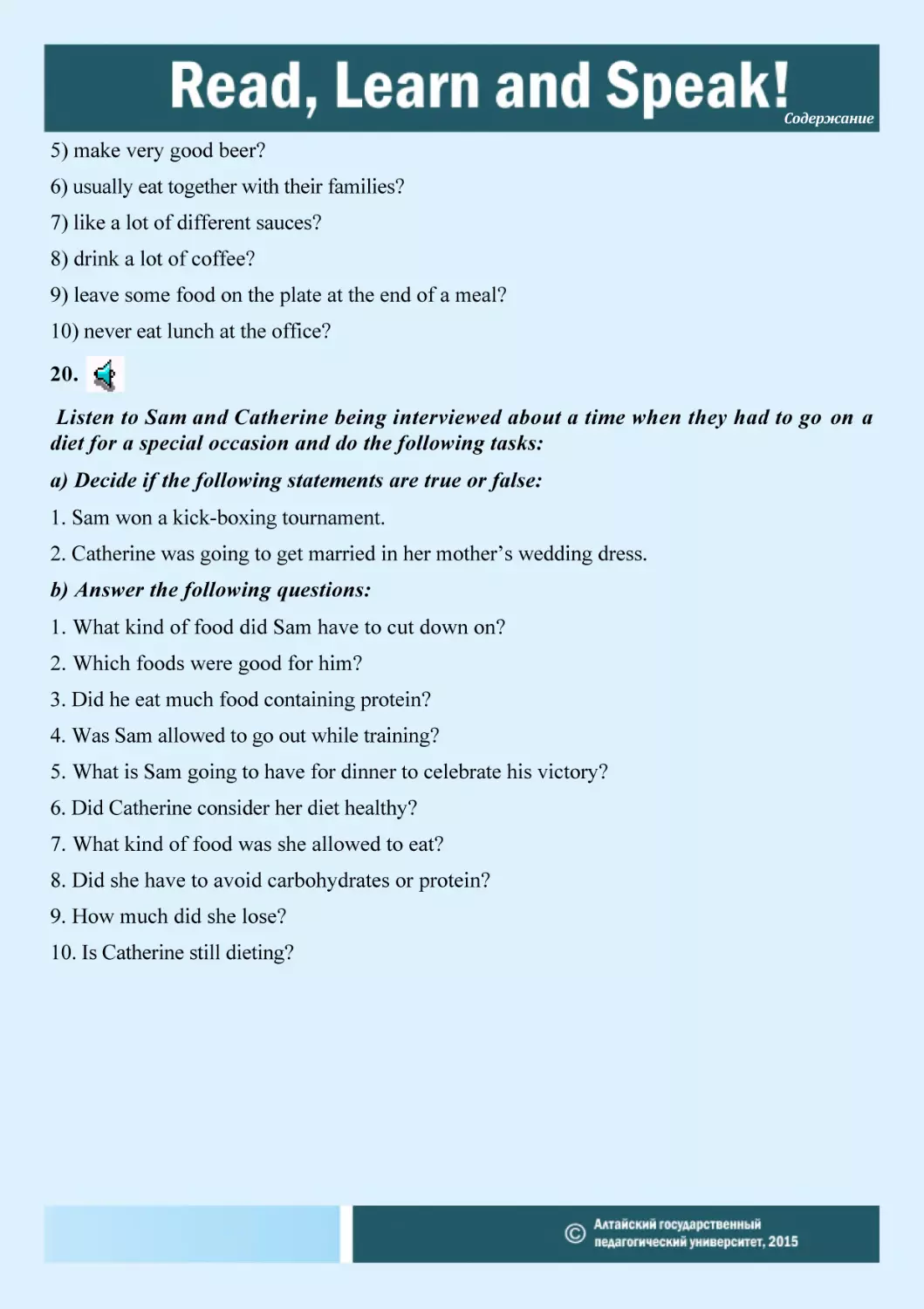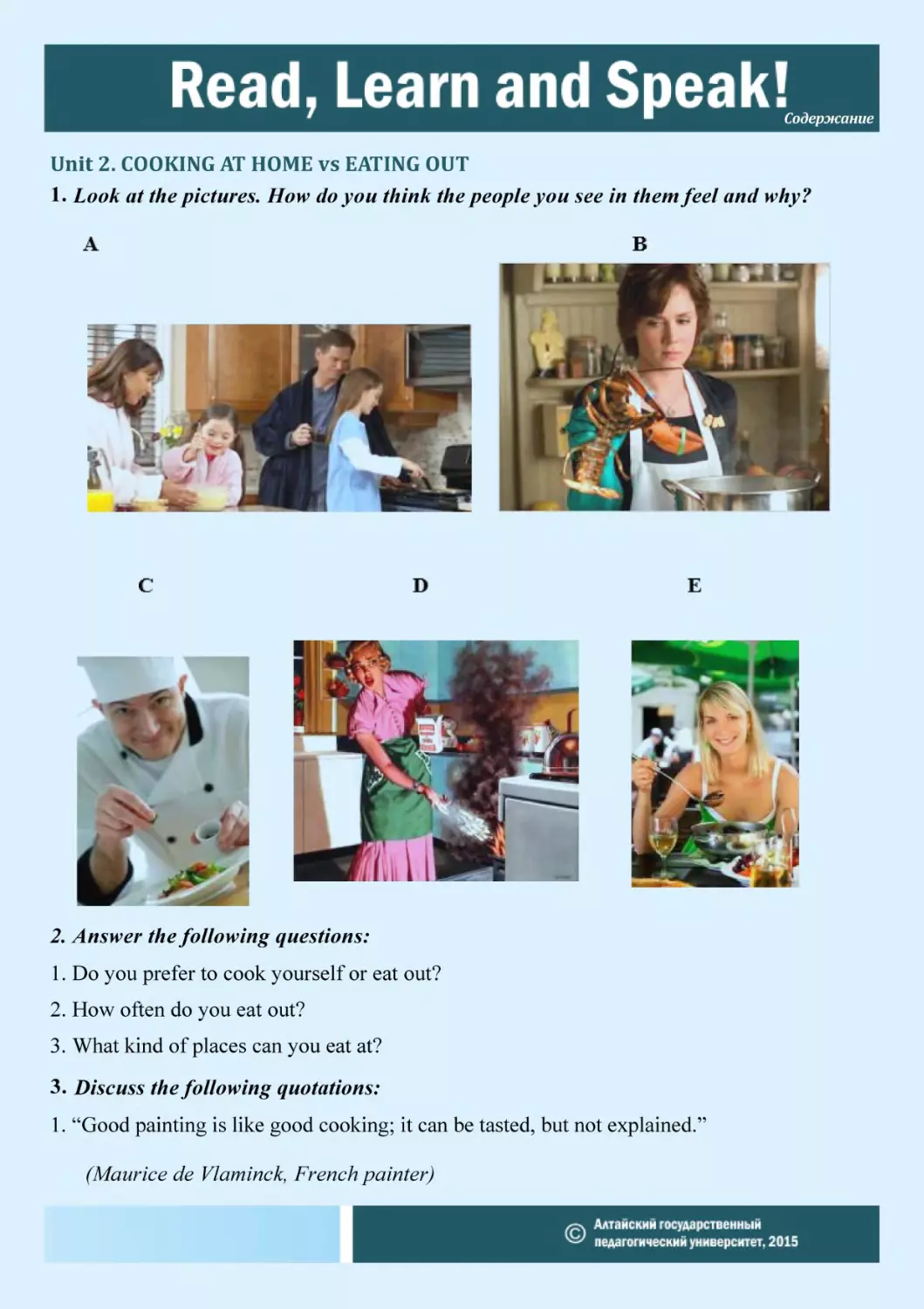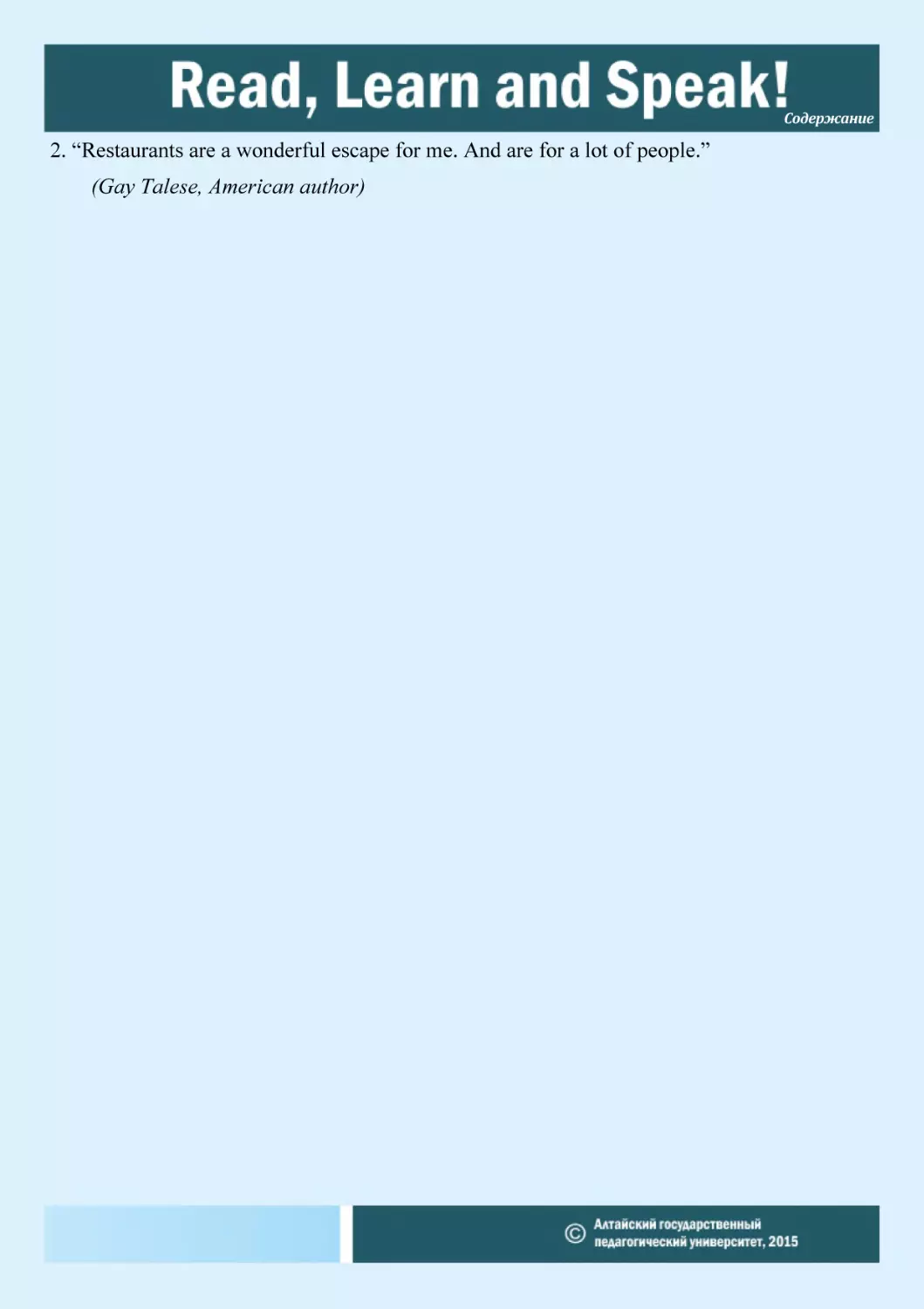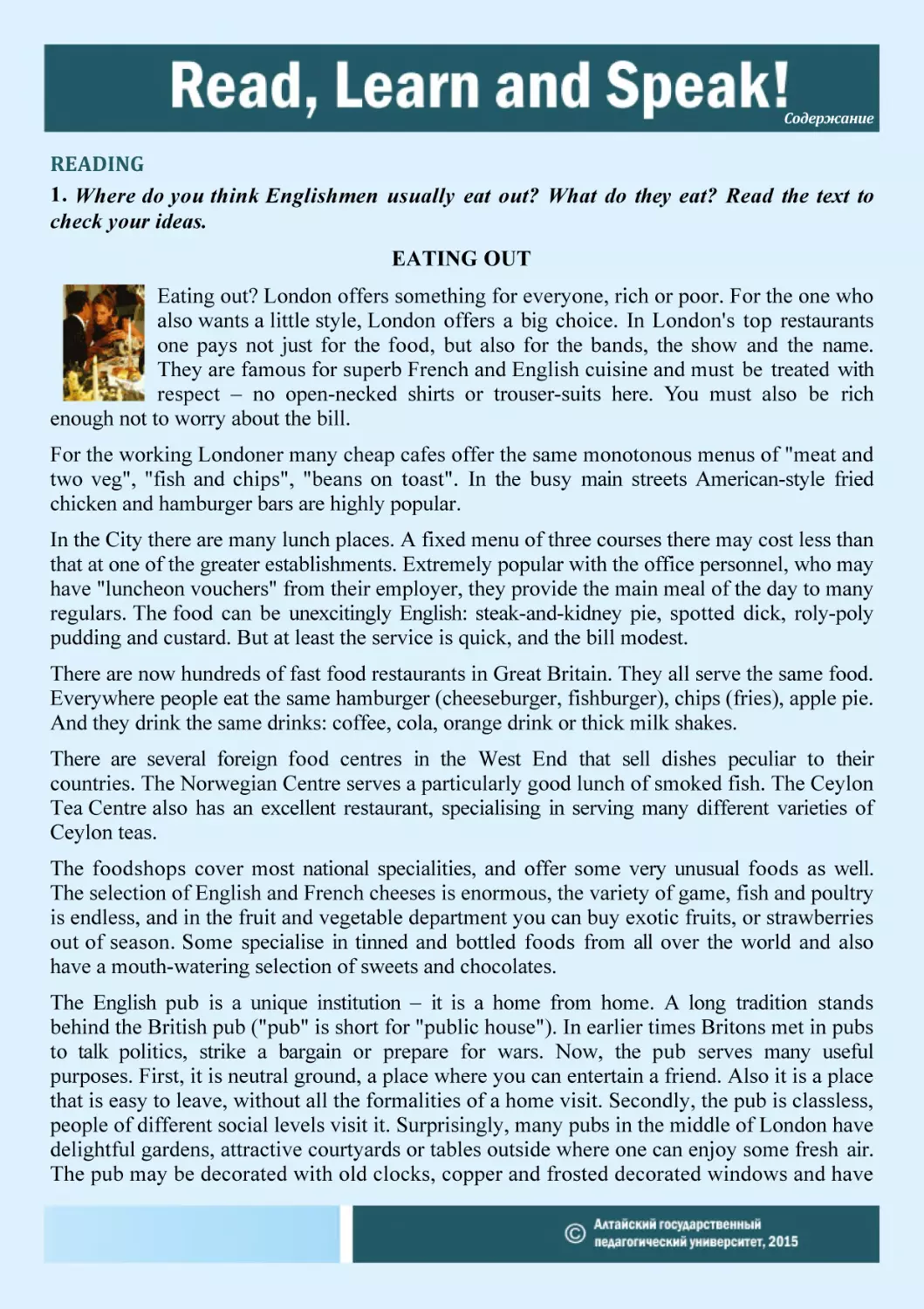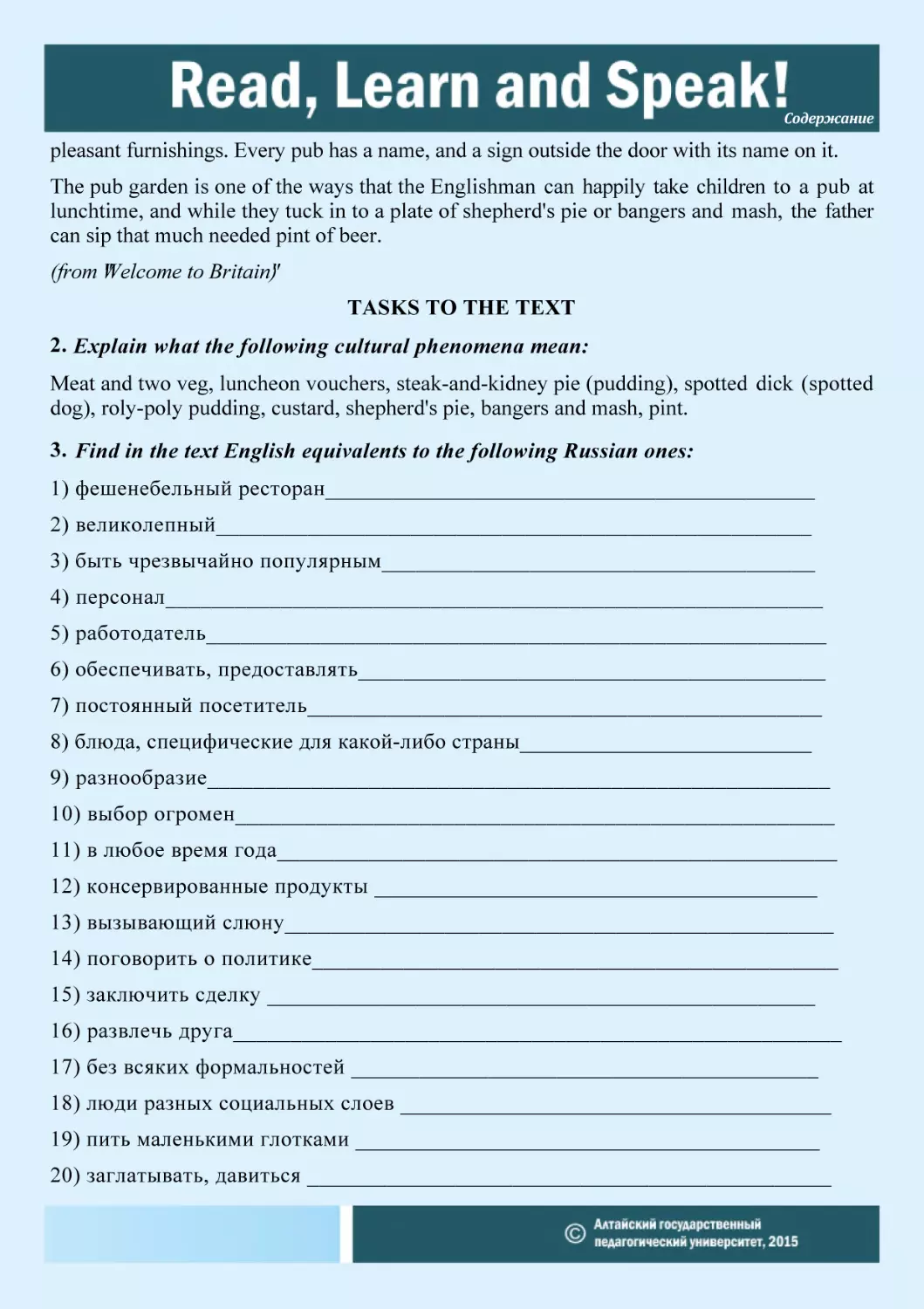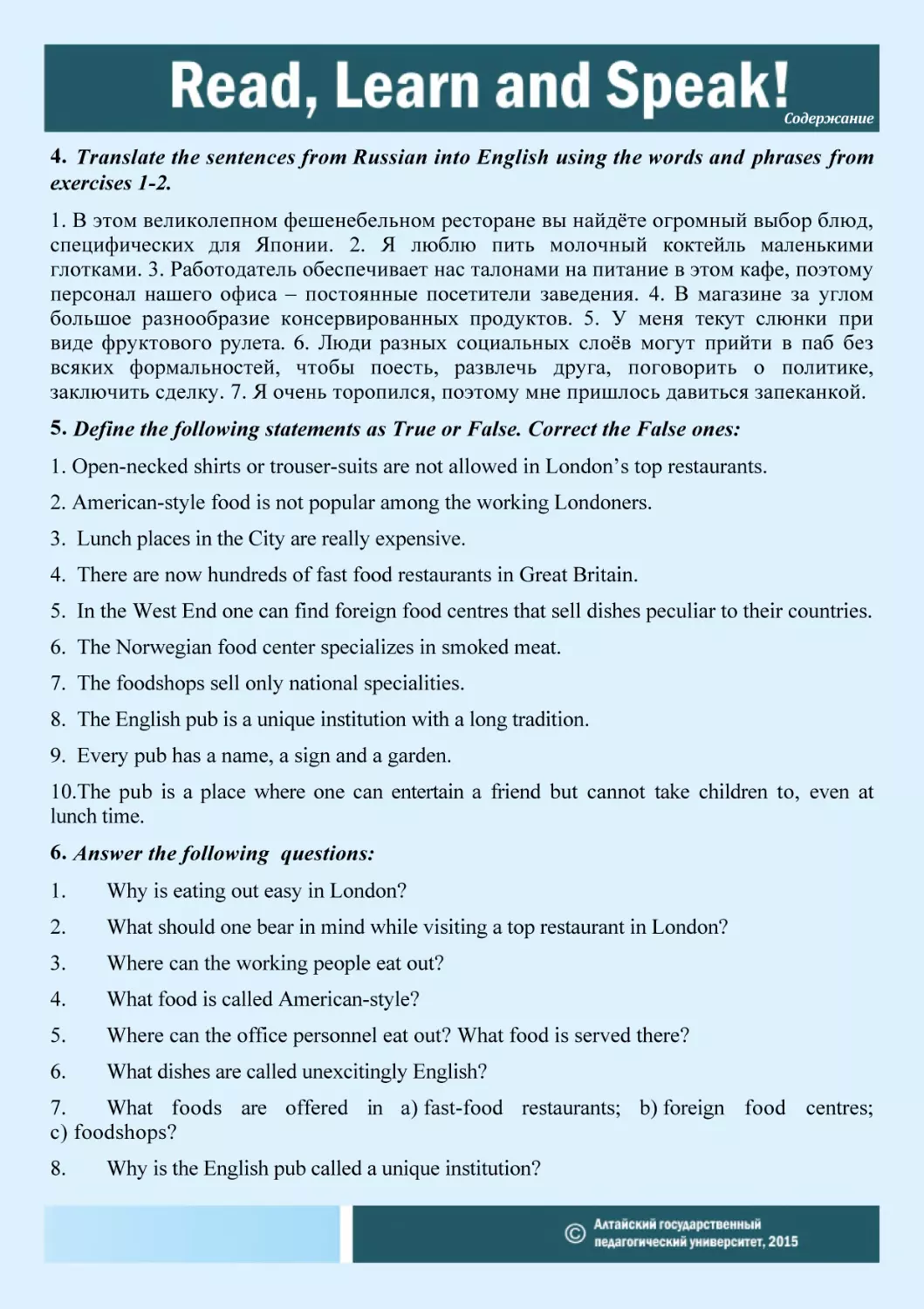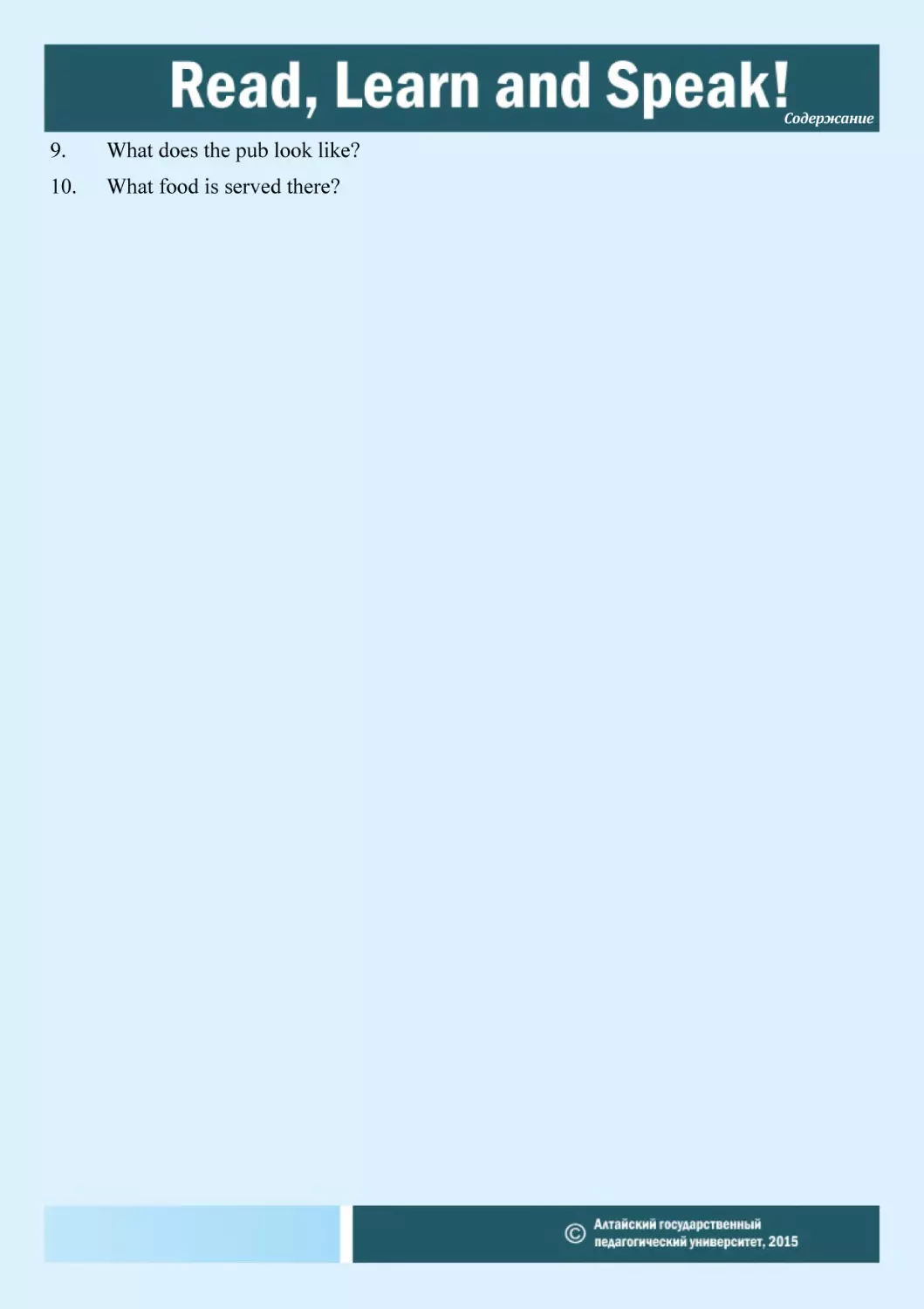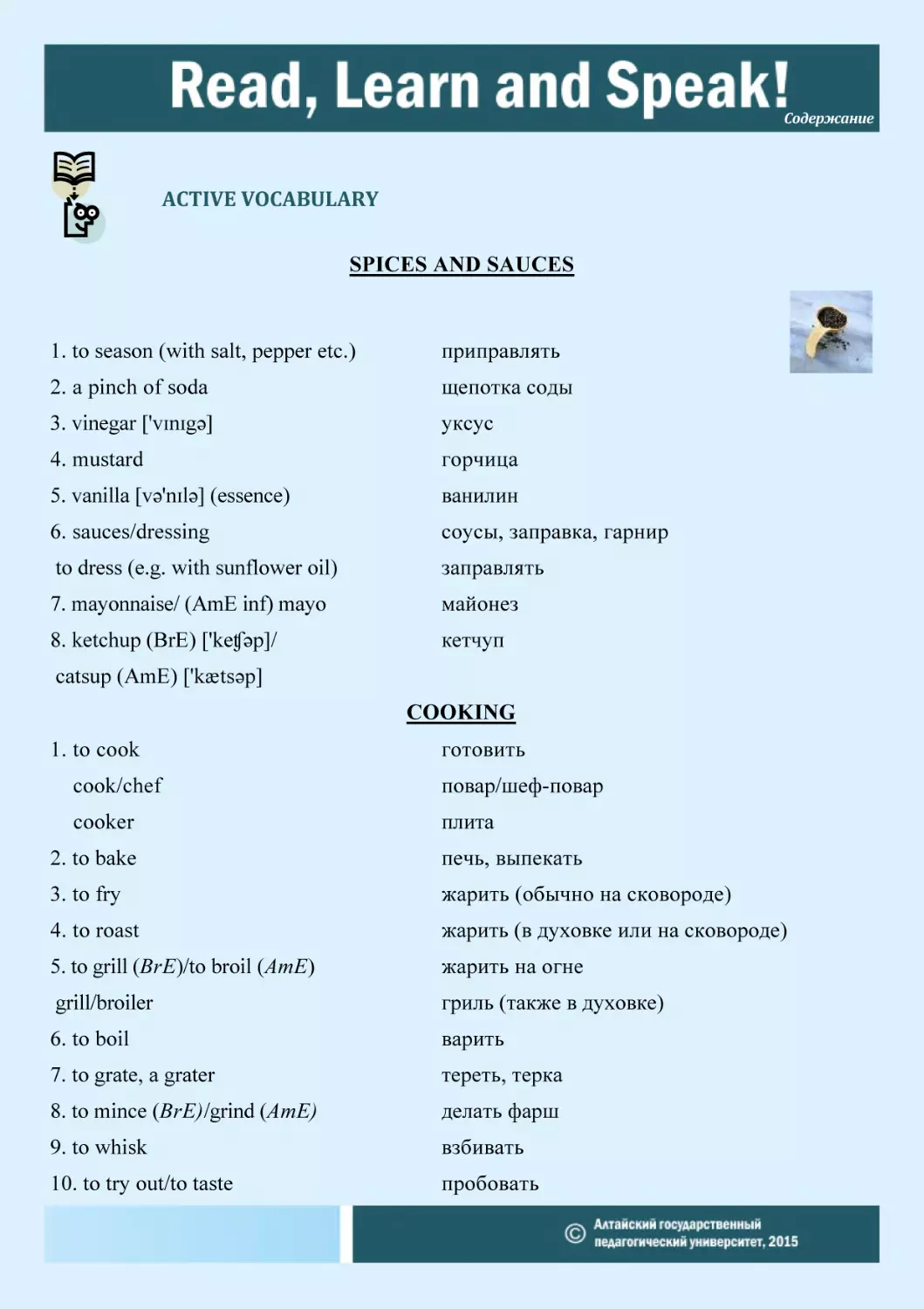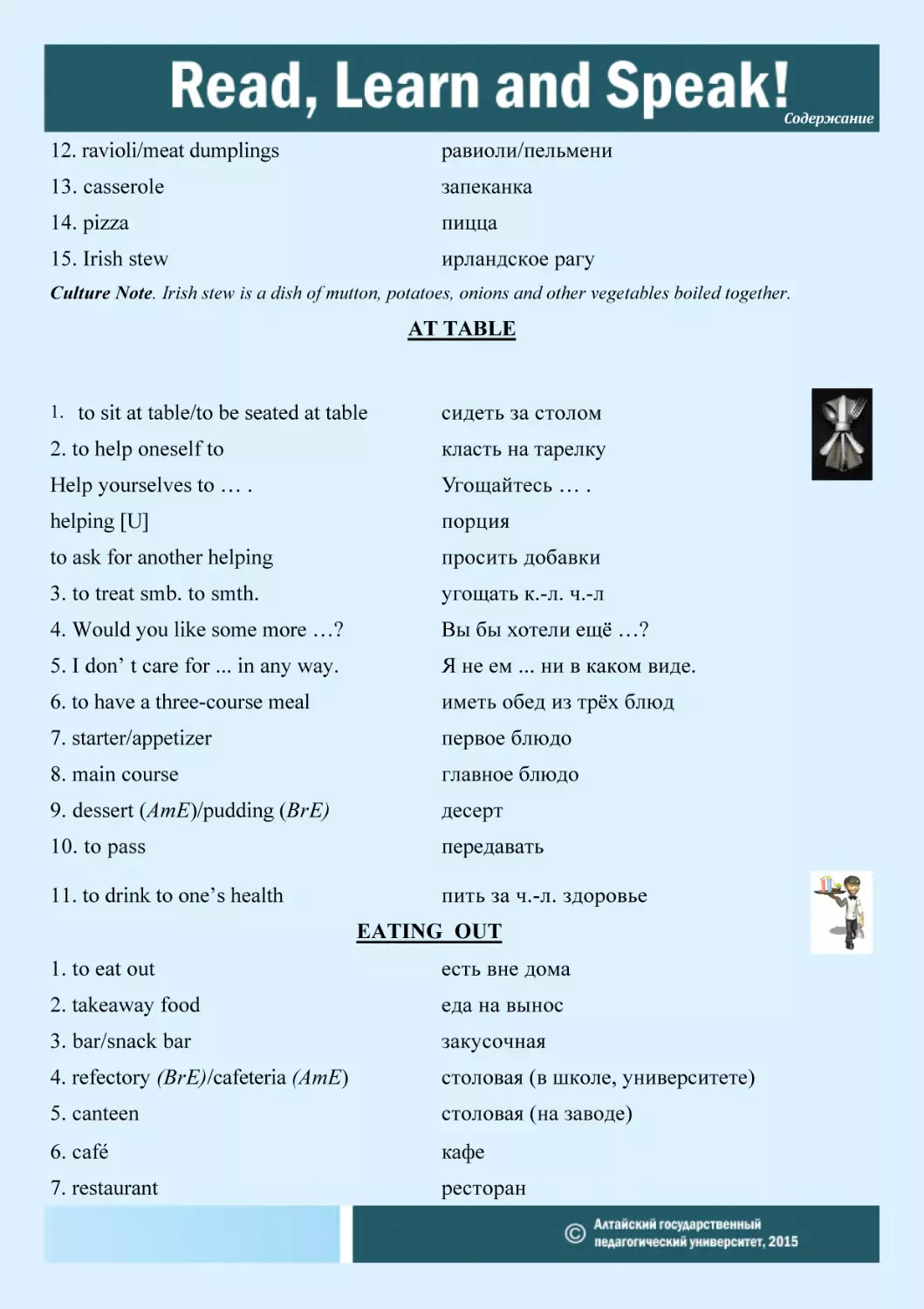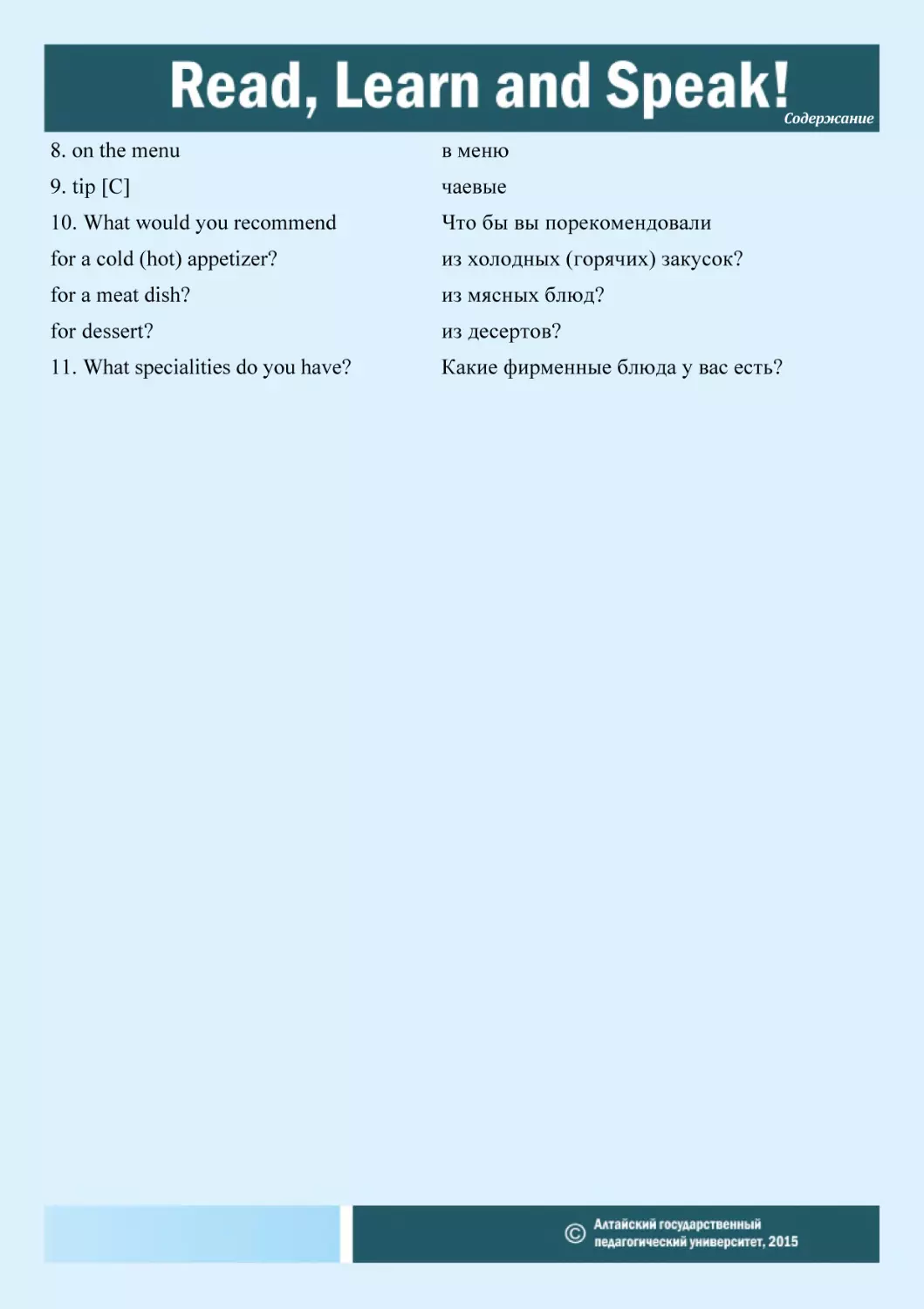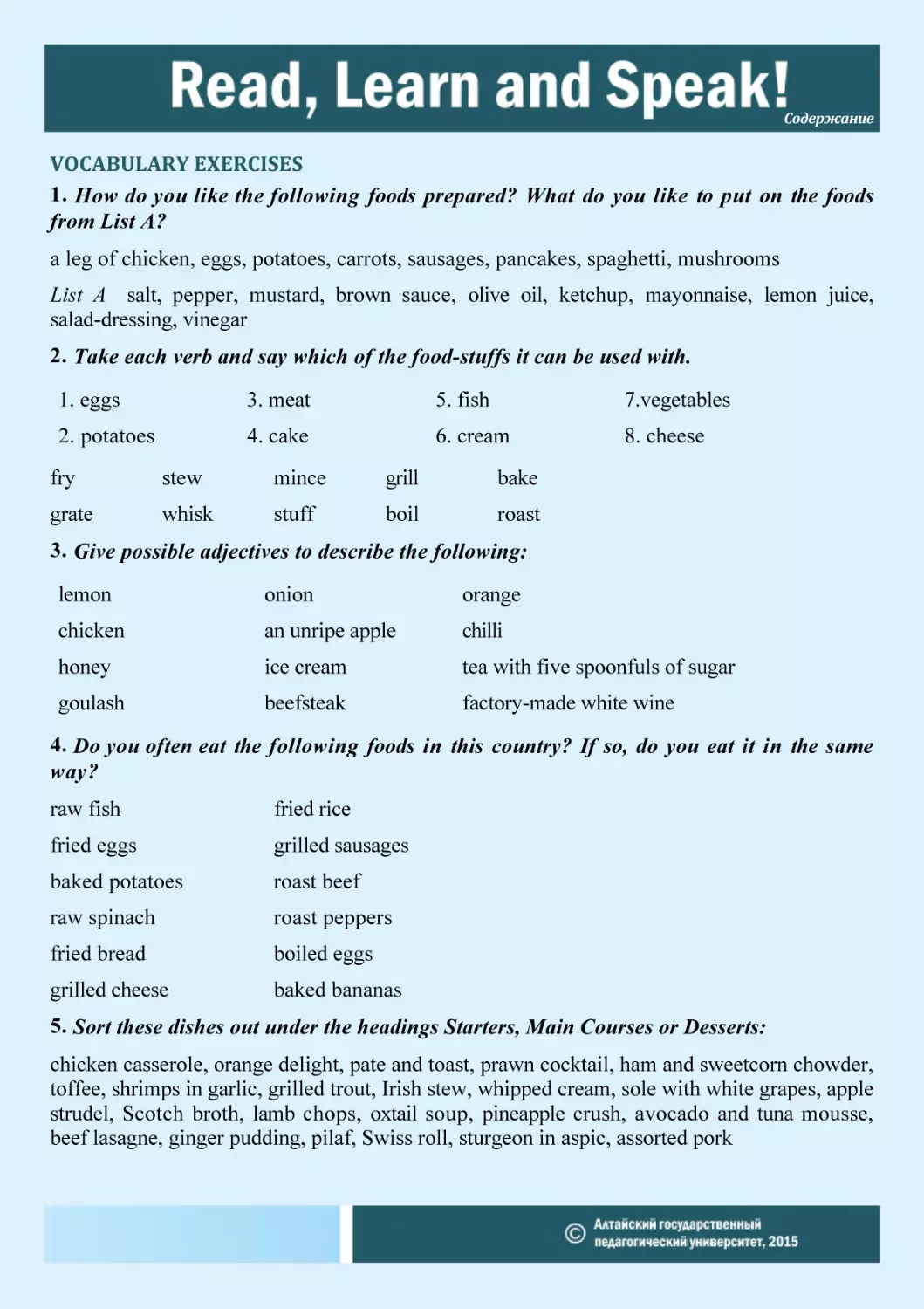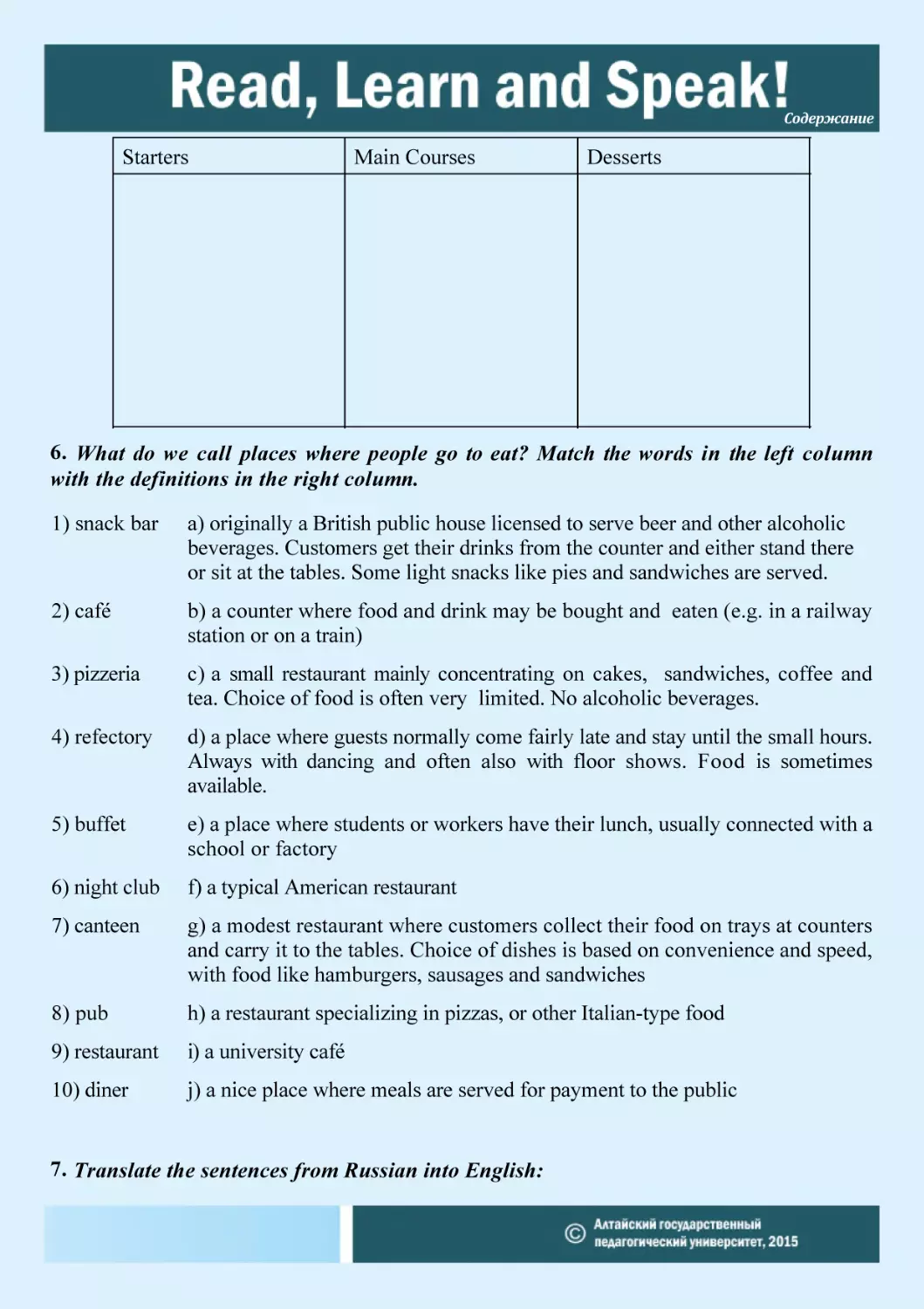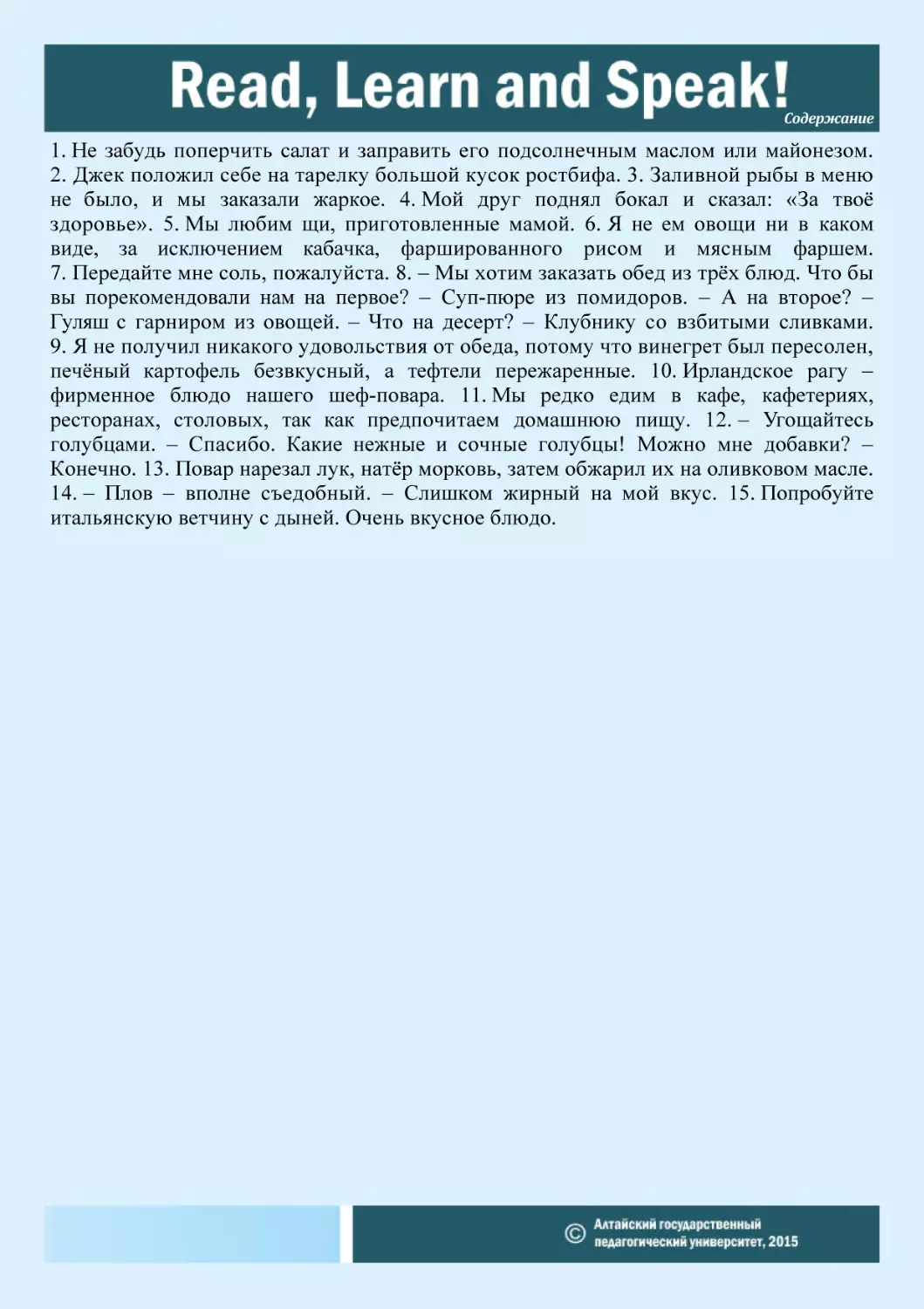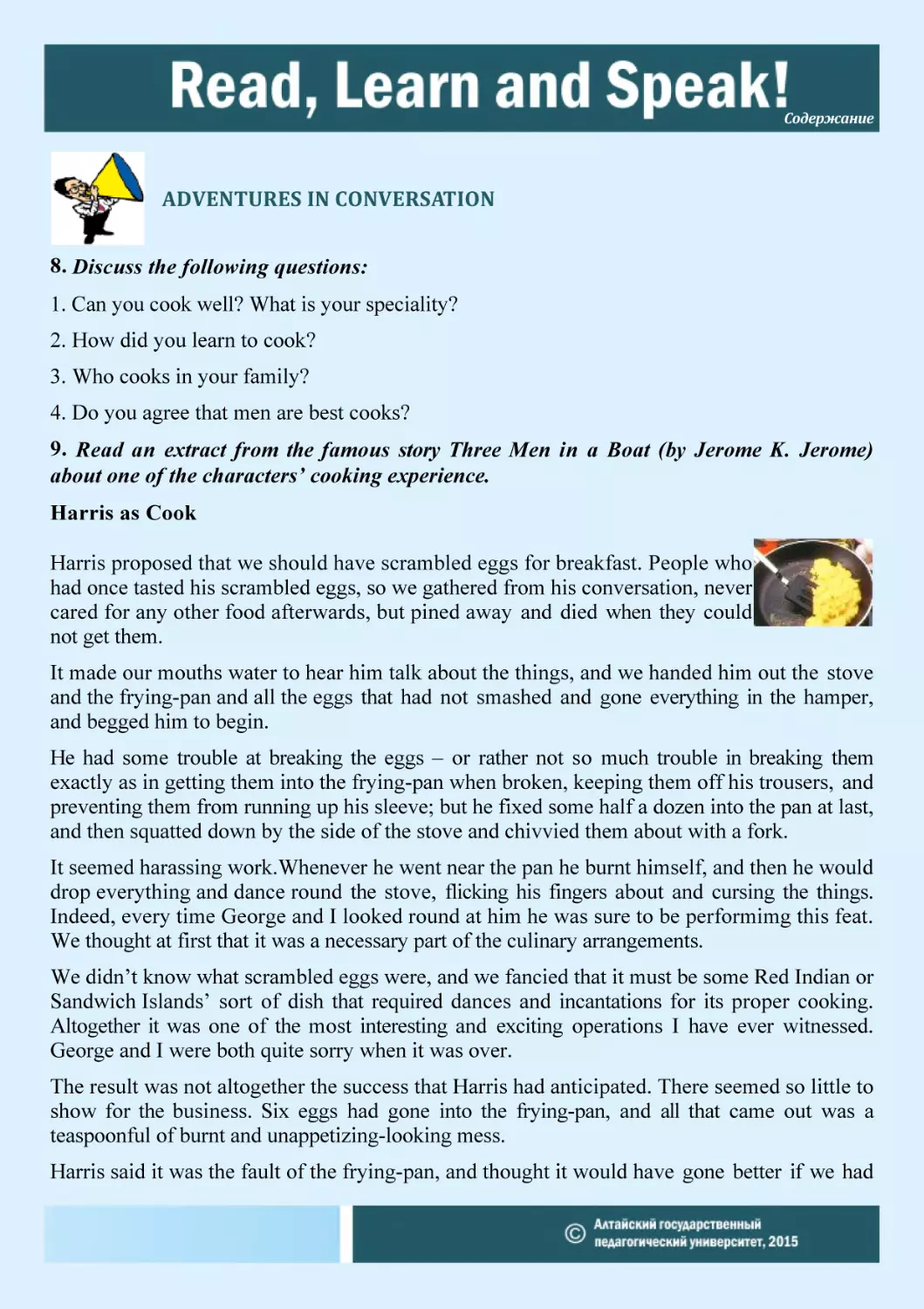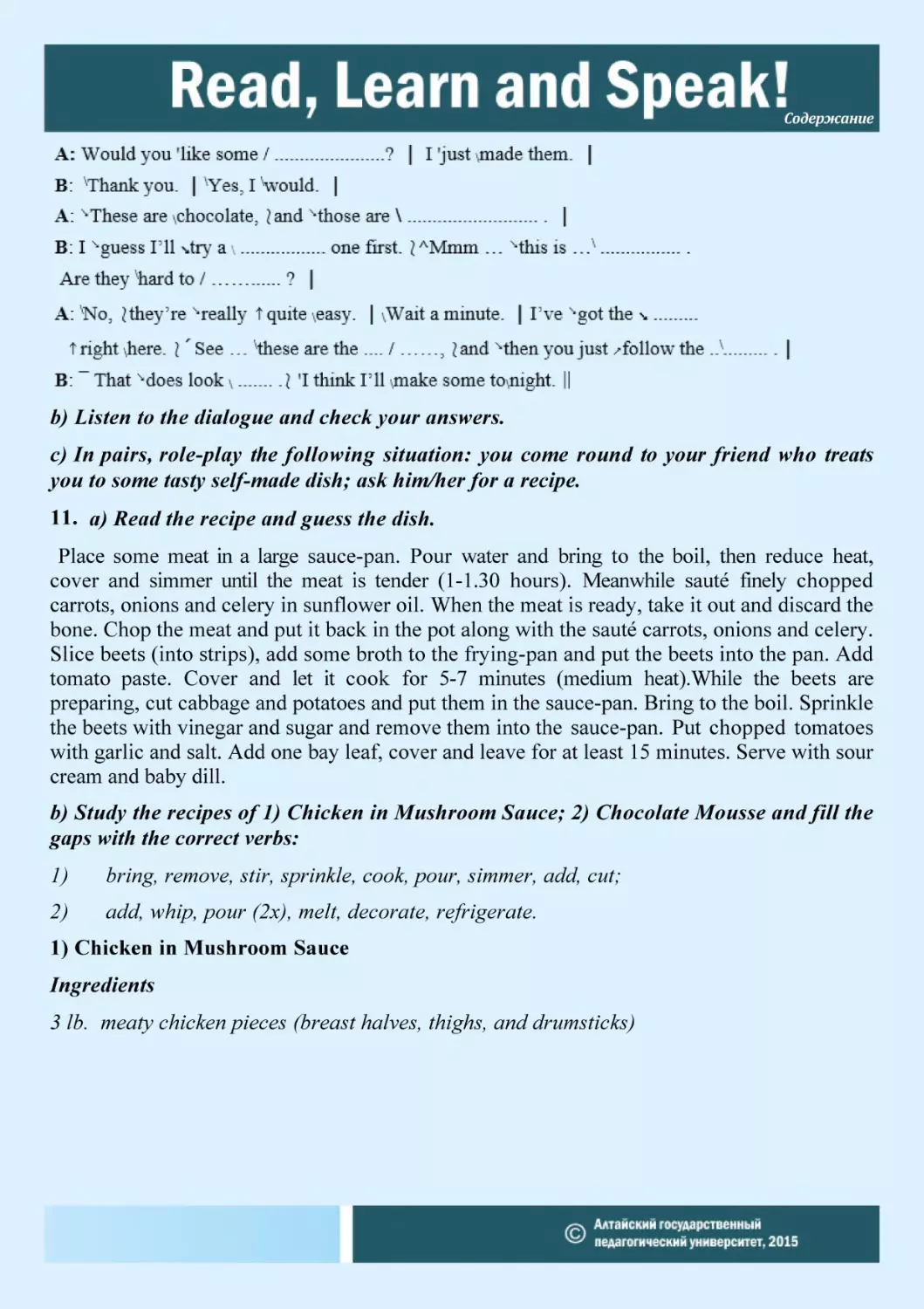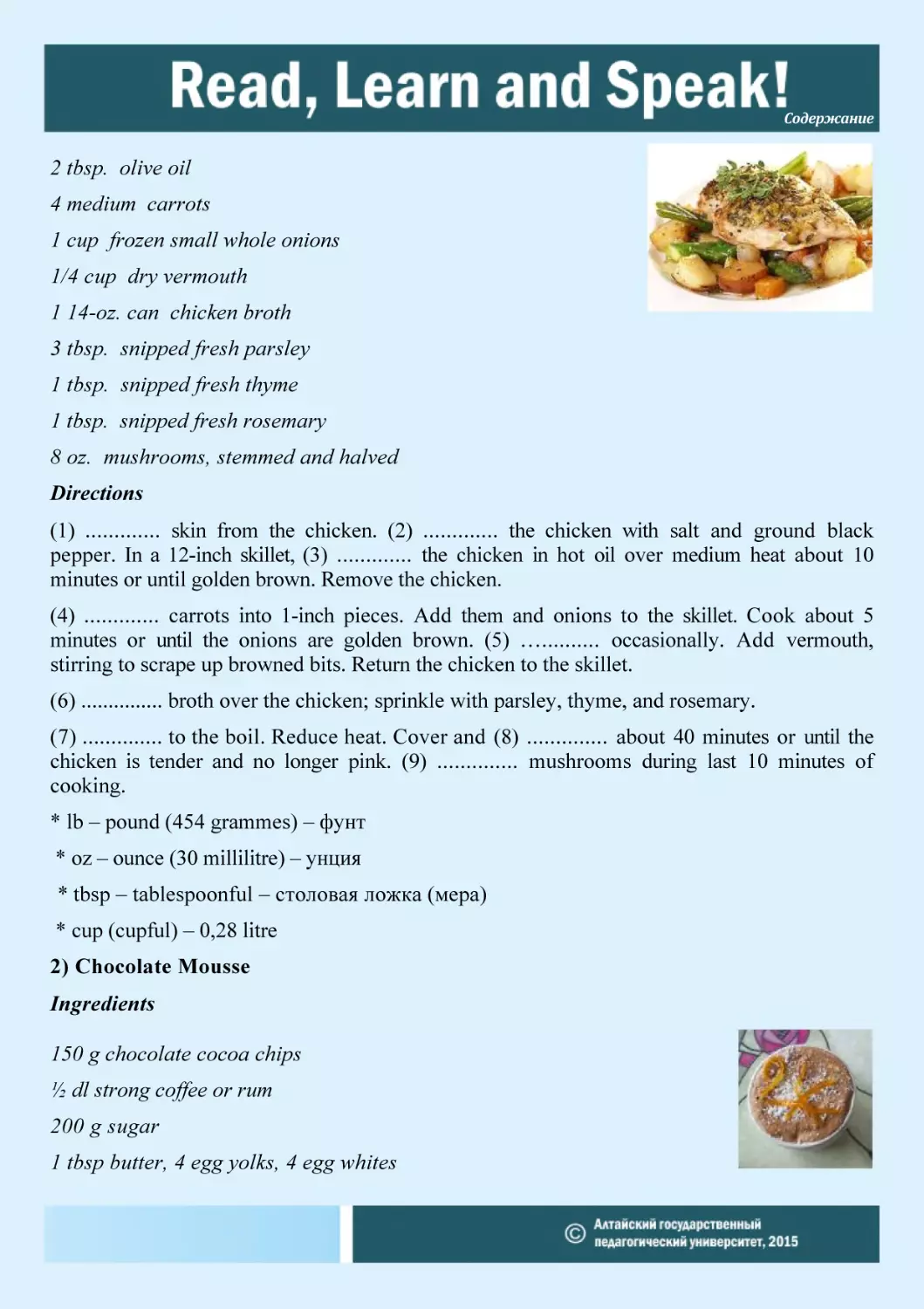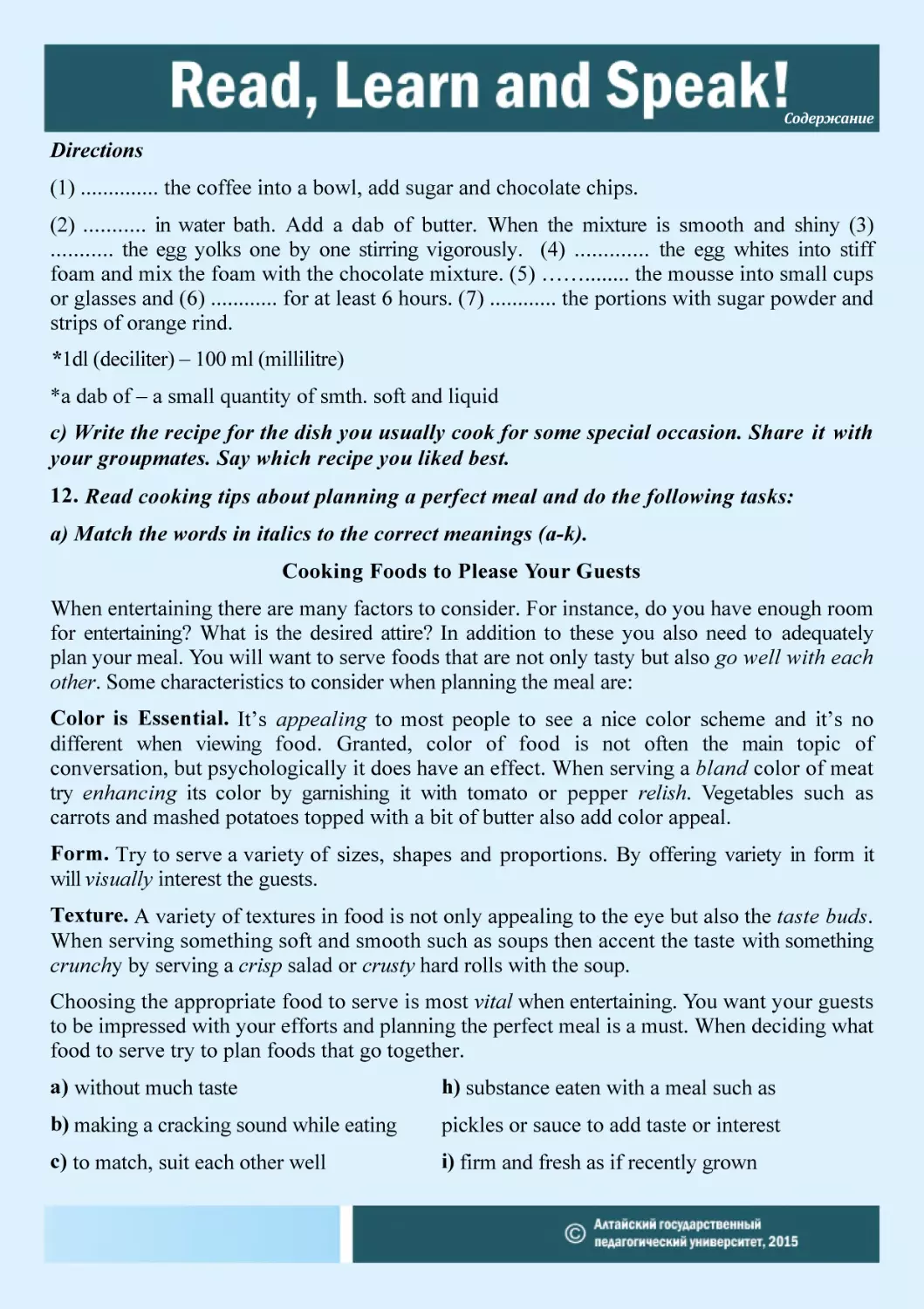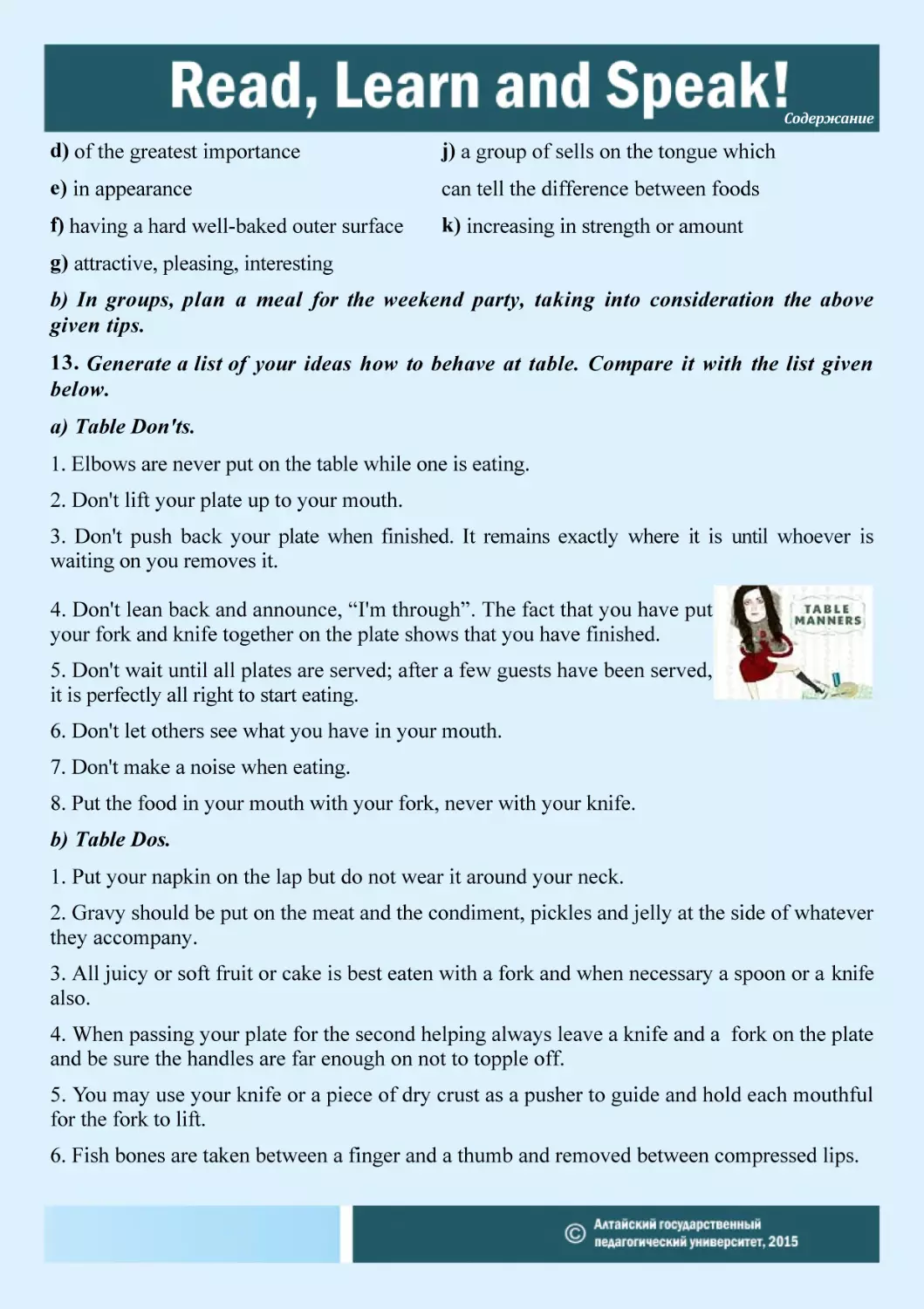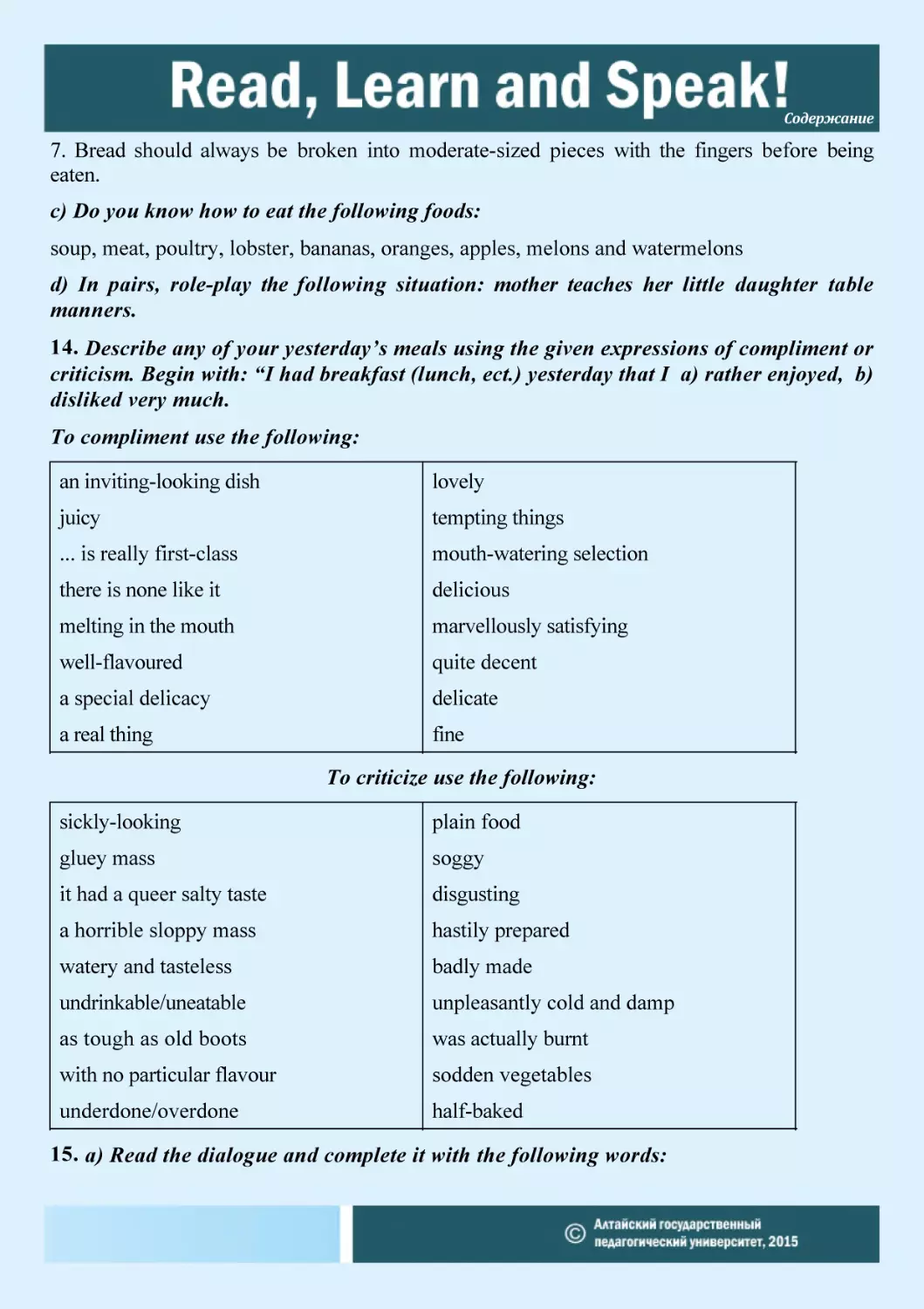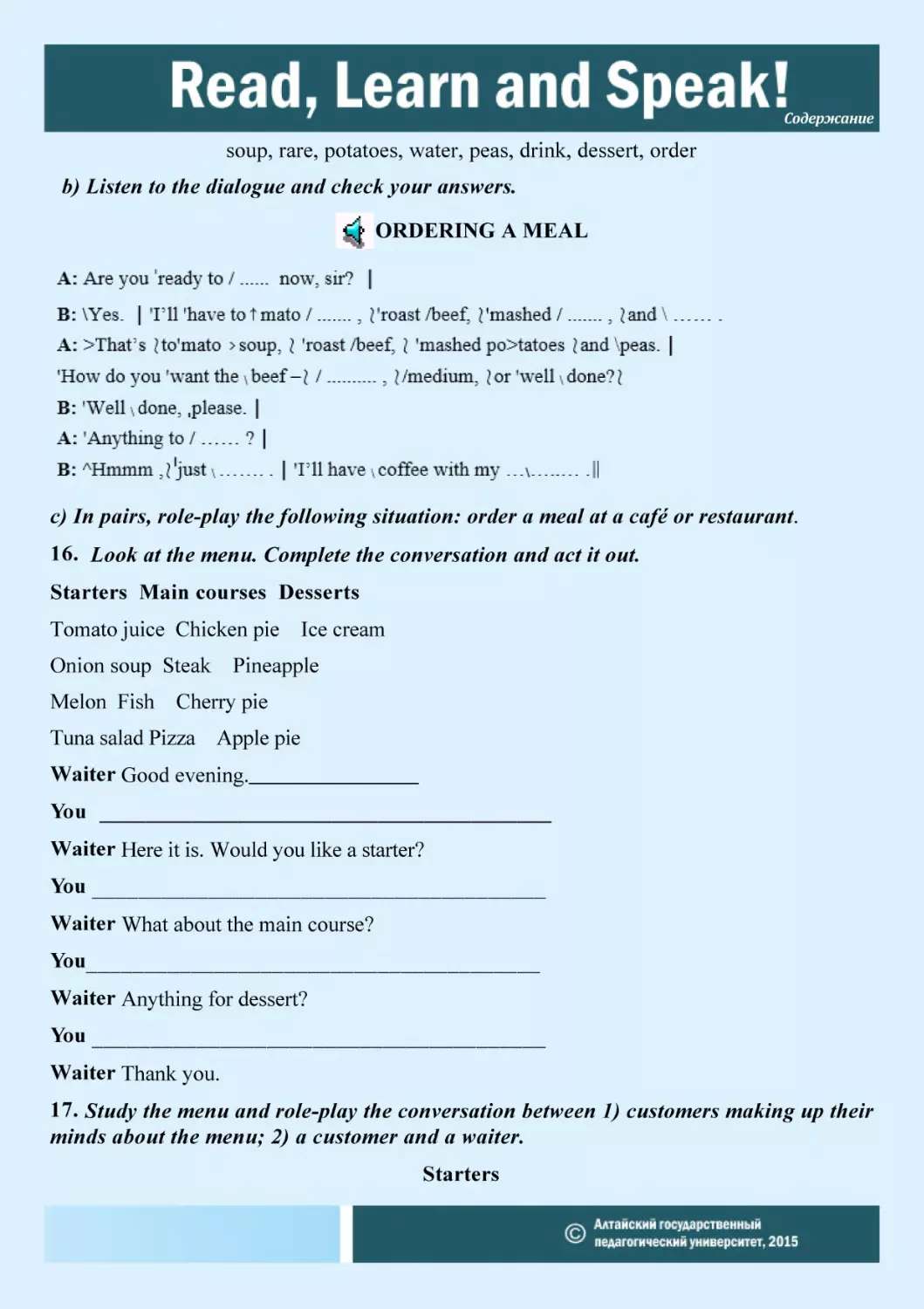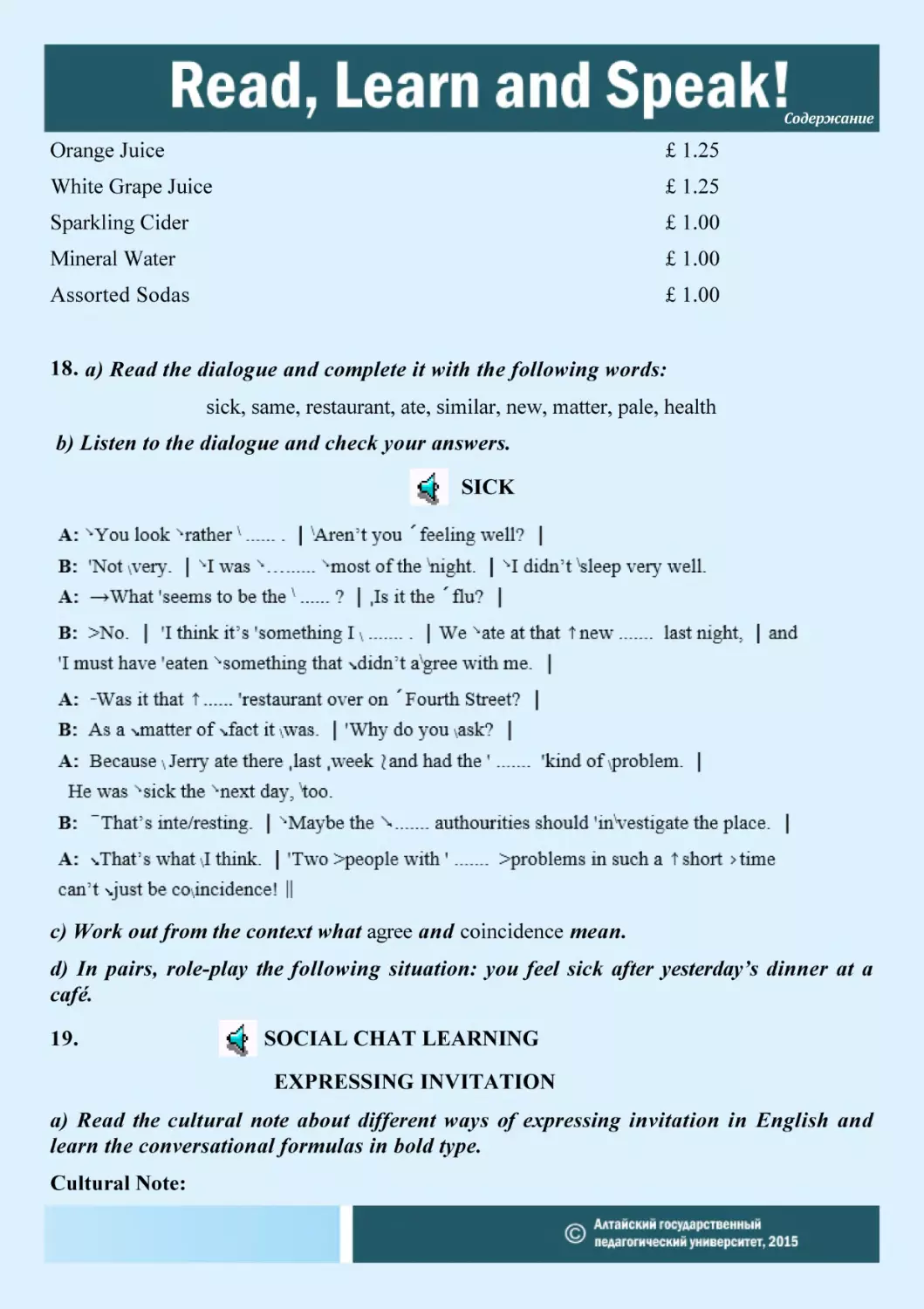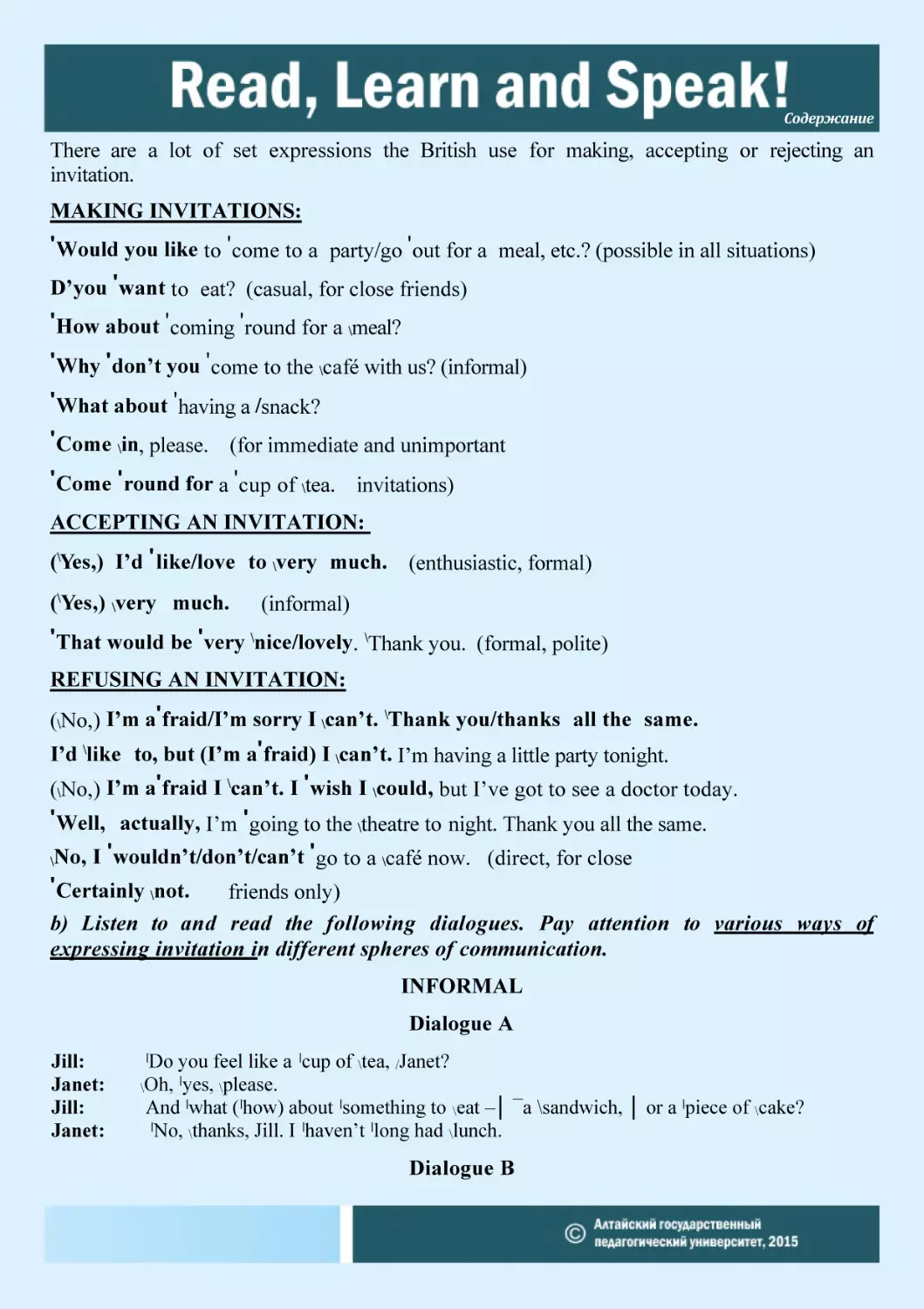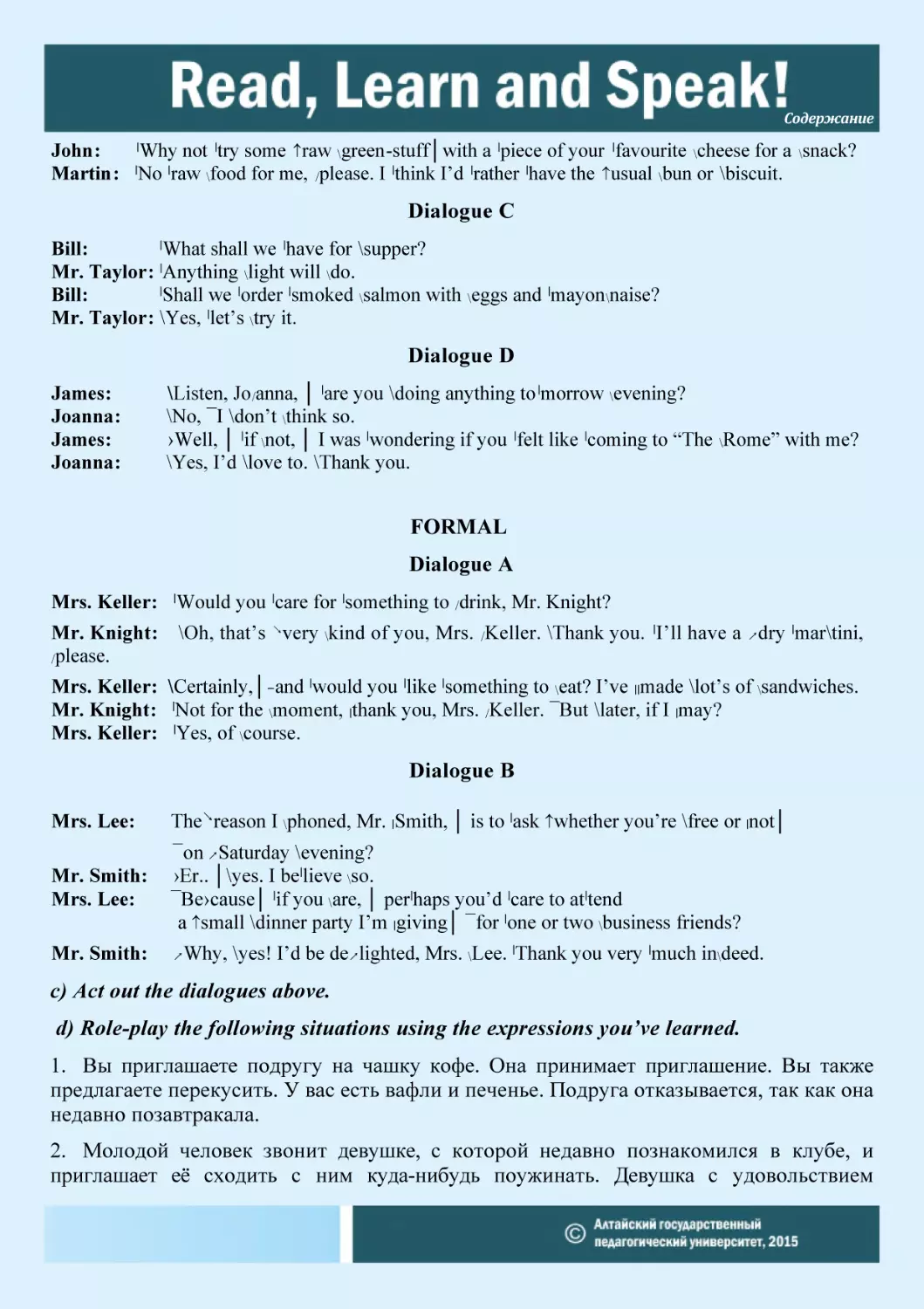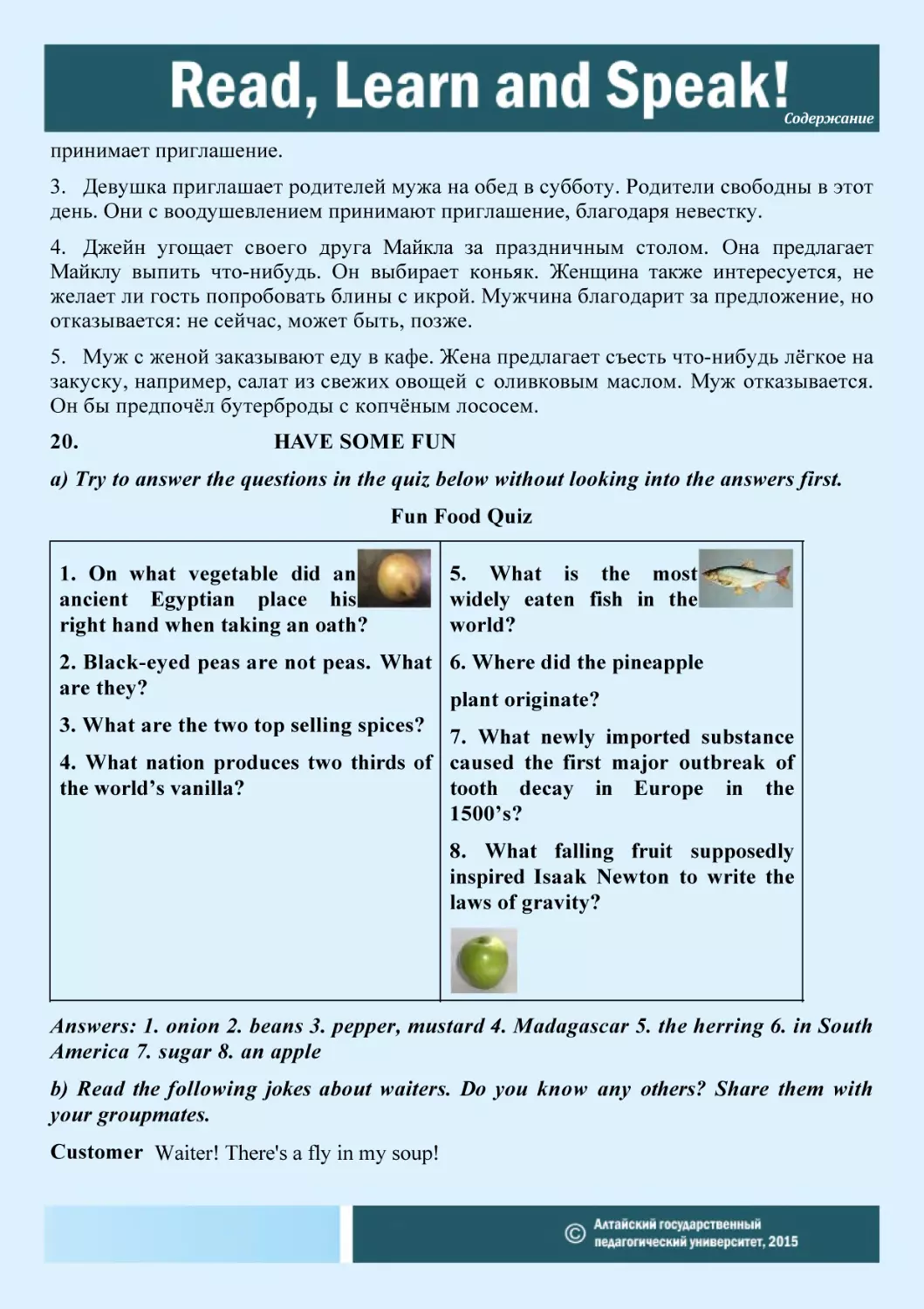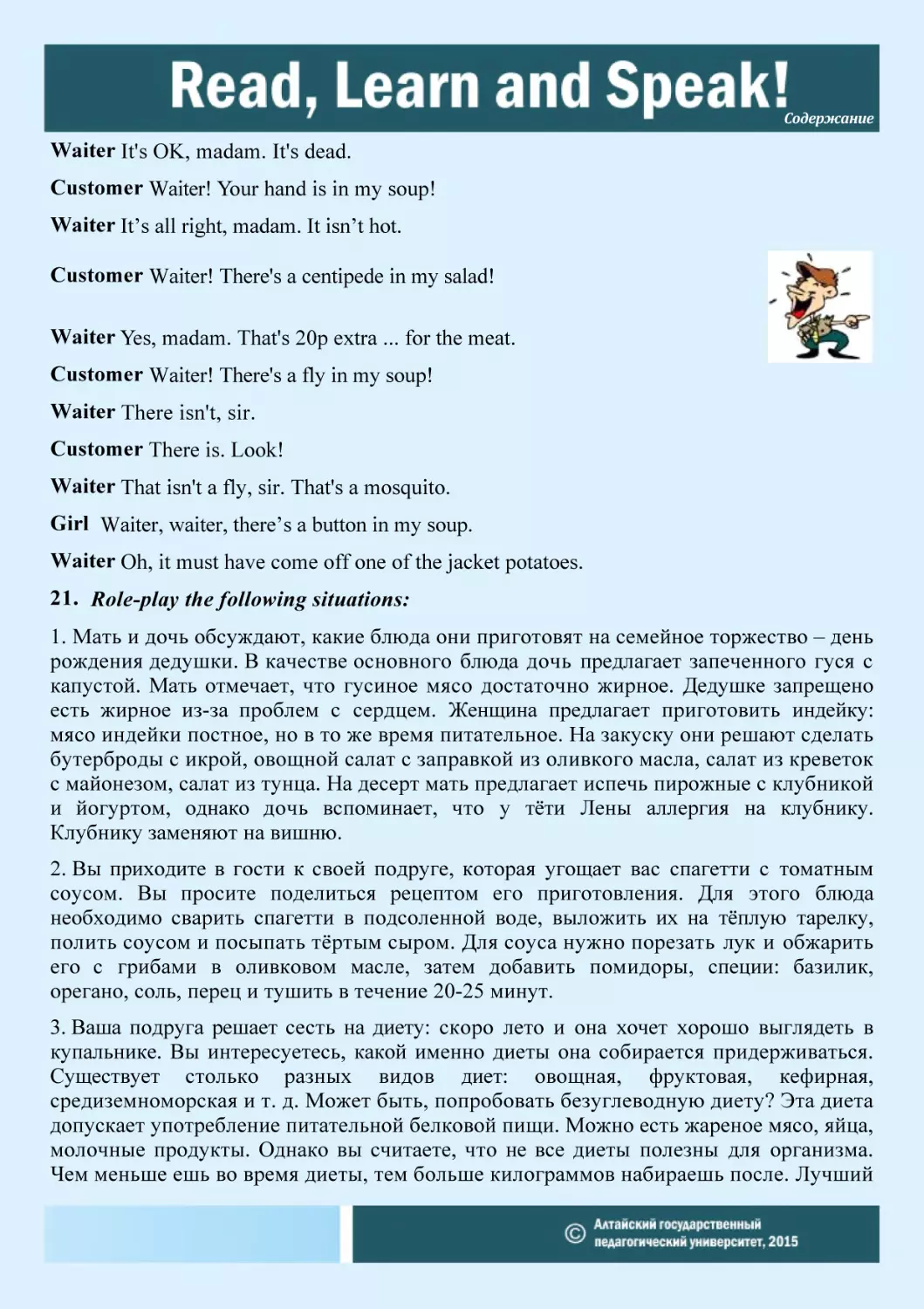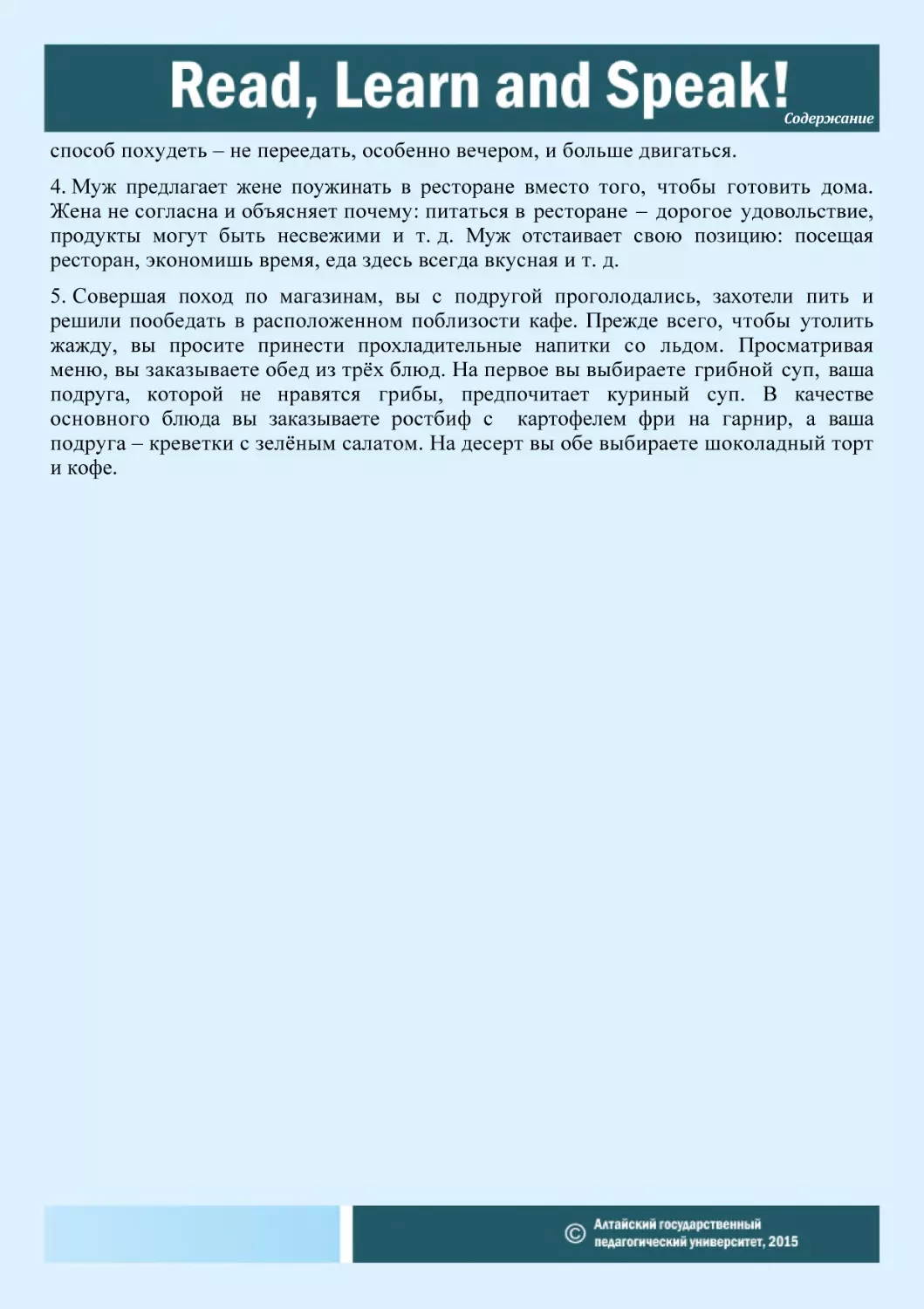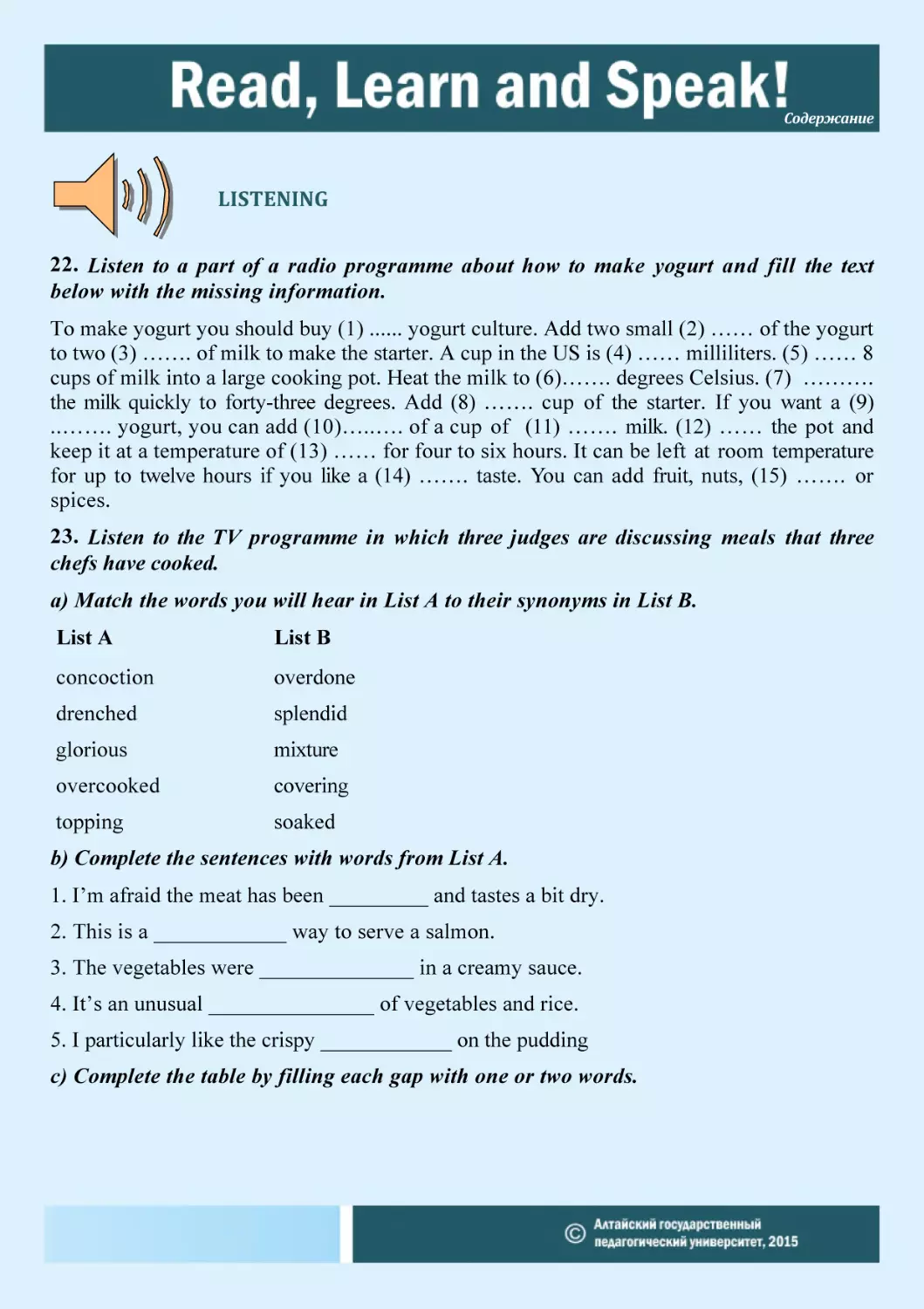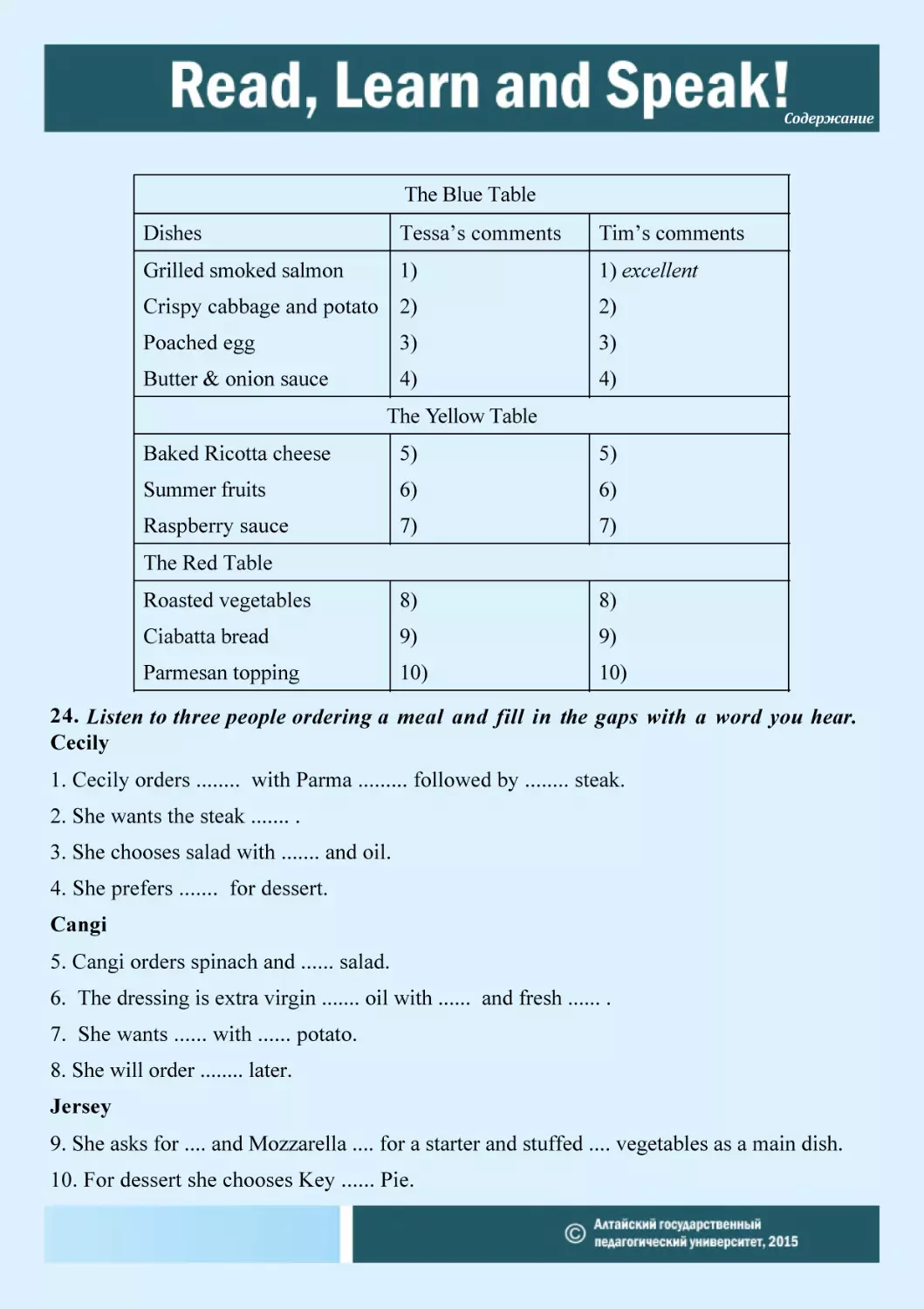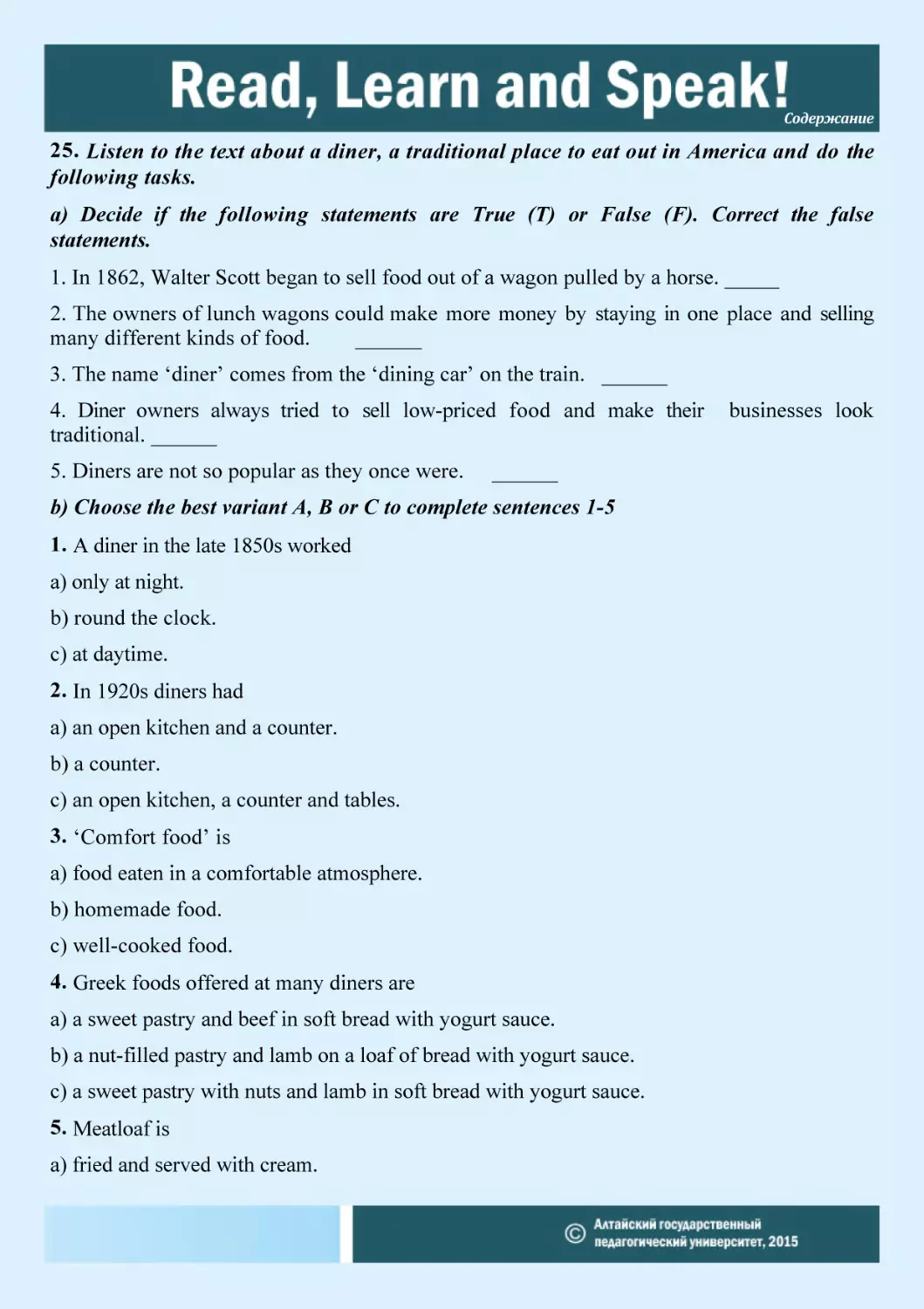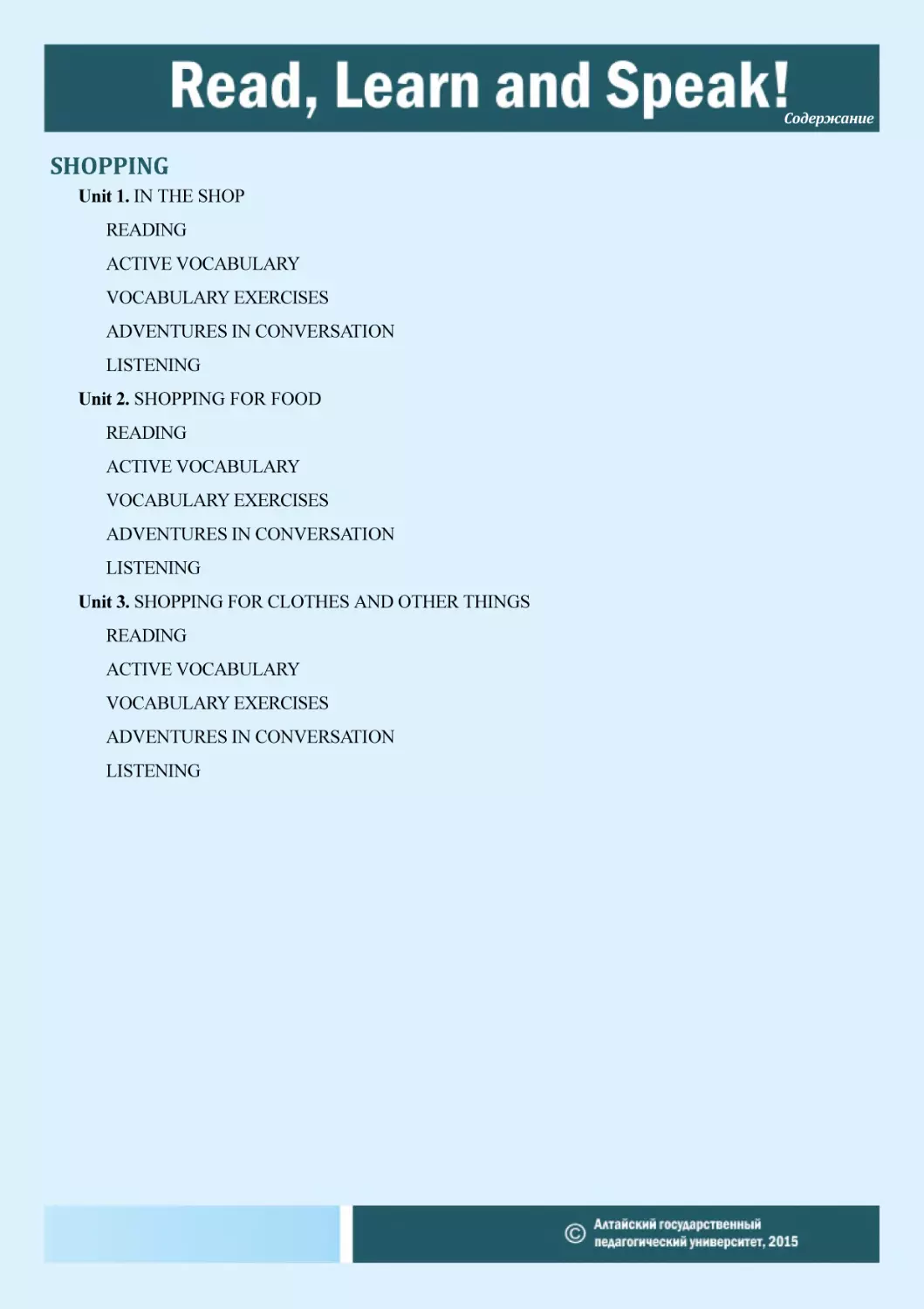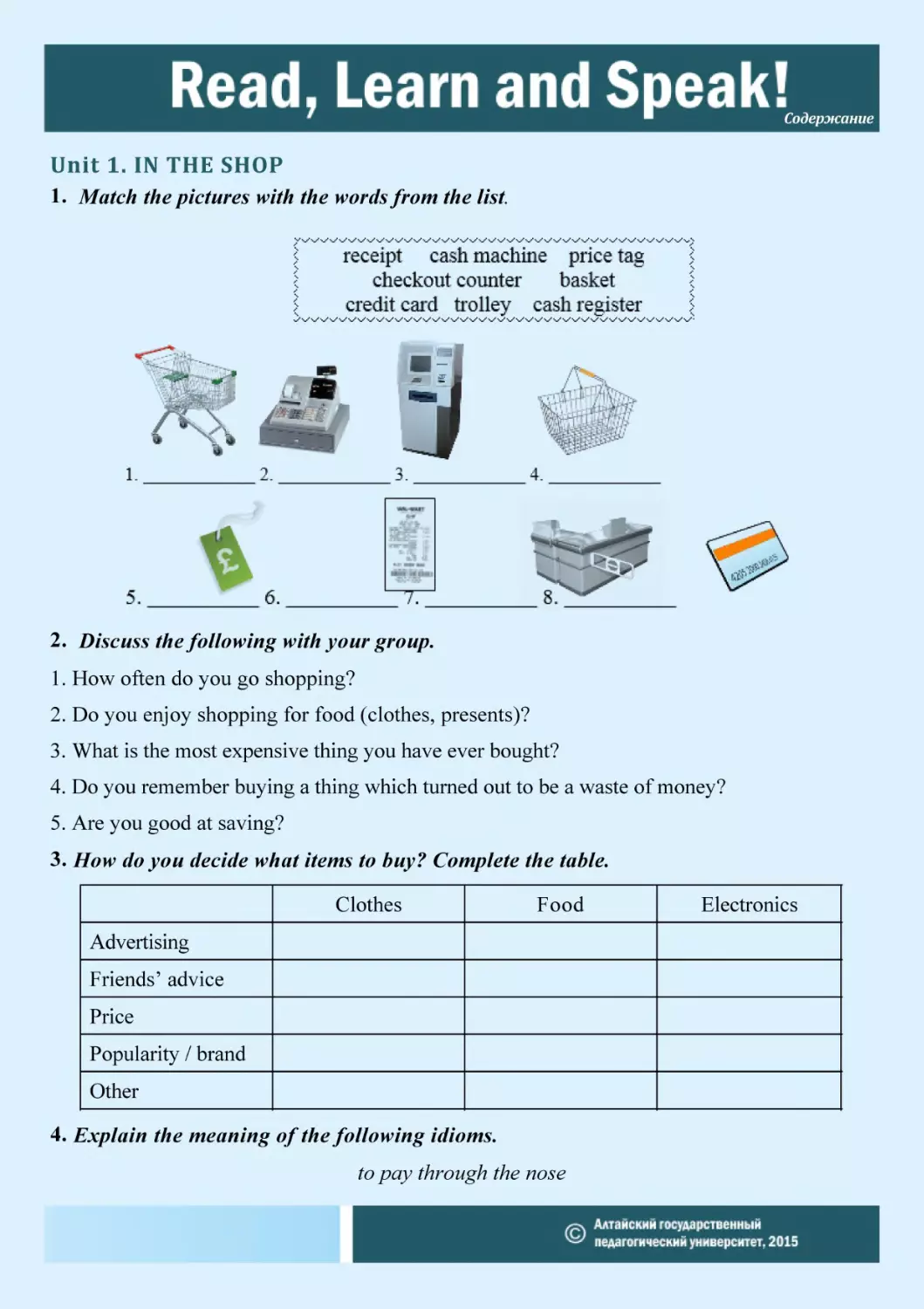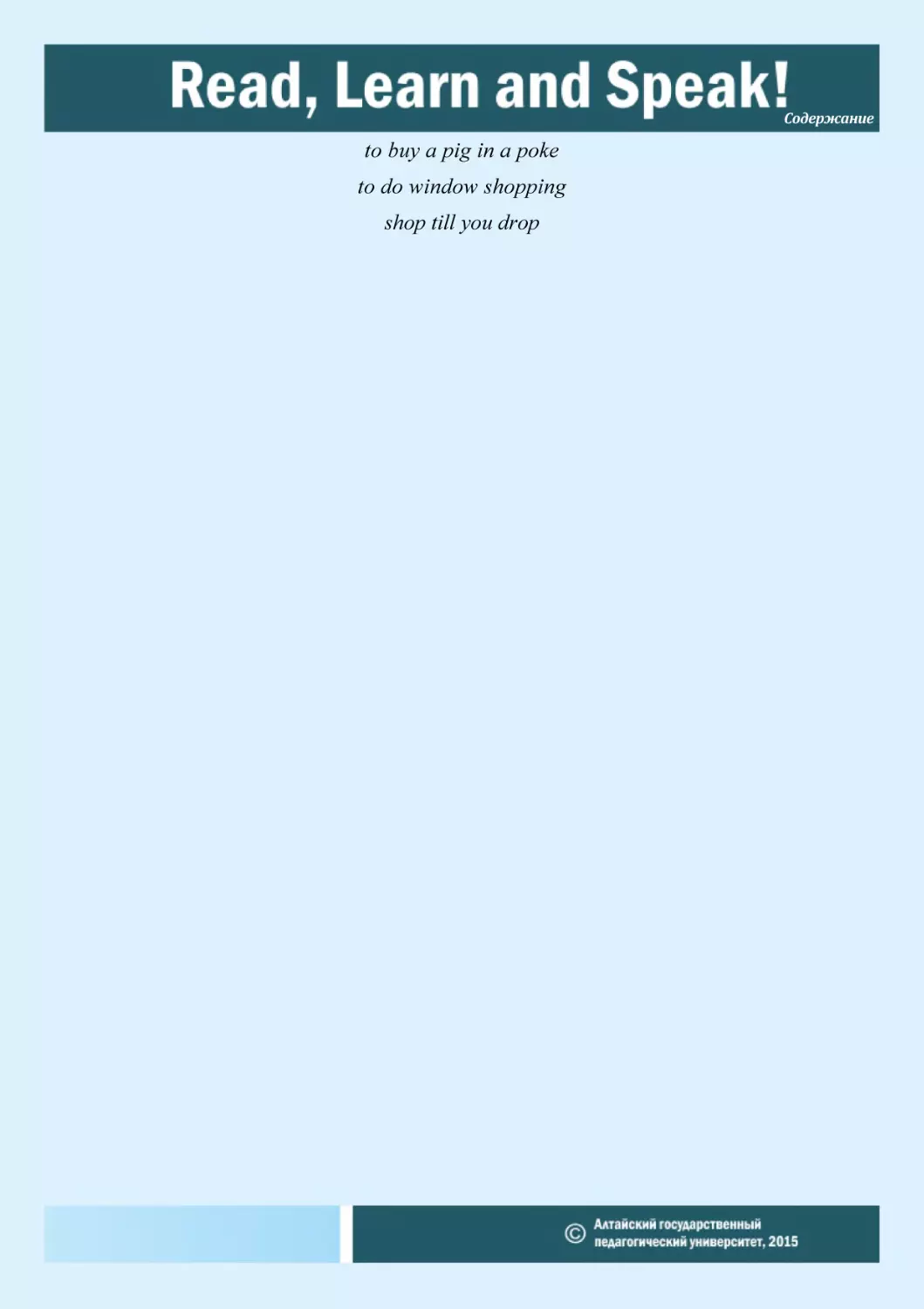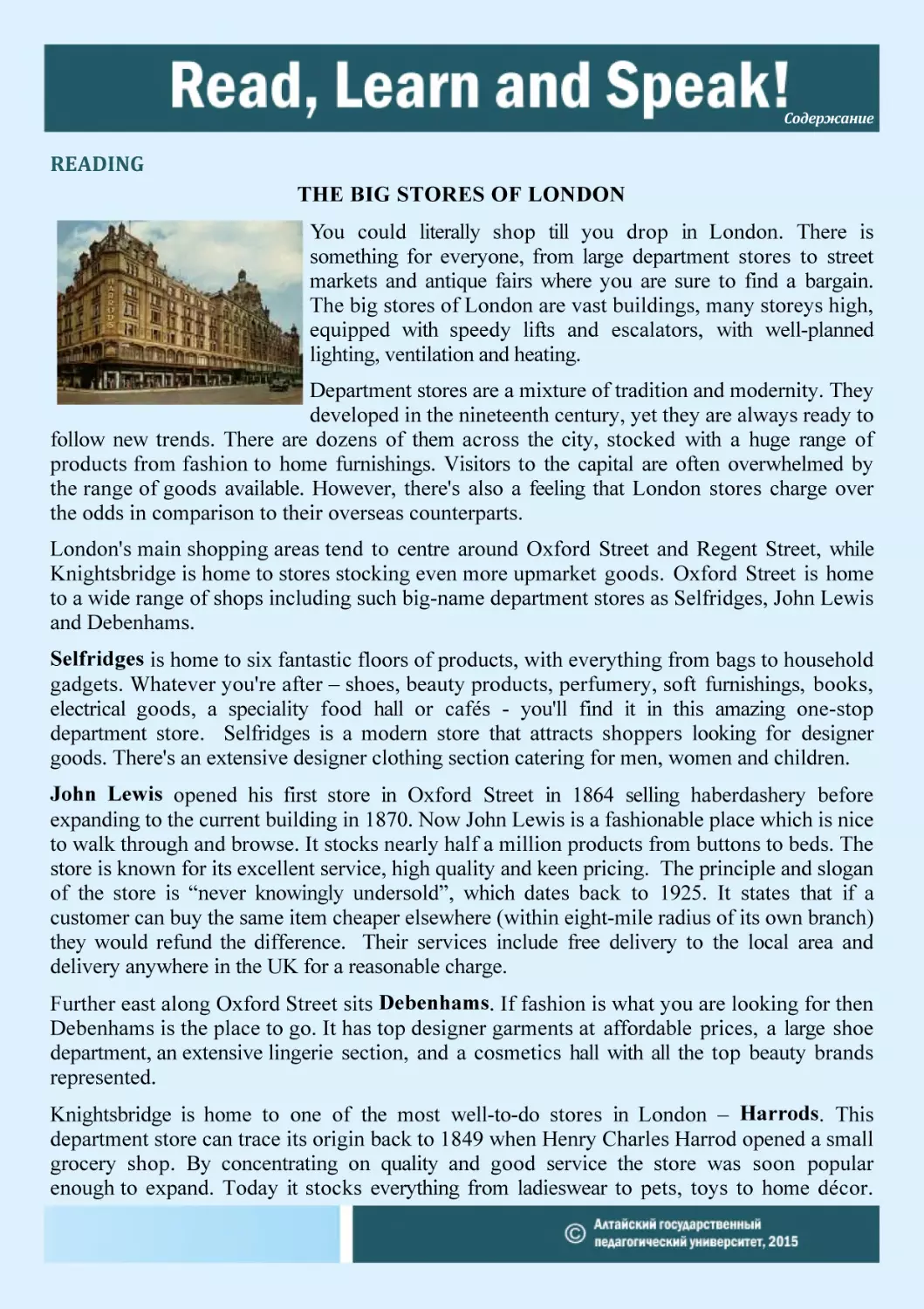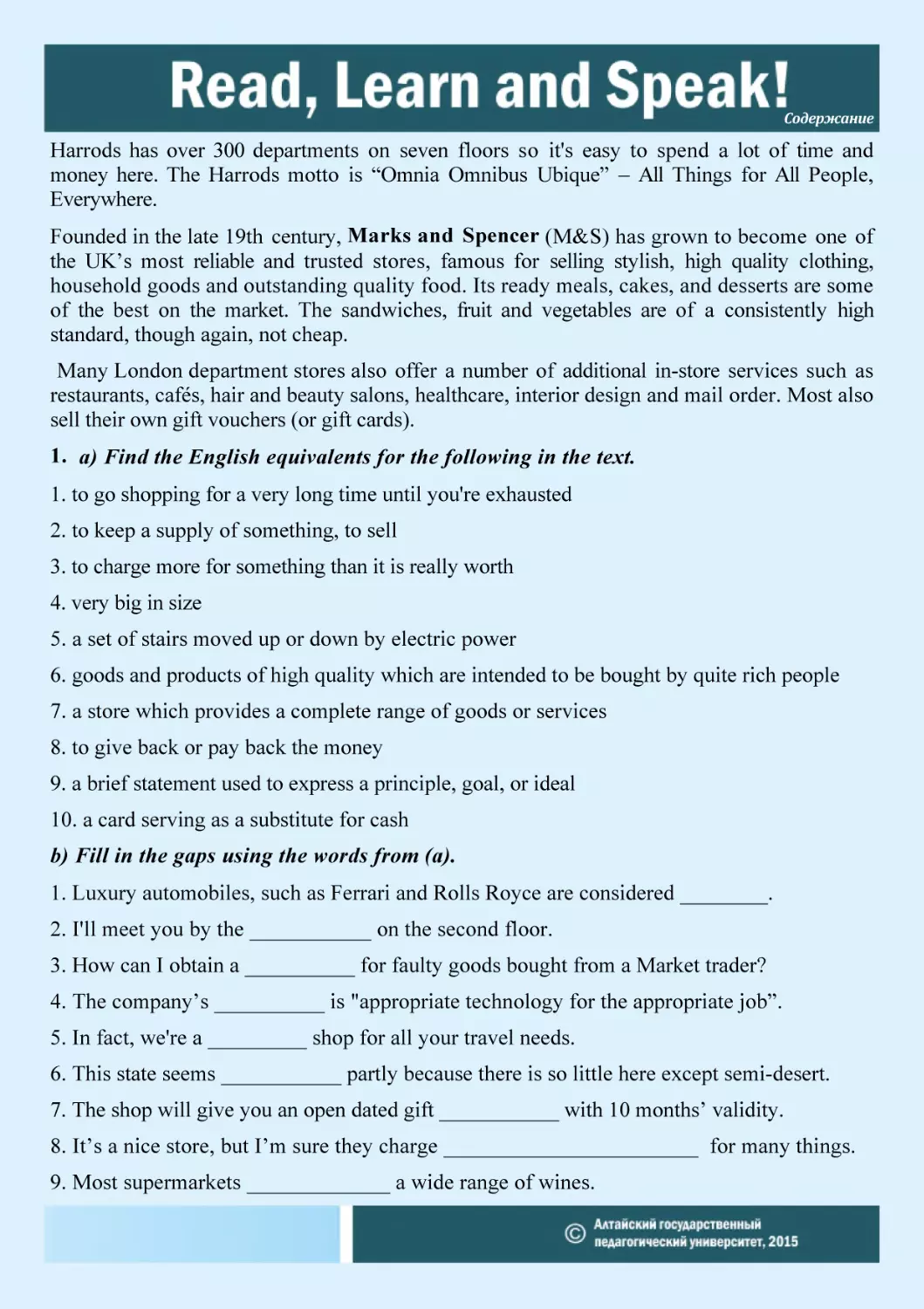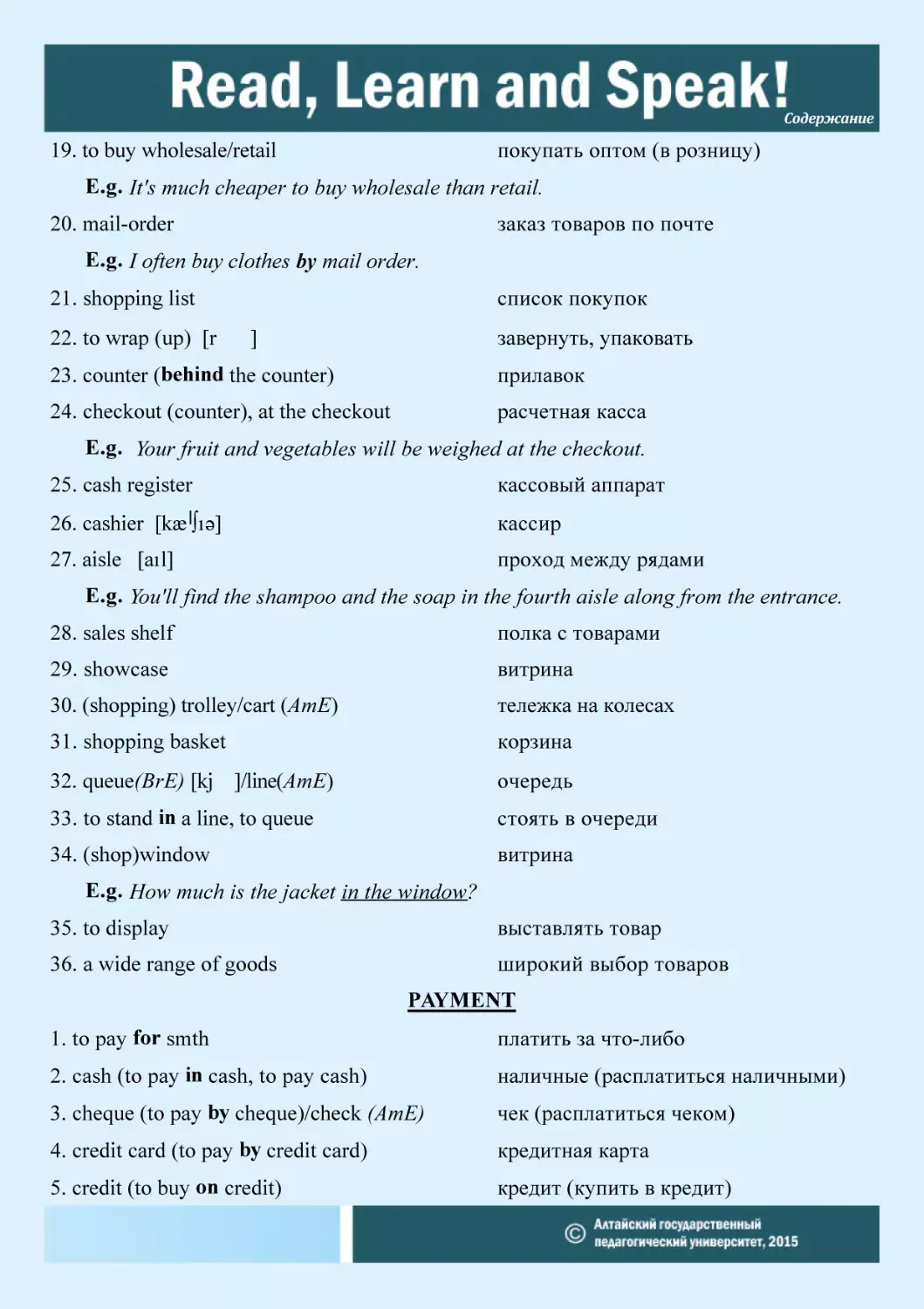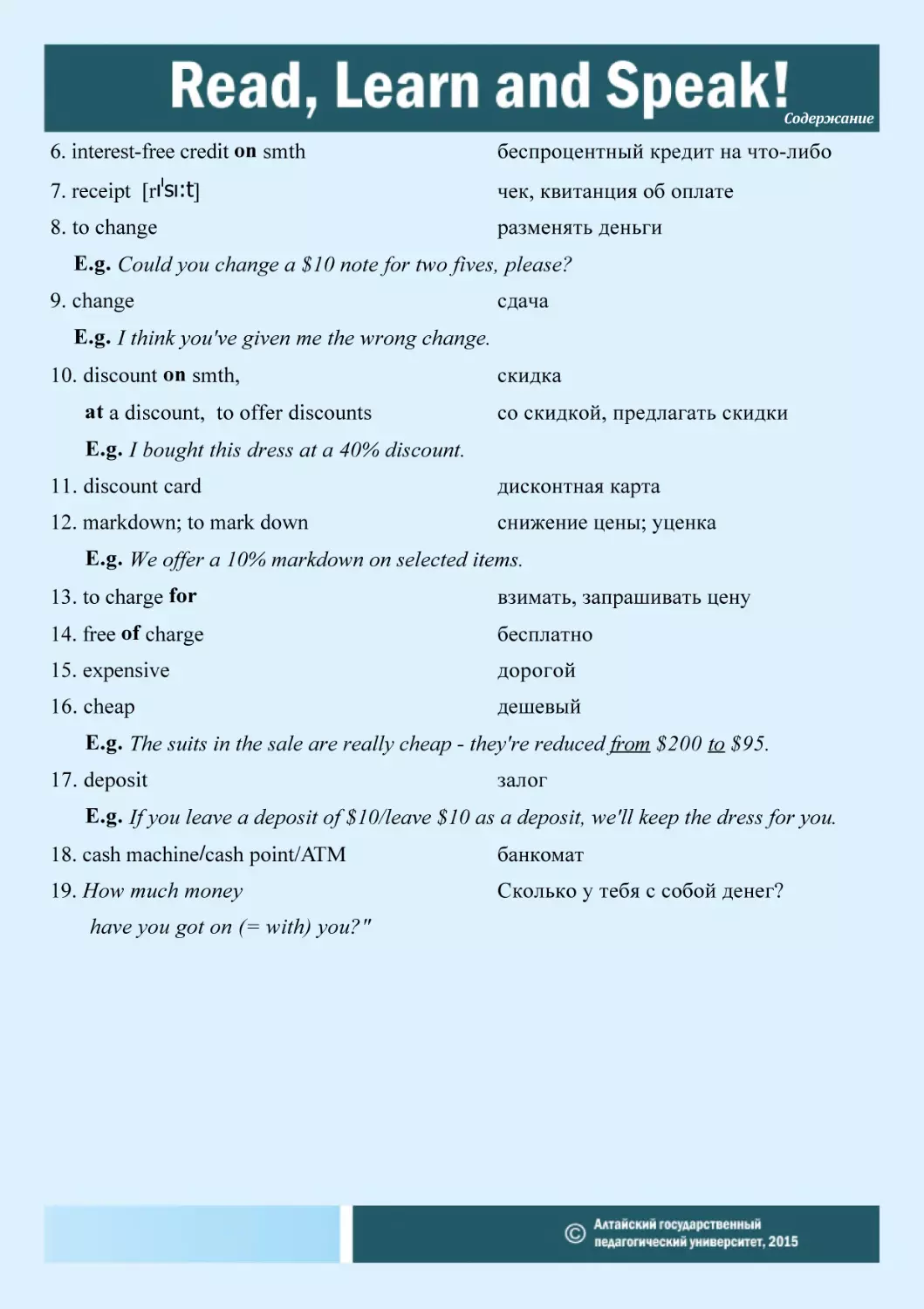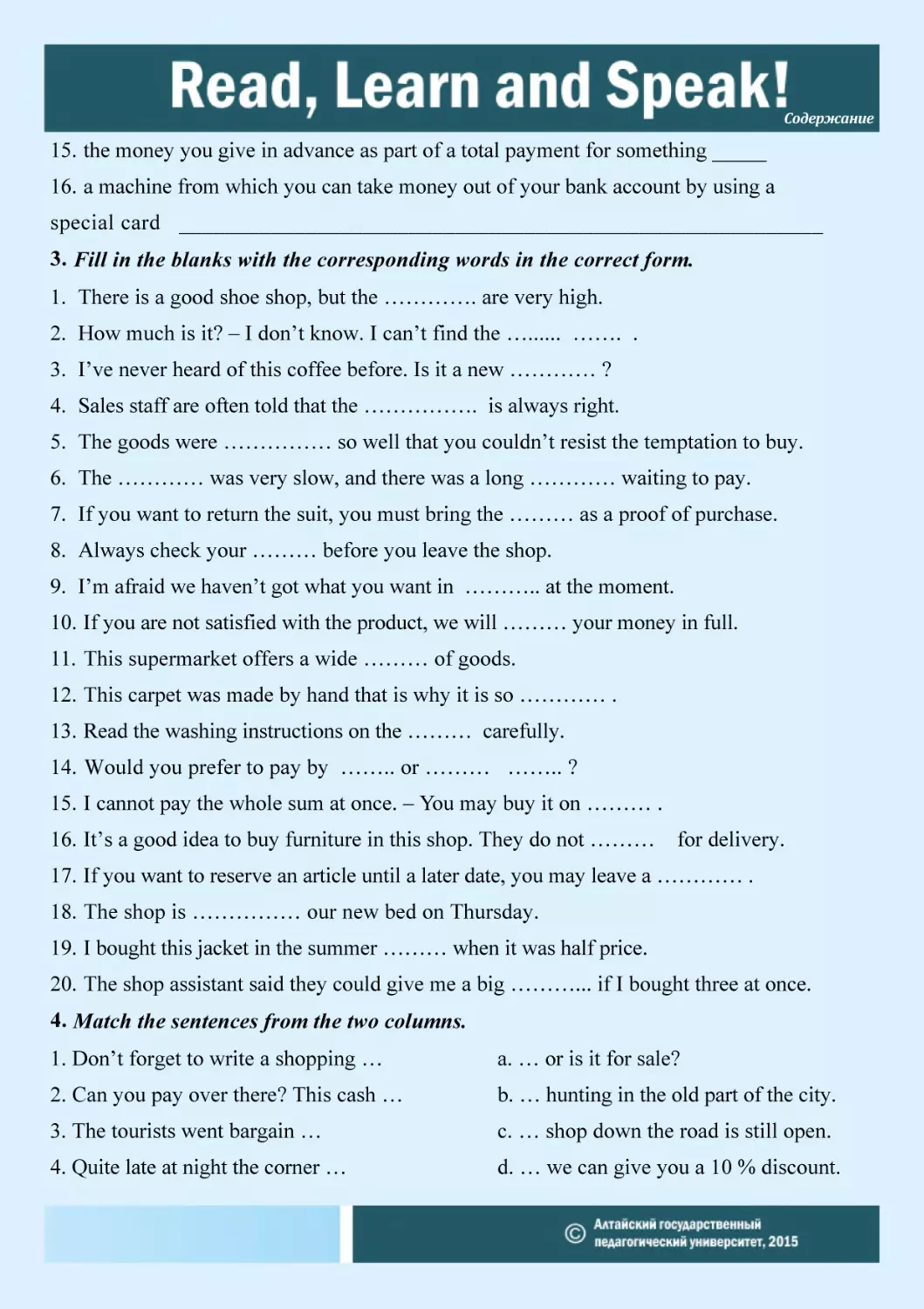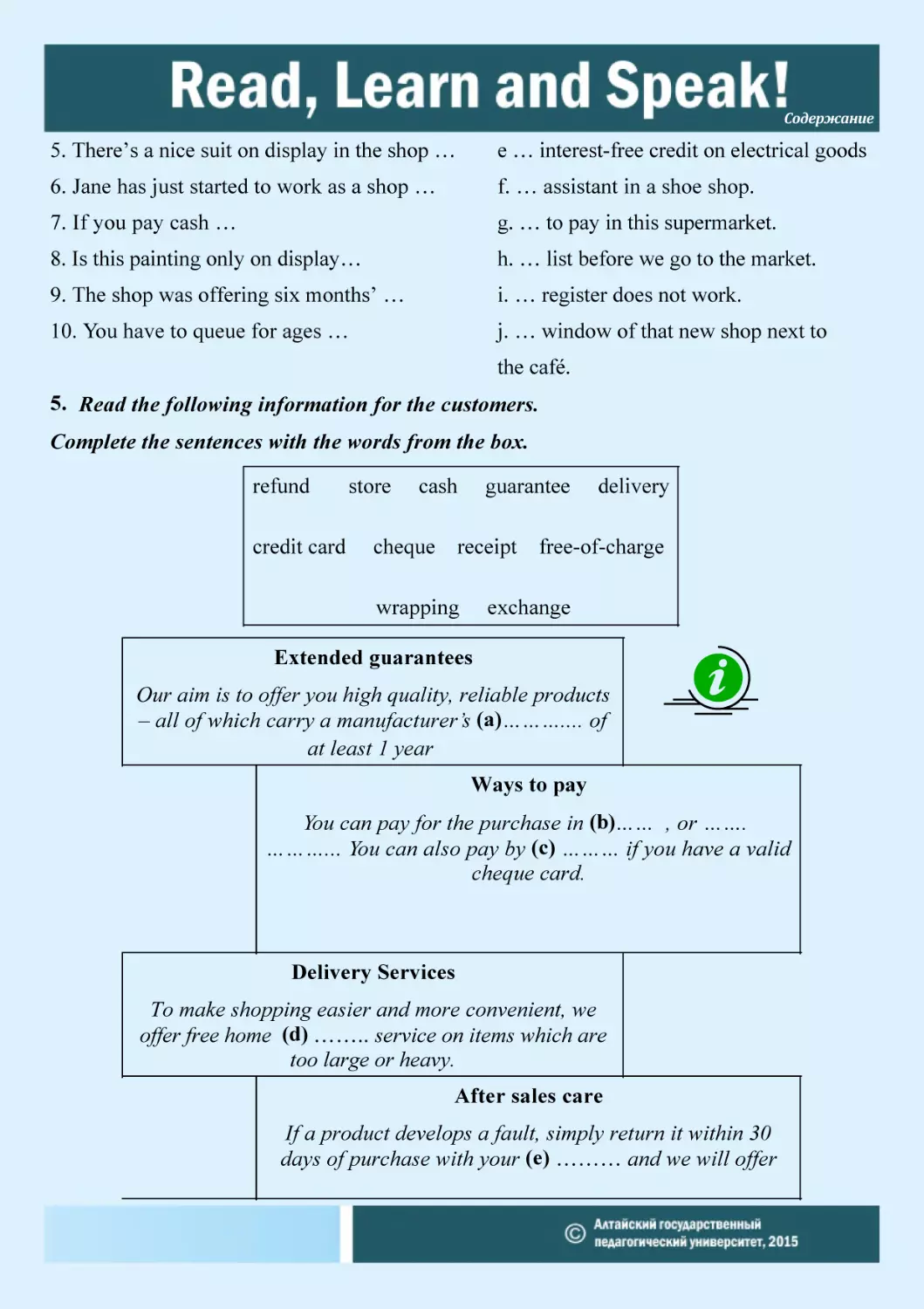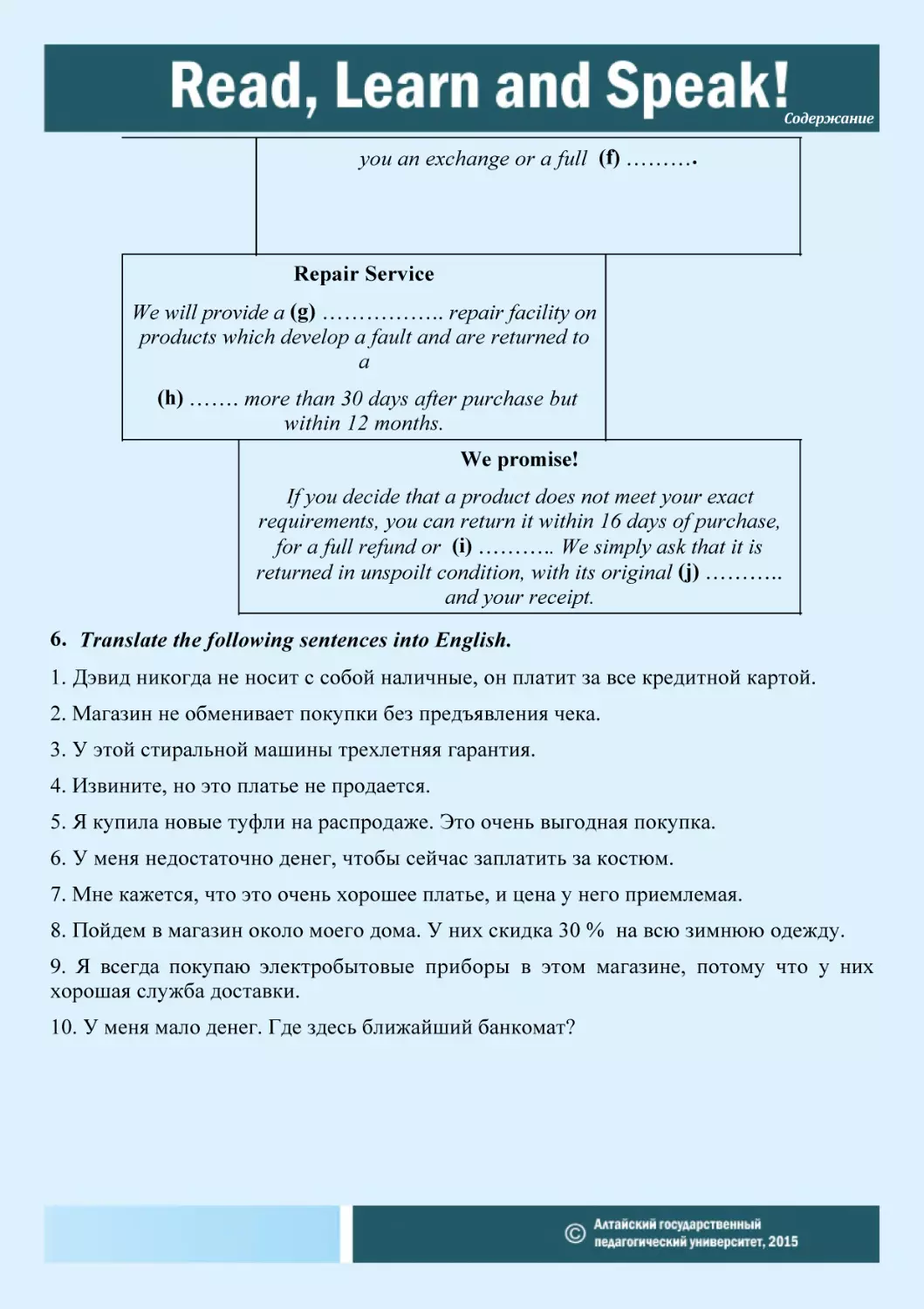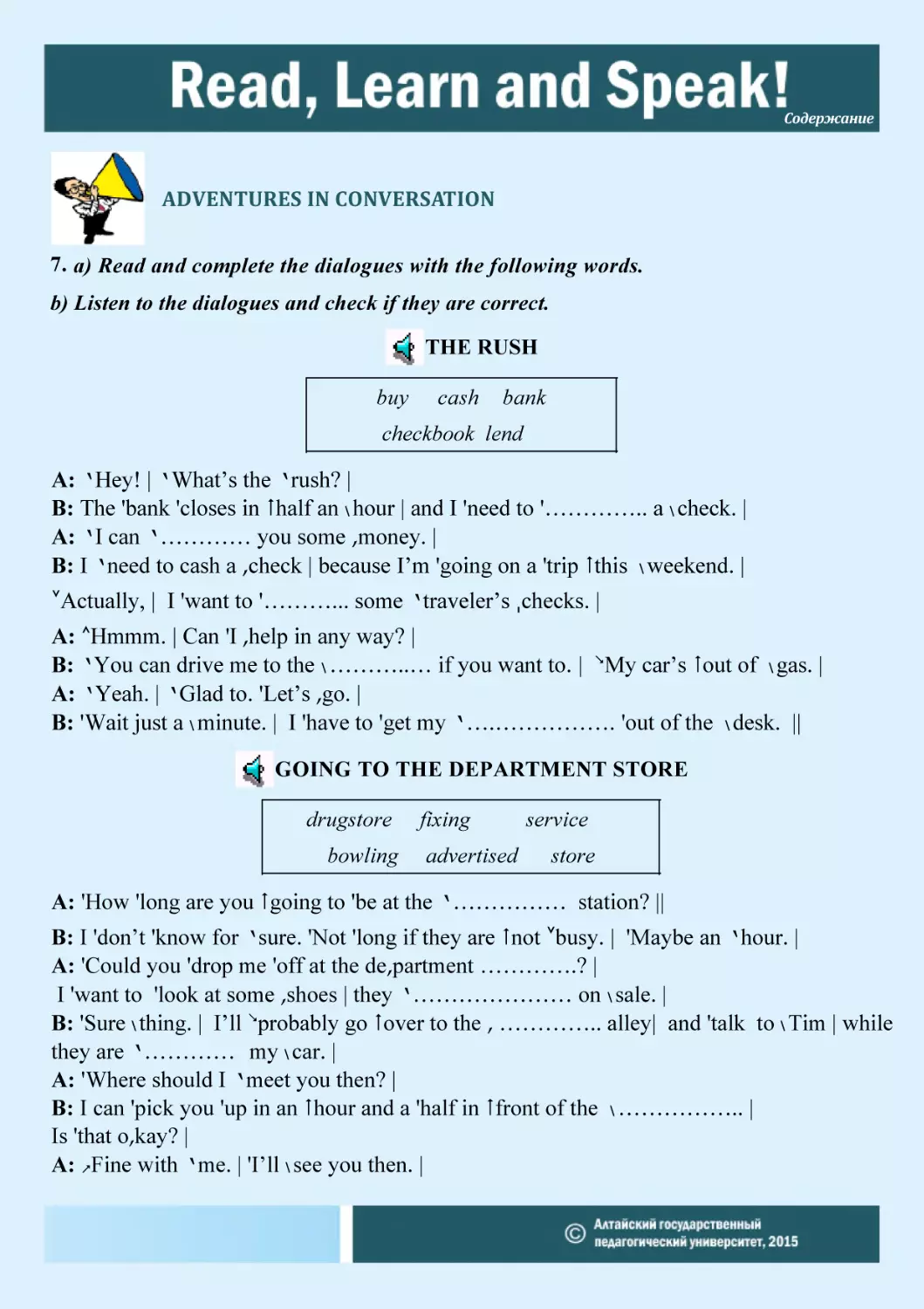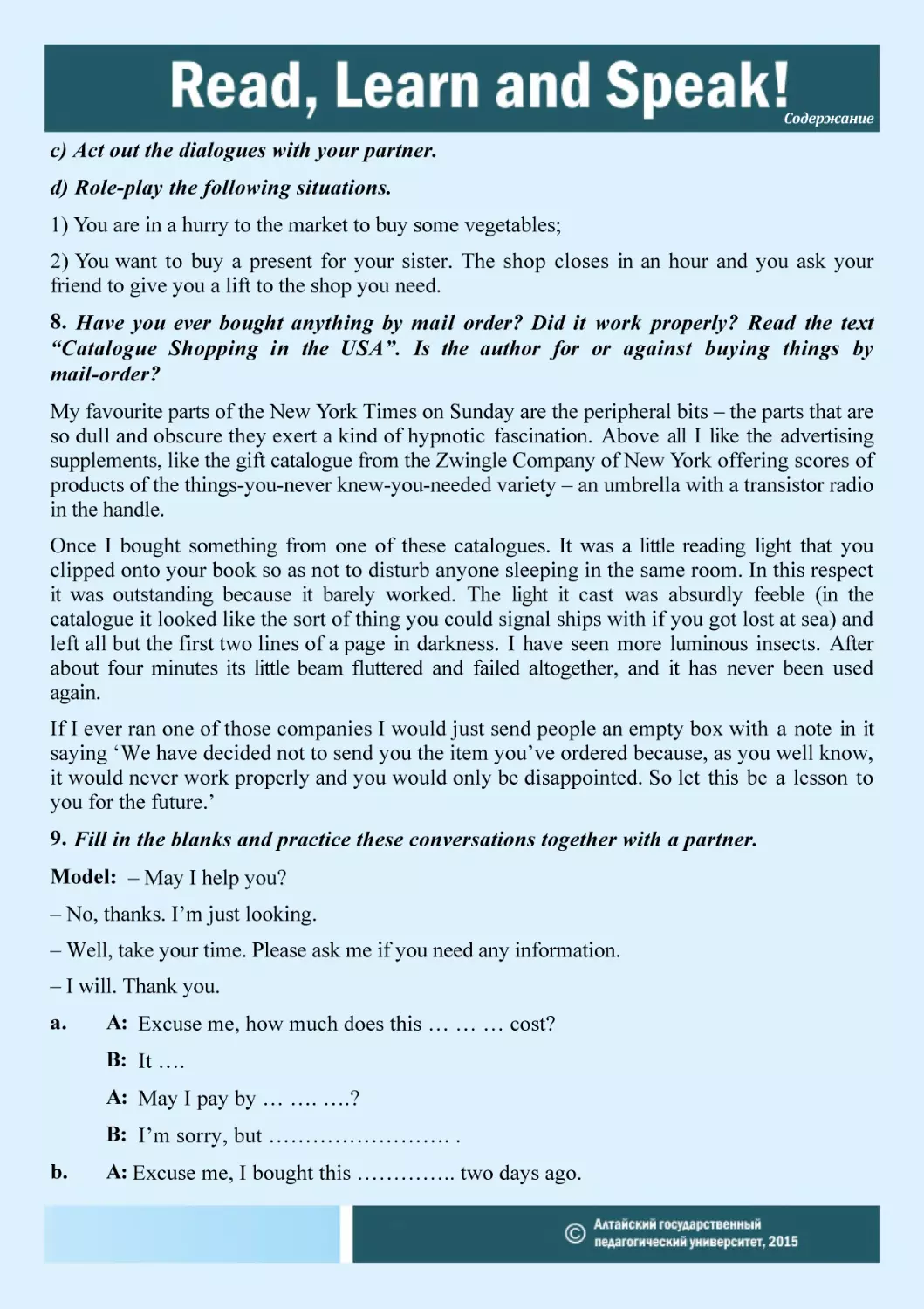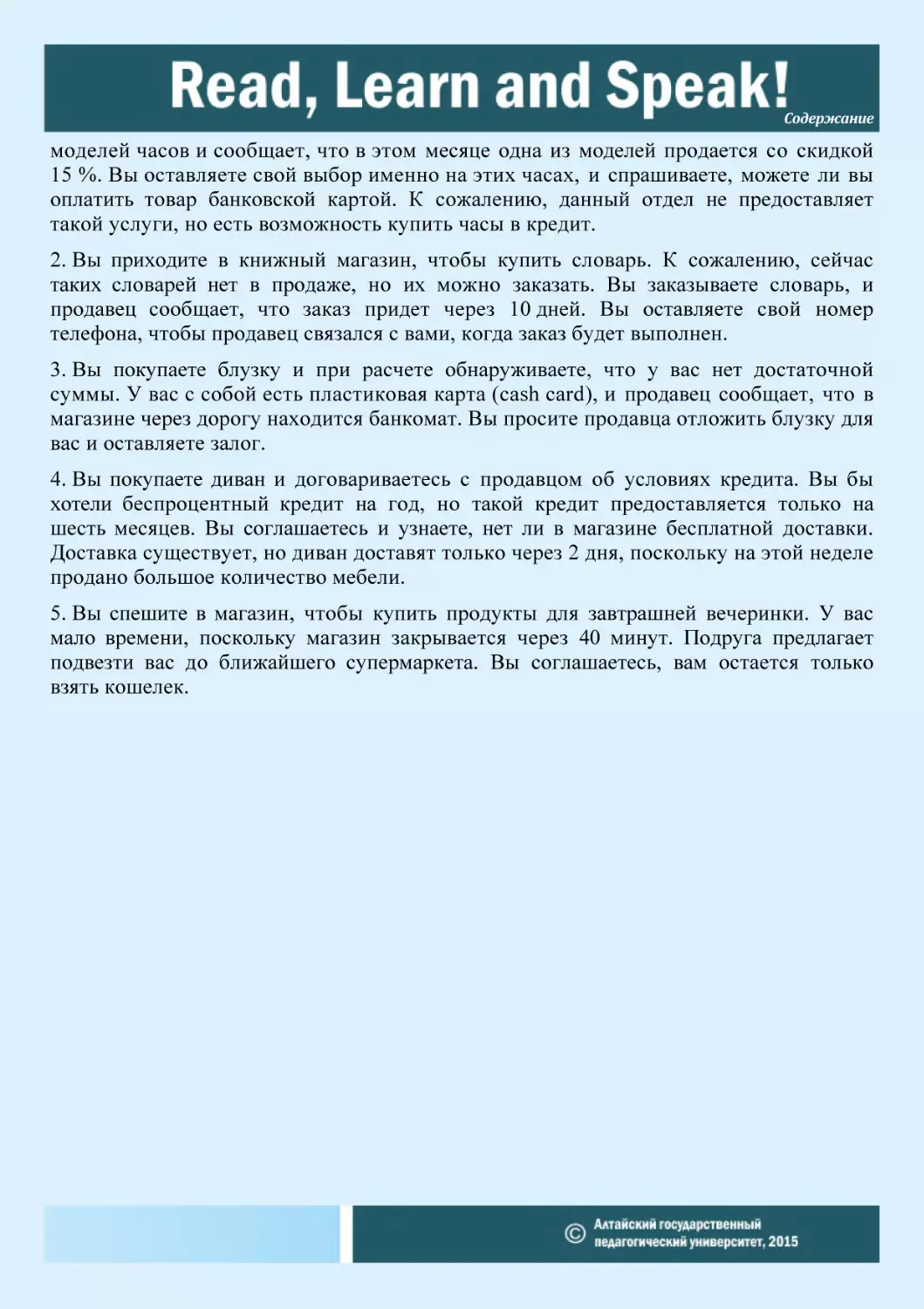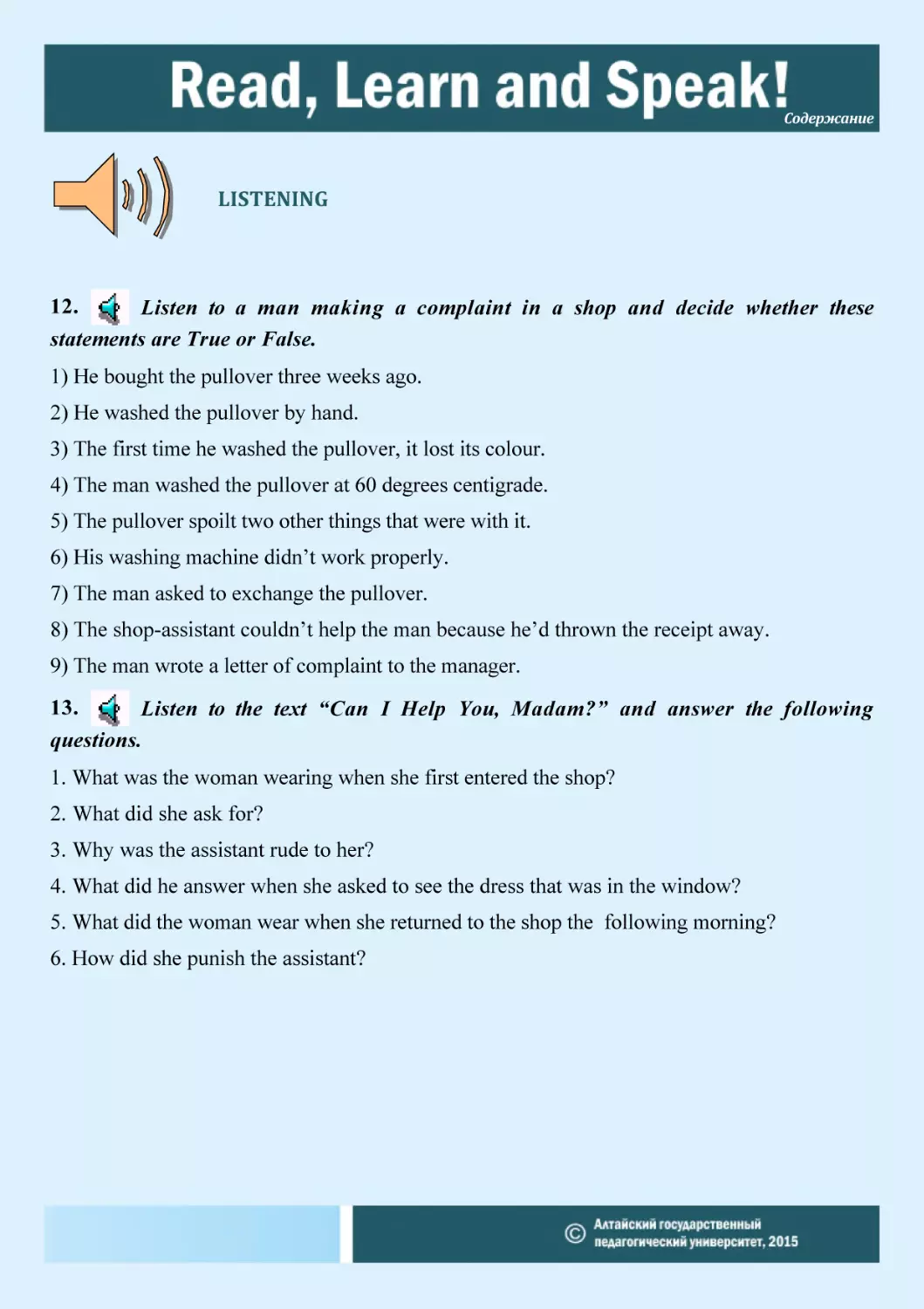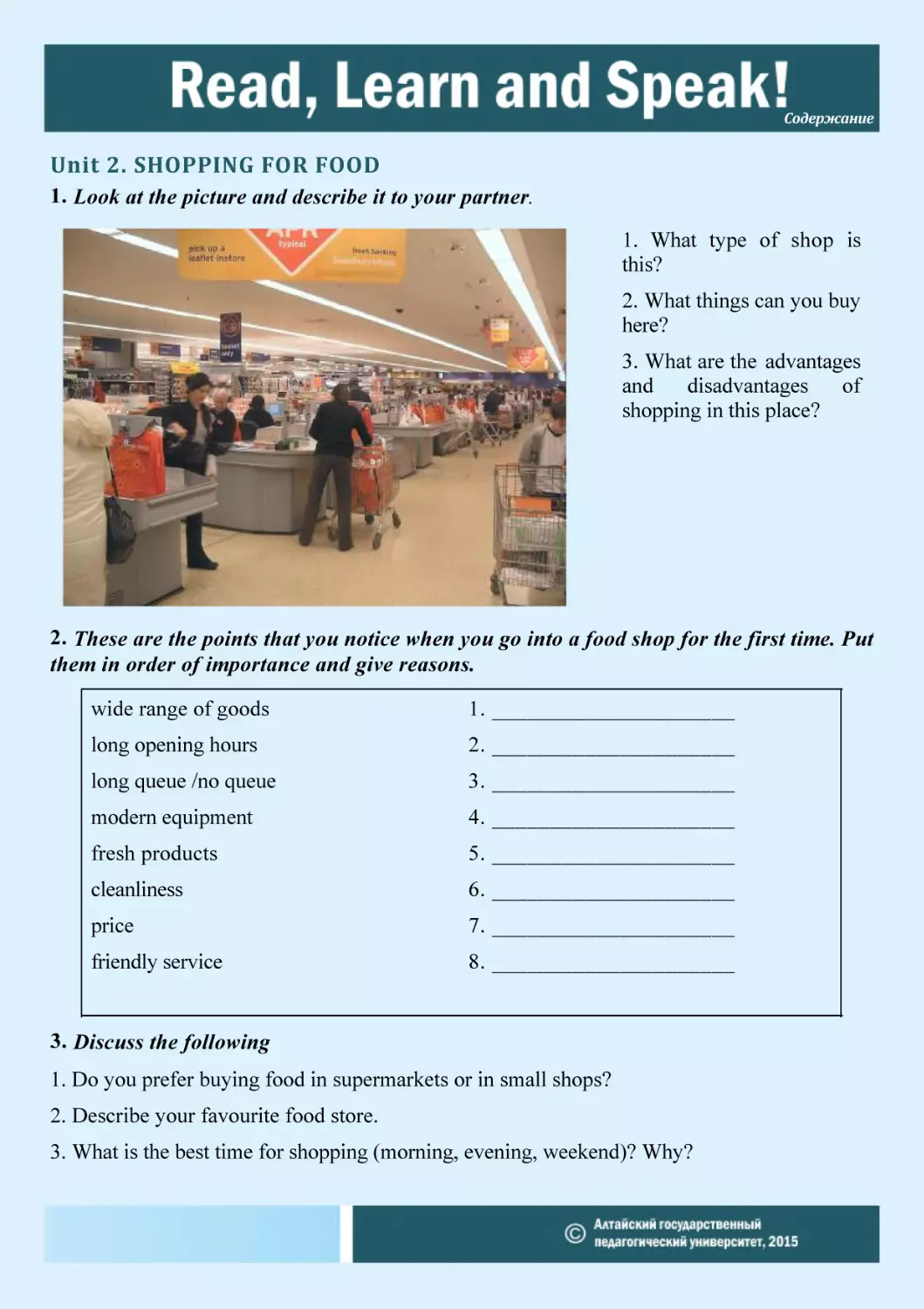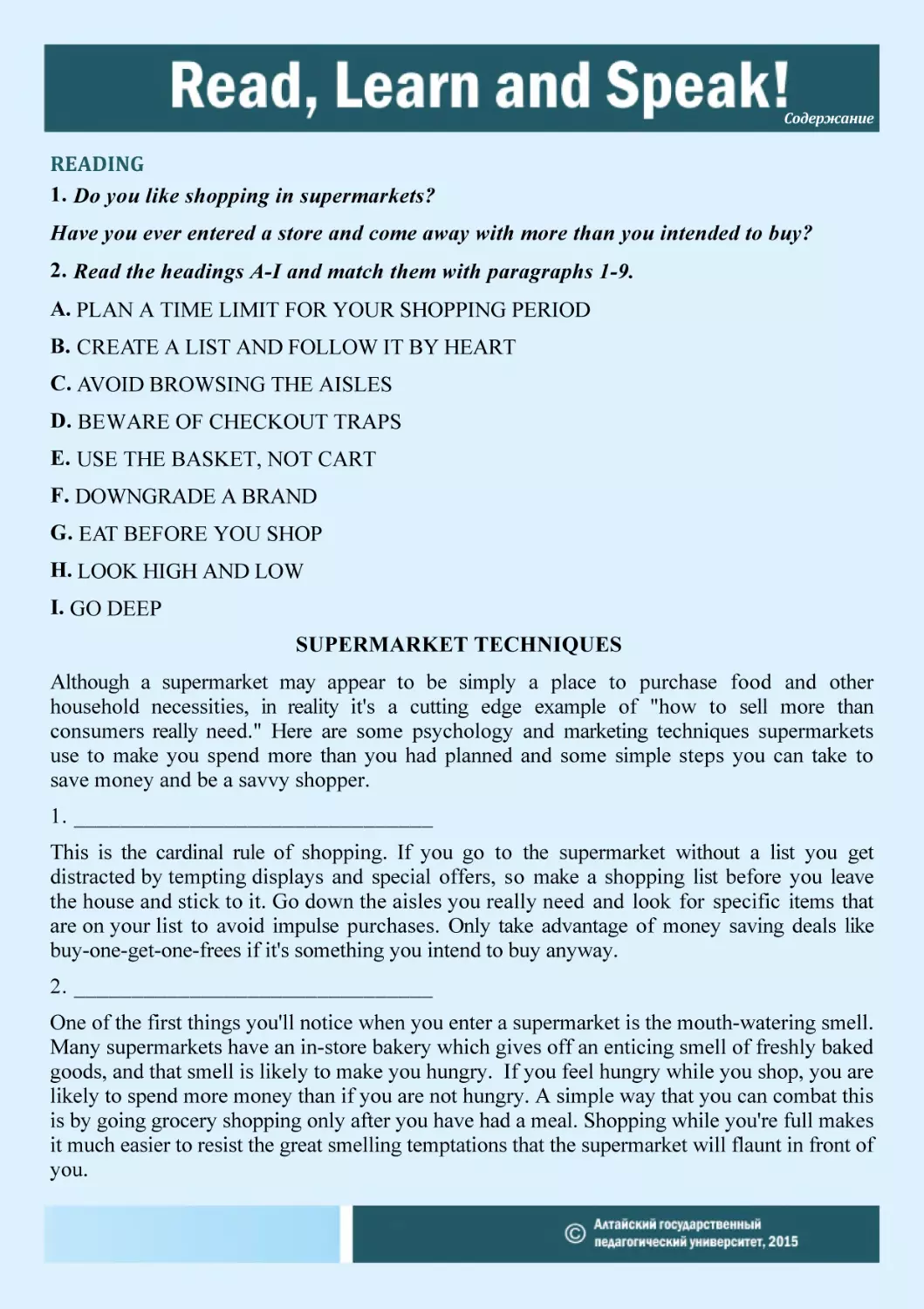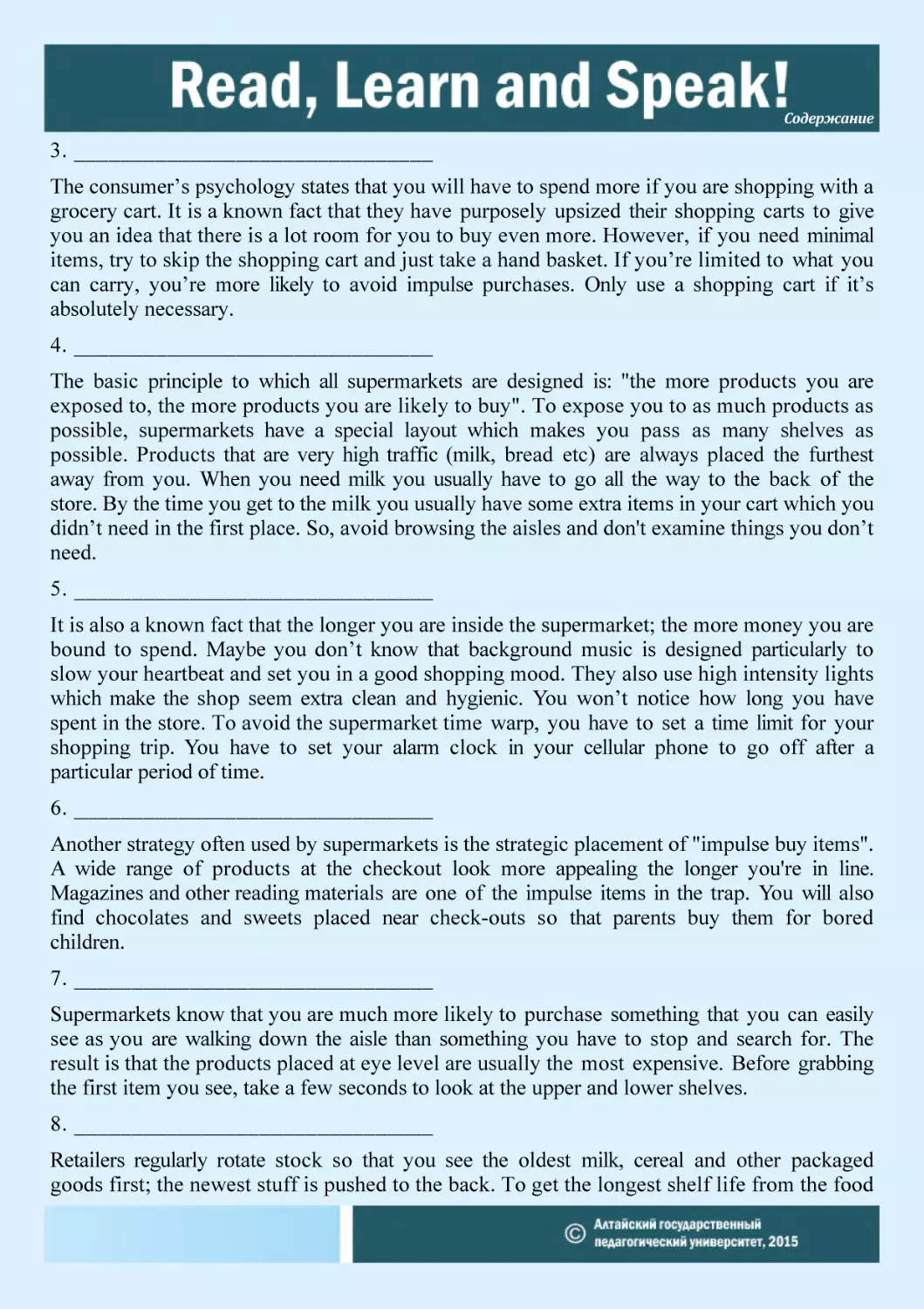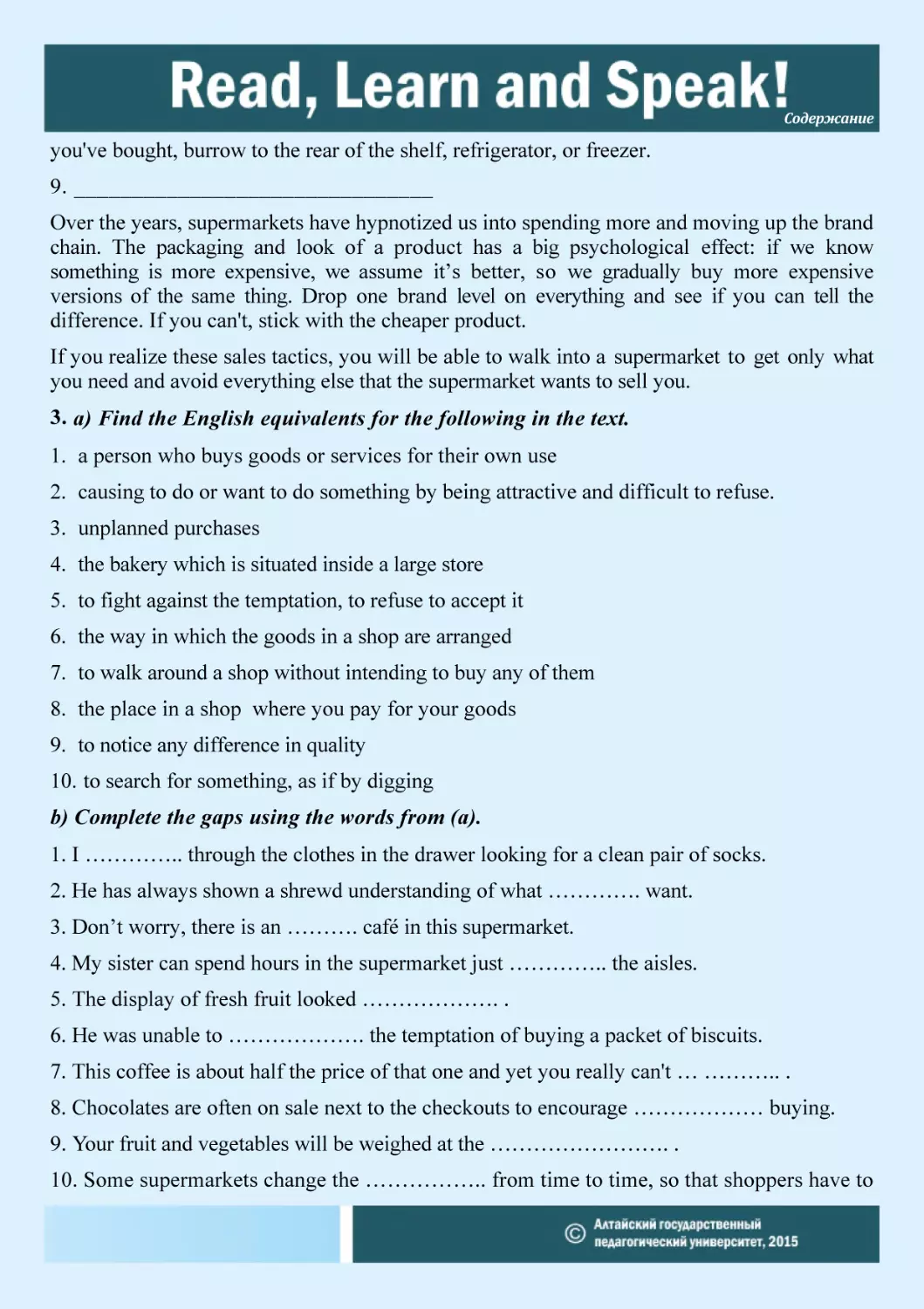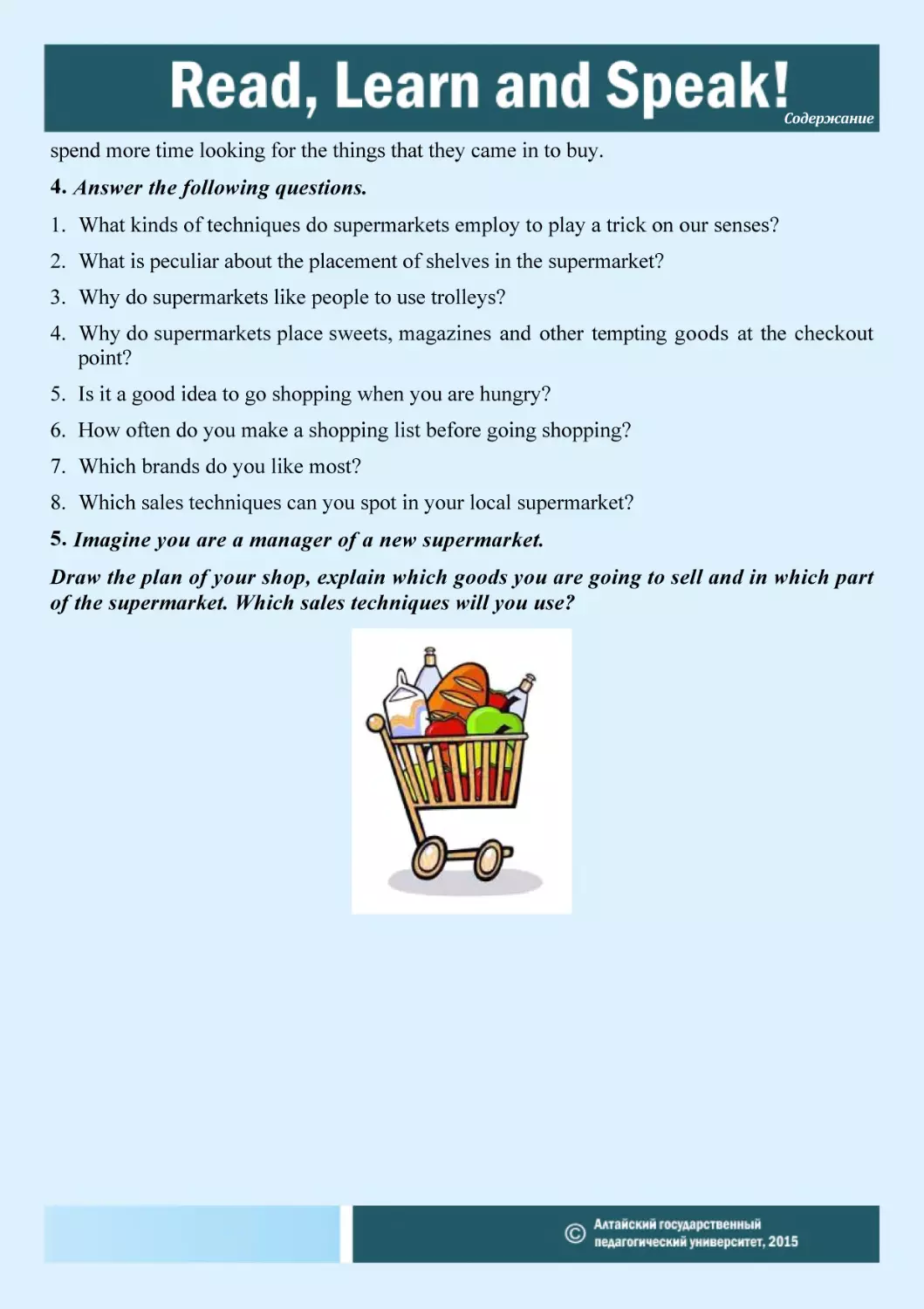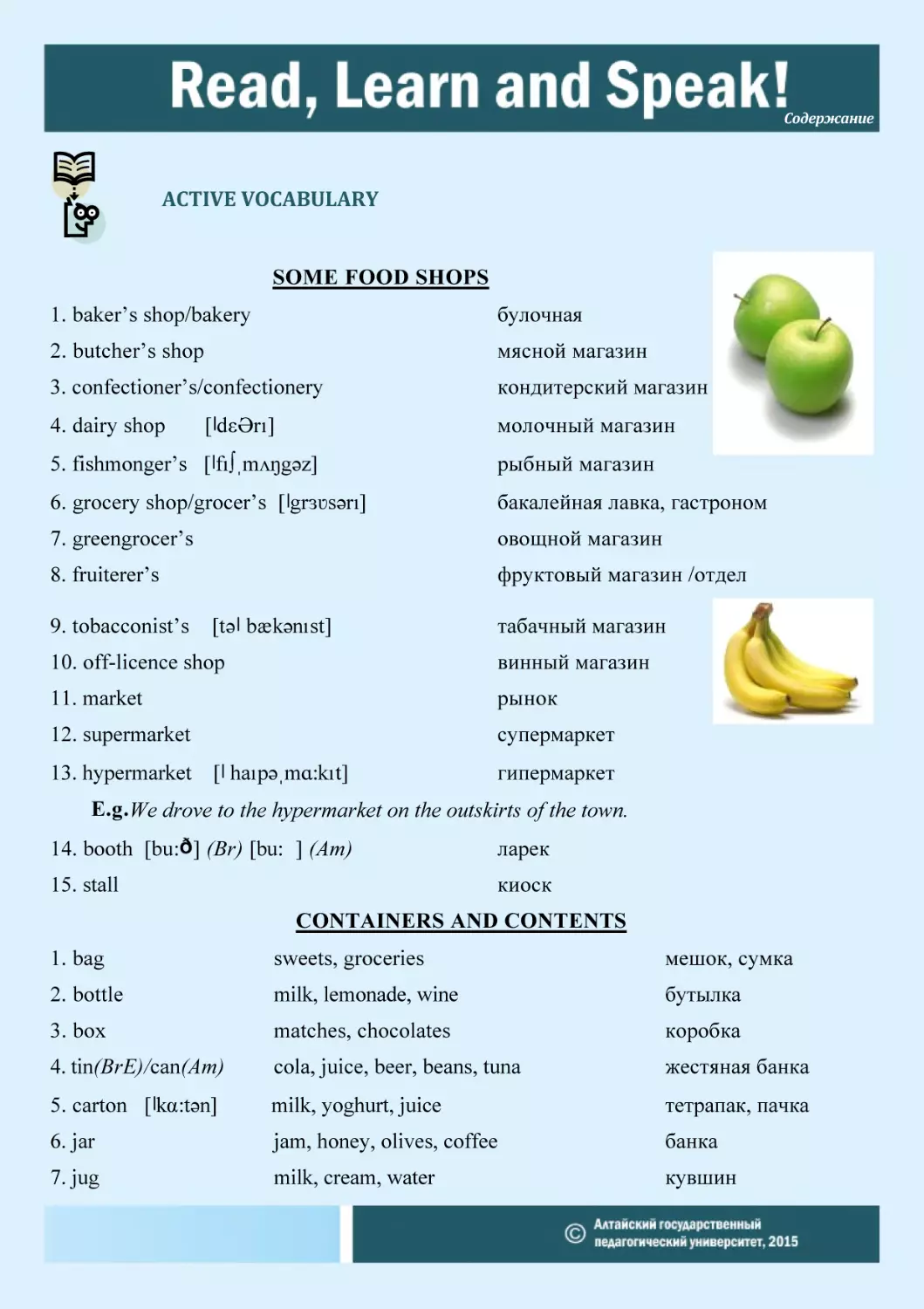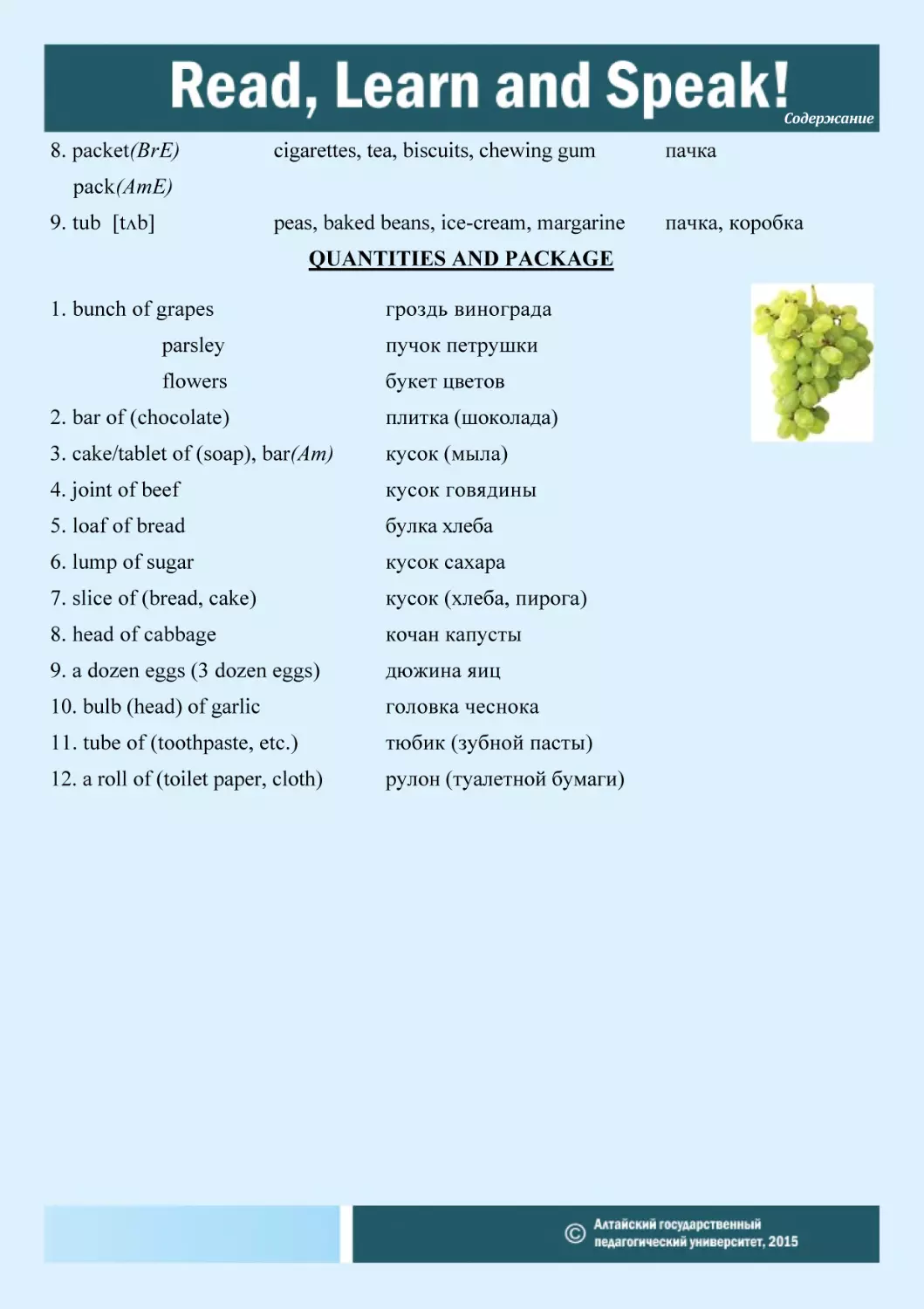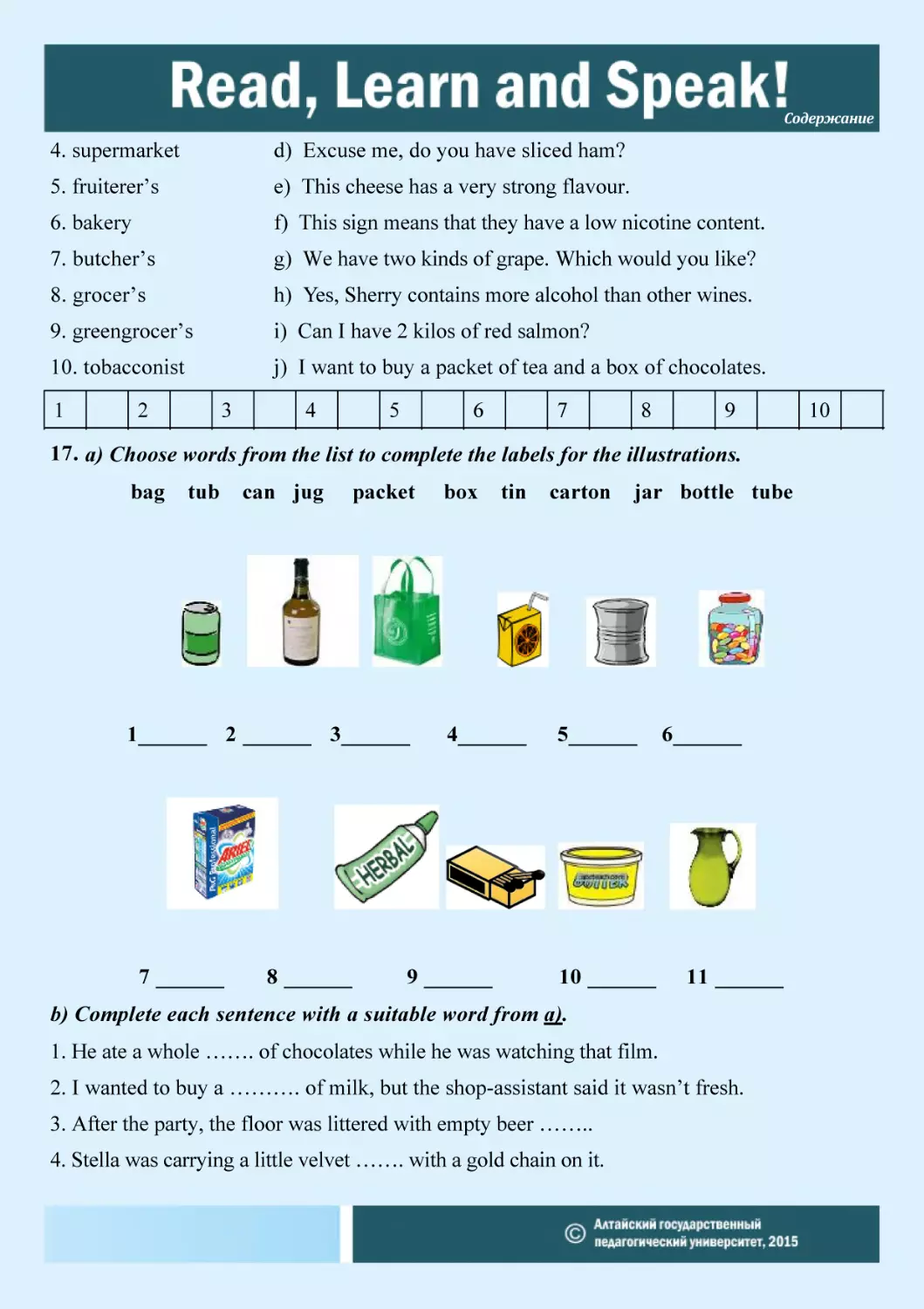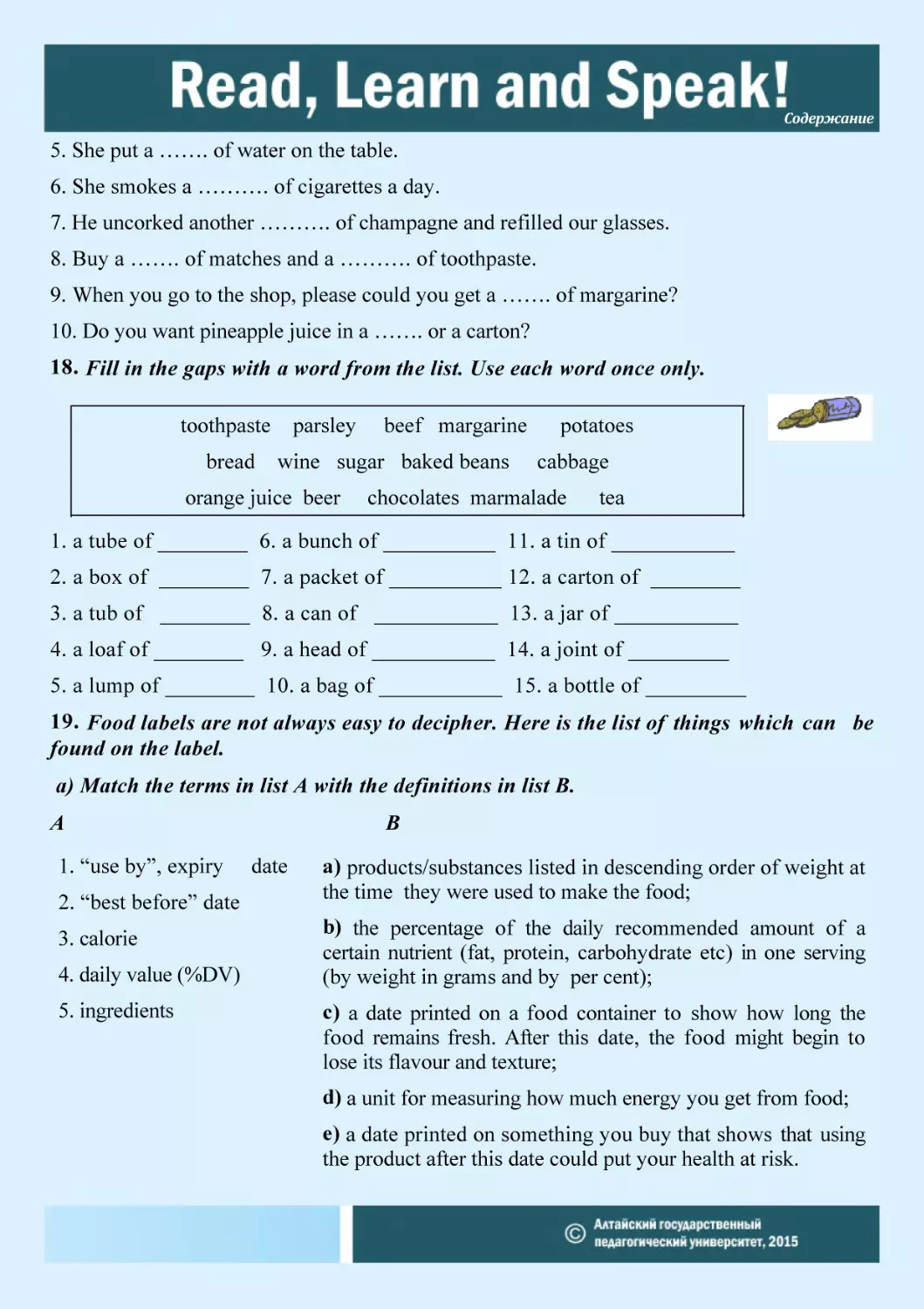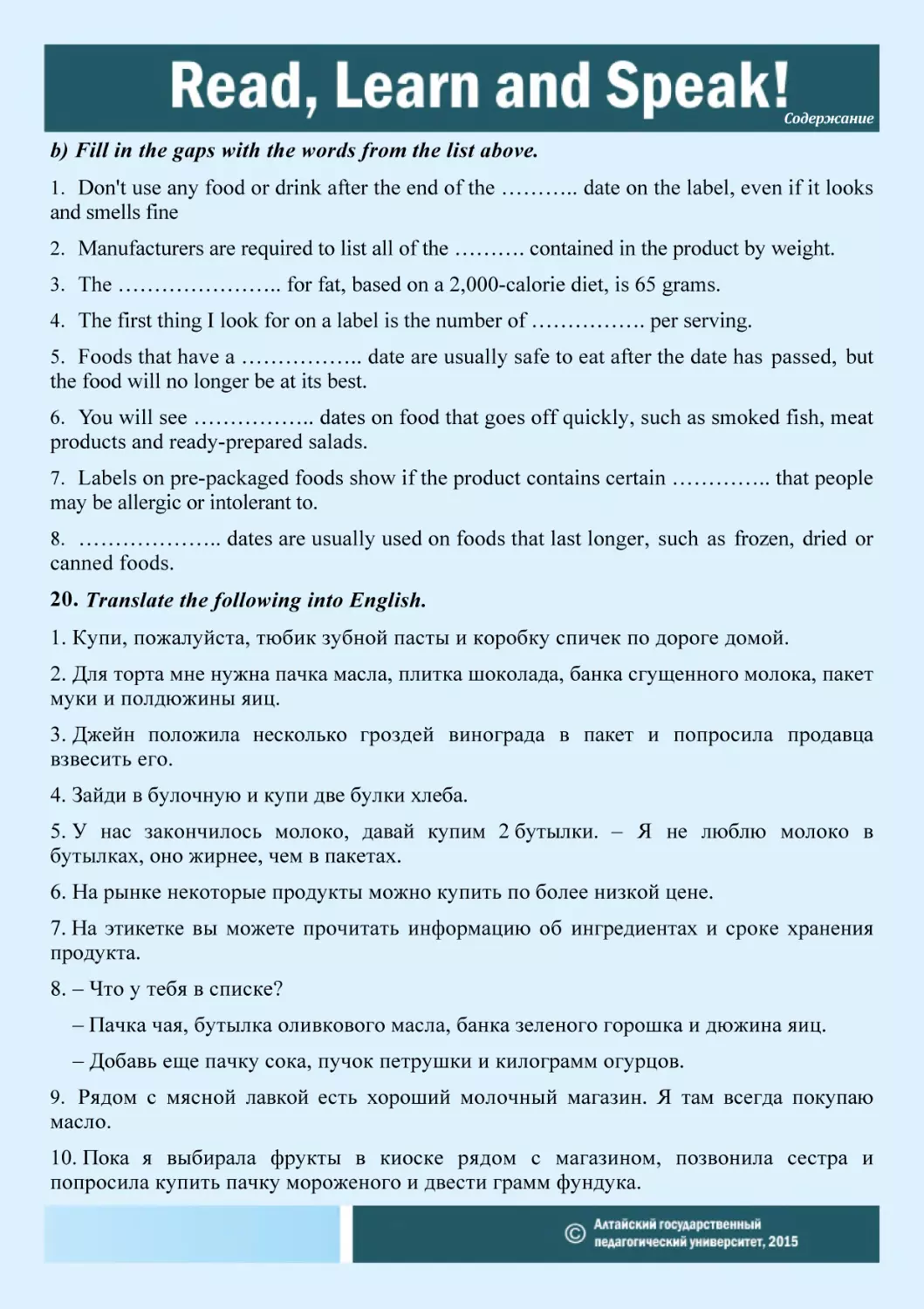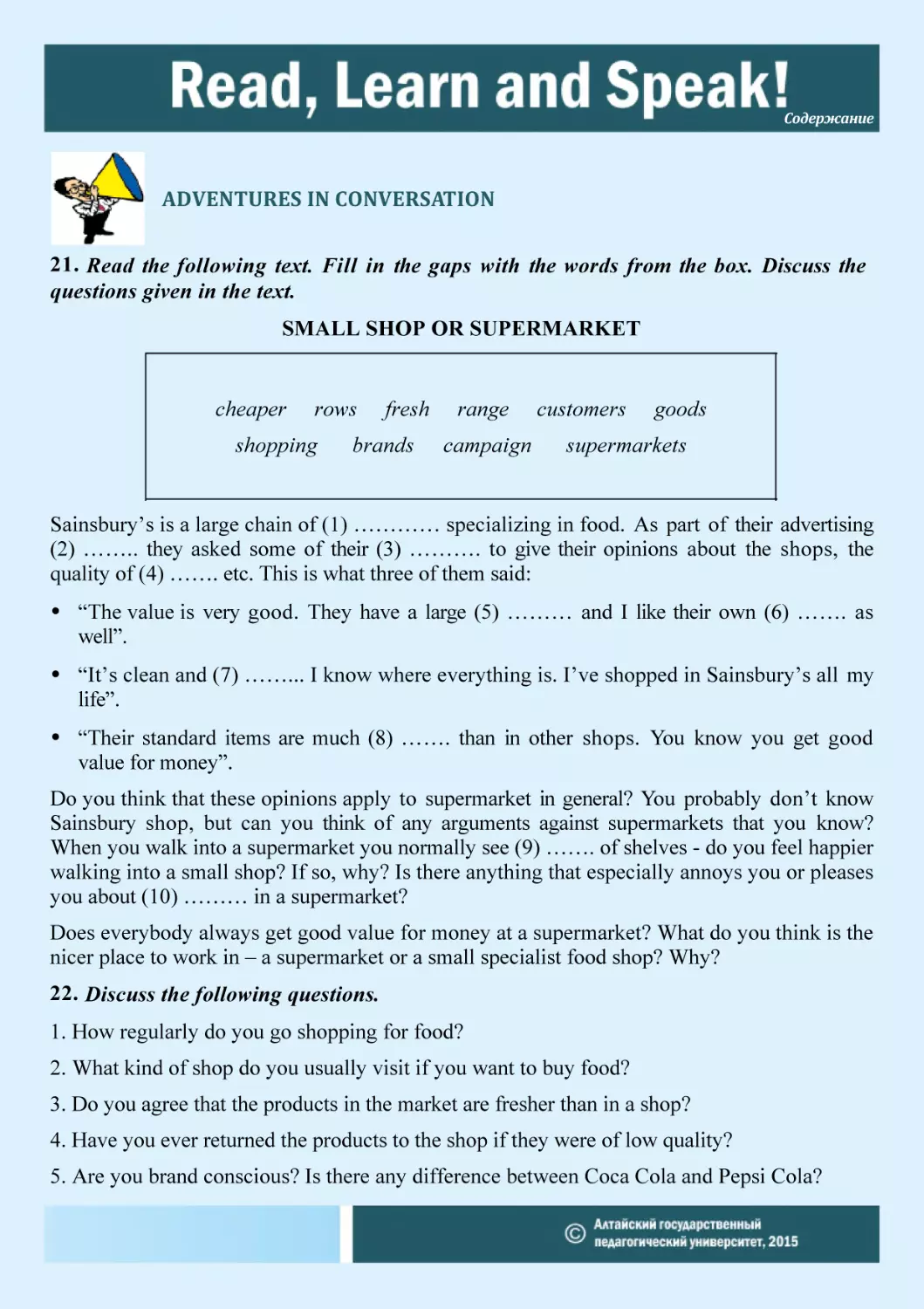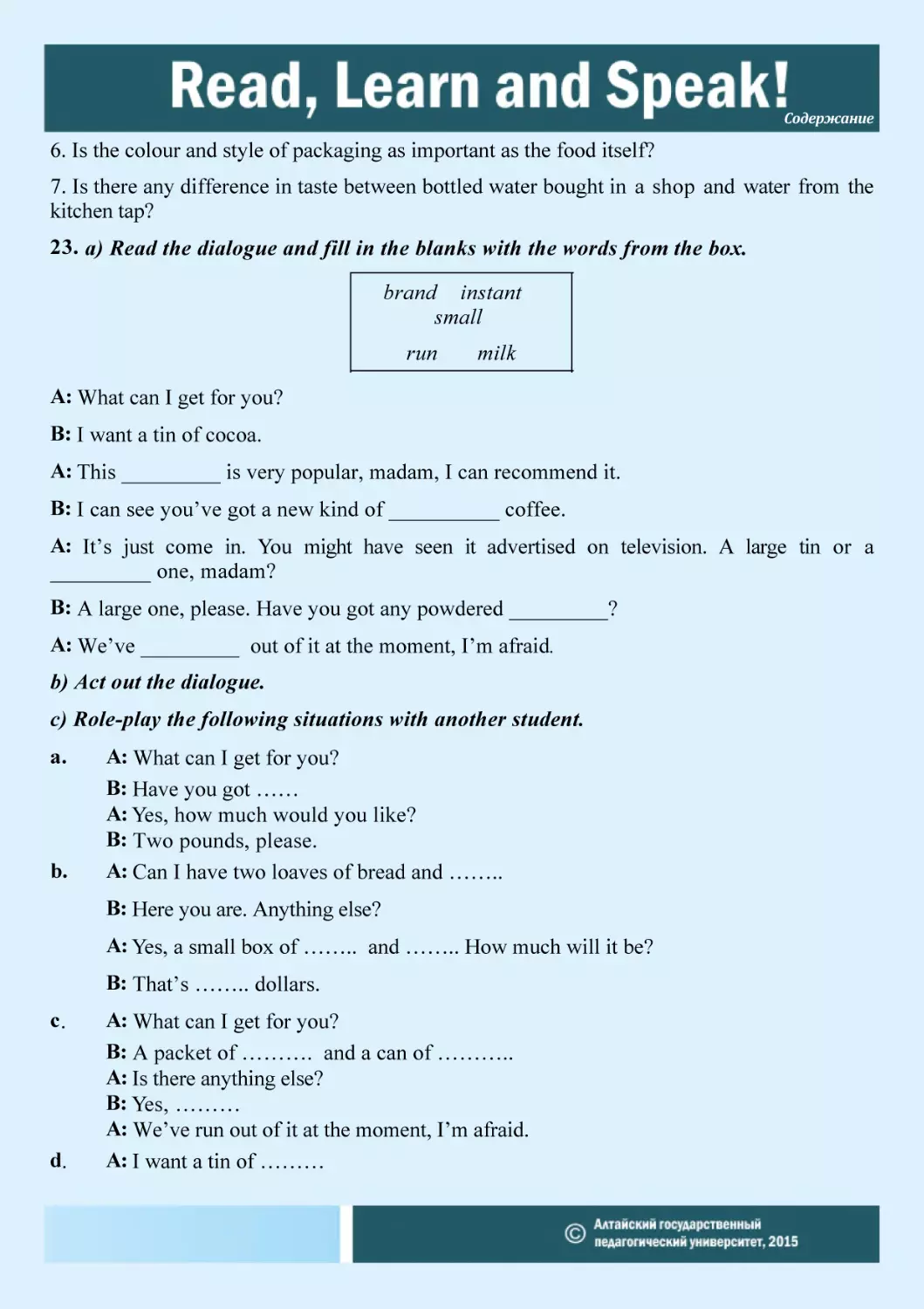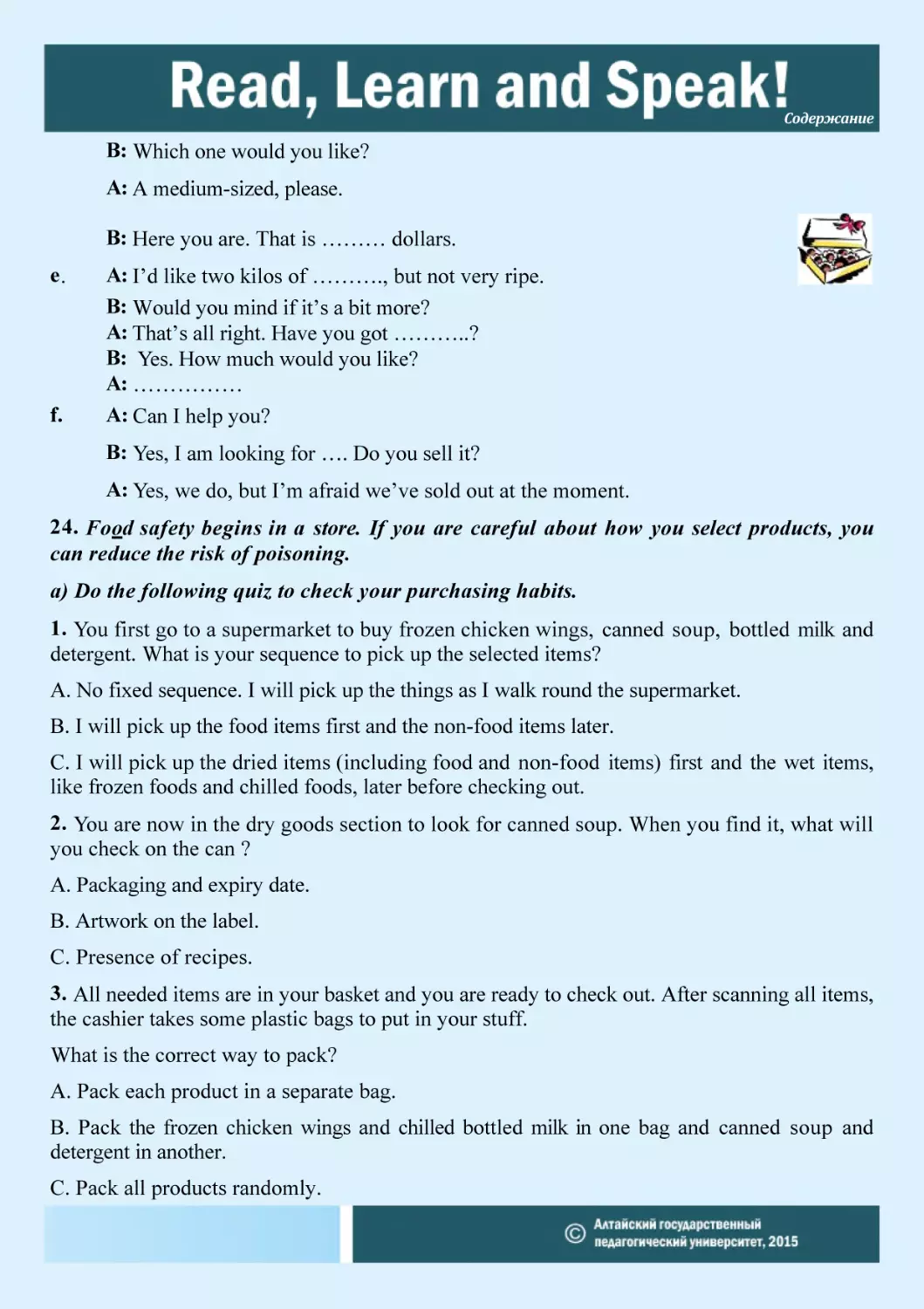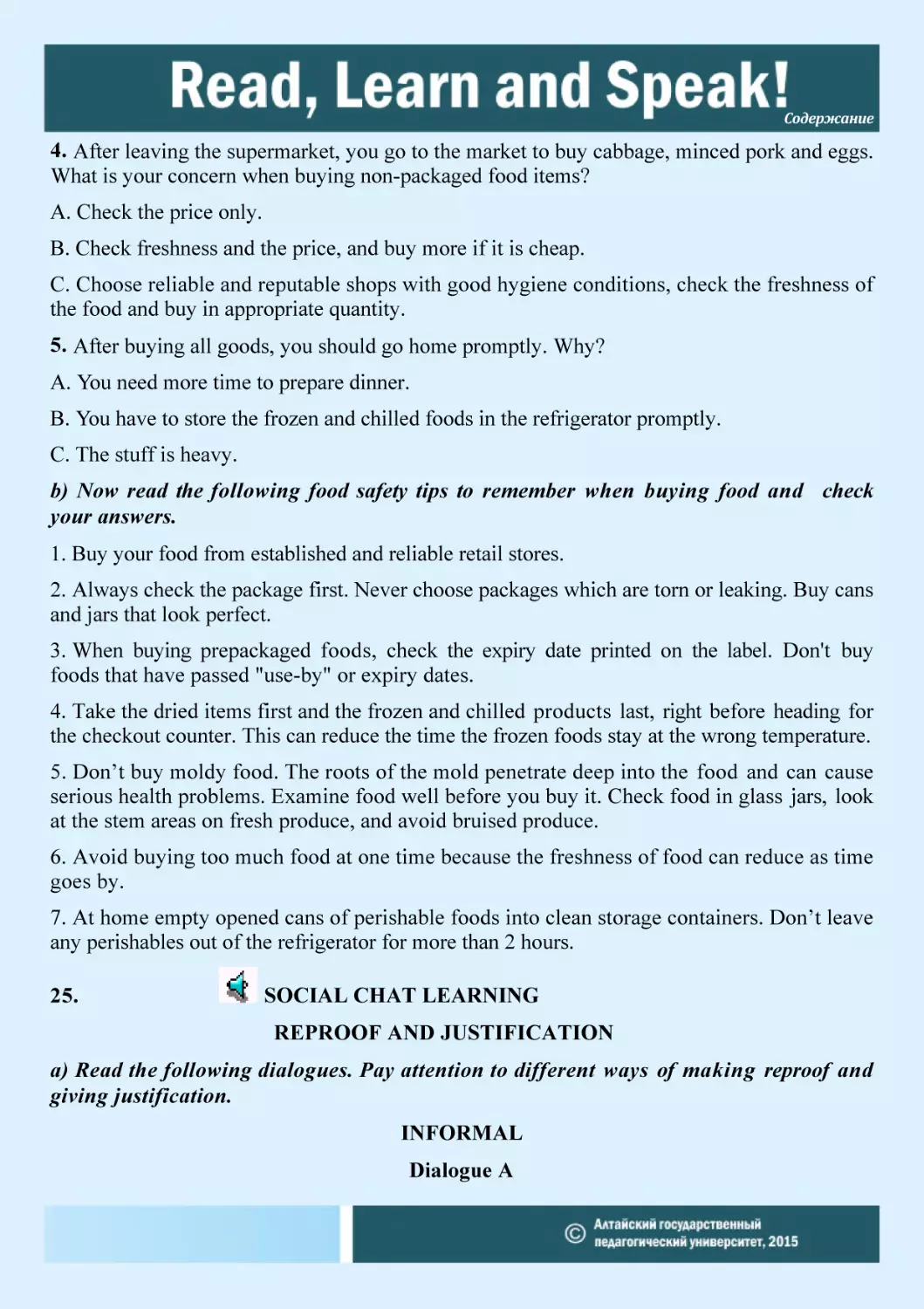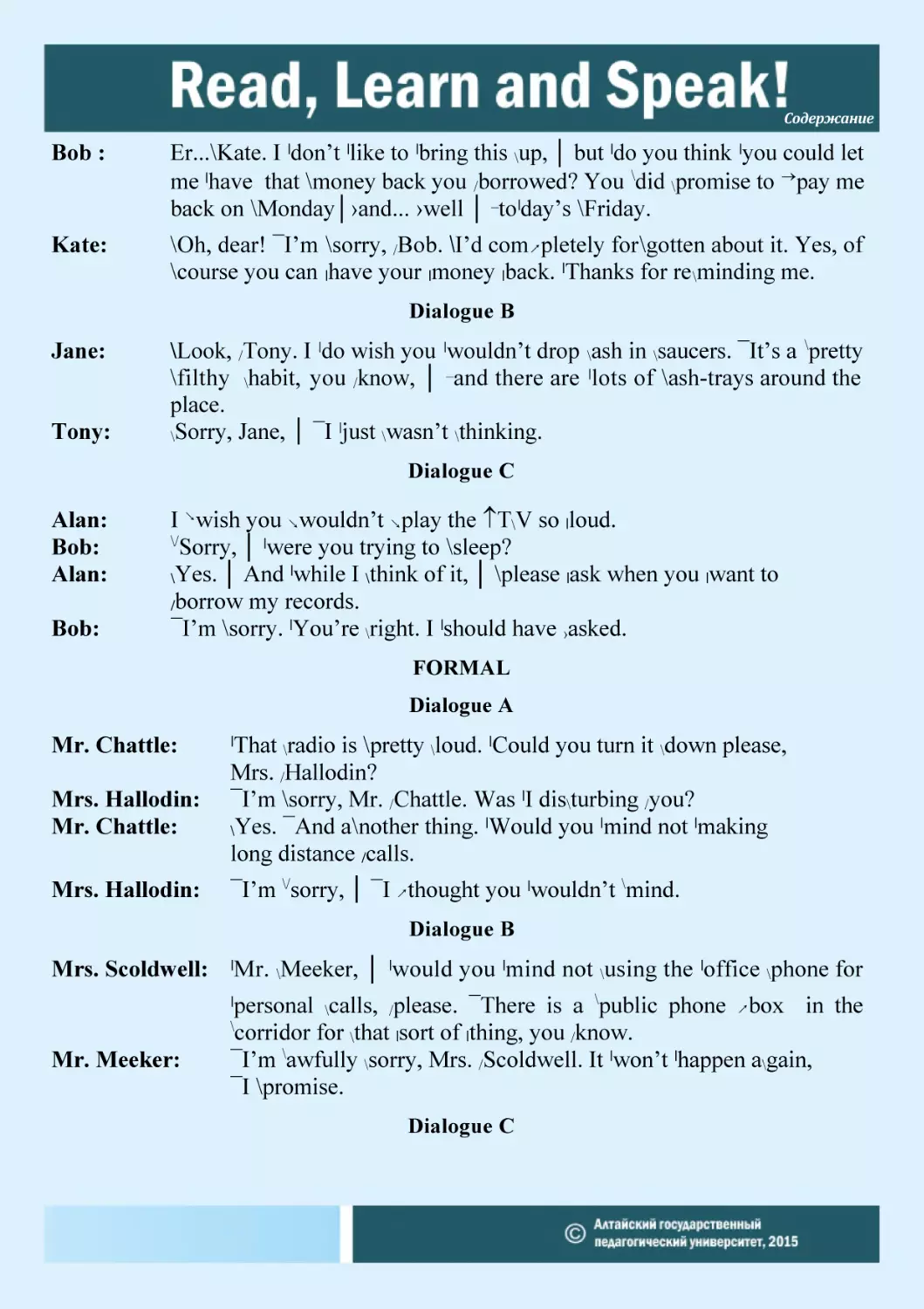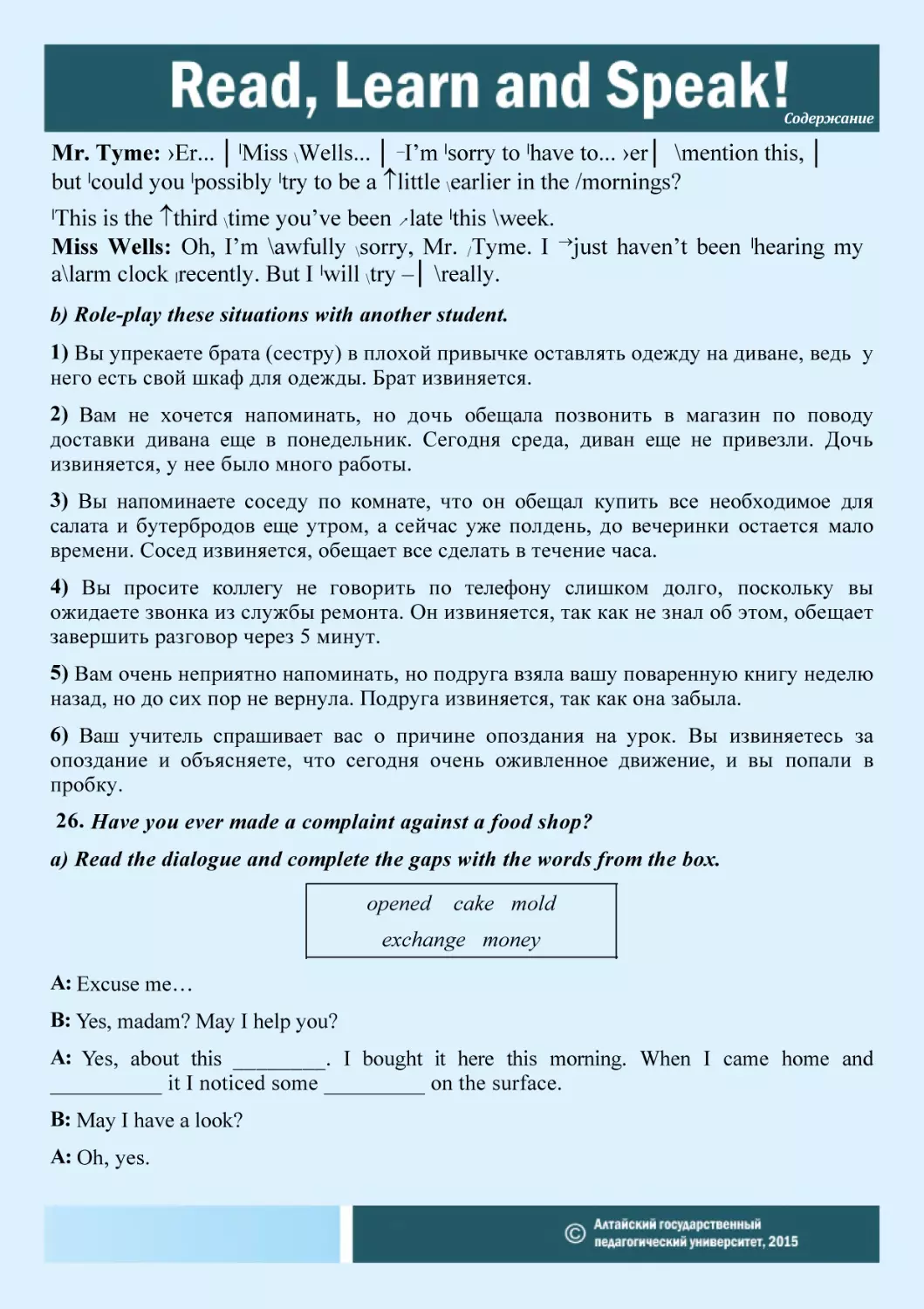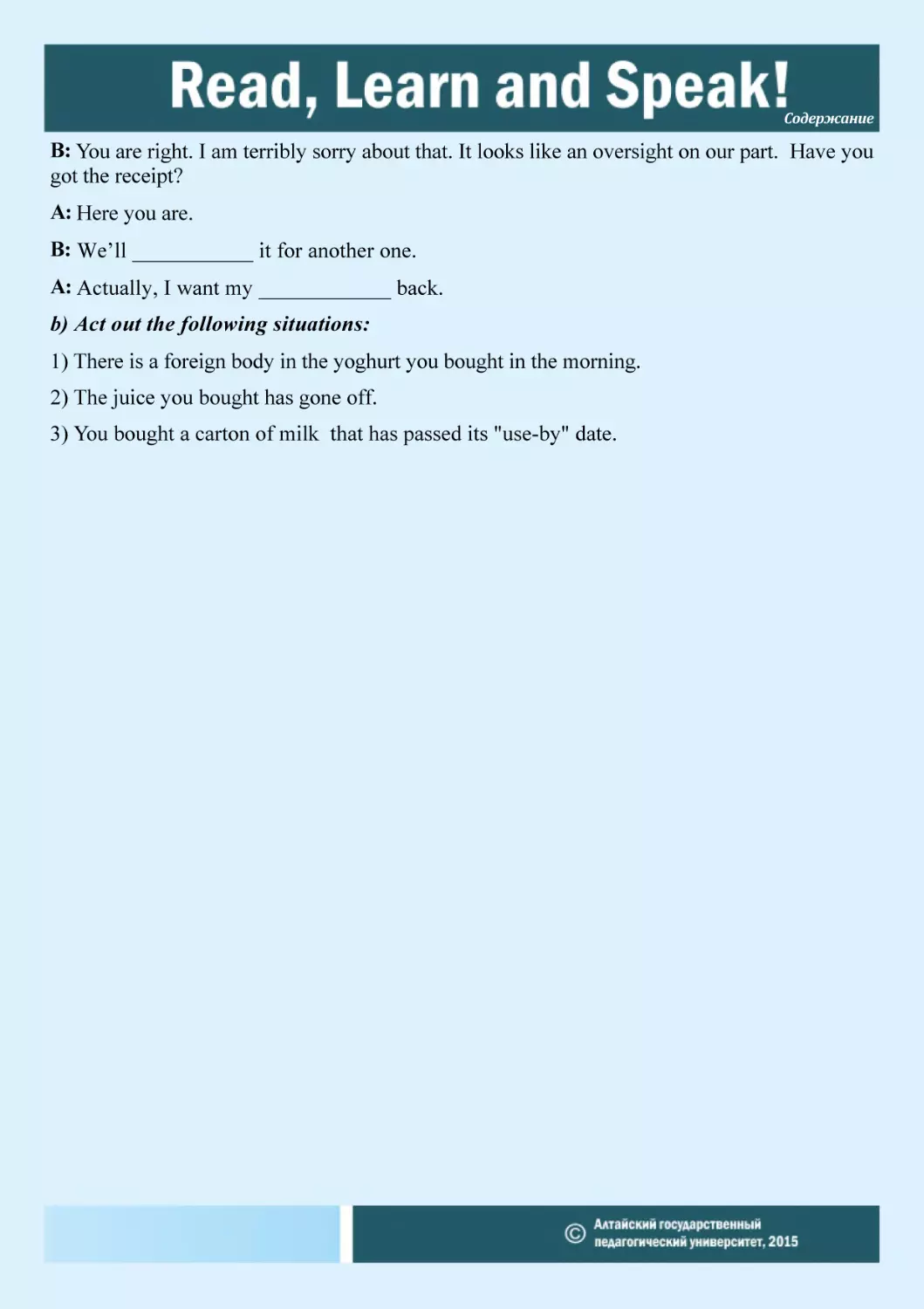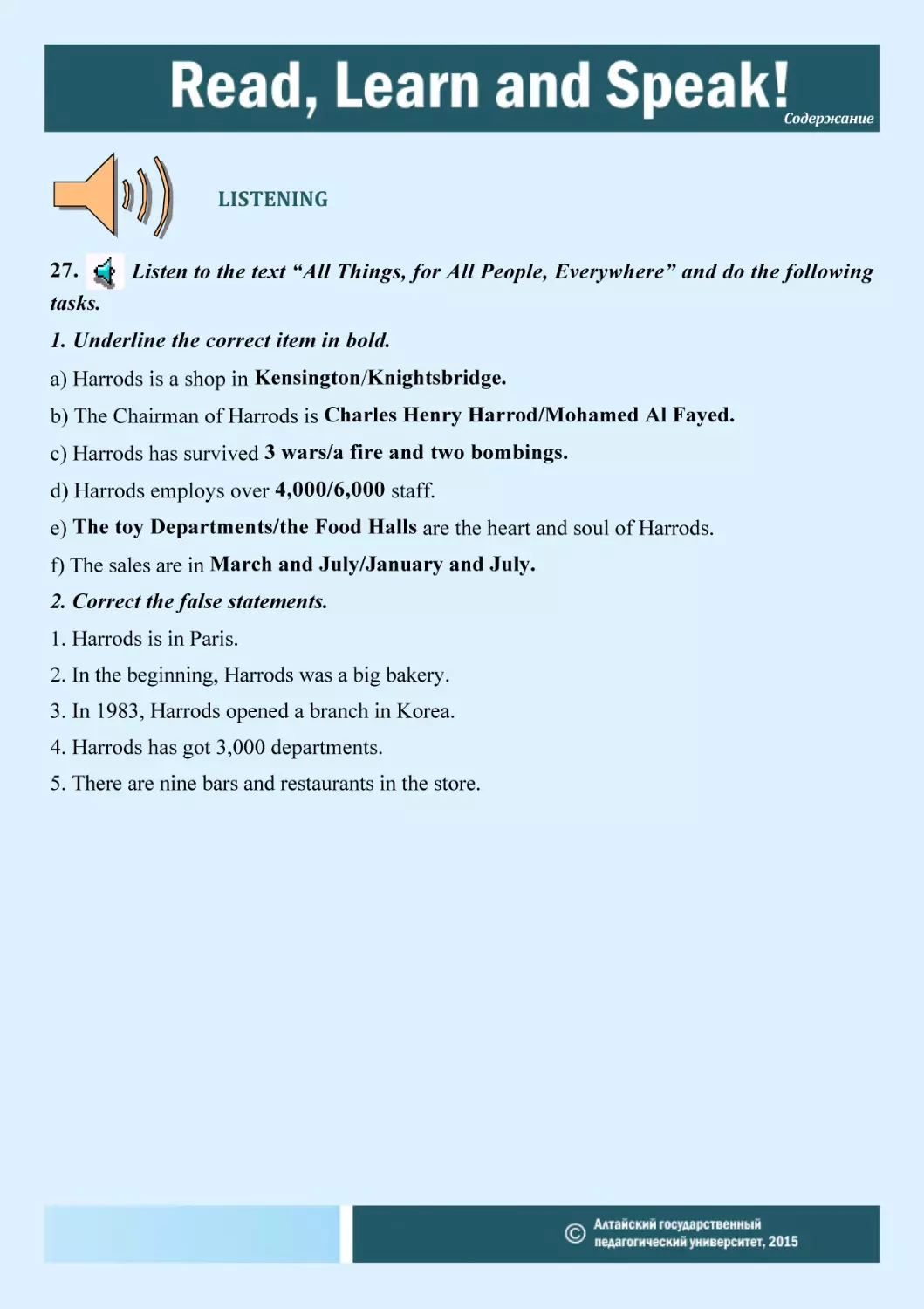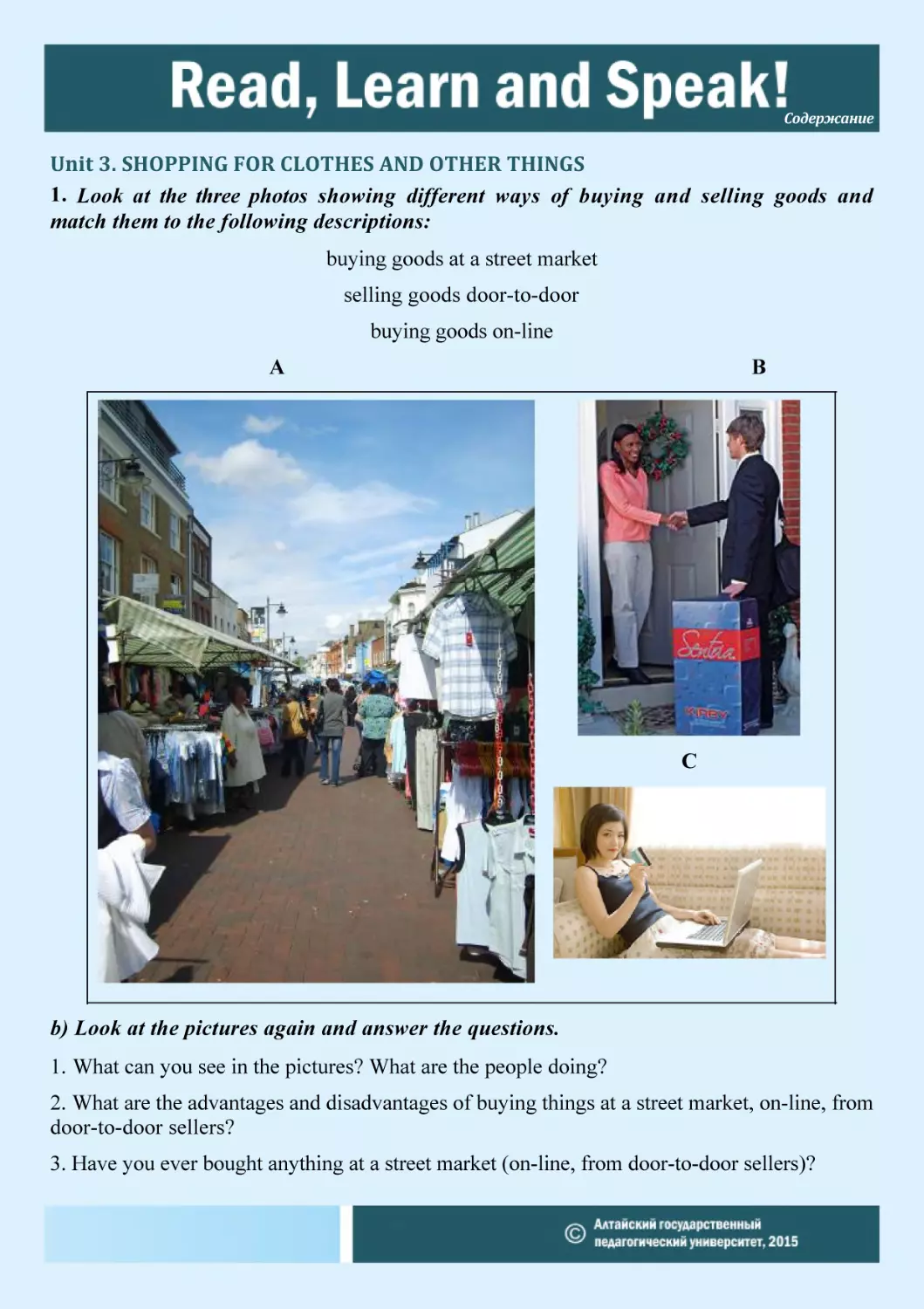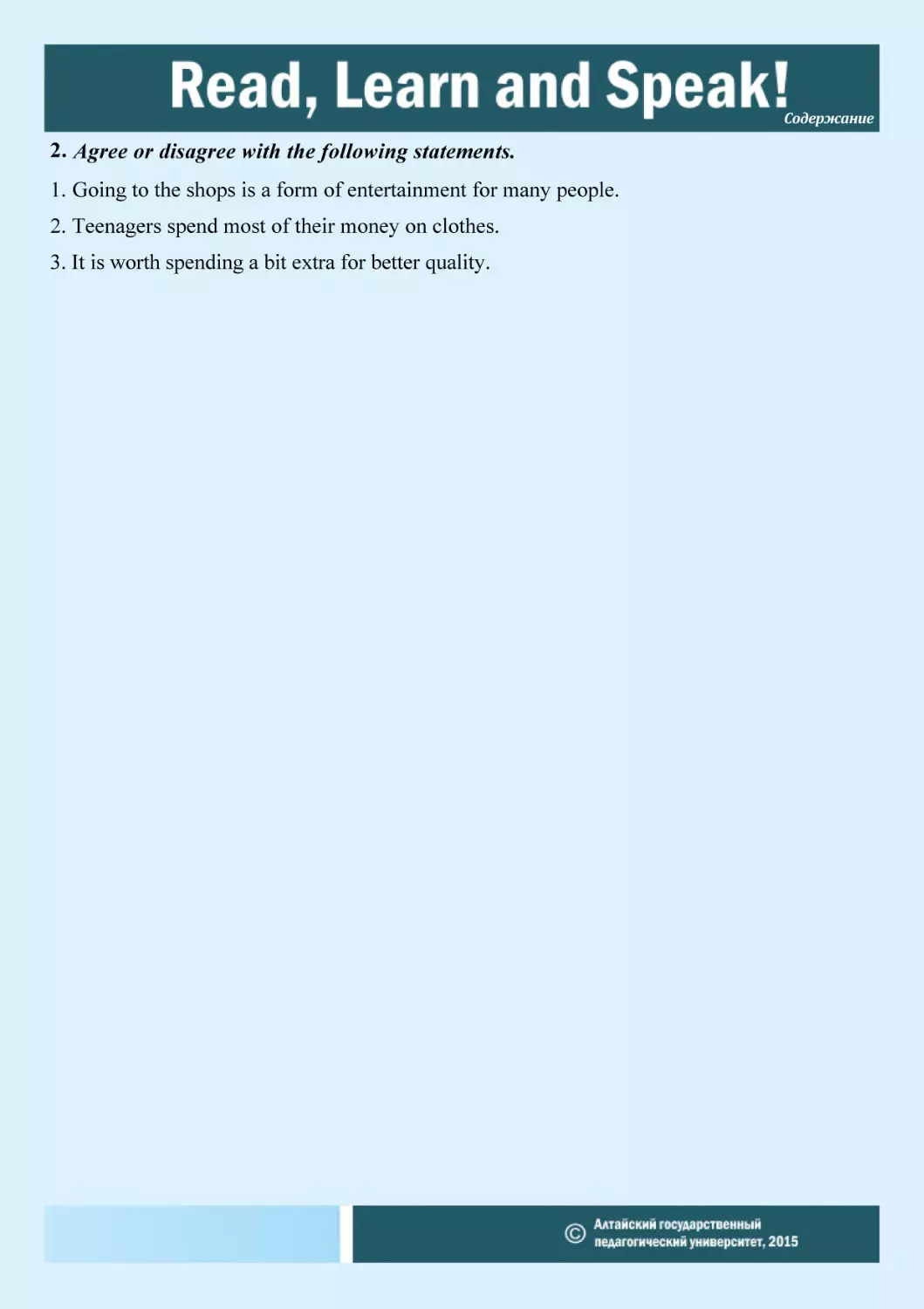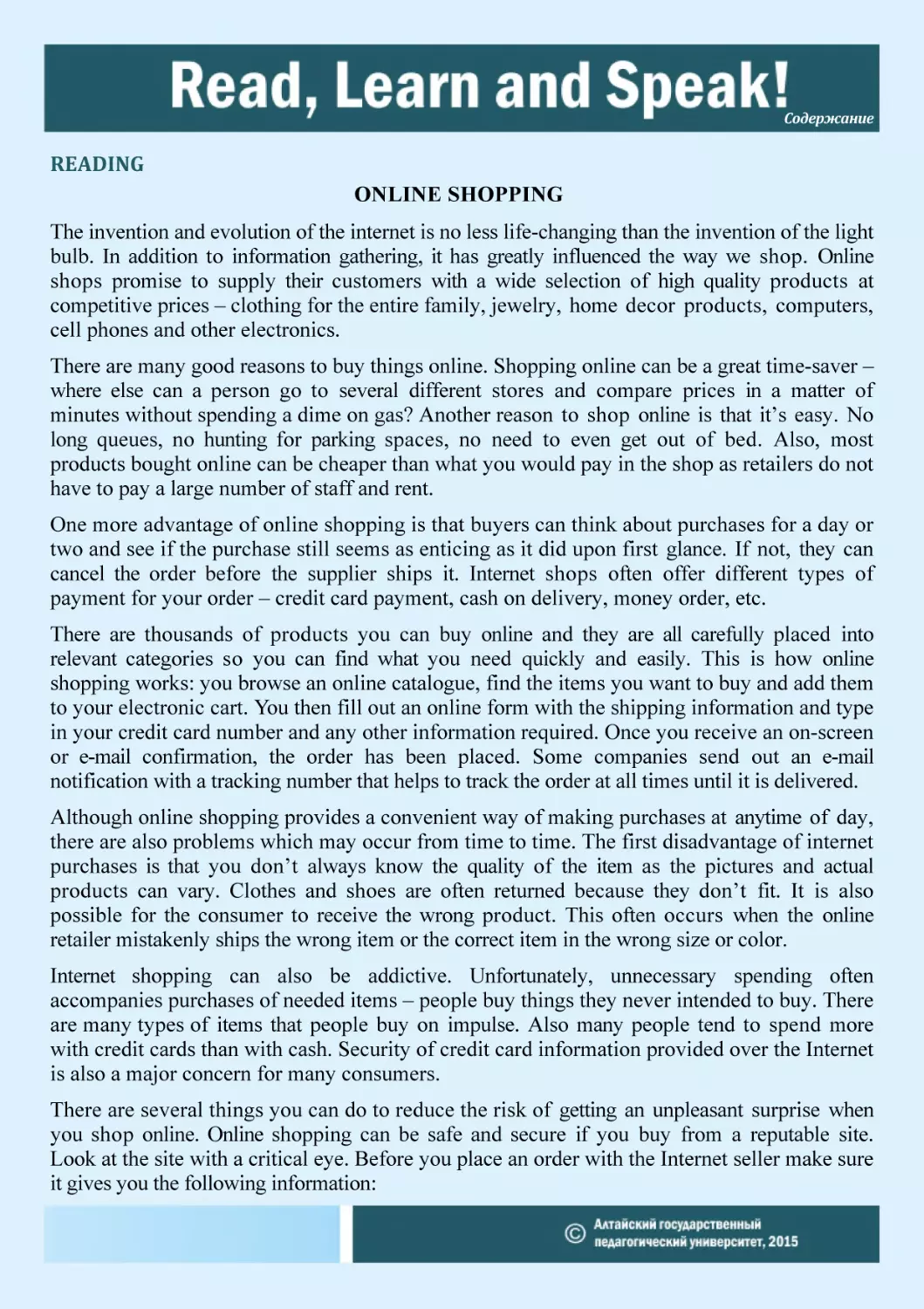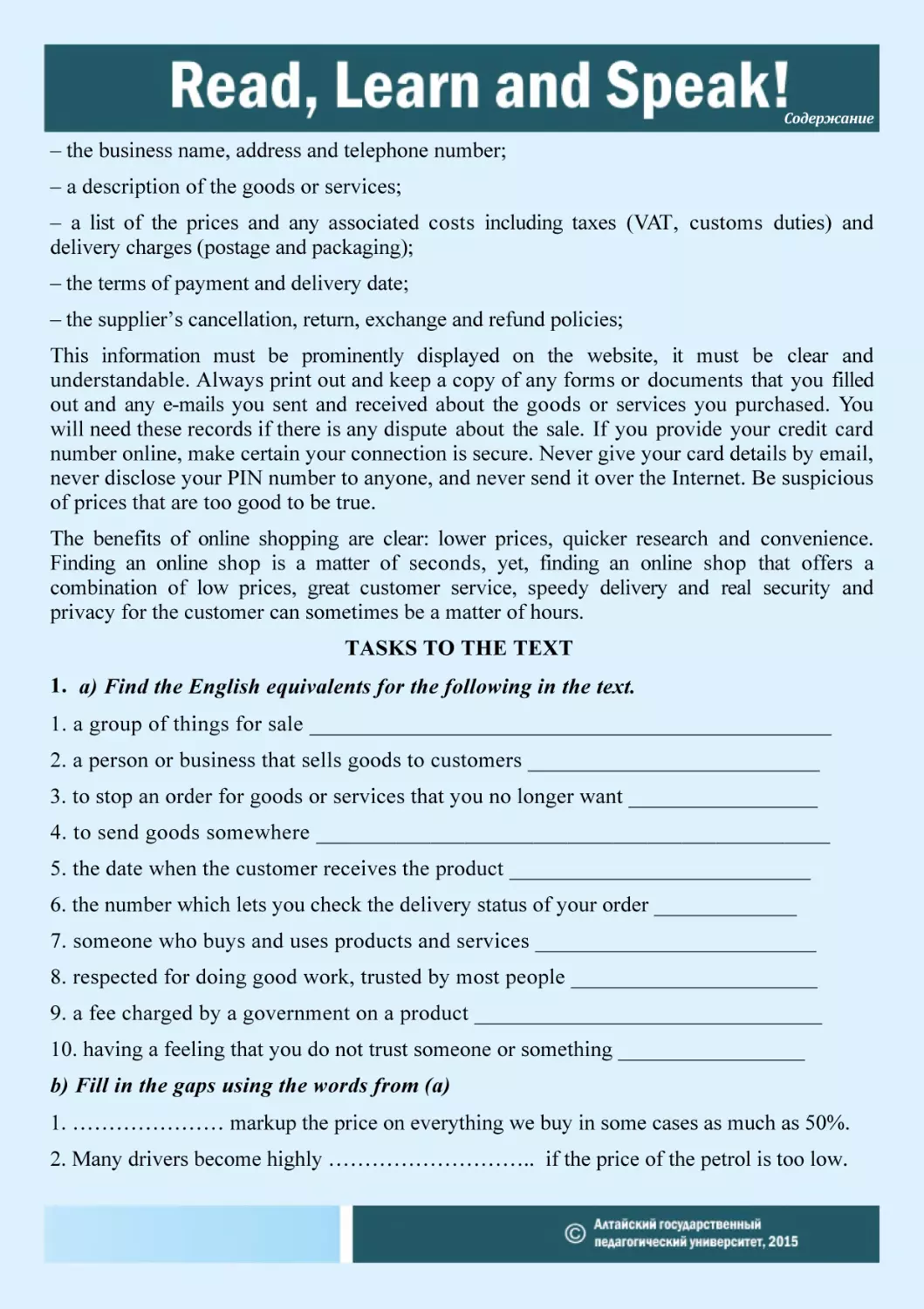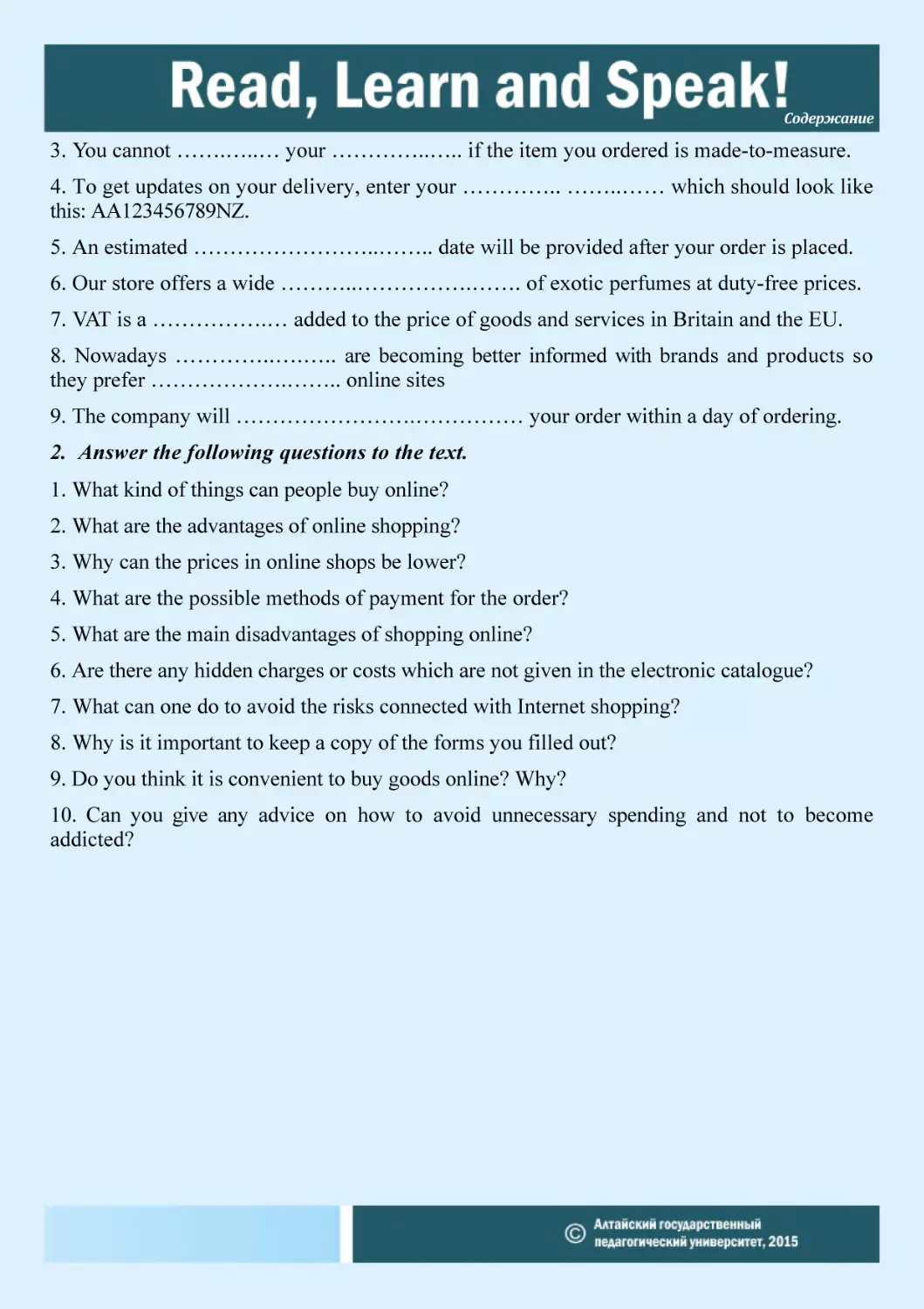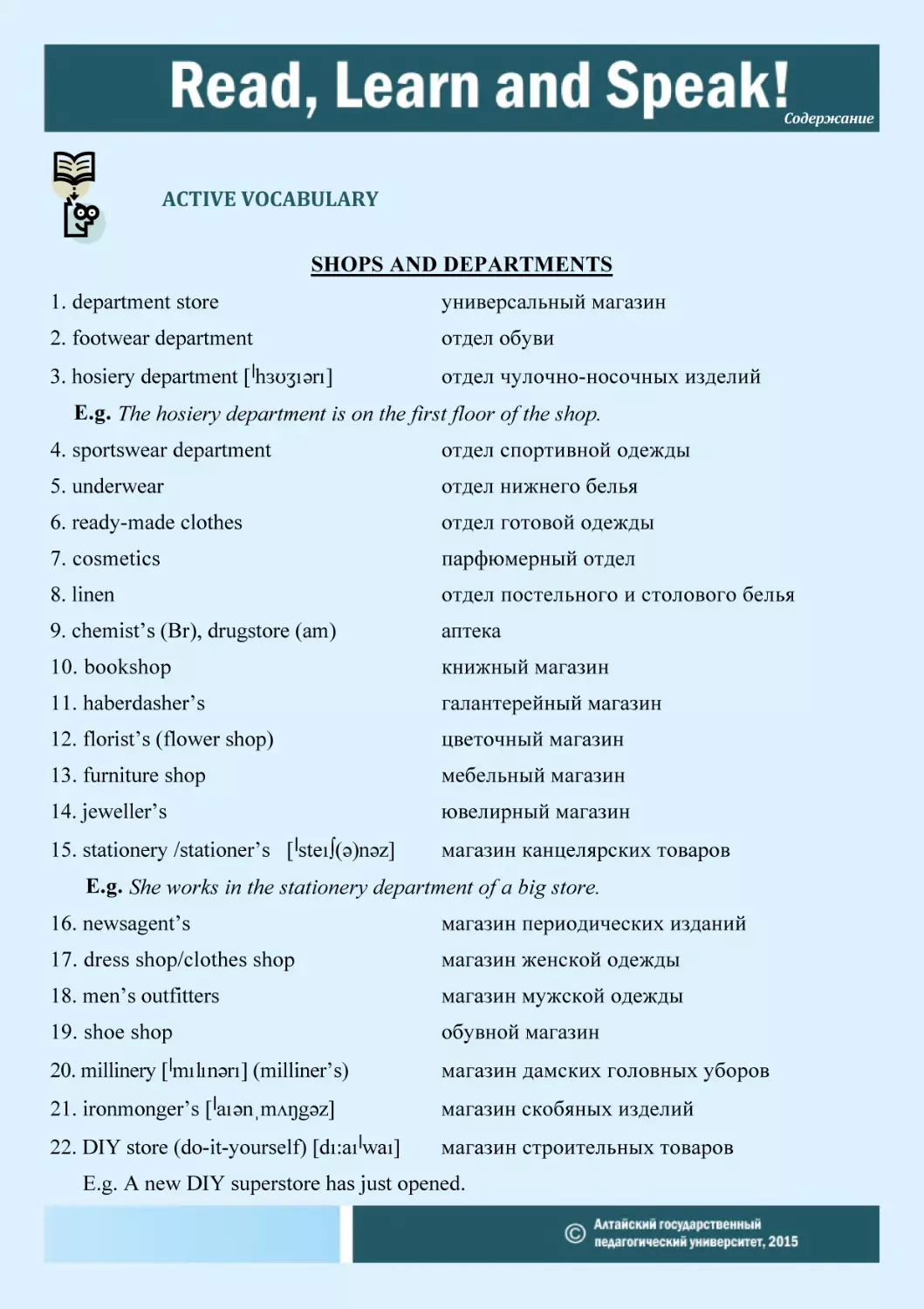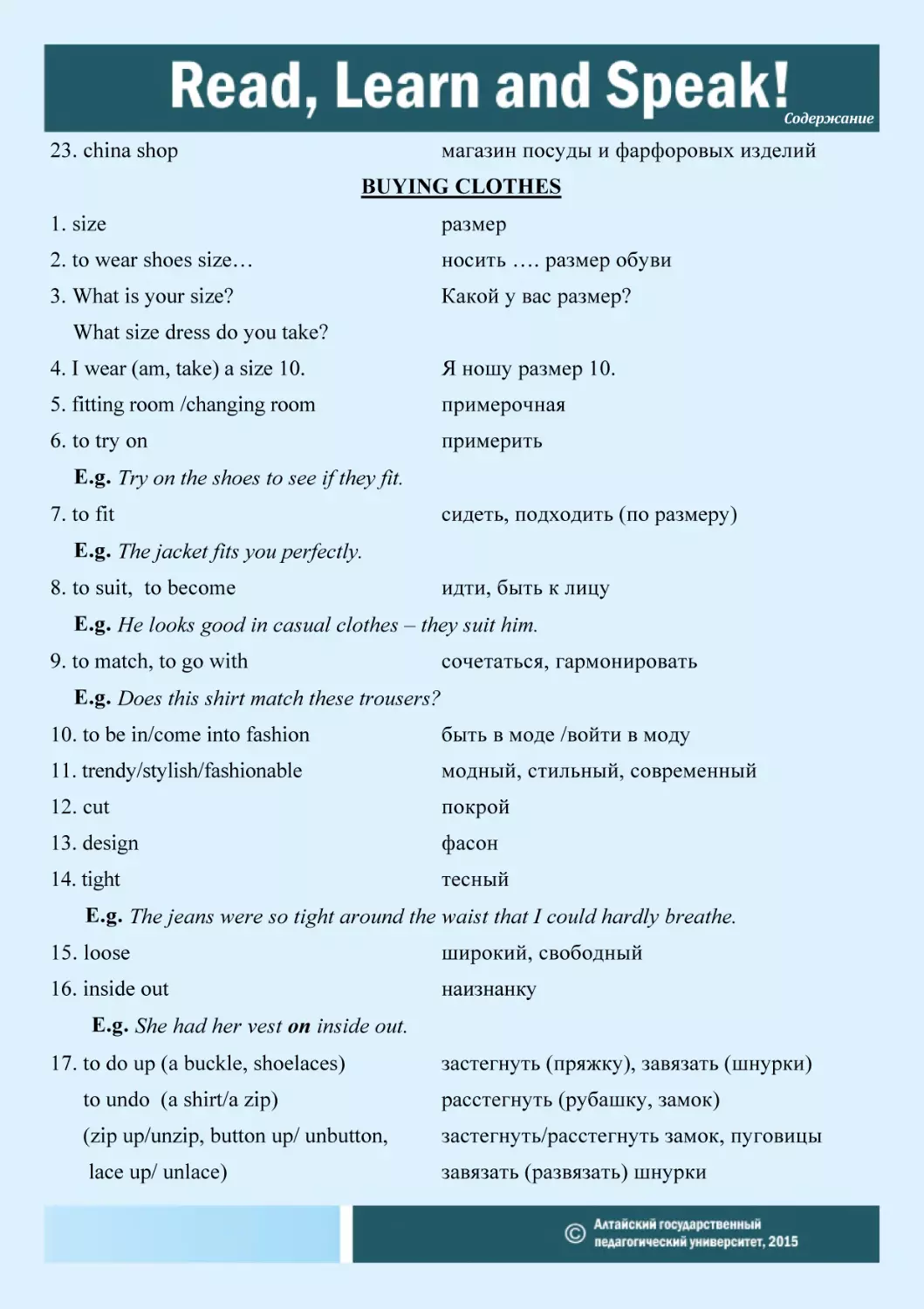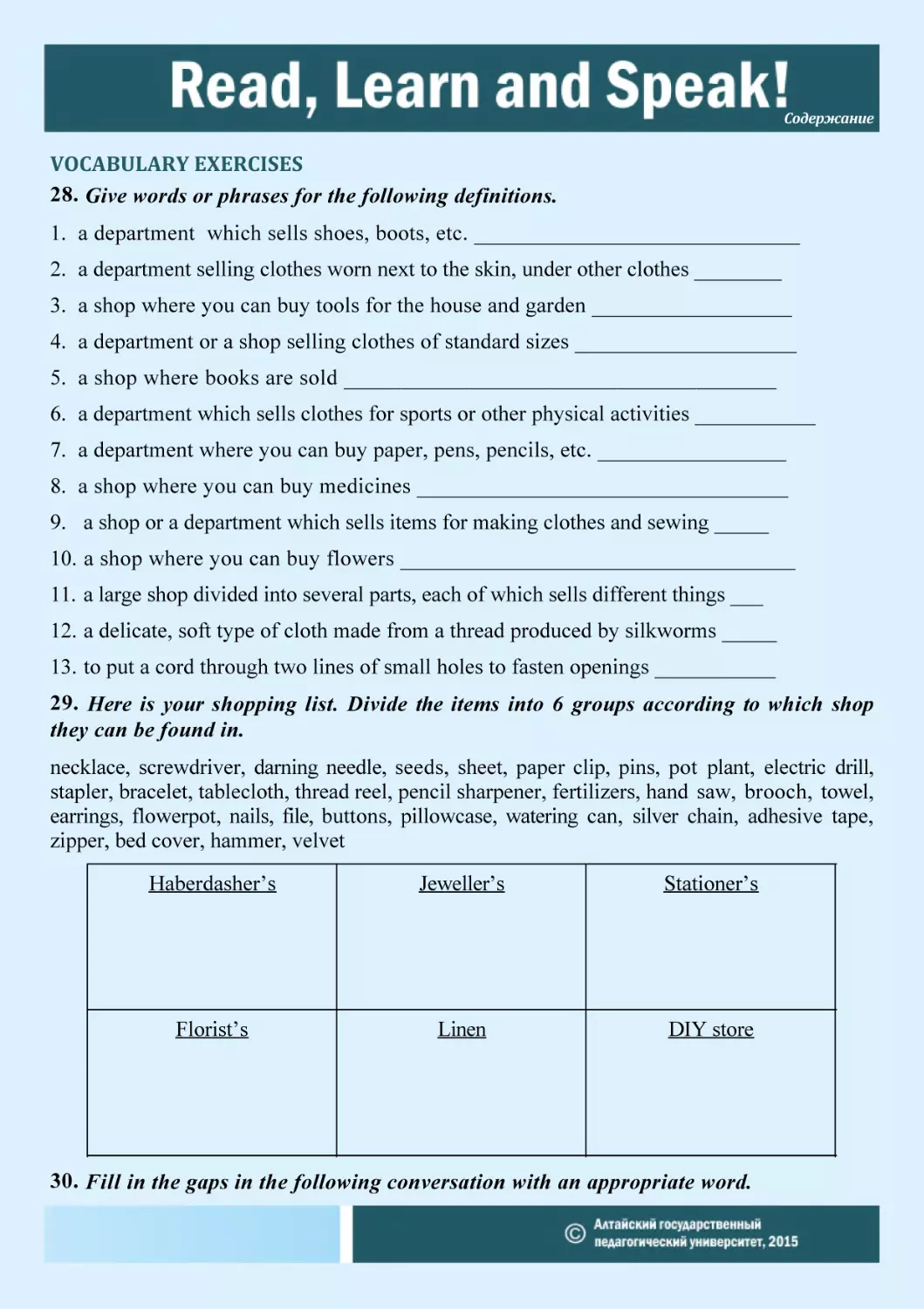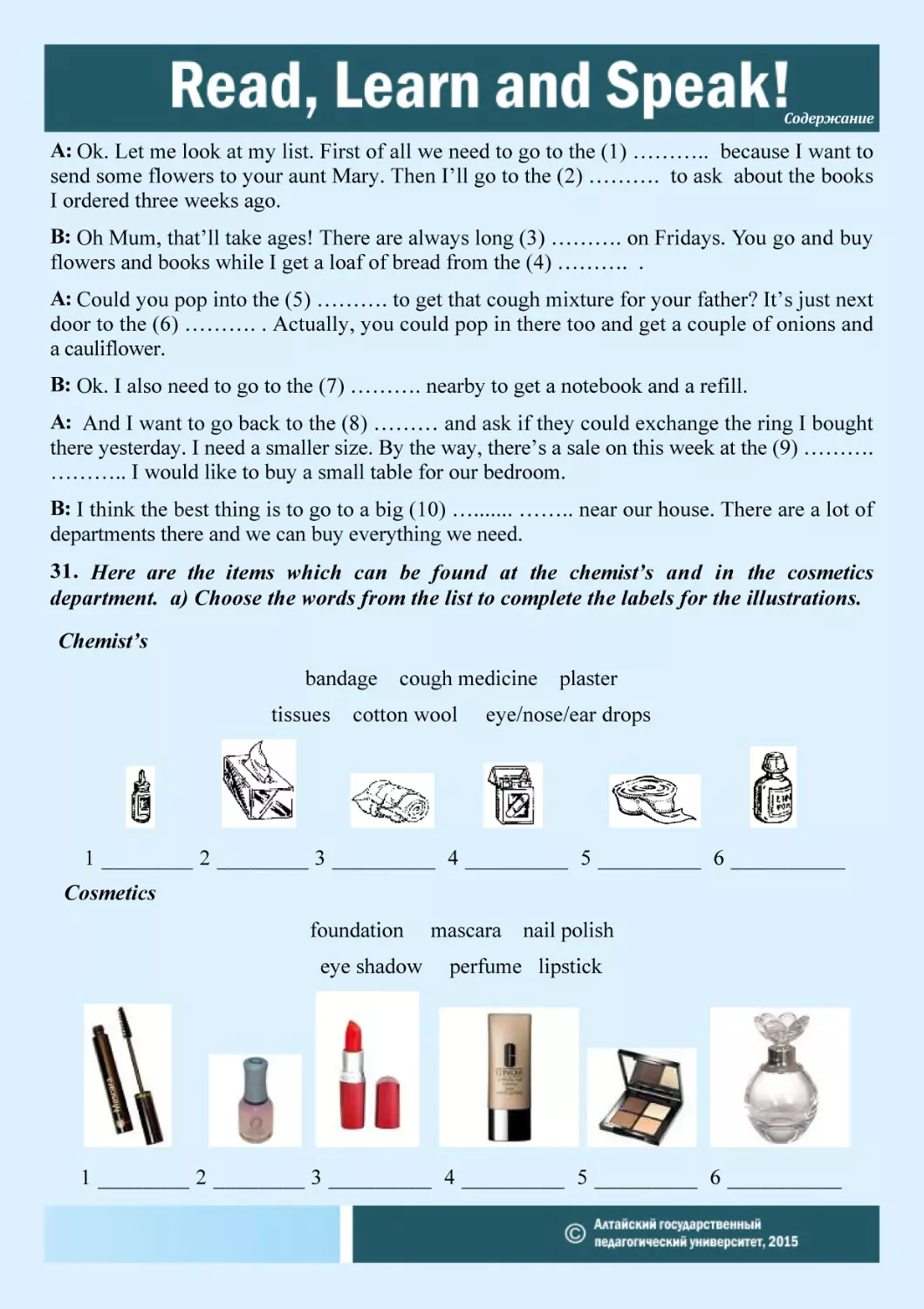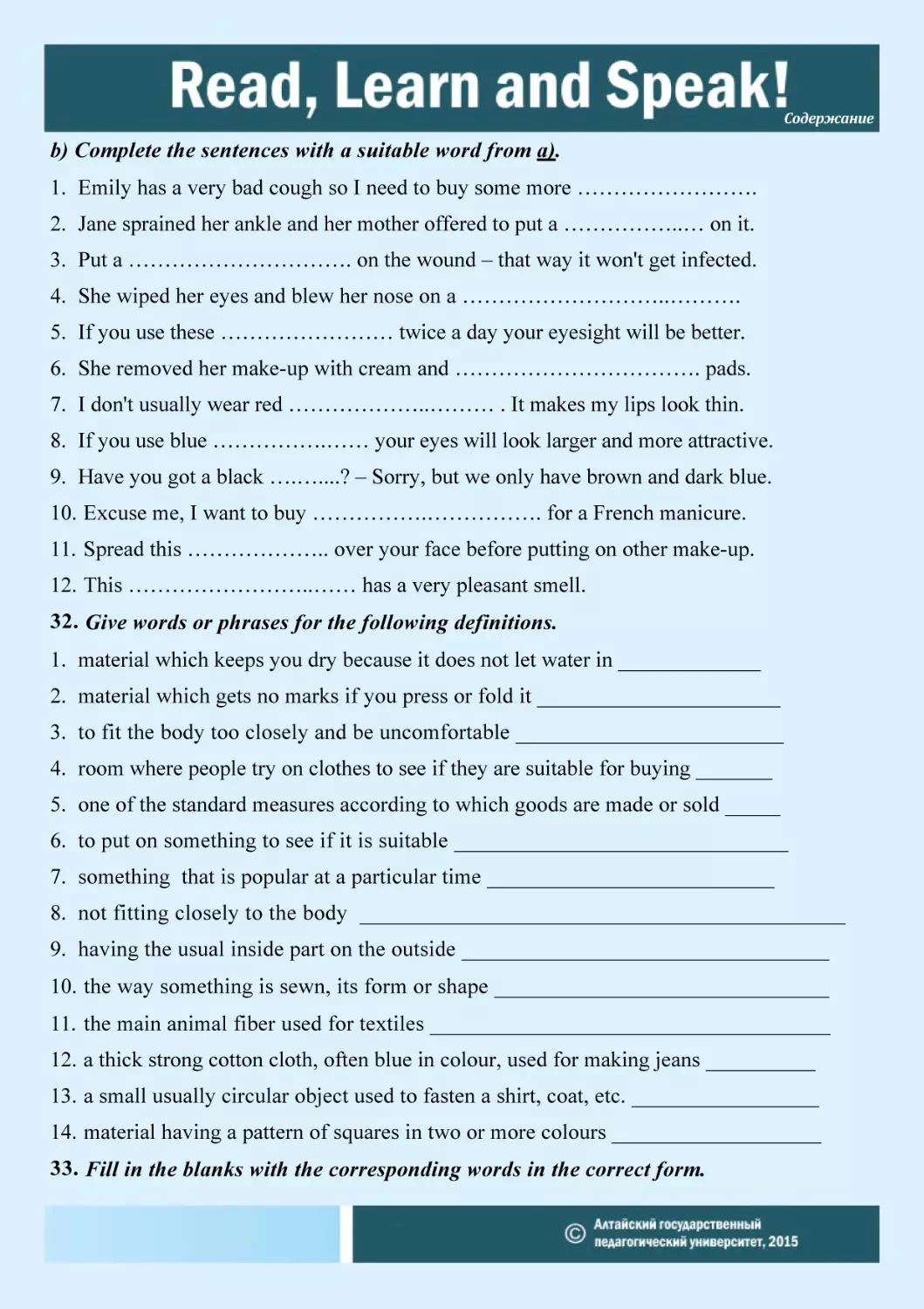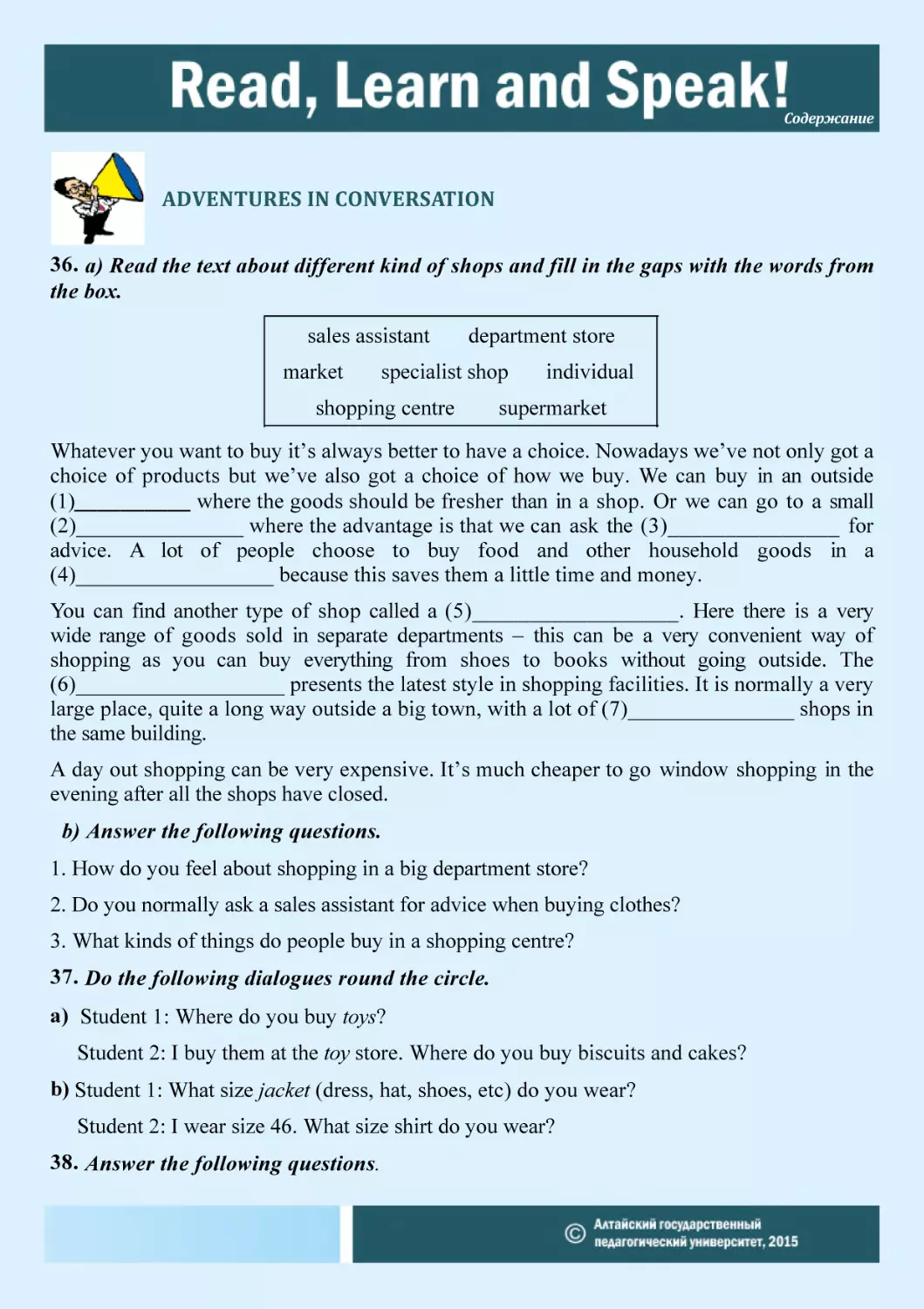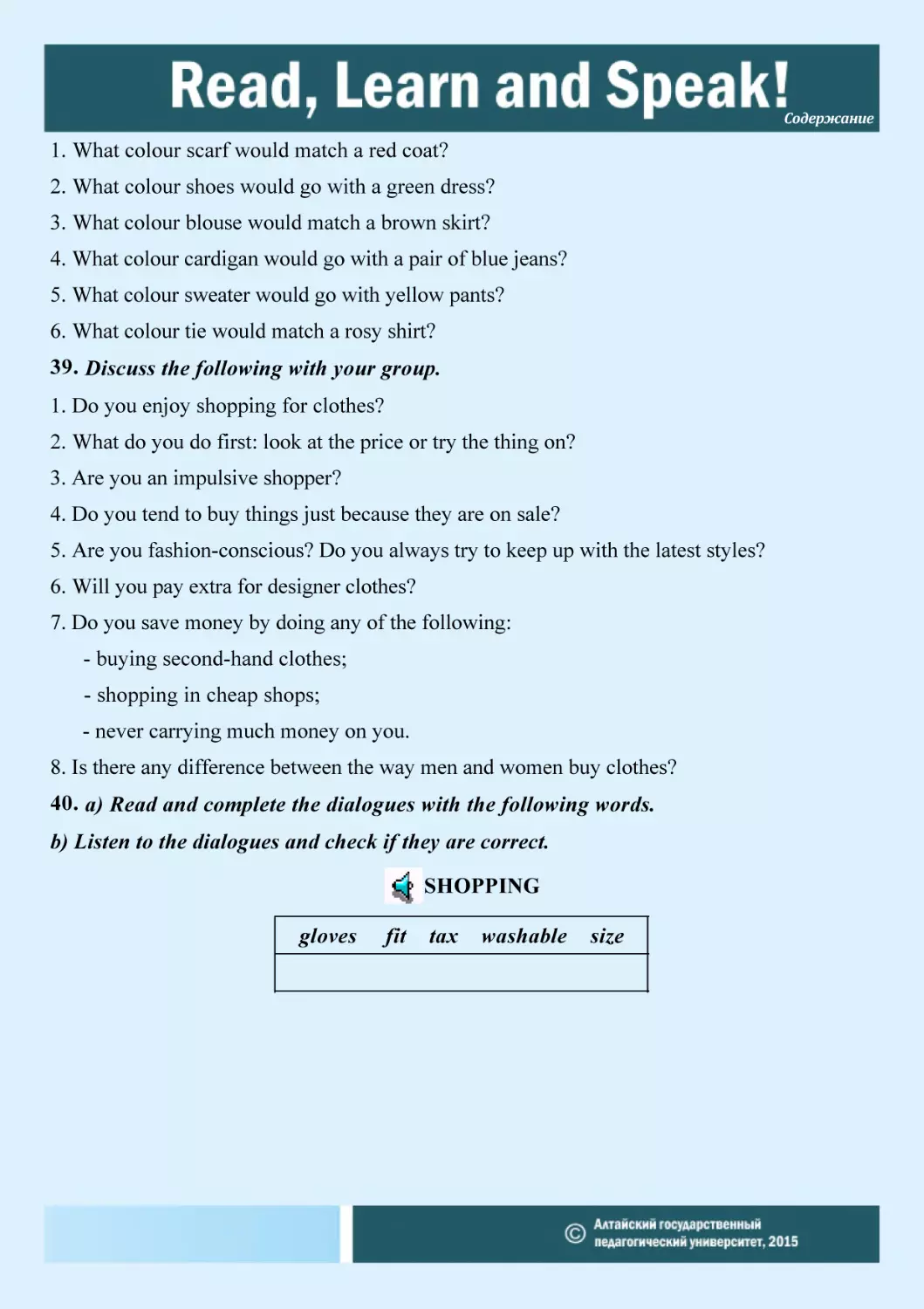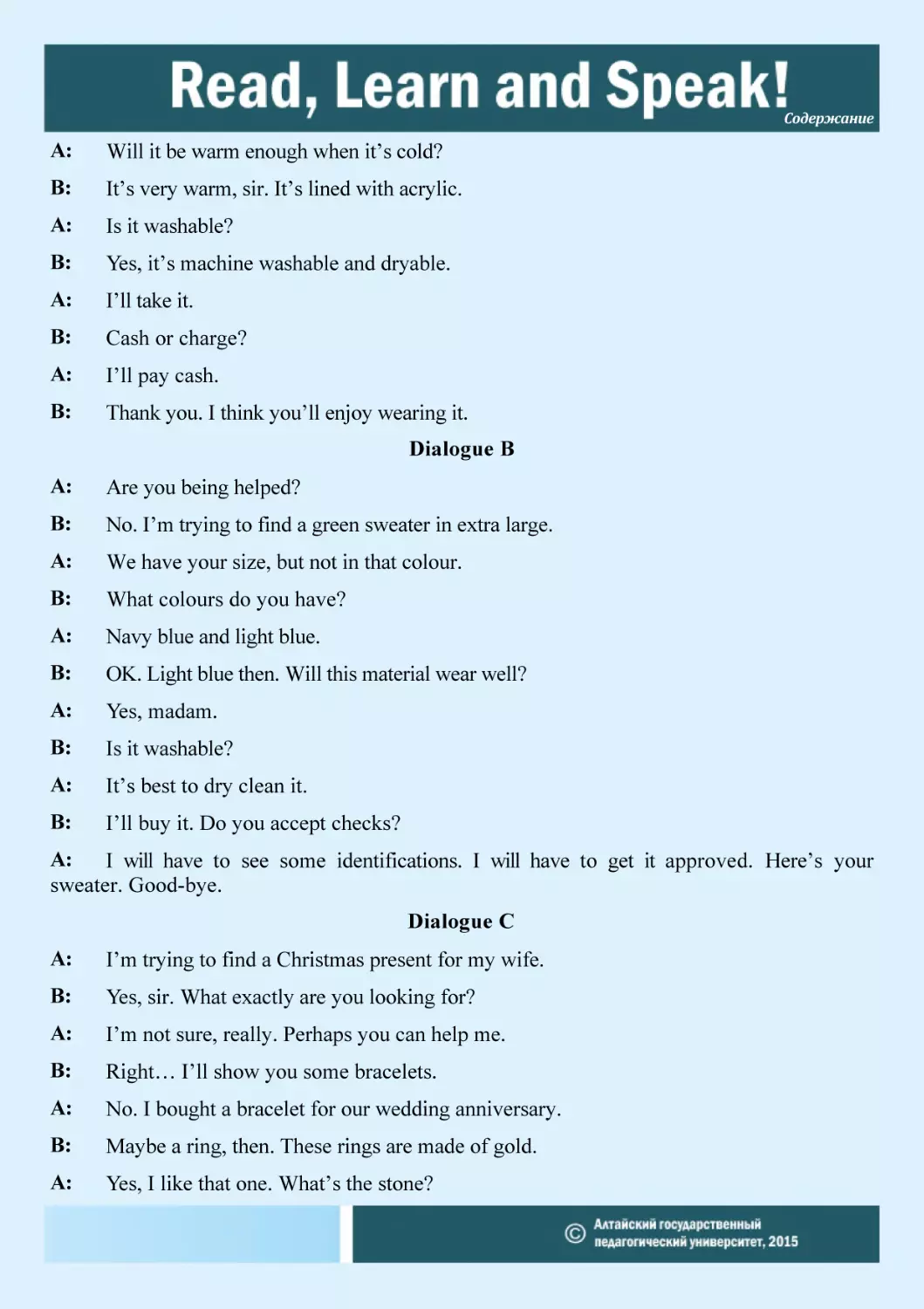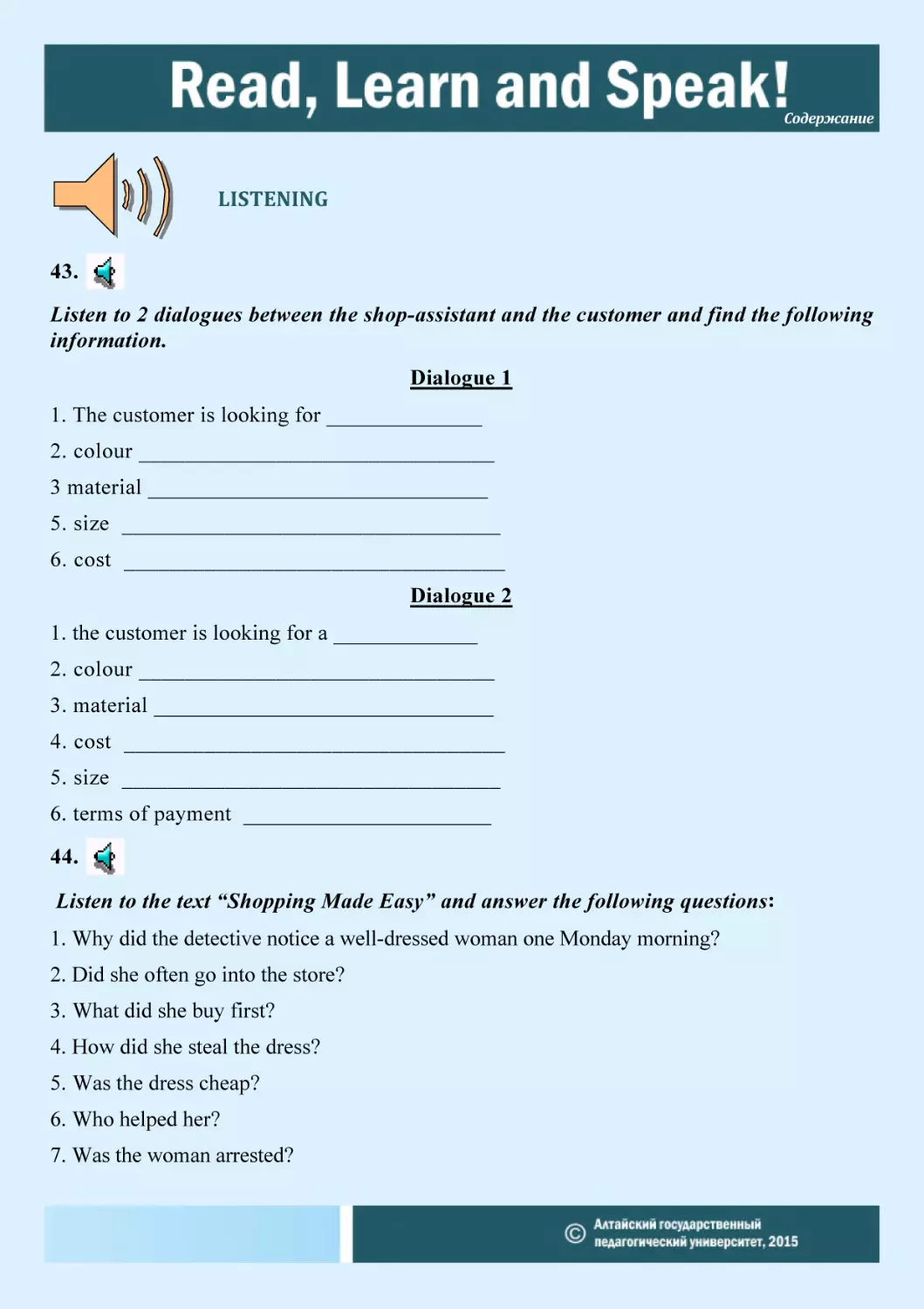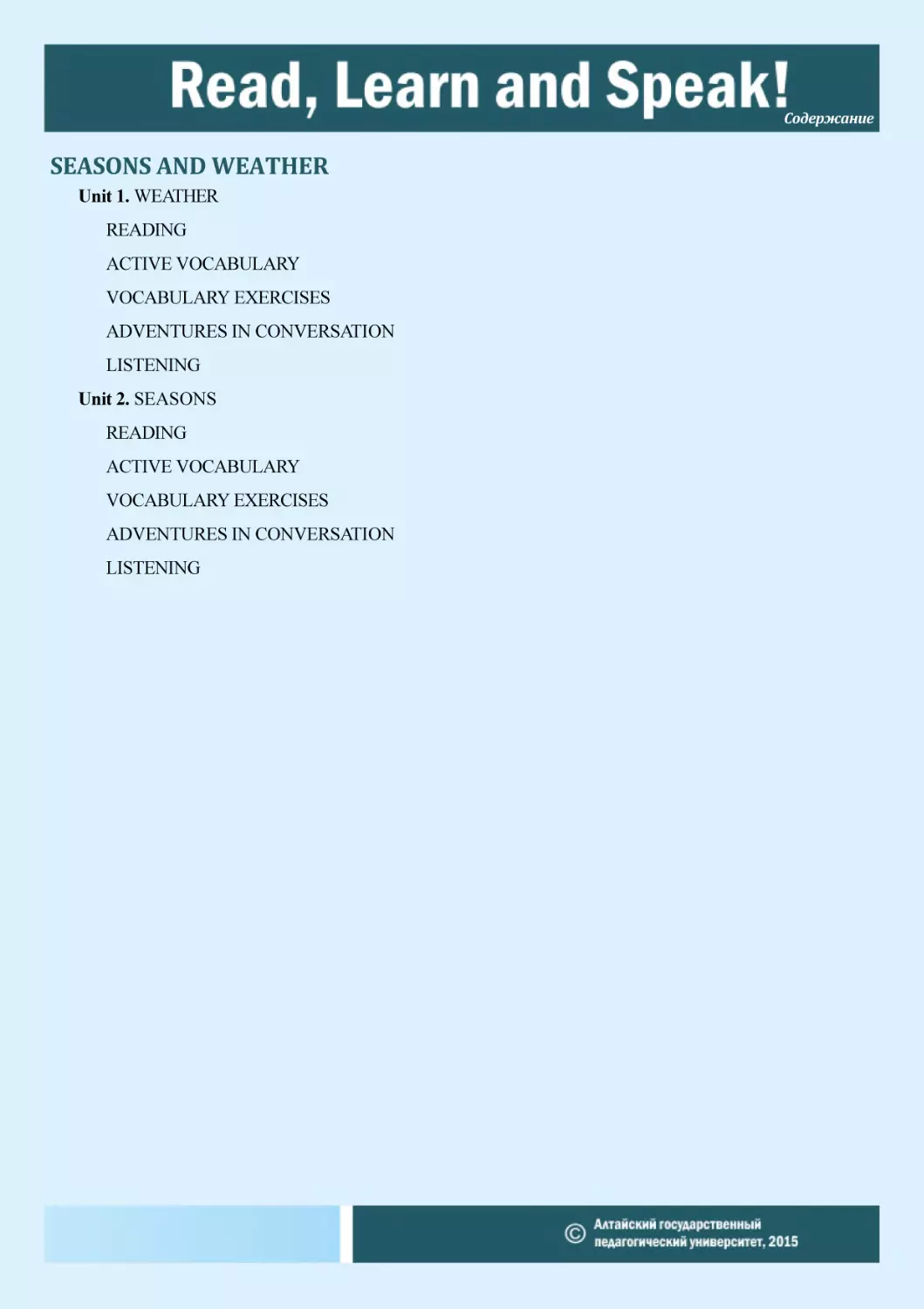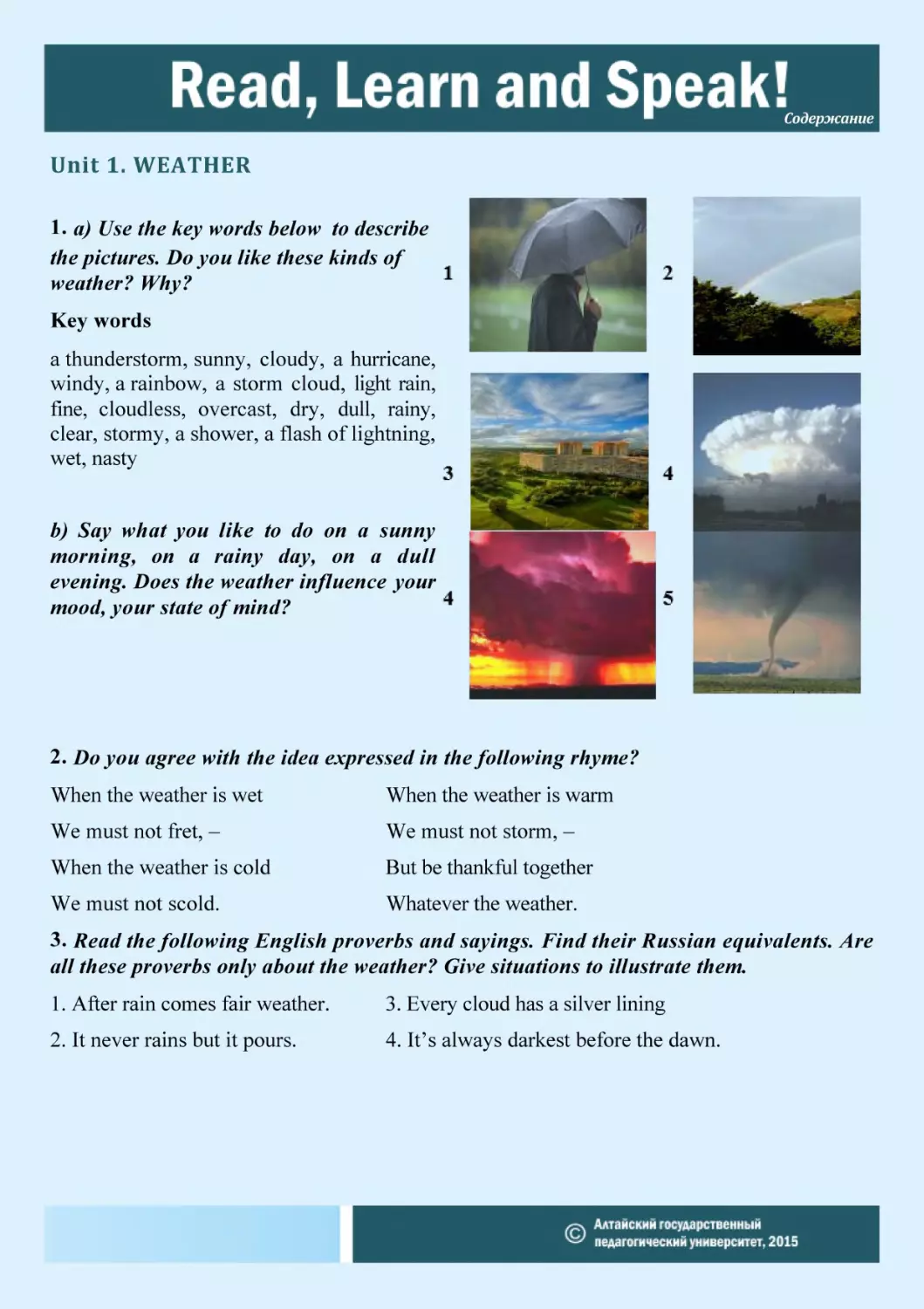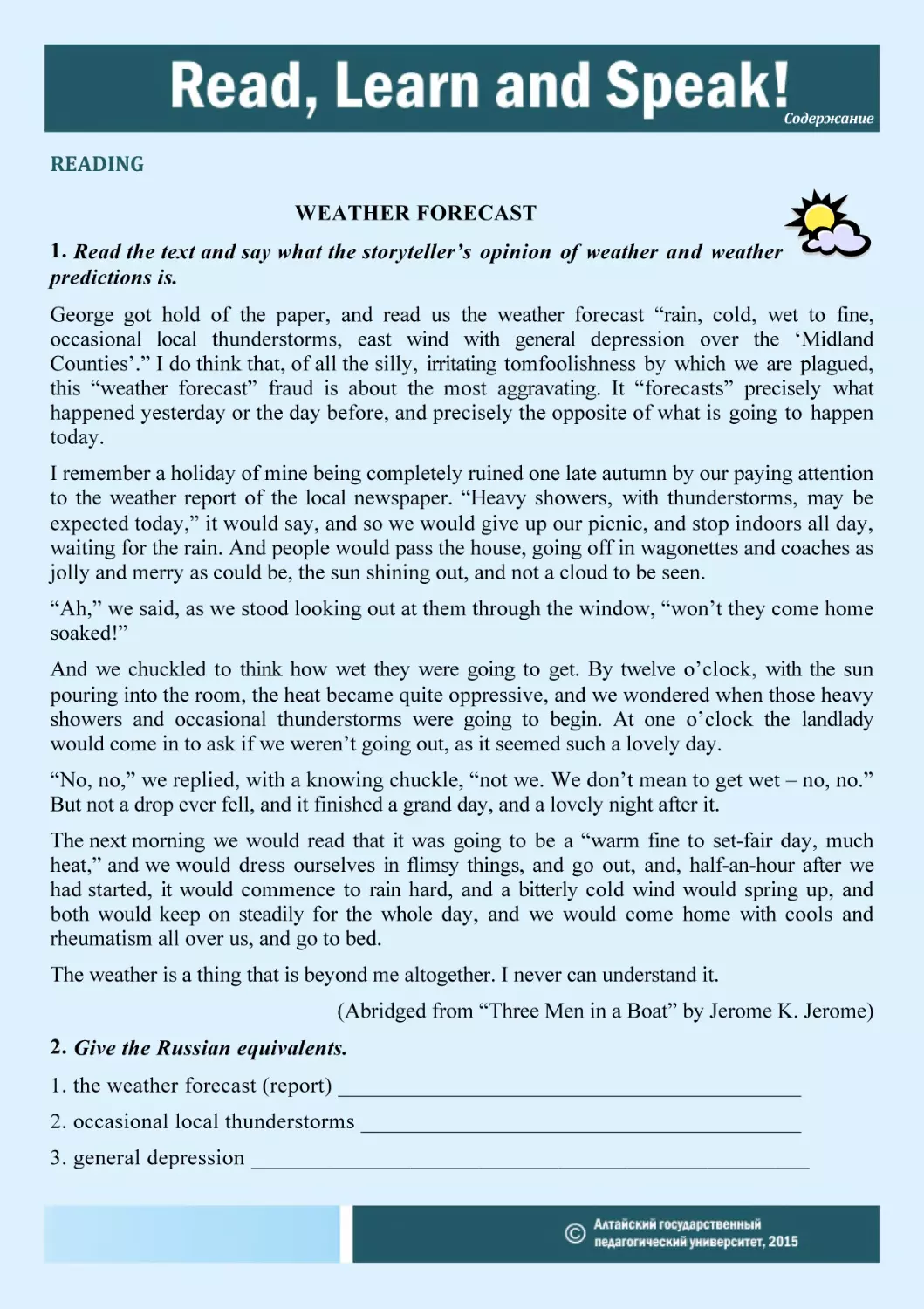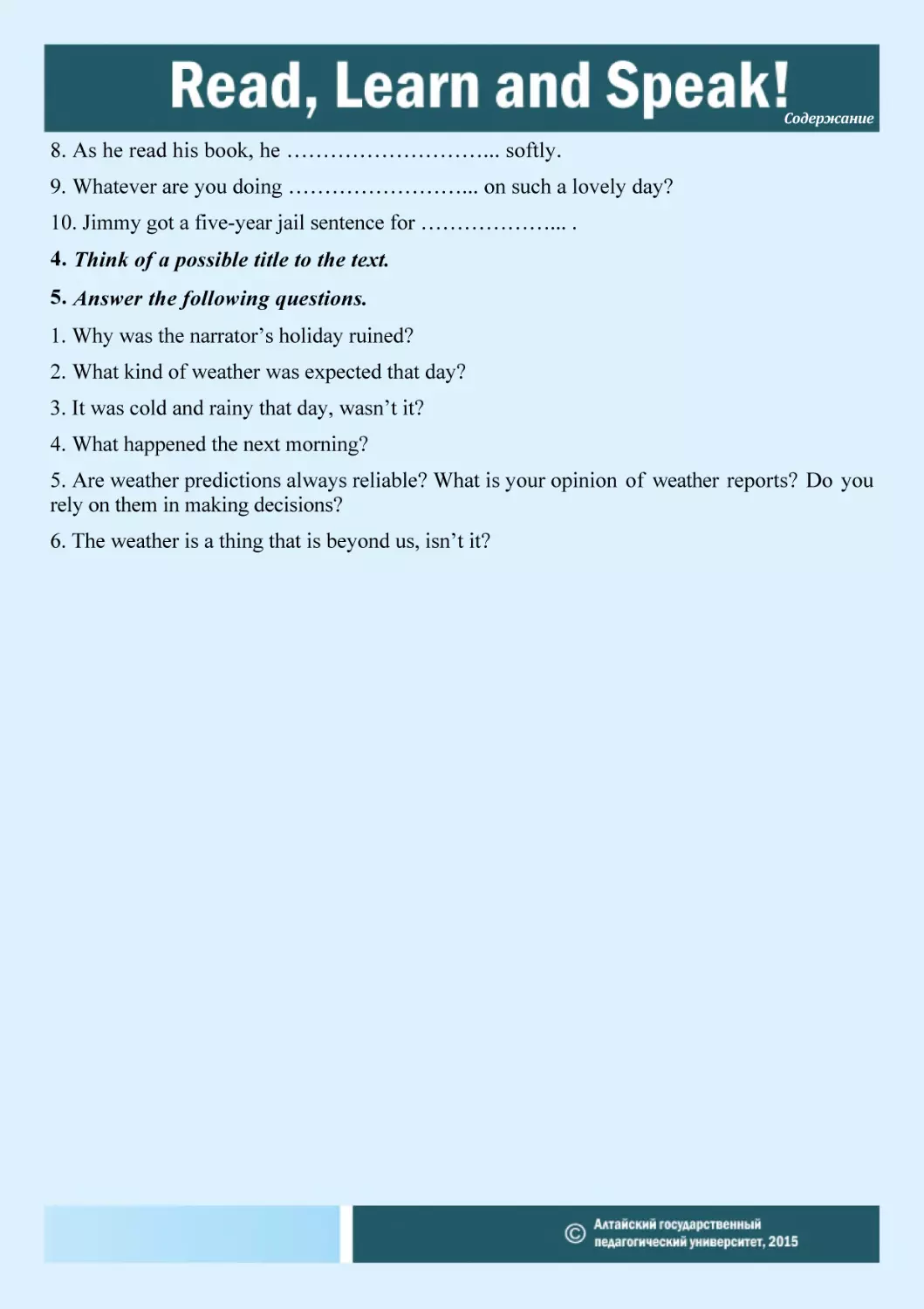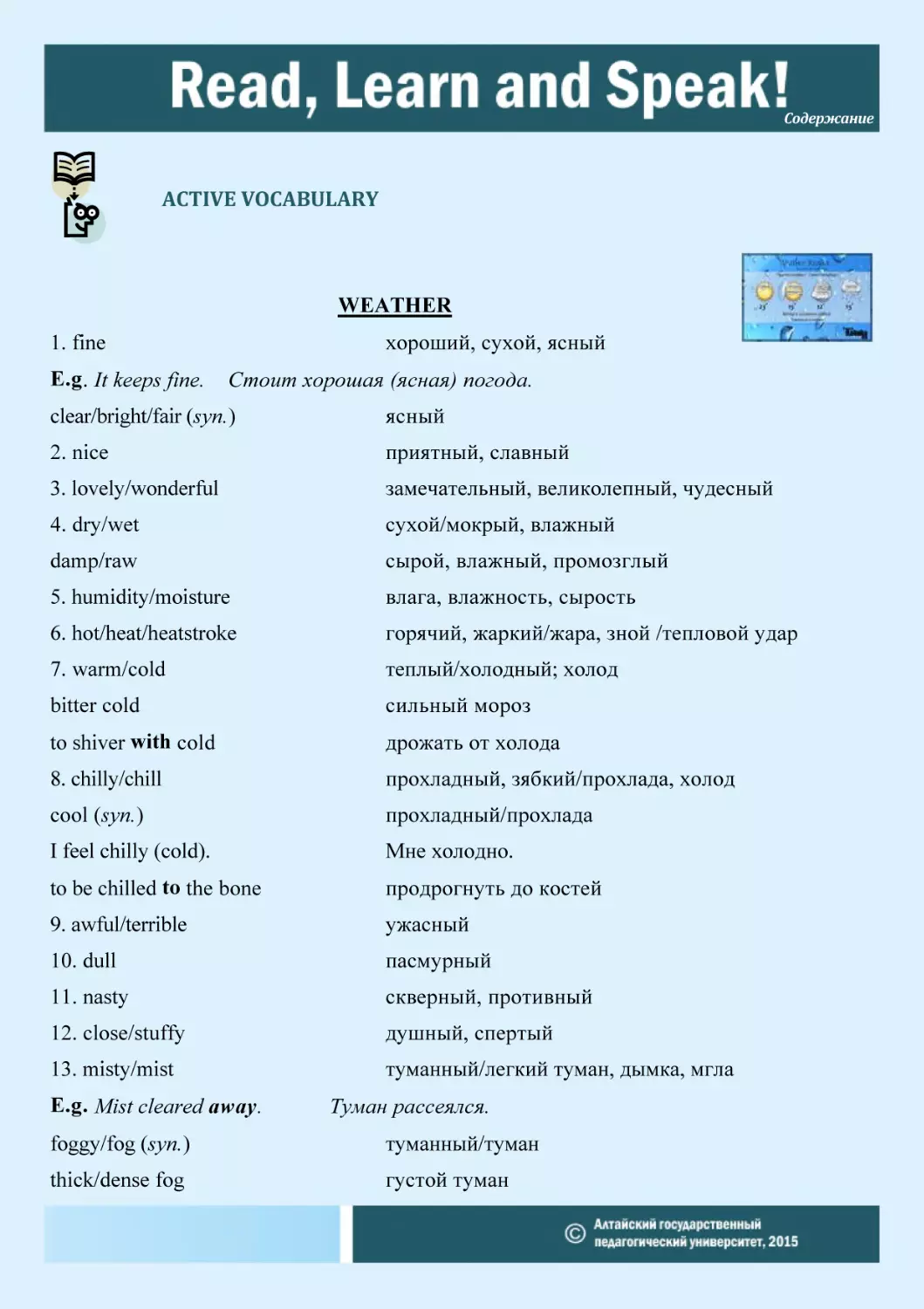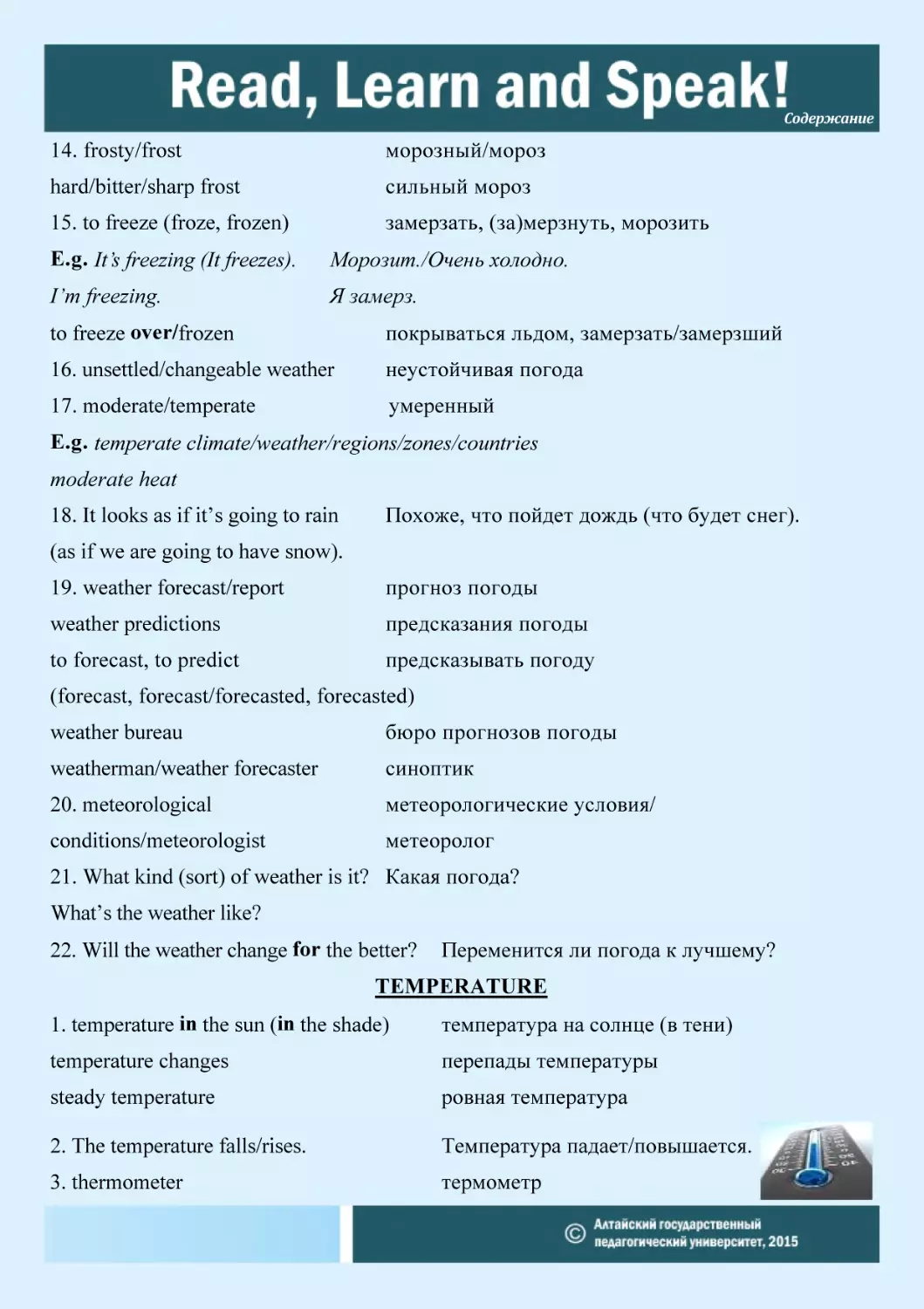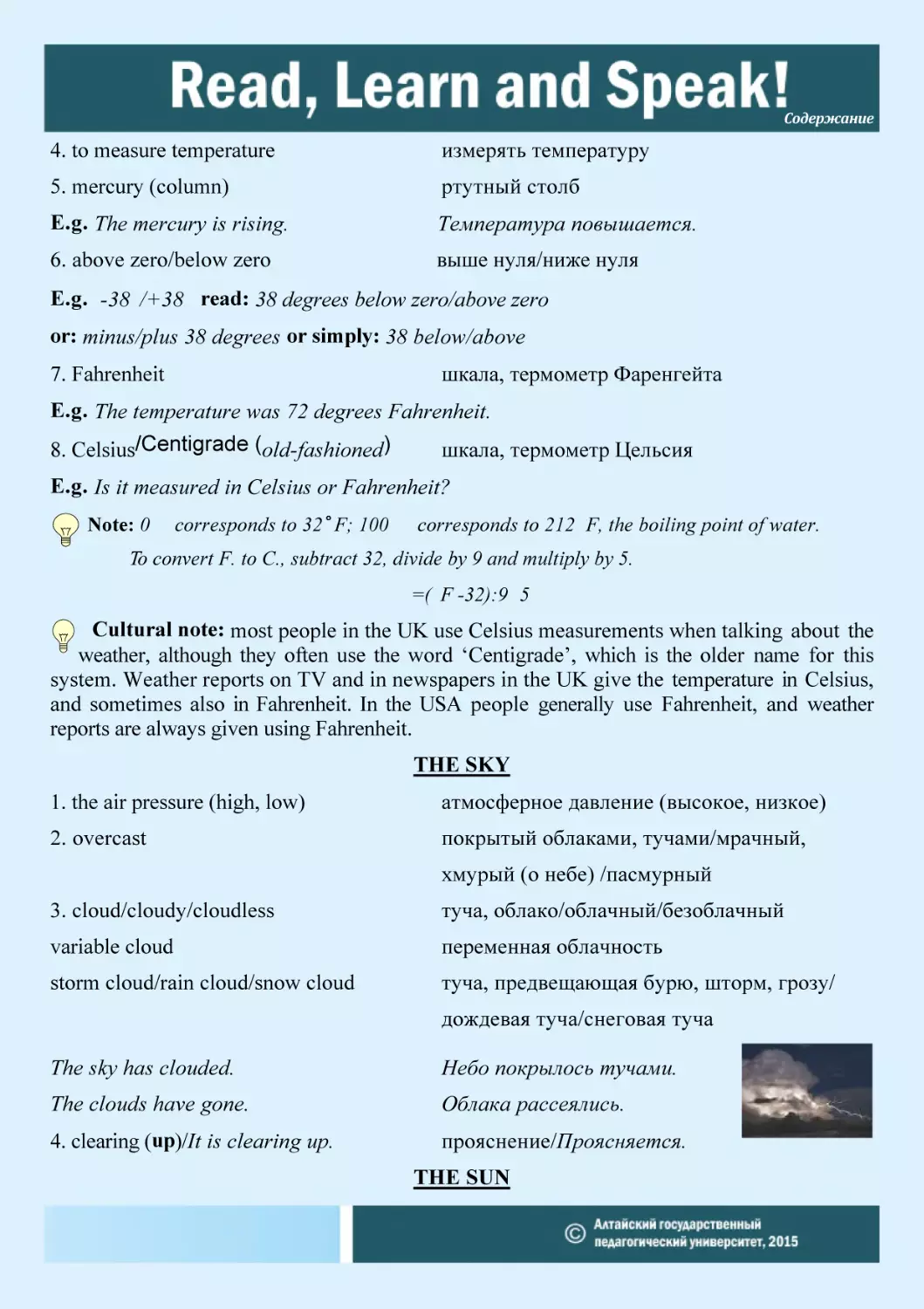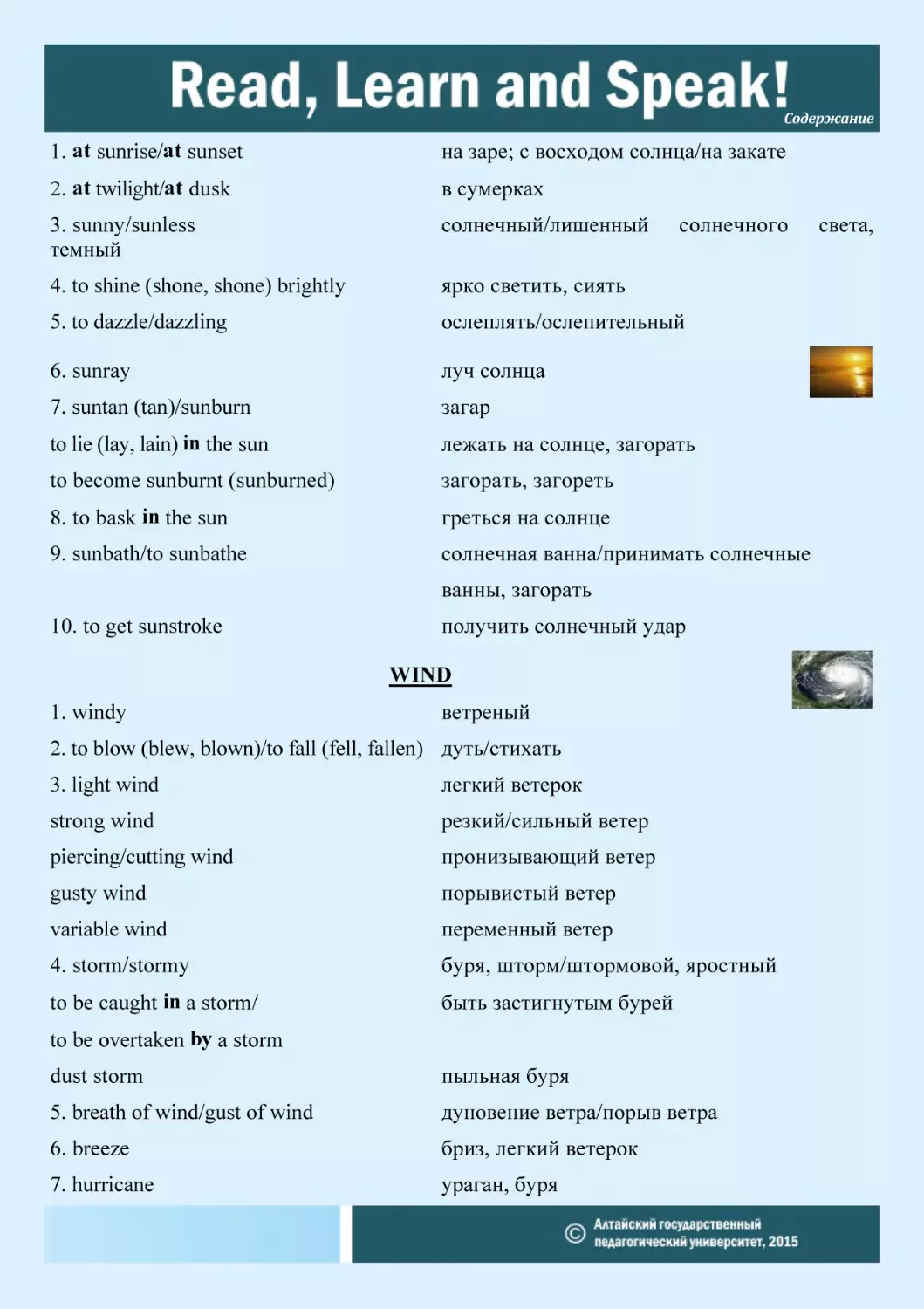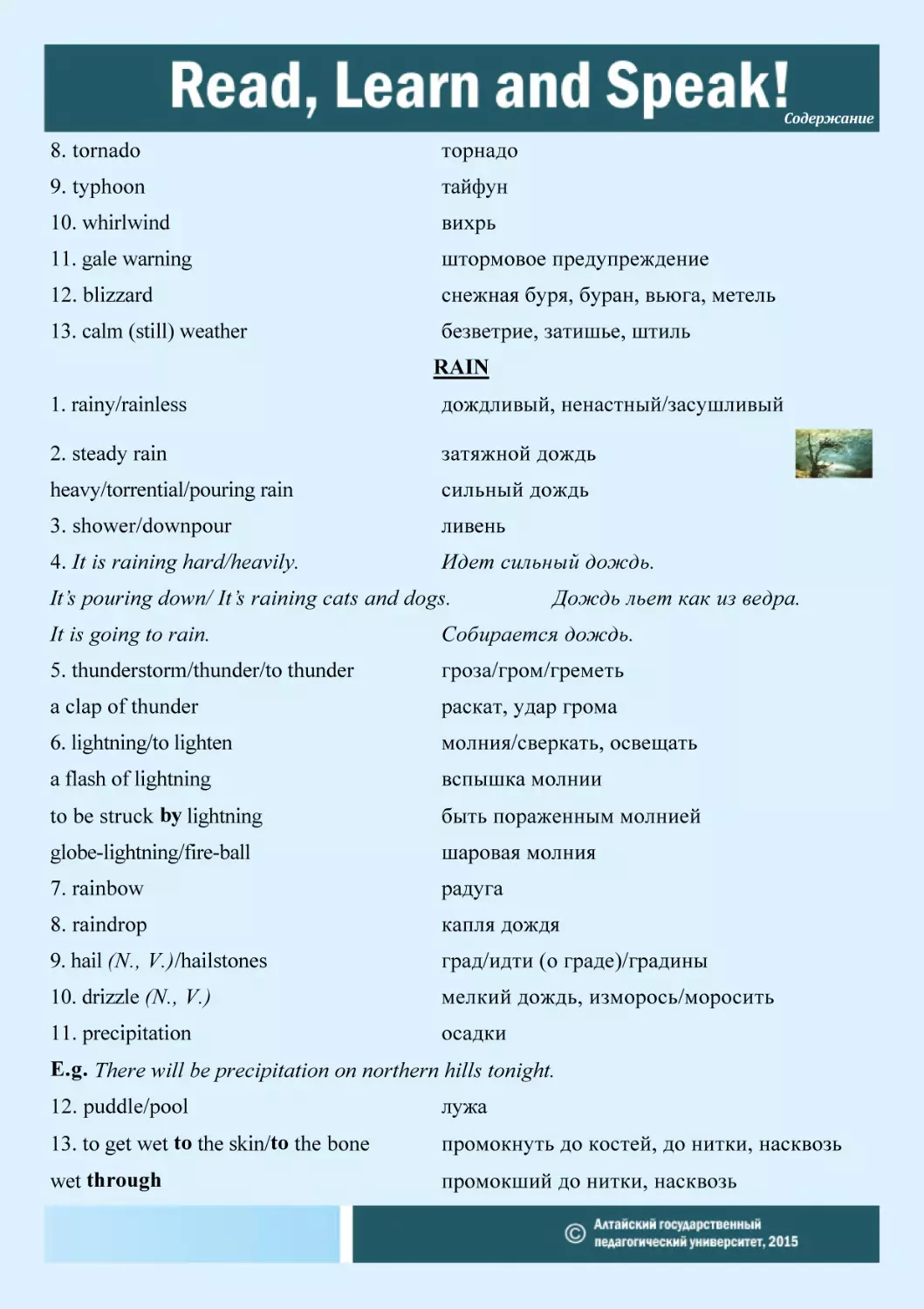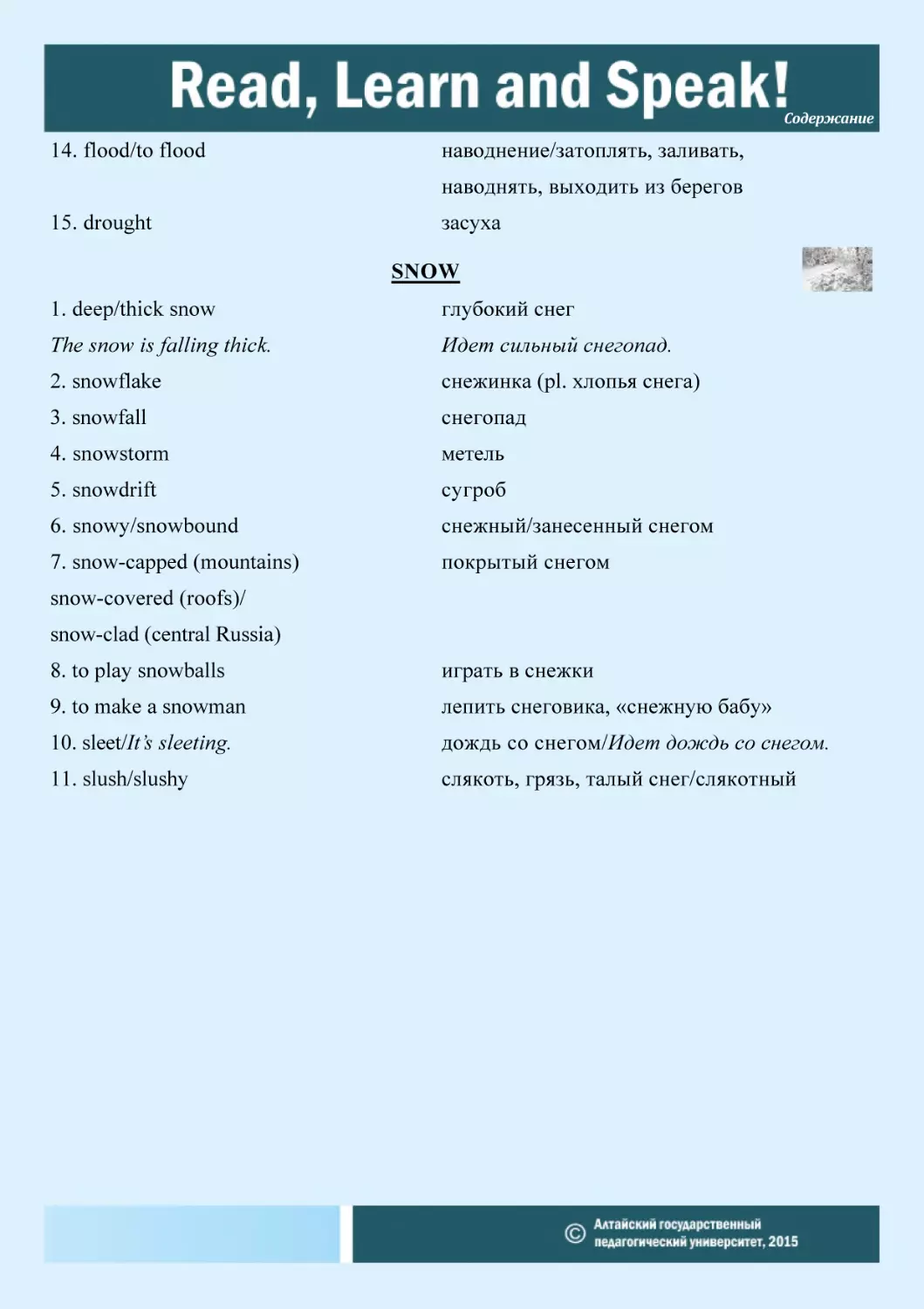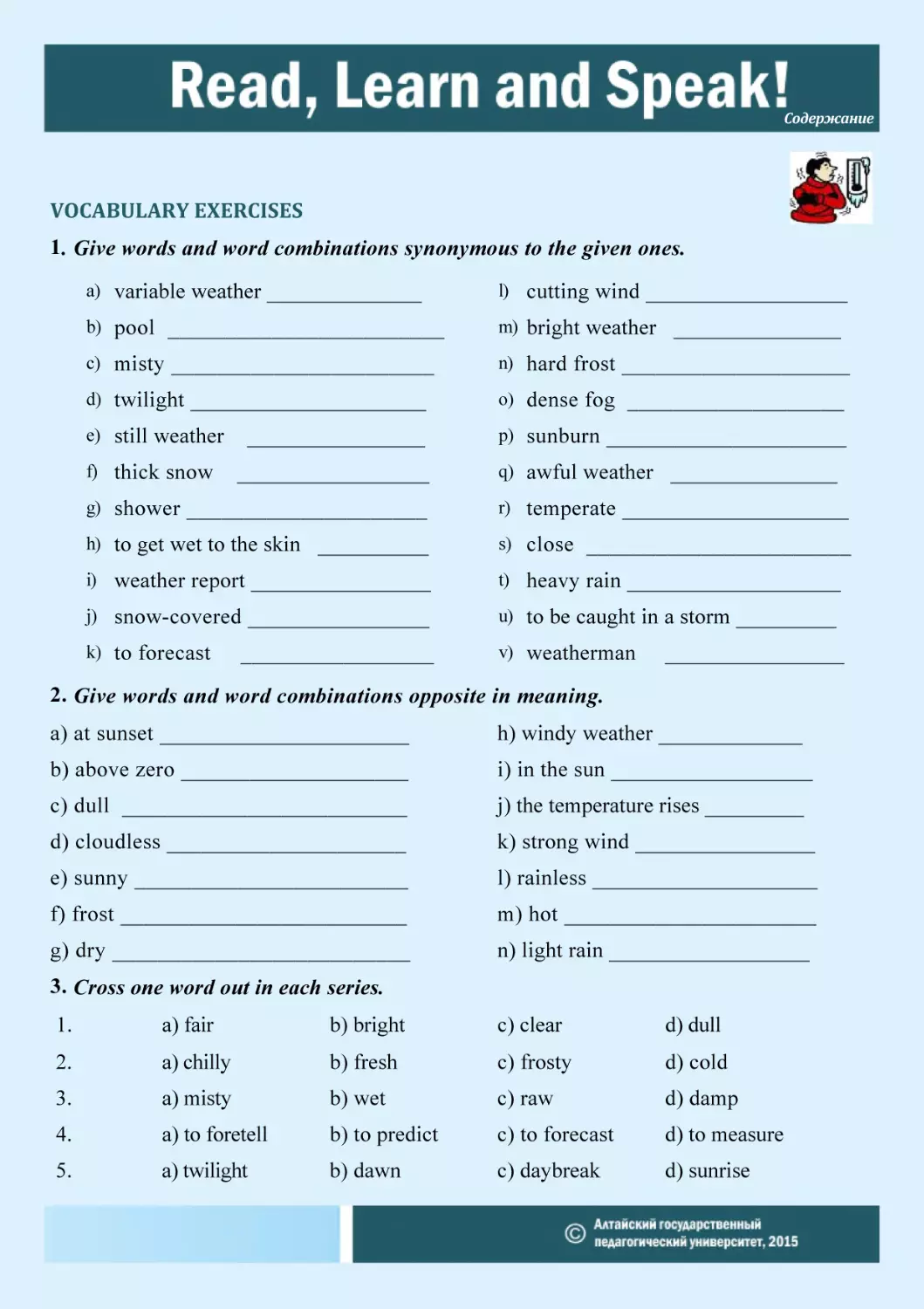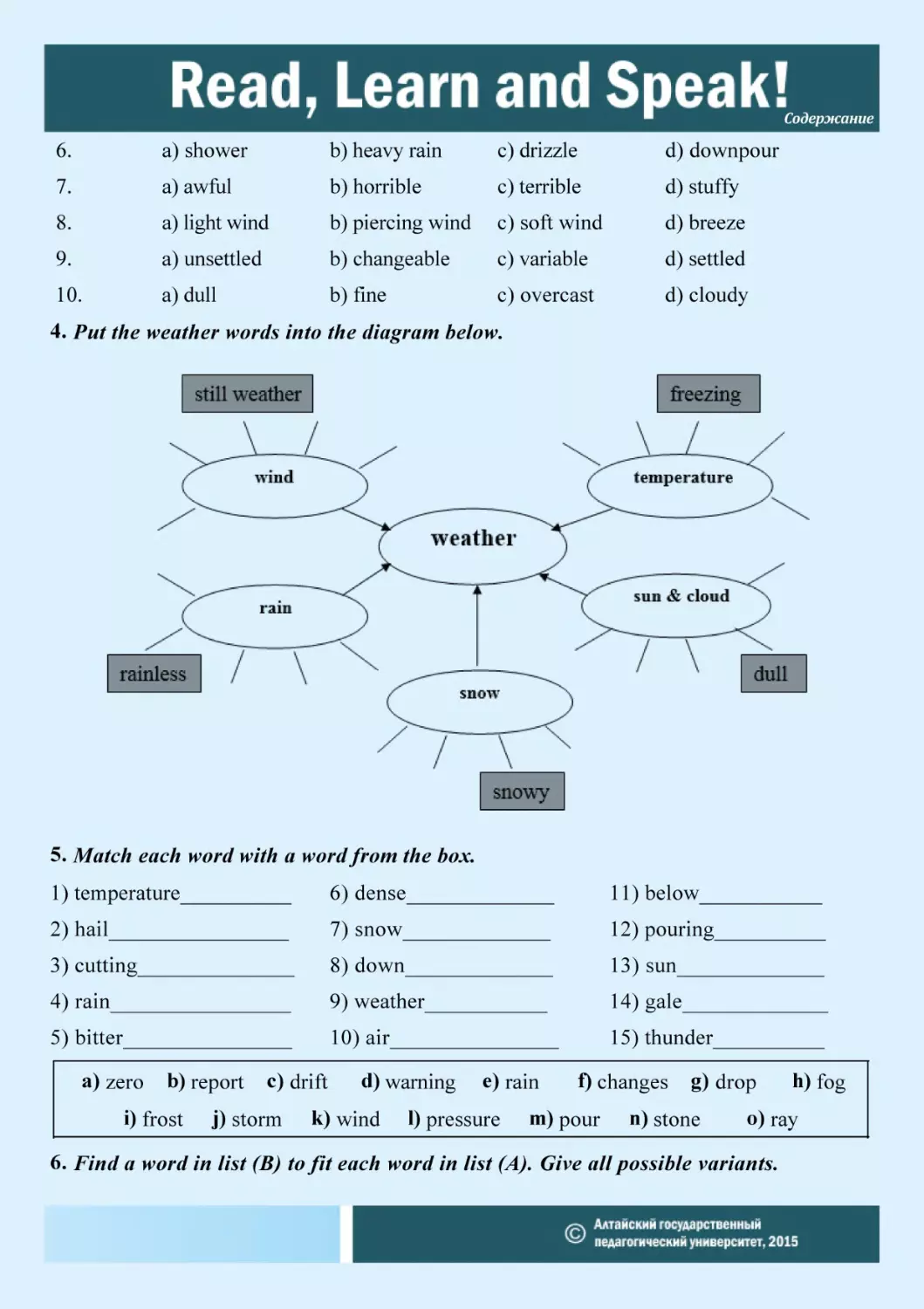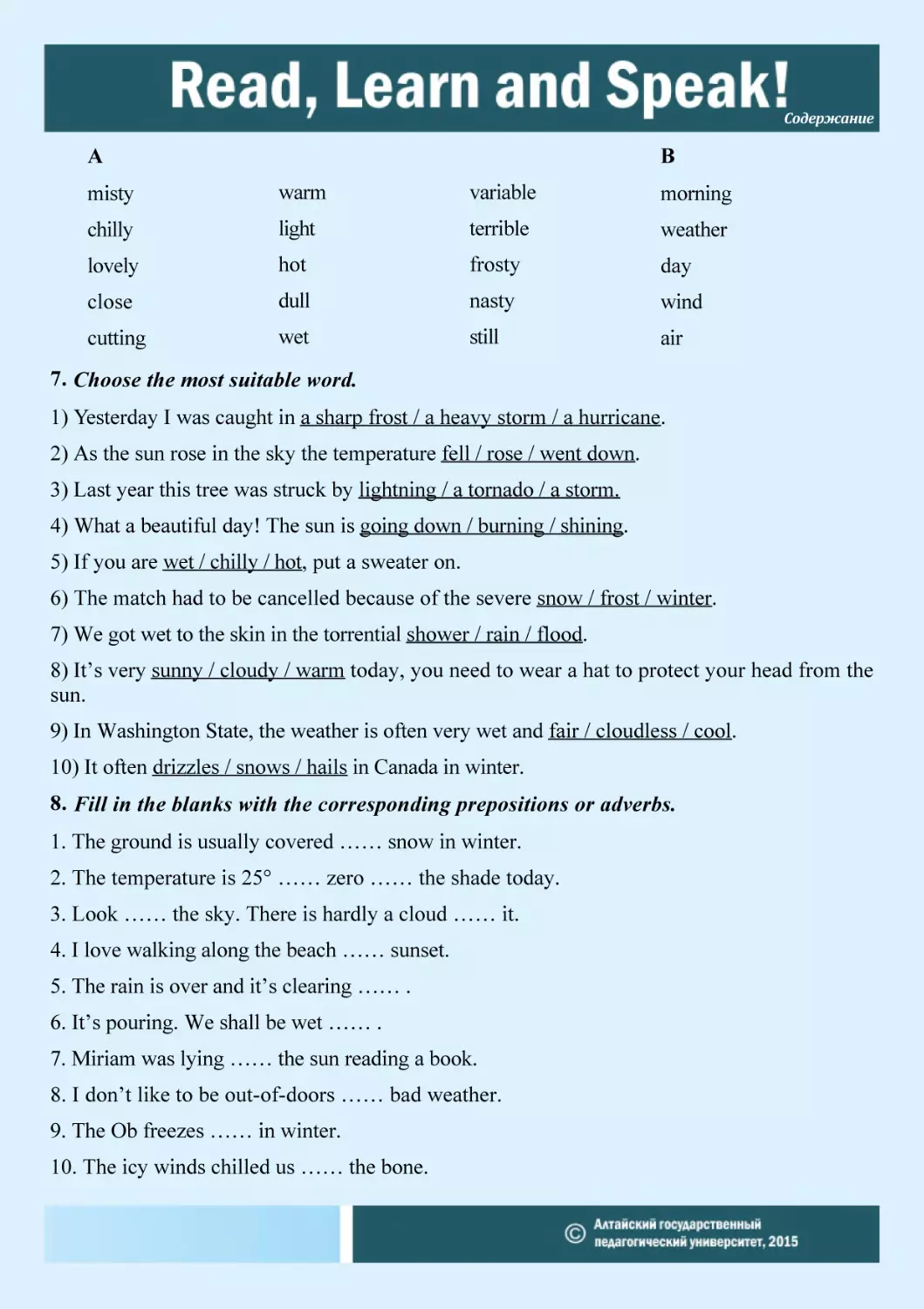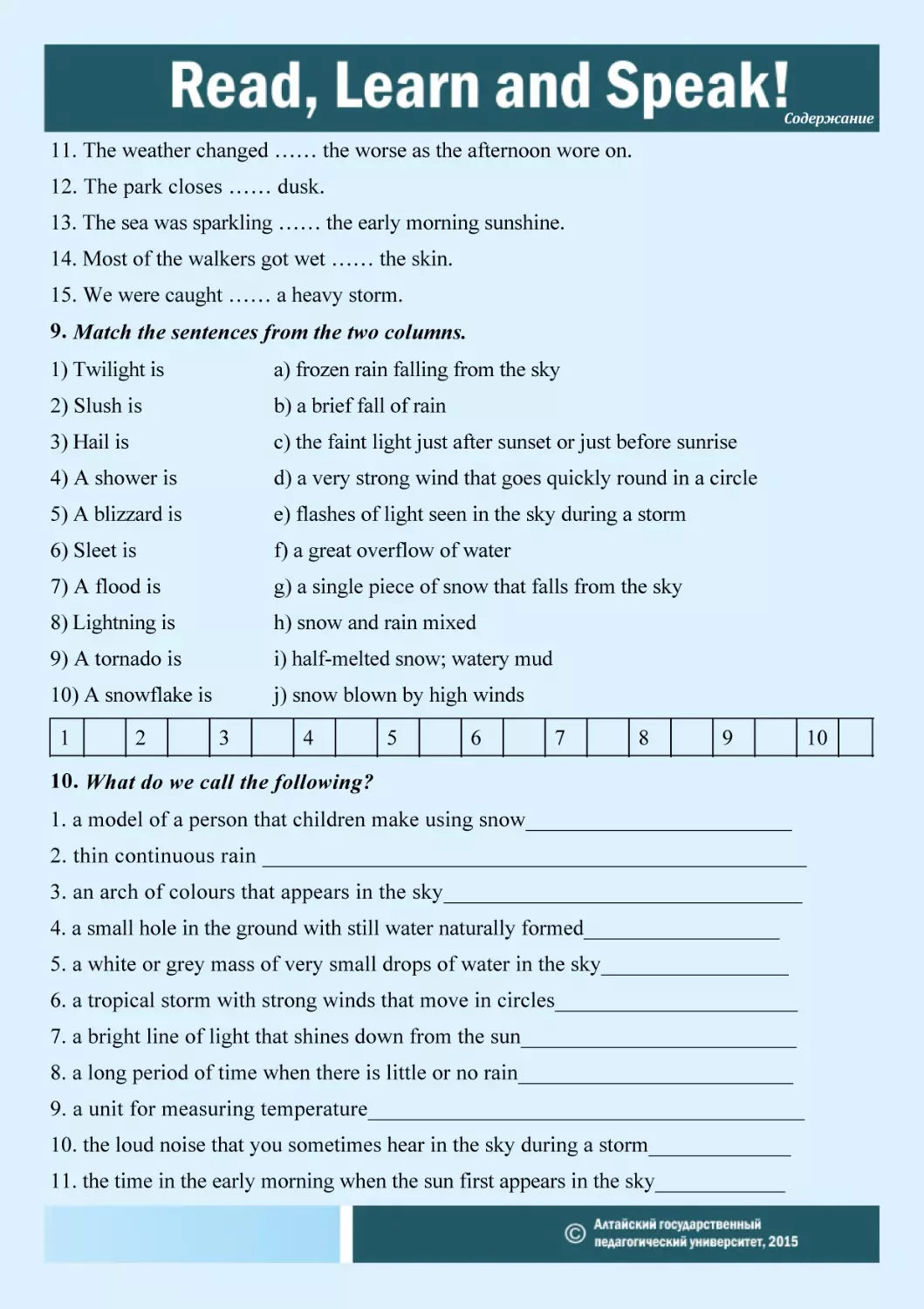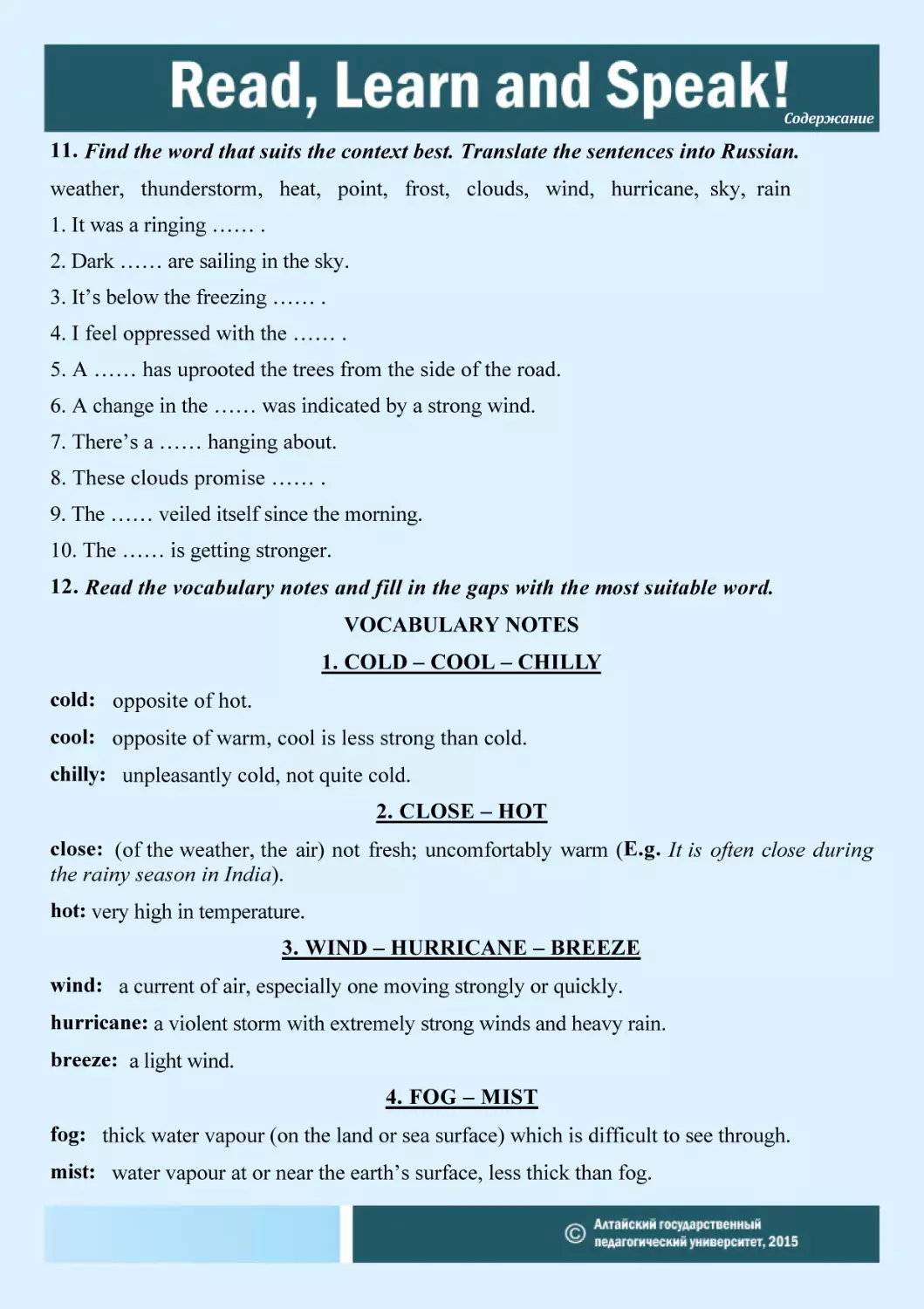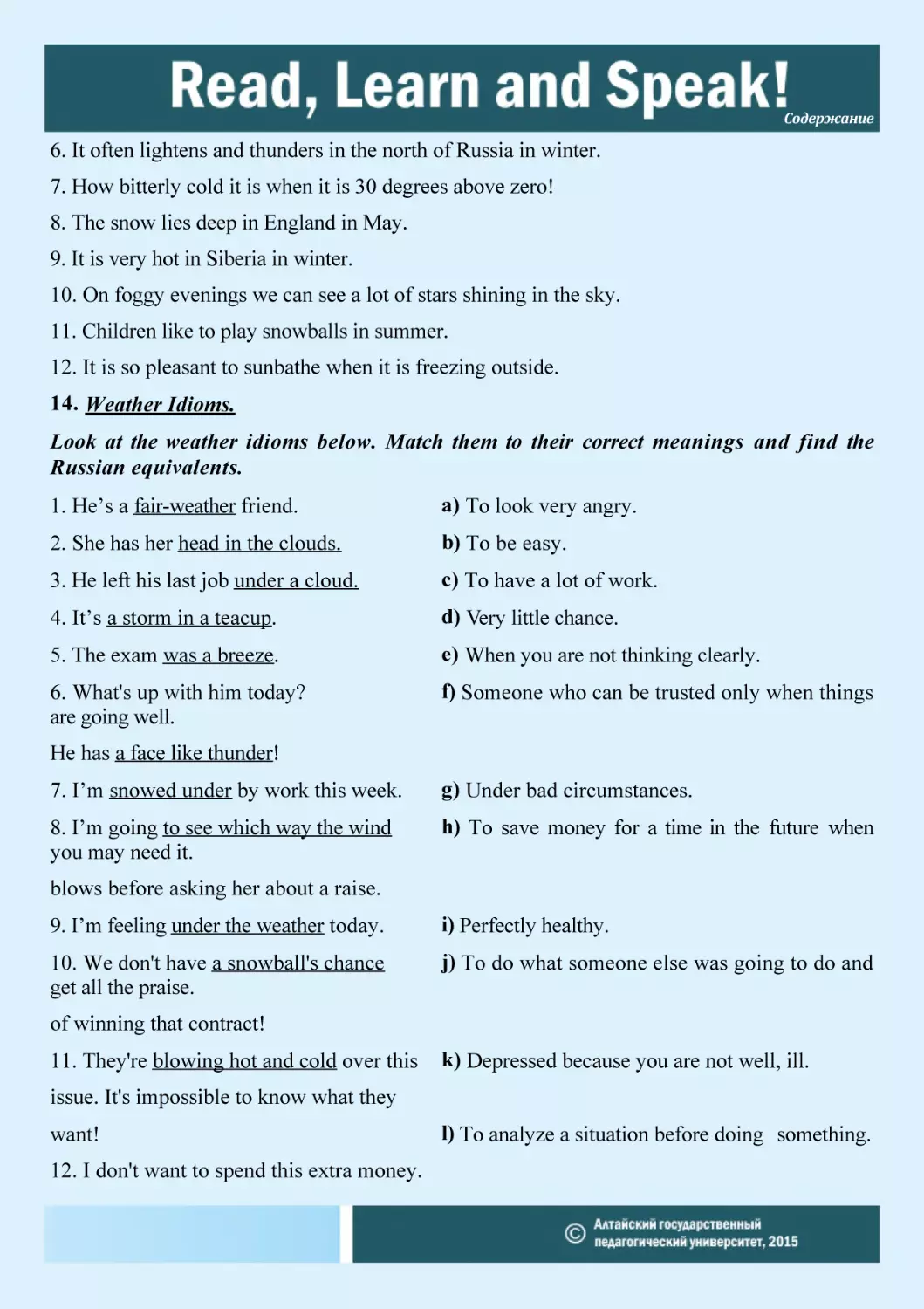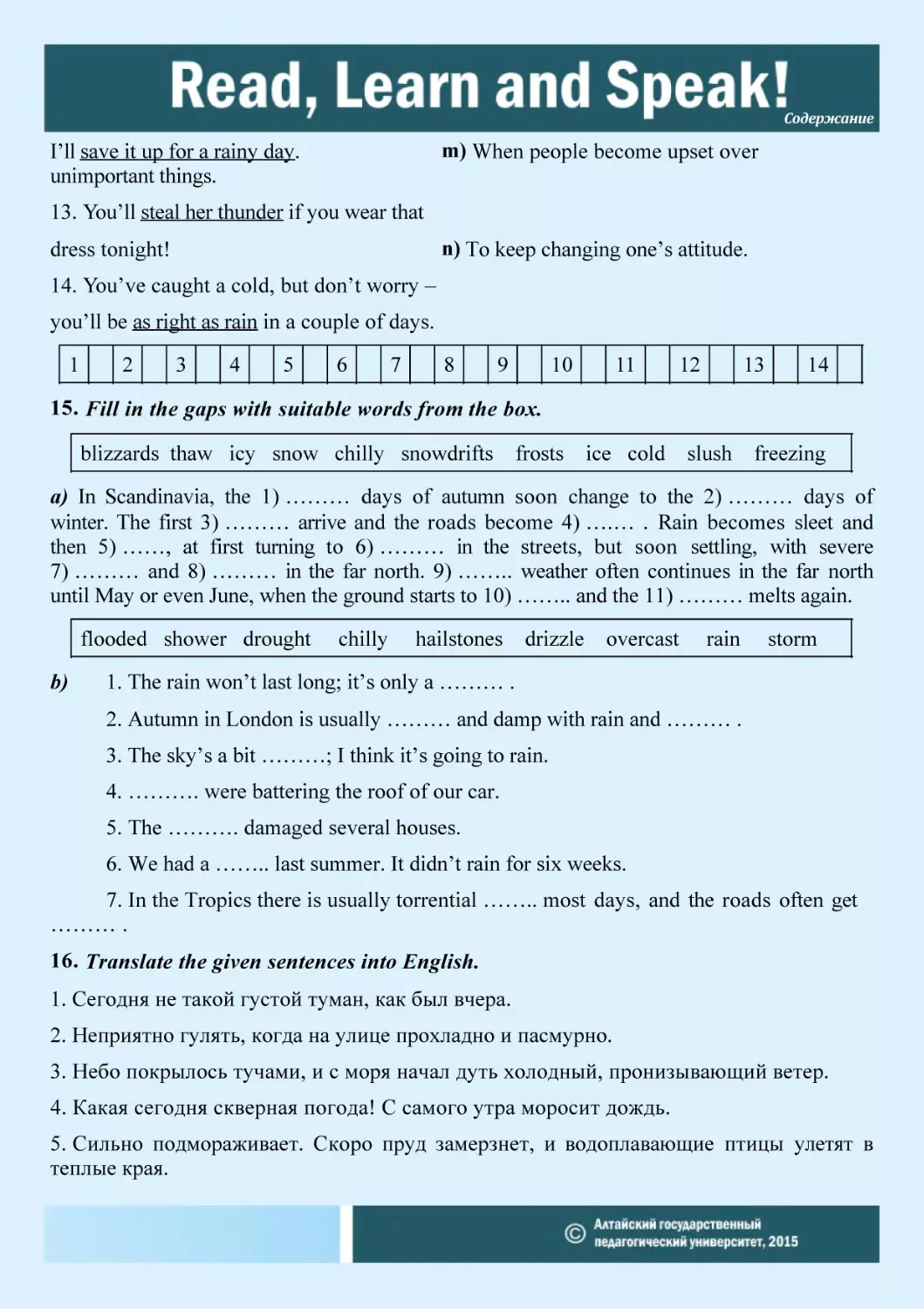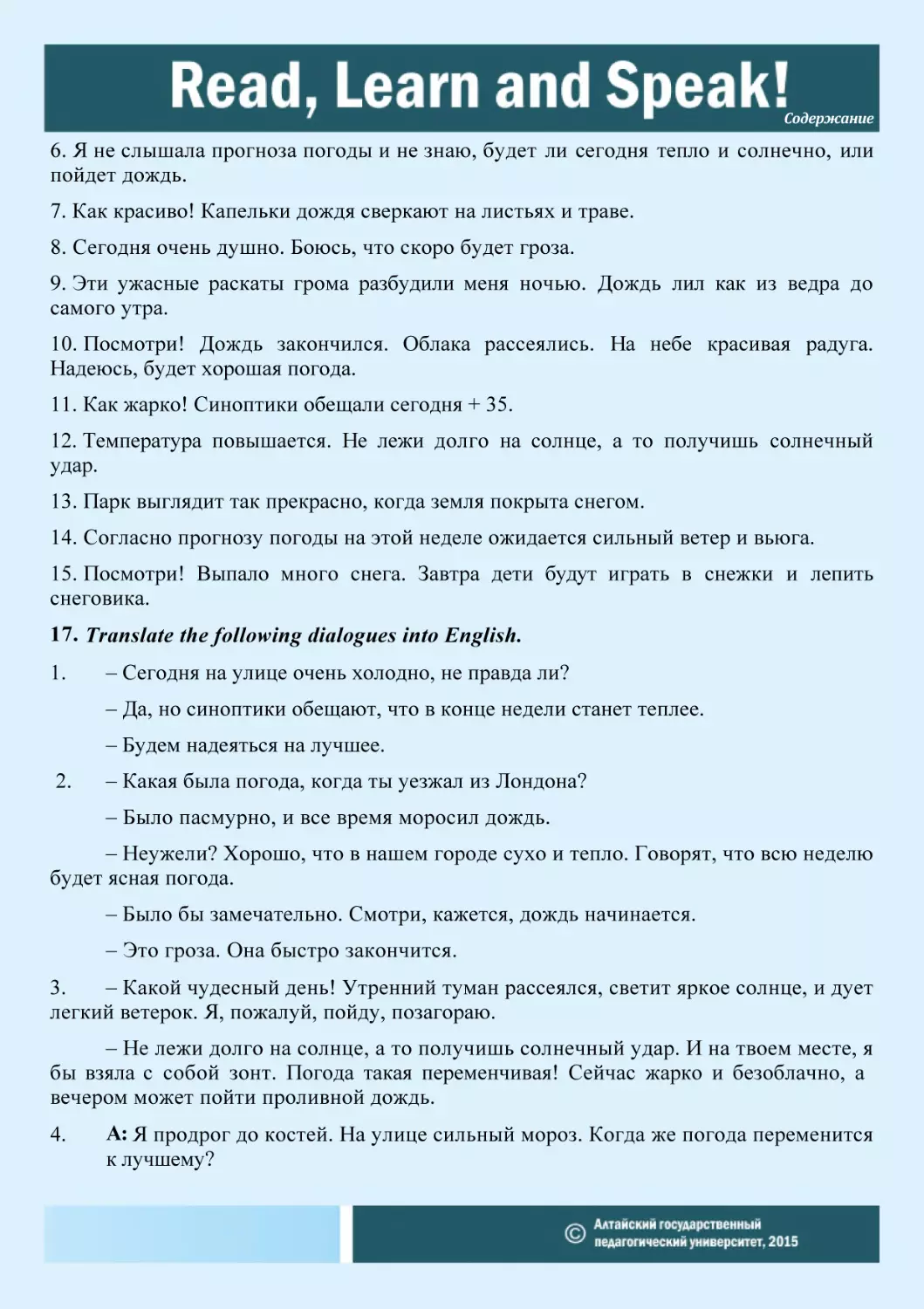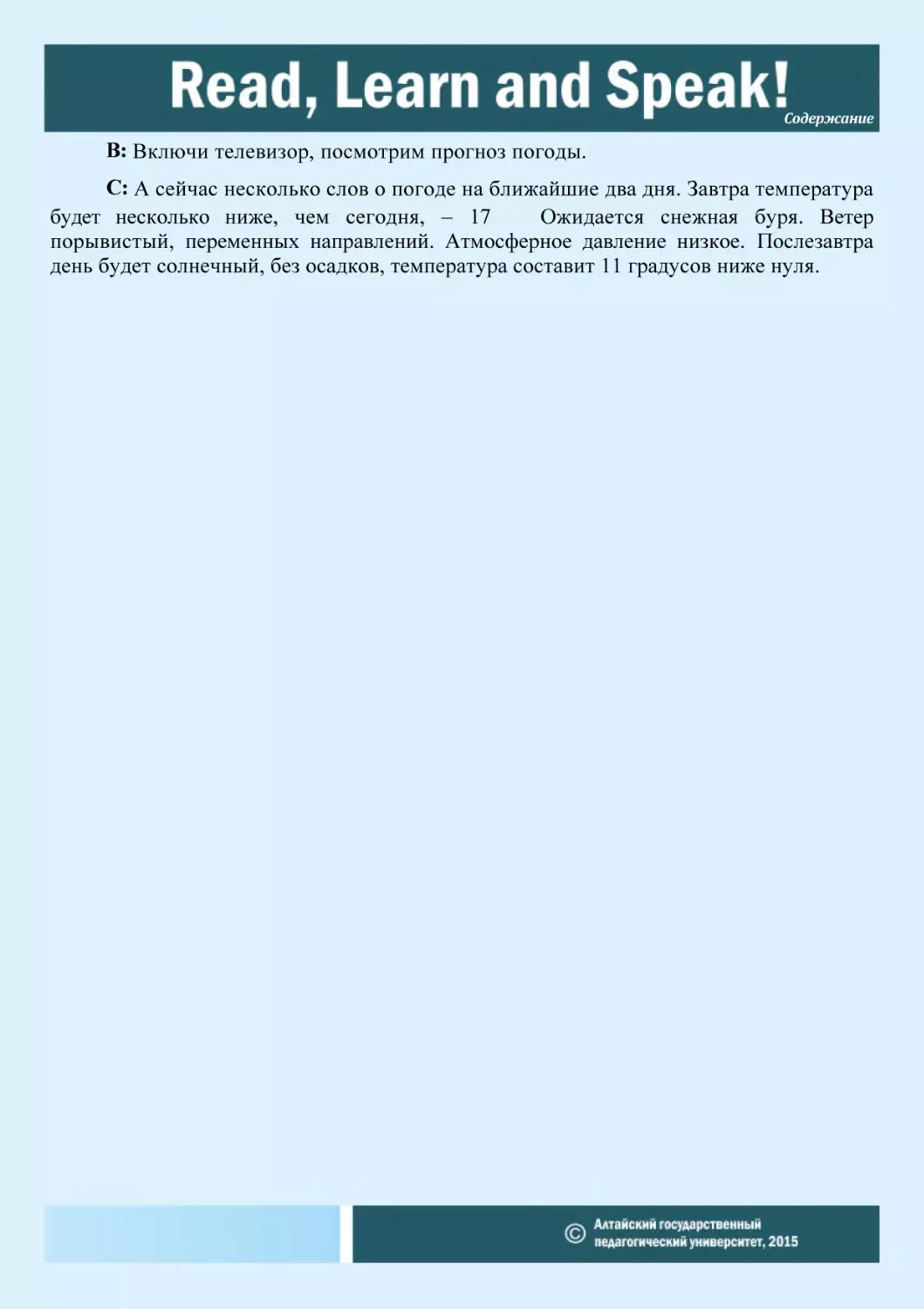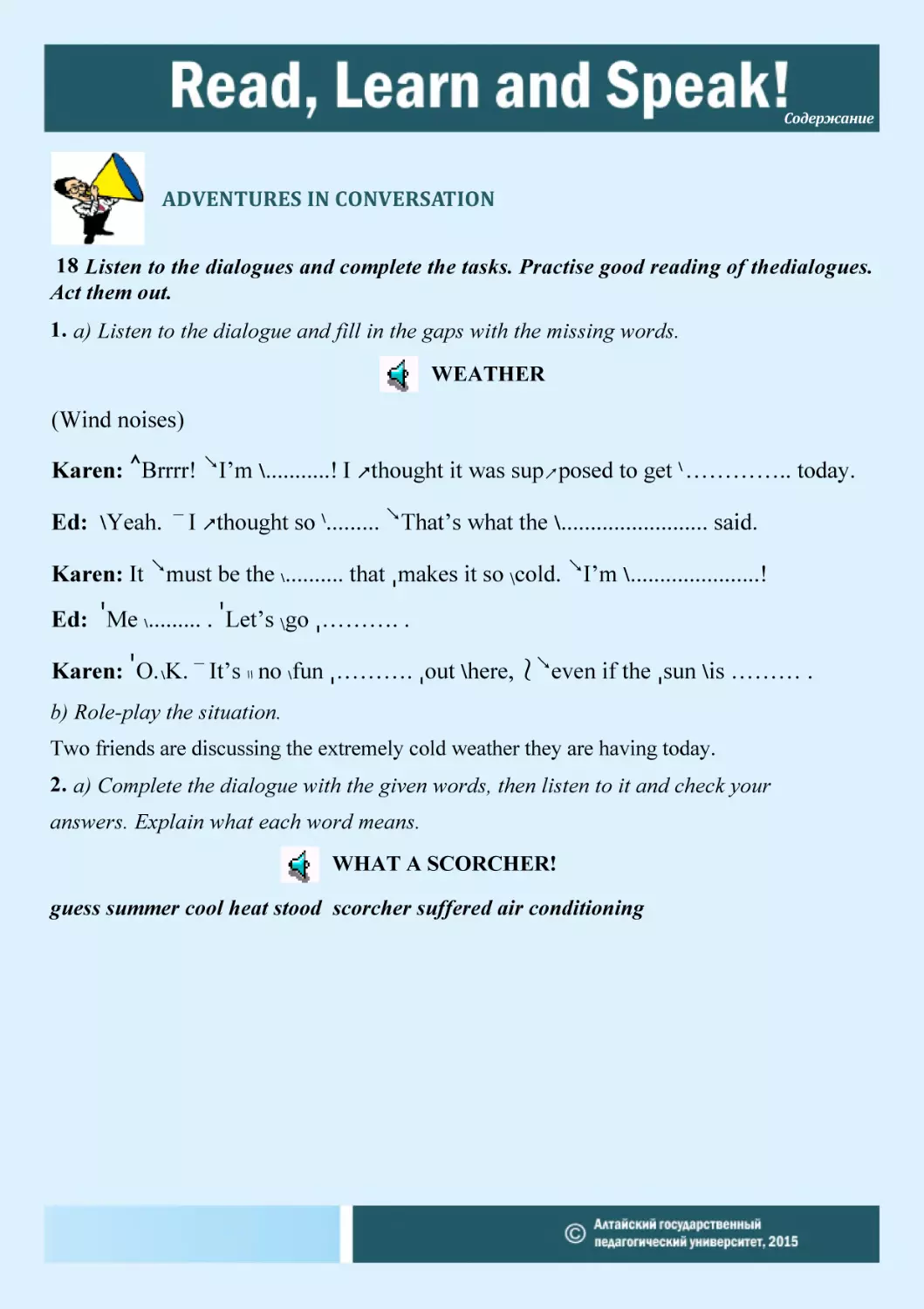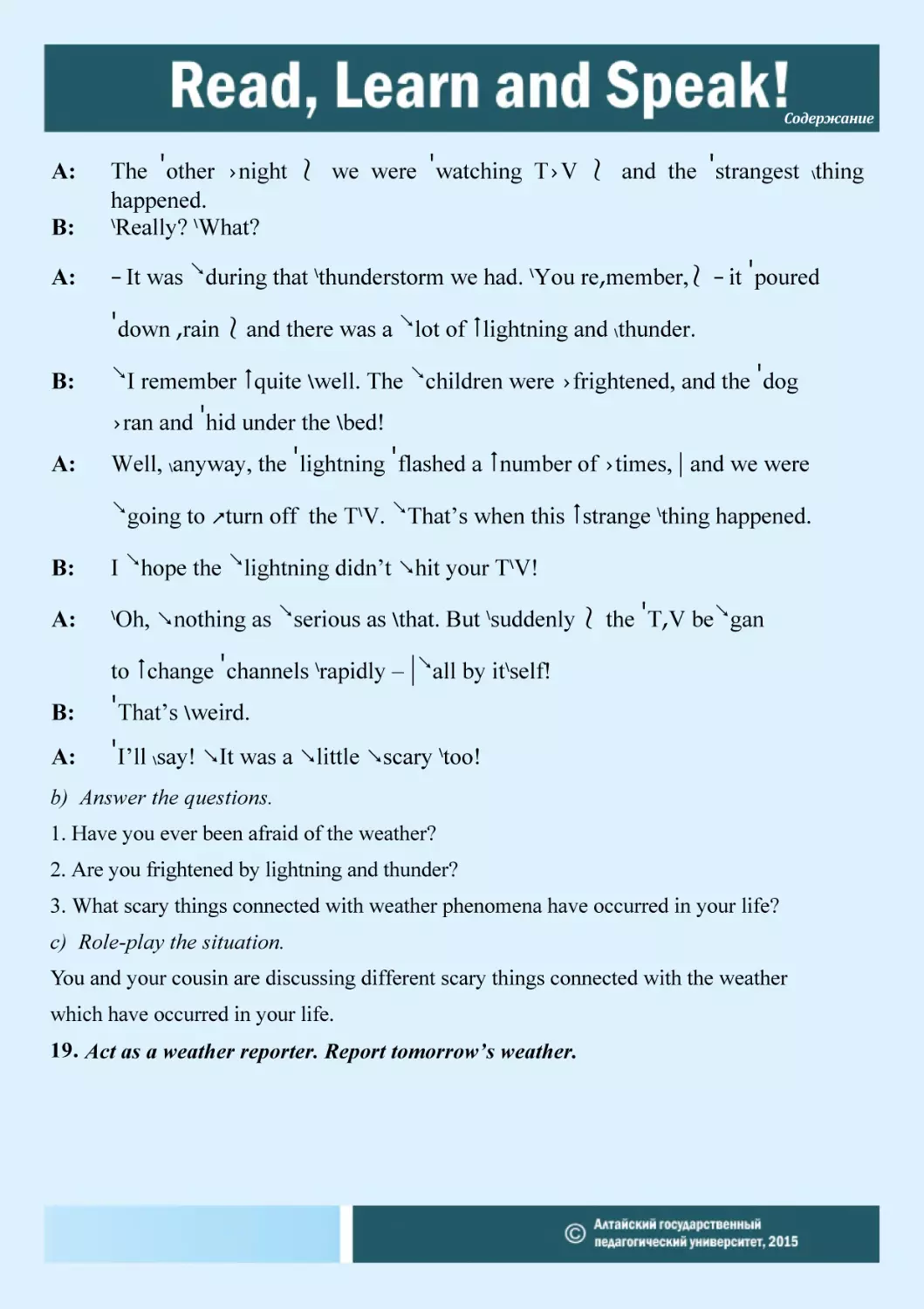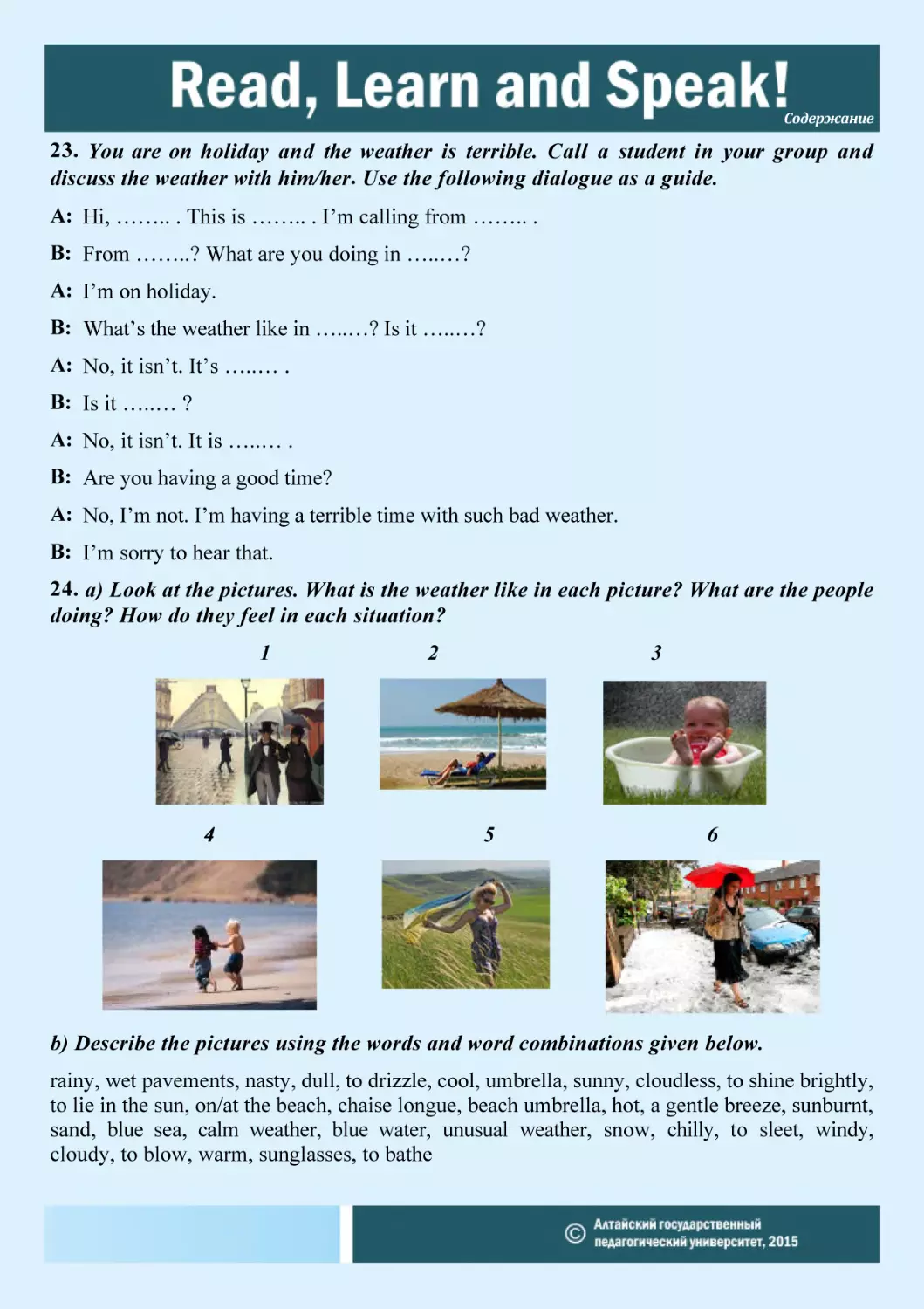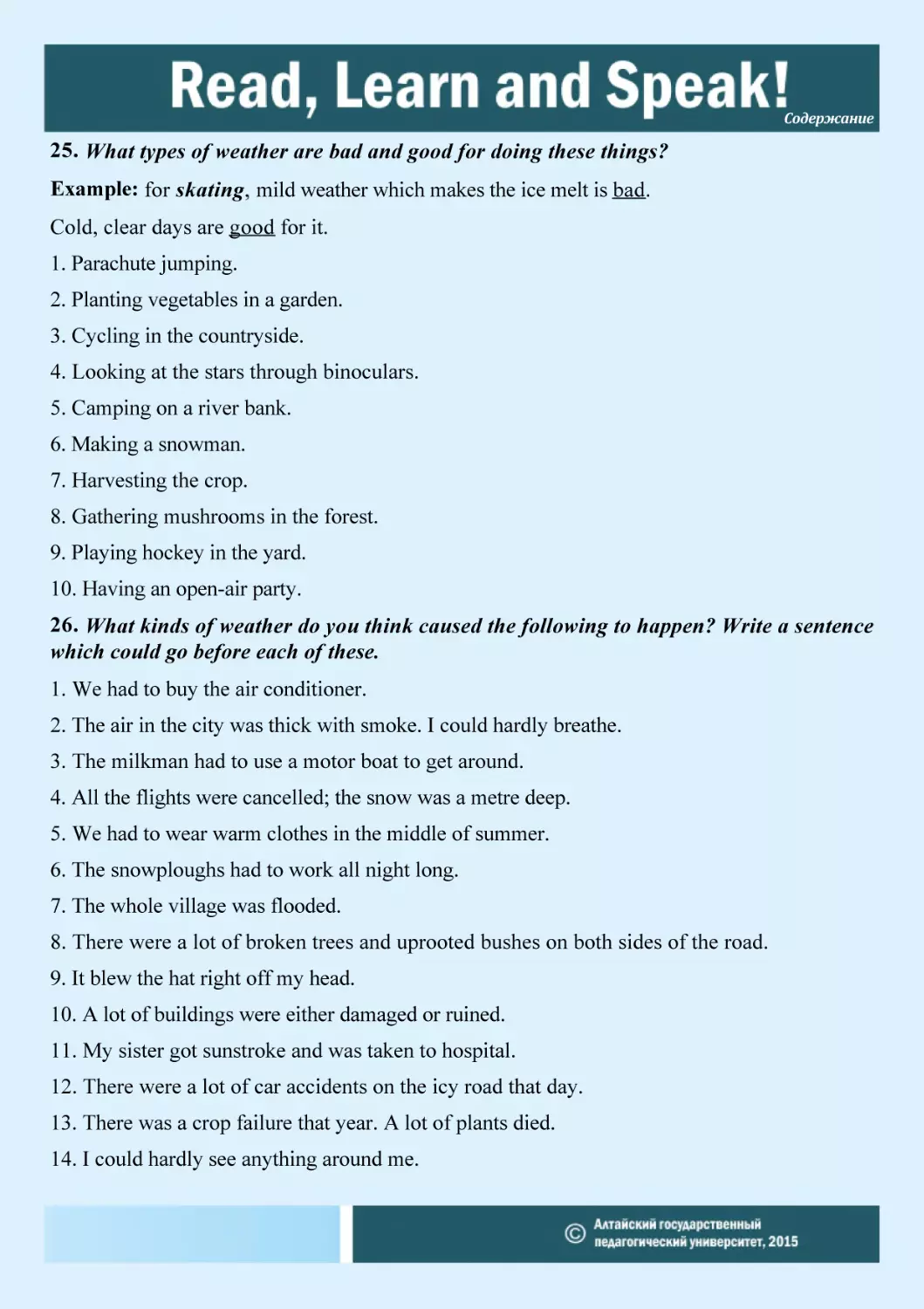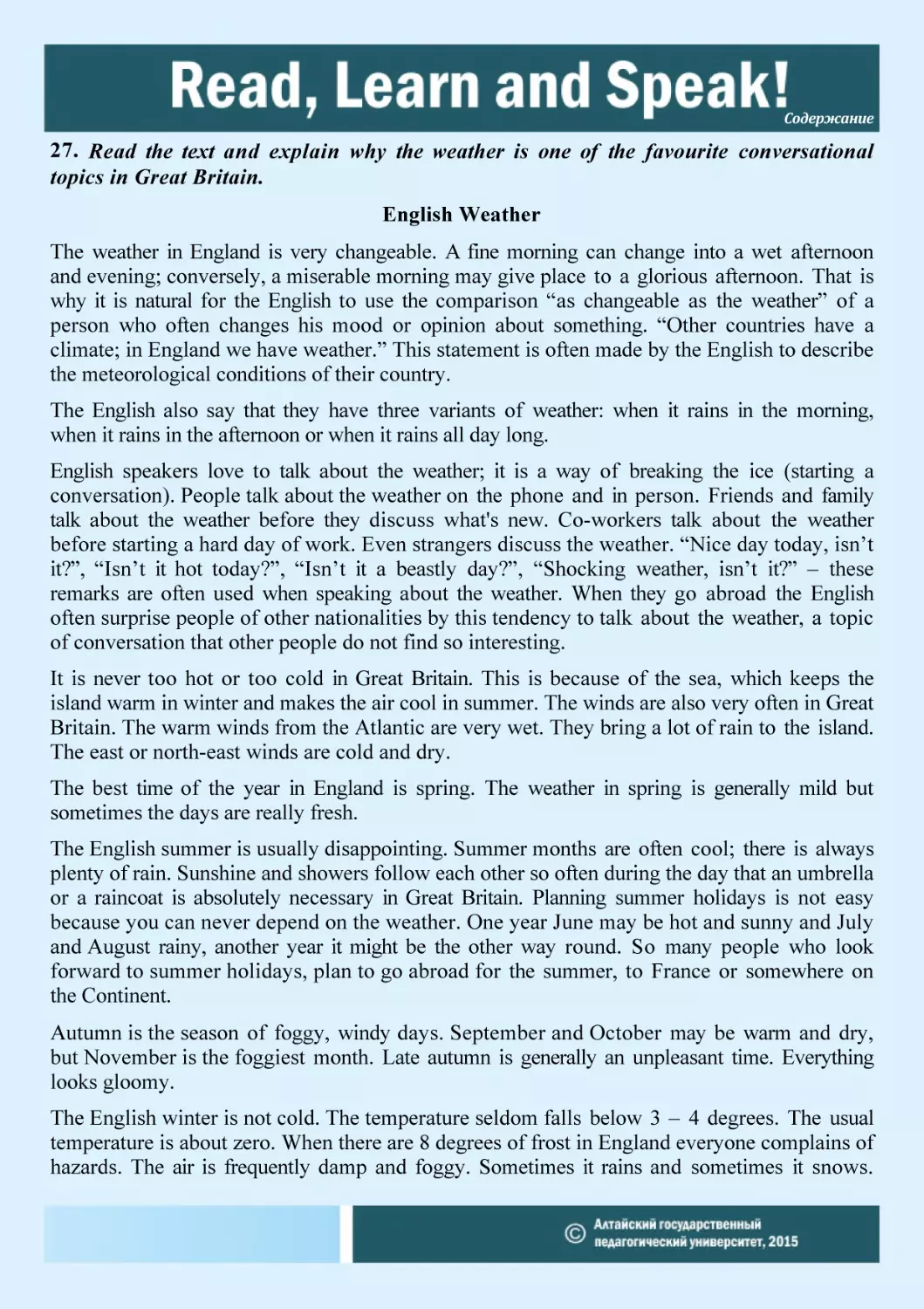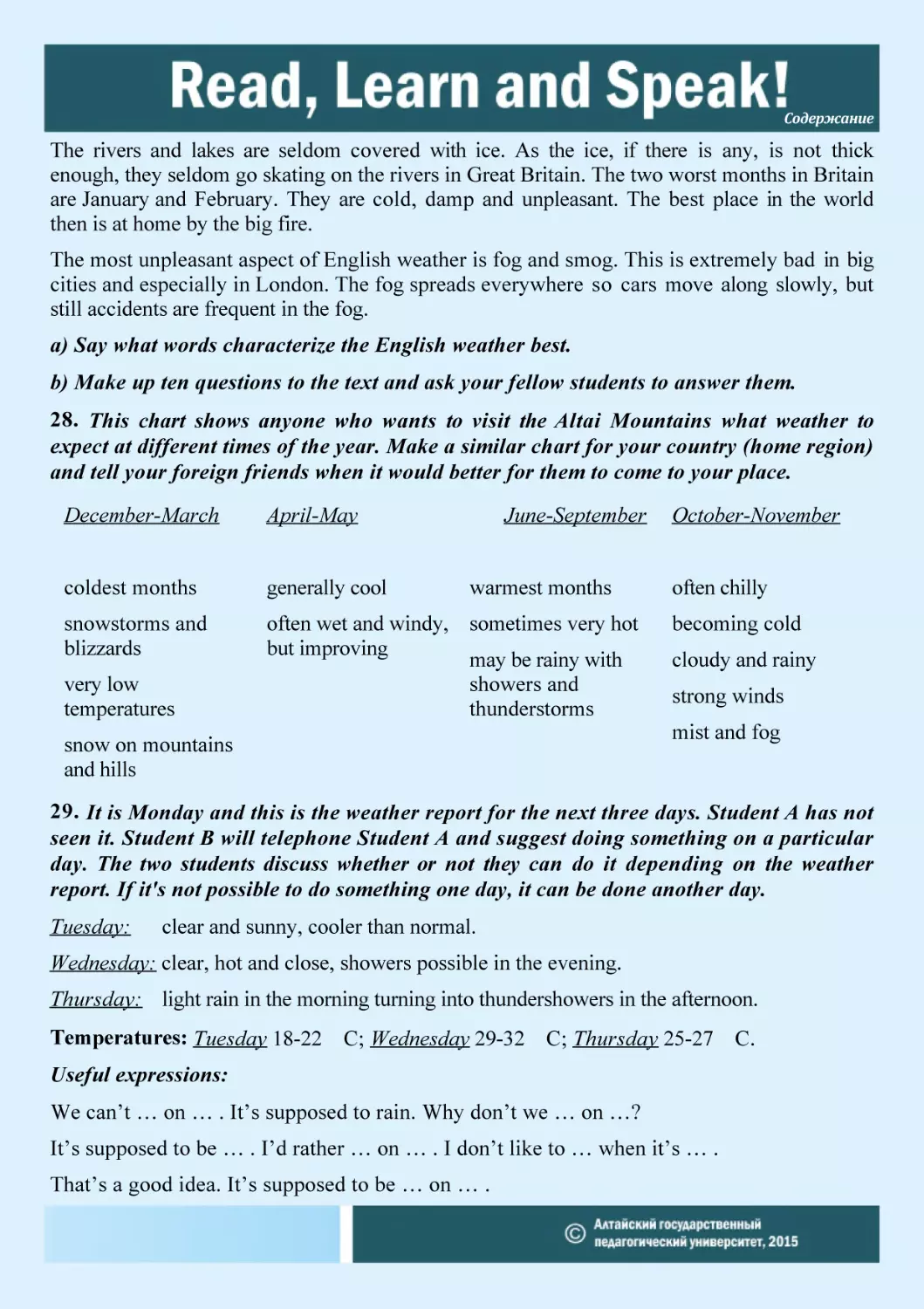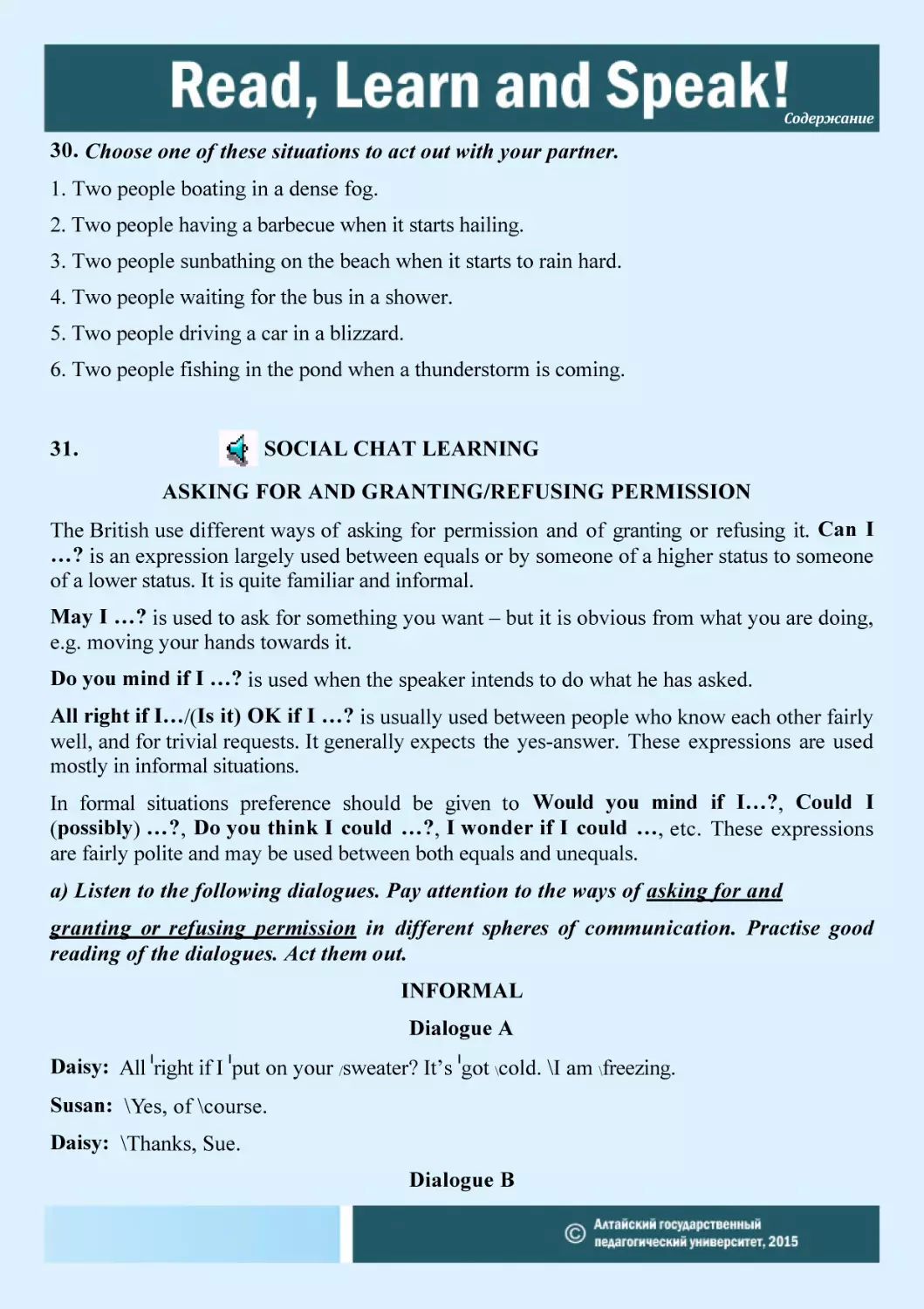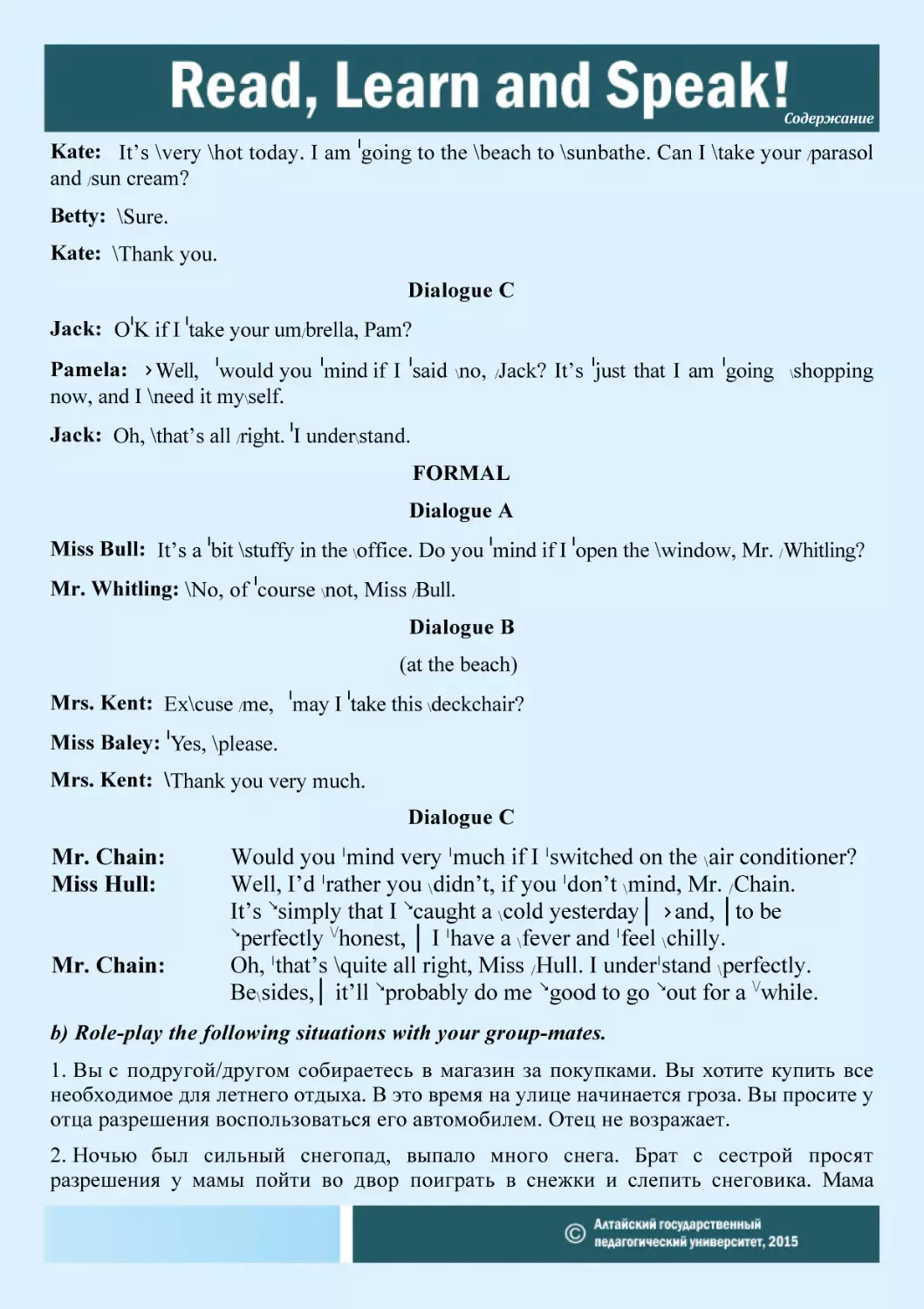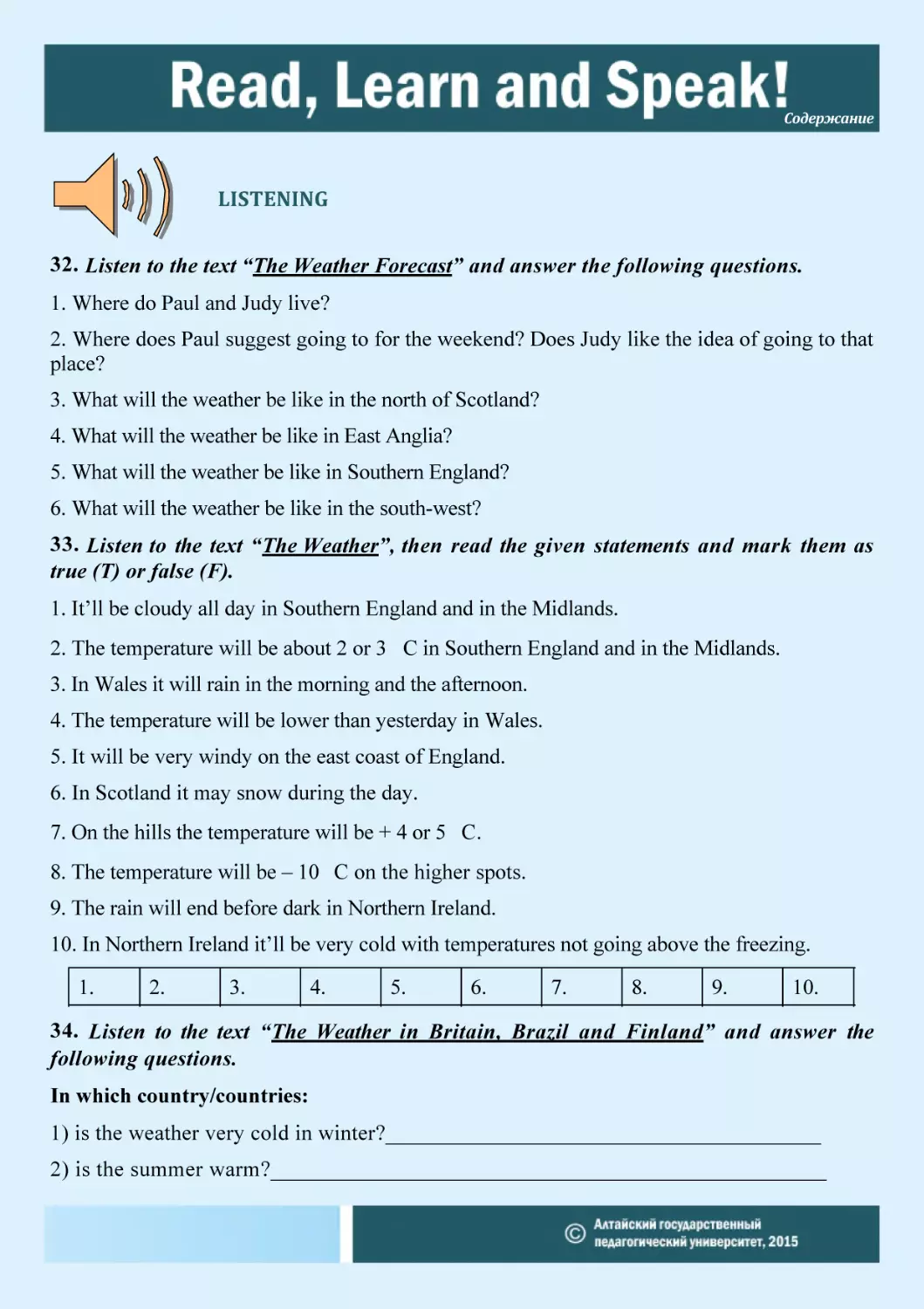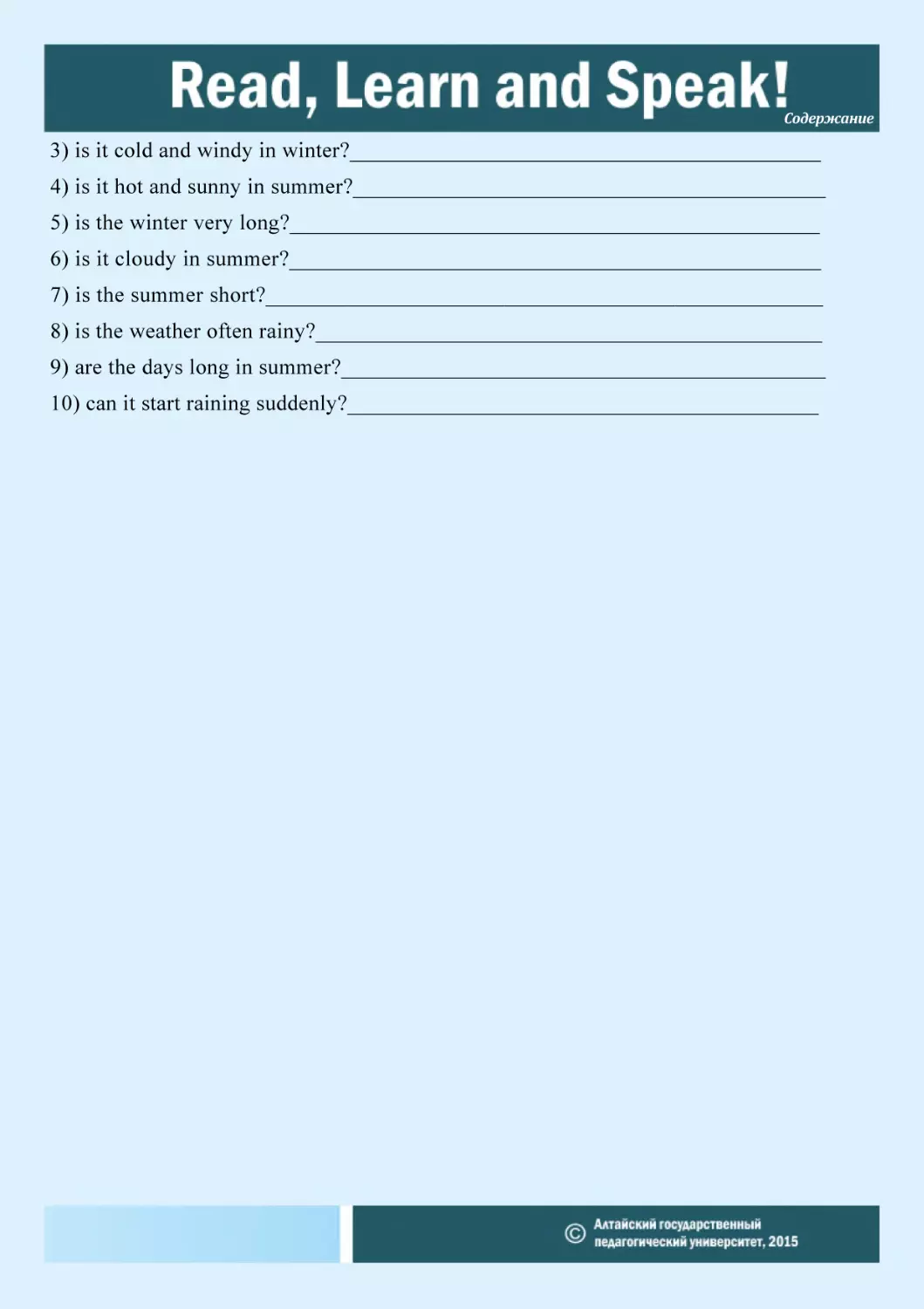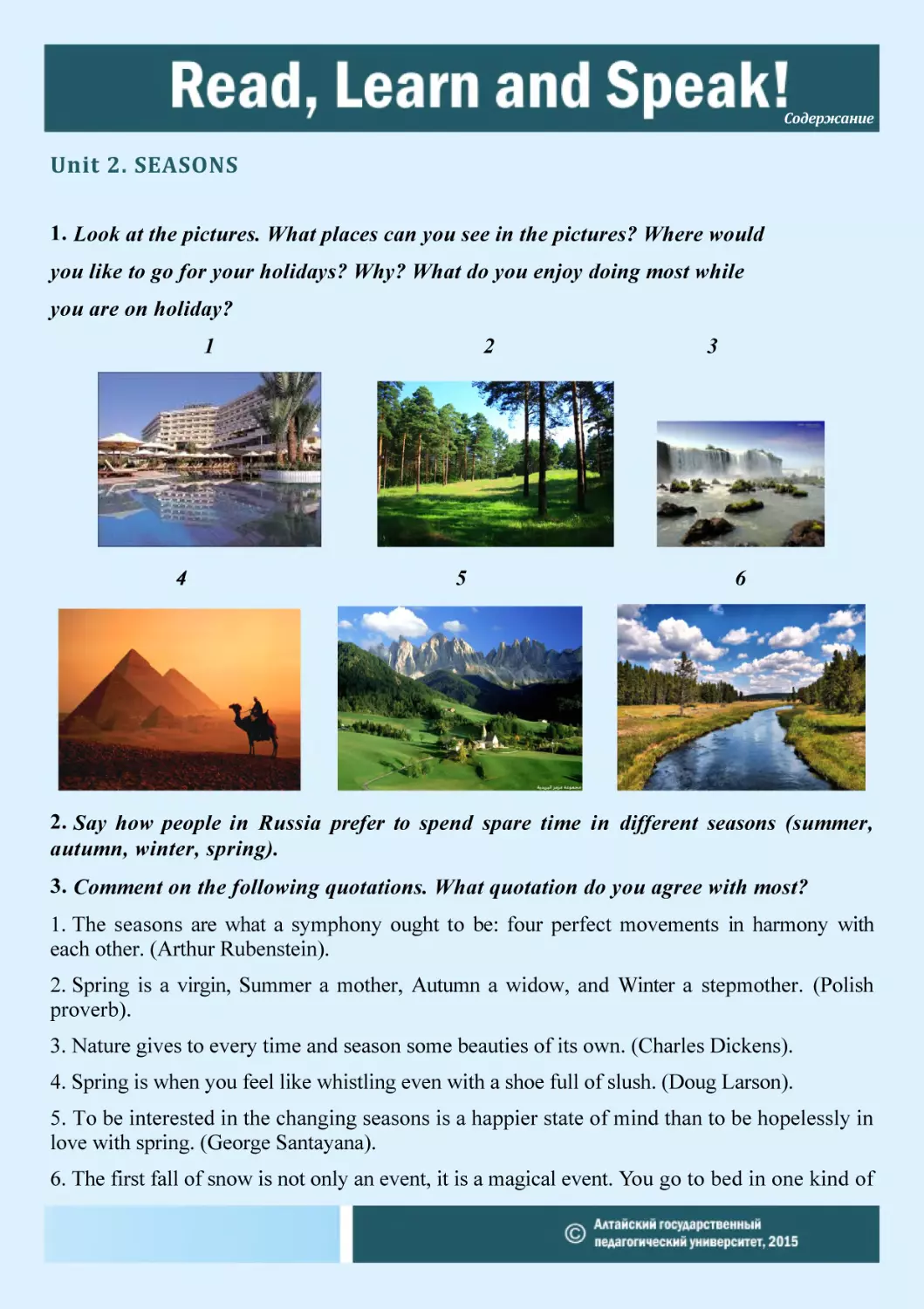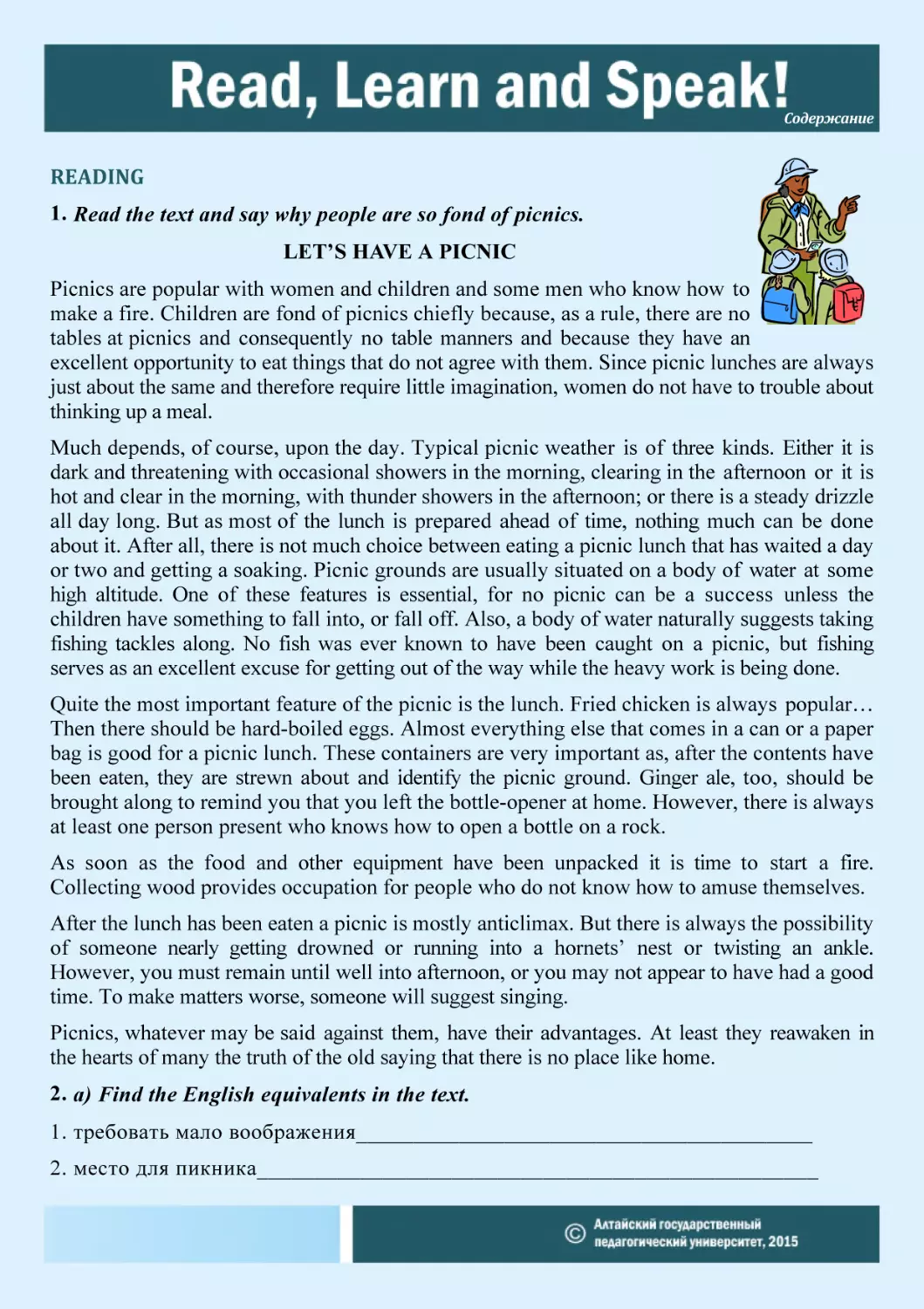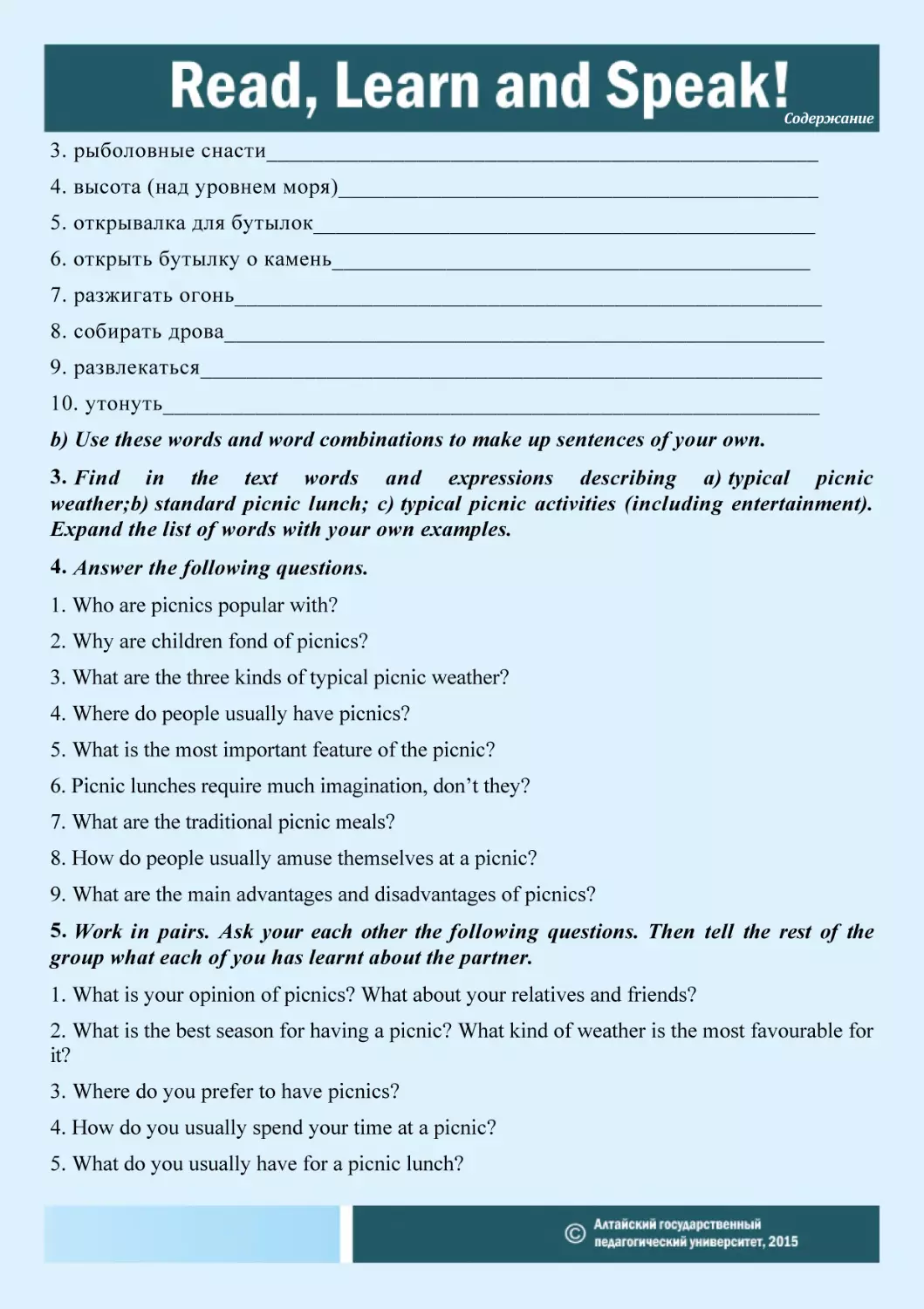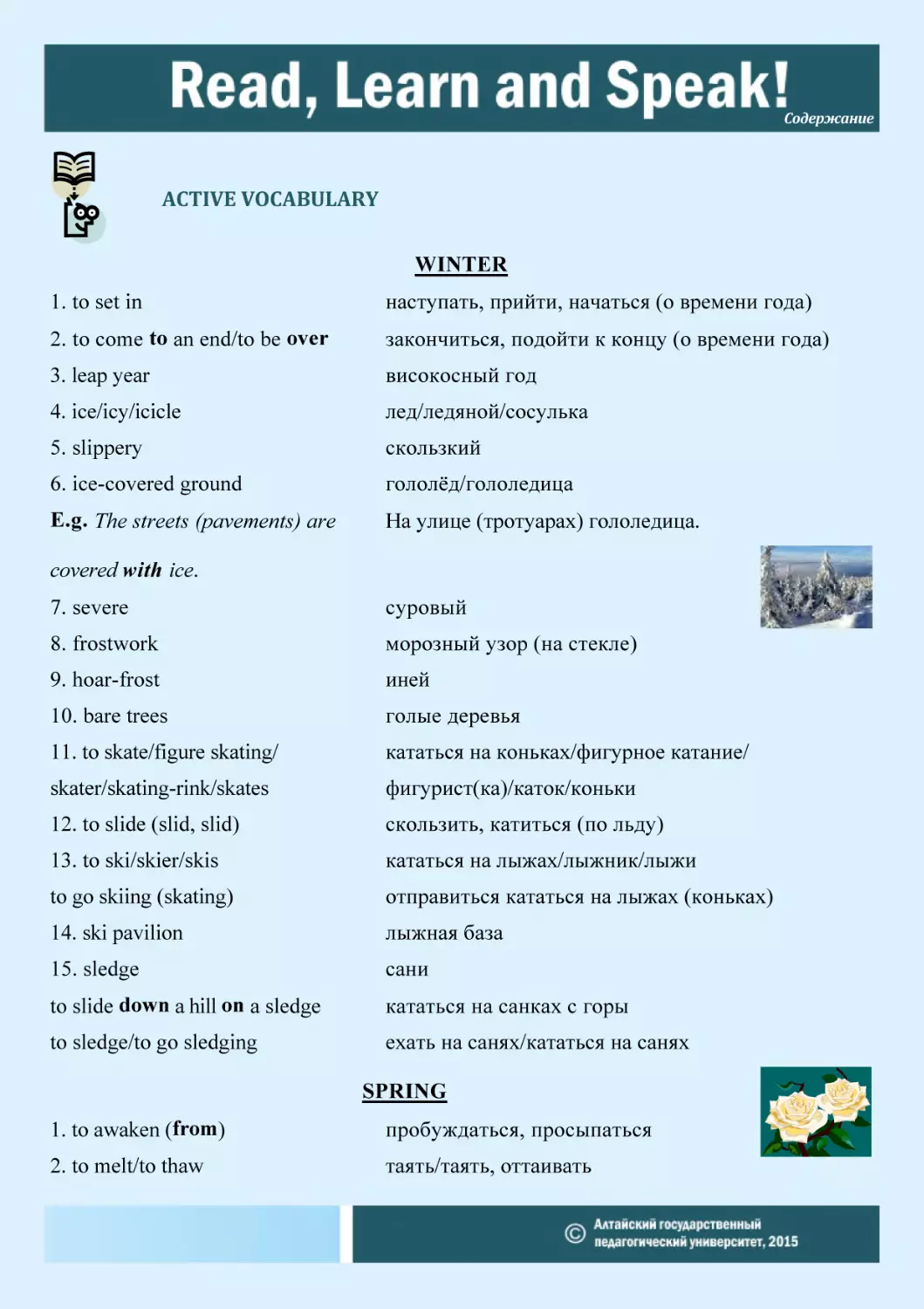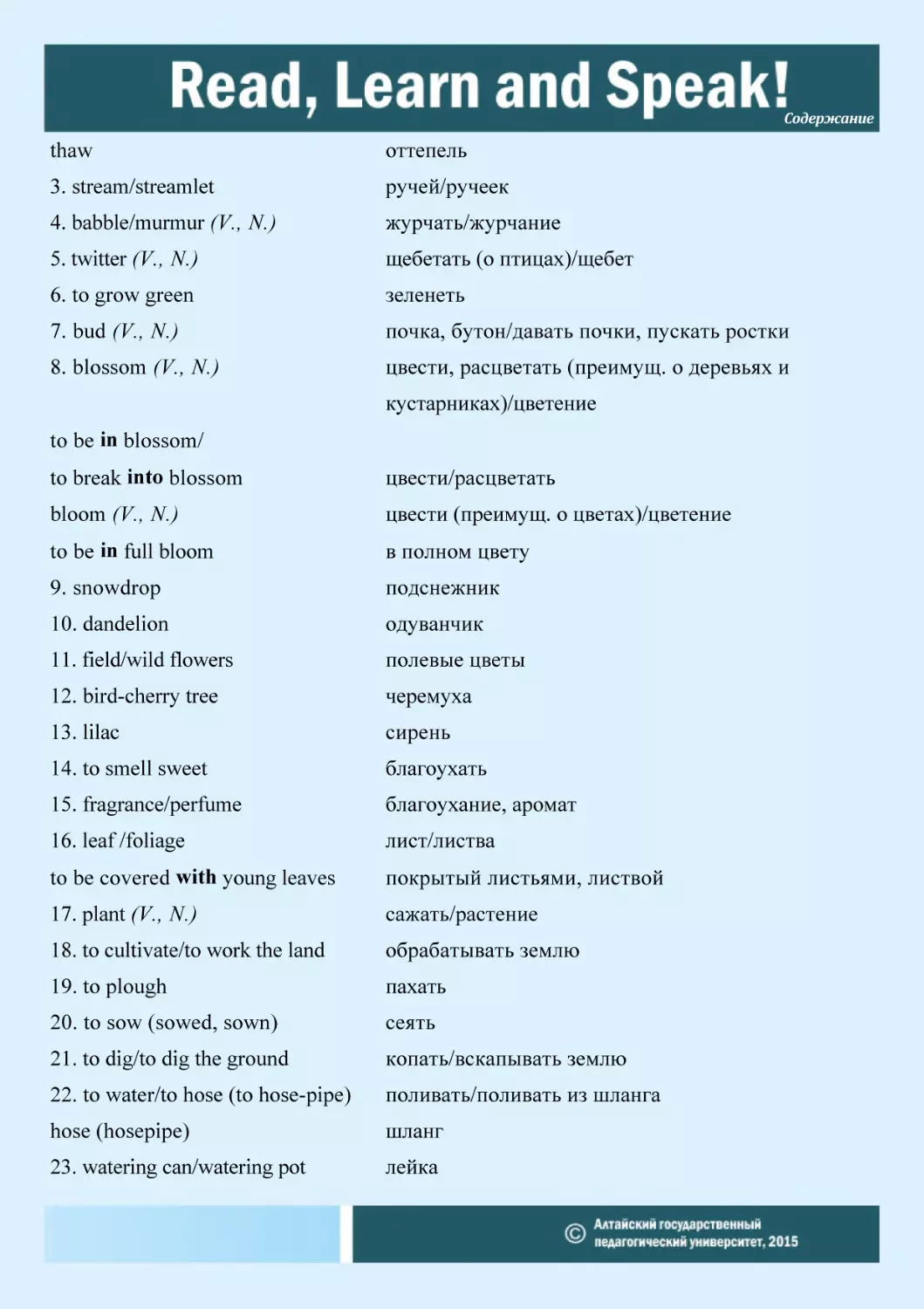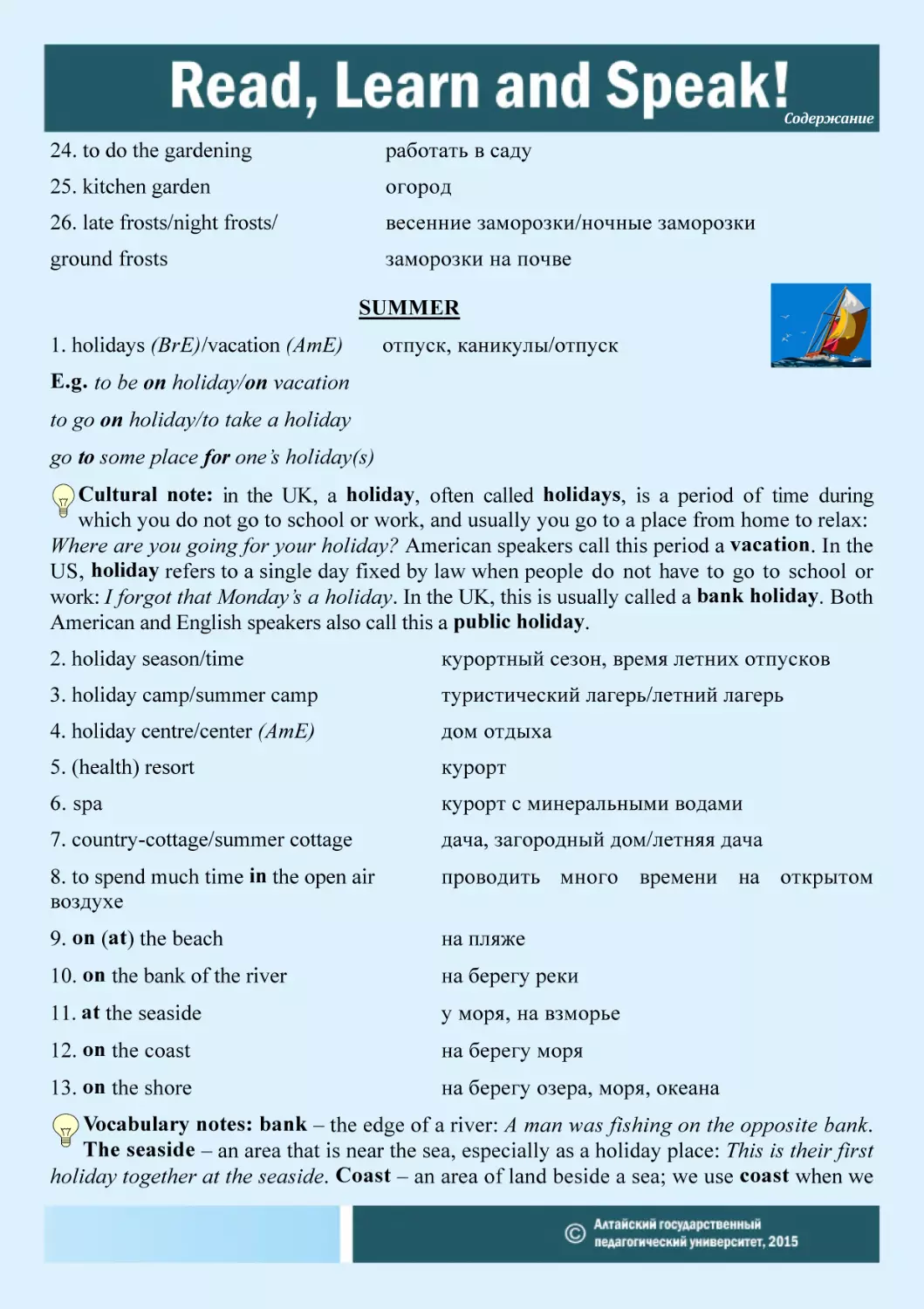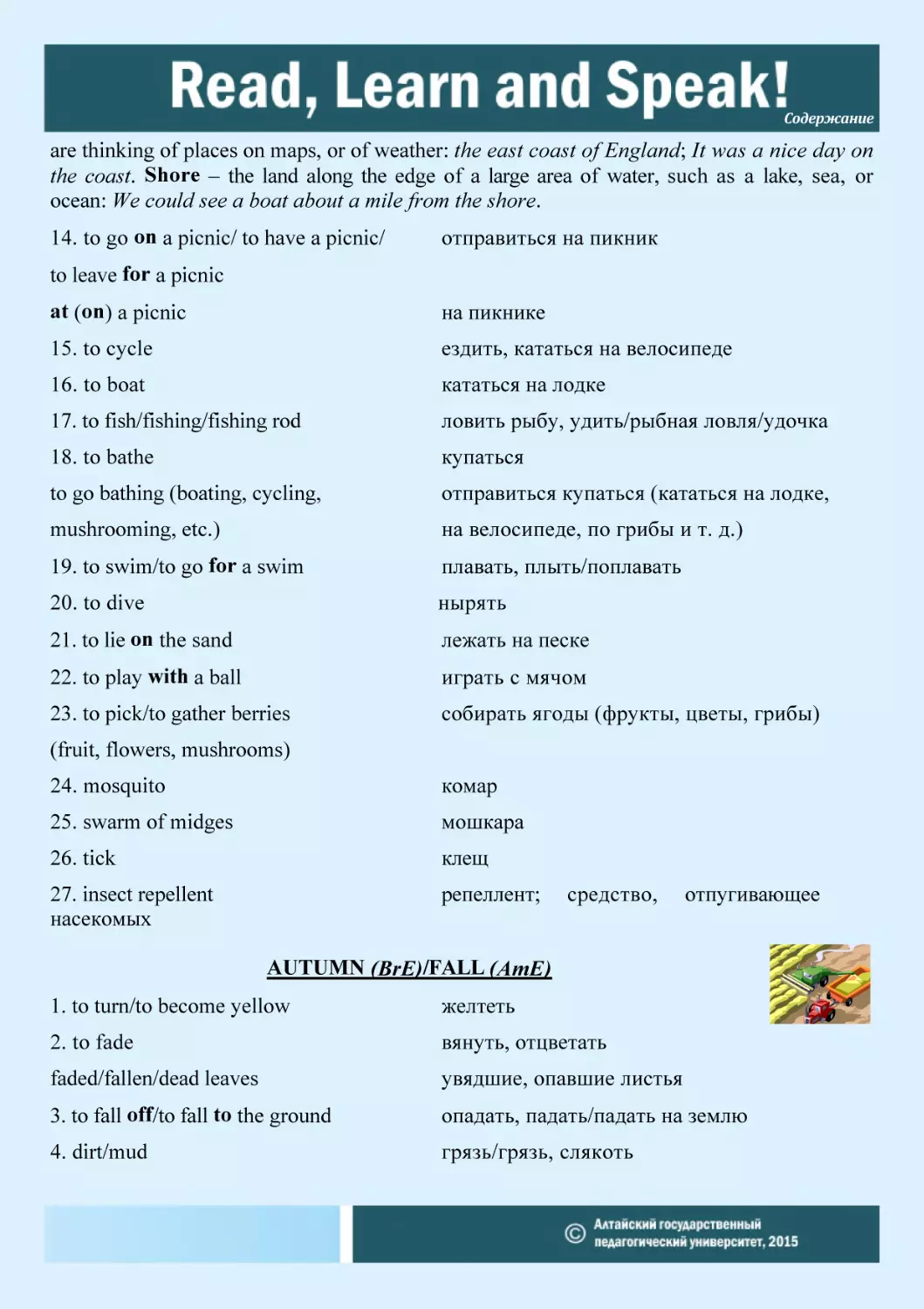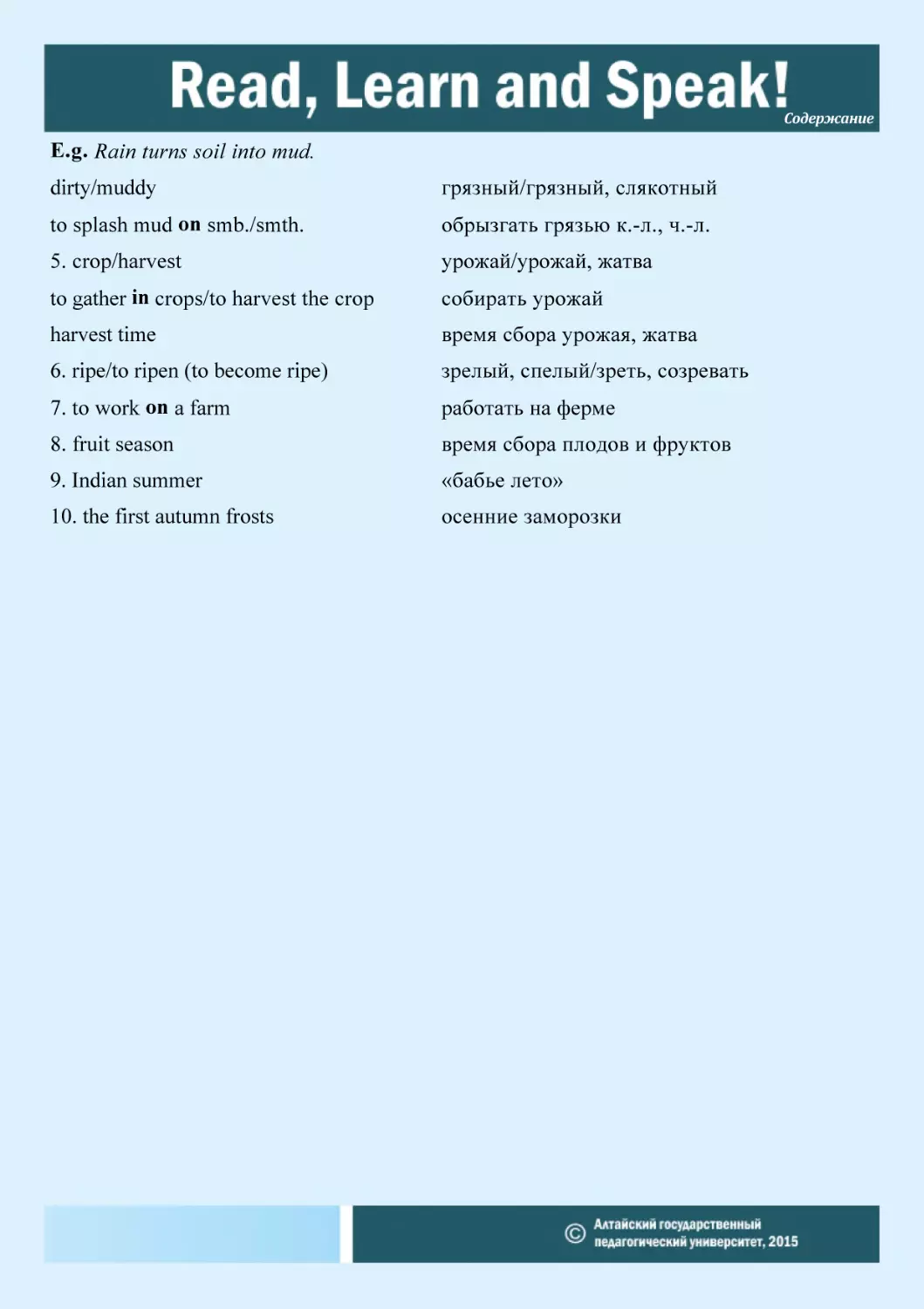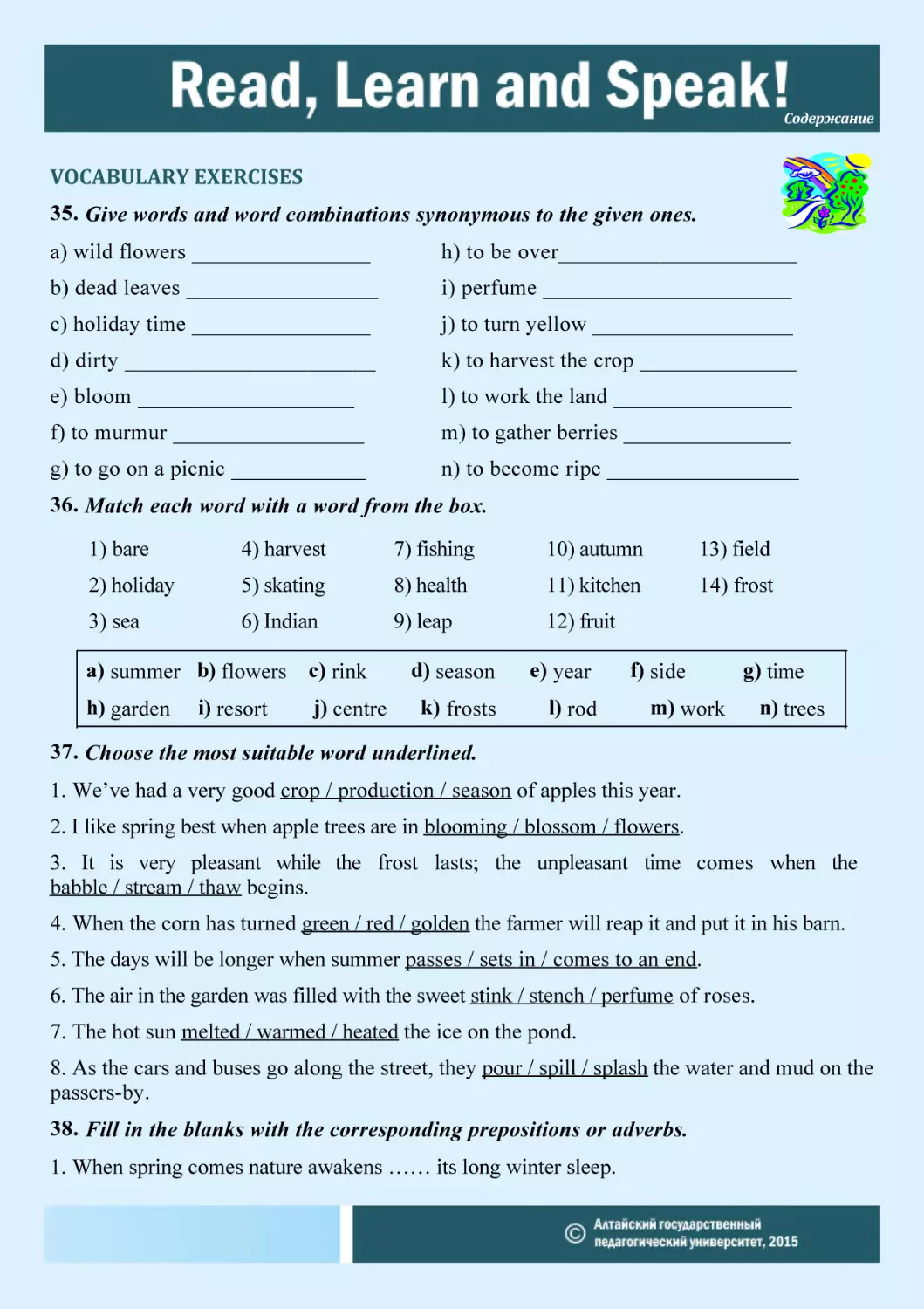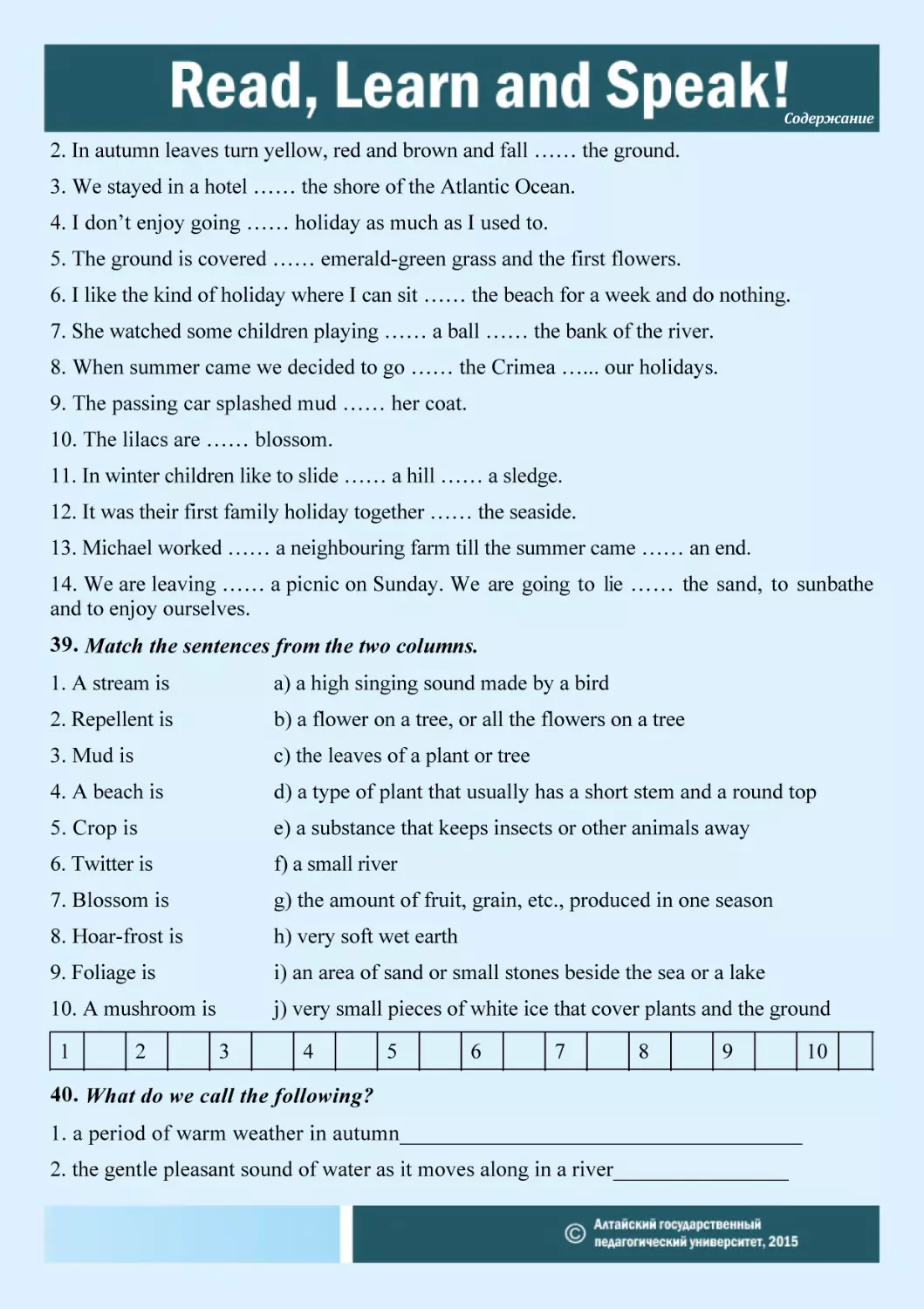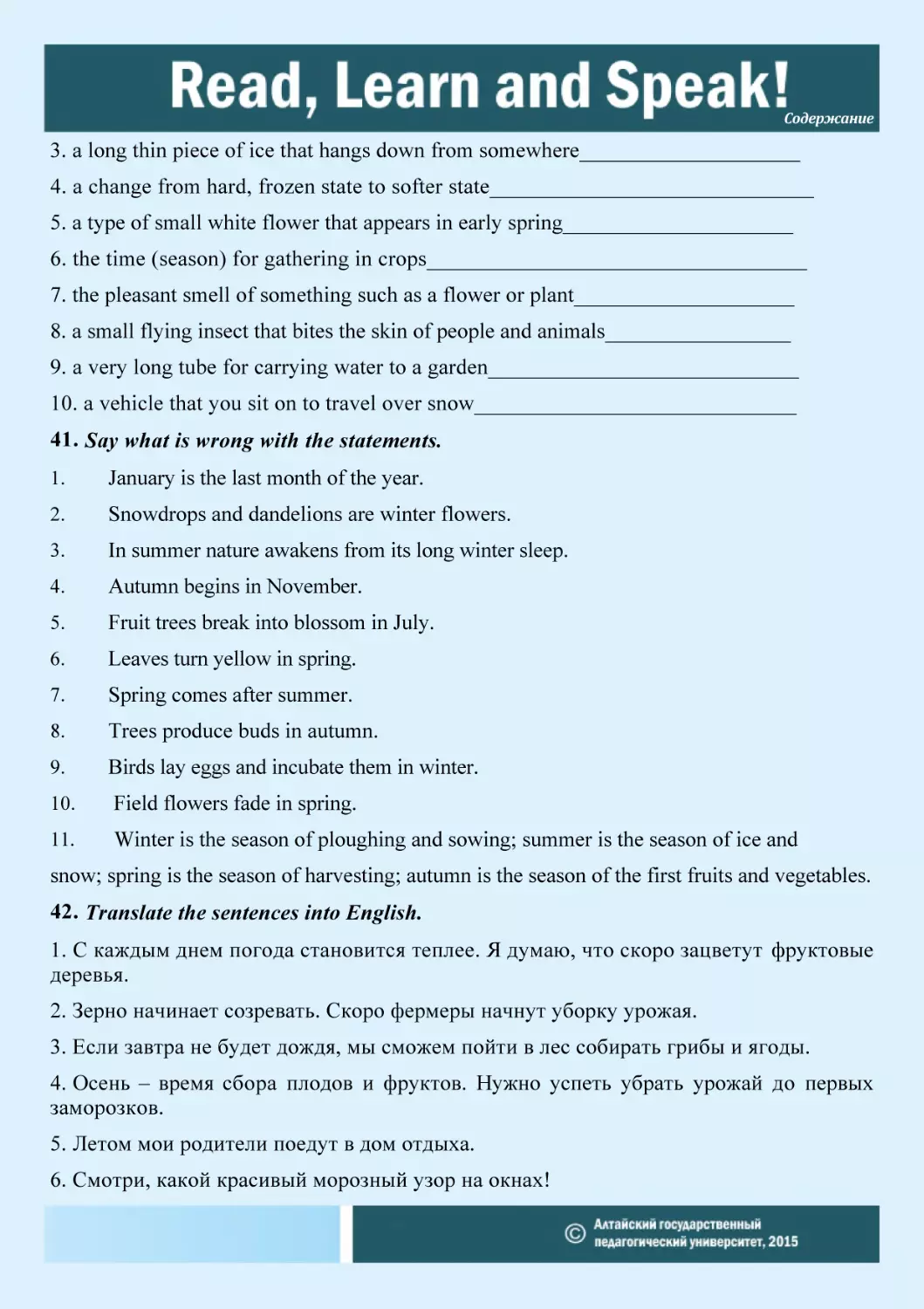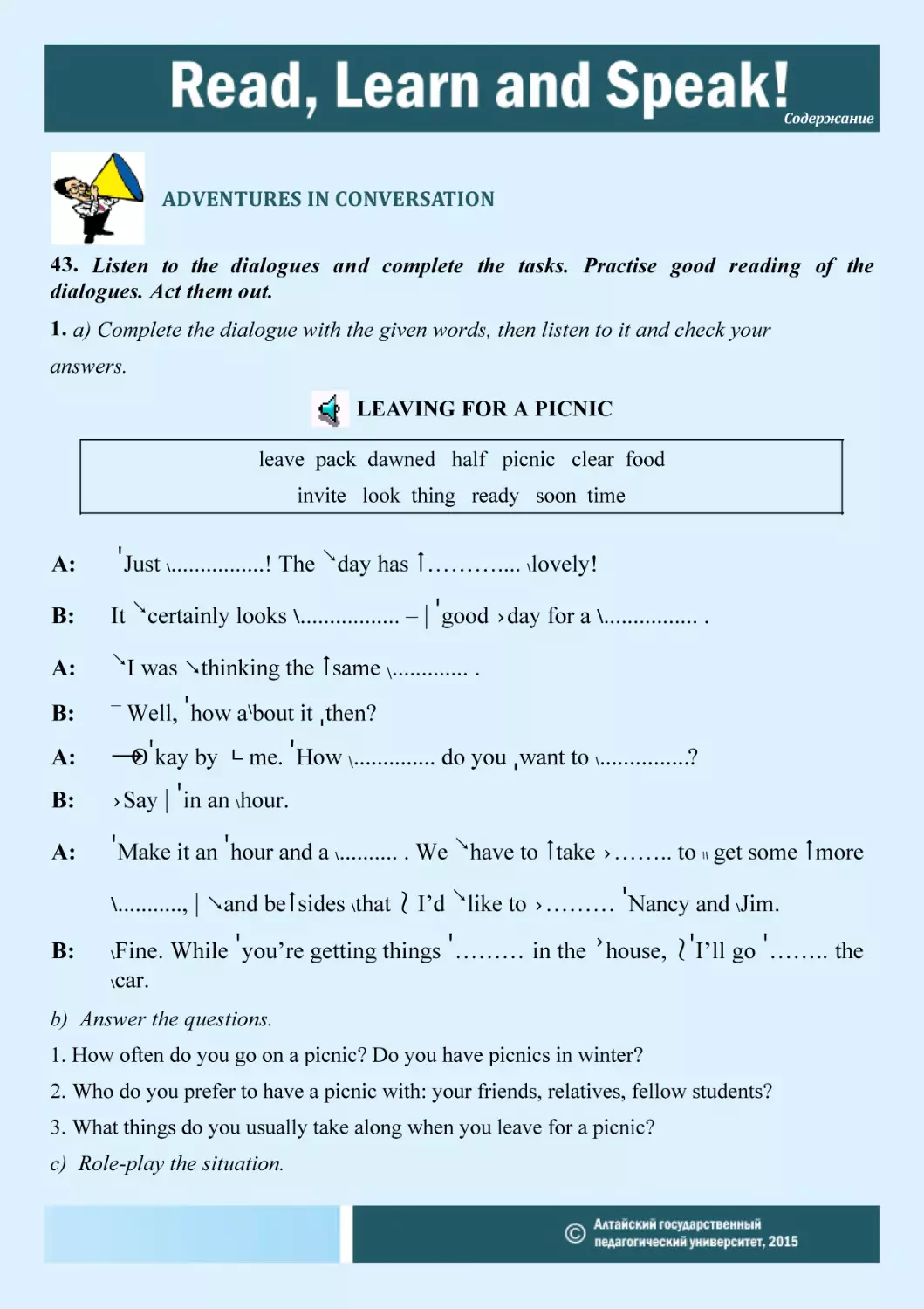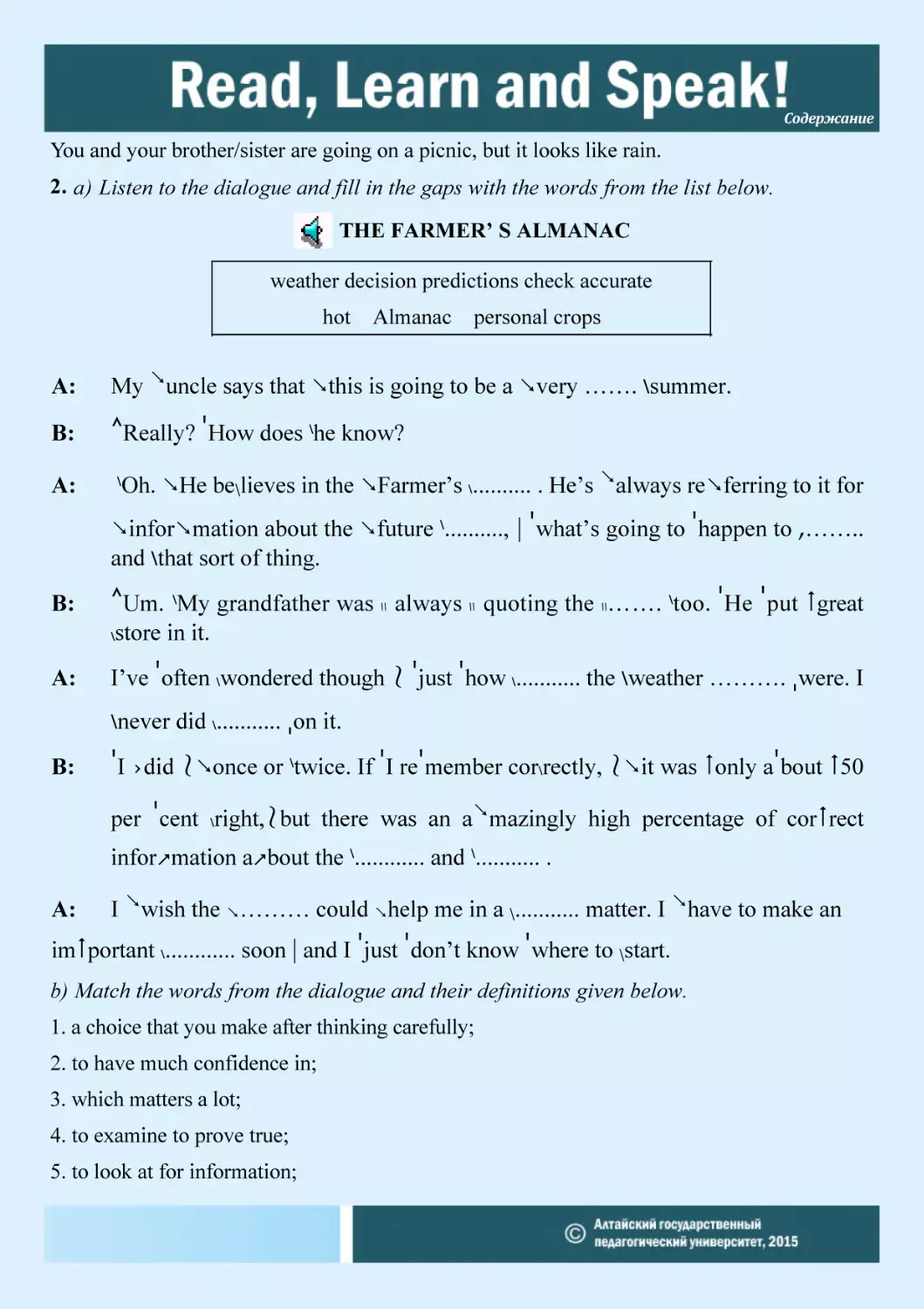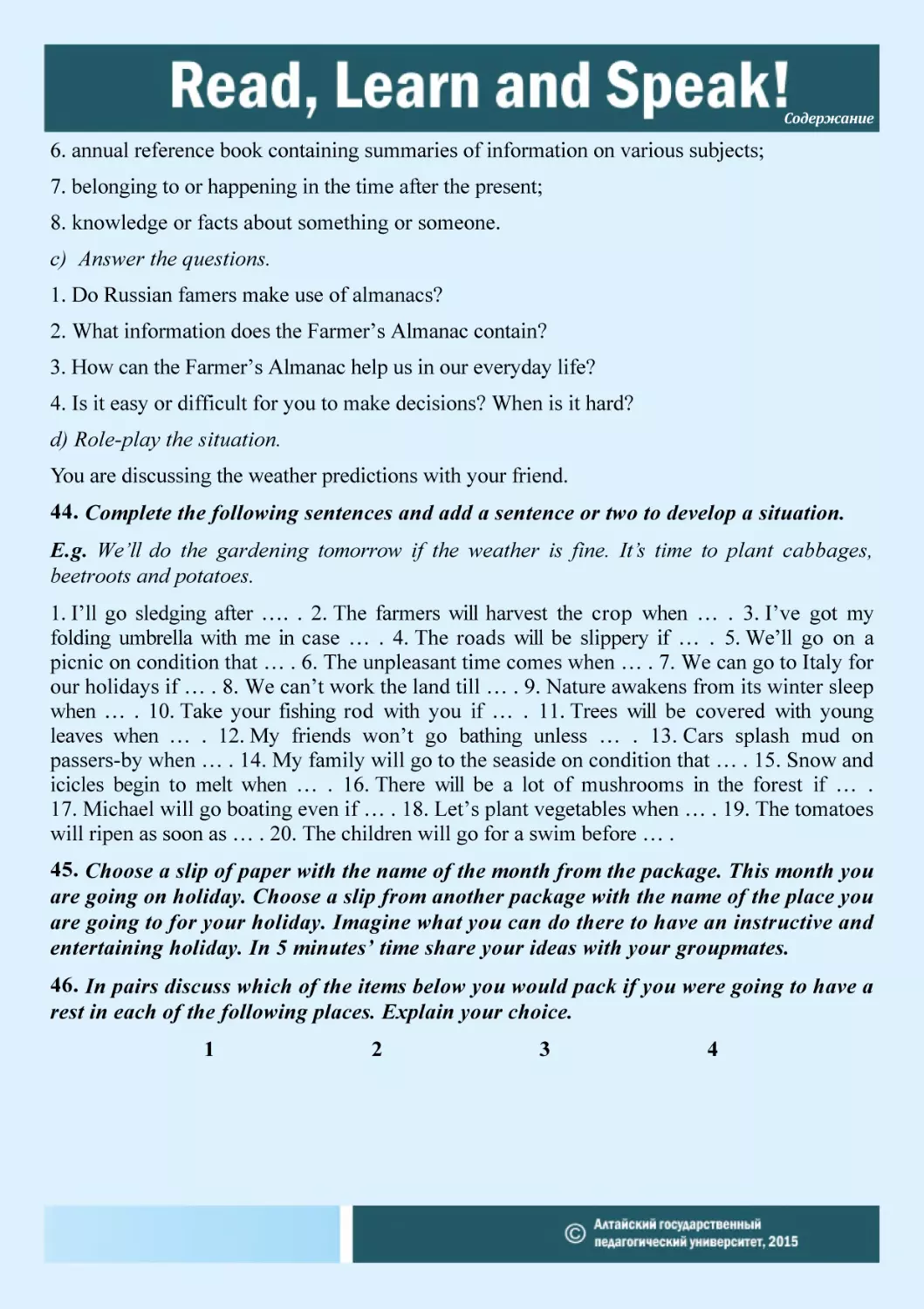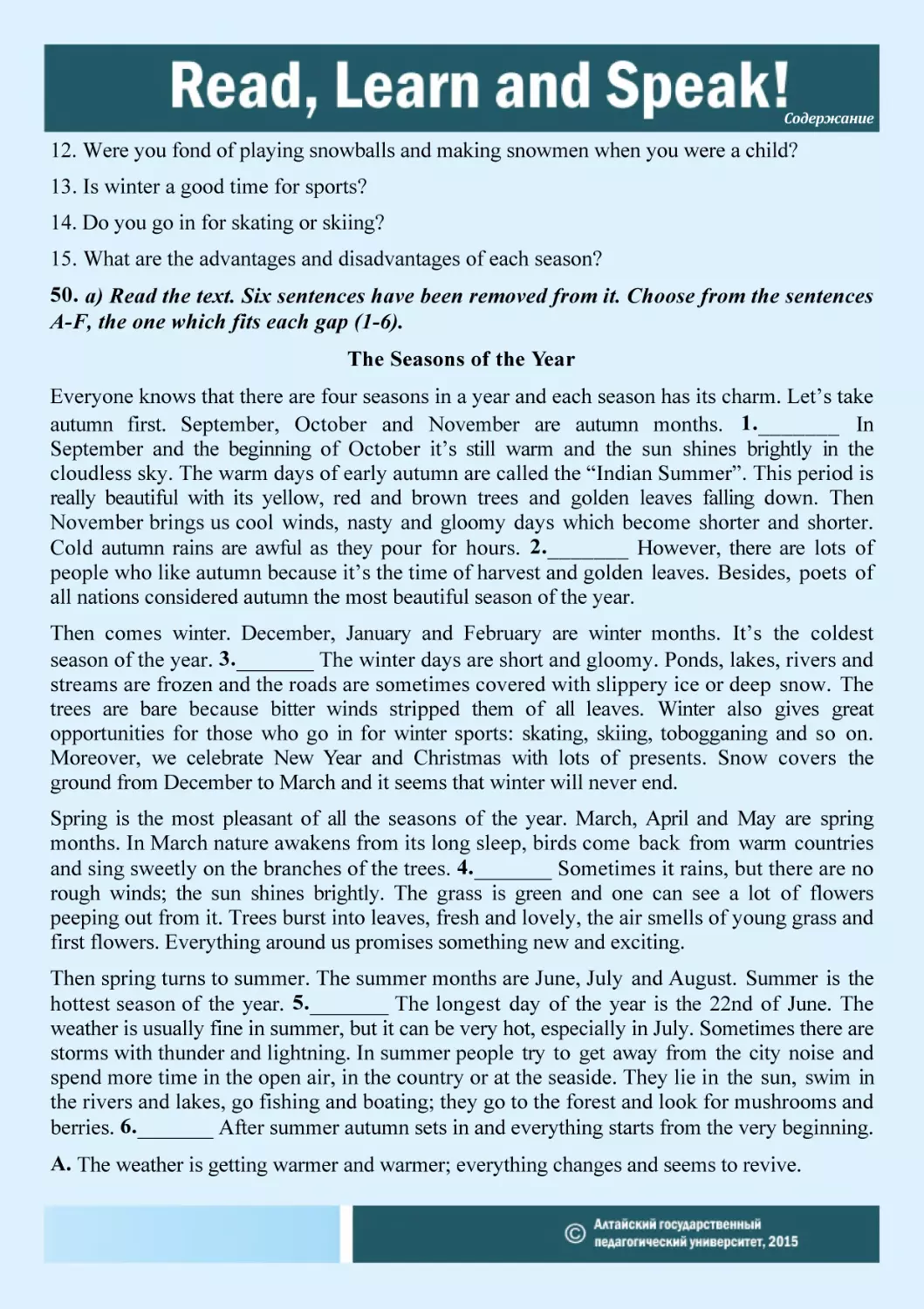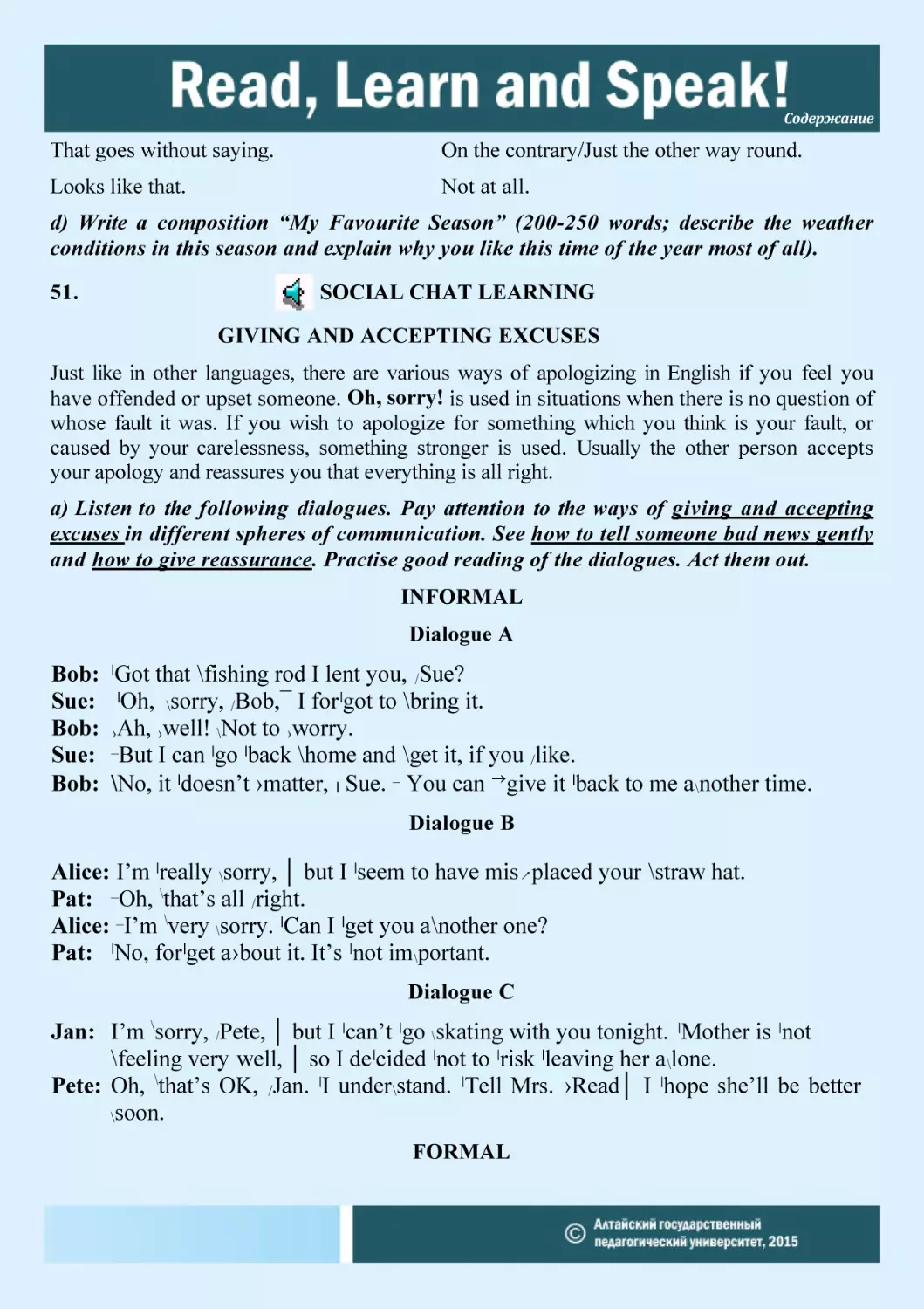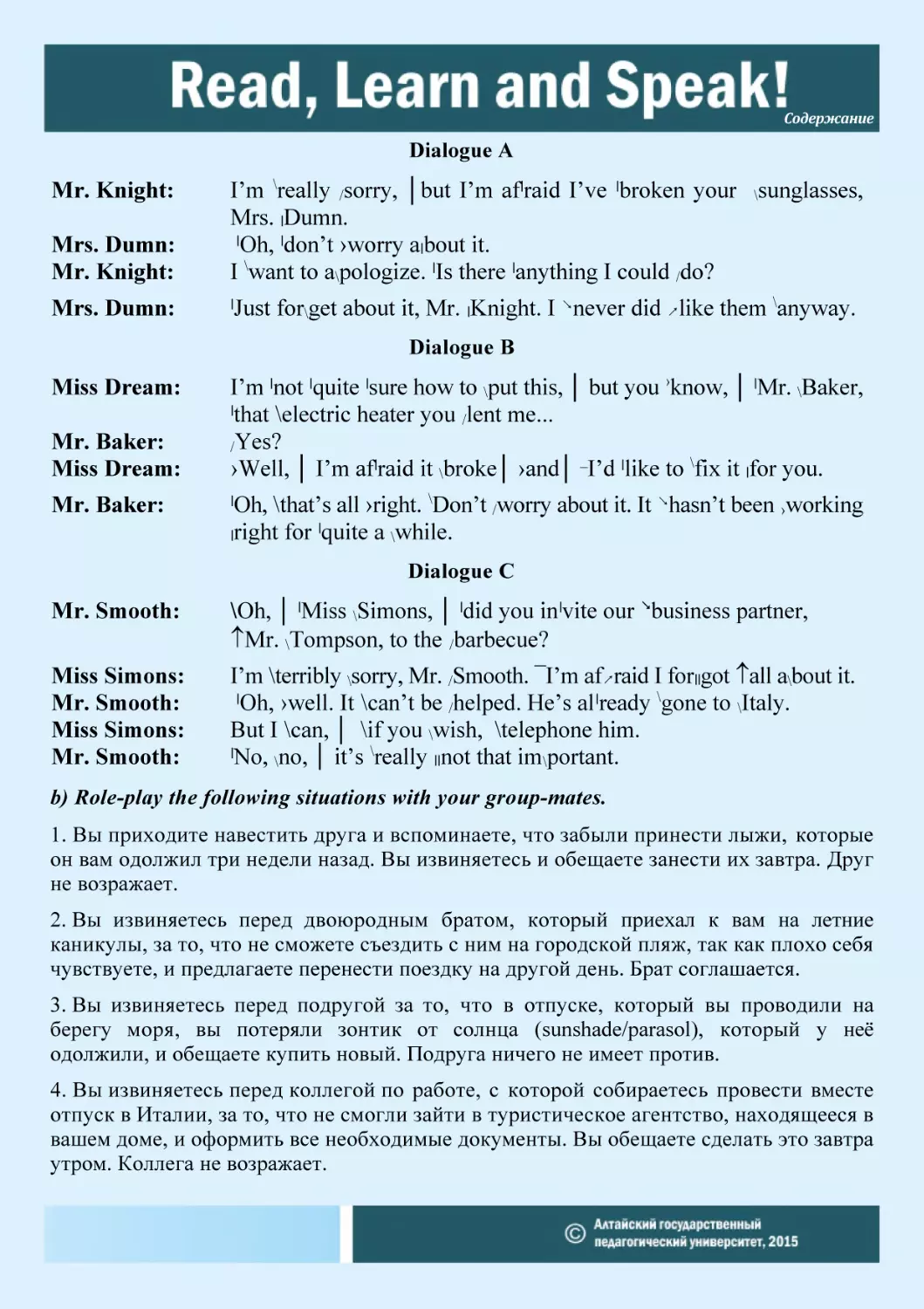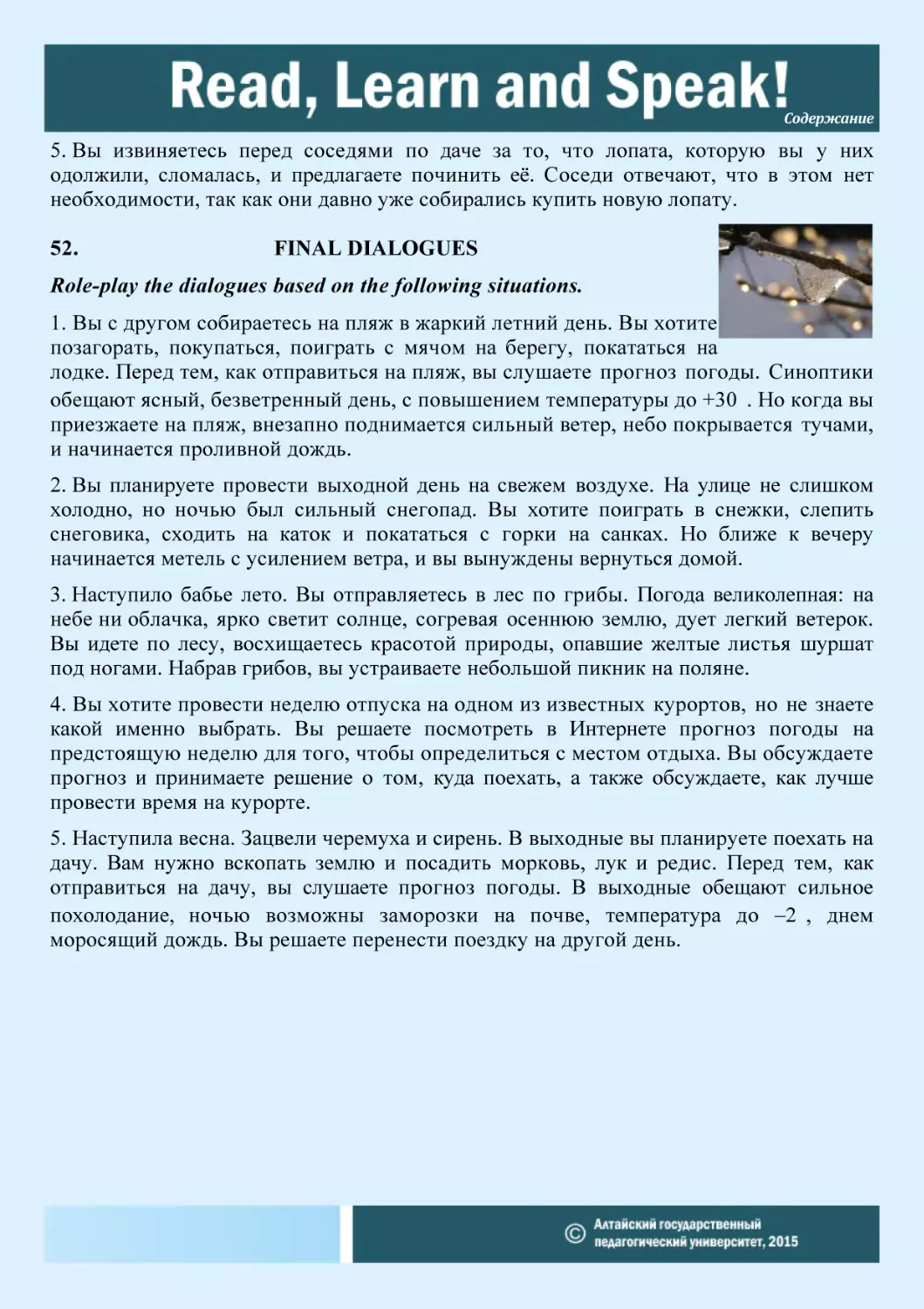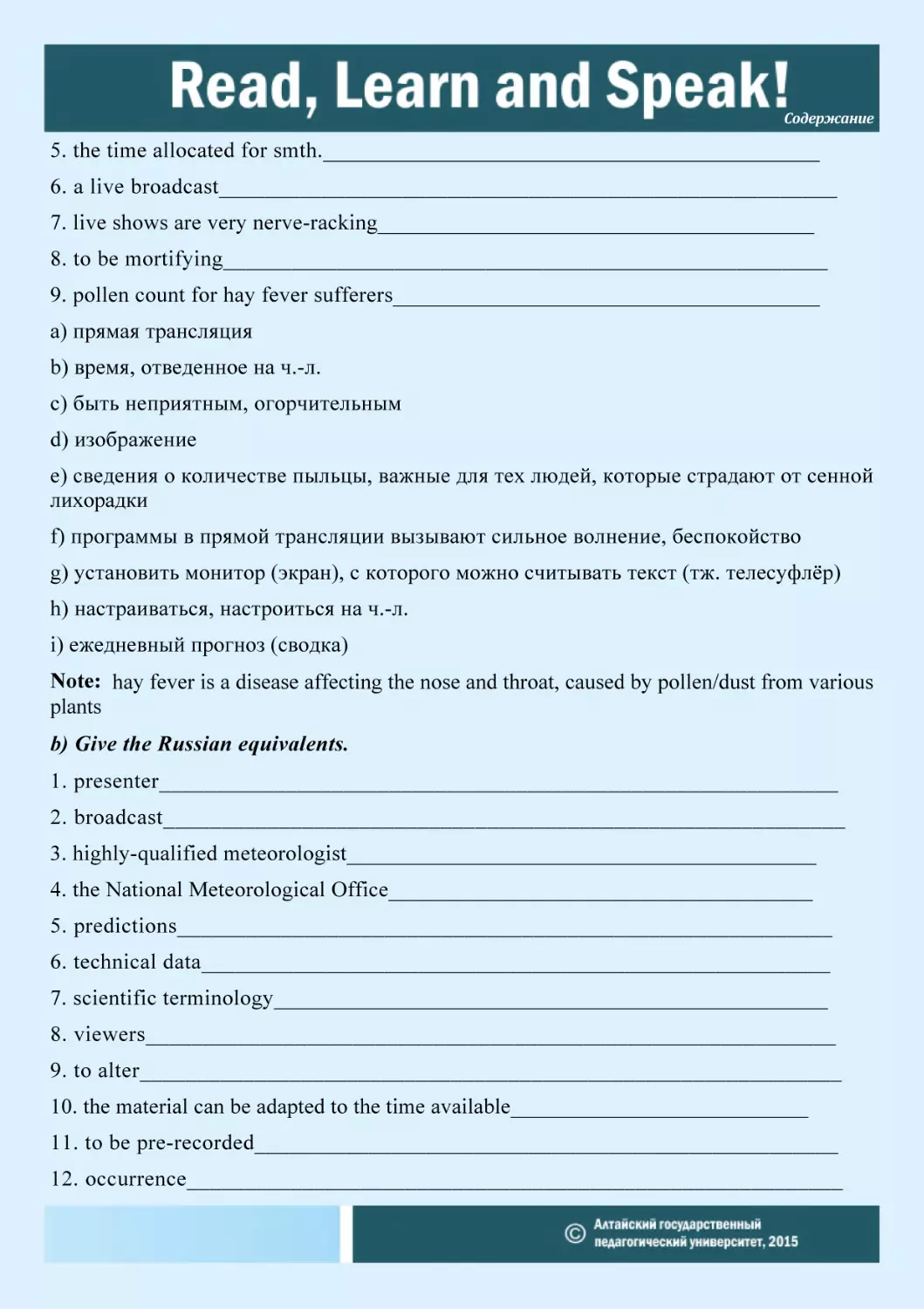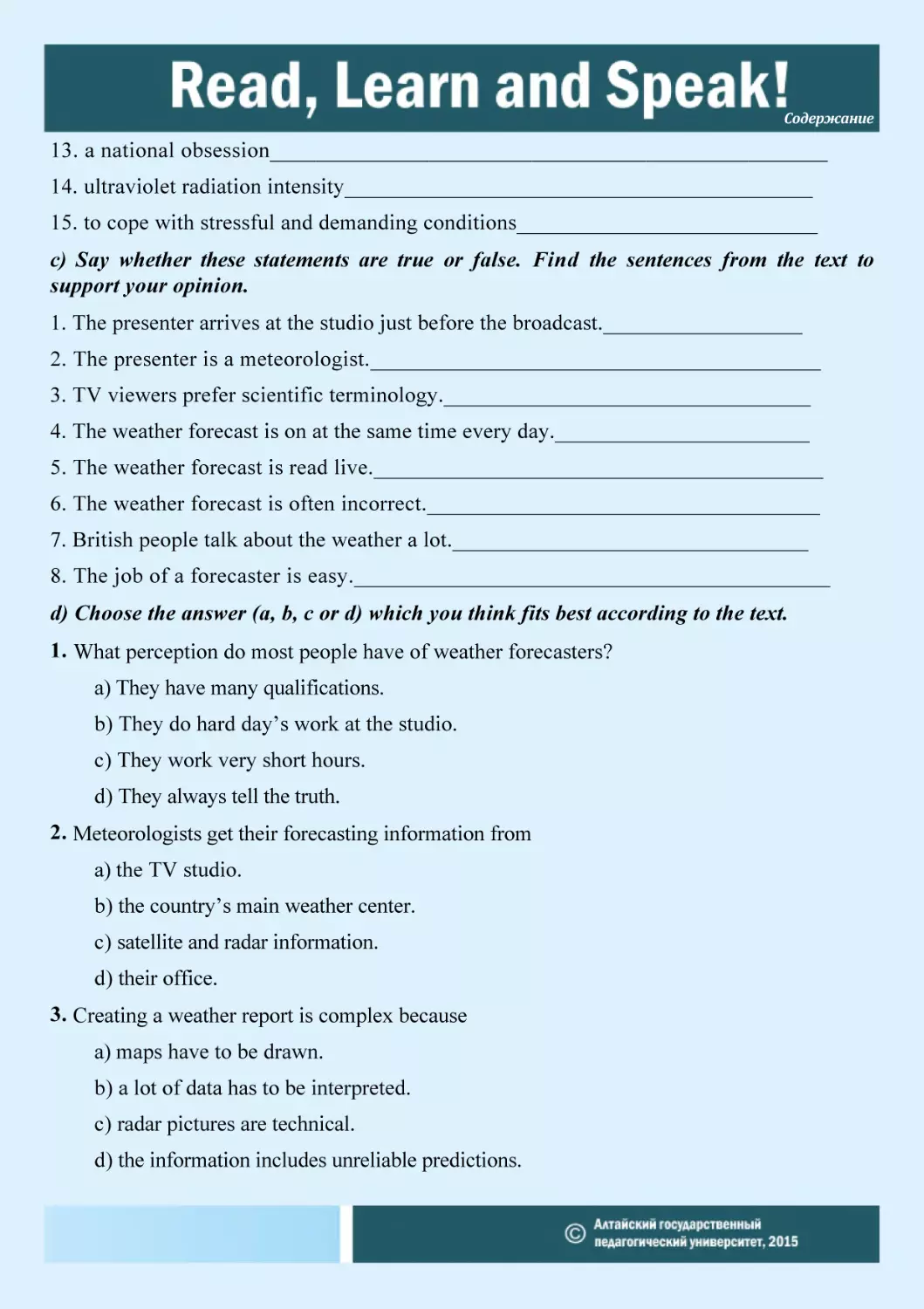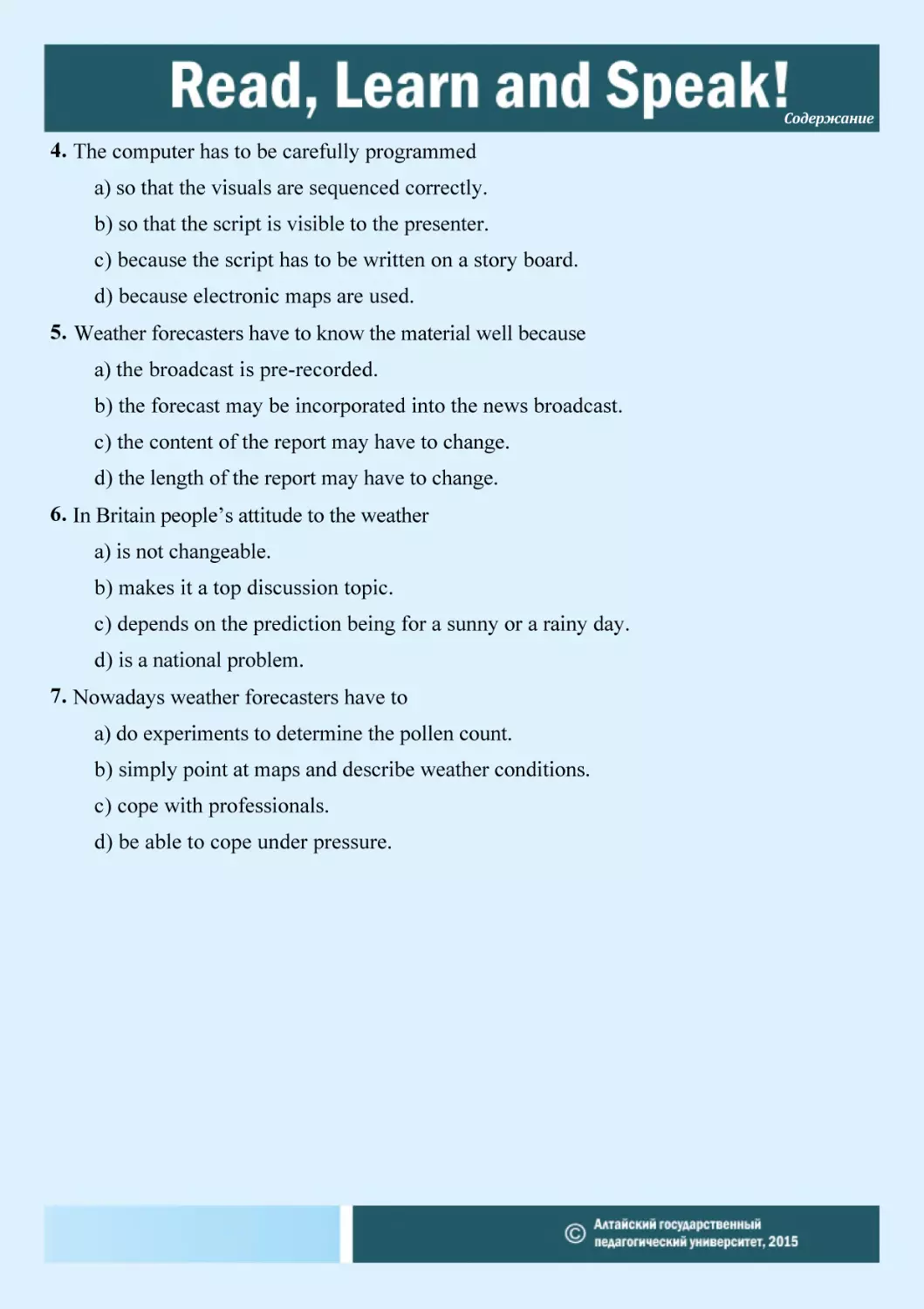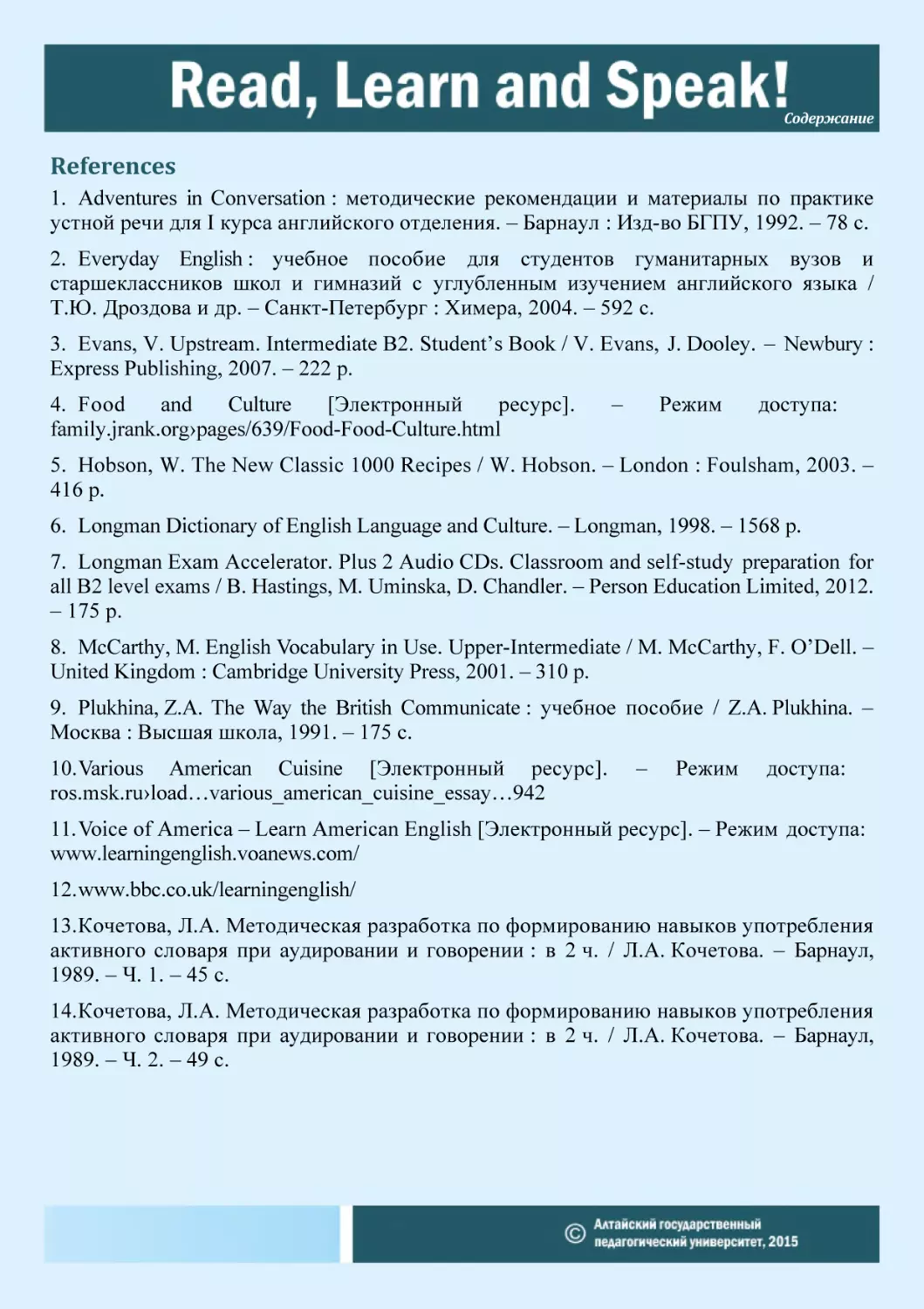Автор: Романова Т.А. Андреева О.С. Кустова С.В.
Теги: английский язык языкознание учебное пособие
ISBN: 978–5–88210–804–4
Год: 2015
Текст
Содержание
Содержание
Об издании
Основной титульный экран
Дополнительный титульный экран непериодического издания – 1
Дополнительный титульный экран непериодического издания – 2
Содержание
Министерство образования и науки Российской Федерации
Федеральное государственное бюджетное образовательное учреждение
высшего образования
«Алтайский государственный педагогический университет»
Read, Learn and Speak!
ПРАКТИЧЕСКИЙ КУРС АНГЛИЙСКОГО ЯЗЫКА
Учебное пособие
Барнаул
ФГБОУ ВО "АлтГПУ"
2015
Об издании - 1, 2, 3.
ISBN 978–5–88210–804–4
Содержание
УДК 811.111(075)
ББК 81.432.1я73
R30
Read, Learn and Speak! Практический курс английского языка [Электронный ресурс] : учебное пособие /
Т.А. Романова, О.С. Андреева, С.В. Кустова и др. ; под ред. Т.А. Романовой. – Барнаул : АлтГПУ, 2015.
ISBN 978–5–88210–804–4
Авторы:
Романова Татьяна Александровна, канд. филол. наук, доцент АлтГПУ
Андреева Ольга Сергеевна, канд. филол. наук, доцент АлтГПУ
Кустова Светлана Викторовна, канд. пед. наук, доцент АлтГПУ
Рассолова Ирина Николаевна, канд. филол. наук, доцент АлтГПУ
Семкина Александра Владимировна, канд. филол. наук, доцент АлтГПУ
Чернова Мария Александровна, канд. филол. наук, доцент АлтГПУ
Лопатина Мария Юрьевна, канд. филол. наук, доцент АлтГПУ
Дмитриева Ольга Александровна, канд. филол. наук, профессор ААЭП
Сахарова Зоя Андреевна, канд. филол. наук, доцент АлтГПУ
Шацких Наталья Николаевна, канд. филол. наук, доцент АлтГПУ
Рецензенты:
Т.Г. Пшенкина, доктор филологических наук, профессор (Алтайский государственный педагогический
университет);
С.Ю. Богданова, доктор филологических наук, профессор (Евразийский лингвистический институт –
филиал в г. Иркутске ФГБОУ ВПО «Московский государственный лингвистический университет»)
Издание содержит разработки по темам: “Family Ties”, “Describing People” (О.С. Андреева, А.В. Семкина);
“Flats and Houses” (Т.А. Романова, С.В. Кустова, И.Н. Рассолова); “Having Things Done”, “Telephoning”
(М.А. Чернова, Т.А. Романова); “City” (М.А. Чернова); “Around the World” (И.Н. Рассолова); “Food and
Meals” (М.Ю. Лопатина, О.А. Дмитриева); “Shopping” (З.А. Сахарова, Т.А. Романова); “Seasons and
Weather” (Н.Н. Шацких). Каждый раздел включает в себя тематические тексты с заданиями по
активизации прочитанного материала, тематический словарь, упражнения для активизации словаря,
тематические диалоги с заданиями для развития навыков разговорной речи, задания на аудирование.
Пособие “Read, Learn and Speak!” предназначено для студентов 1-го курса языковых вузов, изучающих
английский язык по направлениям «Педагогическое образование» и «Лингвистика», а также может
быть рекомендовано широкому кругу лиц, желающих расширить и углубить свои знания и разговорные
умения по английскому языку.
Рекомендовано к изданию редакционно-издательским советом АлтГПУ 12.11.2015 г.
Текстовое (символьное) электронное издание.
Системные требования:
Intel Celeron 2 ГГц ; ОЗУ 512 Мб ; Windows XP/Vista/7/8 ; SVGA монитор с разрешением 1024х768.
Об издании - 1, 2, 3.
Содержание
Электронное издание создано при использовании программного обеспечения Sunrav BookOffice.
Объём издания - 32 614 КБ.
Дата подписания к использованию: 15.02.2016
Федеральное государственное бюджетное образовательное учреждение высшего образования
«Алтайский государственный педагогический университет» (ФГБОУ ВО «АлтГПУ»)
ул. Молодежная, 55, г. Барнаул, 656031
Тел. (385-2) 36-82-71, факс (385-2) 24-18-72
е-mail: rector@altspu.ru, http://www.altspu.ru
Об издании - 1, 2, 3.
Содержание
Contents
Предисловие
Contents
FAMILY TIES
Unit 1. RELATIONSHIPS
READING
ACTIVE VOCABULARY
VOCABULARY EXERCISES
ADVENTURES IN CONVERSATION
LISTENING
Unit 2. MARRIAGE
READING
ACTIVE VOCABULARY
VOCABULARY EXERCISES
ADVENTURES IN CONVERSATION
LISTENING
DESCRIBING PEOPLE
Unit 1. APPEARANCE
READING
ACTIVE VOCABULARY
VOCABULARY EXERCISES
ADVENTURES IN CONVERSATION
LISTENING
Unit 2. CHARACTER
READING
ACTIVE VOCABULARY
VOCABULARY EXERCISES
ADVENTURES IN CONVERSATION
LISTENING
FLATS AND HOUSES
Unit 1. HOUSING
Содержание
READING
ACTIVE VOCABULARY
VOCABULARY EXERCISES
ADVENTURES IN CONVERSATION
LISTENING
Unit 2. HOUSEKEEPING AND MAINTENANCE
READING
ACTIVE VOCABULARY
VOCABULARY EXERCISES
ADVENTURES IN CONVERSATION
LISTENING
Unit 3. MY LIVING SPACE
READING
ACTIVE VOCABULARY
VOCABULARY EXERCISES
ADVENTURES IN CONVERSATION
LISTENING
HAVING THINGS DONE
Unit 1. SERVICE INDUSTRY
READING
ACTIVE VOCABULARY
VOCABULARY EXERCISES
ADVENTURES IN CONVERSATION
LISTENING
Unit 2. IN PERFECT ORDER
READING
ACTIVE VOCABULARY
VOCABULARY EXERCISES
ADVENTURES IN CONVERSATION
LISTENING
TELEPHONING
Содержание
READING
ACTIVE VOCABULARY
VOCABULARY EXERCISES
ADVENTURES IN CONVERSATION
LISTENING
CITY
Unit 1. ASKING THE WAY
READING
ACTIVE VOCABULARY
VOCABULARY EXERCISES
ADVENTURES IN CONVERSATION
LISTENING
Unit 2. CITY TRANSPORT. GETTING ABOUT TOWN
READING
ACTIVE VOCABULARY
VOCABULARY EXERCISES
ADVENTURES IN CONVERSATION
LISTENING
AT THE MAP OF THE WORLD
Unit 1. PLACES
READING
ACTIVE VOCABULARY
VOCABULARY EXERCISES
ADVENTURES IN CONVERSATION
LISTENING
Unit 2. COUNTRIES
READING
ACTIVE VOCABULARY
VOCABULARY EXERCISES
ADVENTURES IN CONVERSATION
LISTENING
Содержание
FOOD AND MEALS
Unit 1. EATING HABITS
READING
ACTIVE VOCABULARY
VOCABULARY EXERCISES
ADVENTURES IN CONVERSATION
LISTENING
Unit 2. COOKING AT HOME vs EATING OUT
READING
ACTIVE VOCABULARY
VOCABULARY EXERCISES
ADVENTURES IN CONVERSATION
LISTENING
SHOPPING
Unit 1. IN THE SHOP
READING
ACTIVE VOCABULARY
VOCABULARY EXERCISES
ADVENTURES IN CONVERSATION
LISTENING
Unit 2. SHOPPING FOR FOOD
READING
ACTIVE VOCABULARY
VOCABULARY EXERCISES
ADVENTURES IN CONVERSATION
LISTENING
Unit 3. SHOPPING FOR CLOTHES AND OTHER THINGS
READING
ACTIVE VOCABULARY
VOCABULARY EXERCISES
ADVENTURES IN CONVERSATION
Содержание
LISTENING
SEASONS AND WEATHER
Unit 1. WEATHER
READING
ACTIVE VOCABULARY
VOCABULARY EXERCISES
ADVENTURES IN CONVERSATION
LISTENING
Unit 2. SEASONS
READING
ACTIVE VOCABULARY
VOCABULARY EXERCISES
ADVENTURES IN CONVERSATION
LISTENING
Содержание
Предисловие
Настоящее учебное пособие по практике устной и письменной речи адресовано студентам первого
курса, изучающим английский язык по направлениям «Педагогическое образование» (профиль
подготовки «Иностранный язык») и «Лингвистика» (профиль подготовки «Перевод и
переводоведение») очной, очно-заочной и заочной форм обучения. Оно также может быть
использовано для обучения студентов гуманитарных факультетов, изучающих английский язык по
углубленной программе. Пособие составлено с учетом языковой базы, сформированной у студентов в
процессе изучения английского языка в средней общеобразовательной школе, и имеет целью
дальнейшее развитие и совершенствование навыков обучающихся во всех видах речевой
деятельности.
Пособие направлено на формирование коммуникативной и социокультурной компетенции у студентов
и построено на основе сравнения культур, а также лингвистических явлений британского и
американского вариантов английского языка.
Пособие организовано по тематическому принципу и включает в себя пять тем для освоения во втором
семестре первого курса обучения. Каждая тема состоит из 2–3 разделов (Unit), которые составлены в
соответствие со следующей структурой:
•
Lead-in – вводная страница, представляющая основную тему/раздел, которая включает заголовок,
картинки и вопросы по теме, ориентирующие студента на усвоение конкретного языкового
материала.
•
Reading – короткий текст для чтения по тематике раздела, задания на активизацию новой лексики
и вопросы для контроля. Тексты, содержащие информацию о различных сторонах жизни в
Великобритании и США, взяты из аутентичных источников публицистического и литературного
характера и подвергнуты необходимому сокращению в учебных целях.
•
Vocabulary work – тематический словарь с необходимыми культурологическими комментариями и
примерами, за которым следуют упражнения различного характера, завершающиеся упражнениями
на перевод с русского языка на английский. Характер упражнений в данной части определяется
особенностями темы. Упражнения включают задания на сочетаемость слов, выбор
синонимов/антонимов, языковую догадку, использование толковых словарей.
•
Adventures in conversation – задания, направленные на активизацию тематического словаря и
развитие навыков говорения. Раздел включает работу с диалогом-образцом (репродуктивные,
подстановочные и творческие типы заданий), ответы на вопросы, задания на составление коротких
монологических и диалогических высказываний с использованием активной лексики, обсуждения.
Творческие коммуникативные упражнения, включенные в раздел, рассчитаны на индивидуальные,
парные и групповые виды работ. Данная часть раздела завершается упражнением, в котором
предлагается несколько ситуаций на русском языке для составления финального диалогического
высказывания по теме обзорного характера.
•
Listening – задания на развитие навыков аудирования, которые могут быть проведены как на
занятии, так и предложены студентам в качестве самостоятельной работы. В пособие включены
тексты различного стиля, содержащие культурологический материал.
Авторами учебного пособия рекомендовано последовательное изучение тем, поскольку каждая
следующая тема в определенной степени базируется на знаниях, умениях и навыках, составляющих
содержание учебной деятельности на предшествующем этапе. Однако особенность структурирования
Содержание
материала внутри раздела не обязывает к определенной последовательности его изучения. В
зависимости от количества часов, выделенных на освоение дисциплины в рамках учебной программы,
часть материала может осваиваться студентами самостоятельно.
Содержание
FAMILY TIES
Unit 1. RELATIONSHIPS
READING
ACTIVE VOCABULARY
VOCABULARY EXERCISES
ADVENTURES IN CONVERSATION
LISTENING
Unit 2. MARRIAGE
READING
ACTIVE VOCABULARY
VOCABULARY EXERCISES
ADVENTURES IN CONVERSATION
LISTENING
Содержание
Unit 1. RELATIONSHIPS
1
2
3
4
Look at the pictures. What words come to your mind related to these pictures?
Choose the words in the box that you could use to describe these pictures.
wedding newborn baby twins united family have a child
generation
elderly lady/man grandchildren groom golden wedding anniversary
bride
Discuss the meanings of the sayings: Birds of feather flock together.
Blood is thicker than water.
Home is where the heart is.
Содержание
READING
Read the story of George Meadows and Emily Meadows and say why George
Meadows had never married anyone.
HOME
(abridged)
by W. S. Maugham
The farm lay in a hollow among the hills, an old-fashioned stone
house. The people who lived here were as stolid and sturdy as the
house. For three hundred years they had farmed the surrounding
land.
George Meadows was now a man of fifty and his wife was a year
or two younger. They were both fine people in the prime of life,
and their children, two sons and three girls, were handsome and
strong. I have never seen a more united family. They were merry,
industrious and kindly. They were happy and they deserved their happiness.
But the master of the house was not George Meadows, it was his mother. She was a woman of
seventy, tall, upright and dignified, with grey hair, and though her face was much wrinkled, her
eyes were bright and shrewd. Her word was law in the house and on the farm, but she had
humour, and if her rule was despotic it was also kindly.
One day Mrs. George stopped me on my way home and said that George’s uncle, whose
name was also George Meadows, was coming that day.
I had heard the story of Uncle George Meadows a dozen times, and it had amused me because
it was like an old ballad. For Uncle George Meadows and Tom, his younger brother, had both
courted Mrs. Meadows when she was Emily Green, fifty years and more ago. George was a
good-looking young fellow then, but not so steady as his brother. That was why she married
Tom and George went away to sea.
They heard of him on the China coast. For twenty years now and then he sent them presents,
then there was no more news of him. When Tom Meadows died his widow wrote and told
him, but received no answer, and at last they came to the conclusion that he must be dead. But
two or three days ago to their astonishment they had received a letter from Portsmouth saying
that for the last ten years George Meadows, crippled with rheumatism, had been living there
and feeling that he had not much longer to live, wanted to see once more the house in which he
was born.
Mrs. George asked me to look in and see him. Of course I went to see him. I found the whole
family assembled when I arrived, they were sitting in the great old kitchen, Mrs. Meadows in
her usual chair by the fire, very upright, and I was amused to see that she had put on her best
silk dress, while her son and his wife sat at the table with their children. On the other side of the
Содержание
fireplace sat an old man. He was very thin and his skin hung on his bones like an old suit much
too large for him, his face was wrinkled and yellow and he had lost nearly all his teeth.
I shook hands with him.
"Well, I'm glad to see you've got here safely, Mr. Meadows," I said.
"He walked here," Albert, his great nephew, told me. "When he got to the gate he made me
stop the car and said he wanted to walk."
"And mind you, I've not been out of my bed for two years, but when I saw those elm-trees, I
felt I could walk. I walked down that drive fifty-two years ago when I went away and now I've
walked back again. It's done me good. I feel better and stronger than I have felt for ten years.
I'll see you out yet, Emily!"
"Don't be too sure," she answered.
I suppose no one had called Mrs. Meadows by her first name for a generation. She looked at
him with a shrewd smile in her eyes and he, talking to her, grinned with his toothless gums. It
was strange to look at them, these two old people who had not seen one another for half a
century, and to think that all that long time ago he had loved her and she had loved another. I
wondered if they remembered what they had felt then and what they had said to one another.
"Have you ever been married, Captain Meadows?" I asked.
"Not me," he answered with a grin. "I know too much about women for that. I said I'd never
marry anyone but you, Emily, and I never have."
TASKS TO THE TEXT
1.
a) Find the English equivalents for the following in the text.
1. в расцвете лет ____________________________________________________
2. дружная семья ____________________________________________________
3. заслужить счастье _________________________________________________
4. её слово было в семье законом ______________________________________
5. ухаживать за кем-либо (с целью женитьбы) ___________________________
6. вдова ____________________________________________________________
7. внучатый племянник _______________________________________________
8. звать по имени ____________________________________________________
9. поколение ________________________________________________________
b) Complete the sentences with the words from a)
1. The Meadows were happy and they ________________ their happiness.
Содержание
2. I have never seen a more __________________ family.
3. When Tom Meadows died, his ________ wrote to George and told him, but received no
answer.
4. Mrs. Meadows’s word _________________ in the house, but she had humour.
5. George Meadows and his younger brother Tom had both ___________ Mrs. Meadows
fifty years ago.
6. No one had called Mrs. Meadows by ___________ for a ________________ .
7. George Meadows and his wife were both fine people ________________ life.
2.
a) Write out all the adjectives that are used by the author to describe the members of
the family (both their appearance and character) and translate them.
b) Which of these adjectives express the following meanings:
1. always working very hard ___________________________________________
2. deserving respect because of being controlled, serious and calm _____________
3. strong and not easily hurt or affected by what happens ____________________
4. behaving in a kind way towards other people ____________________________
5. reliable, sensible, and able to make good decisions _______________________
6. using power in an unreasonable way __________________________________
7. able to judge people and situations very well ____________________________
8. straight and tall _____________________________________________________
3.
Answer the questions. Make use of words and expressions from ex. 1-2.
1) What kind of people were the Meadows?
2) Why did they deserve to be happy?
3) Was George Meadows the real master of the house?
4) How old was George’s mother?
5) Describe Emily Meadows’s appearance and character.
6) Who had courted Mrs. Meadows when she was Emily Green?
7) Why had Emily married Tom, not George?
8) Why had George gone to sea?
9) For more than fifty years the Meadows had not heard much of George, had they?
10) Why did George want to see once more the house in which he was born?
Содержание
11) What did Uncle George look like? How did he feel back home?
12) Why had Captain Meadows never married anyone?
4.
Do you know any interesting stories of your relatives? Share them with your
fellow-students.
Содержание
ACTIVE VOCABULARY
NAME
1. first name/forename
(AmE)/Christian name
(fml)/given name
2. middle/second name
имя
отчество
Cultural Note
It is common in both the UK and the US for people to have one or more middle names,
though they usually do not use these names. When people sign their name, they may just
write the first letter of their middle name in their signature. Some people give their
children middle names that are the same as the first name of someone else in the family,
for example a grandparent. Some people have more than one middle name.
3. surname/family name/last name (AmE)
фамилия
4. the Smiths/the Smith family
семья Смитов
5. maiden name
девичья фамилия
6. initials stand for
инициалы обозначают
His initials are PFW, they stand for Peter Francis White.
7. call smb. by his/her first name
называть по имени
8. be on first name terms with smb.
быть с кем-либо “на ты”
9. nickname
прозвище, кличка
10. be named after smb.
быть названным в честь кого-то
11. namesake
тёзка
12. pet name
уменьшительно-ласкательное имя
13. false name/pseudonym
псевдоним
14. one’s middle name (infl)
главная черта характера
E.g. Generosity is her middle name.
AGE
1. newborn baby/newborn
новорожденный
Содержание
2. toddler
ребенок начинающий ходить
3. child/kid (infml)
малыш, ребёнок (5-13 лет)
4. be in one’s teens
быть подростком
5. adolescence
юность
6. youth, in one’s youth
юность, в юности
7. be under age
быть несовершеннолетним
8. come of age
достигнуть совершеннолетия
9. at the age of 20
в возрасте двадцати лет
10. twentieth birthday
двадцатилетие
11. be over 20
за 20/20 с лишним
12. be in one’s mid (middle) twenties
около двадцати пяти лет
13. adult (n, a)/grown up (n, a)
взрослый
14. mature
15. be a (wo)man of 30/be 30 years
of age/be a 30-year-old (wo)man
16. be in one’s early forties
зрелый
17. be in one’s prime
быть в расцвете лет
18. be in one’s late forties
около пятидесяти
19. middle aged/elderly lady/man
пожилая женщина/пожилой мужчина
20. pensioner/retired (wo)man
пенсионер
21. look/not look one’s age
выглядеть/не выглядеть на свой возраст
22. retirement
выход на пенсию/ в отставку
23. ancestors
предки
24. die of old age/of an illness
умереть от старости/ от болезни
быть в возрасте тридцати лет
чуть более сорока
Cultural Note
Many people in the UK and the US feel uncomfortable talking about death, and when
someone has died, people sometimes say that they have ‘passed away’ or ‘passed on’ to
avoid mentioning death directly. People also say that someone is ‘gone’ or ‘no longer
with us’ to mean that they have died.
Содержание
23. generation
поколение
24. be (of) the same age as
25. be 5 years older/younger
than/ be 5 years one’s senior/junior
26. be a year apart
быть одного возраста
27. be twice/double smb’s age
быть вдвое старше кого-либо
быть на 5 лет старше/младше кого-либо
с разницей в возрасте в один год
ORIGIN. FAMILY RELATIONS
1. be/come from
быть родом из
2. birthplace
место рождения
3. maternity hospital
родильный дом
4. be (distantly) related to smb.
быть
в
отношениях
5. on one’s mother’s side
со стороны матери
6. relative/relation (AmE)
родственник
7. close /distant relatives
близкие/дальние родственники
8. blood relatives/relations
кровные родственники
9. aunt (aunty), uncle
тётя, дядя
10. cousin, second/distant cousin
двоюродный, троюродный брат (сестра)
11. nephew, niece
12. be pregnant (with one’s
first/second child)/expect a baby
13. give birth to a child/have a child
племянник, племянница
14. bring up/raise children
воспитывать детей
15. an only child
единственный ребенок в семье
16. twins, triplets , quadruplets /quad (inf)
двойняшки,
близнецов
17. senior/junior son/daughter
старший/младший сын/дочь
18. elder/younger brother/sister
старший/младший брат/сестра
19. stepmother/father
мачеха/отчим
20. stepson/daughter/brother/sister
пасынок/падчерица/сводный брат/сестра
(неблизких)
родственных
ждать (первого/второго) ребёнка
родить ребенка
тройняшки,
четверо
Содержание
21. half-brother/sister
брат/сестра по одному из родителей
22. have a child by one’s
former/present marriage
иметь ребёнка от предыдущего/настоящего
брака
23. adopt
усыновлять (удочерять)
24. orphan
сирота
25. Godfather/mother/son/daughter
крестный отец/мать/крестник/крестница
26. widow/widower
вдова/вдовец
27. bachelor
холостяк
28. distant relatives
дальние родственники
29. take after
пойти в кого-то
30. resemble/have a strong resemblance to быть (очень) похожим на кого-л.
smb.
31. be the image (a copy) of smb.
быть просто отражением к-л.
32. inherit
унаследовать
E.g. He’s inherited his father’s nose/bad temper.
33. pass on smb
переходить кому-то
E.g. The talent passed on him. – Он унаследовал талант
34. parenthood
отцовство/материнство
35. peer
сверстник
36. sibling
брат или сестра
E.g. Do you have any siblings? [=brothers or sisters]
Содержание
VOCABULARY EXERCISES
1.
Fill in the blanks with the corresponding word(s)
a)
1. My friends call me Mr. Know-all, it’s my… .
2. Our … name is Brown, I don’t know my mother’s … name.
3. He has the same name as his grandfather, he was … … his grandfather.
4. I’ve known her just for a week, but we are already … .
5. I used to think I had a rare name, until I learned I had three … in my group.
b)
6. He is 15 years old, he is a … .
7. He is 17, he has not … yet.
8. He is 25 and his sister is 30. She is … his … .
9. He is 48, he is in his … .
10. I’m not 20 yet. I’m still in … .
11. He is about 50, he is … the prime of his life.
12. I was born … 1st … January, … 1956.
c)
13. John is your second cousin. He is your … relative.
14. If I want to know smb’s birthplace, I ask “Where …?”
15. I’m distantly related … her.
16. We are distantly related … my father’s side.
17. I was brought … by my aunt after my parents died.
18. They say she took … her mother.
19. I remember I was pregnant … Jenny, our first child, when we moved here.
20. I’ve got a half-brother, he is my father’s son … his former marriage.
21. Paul has absolutely no resemblance … his father.
22. I have no brothers or sisters, I am … in my family.
2.
Express the following in other words using the active vocabulary:
1. She is still young. _________________________________________________
2. He became famous when he was thirty. ________________________________
3. Nick is twenty-two. ________________________________________________
4. Bill is not eighteen yet. _____________________________________________
Содержание
5. Helen is twenty-five. _______________________________________________
6. My grandma looks younger than she really is. ___________________________
7. I am sixteen. My cousin is sixteen too. _________________________________
8. My sister is three years older than me. _________________________________
9. I am twenty-one and my father is forty-two. _____________________________
3.
Name the words and phrases fitting the following definitions:
1. to educate, to raise children _______________________________________
2. a person who is fully grown _______________________________________
3. a second wife of one’s father ______________________________________
4. a woman whose husband died _____________________________________
5. the son of your brother or sister ____________________________________
6. to take a child into one’s family ___________________________________
7. a man who has never been married _________________________________
8. the daughter of your brother or sister _______________________________
9. two children born together of the same mother _______________________
10. a child who has lost one or both parents by death ____________________
11. a child of an earlier marriage of one’s stepfather/mother _______________
12. to resemble (a parent or relative) in features of character _______________
4.
Read the passage below. Sally is describing her relationship with people in her
family. Match the underlined phrase with the best definition below.
a. I look like my dad.
b. I take after my mum.
c. I get on really well with my cousin, Jake.
d. I’m very close to my twin sister, Karen.
e. I have a lot in common with my brother, Will.
f. I’m a bit like my Aunt Gillian.
1. I have a similar personality.
2. I have inherited some of her characteristics.
Содержание
3. I have a very good relationship.
4. We share similar interests.
5. I have a similar appearance.
6. I have a deep, strong relationship.
5.
Use the underlined phrases in the exercise above to best describe the following
relationships.
a.
John and Rob really enjoy each other’s company, because they both love playing
football, talking about cars, and going out. – John and Rob have a lot in common.
b.
Claire has lots of friends, but if she has a problem to solve or a secret to share
she always tells her cousin, Sue, first. They grew up together, and can trust each other
completely. –___________________________
c.
My Aunt Rose has the same long nose and high cheekbones as my mum. People
often mistake her for her sister. – ____________________
d.
My nephews, Paul and Colin, are both very talkative and outgoing. –
________________________________
e.
My mum tells me that I get my fiery temper and stubborn nature from my granny.
– _____________________
6.
Divide the idiomatic expressions into two groups: people are similar, and people
are different. Use these expressions in your own context.
7.
1.
We’re as different as chalk and cheese.
2.
We’re like two peas in a pod.
3.
We get on like a house on fire.
4.
She’s the spitting image of her mother.
5.
I have little to do with her.
6.
You just can’t tell them apart.
Translate the sentences:
1. Разрешите называть вас по имени, ведь вы ровесница моей дочери.
2. Семья Браунов родом из маленького городка на юге Англии.
3. Брат моего отца приходится мне дядей, а мамина сестра – тётей.
4. Моему двоюродному брату чуть больше тридцати, он старше меня на 5 лет.
5. У тебя есть племянники и племянницы? – Да, у моего брата двое детей, сын и
дочь.
Содержание
6. Мой отец вышел на пенсию в возрасте 60 лет.
7. Ник – мой дальний родственник по линии матери.
8. Он унаследовал от отца талант к написанию музыки.
9. – Никсоны так счастливы, что у них родились тройняшки!
– А я им сочувствую, нелегко растить сразу троих детей.
10. Мой дед овдовел, будучи ещё в расцвете лет. Он женился во второй раз на
женщине с двумя детьми, которые стали его приёмными сыном и дочерью.
Содержание
ADVENTURES IN CONVERSATION
8.
a) Complete the dialogue using the given words.
b) Listen to the dialogue and check task a.
c) Act out the dialogue.
BIRTHDAYS
on
birthday party
older
A:
How _____are you?
B:
Nine... but I'll be ten ___ May the sixteenth.
A:
I'm ______ than you! I'll be ten on May the fourteenth.
B:
Are you going to have a ___________?
A:
Maybe. I'll have to ask my mother.
9.
b) Ask your partner
old
- about the different names that people call her/him;
- if she/he has any nicknames and why people chose them;
- if she/he is happy with her/his name;
- who she/he is called after.
10.
Discuss the following questions.
a) about names
1. Shakespeare wrote:
What’s in a name? That which we call a rose
By any name would smell as sweet.
Express your agreement/ disagreement with it.
Содержание
2. What can be the reasons for choosing a name?
3. How important do you think a good name is for pop and film stars?
4. How has the fashion in first names changed in your lifetime?
b) about age
1. At which age would you most like to stop the world for 10 years so you could enjoy it?
2. How has your relationship with your parents changed as you have grown older?
3. Do you agree with the saying “Life begins at forty”?
c) about your family
1. Who do you take after? In what ways: in appearance? In character?
2. How close are you to the various members of your family?
3. Apart from your close family, do you keep in touch with any distant relatives?
11.
Three different families.
a) Read the following comments from three people about their families.
1) My name is Mary. I am the eldest of thirteen children. I’ve got four brothers and eight
sisters. There’s a twenty-year difference between myself and the youngest. I suppose there
were good and bad things about having so many children in one house. We always had a
wonderful Christmas, and nobody was ever lonely. I think I’m a more generous and tolerant
person now because of always being one of so many. I also find it very easy to communicate
with other people. The thing I missed as a child was family holidays – it was impossible for us
all to go away together. I think a large family is good if there is enough money and a large
house – if there isn’t it must be very hard for everybody.
I myself would like to have two, three, or four children – not more. In a large family parents
have to divide their attention in so many directions that each individual child doesn’t get
enough attention.
2) I’m Brian and I’m an only child. I got the best of everything from my parents and maybe
they spoilt me a bit. As a child I can remember wishing that there were more children at home –
I didn’t have anyone to play with except the neighbours’ children. I must admit that I’m a bit
selfish now and I’m sure that it comes from being an only child. I’m also rather shy – school
was hell for me for years, I hated sharing my things and my time with so many others. There
are some good points about being an only child. I realize now how much I was able to learn
from my parents – but I would have preferred to have one or more brothers or sisters. I don’t
think I would be happy to have an only child myself.
3) I’m Melissa. I’ve got one brother who is two years older than me. We played together when
we were young and had good times and fights like all brothers and sisters. I would have liked
Содержание
to have a sister too, because I think my brother thought I was a little stupid when he was in his
early teens. When I was fifteen or sixteen it was super having an older brother because I got to
know all his friends and so I was never short of boyfriends. When I look back now, he did the
same with my friends too. I don’t really know how many children I would like to have – with
three it seems that one could be left out all the time, and four makes such a large family. Maybe
two is the best number as long as they get on alright together.
b) Find in the text the English equivalents of the expressions.
быть старшим из тринадцати детей_________________________________________
у меня с самым младшим братом разница 20 лет _____________________________
щедрый и терпимый человек ______________________________________________
чего мне действительно не хватало, так это _________________________________
родители немного избаловали меня ________________________________________
быть немного эгоистичным _______________________________________________
я никогда не страдала от недостатка друзей _________________________________
ладить друг с другом ____________________________________________________
c) Answer the questions.
1. What’s the age difference between Mary and her youngest sibling?
2. What personal qualities did Mary develop being a member of such a big family?
3. Did Mary go anywhere on holidays with her family?
4. Why does Mary want to have not more than four children?
5. Did Brian want to have siblings? Why?
6. Which personal qualities does he dislike about himself?
7. Why was school hard for him for years?
8. Is Brian grateful to his parents?
9. Was Melissa always on good terms with her brother?
10. Why did she want to have a sister?
11. Was Melissa ever short of boyfriends?
12. Why does she think of having two children in the future?
d) Point out the advantages and disadvantages of
- being the eldest of thirteen children;
- being an only child;
Содержание
- having an elder brother.
e) For and against. Form groups of three or four and choose one of the listed below
family situations to put yourself in. Make a list of what you think would be the good
points and the bad points about being in the position of
- the youngest of five children;
- one of a pair of twins;
- an only child;
- the eldest of three children;
- the eldest of ten children;
- the youngest of two children (with a very large difference in ages)
12.
a) Read the following text and say
- in what ways the views on family life have recently changed;
- whether a marriage can be a success if both parents have full-time jobs;
- if you approve of modern trends in family life.
b) Explain the following notions.
a nuclear family _______________________________________________
an extended family _____________________________________________
generation ____________________________________________________
career________________________________________________________
to neglect (a child) _____________________________________________
Modern Trends in Family Life
When we speak about families in sociological terms we must differentiate between the nuclear
family and the extended family. Most people, however, in everyday conversation, use the word
‘family’ to mean the nuclear family, and the word ‘relatives’ or ‘relations’ to mean the extended
family.
Family life has changed a lot over the last few decades. The people of the young generation
don’t see home life in the same way as their parents did. In general, the women of the last
generation accepted that their role, or part in life was to do the housework (cleaning, cooking,
etc.) and to look after the children while the husband went to work to earn money.
The modern trend – a radical change from former ideas – is that if a woman has spent a long
time training for a career, she wants to continue that career after she has married and had
Содержание
children. Can a marriage really work if both parents have full-time jobs? This may depend on
money. If the parents don’t earn very much money and so can’t afford to pay for someone to
take care of the children and to do the housework, the problems could arise and the children
could be neglected, receiving too little attention from their parents.
13.
Interview your partner and find out from him or her
a) if she/he comes from a big family;
b) how many brothers and sisters she/he has got;
c) if she/he would prefer to have more or fewer brothers or sisters;
d) if her/his family is close-knit, how much time they spend together;
e) who she/he gets on with best of all;
f) if there is anyone in her/his family she/he does not get on with;
g) if she/he has very much contact with her/his extended family;
h) how many children she/he would like to have (if any).
Model:
A: Listen, Ann, do you come from a big family?
B: Not really. There are three of us – Mom, Dad and me. And what about you? Is your
family big?
A: Yes, quite. ...
Содержание
LISTENING
14.
(to be done in class) FAMILIES
a) Before listening, read the definitions of the words and phrases below and
understand what they mean.
1. cautious – careful, wary;
2. single parents – people who are the only parent to their child or children;
3. consequences – things that happen as a result or effect of something you do;
4. skeletons in the closet – secrets, information that people do not want others to know about;
5. pawned – temporarily exchanged for money;
6. upfront – open, honest, truthful;
7. for the sake of something – something is done for a particular person or purpose;
8. vote for – to make an official choice for or against someone or something.
b) Listen to the radio program and decide whether the statements are true (T) or
false (F).
1. Rob thinks that children are able to go to school on their own at the age of 8.
2. The idea of a traditional British family has broken down.
3. Some parents need to attend parenting classes to be better parents.
4. Most people say that their families satisfy them.
5. Sixty percent of the surveyed people said their jobs make them happy.
6. Most respondents think that people should stay in unhappy relationships for the sake of
children.
7. All British people are ready to report a relative to the police if they commit a crime.
8. Rob has got a few family secrets he is ashamed of.
c) Speak about the problems raised in the program. Do you think Russian and
British families are similar?
15 .
(to be done at home) WHEN WILL AMERICANS GROW UP
a) Read the following useful words and phrases.
Содержание
1. adulthood – a period of life when a person is fully grown;
2. 20-somethings – people in their twenties;
3. millennials – people who grew up around the year 2000;
4. age of majority – the age when people are old enough to be held legally responsible for their
actions.
b) Listen to the program and answer the questions.
1. What age do young people become adults legally?
2. When do many Americans consider young people adults?
3. Why are 20-somethings different from their parents and grandparents at that age?
4. What is the average age of millennials’ getting married?
5. What is “extended adolescence”?
6. Who are “boomerang kids”?
c) Get ready to speak in class about yourself. Mention the following:
•
if you think yourself an adult;
•
if you are independent from your parents; if not, in which way you are dependent on
them;
•
what a suitable age for your marriage is;
•
if the age of majority should be raised or lowered in Russia.
16.
(to be done in class) CHERYSSA AND JULIA
a) Listen to Cheryssa’s and Julia’s stories and fill in the missing information.
Cheryssa
Cheryssa is (1) _______ years old. She expected to get married (2) _____________ and to
find a job near (3) __________ . Instead, she joined (4) __________________ called Up
with People. She travelled for more (5) ________________ . When she came back to New
Jersey, lived with her parents for (6) _________ . Then she lived in (7) ___________ and she
says her life was (8) ___________ but she was not ready (9) _______________ . Later
Cheryssa and her friend moved to (10) __________ and after a year they decided to live
closer to (11) ___________ moved (12) ___________ to Florida. Now she is
(13) ___________ Washington, looking for (14) _________ and living with
(15) __________. She would like to have (16) ___________ and a (17) ____________ job.
All her exploring has helped her (18) _______________ better and to know what
(19) _________ .
Содержание
Julia
After earning a (1) ____________, Julia moved to (2) __________ and married
(3) ________________ from college. She began her career as a (4) __________ and
(5) __________. The couple has lived in (6) _________________ for the last two years.
She feels more free than many other people of her (7) ___________. She has seen a lot of
articles about (8) _________ whose parents still (9) _____________ their incomes, even
people as (10) _____________ her. That was not the (11) _________ for her and her
husband. They saw each other as the person (12) _________.Even though their stories are
different, Julia and Cheryssa have some (13) ____________. Both say their families
(14) ____________ them, they do not feel (15) ________ by society, they are happy with
(16) __________.
b) Speak about yourself.
•
Do you feel pressured by society to follow a particular path?
•
Are you ready to make your own decisions about your future life?
•
If not, what prevents you from doing it?
17.
(to be done at home) WELCOME TO JULISSA’S QUINCEANERA! (Part 1)
a) Read the following useful words and phrases.
1. quinceanera – (Spanish) an event held to celebrate a girl’s 15th birthday symbolizing the
beginning of womanhood;
2. a rite of passage – an act that is a symbol of an important change in someone's life;
3. religious observance – an act that is part of a religious ceremony or ritual;
4. ancestry – a person's ancestors; the people who were in your family in past times;
5. a lumberyard – a place where wooden boards are kept for sale;
6. attend to smb – to give needed help or attention to (someone or something);
7. to hold the event – to cause to take place;
8. a ballroom – a large room used for dances.
b) Listen to the recording and answer the questions.
1. What kind of event is a rite of passage?
2. Is quinceanera a religious event or a big party?
3. What present had Julissa’s parents offered her before she made her choice?
4. Which girls in the United States follow the tradition of quinceanera?
Содержание
5. Where and what does Julissa study?
6. Where do Julissa’s mother and father come from?
7. Did Ms. Lopez have a quinceanera?
8. What are Julissa’s parents?
9. What did Julissa have to complete before the ceremony?
10. How many relatives and friends were invited to the party?
11. Were all the guests from the United States?
12. What place was chosen for the celebration?
c). Can you imagine this ceremony? Say what comes to your mind.
18.
(to be done at home) WELCOME TO JULISSA’S QUINCEANERA! (Part 2)
a) Read the following useful words and phrases.
1. a tuxedo – a formal black suit worn with a white shirt and a black bow tie;
2. a ruffle – a piece of cloth that is gathered together along one edge and used to decorate
something;
3. cheer – to shout with joy, approval, or enthusiasm;
4. tiara – a small crown that is decorated with jewels and that is worn by women or girls on
special occasions;
5. first communion – a person's first reception of the sacrament of the Holy Eucharist, and in
Roman Catholic churches occurs typically at age seven or eight;
6. a master of ceremonies – a person who introduces guests, speakers, or performers at a
formal event;
7. necklace – a piece of jewelry that is worn around your neck;
8. pull smth through – to get through a difficult situation;
9. a challenge – a difficult task or problem; something that is hard to do;
10. deserve smth – used to say that someone should have or be given something.
b) Listen to the recording and put the listed events into the right order.
1. Six girls and six boys jumped into the limousine.
2. Julian took off his tuxedo jacket and looked like he could stay on the dance floor all night.
3. After dinner Julissa and her attendants performed a dance they had been working on.
Содержание
4. The limousine dropped the young people at the party, and a line formed.
5. Julissa welcomed the guests at each table, and she received presents.
6. When the big day came, a white limousine arrived to take Julissa and the attendants to the
party.
7. Finally, the room grew darker, and Julissa’s party was over.
8. The guests watched as a professionally-made video documented Julissa’s young life.
9. After dinner, upbeat music played as a master of ceremonies announced the entry of each
guest.
10. The people talked about Julissa as a baby learning to walk, and as a little girl during her first
days of school.
c) Speaking. Say what you think about Julissa’s birthday party. Would you like to
have something like that? Do people in Russia hold the ceremony of a rite of passage?
Содержание
Unit 2. MARRIAGE
1.
Look at the relationship status updates below. Can you tell whether these people
have boyfriends, girlfriends or are married?
2.
Answer the questions:
•
Who is going to get married?
•
Who has a very informal, relaxed relationship?
•
Who is in a serious relationship?
•
Who has a boyfriend/girlfriend?
•
Who isn’t in a relationship?
Содержание
READING
MODERN BRITISH FAMILIES
Father leaves for work in the morning after breakfast. The two children take the bus to school,
and mother stays at home cooking and cleaning until father and the kids return home in the
evening. This is the traditional picture of a happy family living in Britain. But is it true today?
The answer is – no! The past 20 years have seen enormous changes in the lives and structures
of families in Britain, and the traditional model is no longer true in many cases.
The biggest change has been caused by the number of divorces which has increased. As many
as 2 out of 3 marriages now end in divorce, leading to a situation where many children live in
one-parent families and only see the other parent at weekends or holidays.
There has also been a huge rise in the number of mothers who work. The large rise in divorces
has meant many women need to work to support themselves and their children. Even when
there is no divorce, many families need both parents to work in order to survive. This has
caused an increase in childcare facilities, though they are very expensive and can be difficult to
find in many areas. In addition, women are no longer happy to stay at home raising children,
and many have careers earning as much as or even more than men, the
traditional breadwinners. As a result, fathers are more involved with bringing up the children.
There has also been a sharp increase in the number of single mothers, particularly among
teenagers. Many of their children grow up never knowing their fathers, and some people feel
the lack of a male role model has a damaging effect on their lives.
However, these changes have not had a totally negative effect. For women, it is now much
easier to have a career and good salary. Although it is difficult to be a working mother, it has
become normal and it's no longer seen as a bad thing for the children. As for children
themselves, some argue that modern children grow up to be more independent and mature than
in the past. From an early age they have to go to childminders or nurseries, and so they are
used to dealing with strangers and mixing with other children.
So while the traditional model of a family may no longer be true in modern Britain, the modern
family continues doing its best to raise happy, successful children.
TASKS TO THE TEXT
1.
a) Find the following ideas expressed in English in the text.
1. увеличилось число разводов _______________________
2. заканчиваться разводом ___________________________
3. обеспечивать себя и своих детей ___________________
4. выживать _______________________________________
Содержание
5. детские дошкольные учреждения ___________________
6. кормилец _______________________________________
7. резкий рост количества к/л ________________________
8. нехватка мужского примера для подражания _________
9. няня, присматривающая за ребёнком _______________
10. детский сад ____________________________________
11. общение с другими детьми _______________________
12. растить успешных детей _________________________
b) Use the words and expressions you have found in the text in the translation.
В последние 20 лет мы стали свидетелями огромных изменений, произошедших в
британской семье в традиционном её понимании. Более 60 % браков заканчивается
разводом, что приводит к тому, что дети воспитываются одним из родителей.
Обращает на себя внимание и резкий рост количества матерей-одиночек, особенно
среди подростков. Вполне естественным является то, что всё больше женщин
вынуждены работать, чтобы обеспечить себя и своих детей, а зачастую, чтобы просто
выжить. Дети проводят день с няней или в детском саду. К сожалению, детских
дошкольных учреждений не хватает. Однако в том, что дети посещают детский сад,
есть определённая польза – они учатся общению со сверстниками. Несмотря на
произошедшие изменения, британские родители продолжают растить счастливых и
успешных детей.
2.
Answer the questions on the text.
1. What is a traditional model of a British family?
2. What caused the changes in this model?
3. Why do British women have to go to work?
4. Do only single mothers have to work?
5. Are there enough childcare facilities for British children?
6. Is the man still a breadwinner in a British family?
7. What effect does the lack of a male role model have on children’s lives?
8. What is the bright side of the situation when a child goes to a childminder or a nursery?
Содержание
3.
Speak about a traditional Russian family.
Remember to mention the following:
if the model has changed in the past decades;
if there are enough childcare facilities in Russia;
if Russian women want to have a career or would rather stay at home as housewives;
what “male” and “female” roles are in the modern Russian family;
if Russian men are more involved with brining up children than they used to be.
Содержание
ACTIVE VOCABULARY
RELATIONS BY MARRIAGE
1. relations by marriage
родственники со стороны мужа/жены
2. in-laws
родственники мужа (жены)
3. mother-in-law
свекровь, тёща
4. father-in-law
свёкор, тесть
5. brother-in-law
брат жены/ мужа
6. sister-in-law
сестра жены/ мужа
7. daughter-in-law
невестка, сноха (жена сына)
8. son-in-law
зять (муж дочери)
MARRIAGE
1. be married
быть женатым (замужней)
2. be single
быть неженатым/незамужней
3. fall in love with smb. at first sight
влюбиться в кого-либо с первого взгляда
4. date smb./go out with smb.
встречаться с кем-либо
5. have a date with smb.
пойти на свидание с кем-либо
6. court smb.
ухаживать за кем-либо
7. cohabitation
гражданский брак
8. propose to smb.
сделать предложение
9. be engaged to smb.
быть помолвленным с кем-либо
10. engagement
помолвка
11. engagement ring
кольцо с камнем в знак помолвки
12. fiancé/fiancée
жених/невеста после помолвки
13. marry (smb.)/get married (to smb.)
жениться на к-л., выходить замуж за к-л.
14. marriage
брак, женитьба, замужество; свадьба
15. marriage of convenience
брак по расчету
16. wedding
свадьба
Содержание
17. wedding service/ceremony
венчание
18. white wedding
традиционное венчание в церкви
19. civil marriage
церемония заключения брака
20. sham marriage
фиктивный брак
21. registry office
отдел ЗАГС
22. bride, bridegroom/groom
невеста, жених (во время бракосочетания)
23. wedding ring
обручальное кольцо
Cultural Note
Unlike in Russia, in the UK and the US a wedding ring is worn on the third finger of the
left hand.
24. toastmaster/master of ceremonies
тамада
25. bridesmaid
подружкa невесты
26. best man
свидетель со стороны жениха
27. newly-weds
молодожены
28. honeymoon
медовый месяц
29. go on one’s honeymoon
отправиться в свадебное путешествие
30. silver/golden/ diamond
серебряная (25 лет)/золотая (50 лет)/
wedding anniversary
бриллиантовая (60 лет) свадьба
31. family reunion
встреча всей семьи
32. be incompatible
быть несовместимыми, не подходить
33. break up/split up
расстаться, порвать отношения
34. file/sue [sju:] for a divorce
обратиться в суд для получения развода
35. divorce smb.
развестись с кем-л.
36. get divorced
развестись
37. divorcé/divorcée
разведенный супруг/супруга
38. ex-wife/husband
бывшая жена/муж
Содержание
VOCABULARY EXERCISES
1.
Study Steve’s family tree and complete the statements about his relations.
1 Steve’s __________, Ruth and Roger are Australian. Sidney is his ____________.
2 Sidney emigrated to Australia and married May. May is Steve’s _______________.
3 They also had a son, Ray – so Ruth has a brother. Ray is Steve’s _______________.
Содержание
4 Ray and his wife Vera have a daughter. Nancy is Steve’s _________________.
5 Steve also had _____________ on his father’s side, called John and Alice.
6 Steve’s dad died in 1955 and his mother became a ____________.
7 Ruth remarried and her second husband, Alan, is a lawyer. Alan is Steve’s ________.
8 When Steve’s __________ Dave married Ann, Steve’s ___________, they had two
children, Adam and Irene. They are Steve’s ________________.
9 Steve is married to Pam and they are happy together. Still, Steve maintains friendly
relationship with his ___________, Mary. Their son Eric and his wife June, Steve’s
_________,have a daughter called Tracy, and Steve adores his little ____________.
10 Steve and Pam have a daughter, who is called Joy. Pam also has a daughter by her
former marriage. Wendy is Steve’s ______________.
11 Steve’s __________ and __________, Christopher and Doris, live on a farm.
2.
Complete the Wedding Crossword.
1
3
2
4
6
7
8
9
10
11
12
13
14
15
Down:
1. Covering of fine net worn by a bride to hide her face.
2. Two people, esp. a man and woman together.
3. Party after a wedding ceremony.
Содержание
5. Legal union between a man and a woman.
6. Male friend or relative of a groom who supports him at his wedding.
7. Man on his wedding day.
8. Traditionally cut by a young couple at their reception.
9. Young woman or girl attending a bride at her wedding.
12. Usually a golden one, given to the bride by the groom.
Across:
4. Holiday taken by a newlywed couple.
9. Woman on her wedding day.
10. Person who likes trying to find a husband for a girl.
11. Long dress for special occasions.
13. Man to whom a girl is engaged to be married.
14. Agreement to marry.
15. A sign at the back of newlyweds’ car.
3.
Can you solve the puzzle below?
My name’s Frank. Who is my mother’s younger sister’s father’s brother-in-law’s wife’s
father’s only great grandson? My uncle is called John and his father is called Jim. Jim has two
brothers called Jack and Jeremy.
4.
a) Match the words and word combinations with their definitions.
1. honeymoon
2. white wedding
3. engagement
4. best man
5. reception
6. bridesmaid
7. civil marriage
8. stag party
9. give smb. away
10. hen party
11. service
12. registry office
a) a celebration for a woman who is about to be married, in which only her women friends
take part;
b) a party to welcome someone or to celebrate something;
c) a religious ceremony;
d) a marriage performed by a state official rather than a religious official;
Содержание
e) the friend who helps a bridegroom at his wedding
f) to lead a woman on her wedding day towards the man she is going to marry;
g) a holiday that two people take after they get married;
h) an occasion when a group of men celebrate together because one of them is soon to
married;
be
i) a place in the UK where marriages are officially recorded, and where you can get
married without a religious ceremony;
j) a traditional marriage in a church at which the woman who is getting married wears
white dress;
a
k) a girl or young woman who helps a bride before and during her wedding;
l) the period during which two people are engaged to be married.
1
2
3
4
5
6
7
8
9
10
11
12
b) Read the story. Fill in the blanks with suitable words/word combinations from
the list above.
For the six months of our 1._____________, we seemed blissfully happy, so we decided to
go ahead and get married. There were lots of decisions to make: whether to have a
2.____________ in a 3. ______________ or marry in church and have a 4. ____________.
We finally decided on the latter. After that, it was mainly a question (I thought) of where to
have the 5. ____________ and where to go on our 6. ______________. The night before,
he had a 7. ________________ organized by his 8. _______________ while I had a 9.
________________with some girlfriends.
When we arrived at the church, we made a strange trio, I must say: me as the bride, Richard as
the groom and my little sister as my 10. ______________. The priest had a lot to say and the
11. ____________ took ages. “Gwendoline Mary, do you take this man, Richard Percy, in
holy matrimony, to…?” My father 12. _______________and cried. It seemed very strange
for a few days to say, “I’m a married woman”. But I never regretted it.
5.
Choose the right word:
1. I’ve got a new girlfriend! I’ve been ___________ with her for about a month.
Содержание
a. going on
b. going out
c. getting on
d. getting out
2. My boyfriend ____________ with me last night because he said he didn’t love me
anymore.
a. broke up
b. broke out
c. broke down
d. broke through
3. I just want to settle ________ and start a family before I get too old.
a. in
b. through
c. down
d. up
4. We’ve decided to _________ the knot! The wedding is next April.
a. make
b. have
c. bind
d. tie
5. I _________ in love with her the first time I saw her and we’ve just celebrated our 50th
anniversary.
a. stumbled
6.
b. fell
c. tripped
d. went down
a) Read the text about the latest British Royal Wedding.
THE BIG DAY
The Abbey suited them because, despite its grandeur and its thousand year connection with
British royalty, once you get to the high altar, it's a surprisingly small and intimate area. It was
here, more than 63 years ago, that William's grandparents, and then Princess Elizabeth and the
Duke of Edinburgh, were married. That wedding took place at a time when people were
suffering economic hardship, soon after the Second World War and William and Kate are said
to be mindful of current economic difficulties, but aware too that millions around the world
were expecting a show.
After the service, as man and wife, William and Kate boarded a horse drawn carriage at
Westminster Abbey for the procession back to Buckingham Palace. The route took them
across Parliament Square, up Whitehall and across Horse Guards' Parade, and along the Mall.
When they got to Buckingham Palace, they attended what's described as 'a wedding buffet'
hosted by the Queen, and then history repeated itself. And just as William's grandparents did
on a grey November day in 1947 and as his parents did in the high summer of 1981, the
wedding was sealed - in the public's mind at least - with an appearance on the palace balcony.
But for all the memories of past royal weddings, this royal couple were determined to make it
their day, and to do it their way.
b) Look at the pictures and describe the newlyweds and the Queen (their clothes and
Содержание
mood).
7.
Get ready with the report on weddings in the UK and the US. You can find the
tasks in the listening section useful for getting the information. Cover the following
questions.
•
Where do weddings take place?
•
How are the bride and the groom dressed?
•
Do the bride and the groom have attendants? What are they responsible for during the
ceremony?
•
What do the parents of the bride and the groom do during the ceremony?
•
Is there usually a party after the wedding ceremony? What traditions are observed at the
reception?
•
Where do the newly-weds go after the reception?
8.
Translate the sentences into English.
1. Сестра твоей жены приходится тебе свояченицей, а брат жены – шурином. Твоя
жена приходится твоим родителям снохой, а твоим братьям и сёстрам – невесткой.
2. Нэнси и Стив были обручены 2 года, прежде чем пожениться. После свадьбы
молодожены отправились в свадебное путешествие на Гавайи.
3. Майкл увидел Энн на свадьбе у друга и влюбился в неё с первого взгляда. После
недели ухаживаний он сделал ей предложение.
4. Моя племянница в свои 30 лет ещё не замужем. Она хотела бы встретить честного,
смелого и доброго человека.
5. – Почему вы с мужем приняли решение о разводе?
Содержание
– Вскоре после женитьбы мы осознали, что совершенно не подходим друг другу.
– Я бы посоветовал вам немного подумать, прежде чем подавать на развод.
6. Я надеюсь, что летом у меня будет больше свободного времени и я смогу
заняться живописью.
7. В нашей семье принято проводить ежегодную встречу всех родственников. Мне
нравится принимать гостей у себя дома. Мы прекрасно проводим время,
разговариваем, шутим, смеёмся.
8. Некоторые пары предпочитают пожить вместе перед тем, как принять решение о
замужестве. Они надеются, что это поможет им понять, будет ли их союз удачным.
9. Мои друзья, семейная пара с ребёнком, очень энергичные, активные люди. Зимой
они увлекаются катанием на коньках, а летом занимаются велоспортом и очень любят
ездить на рыбалку.
10. После церемонии бракосочетания молодожёны вместе с родителями и гостями
отправляются на свадебную вечеринку, которую обычно ведёт тамада. Гости
поднимают (propose) тосты за молодожёнов, танцуют, веселятся. Ближе к завершению
банкета жених и невеста вместе разрезают свадебный торт и угощают всех
присутствующих.
Содержание
ADVENTURES IN CONVERSATION
9.
Draw up your own family tree and tell your fellow-students about your relatives.
10.
a) Complete the dialogues using the given words.
b) Listen to the dialogues and check task a).
WEDDINGS
MARRIAGE
Содержание
THE MIGHTY HAS FALLEN
c) Explain the meaning of the given sayings. Are there sayings in Russian similar
to these ones?
•
Look before you leap.
•
She who hesitates is lost.
•
The mighty has fallen.
d) Act out the dialogues following the intonation from the cassette.
e) Role-play the following situations.
1. You and your partner are two married young women who are talking about their former
school-mate’s coming marriage.
2. Your friend tells you that your former school-mate, who never believed in marriage, has just
got married.
11. Tell your fellow-students about your parents’ wedding or about any wedding you
have been to.
12. a) Read what three men from the Bennett family say about how life has changed
over three generations.
Jacob, the grandfather (65)
Содержание
When I see my son and his son together, I think they have a lovely relationship – it wasn’t like
that in my day. My father was very strict, and we had to obey him without question.
At home we didn’t have a television, so we had to make our own entertainment. I spent all my
free time outside playing football. But we couldn’t play football on Sundays because we had to
go to church.
I left school when I was fourteen and went to work in a bakery. That’s where I met Mabel. We
couldn’t bring girlfriends home in those days. We had to meet in public places. I suppose
that’s why so many people got married young. I was only nineteen, and Mabel was eighteen.
Michael, the son (44)
When I was growing up, my father was always at work, and when he came home we couldn’t
disturb him because he was tired.
Because my father left school very early and regretted it afterwards, he wanted me to do well at
school. I had to show him my homework every night and I could only watch television at the
weekend.
When I was eighteen I got a place at university. My parents didn’t have to support me
financially because the government gave me a grant to study.
I didn’t go home very often, even during the holidays. I preferred spending time with my
friends, especially my girlfriends. In my last year of university I met Louise, and we got a place
together. We had to get married when Louise found out she was pregnant.
Tom, the grandson (19)
I’ve always had a very close relationship with my dad and I don’t have to hide anything from
him.
When I was at school, I had a lot of freedom. When I went out I didn’t have to come home at
a certain time – my parents trusted me.
I’m at college now, and my parents have to pay for my studies, but I have to work in the
evenings to pay for any luxuries I want.
My girlfriend often stays at my parents’ house, and I sometimes go and stay with her parents.
Both our parents think we should get married one day, but we are definitely not in a hurry.
b) Point out and compare what each of the Bennett family said about the following
topics.
Fathers
Grandfather__________________________________________________________
___________________________________________________________
Son
___________________________________________________________
Содержание
___________________________________________________________
Grandson
___________________________________________________________
___________________________________________________________
Family Life
Grandfather___________________________________________________________
___________________________________________________________
Son
___________________________________________________________
___________________________________________________________
Grandson ___________________________________________________________
___________________________________________________________
Love and Marriage
Grandfather___________________________________________________________
___________________________________________________________
Son
___________________________________________________________
___________________________________________________________
Grandson ___________________________________________________________
___________________________________________________________
c) For each generation, note down three ways in which you think their lives were
the same or different to your own, your father’s and your grandfather’s.
13.
a) Complete the dialogues using the given words.
b) Listen to the dialogues and check task a).
PASTIMES
Содержание
ANIMALS
GAMES
c) Act out the dialogues.
d) Role-play the following situation using the underlined conversational
formulas.
You and your fellow-student, who has recently joined your group, are discussing each
other’s hobbies and pastimes.
14. a) Here is a list of words that can be used when you speak about someone’s hobbies
and pastimes. Think of their Russian equivalents.
pastime
leisure
leisure time/spare time
enjoy oneself/have a good time
Содержание
exciting have a tradition of doing smth. receive/entertain guests be
interested in smth. be fond of/be keen on/enjoy doing/be into smth. (infl)
take up (doing) smth. be good at smth. relaxing enjoyable
b) Look at the lists of hobbies based on different categories and speak about your
hobby, which hobby you would like to take up and what special things you need to do the
activity.
Model: If you ask me, I’d like to take up trekking. It’s a good form of exercise which will help
me keep fit. All I need is a sports outfit, a couple of trekking poles and good mood.
Hobbies related to sports
and adventure
Hobbies related to
computers and technology
Health-related hobbies
River rafting
Social networking
Yoga
Scuba diving
Blogging
Exercising, body building
Trekking
Building robots
Martial arts
Surfing
Creating software
Fitness counseling
Hunting
Video gaming
Meditation
Ice skating
Keeping virtual pets
Recipe creation
Collection hobbies
Creative hobbies
Indoor hobbies
Collecting photos of people
Painting
Playing cards
Collecting seashells
Creative writing
Playing board games
Collecting greeting cards
Dancing/choreography
Billiards
Collecting coins
Interior decorating
Ping-pong/table tennis
Collecting fossils and rocks
Embroidering/knitting
Playing draughts/checkers
Collecting stamps
Jewelry-making
Watching movies
Outdoor hobbies
Lifestyle-related hobbies
You can add any hobby
here
Содержание
Boating
Pet breeding/ training and
grooming
Traveling
Hosting parties
Skateboarding
Traveling and exploration
Camping
Shopping
Fishing
Volunteering
Swimming
Stargazing
15. Fill in the blanks with the words from the list. The first letter of each missing word
has been given.
Most of us have a (1) h_______ that we do in our (2) s_______ time. Some of us do things
like (3) s_______ the Net, or make things like model planes. Others play cards or board (4)
g_______ like backgammon, while others like to (5) c_______ things such as stamps and
antiques. I (6) s_______ a lot of my summer holidays snorkelling in the sea. My brother goes
away almost every weekend either walking or (7) c______ in the mountains. His favourite
hobby is taking (8) p______ of rare flowers. My aunt who is eighty has a magnificent (9)
c_________ of traditional music, and still goes to (10) d_______ classes. So, there is much
more to life than watching television!
16.
Fill in the correct form of a verb from the list.
have
take
go
do
1. She _______ excellent photographs of people in markets.
2. Shall we ________ mountain climbing this weekend?
3. If you’ve nothing to do, let’s _______ a game of cards.
4. You should _______ some exercise; come to the gym with me.
5. He _______ model planes using matches and thin paper.
6. Jenny _______ guitar lessons for several years.
7. She _______ a lot of sewing in her spare time.
8. Would you describe _______ shopping as a hobby?
9. Chess is a great game to play but it _______ too much time.
10. I don’t seem to _______ enough time for all my hobbies!
make
Содержание
17.
a) Read the following article (a student writes on how to use our leisure time).
Nowadays, we have more and more leisure, but I don’t think we know what to do with it. It all
depends, of course, on what we mean by a ‘good’ use of leisure time. In my view, it means
using your time to do something creative, not ‘wasting’ your time.
A lot of young people today spend their free time watching sport on TV, reading about sport
and talking about it. Another popular pastime is sitting in cafйs chatting and drinking coffee.
Finally, it is becoming very common for young people to sit in front of computer screens
playing computer games.
All this is fine, but it is better to play sports yourself than to watch other people doing it. Yes,
cafйs are relaxing, but I think young people spend too much time just talking – or gossiping.
Why don’t they do something more creative, like taking up painting or learning to play a
musical instrument? As for computer games, I think they will eventually turn us all into robots!
So, I say: don’t just sit there, go out and do it!
b) Express your agreement/disagreement with the author, using the underlined
words and conversational phrases.
Here are some more phrases to express your agreement/disagreement with somebody or
something:
I quite agree with ….
That goes without saying
Looks like that
Not at all
I’m not sure
On the contrary
c) Say what is your own idea of spending free time. Make use of the following phrases.
I’m fond of/keen on … I like it because…
First of all…I would like to…
I think that…
Besides…
In my opinion…
18.
SOCIAL CHAT LEARNING
GREETINGS. STARTING A CONVERSATION
a) Listen to the BBC radio programs HOW TO GREET PEOPLE (INFORMAL)
and HOW TO GREET PEOPLE (FORMAL) and get ready to answer the following
questions.
1. What are the ways of greeting people in informal situations?
2. Which expressions are used to continue the conversation after the greeting?
Содержание
3. What are the ways of replying to the question ‘How are you?’
4. In which situations are people addressed as “sir” or “madam” when greeted? What do these
words signal?
5. What is the difference between “hi” and “hello” in greetings?
6. Which phrases are used to greet someone you haven’t seen for a while?
b) Listen to and read the following dialogues. Pay attention to different ways of
starting a conversation in different spheres of communication.
INFORMAL
Dialogue A
Dialogue B
Dialogue C
Dialogue D
Содержание
FORMAL
Dialogue A
Dialogue B
c) Act out the dialogues following the intonation from the cassette.
d) Role-play the following situations with another student.
1.
Женщина отвечает на телефонный звонок. Звонит одноклассница её
пятнадцатилетней дочери. Девушка интересуется, может ли она поговорить с Роуз.
2.
Двое бывших одноклассников случайно встретились на улице. Молодые люди
рады встрече и интересуются друг у друга, как идут дела и какие изменения
произошли в жизни. Билл предлагает встретиться на днях и поговорить.
3.
Две соседки встретились в супермаркете. Женщины делятся впечатлениями о
погоде и спрашивают друг у друга о самочувствии.
4.
Женщина встречает на железнодорожной станции свою племянницу, которая
приехала к ней погостить. Девушка рада видеть тётю и благодарит её за то, что та её
встретила. Женщина интересуется, как прошло путешествие.
19.
Role-play the following situations. Use the active vocabulary you have learnt.
Содержание
1. Ваша лучшая подруга сообщает вам, что скоро выходит замуж и просит тебя быть
подружкой невесты. Вы с радостью соглашаетесь и расспрашиваете её о
предстоящей свадьбе: сколько будет гостей, будут ли они венчаться в церкви или
ограничатся гражданской церемонией, куда собираются поехать в свадебное
путешествие. Вы также интересуетесь, где молодожёны будут жить после свадьбы.
Оказывается, первое время они будут жить в доме родителей жениха. Узнав об
этом, вы расспрашиваете подругу о членах семьи её избранника.
2. Две женщины, гуляющие в парке со своими детьми, заводят разговор. У одной из
них трое детей, девочки – двойняшки 5-ти лет, и мальчик 8-ми лет. Вторая качает в
коляске первенца. Молодая мама интересуется, трудно ли воспитывать троих детей.
Женщина объясняет, что с тремя детьми проще, чем с одним, и что в будущем им
будет легче идти по жизни. Женщина с младенцем рассказывает, что сама она
единственный ребёнок в семье и видит в этом массу преимуществ. В продолжение
беседы женщины обсуждают, на кого походят их дети внешностью и характером.
3. Молодая женщина разговаривает со своей бабушкой о том, как изменилась
семейная жизнь за последние десятилетия. Бабушка не одобряет поступка внучки,
которая вышла на работу и оставляет своего годовалого ребёнка на целый день с
няней. Бабушка не понимает стремления молодой женщины строить карьеру и
зарабатывать деньги. По её мнению, роль женщины в семье – воспитывать детей,
создавать уют, заботиться о муже. Внучка высказывает свои, более прогрессивные
взгляды на семью. Бабушка интересуется, разделяет ли эти взгляды муж.
4. Женщина приходит с работы и видит, что сын-подросток опять сидит перед
экраном компьютера и играет в компьютерные игры. Женщина призывает сына
перестать тратить время на это никчёмное увлечение. Она ставит в пример детей
своих подруг, которые увлекаются спортом, танцами, туризмом, музыкой.
Молодой человек возражает, что он тоже увлекается спортом, не пропускает ни
одной трансляции футбола по телевидению. Мать пытается пробудить интерес сына
к какому-либо приятному и полезному занятию, рассказывает, чем она увлекалась в
юности.
Содержание
LISTENING
20.
(to be done at home) DATING
What's your ideal date? Here's what people in London said.
a) Listen and find out:
Speaker
Place for the date and things to do
Woman 1
Woman 2
The man
b) (to be done in class )Tell your partner what your ideal date is, where you would
like to have it and what would you like to do.
21.
(to be done at home) CHELSEA CLINTON’S WEDDING
Listen to the text and answer the questions.
1. What are Chelsea’s parents?
2. When were the guests told the place where the wedding was to be held?
3. Did the families manage to keep the date and the place a secret?
4. What precautions were taken to avoid publicity?
5. How many people attended the wedding?
6. What was the venue like?
7. What religious traditions were included in the ceremony?
8. What was the wedding called by some people?
22.
(to be done in class) AMERICAN WEDDINGS (part 1)
Listen to the recording and decide whether the statements are True or False.
Correct the false statements.
1. More than two million weddings take place in the USA each year.
2. Seventy billion dollars is spent on weddings including honeymoon travel.
Содержание
3. American weddings are usually big where everyone the newlyweds know is invited.
4. The average wedding costs more than twenty thousand dollars.
5. Inviting fewer people, buying flowers from the local market and wearing a used gown can
help save money on a wedding.
6. The bridegroom’s parents traditionally pay for the wedding.
7. Americans now get married at an older age than they used to.
8. The bride’s parents think that sharing the costs of the wedding is a good idea.
9. Quite a few couples plan their weddings themselves.
10. The wedding planner’s only task is to make sure that everything takes place as planned at
the reception.
23.
(to be done at home) AMERICAN WEDDINGS (part 2)
Listen to the recording and answer the questions.
1. What kind of ceremonies do American couples have?
2. What are promises read at the ceremony called?
3. What does the bride traditionally wear?
4. Why is the groom compared to a nervous penguin?
5. Which four things are traditionally supposed to bring good luck to the bride?
6. Who presents the bride to the groom?
7. Is there traditional music at the reception? What is it?
8. What is a “destination wedding”?
9. How many days does the celebration last?
10. What do the guests do on these days?
24.
(to be done in class) AMERICAN WEDDINGS (part 3)
Listen to the recording and fill in the gaps.
Thanks to the 1) ____________ the couples can make some wedding preparations
2) _______ . For example, theknot.com provides information and 3) ________ to plan a
wedding – from 4) ________ to 5) _______ to cakes. Technology has made it easier for
other people to decide what to give the couple as a 6) ____________ . The future newlyweds
go to stores and choose the gifts they 7) ___________________ . The information is entered
into a list on 8) ________________. The friends and relatives do not have to
9) ___________, they can 10) ____________. Gift registries help the bride and groom get
Содержание
11) __________ and avoid 12) ___________________ . Some couples create their own
13) __________ to provide the information to 14) _________ . A minister in Maryland
advises couples to remember that the wedding 15) _____________, but the feelings for each
other have to 16) __________________ .
Содержание
DESCRIBING PEOPLE
Unit 1. APPEARANCE
READING
ACTIVE VOCABULARY
VOCABULARY EXERCISES
ADVENTURES IN CONVERSATION
LISTENING
Unit 2. CHARACTER
READING
ACTIVE VOCABULARY
VOCABULARY EXERCISES
ADVENTURES IN CONVERSATION
LISTENING
Содержание
Unit 1. APPEARANCE
Ann, 28
Jacob, 69
Bruno, 20
Maggie, 16
Janet, 72
Henry, 45
1) Look at the pictures and say:
•
who these people are;
•
if their faces look attractive to you;
•
if you would like to meet them in real life;
•
what you could do together if you met.
2) Which person would you like to
Содержание
•
study together;
•
talk about your life;
•
share your secrets;
•
go on holidays;
•
help in some situation;
•
have fun with.
Why would you like to do this?
Содержание
READING
• Before reading the text match the following words and word combinations with
their Russian equivalents:
1. to reassure
a. ходить вокруг да около
2. to credit smb. with smth.
b. становиться очевидным
3. to make inquiries to smb.
c. приписывать кому-л. что-л.
4. to have a chip on one’s shoulder
d. чувствовать себя неловко
5. to become obvious
e. успокаивать, утешать
6. to feel embarrassed/awkward
f. наводить справки у кого-л.
7. comforting cuddles
g. заставить себя что-л. сделать
8. to beat about the bush
h. держаться вызывающе
9. to bring oneself to do smth.
i. утешительные объятия
10. to be hard done by
отношение к себе
•
j. испытывать несправедливое
Read the story about Susie and say what made Susie change her life and her
attitude to herself.
THE UGLY DUCKLING
I realized how cruel life can be for an unattractive child when everybody in my class was
invited to a tenth birthday barbecue on the beach. Everybody, that is, except for me. At first I
thought there had been a mistake and that my invitation had been lost. But when I made
inquiries to the hostess, she didn’t beat about the bush, ‘Sorry, Susie. You are too fat to wear
a swimsuit on the beach and you can’t see without those horrible glasses anyway.’
I went home and cried for hours. My mother was ready with comforting cuddles, yet even she
couldn’t bring herself to reassure me I was lovely. I used to spend a long time staring at my
brother and twin sisters and feeling extremely hard done by.
The chip that was developing on my shoulder became obvious in my aggressive manner. This,
of course, only made things worse.
Tea invitations stopped, I walked home from school alone and often found drawings that
looked like me in the classroom wastepaper bin. I hated everyone because everyone seemed to
hate me.
When I was 14, my mother decided that I should go to the church youth club. I stood alone
watching the dancing, feeling embarrassed, ugly and awkward. Then a miracle happened. A
Содержание
skinny boy called Peter, with glasses and spots, asked me to dance. He also had a brace on his
teeth. We didn’t talk much but he asked if I would be there the following week. I have to credit
Peter with changing my life. He stopped me feeling hideous.
Encouraged, I put myself on a diet, begged my mother for contact lenses and grew my hair.
Then another miracle occurred. I grew taller and, as that happened, I started looking slimmer.
The brace was finally removed and my teeth were even. I was never going to be a beautiful
swan, but I was going to try.
TASKS TO THE TEXT
1.
Which of the given words can be used to describe
a) smb.’s appearance;
b) smb’s character?
slim
fat
skinny
2.
aggressive
horrible
tall
hideous
even
beautiful
Match the words in list A with the words in list B.
A
3.
unattractive
ugly
lovely
cruel
B
a) slim
manner
b) aggressive
teeth
c) skinny
girl
d) even
figure
e) lovely
features
Decide whether the following statements are true or false.
1. Susie didn’t go to a tenth birthday barbecue because her invitation had been lost.
2. Susie was not invited to the barbecue as the hostess thought she was unattractive.
3. Susie’s mother tried to comfort Susie saying she was a lovely girl.
4. Susie envied her sisters and brother their good looks.
5. Susie started hating everyone and her aggressive manner made things worse.
6. When Susie was 14 she started visiting the church youth club.
7. Susie watched the dancing, feeling very awkward, when a handsome young man asked her
to dance.
Содержание
8. It was Peter who stopped Susie feeling unattractive.
9. When Susie was 14, the ugly duckling began turning into a beautiful swan.
4.
Questions for discussion:
•
What made Susie change her attitude to herself?
•
What does the story about Susie teach us?
Содержание
ACTIVE VOCABULARY
Hair can be:
1. curly
кудрявые
2. smooth
гладкие
3. straight/wavy
прямые/волнистые
e.g. straight shoulder-length hair
прямые волосы до плеч
You can wear your hair:
1. pinned up
с заколкой сзади
2. in bunches fastened with slides (Br) в хвостиках, закрепленных заколкой
/barrettes (Am)
- grips
резинками
- ribbons
лентами
- hair pins
шпильками
3. in plaits (Br)/braids (Am)
в косах
4. to plait one’s hair
заплетать косы
5. in a bun/ in a ponytail
в хвосте
6. to have one’s hair cut
подстричься
7. to do one’s hair
причесываться
8. to grow one’s hair
отращивать волосы
9. to dye hair
покрасить волосы
10. to wear a wig
носить парик
11. to wear one’s hair short
носить короткие волосы
12. shoulder-long
по плечи
13. hair rollers
бигуди
14. his hair is receding/thinning
у него выпадают волосы
15. she’s graying
она седеет
Содержание
16. fringe (AmE: bang)
челка
In color it can be:
1. red
рыжие
2. grey/white
седые
3. golden
золотистые
4. ash-blond
пепельные
5. silvery
серебристые
6. dark/fair
темные/светлые, белокурые
7. brown/chestnut
каштановые
E.g. She was a black-haired girl.
The boy was red-headed.
Note: Mind the word order of adjectives:
quality
size age shape color origin made of
E.g. beautiful long
wavy brown
type + noun
hair
Face can be:
1. round
круглое
2. long
длинное
3. to have a long face
иметь унылый вид
(to have an unhappy, bored expression)
4. thin/chubby
худое/полнощекое
5. pale
бледное
6. pretty/ugly
хорошенькое, прелестное/уродливое
7. good-humoured
добродушное
8. plain
простое, обыкновенное
9. expressive
выразительное
10. with a round
с круглым
- pointed
острым
- double
двойным
- decided chin
решительным подбородком
Содержание
11. with hollow/rosy cheeks
с впалыми/румяными щеками
12. with bushy/arched/thin eyebrows
очерченными бровями
с очень густыми/ тонкими, полукругом/тонко
13. complexion
цвет лица
14. pale/florid
бледный/цветущий
What can be found on the face:
1. freckles
веснушки
2. wrinkles
морщины
3. a beauty spot
родинка
4. a scar
шрам
5. a dimple
ямочка
6. to wear spectacles
носить очки
7. moustache, also mustache (Am)
усы
8. beard
борода
9. stubble
щетина
10. whiskers
бакенбарды
Nose can be:
1. flat
приплюснутый
2. straight
прямой
3. bulbous nose
нос картошкой
4. to be snub-nosed
быть курносым
5. turned-up
вздернутый
Eyes can be:
1. hazel
светло-коричневые
2. brown
карие
3. gray \ grey
серые
4. blue
голубые
E.g. The girl was blue-eyed.
5. almond
миндалевидные
Содержание
to be almond-eyed
с миндалевидным разрезом глаз
6. intelligent
умные
7. mischievous
озорной, шаловливый
8. with long/curving eyelashes
с длинными/загнутыми ресницами
9. slanting
раскосые
Lips can be:
1. full
полные
2. well-cut
хорошо очерченные
Your figure and features can be:
1. plain
простые
2. regular/irregular
правильные/неправильные
3. plump
полный, пухлый
4. slender
стройный, тонкий
5. well-built
хорошо сложенный
6. skinny
худой
General
1. to look like
выглядеть
2. to resemble
быть похожим
3. What does he look like?
Как он выглядит?
Содержание
VOCABULARY EXERCISES
1.
Cross out the odd word and practice reading the words.
[e ı] straight, dye, wavy, gray, pale, plain, hazel, plait.
[
] shoulder, grow, bald.
[ ] bulbous, bun, chubby, flutter, snub-nosed, double, plump, curly.
[
] hair, wear, beard.
[α:] dark, scar, almond, slanting, flat.
2.
3.
Match the words from the right column with the descriptions in the left column.
1. plump, skinny, slender
a. hair styles
2. silky, smooth, curly
b. face
3. pale, good-humored, long
c. hair colour
4. hazel, mischievous, warm
d. figure
5. snub, straight, bulbous
e. hair
6. chestnut, silvery, fair
f. nose
7. bob, crew-cut, plaits
g. eyes
8. double, pointed, decided
h. chin
Demonstrate the actions listed below and explain when you would use them.
Use the dictionary to look up the unknown words.
1. smack your lips
2. shrug your shoulders and turn your head to the left
3. press your right hand to the forehead
4. nod your head
5. flutter your eyelashes
6. puff out your cheeks
4.
Give answers to these remarks using the opposite descriptions. Mind the phrases of
Содержание
disapproval.
Example:
A: I thought you said he was short and chubby.
B: No, quite the opposite, he is tall and thin-faced.
How to express agreement / disagreement:
Of course not!
I don’t think so.
I don’t agree with you.
On the contrary, …
Not at all!
Just the other way round, …
Apparently, you are mistaken.
1. A: Is your brother that plump, wavy-haired boy?
B: No, just the other way round, James is ____________.
2. A: Elaine is so slender with curly dark hair and brown eyes, so I’ve heard.
B: What! Elaine? She ______________________.
3. A: So Charlie is that skinny young fellow with frizzy red hair , a small turned up
nose and a scar near his lower lip.
B: _________________________. Charlie _____________________.
4. A: I think I saw your new teacher today. Does she wear her hair in bunches
fastened with ribbons? And there is a cute beauty spot near her turned up nose.
B: __________________________. Our new teacher ___________________.
5. A: Guess what! I bumped into your sister today. What did she do to her hair? As far as I
remember she likes her hair braided with a center part and a short smooth fringe.
B: __________________________________.When did you see her last? Now she
____________________.
5.
Give the Russian equivalents to the following.
1. mischievous almond hazel eyes
11.short curly fringe
2. turned up nose
12. hair fastened with barrettes
3. pointed chin
13. a man with a long moustache
4. short, dark, curly hair
14. charming smile
5. wavy shoulder-length hair
15. wrinkled face
Содержание
6. good-humored round face
16. expressive features
7. darken eyelashes with mascara
17. silvery hair
8. slanting eyes
18. to have a long face
9. skinny figure
19. to wear a wig
10. deep scar
20. fashionable stubble
6.
Fill in the table with the adjectives that go along with the given nouns.
Face
Hair
Smile
Eyes
Complexion
Hair colour
Chin
Teeth
Lips
Forehead
Nose
Cheeks
Eyebrows
Eyelashes
7.
For each sentence, choose the best word to complete the gap from the choices below.
finger
hand
eye (2)
ear
ears (2)
mind
nose
heart
fingers
1. He’s so lazy. He never lifts a _________ to help me at home.
2. I can never remember names. They go in one _______ and out the other.
3. I can’t carry everything. Can you give me a/an _______ ? Thanks.
feet
Содержание
4. He’s always sticking his _______ into other people’s business where he’s not wanted.
5. She’s such a kind person. She really has got a ________ of gold.
6. I’m exhausted. I’ve been on my _______ all day.
7. I can’t concentrate today. I’ve got something on my _______ .
8. He said he wanted to tell me the latest gossip, so I was all ________ .
9. Good luck with your exams. I’ll keep my _________ crossed for you.
10. My wife’s got a great _______ for antique furniture. She always finds great pieces.
11. This is our busy season. We are up to our _______ in work now.
12. I asked my friend to keep a/an _________ on the house when we are away.
8.
Translate into English.
1. – Как он выглядит? – Он похож на одного голливудского актёра: он высокий,
спортивного телосложения, с большими карими глазами и короткими волнистыми
волосами.
2. Сюзанна – просто красавица! Её обворожительная улыбка, роскошные длинные
волосы и стройная фигура сводят мужчин с ума.
3. Подростки часто экспериментируют со своей внешностью: одни красят волосы в
странные цвета, другие делают пирсинг или тату с целью выделиться из толпы.
4. Я выгляжу как ребенок из-за этой короткой чёлки! Нужно её отрастить.
5. В 19 веке большинство мужчин носили усы, бороду и бакенбарды. В наши дни
мужчины предпочитают быть чисто выбритыми и носить короткие стрижки.
6. Она красит волосы много лет, и никто не помнит её натуральный цвет волос.
7. Его не спутаешь ни с кем! Густые кудрявые рыжие волосы и веснушки на круглом
добродушном лице делают его совершенно особенным.
8. Никогда не суди по внешности.
9. Ты знаешь вон ту женщину в очках лет тридцати с короткой стрижкой?
10. Мэри 15 лет. Она любит менять свою внешность. Летом, например, у нее были
темные волосы с осветленными прядями и длинной челкой. А сейчас она носит
светлые волосы в хвостиках, закрепленных цветными резинками.
Содержание
ADVENTURES IN CONVERSATION
9.
Read the following text and use it to describe the appearance of each member of
your family.
My father is tall. He has large hands and his feet are size 45. He has short, dark, curly hair and
a small beard. His arms, legs and chest are hairy. He’s a cheerful person and when he laughs,
you can see even white teeth. He wears spectacles (glasses) and you can’t see his eyes, but I
know they are steel gray. He’s 43. He usually wears jeans and checked shirts or sweaters. But
for work he wears a suit and a tie and looks every inch a teacher.
My mother is a very different person. She’s short and plumpish. She has small hands and feet.
She has long, strong, fair hair. She has dimples and rosy cheeks. She has long eyelashes which
she darkens with mascara. She likes pink nail-varnish, high-heeled shoes and fashionable
clothes. Her favourite colours are red and light blue.
My 20-year-old sister likes to be well-dressed. She uses lots of make-up, is always going to the
hairdresser’s and has fantastic hairstyles. She’s tall and slim, with slender arms and elegant
legs. Her full lips are always red. She’s open-minded and nice. She is married and has a baby.
My baby nephew is still just a toddler; he can’t speak yet, but he’s very selfish and bores me.
My boss is an elderly man, rather short and stout. His hair is grey and thin and he’s bald on
top. He’s clean-shaven. He has a double chin. He’s always immaculately dressed: a white shirt,
a dark well-creased suit with a matching tie and black leather shoes. He’s a serious and
punctual man who doesn’t talk much and doesn’t seem to be overgenerous.
10.
Look at the pictures and describe the people.
Содержание
11. Describe your friends/group-mates/some famous people. The others will try to guess
who you are describing.
12.
You meet your friend after:
a) a disease;
b) a span of time;
c) holidays;
d) plastic surgery.
Role-play a conversation about him/her. Use conversational phrases.
How to ask for an opinion: What do you think of/about …? How do you find …?
How to give an opinion: Speaking personally, I think …. In my opinion …From my point of
view … If you ask me … If you want my opinion … As far as I am able to judge …
How to agree with the opinion. I’d go along with you on that. I take your point. I entirely
agree with you. That’s exactly how I see it. Perhaps you’re right.
13.
a) Read the text and do the tasks after the text.
TIPS TO IMPROVE YOUR APPEARANCE
Do you agree that in most situations we are judged by appearance? In fact, we are. Feeling
confident about your looks is really important in our society. Looking good doesn’t
necessarily mean spending all your free time and tons of money in beauty salons. You don’t
have to wear heavy makeup or smell like a perfume factory either. All you need is a little time
for yourself every day. Here are a few tips which can be quite helpful.
1. Practice good hygiene. It won't really matter what you look like if people can smell you
because you haven't washed. Good hygiene means brushing, flossing, and washing regularly.
2. Pamper your skin. Treat your skin kindly, with care, and it will glow for you.
•
Wash your face and apply a face mask once a week
•
Apply hand cream whenever possible and stay well-moisturized.
•
Keep your nails painted and nicely filed all the time.
3. Get a new haircut. This is your first real step to a noticeably different you. Highlights,
layers, beveled ends, shorter styles or side bangs are really beautiful. One length does not look
good on everyone.
•
If you are going for more of an emo/punk look, think about cutting your hair short, layering
it, getting bangs, and dying a portion of it a color like pink or purple.
•
If you are going for more of a California/surfer girl look, think about wearing long, slightly
wavy hair with lighter highlights.
Содержание
•
If you're trying to go classic/preppy, think about having side-swept bangs and straight, long
hair that you can eventually put up into a bun, or chignon.
4. Try new makeup. Makeup is not a must, but you may want to use it. To fill out your lips
wear a little bit of lip gloss over a color or on its own. Think about getting a natural blush. The
right kind of blush will make you look like you're naturally blushing, not actually wearing
blush. Get an eyelash curler if you can. Curling your eyelashes is a great alternative to mascara;
curling opens your eyes up and makes them appear brighter and bigger.
5. Wear different makeup depending on your style.
•
For an emo or punk look, use dark eyeliner and dark mascara, plus a little bit of red gloss
to your lips for a pop. Don't opt for pale foundation! You shouldn’t look lifeless.
•
For a California or surfer look, wear natural tones and minimal makeup. A bit of bronzer,
light mascara, and a small application of dark eyeliner will be perfect.
•
For a classic or preppy look, make your lips either red or nude, use mascara and a white
pencil liner around the inner corners of the eye, along with a three-color eyeshadow that's
perfectly blended
6. Shake up your wardrobe. You're probably going to need to go shopping in order to give
your appearance a makeover. Make sure you've got a couple of well-fitted, cool pairs of jeans.
Try jeggings, too, as these offer comfort plus a little bit of style. Shirts and tops are, of course,
essential to any look. Tailor your tops to the kind of style that you're looking for. Even if
you've got a really low budget, you can make some great changes with only a few new pieces.
7. Accessorize. Jewelry is really important. You don't need to wear too much, but make sure
you've got a couple of great pieces, because they'll round out the rest of your collection. Keep
it simple.
8 . Flatter your feet. Shoes are important, too. Shoes can really make or break your look, and
they're the perfect accessory. If you are small and petite, wear platforms, wedges and heels
without straps with a rounded toe. Ballerina flats will make your legs look shorter. If you are
short and thick, a simple heel or open-toed shoes with a solid heel or boots that end just below
the knee will be best. If you are tall enough, ballet flats or a pair of strappy sandals will be
perfect. If you're looking for universally flattering shoes, wear stilettos which will always make
you taller, leaner and thinner.
9. Important dos and don’ts.
•
Don't use too much heat on your hair, this will keep your hair from getting split ends and it
will keep it healthy.
•
Don't overdo your makeup.
•
Always take off all makeup before you go to bed.
Finally, you should remember that your friendly smile and shining eyes can definitely add up to
Содержание
all your efforts and you will look gorgeous!
b) Express the same idea using the underlined words and expressions from the text.
1. very beautiful or attractive ______________________________________
2. something added to something else to make it more attractive _____________
3. to use too much cosmetics (2) ____________________________________
4. a light spot of hair _____________________________________________
5. to be mixed well ______________________________________________
6. having a small and thin body ____________________________________
7. the process of making changes in order to improve the appearance _______
8. to have a little money __________________________________________
9. to put or spread a skin treatment on the face _________________________
10. shoes with very high thin heels __________________________________
c) Think of some other ways of improving appearance and share your ideas with your
partner.
14.
Discuss the following questions.
•
Do you think our perception of the ideal face and figure has changed with the centuries?
What makes you think so?
•
Do you think people’s idea of beauty is different in different cultures?
Содержание
LISTENING
15.
(to be done in class) THE CHANGING FACE OF BEAUTY
a) Listen to the lecture and answer the questions.
1. Where can images of beautiful people be found these days?
2. Do they influence our idea of beauty?
3. How much did “the most beautiful woman in the world” of the 1890s Lillian Russel weigh?
4. Was the weight of Twiggy, “the perfection of beauty” of the 1960s the same?
5. When and why did cosmetic surgery start?
6. Why do people want to be beautiful according to the lecturer?
7. What is another way of changing your looks mentioned?
8. Is the diet industry growing?
b) Do you agree with the statement that beautiful people live better lives?
Содержание
Unit 2. CHARACTER
1.
Look at the pictures and guess what these people feel:
angry scared surprised thoughtful happy embarrassed guilty tired
1)
2)
3)
4)
5)
6)
7)
8)
2.
Make up a short story about one person in the photos. What made them feel like
this? Present your story in class.
Содержание
READING
Read the text and decide who of the students you would like to make friends with.
MY UNIVERSITY FRIENDS
Jack is popular with his fellow students and most of his teachers. He works hard in his
classroom, but sometimes he can be noisy. He is not deliberately disruptive, but he does find it
difficult to sit still for long periods. He is full of energy. He is late for his classes more often
than most students but he is always willing to help teachers and students.
Jack is generally good-tempered, but he has been in two fights since he left school. He is quite
happy at school and doesn’t seem to have any strong opinions about how things could be
changed. He gets on well with his parents although he frequently quarrels with his younger
sisters.
Jane plays netball for the school team for her year, she is very popular with her fellow
students. She takes the lead in arranging extra netball practices and group parties. She has a
lively personality and a sense of humour. Her teachers like her but they complain about her
unpunctuality and sometimes lateness of her homework.
There is one particular teacher she does not like; she has been accused of being insolent to this
teacher, but Jane denied it strongly.
She has strong opinions about how the university should be run. Out of school she is dressed
in very up-to-date clothes and collects all the latest records. She is a keen sportsman.
Len is a very intelligent boy. He is not very good at games, in fact he shows little interest in
sport in general. He is no weakling however. He reads book after book, plays chess well and is
very good at Physics. He is a friendly person but perhaps does not make friends as easily as
some of the other students.
Whatever he gives his mind on, he does with great determination. His parents are very proud of
him. He lives in a flat on a housing estate near the University. He is not very talkative, but when
he does speak, the other students tend to listen to him.
Maggie thinks there are many things wrong with the University. She has ideas about changing
the rules; for instance, she rebels against doing homework and believes that being punished by
detention is wrong.
Some of her teachers think she is a trouble-maker. Some of her group-mates think she is loud
and bossy; others think she is a very lively person. Maggie’s mother is a councillor so she is
accustomed to hearing her parents talk about important matters. She is intelligent, full of energy
and seems to have opinions about everything.
Содержание
TASKS TO THE TEXT
1.
Find the English equivalents for the following in the text.
1. пользоваться популярностью среди одногруппников _________________
2. намеренно нарушать дисциплину_________________________________
3. всегда готовый помочь _________________________________________
4. опаздывать на занятия __________________________________________
5. выступать инициатором ________________________________________
6. хорошо ладить с кем-либо_______________________________________
7. жаловаться на непунктуальность _________________________________
8. обвинять в дерзости____________________________________________
9. страстно увлекаться спортом_____________________________________
10. легко заводить друзей _________________________________________
11. делать что-л. с твёрдой решимостью_____________________________
12. постоянно нарушать дисциплину_________________________________
2.
Write out from the text all the words and word combinations describing
personality.
Arrange them in two columns: positive and negative features of character.
3.
+
-
full of energy
noisy
___________________
_________________
___________________
_________________
___________________
_________________
___________________
_________________
___________________
_________________
___________________
_________________
___________________
_________________
Discuss with your partner.
Содержание
a) who of these students would you like to make friends with;
b) who might be the best group representative;
c) what you like/dislike about these people.
Содержание
ACTIVE VOCABULARY
GENERAL
1. to have split personality
иметь противоречивый характер
2. to be a man of character
быть человеком с сильным характером
3. to judge by appearance
судить по внешности
4. to keep up appearances
соблюдать приличия
INTELLECTUAL ABILITY
1. bright
способный, смышленый
2. gifted
одаренный
3. shrewd
проницательный, практичный
ATTITUDES TOWARDS LIFE
1. ambitious
честолюбивый
2. brave
храбрый
3. caring
заботливый
4. cautious
осторожный, осмотрительный
5. cheerful
бодрый, веселый
6. down-to-earth
практичный, приземленный
7. dreamy
мечтательный
8. flexible
уступчивый, гибкий
9. generous
щедрый
10. grateful (to smb. for smth.)
благодарный
11. independent
независимый
12. sensible
разумный
13. sensitive
чувствительный
14. secretive
скрытный
15. talkative
разговорчивый
16. shy
робкий, застенчивый
Содержание
17. wasteful
расточительный
INNATE FEATURES
1. determined
решительный
2. neat
аккуратный
3. imaginative
одаренный богатый воображением
4. obedient
послушный
5. open
откровенный, искренний
6. punctual
точный, пунктуальный
7. straight-forward
прямой, откровенный
8. sympathetic
сочувственный, полный сочувствия
9. tactful
тактичный
10. tolerant/ patient
терпимый
11. thrifty/economical
экономный, бережливый
12. truthful
правдивый
13. easy-going
добродушный, веселый
14. energetic
энергичный
15. frank
откровенный
16. helpful
полезный, готовый помочь
17. honest
честный
18. sincere
искренний
19. sociable
общительный
20. trustworthy
надежный, заслуживающий доверия
21. be willing to help
всегда готовый помочь
WEAK FEATURES
1. boring
скучный, зануда
2. bossy
властный
3. boastful
хвастливый
4. careless
небрежный, невнимательный
5. cheeky/ cocky
наглый, развязный, бесцеремонный
Содержание
6. childish
инфантильный, ребячливый
7. cold
недружелюбный
8. cruel
жестокий
9. deceitful
лживый, обманчивый
10. envious
завистливый
11. greedy/tight-fisted
скупой
12. individualistic
эгоистичный
13. insolent
дерзкий
14. insensitive
равнодушный
15. intolerant
нетерпимый
16. jealous
ревнивый
17. lazy bones/ a slacker
лодырь, лентяй
18. moody
человек настроения
19. nasty
отвратительный
20. nosy/ a nosy parker
любопытный, пронырливый
21. rude
грубый
22. self-assured
самоуверенный
23. selfish
эгоистичный
24. be a slow-coach
медлительный
25. be a slacker
лентяй
26. sly
хитрый, коварный
27. sloppy
неряшливый
28. slowpoke
копуша
29. snobbish
сноб
30. stubborn/dogged
упрямый
31. stupid
глупый
32. two-faced
двуличный, лживый
33. unreliable
ненадежный
34. vain
тщеславный
Содержание
YOU AND YOUR WORK
1. accomplished
квалифицированный
2. attentive
внимательный
3. committed
обязательный
4. dedicated
преданный
5. diligent
упорный, прилежный
6. hard-working
трудолюбивый
7. responsible/irresponsible
ответственный/безответственный
Содержание
VOCABULARY EXERCISES
1.
Cross one out.
1. stupid, rude, cruel, honest, self-assured
2. helpful, open, snobbish, gifted, sociable
3. to have a heart of gold, neat, obedient, selfish, gifted
4. thrifty, greedy, tight-fisted, bossy, slacker
5. sleepyhead, slowpoke, punctual, sly, cruel
6. straight-forward, determined, self-assured, shy
7. down-to-earth, practical, economical, dreamy
8. gentle, two-faced, tolerant, cheerful, intelligent
9. wasteful, bossy, envious, easy-going, cowardly
10. frank, nosy, dogged, brainless, cocky
2.
Express the following idea in one word.
1) disliking work and physical activity, and never making any effort;
2) believing that good things will happen in the future;
3) feeling angry or unhappy that someone has something that you would like to have or
because someone you like or love is showing interest in another person;
4) always wanting to find out things that do not concern you;
5) facing danger, pain or difficult situations with courage and confidence;
6) allowing people to say, do or believe what they want without punishing or criticizing them;
7) believing in principles or perfect standards that cannot really be achieved
8) being good at thinking of new ideas, interesting projects, and at creating pictures in your
mind;
9) liking to keep thoughts, intentions or actions hidden from others;
10) speaking or behaving in a way that is not polite and is likely to offend or annoy people.
3.
Choose the most suitable word or phrase in each sentence.
1. Susan is very (considerate/confident). She always remembers my twins’ birthday.
2. Everybody likes Mike. He’s always smiling and (miserable/cheerful).
3. Please, don’t skip the line. It’s very (rude/unsympathetic).
Содержание
4. Jeffrey hates spending money. He’s rather (generous/greedy).
5. Keith is very (modest/arrogant). He never tells me about his new projects but they are really
great.
6. Helen never does her chores. She is very (lazy/boastful).
7. Don’t be (impractical/ selfish)! Give me a candy!
8. Mary didn’t talk to anyone at the meeting as she felt (ambitious/ shy).
9. When Pat saw her boy-friend dancing with Jen, she got (jealous/selfish).
10. I don’t like people who are nosy and (unreliable/ trustworthy).
4.
Match the words with the descriptions given. Use each word only once.
1. You always arrive on time.
a) selfish
2. You are always happy.
b) ambitious
3. You do what you say you will do.
c) slacker
4. You say exactly what you think.
d) determined
5. You don’t think about needs of other people.
e) self-assured
6. You try to avoid work if you can.
f) wasteful
7. You always talk too proudly about yourself.
g) cheerful
8. You have good imagination, but are not very practical.
h) punctual
9. You use money, energy, or work in a way that wastes them.
i) straight-forward
10.You are determined to be successful, rich,
j) dreamy
5.
powerful, etc.
Fill in the blanks with the corresponding word.
Vocabulary note
intelligent – showing the power of understanding and reasoning, mental abilities.
Syn. clever, sensible
gifted – having a lot of natural ability or intelligence. Syn. clever, talented.
thrifty – having the habit of saving money and spending it carefully.
greedy – full of excessive desire for wealth, power for oneself without consideration for the
needs of other people.
sensible – having the ability to make sound judgements.
sensitive – easily offended or emotionally upset.
Содержание
imaginative – having the ability to create mental images or pictures.
dreamy – with thoughts far away from her or his present surroundings.
honest – telling the truth, not lying. Ant. dishonest.
trustworthy – worthy of trust; reliable.
1. I’d like you to give me an ___________ opinion.
2. He was very __________ about his scar and thought everyone was staring at him.
3. Schools often fail to cater for the needs of ________ children.
4. They have plenty of money now, but they still tend to be _________.
5. She gets this _______ expression on her face when she talks about food.
6. It would not be __________ to provoke her.
7. He is ________ for power.
8. He did not appear to be ________ of the difficulties that lay ahead.
9. The architects have made _________ use of glass and transparent plastic.
6.
Do you think that the speaker likes or dislikes the people s/he is talking about?
(to be done in class, one by one)
1. Sandy is very selfish.
2. Caroline is so cheerful, my day always brightens up every time I see her.
3. Brian’s quite bossy.
4. Sam can be rude.
5. Wendy is so helpful.
6. Molly’s a very sociable person.
7. I find Colin rather snobbish.
8. Tiffany seems to be so nosy, asking questions all the time.
9. Don’t you think Sunny is sloppy?
10. Jill is so wasteful, going on a spending spree every time she is out.
11. Don’t you think that Steve is not so bright as he tries to be?
7.
Give synonyms to the given words.
1) diligent; 2) bossy; 3) gentle; 4) sincere; 5) easy-going; 6) stubborn; 7) sensible; 8) intelligent;
9) a slacker; 10) bright.
Содержание
8.
Translate the sentences into English.
1. Сэнди – очень общительный и веселый молодой человек. К тому же у него
интересная внешность: рыжие кудрявые волосы, выразительные черты лица и
приятная улыбка. Он – настоящая находка для любой девушки. (находка – a find)
2. Стефани – такая копуша. Она всегда опаздывает на занятия, но несмотря на это она
очень добрый и открытый человек, а ее шаловливые ямочки на щеках заставят
улыбнуться любого.
3. Моя мама – врач. Она говорит, что это очень ответственная профессия, требующая,
чтобы человек был терпимым, сочувствующим и внимательным.
4. Моей бабушке 60 лет, но несмотря на это, она очень энергичный человек.
5. Рэнди любит хвастаться. Он говорит, что в прошлом году ездил в Африку. А может
быть, у него богатое воображение.
6. Том и Джеки такие разные. Джеки мечтательна и даже идеалистична, Том
реалистичный и приземленный в своих взглядах.
7. Ты знаешь того человека лет 45 с усами и баками, длинным прямым носом и
коротким волнистым волосом? Он похож на Шерлока Холмса. Надеюсь, что он такой
же умный, храбрый и решительный.
8. Мистер Смит трудолюбивый и квалифицированный специалист. У него также
дружная семья, послушные дети, заботливая, практичная жена и надежные друзья.
9. Не будь таким любопытным! Ты знаешь, что случается с очень
людьми?
любопытными
10. Кристофер – независимый, пунктуальный, опрятный и тактичный человек,
немного амбициозный и самоуверенный.
Содержание
ADVENTURES IN CONVERSATION
9.
a) Study the plan for describing personality. Complete the sentences.
a) First impressions
- She comes across as...
- The thing that strikes you about him is...
b) Describing how you feel about someone.
- Once you get to know her ...
- The thing I like about him is that ...
- He makes me (happy/ feel good)
c) Describing the type of things a person does.
- She’s a sort of person who...
- He’s always doing smth…
d) Describing what you like/ dislike about someone.
- There’s something ... about him.
- She’s a bit +adjective
- He’s a bit of a + noun/adjective and noun.
b) Describe any person you know (a group mate, a neighbor, a relative, a celebrity,
etc.) according to the given plan. Make use of the studied phrases.
Model: Meet my next door neighbor Lucy. We’ve known each other for ages. The thing that
strikes me about her is her positive attitude to life. She’s never bored or upset. She makes me
feel optimistic too, whatever happens. She’s always...
10.
Get ready with the class presentation about your friend or a person you really like.
11. Pairwork: writing and speaking. Choose one picture of a person without letting the
other students know which one you have chosen. With your partner invent the details
about the person to complete the profile. When you have finished, present the profile to the
rest of the group to let them guess who you are talking about.
Содержание
The Profile
Name ________________________ Age _______________________________
Occupation ________________________________________________________
Interests __________________________________________________________
_________________________________________________________________
_________________________________________________________________
Dress ____________________________________________________________
_________________________________________________________________
Personality _______________________________________________________
_____________________________________________________________
_________________________________________________________________
Likes ____________________________________________________________
_________________________________________________________________
Содержание
_________________________________________________________________
Dislikes __________________________________________________________
_________________________________________________________________
_________________________________________________________________
12.
Discuss the following questions with a partner.
1. What is an ideal parent, friend, or partner like?
2. What are two qualities each should have and two qualities each should not have?
3. Take turns describing your ideal partner and compare your ideas.
13. Turn the following descriptions into dialogues saying what somebody is like. Use
conversational phases.
Model: My younger brother is a schoolboy. He spends a lot of time at his computers. He is
only 15, but very serious for his age. Jim is not very sociable. He is hard-working and does
well a school.
-
I think your brother Jim is very serious for his age.
-
Yes, he spends a lot of time at his computers and is not very sociable.
-
But he seems to be hard-working and does well at school.
-
You are right. He is the best pupil in the group.
1. This man is always complaining about everything around. It gets on my nerves. He is a real
bore and doesn’t have any sense of humour at all. If you spend more than five minutes with
him, you just want to sleep.
2. Jane is a practical young woman. She is good at housekeeping. Jane is an excellent cook
and is happy to do housework. Jane is a sociable person and makes friends easily. She is a
very good companion.
3. Moll has an irritating habit of biting her nails, but apart from that she is always welcoming
and positive. If you don’t know her well, you may think she is a bit arrogant, but she isn’t
really. Actually, she isn’t all that bright and often appears puzzled by life.
14. a) Read the conversation. Find the phrases which help the speakers express their
opinion in a less direct way.
Sue: So what do you think of Martha’s new boyfriend?
Meg: Harry? He seems nice. I don’t really know. We didn’t talk much.
Содержание
Sue:
Well, he wasn’t very talkative. He’s a little shy. And Martha tends to dominate the
conversation.
Meg: Yes, I guess so. But the story he told wasn’t particularly interesting.
Sue: Oh, no. You can be so mean.
Meg: I’m not mean. I’m just honest.
Sue: But he’s not bad-looking, is he?
Meg: He’s OK. Isn’t he a little old for her?Sue: Old? Martha isn’t exactly young.
Meg: That’s true. But she looks younger than she is.
Sue: Yes, I know what you mean. She’s so nice but she can be really difficult at times. Meg:
Really?
Sue: Yes, she can be a little bossy.
Meg: Oh, no. Why can’t everybody be perfect, like us?
Sue: And so modest. Ha, ha!
b) Role play the similar conversation with your partner discussing the person you
have recently met. Try to avoid direct meanings when expressing your opinion.
15.
a) Complete each space in the text with an appropriate word. Translate the text.
struck out
patch
sheltered
live up to
hit it off
follow
spoilt
commitment
plucked up
rebelled
pushy
domineering
trial
interests
pressure
I guess I was what one might call a (1) _____ child, for I was the only child of Mary and
David Bettleman and I got whatever I wanted. I had a rather weak-minded mother and by
contrast a very (2) _______ father who had exceedingly high expectations of me, expectations
that I could not (3) _____ . You see, my father was quite an eminent lawyer and wanted
nothing more than for me to (4) _____ in his footsteps. He encouraged me to win at everything
and to be ultra-competitive. He just couldn’t see that he was being far too (5) ______ and
putting too much (6) _____ on me. He simply thought that he was acting in my best
(7) ______ . Not surprisingly, perhaps, I (8) _____ against my upbringing by becoming
thoroughly apathetic at school. As soon as I turned 18, I (9) ______on my own and went off
on a trip to India. It was there that I met Ingrid, a fellow traveller. It became clear that we came
from very similar backgrounds. She too was running away from something: in her case a very
(10) _______ upbringing, caused by having two over-protective parents. We (11) ______
Содержание
immediately, and I (12) _____ courage and asked her to be my girlfriend. But I was young and
I needed space, and I guess I was too immature to handle the give and take of a relationship.
Or perhaps I was just afraid of (13) ______. Anyway, we went through a very bad (14) _____
and had a (15) _____ separation for a couple of months.
b) Answer the following questions.
1. Why was the boy a spoilt child?
2. What was his father’s idea about the boy’s future?
3. What made the boy apathetic?
4. What was Ingrid’s background?
5. What made the young people get separated after a couple of months?
c) Comment on the following.
1. Children should live up to their parents’ expectations because the parents have more life
experience and know better what is needed for their children.
2. The children of domineering parents are always apathetic because they get used to
following somebody’s advice.
3. Every person should be encouraged to win at everything and be ultra-competitive.
4. People of the same backgrounds always get on well.
16. Write a short essay on how your parents influenced your personality. Use the plan
given below.
1. Introduction (2-3 sentences to state the topic);
2. The main body (7-10 sentences to expand on the topic);
3. Conclusion (2-3 sentences to sum up what you have written).
17.
SOCIAL CHAT LEARNING
LEAVE-TAKINGS
a) Listen to the BBC radio programs HOW TO SAY GOODBYE and get ready to
answer the following questions.
1. Which phrase signals that the speaker is about to do something?
2. Which expressions can be used to attract attention?
3. What do people usually say if they are going to see each other soon?
4. Which phrase can be used to show pleasure at having seen the person?
Содержание
5. What should be said before leaving the house where someone was a guest?
6. Which phrases can be used to signal that someone has to hurry?
b ) Read the following dialogues. Pay attention to the formulas of leave-takings
used in different spheres of communication.
INFORMAL
Dialogue A
Mike:
›Well, ≀ it’s \time I was \off, /John. ׀See you around \eight.
John:
Mike:
John:
׀
All ׀right, ›Mike, ≀ ׀see you to›night. \Thanks for dropping \in.
¯G’›bye.
׀
See you ›later.
Dialogue B
Sue:
Kate:
I’m a fraid I must ׀be ›off. ׀I’ve got an ap\pointment. ׀Bye-bye, ׀Katie,
›darling.
׀
Till to›morrow then. ׀Bye, ›Sue.
Dialogue C
Helen:
Joan:
Helen:
Joan:
\Well, Joan, ≀ I \must be \on my \way. ׀Come and \see us some time. ¯We are
at home most \weekends.
\Thank you, Helen. I’ll ׀give you a \ring one of these /days and ׀make a \date.
Re\member me to \Hugh.
I \certainly ˅will. ׀Bye for ›now.
¯Good ›bye. ׀We’ll be in ›touch.
Dialogue D
Mother:
Son:
Mother:
Boys:
¯Good ׀bye, ›both of you! ׀Have a good ›trip and a ׀wonderful ›holiday!
׀
Thanks, ›Mum. ¯Look ׀after your \self while we’re a /way.
¯Good ›bye! Have a ׀marvelous ›time!
׀
Good ›bye!
Dialogue E
Mother:
Kate:
Mother:
›Well, ≀ ׀good night, ›Katie.
׀
Good night, ›Mummy.
I hope you ׀sleep ›well.
Kate:
›Thanks, ≀ the ׀same to ›you.
Содержание
FORMAL
Dialogue A
Miss Glyde:
Mr. Brown:
Miss Glyde:
Mr. Brown:
I think I must be \off,│ but |not before |thanking you for your
׀
\kindness ≀ in in viting me to \tea.
|
\Oh, don’t ›mention it. The \pleasure
|
has been \mine.
Good ›bye, Mr. Brown.
Good ›bye. ׀So ׀glad to have \seen you.
׀
c) Act out the dialogues.
d) Role-play the following situations with another student.
1. You are at your friend’s birthday party. It’s getting late and you think you have to go now.
Your classes begin at 8 o’clock in the morning. You thank John for the party. He is sorry you
have to leave. He thanks you for coming and asks you to give his best regards to your
parents.
2. A friend of yours is calling to say goodbye. S/he is going to spend Christmas with her/his
relatives abroad. You wish her/him a nice trip and ask her/him to be remembered to her/his
parents.
3. You say goodbye to your business partner after an official dinner. You wish her/him all the
very best and hope to see her/him at the conference next month.
4. A British student who has been on an exchange programme in this country has come to say
goodbye to you. S/he is leaving for home next week. Tell her/him something nice and ask to
keep in touch.
18.
Role-play the following situations. Use the active vocabulary you’ve learnt.
1.
Вы только что вернулись из поездки и встречаетесь с подругой. Вы
рассматриваете фотографии, которые сделали на отдыхе. Подруга интересуется
людьми, которых видит на фотографии, и просит рассказать об их характере,
привычках и интересах.
2.
Ваша подруга (друг) жалуется на вашу общую знакомую, которая постоянно её
(его) подводит – не сдерживает обещания, опаздывает и т.д. Вам трудно с этим
мириться, так как вы – очень ответственный, пунктуальный человек. Ваша подруга
(друг) предлагают поговорить о проблеме с вашей знакомой, и если ничего не
изменится, прекратить близкое общение.
Содержание
3.
Девушка разговаривает с мамой (отцом) о своём молодом человеке. Она
описывает его внешность и положительные качества, отношение к ней и близким,
интересы и профессиональную деятельность. Родители объясняют, что для создания
семьи приятной внешности не достаточно. Они обращают внимание на
взаимоотношения в семье и наличие общих интересов.
4.
Ваша подруга недовольна своей внешностью и мечтает о пластической операции
– хочет изменить форму носа и увеличить губы. Вы пытаетесь убедить её не делать
этого, так как это не безопасно для здоровья и просто является модной тенденцией.
Вы предлагаете ей изменить себя путём смены гардероба, цвета волос и стрижки.
5.
Мама замечает, что её 16-летняя дочь сделала татуировку на плече. Мама
возмущена этим поступком. Дочь говорит о том, что татуировки и пирсинг – вполне
приемлемый способ выделиться из толпы. Некоторые, например, красят волосы в
неестественные тона, делают вызывающие стрижки и макияж. К тому же, тату
никаким образом не повлияло на характер девочки – она всё такая же прилежная
ученица, уважающая своих учителей и родителей.
Содержание
LISTENING
19.
(to be done in class) MY FRIENDS
a) Listen to the woman describing her friends and complete the table.
Name
Appearance
Clothes
Personal qualities
Susan
Kevin
Sam
Mary
b) Imagine yourself having a birthday party. Describe some of the people you’ve
invited. Use the recording you’ve listened to as a model.
20.
(to be done at home) DO YOU HAVE A BROKEN HEART?
a) Look at these set expressions. Do you know what they mean?
1. to lose your heart to somebody
2. to have a broken heart
3. to be hard-hearted
4. to have a heart of stone
5. to pour out your heart
6. to have a heart
7. to have a heart in the right place
8. to wear your heart on your sleeve
9. to be chicken-hearted
10. your heart is in your mouth
11. to lose your heart
12. to be strong-hearted
13. have a heart-to-heart talk
14. have a change of heart
15. put your heart at rest
Содержание
b) Listen to the recording and check. Make sentences of your own using the above
expressions.
21.
(to be done at home) PERSONALITY
a) Listen to four people answering the questions about their personality. Write
down the answers to the following questions.
1. Some people are always thinking of new ways of doing things. How true is that for you?
Speaker 1 ______________________________________________________________
2. Do you think you're very conscientious?
Speaker 2 ______________________________________________________________
3. Would you say you’re easily upset or sensitive?
Speaker 3 ______________________________________________________________
Speaker 4 ______________________________________________________________
b) I nterview your partner using the same questions.
22.
(to be done at home) JEALOUSY
Listen to the three speakers answering the question, “Have you ever been jealous?” and
complete the table. Add the information about yourself and tell your story in class.
Speaker
Speaker 1
Speaker 2
Speaker 3
You
The reason for being jealous
The place where the speaker
felt jealous
Содержание
FLATS AND HOUSES
Unit 1. HOUSING
READING
ACTIVE VOCABULARY
VOCABULARY EXERCISES
ADVENTURES IN CONVERSATION
LISTENING
Unit 2. HOUSEKEEPING AND MAINTENANCE
READING
ACTIVE VOCABULARY
VOCABULARY EXERCISES
ADVENTURES IN CONVERSATION
LISTENING
Unit 3. MY LIVING SPACE
READING
ACTIVE VOCABULARY
VOCABULARY EXERCISES
ADVENTURES IN CONVERSATION
LISTENING
Содержание
Unit 1. HOUSING
1.
Match the types of dwellings with the pictures.
2.
Think of possible interpretations of the following proverbs.
3.
What do you think the difference between the words “home” and “house” is?
Содержание
What is home for you?
When do people feel homesick?
Содержание
READING
TYPES OF HOUSES IN THE UK
There are four basic types of housing in the UK. There is the detached, the semi-detached, the
terraced and the flats.
Many English families live in a detached house because they prize privacy, comfort and
quietness. A detached house is a single-family residential unit without sharing any walls with
another building. Typically, a standard two-storey detached house contains three or four
bedrooms. The living and dining rooms may be separate or combined into one area. There
may be two bathrooms, including a full-sized bathroom that houses a toilet, a washbasin, a
bathtub and shower. The ground floor hosts a half-bath. Throughout the home you will find
wall-to-wall carpeting or hardwood flooring. Other features include a fireplace, a garage large
enough for two cars and a finished basement. Surrounded by land, a detached house usually
has a lawn and a garden.
A detached house can be of any form or style – a bungalow (a small single-storey house), a
cottage or a mansion. Detached housing provides distance between neighbors, a greater sense
of privacy and more floor space. However, not all people are ready for the responsibilities and
costs involved in owning a house. Some feel that living in a house makes a person tied down to
one place.
The next popular type of housing in the UK is a semi, or a semi-detached house, known in
AmE as a duplex. It is a building divided into two houses, so that each shares a wall with the
other (elsewhere, however, “duplex” refers to a building split into two flats/apartments one
above the other). The two houses can be built in such a way that each house's layout is a
mirror image of its twin. A semi-detached house is usually cheaper than a detached house. UK
semis typically have a driveway or garage and a garden. Semi-detached homes generally give
owners less living space than fully detached housing and may require a more diplomatic
approach to neighbour relations.
A terraced house is a house which is part of a row of identical looking houses that are joined
together and share side walls. This type of housing is also called a terrace, row houses (AmE)
or townhouses (AmE). The design of terraced homes varies considerably, they are usually
nice-looking, three or four storeys high, and do not ruin views because they are not very tall.
One of the major advantages of terrace housing is that it is cheaper than a semi-detached house
built in the same location. However, this type of dwelling lacks privacy. Possible noise from
the neigbours (conversations, laughter, the TV, footsteps, creaky floorboards, doors slamming
shut, etc) is the feature that many people find unappealing. It's likely that a terrace will have a
considerably smaller garden than most property types, and it will be overlooked by neighbours
on either side of the house.
In many large towns and cities, where property is expensive, people may live in flats (BrE) or
apartments (AmE). The flat is usually owned by the landlord and may be rented out to tenants.
Other flats are provided by local councils or housing associations for those unable to buy or
Содержание
rent their own home. Flats typically have one or two bedrooms and are occupied by single
people or couples with few or no children.
Renting a flat offers some practical advantages: tenants have less responsibility for the
property, the presence of neighbours makes people feel safe, flats are easy to clean. Moreover,
living in a flat means more flexibility – it is easy to cancel the lease and move to a different
location. However, there are some disadvantages as well. Tenants have to follow special
tenancy requirements which may include no smoking in communal areas, no pets, no excessive
noise after certain hours. Flat residents must also pay high service charges in addition to rent
and utilities. These charges are collected for the maintenance and repair of the building,
including things like landscaping, roof repairs, sewage and lift maintenance carried out by the
property management company. This information (together with the information about the
rights and responsibilities) is usually set out in the lease and must be read thoroughly by the
leaseholders before signing the lease.
A flat can also be a a studio and a bedsit. Bedsits tend to attract people needing low-cost
or temporary housing options, or students who prefer to live off campus. Bedsits are usually
quite small units with a living area which doubles as a bedroom and a mini kitchen area that is
part of the same room. Bedsits generally contain a bed or a sofabed (folding bed that can be
used as seating during the day and a bed at night), a small table and a chair set. Bedsitters may
share a communal kitchen and a bathroom, especially in older bedsits which is the main
disadvantage of living in a bedsit. Newer bedsits may be self-contained and have a private
shower room, toilet and a small kitchen with basic appliances.
If you rent a bedsit, repairs and maintenance are entirely the responsibility of the landlord
unless he can prove that the problem has been brought about by misuse.
There is a fine line between a studio and a bedsit. Essentially, a studio flat should always have
bathroom and kitchen facilities. The kitchen may or may not be in a separate room to the main
living area. There should be no shared facilities. Studio flats are more expensive than bedsits
and more spacious.
TASKS TO THE TEXT
1.
Give the British equivalents for the following American ones.
a duplex, a townhouse, an apartment, the first floor
2.
Find the words and phrases to the following definitions.
1. to provide space for something ___________________________________________
2. a room that contains a toilet and washbasin _________________________________
3. to be restricted or limited to a particular place _______________________________
4. the way in which the building is arranged ___________________________________
5. a person who occupies property rented from a landlord ________________________
Содержание
6. to end a tenancy agreement ______________________________________________
7. a part of the house shared by people who live together _________________________
8. services such as gas or electricity provided for people to use ____________________
9. to make a place look attractive by changing its design, planting trees and bushes ____
10. a company that maintains the property ____________________________________
11. (of an apartment) having its own kitchen and bathroom _______________________
12. the use of something in the wrong way or for the wrong purpose ________________
3.
Answer the questions.
1. What does a typical detached house look like?
2. What are the common types of detached houses?
3. What are the advantages of living in a detached / semi-detached / terraced house?
4. What are the disadvantages of living in a detached / semi-detached / terraced house?
5. Who can a person rent a flat from?
6. What are the good and bad points of living in a flat?
7. What is the management company responsible for?
8. Who are bedsits popular with?
9. Is there any difference between a bedsit and a studio?
10. Who is responsible for the repairs in the bedsit?
4.
Discuss the following with your partner.
1. What are the advantages and disadvantages of living in your own house? What problems
can you have?
2. Where would you like to live in the future: a) in a house or a flat; b) in the city or in the
country? Explain your choice.
Содержание
ACTIVE VOCABULARY
GENERAL
1. property
собственность
2. dwelling
жилое помещение, жилье
3. lodgings / lodger
снимаемое жилище / жилец
4. to be tenant / a tenant
проживать / жилец, арендатор
5. resident
жилец
6. landlord (landlady)
владелец сдаваемого помещения
7. to move to… from…
переезжать в… из…
E.g. When are you moving to Oxford?
to move into / to move out
въезжать / выезжать
to move house (BrE)
переезжать в другое жилье
E.g. My parents kept moving house because of my dad's job.
8. accommodation
жилье, размещение, проживание
9. vicinity
окрестности, район
10. layout
планировка, расположение
11. mortgage
ипотечный кредит
12. maintenance
уход, текущий ремонт
13. housewarming party
новоселье
14. feel at home
чувствовать себя как дома
15. door intercom / door phone /entry phone
домофон
TYPES OF DWELLINGS
1. detached house
отдельный дом
2. semide tached house;
дом на двух домовладельцев
duplex (AmE)
3. mansion
особняк
Содержание
4. terraced house
вместе
один из ряда домов, соединённых
5. country house
загородный дом, поместье
6. holiday home
дача, загородный дом
7. cottage
небольшой загородный дом
8. tenement house
дешёвый многоквартирный дом
9. bungalow ['bʌŋgǝlɜʊ]
одноэтажный дом
10. multi-storey house
многоэтажный дом, высотное здание
tower block (BrE) / high rise (AmE)
11. block of flats (BrE)
многоквартирный дом
apartment building (AmE)
12. sky-scraper ['skaıˌskreıpә
13. condominium/ condo (AmE)
[
небоскреб
кондоминиум
]
14. boarding house
пансион
15. penthouse
последнем этаже
дорогая
16. mobile home, caravan, trailer
трейлер, передвижной дом на колесах
17. bedsit
внаем
18. studio
между комнатой и кухней)
квартира гостиничного типа, сдаваемая
квартира,
квартира-студия
(без
обычно
на
перегородки
RENTING A PROPERTY
1. to let
Have you a room to let?
2. to rent / rent
I have a room for rent.
сдавать внаем
Вы сдаете комнату?
снимать жилье /квартирная плата
У меня есть комната для сдачи внаем.
3. down payment
первоначальный взнос за снятое жилье
4. to lend
что-то
давать деньги в долг, одалживать
5. to borrow (from)
брать деньги в долг, занимать
Содержание
6. to advertise for a house
давать объявление о сдаче дома
7. lease [lı:s ]
договор о найме чего-либо
to extend / renew a lease
продлить срок аренды
to cancel / break / terminate a lease
расторгнуть договор аренды
a lease expires /runs out
срок аренды истекает
8. an application
заявление
9. a credit report
кредитная история
NB In the United States, detailed credit histories are kept on all Americans describing how
they pay their credit card bills, rent payments, electricity bills, car payments, telephone bills.
People are given “credit ratings” for how well they pay off their debt. When a person moves
into an apartment, landlords often request credit reports to find out if a person regularly
pays on time.
10. to deposit / a deposit
давать задаток / задаток
11. a reference
рекомендация
E.g. Can you provide references from your employer and former landlord?
12. to sublet
сдавать в поднаём
13. shared flat
совместно снимаемая квартира
14. to evict
выселять
15. estate agent
агент по недвижимости, риэлтор
16. furnished
меблированный
17. spacious
просторный
18. light
светлый
19. modern
современный
20. safe
безопасный
21. quiet
спокойный
22. convenient
удобный, подходящий
23. comfortable
комфортабельный, уютный
24. homely
домашний, уютный
25. quaint
причудливый
26. for sale (rent)
на продажу; в наём
Содержание
27. affordable
доступный по средствам, умеренный
Содержание
VOCABULARY EXERCISES
1.
Match the definition with the word.
1. a place such as a house, church that has a roof and walls
a. dwelling
2. a house, apartment etc where people live
b. lodgings
3. a room or rooms in someone's house that you pay rent to live in
c. counsel house
4. an apartment a person shares with other tenants
d. condominium
5. a building that consists of several apartments which are owned
e. building
by the people living in them, or one of these apartments
6. one of the people who live in a particular place
f. lodger
7. someone who owns something
g. landlord
8. a man that you rent a room or a house from
h. owner
9. someone who lives in someone else's house, paying a rent
i. resident
10. a house or an apartment in Britain provided by a local counsel
j. shared flat
for a low rent
2.
Decide which word from the list best fits each space.
detached semi-detached country cottage terraced bungalow loft bedsit
1. A ___________ typically consists of one large room which serves as the living-, dining-,
and bedroom.
2. ___________ houses are generally called ‘townhouses’ in the United States, a brownstone
in New York City, ‘attached houses’ in Brooklyn.
3. Terms in use in different countries are ‘single-family home’ (in the U.S. and Canada),
‘ ___________ house’ (in the United Kingdom and Canada).
4. A ___________ is a small house, usually in the country.
5. A ___________ is a freestanding house in the suburbs built on one level.
6. The English ___________ house is generally a large house or mansion owned by an
individual who also owns another house in town.
7. A ___________ is commonly described as a two story, owner-occupied housing unit that
shares a wall with one or more neighboring units.
8. A ___________ is a large adaptable open space with soaring ceilings either created or
converted for residential use.
3.
Fill in the blanks with corresponding synonyms.
Содержание
Vocabulary note
comfortable – making you feel physically relaxed and satisfied;
convenient – helpful, useful, or suitable when doing something and not causing problems.
1. Would 10:30 be a ___________ time to meet?
2. It’s more ___________ to stop here I think.
3. The hotel room was small, clean and ___________ .
4. It’s more ___________ for me to pay by credit card.
5. The most ___________ thing in my room is my arm-chair, I really enjoy sitting in it.
6. It must be ___________ living in a house like this.
7. I think it’s ___________ to have an elevator in the house.
8. Are you ___________ on the sofa?
9. Make yourself ___________ .
10. I’m afraid it’s not quite ___________ to cook on the open fire.
4.
Complete the gaps with the words from the box. Write the letter of the correct
answer A-N. There is one extra letter which you do not need to use.
A penthouse
B mansion C evicted D bungalow
F landlord/landlady G repossessed
J studio
H affordable
E mortgages
I pre-war
K deposit L shared flat M converted N home
1. My best friend George lives in a ___________ loft. His parents have done it up really
nicely. I think the slanting ceiling gives his room such a cosy look.
2. We have a flat in Brighton and a holiday ___________ in the countryside, where we spend
every summer.
3. Ann lives in a ___________ building, which is very stylish, but costs a lot to maintain.
4. I’d love to live in a ___________, high above the city.
5. Most elderly couples wouldn’t like to have an upstairs and a downstairs, they prefer to live
in a ___________.
6. As I started my working career not long ago, I can’t afford to buy a house yet. All I can
afford is this little ___________ flat, but it’s mine and I like it.
7. I’ve recently read all the details of the star’s new eighteen-million-dollar ___________.
Содержание
8. A house or flat can be ___________ if the owner doesn’t pay the mortgage.
9. You are a ___________ if you’re letting a flat to someone.
10. You can be ___________ if you don’t pay the rent for a long time.
11. I am renting a room in a ___________ with four other students.
12. The apartment is ___________ My rent is quite low, I only pay fifty pounds a week.
13. Banks have offered more ___________ at low interest rates, and it has pushed prices up.
5.
Give words or phrases for the following definitions.
1. a written legal agreement by which the use of a building or a piece of land is given by its
owner to someone for a certain time in return for rent ________________________
2. a part of the full price paid at the time of buying something, with the rest to be paid later
_________________
3. money paid at the beginning of a business agreement, to be held in case the agreement is not
kept _________________
4. a piece of written information about someone’s character, ability, etc., especially when they
are looking for accommodation or employment _________________
5. a detailed record of how you pay your bills, debts and other financial obligations _____
6. someone who buys and sells houses and flats _________________
7. a formal word for a house, flat or plot of land_________________
8. a bank loan against which your house or flat is the security _________________
9. keeping something in good condition by making repairs to it and taking care of it.
10. someone who rents a flat _________________
6.
a) Read the text and fill in the gaps with the corresponding words.
flat, move, landlord, evicted, owners, landlady, reside, dwellings,
vicinity, spacious, rent, remodel, caves, maintenance, country, down payment
A long time ago people used to live in (1) ___________. Of course this has changed over the
centuries like most other things. Now most people live in a building of some sort.
In Europe most people live in a house or a (2) ___________. Some people buy their homes
and some people (3) ___________. them. Some people think it’s better to live in the town,
while others prefer a house in the (4) ___________. The type of home you have also depends
on how much money you’ve got. If you’re a millionaire, you can build the perfect house for
your needs – but most people can’t do it.
Содержание
In the United States many people once lived in large two or three-story buildings. Today many
people would like to live in such (5) ___________, but most people can’t. They don’t have
enough money to buy them or even to make the first (6) ___________. So many people rent
from month to month. But some Americans really want to live in a house of their own. So they
build their own home or they buy a house that is situated in a (7) ___________ where homes
are cheaper. It is better to (8) ___________ in a bad part of town, they think, than not to live
in a house at all. Or they buy an old house and (9) ___________ it. Then they decorate it with
antique furnishings. Sometimes, they can make an old house look more beautiful than a new
one.
Usually, it is not difficult for people to find an old home to buy. Many older people decide that
they don’t need a (10) ___________ home after their children leave. So they sell their house
and (11) ___________ to a cozy apartment.
But when people move into a house, they sometimes have problems. Home
(12) ___________ have to do their own (13) ___________. For example, if there is a
problem with the plumbing, one can’t ask the (14) ___________ or (15) ___________ to fix
it; on the other hand people can remodel homes in any way they want without having to be
afraid of being (16) ___________ by the owner.
Overall, most Americans would probably prefer to live in a house rather than in a flat.
b) Answer the following questions.
1. What does the type of building people live in depend on?
2. What do people do if they don’t have enough money to buy a house or a flat?
3. Where are cheaper houses situated?
4. How can people make an old house look better?
5. Why do some old people sell their houses?
7.
Fill in the blanks with the words and phrases from the list.
on the outskirts, in the centre, in a suburb / in the suburbs, district,
in the vicinity of, in the immediate neighbourhood
1. He always blames someone else in the immediate ___________ .
2. There are no stores in the ___________ of our house.
3. Don't you get bored living out here in the ___________?
4. We live in a friendly ___________ and know the parents of our kids' friends.
5. Some places on the ___________ of London have kept their village-like character.
6. Every city has its central business ___________.
7. Many people live in a ___________ and commute into the nearby town or city to work.
Содержание
8. It’s difficult to get away from noise if you live in the ___________.of the city.
8. Translate the sentences into Russian.
1. If your accommodation is furnished, you will be asked to sign an inventory, which will list
the household items present in the property when you move in.
2. The word “bungalow” originates from the Indian word “bangla” meaning “low, thatched
house”, which in the 19th century referred to houses built in a Bengali style.
3. The apartment is on the seventh floor and there is a balcony with a great view of the
neighbourhood.
4. If you share a bedsit with a roommate, you have to be tolerant of each other’s lifestyles and
everyday habits.
5. I’ve bought a click-clack double sofa bed and a bistro dining table for my studio flat.
6. A top-of-the-line renovation preserved such classic elements as oversized windows and
exposed concrete beams while introducing contemporary interiors.
7. Complete with every element of modern function, comfort and taste, interiors include teak
wood floors, natural stone countertops and stainless steel appliances.
8. The property benefits from 24-hour doorman and concierge, lobby lounge, riverfront fitness
center, and on-site valet parking.
9. This pet friendly building is equipped with wireless high-speed broadband throughout, as
well as free Wi-Fi in the resident lounge.
10. This Spacious 'New York Style' loft located in the heart of the city is being offered at a
special discount and is perfect for small groups or savvy travelers.
9.
Translate the following into English.
a)
1. Вы живете в отдельном или многоквартирном доме? 2. Когда Вы переехали на
новую квартиру? 3. Ваш дом расположен в центре города или в его окрестностях?
4. Нью Йорк знаменит небоскребами. 5. Вы сдаете комнату? 6. Наша квартира светлая
и просторная. 7. Я ищу недорогую меблированную комнату. 8. На каком этаже ты
живешь? 9. Есть ли рядом с домом автобусная остановка? 10. Квартира, которую Вы
сдаете внаём, в хорошем состоянии?
b)
1. Наш дом, невысокое здание в центре города, окружён цветами и деревьями.
2. Погода была ужасная, поэтому я осталась дома.
3. Проходите и чувствуйте себя как дома.
4. Я живу в современном многоквартирном доме на одной из тихих уютных улиц.
Содержание
5. Во многих странах есть традиция праздновать новоселье, когда переезжают в новый
дом.
6. Наш дом расположен в тихом спокойном районе недалеко от центра города.
7. У моей бабушки был небольшой отдельный дом в пригороде.
8. Мы часто проводили летние каникулы в нашем семейном загородном доме.
9. Он мечтал приобрести одноэтажный дом на морском побережье и проводить там
отпуск вдали от городского шума и суеты.
10. Кэтрин снимала однокомнатную меблированную
многоэтажного дома в центре Нью-Йорка.
квартиру
11. Джон был счастливым обладателем современной
расположенной на последнем этаже 15 этажного дома.
на
дорогой
12 этаже
квартиры,
12. Трудно снять дешёвую просторную квартиру в хорошем районе большого города.
13. Мы вносим арендную плату каждый месяц, а наши знакомые оплатили квартиру на
пол года вперёд.
14. Тридцать процентов населения не имеют достаточно денег, чтобы сделать
первоначальный взнос.
15. Поиск квартиры отнял много сил, но в итоге мне удалось снять просторную
квартиру-студию с огромными окнами, выходящими на парк.
Содержание
ADVENTURES IN CONVERSATION
10.
a) Discuss the following questions in pairs.
1. Where do you think is the best place to raise children: a city, a country, a flat, a house?
Why?
2. Where would you rather live:
– in the centre or in the suburbs?
– in a historic area or in a new development?
b) Speak about your flat / house. Use the following plan.
1. What type of dwelling do you live in?
2. Is it central? If not, how far from the city centre is it situated?
3. Does the flat / house have easy access to public transport?
4. Is your neighbourhood modern / quiet / picturesque / safe / poor / dangerous?
Is it a good place for children to grow up in / to return home late?
5. What makes your flat/house comfortable?
6. Is there anything you would like to change in your home?
7. Are you a good neighbour? Have you ever had disputes with your neighbours over noise?
How do you settle the disputes?
11.
a) Answer the following questions.
1. What are the benefits and drawbacks of owning a flat / a house?
2. What are the benefits and drawbacks of renting a flat / a house?
3. What makes people rent rooms / flats / houses?
b) Work in groups of four. Discuss what type of dwelling is the best for the
following people who are looking for accommodation to rent. Give reasons.
– a group of students;
– a retired couple;
– a single person;
– a young family with a newborn baby;
– an elderly person living alone.
12.
a) Read the story and say if looking for a flat is an easy thing and why.
Содержание
Queen’s Park not for a Queen
Being Daddy’s queen for the last 20 years of my life I thought that a place near Queen’s Park
tube would be a great place for me to start my kingdom here in London after flying from
Greece and being independent from then on. So, one beautiful sunny afternoon I headed for
the area of my future residence to see a room or so I thought. I was there about 30 minutes
earlier, so I walked around just to see how it is before checking my map (as London is my best
friend since I got here!) for the flat I was looking for. The area was lovely and I started feeling
pretty great, already picturing walking back there from university and welcoming friends or my
mum (she would surely freak out but little did I know then!) with a proud smile on my face,
saying “See?! Made it! I’ve discovered this place all by myself! Only on my 4th day here!”
So after enjoying my triumph, I opened my map and made it for my castle. It seemed pretty
close to the tube station but on the opposite of the centre where I previously had a walk. I
didn’t mind that and in bright spirits I kept on walking. A few steps later I came across a
40-year-old lady and it seemed logical enough to ask her if she lived there and what she thought
of the area. She told me that it is perfectly safe and that she had never had any problems what
so ever. “But you never know”, she added. “In London you may cross the street and find
yourself in a completely different place!” I smiled and thanked her thinking (with my small town
head) that this can’t be true! So I decided to keep the positive stuff I heard.
In just five minute walk from the tube I was there. It was certainly “the other side of the road”.
The whole area consisted of high buildings, really old and really dirty that had nothing to do
with the lovely houses on the other side of the area (5 minutes away from there). I didn’t let
that put me off and looked for my building. Once I got there, I walked into the entrance and the
smell hit me so fast that I was sure they have mistaken it for the loo. I thought that this kind of
things happen and we are really human beings who make mistakes so I reached for the
elevator. Once I got in I prayed to God that if I made it for the 8th floor I would take the stairs
to go back down. It was a box as if you were a piece of ham in the butcher’s refrigerator. And
I was being nice. Once I made for the flat I was about to knock when I saw the window next to
the door. It was clearly a kitchen window with plastic drapes, tons of dishes waiting to be
washed since I was born and if that wasn’t enough, there was a dog’s poo right in front of the
door. Some people may think I was exaggerating but I couldn’t get out of there faster taking
the stairs this time! I think that if I had got in the flat, I would need a mask and that is not an
item you usually take with you when you go house hunting. Once on the train back to my
friend’s house I felt relieved.
The clue to the story is that all this happened yesterday. Today I am not in the mood to see
another house. I am recovering. Whoever tells that found a house easily is a big fat liar. It takes
a lot of effort and courage and I think we should form a group of broken flathunters’ hearts.
b) Explain the underlined phrases.
c) Answer the questions to the text.
1. Where does the author come from? Why did she come to London?
Содержание
2. Did she like the area at first? Why was she excited?
3. What did the author ask a 40-year-old lady about? What do you think the lady meant saying
“But you never know”?
4. How far from the tube was the place the author wanted?
5. What did “the other side of the road” look like?
6. What made her get out of the house as fast as possible?
7. Why did the author decide to take the stairs to go back down?
8. Why didn’t the author go flat hunting the next day?
9. Do you think the story is true to life? Is it possible in your city or country?
10. What advice would you give to a person who wants to rent a flat or a room?
d) Tell your group mates about your own experience of flat hunting if you have
any.
13.
a) Read the dialogue.
Meeting the Landlord
Mr. Fein: Well, are you going to take the apartment? It’s a magnificent apartment. You have
a living room, bedroom, bathroom and kitchen. The rent is very low for this neighborhood.
Take it right away. Two more couples are coming this afternoon. It’s difficult to find an
apartment for only $ 135.00 a month.
Barbara:
$ 135.00 a month? But … that’s so much money!
Mr. Fein:
Well, if you’re not interested…I’m a busy man.
John:
Wait a moment. Barbara, how about it?
Well, the kitchen is nice. The living-room is sunny in the afternoon. It’s not
Barbara:
perfect, John, but it’s better than living with Mother.
John:
Good. Can we see the lease?
Mr. Fein:
Here. Take a good look. It’s a standard lease.
b) Answer the questions.
1. How many rooms are there in the apartment?
2. Is the rent really low?
3. What does Barbara like in the apartment?
4. Do you think Barbara and John will take it? Why?
c) Act out the dialogue with your partner.
Содержание
14.
a) Read the dialogue and fill in the gaps using
the words from the box.
Toshi:
Hello, I am calling because I read your ad in the Sunday Tribune. It said you were
trying to (1) ___________ your one-room apartment for the next 6 months. Can I ask you a
couple of questions?
Mr. Harris:Certainly.
Toshi:
Will the apartment (2) ___________?
Mr. Harris: Yes, the apartment will have a couch, a small dinner table with two chairs, a
couple of bookshelves and a queen-size bed.
Toshi:
Great, I just moved here and I haven’t bought any furniture yet.
Mr. Harris: The facilities are very nice. And, the (3) ___________ have access to a small
fitness room, a swimming pool and a coin-operated laundry. The (4) ___________ is
excellent as well. If there are any problems at all, you can contact him and he’ll take care of
everything.
Toshi:
It sounds perfect.
Mr. Harris: If you are interested, you need to pick up an (5) ___________ form, complete
it, and return it to me by Friday along with a check for $25.00. We will get back to you within a
week and let you know our decision.
Toshi:
Do I get the $25.00 back if you rent the apartment to somebody else?
Mr. Harris: No, the $25.00 fee is non-refundable. We use the money to order a copy of your
(6) ___________; we need to find out about your history of paying bills.
Toshi:
I just moved here from Japan, I don’t think that will work in my case.
Mr. Harris: Oh, I’m sorry. I didn’t realize that you were new to the United States. In that
case, when you fill out the form, make sure you include three (7) ___________ that we can
contact to find out a little bit more about you.
Toshi:
No problem. Oh! I forgot to ask about the rent.
Mr. Harris: The rent is $950.00 per month and there is a cleaning $450.00 when you move in.
Toshi:
Sounds good. I’ll come by to pick up the form tomorrow.
Содержание
b) Can you guess what the following words mean?
facilities
fitness room
coin-operated laundry
c) Answer the questions.
1. Why did Mr. Harris give the advertisement in the Sunday Tribune?
2. What did Toshi like about the apartment?
3. Why did he have to wait for the decision for a week?
4. What’s the problem with Toshi?
5. What should one do to rent an apartment in the USA?
15. a) Look at these combinations of nouns and underline the one that is not possible.
Put them into the correct line.
1. a fantastic / breathtaking / stunning / spacious / magnificent
view
2. a luxury / arched / minimally or fully furnished / recently renovated
apartment
3. floor-to-ceiling / oversized / close / double-glazed / south-facing
windows
4. high-ceilinged / nice and quiet / close / immediate
vicinity
5. top-of-the-line / panoramic / stainless steel
appliances
6. well-equipped / tiny / immediate /
kitchen
tiled
b) Read the following advertisements and fill in the gaps with the adjectives from a).
1)
This ___________ studio is in a ___________ vicinity near the city centre in a
multi-storey house. It is rather small, but it is in ___________ repair. It has got a
___________ bedroom, a ___________ bathroom with a shower and a toilet, a
___________ kitchen with a cooker, a dishwasher and a fridge. The flat has also got a(n)
___________ balcony with a ___________ view.
2)
This ___________ penthouse apartment is on the 18th floor of a beautiful, newly built
property. The ___________ windows in this ___________ apartment offer ___________
views across the whole of London. The amenities include four bedrooms with brand-new
furniture, ___________ kitchen with ___________ Bosch appliances, three bathrooms,
two ___________ balconies, walk-in closets in every room. Located in the heart of the city, it
is steps away from the best restaurants and shopping centers.
Содержание
3)
This two-bedroom apartment is located in a well-maintained building with a voice
intercom. It offers a large, ___________-ceilinged double bedroom with en-suite shower
room and ___________ -glazed windows, a single bedroom with built in wardrobes, a
spacious and ___________ furnished living room, recently ___________ kitchen with
___________ appliances, a ___________ shower room with chrome towel warmers and
under-floor heating. The property benefits from a ___________ balcony overlooking the
riverfront. The apartment is in the ___________ vicinity of the city centre giving easy
access to all major bus routes.
c) Think of an advertisement of a flat or a house. Describe the vicinity, dwelling.
d) Listen to your group-mates’ advertisements, choose the most suitable for you
and explain why it suits you. Start your answer with the following:
16.
•
I’d rent a … because …
•
I think the most suitable for me is … because …
•
I’d choose … because …
a) Read the dialogue and fill in the gaps with the words from the list.
freezer, utility, feature, furnished, drop, radiators, current, huge
Susan: Mr Justin?
David: Yes.
Susan: Hello! I’m Susan Dunn. We spoke on the phone.
David: Ah, yes.
Susan: I've got the keys here, so let’s go in and have a look, shall we? So, as you can see, the
main entrance opens onto the living room.
David: Not bad. But – hold on – this is still (1) ___________. Are people still living here? I
thought I’d be able to move in immediately if I decide to take it.
Susan: Well, we were hoping the (2) ___________ owners would have left by now. They were
planning to move out last Friday. As you can see, that didn’t happen, but there’s a good
chance they'll be leaving this week. I’m sure it won’t be a problem.
David: Well, it's not ideal. Anyway let’s have a look around.
Susan: Yes. Now, I must show you this. It's the main (3) ___________ of the living room.
This is a real coal fireplace – very unusual in a house like this, and lovely for those cold winter
nights!
David: Actually I prefer central heating. It’s a lot easier to control, and much better for the
environment. The house does have central heating as well, doesn’t it?
Susan: Oh, yes. There are (4) ___________ in every room. Let’s go through to the kitchen,
Содержание
shall we? So, this is the kitchen As you can see, it’s very cosy and ...
David: You mean tiny.
Susan: Well, it’s not (5) ___________, I agree, but it’s actually been designed very cleverly so
there is room for a large fridge here, the cooker here and a washing machine here.
David: But where would I put the dishwasher and (6) ___________?
Susan: Well, there’s a little room just off the kitchen, here we like to call it the
(7) ___________ room and I think they might just fit in here, mightn’t they?
David: The dishwasher, maybe, but the freezer? Not a chance!
Susan: Well, I’m not sure you’ll find a bigger house around here at this price.
David: Talking of money, you said the owners are asking £60,000, is that right?
Susan: That’s right, but I think there’s a chance they’ll (8) ___________ the price by about
£2,000 if you say you want to buy it immediately.
David: Okay, let’s see what they say.
b) Answer the following questions.
1. Why can’t Mr Justin move in immediately?
2. What is the main feature of the living room?
3. What doesn’t Mr Justin like about the kitchen?
4. Where can he put the dishwasher and freezer?
17. a)
Listen to the text PHONING THE LANDLORD and say whether the
sentences are True (T) or False (F).
1. The rent is 35 pounds a month.
2. Angela does not have to share the room.
3. Angela will not share the bathroom.
4. There is no central heating in the room.
5. The landlord wants the rent once a fortnight.
6. Angela will have to pay for the front door key.
7. The guests should be out by 11 o’clock.
8. It is 5 minutes to the bus stop from the house.
9. Angela wants to come in the afternoon.
Содержание
10. Angela will come on foot.
b) You’re looking for a room. Role-play a telephone interview with the landlord
(landlady). Ask him or her about the room you are going to rent. Use the conversational
phrases and questions given bellow:
Landlord: Hello.
You:
Hello. This is ………. . May I speak to Mr. (Mrs.)………?
Landlord: Speaking. What can I do for you?
You:
I hear you have a room to let. I’d like to learn about your terms.
Ask the questions about the following:
1. If it is in a block of flats or a separate house.
2. How many floors there are in the building.
3. What floor the flat is on.
4. If the flat is in good repair.
5. If there is a balcony in the flat.
6. If you will have to do the maintenance of the room.
7. If there is any household equipment (washing machine, etc.) and if you can use it.
8. If the room is furnished.
9. If it is cold in the room in winter.
10. If there is a refuse chute in the building.
11. If there is a lift in the building.
12. How many room-mates you are going to have.
13. How many rooms there are in the flat.
14. How much the rent is.
15. If the neighbourhood is quiet.
16. If there is a department store (a market, a food shop, etc.) in the neighbourhood.
17. If there is a bus (tram) stop near the building.
Содержание
SOCIAL CHAT LEARNING
18.
EXPRESSING YOUR OPINION
a) Read the following cultural note and say if it is the same in Russia.
The British are known to be reluctant to speak about themselves and their personal
affairs. They protect their privacy and respect the privacy of other people, have a feeling
that people’s likes and dislikes are their own concern and nobody else’s. That’s why
they generally avoid stating likes, dislikes and preferences in a straightforward way, but
rather use polite, tentative and pleasant techniques instead. In formal situations the
British use more direct ways of expressing likes, dislikes, preferences. Nevertheless, the
grammatical negative “I don’t like …” sounds too strong and is never used as the
natural negative by native speakers. It’s important to choose appropriate ways of saying
things according to the situation you’re in, the relationships you have with the people
you are talking to; the mood of the people you are talking to.
What would you say if you didn’t like your friend’s new curtains?
Are you always frank when expressing your opinion?
b) Read the following dialogues. Pay attention to different ways of expressing your
opinion of things when you like or dislike them in different spheres of communication.
INFORMAL
Dialogue A
Andrew:
Bob:
Andrew:
Bob:
|
What do you |think of |my new \table?
It’s fan\tastic.
|
Do you \really /like it?
\Yes, it’s |abso|lutely fan\tastic. |Where did you |find one with seven \legs?
Dialogue B
Kate:
Helen:
Kate:
Helen:
Kate:
¯I \like your \car, Helen.
/Do you?
\Yes, it looks \very ex\pensive.
¯It \wasn’t ex\/pensive... ≀ ¯it was \second-\hand.
/Was it? It doesn’t look \second-/hand. It ||looks brand-\new.
Dialogue C
Содержание
David:
Maggie:
David:
Maggie:
This is my new \picture.
¯There’s \something \wrong with it, /isn’t there?
/Is there?
\Yes,│¯it’s upside \ down.
Dialogue D
Ann:
Bob:
Ann:
Bob:
Ann:
Do you like ≀ ׀my new ›table?
›Well, to be ˅honest, \no, I \don’t think I /do.
/Oh, ≀ ׀why \not?
›Well, ≀ it ׀looks \odd to me ≀ with \seven \legs.
¯I \see, ≀ ¯I thought it ׀looked quite \interesting.
›
FORMAL
Dialogue A
Mr. Blakely:
This is my new \table. ׀What do you \think of it, Miss ׀Klein?
Miss Klein:
Mr. Blakely:
Miss Klein:
└
Well, ≀ it’s very... \/interesting. It’s certainly un \/usual.
\Yes, it \is, \isn’t it?
¯You ׀don’t see \many with seven └legs.
Dialogue B
Estate Agent:
Mr. Palmer:
Estate Agent:
Mr. Palmer:
Estate Agent:
\Well, Mr. ׀Palmer. ׀This is the ׀semi-detached \house that I ׀told you a׀bout.
It must be very \/old.
¯It was ׀built in ׀190 \8. But last year it was re\decorated.
›
Well, ≀ ׀what do you \think of it?
I /\love it. It ||looks lu/\xuriant. And ׀so \light and \airy. ¯Be\sides, it’s
certainly very └cheap. I’ve seen a lot of \similar /houses... ≀and
they’re more ex\pensive.
\Ah, \yes. It’s a \real \bargain.
Dialogue C
Mrs. Brewer:
Mr. Burton:
Mrs. Brewer:
Mr. Burton:
\Well, ≀ do you /like the house, Mr. Burton?
›Well, ¯I couldn’t ׀say for \certain, ≀ but it ›looks ≀¯quite \old.
\Oh, ≀ ׀does it /really? ¯But it’s a \solid house.
But it doesn’t look solid to └me. ¯Be\sides, ≀ it ׀feels \cold in here.
c) Act out the dialogues with your partner.
d) Role-play the following situations with another student.
1.
Ваша жена купила новые шторы. Вам они не нравятся, слишком яркие, броские.
Содержание
Жена с Вами не согласна, она считает, что Вы не разбираетесь в современных
тенденциях и пытается доказать Вам, что комната теперь будет выглядеть стильно.
Для Вас же шторы для гостиной с огромными подсолнухами выглядят странно и
неуместно, но это лучше, чем жить вообще без штор.
2.
Вы приходите в гости к сестре, и она показывает Вам раскладную кровать,
которую купила пару дней назад. Вам нравится выбор сестры: у кровати
оригинальный дизайн, к тому же она не занимает много места в однокомнатной
квартире. Сестра тоже очень довольна, поскольку ее приобретение имеет совершенно
новый вид, хотя и было в употреблении. Вы удивлены, поскольку кровать
действительно выглядит новой.
3.
Вы хотите снять комнату. Хозяйка интересуется, нравится ли Вам комната. Вам
она определённо не нравится. В комнате сыро и холодно. Хозяйка уверяет Вас, что
когда Вы включите отопление, там будет очень тепло. Кроме того, комната в плохом
состоянии, на что хозяйка возражает, что она большая, светлая и вряд ли Вы найдёте
много комнат с камином за такие деньги.
4.
Вы хотите снять квартиру-студию, и та, которую показывает владелец, кажется
Вам достаточно просторной и уютной. Владелец квартиры обращает Ваше внимание
на то, что дом совсем новый и квартира в хорошем состоянии. Вы соглашаетесь и
отмечаете, что не часто можно встретить квартиру-студию с просторной кухней. К
тому же, стоимость аренды действительно низкая для этого района. Вы находите это
предложение выгодным.
19. Look at the pictures given below and answer the following questions in your
descriptions. Use the phrases from Exercise 18 to express your opinion.
1. What type of house is it?
2. Where is it located?
3. What is there around the house?
4. What does the house look like?
5. Who lives in this house?
6. Is the house comfortable, solid, safe?
7. What makes the house look attractive, special, homely, quaint, interesting?
8. Would you like to live in this house and why?
Содержание
A
B
C
D
F
E
G
H
Содержание
LISTENING
20.
Listen to the text BEGINNING AN APARTMENT SEARCH and complete the
sentences with one or two words.
1. The first thing to do is to decide what type of ………… you want to rent.
2. It is important to consider the size of the place, the rental price and access to ……………
3. Many apartments are advertised in ……………. ………………..
4. When looking for a place to rent, it is good to ask for advice from …………. and ………
5. It will take less time to find the apartment if you are looking for it with ………………..
6. You might have to pay a …………… deposit in addition to your first month rent.
7. The deposit is paid to cover possible ……………. to the apartment.
8. Landlords can also use the deposit for regular ………………
9. It is important to read the terms of the ………… agreement carefully.
10. The agreement contains the rules concerning pets, smoking and how much ………… you
need to give a landlord before you move out.
21.
Listen to the text ASKING FOR ADVICE and decide whether the statements
are True (T) or False (F).
1. Ann is calling Roger because she doesn’t like the apartment she lives in.
2. Ann is tired of her commute to campus.
3. Ann can spend about three hundred dollars on rent including the utilities.
4. She is not interested in unfirnished apartments.
5. Ann has got a car.
6. Roger will drop by Ann’s apartment on his way to class to discuss the problem.
22.
words.
Listen to the text CALLING ABOUT THE ROOM and fill in the missing
Brad:
I'm calling about the available room. Is it still available?
Randy:
Yes it is. Do you know where we're (1) …………….. ?
Brad:
Yeah. I drove by this morning and I liked the location. What's the rent?
Содержание
Randy:
………..
It's (2) ……… a month. So you would pay $425 a month plus half of the (3)
Brad:
How big is the place?
Randy:
It's a two bedroom, one (4) ……… and roughly about 800 square feet.
Brad:
Is the (5) ……. pretty quiet? Can you hear a lot of noise or anything like that?
Randy:
They have a (6) ……….. policy in the apartment complex concerning noise level.
So it stays very quiet after 10 PM.
Brad:
Are you the only person who lives there now?
Randy:
Yeah. I'm only looking for one (7) ……………...
Brad:
Everything sounds good. Can we (8) …………….. a time to meet so I can look
at the place?
Randy:
I'm available anytime today or tomorrow.
Brad:
How about if I (9) ……………… now?
Randy:
That (10) …………. with me. But what is your name?
Brad:
Oh, my name is Brad.
Randy:
Ok. I'm Randy. So I'll see you in a bit?
Brad:
Should only take about 15 minutes to get there.
Randy:
Sounds good.
23.
Listen to the text SHOWING THE APARTMENT and answer the following
questions.
1. Who are the people talking?
2. What type of house do you think it is?
3. What is the first thing the customer likes?
4. Is there a dining room in the apartment?
5. What appliances can be found in the kitchen?
6. Will the bedrooms be furnished?
7. What is the problem with the ceiling?
8. How much is the rent?
9. Why doesn’t the customer agree to rent this apartment straight away?
10. Do you think the customer will rent the apartment?
Содержание
24.
answer.
Listen to the text HAPPY AND UNHAPPY RENTERS and choose the best
1. Samantha is tired of renting because
a. her rent has increased 5% since she started renting;
b. her rent increases every year.
2. Samantha thinks that
a. the previous neighbors always seem to be better than the ones who move in;
b. all the neighbours are inconsiderate.
3. Samantha didn’t like the first neighbour because
a. he asked her not to slam the door when she left;
b. he banged his front door loud.
4. Samantha’s second neighbour
a. practiced playing music for four hours every day;
b. had regular weekly rehearsals with his band in the apartment.
5. Howard
a. had chosen his neighbours carefully;
b. was happy because all his neighbours were good.
6. One of Howard’s neighbours
a. helped him with his car;
b. did bird hunting.
7. In conclusion tha narrator says that
a. there are a lot of people who would be happy to have somewhere to live;
b. a lot of people find music irritating.
Содержание
Unit 2. HOUSEKEEPING AND MAINTENANCE
1.
Look at the pictures. Use the prompts to say what the people in the pictures are
doing.
to repair the roof, to beat the carpet, to install new plumbing,
to iron clothes, to paper the ceiling, to mop the floors, to repair the lock,
to do the washing, to remove cracked wall tiles
In pairs, decide which of the pictures are about housekeeping and which are about
maintenance.
A
B
C
D
E
F
G
H
I
Содержание
2.
What is easier to maintain: a flat or a house?
Do you think it is easy to maintain a mobile home? Why?
Содержание
READING
MAINTAINING A MOBILE HOME
More than 10 million Americans live in mobile homes (also known as trailers), living quarters
built on wheels. They can be moved, but are generally sited in land lease communities known
as trailer parks or mobile home parks. These communities allow home owners to rent space on
which to place a home. In addition to providing space, the community can provide basic
utilities such as water, sewer, electricity, or natural gas and other amenities such as garbage
removal, pools, and playgrounds.
Mobile homes are an economical housing option – they cost less than conventional homes,
that is why they are appealing to retired couples and people with limited incomes who want a
home of their own.
Mobile home can last many decades with proper maintenance and care. It requires regular
repair, especially frequent leveling and re-leveling. Factors like weather conditions, humidity,
soil quality, and time can cause the house to shift. If the house is out of level, it can lead to
squeaky floors, cracks along the walls or across the ceiling, doors that won't close properly or
swing open on their own, etc.
Today’s homes are designed to be energy efficient and be easier to heat and cool. Windows
and doors that reduce air leakage and better insulation contribute to this efficiency. However,
these same features also cause moisture to build up inside the house – normal living conditions
such as cooking, bathing, washing and even breathing create moisture. That is why a good
ventilation system in a mobile home is a must requirement. It provides proper circulation of air
and reduces the amount of heat inside the house. It also helps to keep the sub-flooring or
support piers dry, which protects them from rot and mould.
Rain causes additional problems because heavy rain threatens the integrity of windowsills,
rainwater tends to pool in low spots directly under the mobile home. For this reason the
installation of a good gutter system is essential. Gutters capture the rainwater that comes off
the roof and direct it away from the home. If the gutters become clogged, they should be
cleaned immediately to prevent structural damage to the roof as the water has nowhere else to
go.
The roof of mobile homes should be examined regularly. Heavy accumulations of snow and
ice should be removed from the roof to prevent warping and weakening of the roof over the
long term.
Maintaining the floor of the mobile home is also very important. When the home was first built,
certain provisions were allowed for extra weight areas of the home. If the owner decides to add
something very heavy to the home after it is built, it is necessary to make sure it has the proper
support in the area it will be located. It is also necessary to inspect, repair or replace the
flooring of the mobile home when the floor starts to bend slightly when being walked on – it
Содержание
could signal weak or rotting floorboards which can break easily.
By their nature, mobile homes are less able than traditional homes to withstand the effects of
hurricane winds. The strongest hurricanes, with Category Five winds exceeding 154 mph, will
quickly destroy most mobile homes. Strong winds can quickly damage a mobile home unless
it's properly stabilized and strengthened according to standard. It is necessary to use hurricane
straps to tie the home to anchors embedded in the ground.
The affordability of a mobile home is attractive to a homeowner wishing to avoid large down
payments, high maintenance costs, monthly mortgage payments and high property taxes.
However, it is necessary to perform repairs and routine maintenance which sometime take a lot
more work and time compared to fixing a house. One more drawback is that a mobile home is
like a car: it has a limited lifespan and it depreciates as it ages due to wear and tear.
TASKS TO THE TEXT
1.
Find the English equivalents for the following in the text.
1. канализационная труба ________________________________________________
2. бытовые удобства ____________________________________________________
3. вывоз мусора ________________________________________________________
4. выравнивание, регулировка по уровню __________________________________
5. скрипучий пол _______________________________________________________
6. энергосберебающий __________________________________________________
7. изоляция, теплозащитное покрытие _____________________________________
8. защищать от гниения и плесени ________________________________________
9. водосточный желоб, водоотвод _________________________________________
10. засориться, забиваться (о трубе) _______________________________________
11. доступность по цене _________________________________________________
12. ограниченный срок эксплуатации ______________________________________
13. обесцениваться, падать в цене _________________________________________
14. износ в эксплуатации _________________________________________________
2.
Answer the following questions.
1. What is a mobile home park?
2. What makes mobile homes popular with people?
3. Why do mobile homes get out of level? Why is it necessary to re-level them?
Содержание
4. What can be done to protect the home from rainwater damage?
5. Why is a good ventilation system important?
6. What are the main floor and roof problems?
7. What other disadvantages of owning a mobile home can you mention?
8. Why are mobile homes vulnerable to weather-related disasters?
9. Do you think that mobile homes could become popular in Russia if properly winterized?
10. Would you like to live in a mobile home? Why?
Содержание
ACTIVE VOCABULARY
HOUSE PARTS
1. tiled / metal roof
черепичная / металлическая крыша
2. loft, attic
чердак, верхний этаж
3. сeiling
потолок
4. chimney
дымовая труба
5. basement
подвальное помещение, цокольный этаж
6. cellar
подвал, погреб (обычно для хранения)
7. balcony
балкон
flower box
8. window frame
French window
цветочный ящик
оконная рама
большая стеклянная дверь
9. window shutters
оконные ставни
10. front door / back door
парадная дверь / черный ход
door handle
дверная ручка
spyhole, peephole
глазок
11. front steps
входные ступеньки
12. entrance
подъезд, вход
13. steep / spiral staircase
крутая / винтовая лестница
14. flight of stairs / landing
лестничный пролет / лестничная площадка
15. utility room
кладовка, чулан, нежилая комната
16. pantry / larder
кладовка для хранения продуктов
PREMISES
1. at the front of the house
перед домом
2. at the back of the house
позади дома, на заднем дворе
3. front garden /frontal yard
открытый двор
4. back yard /rear yard
задний двор
Содержание
5. courtyard
внутренний двор
6. orchard
фруктовый сад
7. kitchen garden
огород
8. flower-bed
клумба
9. fence
забор
10. pond
пруд
11. summer house
беседка
12. green house
оранжерея, парник
13. tool shed
сарай для хозяйственного инвентаря
14. patio
площадка для отдыха перед домом
15. porch
крыльцо, крытый вход
16. veranda
веранда, пристройка к зданию
17. premises
дом с прилегающими постройками
[
18. pavement
тротуар
19. driveway, drive
подъездная аллея к дому
20. integral / underground garage
встроенный / подземный гараж
CONVENIENCES AND MAINTENANCE
1. conveniences
удобства
2. central heating
центральное отопление
3. to have running water
иметь водопровод
4. radiator
батарея центрального отопления
5. refuse chute, rubbish chute
мусоропровод
6. waste bin / litter bin / waste container
мусорный ящик / контейнер
7. waste collection / to collect waste
вывоз мусора / вывозить мусор
8. to install
устанавливать
9. to paint (a door white)
выкрасить (дверь в белый цвет)
paint comes off ( peels off )
краска сходит
freshly-painted /unpainted
свежеокрашенный / некрашеный
to repaint
перекрасить
Содержание
10. to whitewash
белить
11. wallpaper / to paper
обои / оклеивать обоями
12. tiles
кафельная плитка, черепица
13. parquet floor
паркетный пол
14. to be in good / bad repair
быть в хорошем/плохом состоянии
to be run-down
в очень плохом состоянии, запущенный
15. to design
проектировать, оформлять
16. to adapt / to be adapted
приспособить, переделать под нужды
E.g. The hotel has rooms specially adapted for disabled people.
17. to convert into … / to be converted
перестроить для новых нужд
18. to remodel
перестраивать
19. to renovate, renovation
ремонтировать, ремонт помещения
E.g. My bathroom is in need of complete renovation.
20. to rebuild
заново восстановить, перестроить
21. to repair
ремонтировать, чинить
HOUSEHOLD CHORES
1. to clean (e.g. the windows)
мыть (например, окна)
2. to do the cooking/washing/vacuuming/
готовить/стирать/пылесосить/
the washing up/the ironing/the shopping
мыть посуду/гладить/делать покупки
3. to dust (the furniture)
проти
4. to lay (laid, laid) the table
накрывать на стол
5. to make the beds
заправлять кровать
6. to polish
ɒ ɪʃ (the furniture)
рать пыль
полировать, натирать до блеска (мебель)
7. to sweep (swept, swept) the floors
подметать полы
8. to mop the floors
мыть полы
9. to tidy up
прибирать, приводить в порядок
10. to keep the house
вести домашнее хозяйство
11. to wipe
протирать, вытирать
12. to take the rubbish away/out
выносить мусор
Содержание
MISCELLANEOUS
1. gas /water leak
утечка газа / воды
2. hot water /cold water pipe
труба с горячей / холодной водой
3. draught /draft (AmE)
сквозняк
E.g. Can you close the window? I am in a draught.
4. to lock oneself out
снаружи
запереть
дверь,
оставшись
без
5. to fall down the stairs
упасть с лестницы
6. to mislay smth
положить не на место, затерять
7. to spill something on/over smth
разлить что-то на…, расплескать
8. cramped
тесный (о пространстве)
9. slippery / slip-resistant
скользкий / нескользкий
10. damp
сырой, влажный
11. to mow the lawn
стричь лужайку
12. to weed a vegetable bed
полоть овощную грядку
13. to trim the hedge
обрезать, подстригать живую изгородь
14. to sow seeds
сеять семена
15. to plant flowers / bushes
садить цветы / кустарники
ключа
Содержание
VOCABULARY EXERCISES
1.
Match the definition with the word.
1. a small area outside an upstairs window, where you can sit or stand;
a. patio
2. an outdoor paved area near a house for entertainment or dining;
b. premises
3. a room or rooms in the building that are under the level of the ground;
c. cellar
4. a room at the top of a house often used for storing things;
d. pantry
5. a building where you keep your car;
e. porch
6. an entrance covered by a roof built onto a house or church;
f. balcony
7. the buildings and land that a shop, company uses;
g. garage
8. a very small room in a house where food and cooking utensils are kept;
h. veranda
9. a large area with a floor attached to a house, sometimes enclosed;
i. basement
10. a room below ground level in a house, often used for storing wine
g. attic
or coal.
2.
Fill in the blanks with corresponding synonyms.
Vocabulary note
to design – to make a plan of something that will be made or built;
to adapt for – to change something to make it suitable for a different purpose;
to convert into – to change from one form or function to another;
to renovate – to repair a building so that it is in good condition again;
to remodel – change the structure or form of a building, room, etc.
to rebuild – to demolish and remove former physical structures and build from scratch.
1. They thought they could …………….. the perfect house.
2. The kitchen in their new house was big enough to be …………… into a spacious dining
room.
3. The new house was easily ……………. for their needs.
4. I am bored with the design of my bathroom, I want to ……………. it and make it more
functional.
5. I am planning to ……………. my flat for sale.
6. My friend used special computer software to ……………. his kitchen in a 3D model.
Содержание
7. This house is an old farm building that has been ……………. into a holiday cottage.
8. I want to ………… my garage: to install tiles on the floor and change the lighting.
9. When you want to …………… your house, keep in mind which walls are load bearing.
10. The house had to be completely ……………. after the fire.
3.
Every sentence contains the word that shouldn’t be there. Spot these words and
replace them with the proper words from other sentences.
1. The kitchen garden really needs mowing.
2. To me, the main reason to have a fence is the advantage of having tree-ripened fruit.
3. Helen created a huge flower bed to grow her own organic herbs and vegetables.
4. A colorful tool shed is a good way to brighten up your outdoor living space.
5. There was a cottage garden at the front and a white picket orchard.
6. If you don’t trim the ponds regularly, they become overgrown and unattractive.
7. Garden hedges enhance the beauty of any landscape by adding a water element.
8. Green houses are often designed to provide cool shady places of relaxation or retreat from
the summer heat.
9. A summer house protects plants from too much heat or cold.
10. My father is proud of his lawn where he keeps garden tools and the lawnmower.
4.
Match the beginning of the sentences to the correct ending.
1. I live in an apartment building
a. make highly durable flooring.
2. I need six more rolls of wallpaper
b. store some furniture on the balcony.
3. You'll need to bleed the radiators
c. if she gets too tired after work.
4. If you want to repaint the room,
d. with communally provided central heating.
5. Whitewash can be applied to
e. that most of us take for granted.
6. The flat was so cramped that he had to
f. brick, concrete and other wall surfaces.
7. Modern conveniences save time, effort
g. to remove the airlocks.
8. Running water is a convenience
h. to complete my home improvement project.
9. Ceramic, marble, and granite tiles
i. and increase personal comfort.
10. She tends to mislay things
j. start with the ceiling and then paint the walls
Содержание
5.
Decide which word from the list best suits the context.
entrances, shutters, spyhole, utility, door handle, window frame,
refuse chutes, chimney, ceiling, run-down, landing, draughts, steep,
1. If you have stains on the…………, it means a roof leak or a condensation problem.
2. It’s good to install a ………….. in the front door to observe callers before opening.
3. Even though our ……… room is not small, there is no room to store the ironing board.
4. The stairs of my house are dangerously ……… and I feel nervous going up and down.
5. I can’t see who is at the door because of bad lighting on the …………….
6. There were four ………………. leading into the high-rise apartment building.
7. Buy draught-proofing strips that stick around the …………. to stop …………...
8. The ………………….. chain is flimsy and will not withstand the aggressive kick-in.
9. Tenants are known to put everything, including burning cigarettes, down …………….
10. ………….that close over the windows block out the light when you need to sleep and
make your home feel more secure.
11. I live on the fifth floor of an old block of flats. The whole place is quite …………… and
needs a lot of work done on it.
12. There must be someone home. I can see smoke coming out of their ………….. .
6.
Write the spelt word next to its transcription.
1. ['pɑ:keı]
2. ['sı:lıŋ]
3. ['selә]
4. ['lɑ:dә]
5. [lɔ:n]
7.
_______________
_______________
_______________
_______________
_______________
6. ['ɔ:ʧәd]
7. [pɒnd]
8. [mɜʊ]
9. [kræmpt]
10. ['refju:s ʃu:t]
_______________
_______________
_______________
_______________
________________
Fill in the gaps with the words from the list.
peel off, leaks, lock out, slippery, sow, cramped,
parquet, good clean, weeding, damp, spill, draught,
1. It was …..……. in the house and the bathroom smelled of mold.
Содержание
2. Gas …………… can be caused by faulty appliances.
3. She was cold from staying in the …..……..
4. My sister leaves a spare key with her neighbour in case she …..… herself …... .
5. Walking around with a cup of coffee, he tripped and …………. it over the carpet.
6. If you want non-………….. floors, choose stone tiles with a rough finish.
7. …………….. vegetable beds is one of the least popular jobs in the garden.
8. I …………… all my seeds in small square plastic pots.
9. ………………… flooring is durable and long-lasting if maintained properly.
10. She was frustrated when the paint started to ………………. soon after she finished
redecorating her room.
11. The kitchen is nice, but it needs a ………… …………….
12. My flat is a bit ……………, but it is central, which is great.
8.
Match the words from the list with the definitions.
iron, polish, wipe, keep the house, mop,
clean, sweep, dust, vacuum, lay the table, tidy up
1. to do things that need to be done in the house
2. to clean the place and put things in the right place
3. to eliminate dirt
4. to rub with a damp cloth
5. to clean the dirt from the floor, using a broom
6. to clean the dust from a surface
7. to make something bright and shiny by rubbing it
8. to clean using a vacuum cleaner
9. to make clothes smooth using a hot iron
10. to put plates, knives, forks etc on a table, ready for a meal
11. to wash a floor with a wet mop
9.
Translate into Russian.
Содержание
1. If you don’t want the paint to peel off, prime the walls, dry them and apply two coats of
paint. 2. A 64-year-old sleepwalker Tom Cole has fitted a baby gate not to fall down the stairs.
3. The roof needs to be replaced because water has started to leak through the joints between
the tiles. 4. From this month all collections of bulky waste became chargeable. 5. When you
put up wallpaper, should you overlap the edges or put them next to each other? 6. I need some
help because I don’t know how to tighten loose door handles. 7. Give your house a deep clean
every six months. 8. I think floral wallpaper might make the room brighter. 9. Replace damaged
window screens if you don’t want bugs in the house. 10. I live on the fifth floor and have poor
water pressure out of a faucet in the evening. 11. The refuse chute was blocked and I had to
carry the rubbish down to the bin room. The bin was overflowing and required a collection.
10.
Translate into English.
a)
1. Я думаю, пора заменить сломанные плитки на крыше крыльца. 2. Возьми
грабли в сарае и почисти лужайку. 3. Мы утеплили чердак и превратили его в
дополнительную жилую комнату. 4. В доме очень большое подвальное помещение и
просторный балкон. 5. Моя бабушка живет в том доме с белыми ставнями и
черепичной крышей. 6. Перед домом есть несколько клумб, которые делают наш дом
очень уютным. 7. Не открывай дверь, просто посмотри в (through) глазок. 8. Я храню
пылесос и гладильную доску в кладовке. 9. Мои окна выходят на парник, где мы
выращиваем овощи. 10. Многие люди предпочитают живую изгородь, поскольку она
помогает создать уединение (личное пространство), также она обходится дешевле, чем
забор. 11. Перед домом Вы увидите большой газон и две клумбы, где я выращиваю
розы. 12. Рядом с нашим деревенским домом есть пруд и красивая беседка, где мы так
любим проводить время летом. 13. Перед домом недостаточно места чтобы поставить
машину. 14. Летом я планирую сделать ремонт в кухне и полностью перестроить
ванную. 15. Теперь, когда я являюсь владельцем этого огромного дома, мне придется
самому обеспечивать текущее содержание жилья. 16. Когда я был ребенком, моя
семья проживала в доме, который был перестроен из складского помещения. 17. Если
вы снимаете дом у хозяина жилья, вы не можете его перестраивать по своему
усмотрению. 18. Лестничная площадка в ужасном состоянии – краска на стенах и
мусоропроводе отошла, потолок почернел. Пора перекрасить стены и побелить
потолок. 19. Справа от входной двери расположена винтовая лестница, ведущая на
чердак.
b)
1. Я привожу в порядок свою комнату дважды в неделю. 2. Я не люблю
подметать пол щеткой, я просто его мою. 3. Здесь грязно, вытри пыль и проветри
комнату. 4. Каждый день моя мама просит меня вынести мусор. Жаль, что в доме нет
мусоропровода. 5. Я не слышала стука в дверь, потому что пылесосила ковер. 6. У ее
сына нет никаких обязанностей по дому – он такой лентяй! 7. Открой окно, тут
душно. Ты сегодня проветривал комнату? 8. Мы с сестрой поровну делим домашние
Содержание
обязанности. Я обычно подметаю и мою полы, глажу белье и хожу по магазинам, а
сестра протирает пыль, готовит, накрывает на стол и моет посуду.
Содержание
ADVENTURES IN CONVERSATION
11.
a) Look at the picture and answer the questions.
1. What can you see in the picture?
2. Why do you think the house is in such bad repair?
3. Is it possible to let the house?
4. What do you think the dialogue below is about?
b) Listen to the dialogue LOOKING FOR A
ROOMMATE and fill in the missing words.
Dave:
Hi Randall. Come on in.
Randall: Uh, yeah, I stopped by to see if you were still looking for a roommate to (1)
……….. your house.
Dave:
Yeap. I sure am. Ever since I cut back on my working hours to go to school, I've
been really strapped for cash.
Randall:
Oh.
Dave:
Hey, let me show you the place. Uh, here's the living room.
Randall:
Oh. It looks like you could use a new (2) ……….. . . . and those stains?
Dave:
Well. I've had a few problems with some former roommates. I know it needs to
be cleaned, but I just don't have the money to do it right now.
Randall:
Oh. And what about the kitchen?
Dave:
except…
Right this way. Look. It's completely furnished with all the latest appliances,
Randall:
What?
Dave:
Well, the refrigerator door is broken . . . a little bit . . . and it won't (3) ……. all
the way. It needs fixing, but don't worry. I've just improvised by pushing a box against it to
keep it shut.
Randall:
Hmm. Great.
Dave:
Ah. It isn't that bad.
Содержание
Randall:
Well how about the bathroom?
Dave:
Well . . .
Randall:
No, no. Don't tell me. The toilet is clogged or the sink has a few (4) ………..
Dave:
No, those work fine, but, uh, the tile in the shower needs to be (5) ………, and
the window needs fixing.
Randall:
Let me see. The tile . . . what? The window? Where's the window pane?
Dave:
Well, that's another (6) ………. problem. I've put up a piece of cardboard to keep
out the rain and snow, and if it gets a little cold, you can always turn up the heat. Well, you
used to until the central heating (7) ……………...
Randall: Hey, I think I've seen enough. I can't believe you've survived under these
conditions.
Dave:
So what do you think? You really can't beat a place like this for $450 a month. So
it has its problems, but we can (8) ……….. those.
Randall:
Uh, no thank you. I think I've seen enough.
c) Choose the most appropriate answer to the questions bellow.
1. Why does Dave need a roommate to help him pay the rent?
a. He was recently laid off from his job.
b. He is working fewer hours these days.
c. He quit his job to go back to school.
2. What is wrong with the carpet in the living room?
a. It is soiled in several places.
b. It has a few tears here and there.
c. It is really worn out.
3. What has Dave done to fix temporarily the refrigerator door?
a. He used some heavy-duty tape around the door.
b. He applied some super glue to keep the hinges on tightly.
c. He pushed a box against the door to keep it shut.
4. Which problem is true of the bathroom?
a. The tile needs replacing.
b. The sink is clogged.
Содержание
c. The window pane is cracked.
5. What does Randall probably do at the end of the conversation?
a. He decides to look for another place.
b. He agrees to split the cost of rent.
c. He helps Dave fix up the house.
d) Answer the questions to the text.
1. Is Dave trying to sublet his house or to find a roommate?
2. Did Dave share his house with really good roommates?
3. What is wrong in the kitchen?
4. Why is Randall so much surprised when he enters the bathroom?
5. Is there central heating in the house?
6. Why is the house in such a bad condition?
7. Is Dave the owner of the house?
8. Is Dave right, speaking honestly about the problems he has?
9. Do you think Dave will manage to find a new roommate?
10. What advice can you give to Dave?
e) Look at the picture again and say what is wrong with the house.
Use the following:
12. a) Home ownership requires time and effort. Read the following house
maintenance list and discuss with your partner which of the tasks should be done in
summer, winter, spring and autumn. Are there any tasks that do not depend on the
season?
1. change stove hood filters;
11. repair damaged or missing roof shingles;
2. clean out gutters;
12. flush the water heater and remove sediment;
3. paint the exterior walls;
13. lubricate the doors, windows and gate locks;
Содержание
4. inspect heating system;
14. clean out the clutter accumulated in the garage;
5. remove dead plants;
15. clean the windows and the exterior of the house;
6. seal the windows;
16. replace damaged window screens;
7. de-ice the roof and gutters;
17. check air conditioning system;
8. trim trees and shrubs;
18. check the windows and doors for draughts;
9. flush hoses and store them;
19. clean the chimney;
10. replace leaky faucets;
20. shovel the driveway and walking areas;
b) Make up an apartment maintenance list in a group. Do these lists have
anything in common?
c) Role-play the following situation: a family wants to buy a property and decides
which is easier to maintain: a house or a flat.
13. a) Name the household chores that you can see in the pictures. Then, in groups of
3-4 discuss which of the chores you like most, don’t dislike or dislike most. Explain why.
Use the following sentence frames:
I quite like … -ing.
I don’t mind … -ing.
I hate … -ing.
Содержание
b) Now tell the class which is the most and which is the least popular chore in your
group.
c) Discuss the following questions with your partner.
1. Do you agree that housework is largely a female chore?
2. How do male and female responsibilities differ in your family?
Содержание
14.
a) Read the text and fill in the gaps with the words from the list.
counters, as you go, soak, declutter, postponed,
procrastination, unannounced, messy, sidetracked, laundry
One of my most common worries as a young wife was that someone would come by our
house (1)……………... If someone was going to come over, I usually liked some warning
because my flat got pretty (2) …………….. sometimes and I needed time to make it tidy.
My flat was messy because I was not fond of household chores and (3) ………… all the
tedious duties for the weekend. Cleaning was time consuming and the weekend was always
hectic. Once I complained to a friend about my never-ending chores and she told me about the
FlyLady cleaning system which helped her to keep the house and make her life easier. You only
have to sign up for FlyLady e-mail reminders for cleaning and download a special planner.
The key points of this system are:
– to develop good habits like putting things where they belong;
– to work for only 15 minutes at a time not to get bored or (4) ……………...;
– to (5) ……………your flat regularly to get rid of the unwanted stuff which just occupies
space;
– to let perfectionism go because it leads to (6) ……………... .
Actually, the system was complicated and it didn’t help me. However, I adopted several of
FlyLady strategies and developed my own style – to do a little cleaning every day, or clean (7)
…………………. . Here are some clean-as-you-go tips.
– clean out the shower while you are taking a shower;
– wipe out the sink after you brush your teeth;
– throw all the (8) ……………….. in the wash before you start breakfast;
– wash your plates and cutlery immediately after you finish using them;
– wipe off (9) ……………… after cooking;
– put dirty dishes directly in the dishwasher instead of piling them in the sink first;
– (10) …………….. pots immediately after cooking;
– clear the table right after dinner.
Cleaning as you go through the day saves much time. Even though at first it seems like you are
cleaning all the time, eventually it becomes second nature before you know it.
b) Discuss the following questions with your partner.
Содержание
1. If your place is a mess and friends arrive unannounced, which of the following would you
do?
– pretend you are just about to go out;
– receive the guests on the doorstep without inviting them into the house;
– welcome the guests and ignore the mess.
2. Do you do anything of the following to make housework more exciting: listen to music and
sing along, clean together, set a timer not to get carried away by unimportant things? 3. Do you
have your own ways of making housekeeping fun?
4. Do you think you can follow the tips given in the text? Why?
15. Look at the information about the four people. Then discuss the following
questions.
Robert
Max
Alan
James
job
teacher
musician
doctor
journalist
work hours
8 am – 3 pm
no set hours
shift worker
no set hours
hobby
reading, sport
dog breeding
music, hunting
yoga
other
information
very tidy and hates
doing
quiet,
needs housework,
space for sport keeps pet dog,
equipment
likes loud music
needs space for vegetarian,
his guitar and works at home,
hunting
gear,
very quiet, early
stays up late
riser
a) Robert and Max share a flat and so do Alan and James. What kind of problems
do you think they have?
b) Imagine that you are looking for a flatmate and these people replied to your
advertisement. What “house rules” would you make if you were to share a flat with one
of them? How would you divide household chores?
16. a) Read the text and say what the family learnt from living without modern
conveniences.
“The 1900 House” is a reality show which focuses upon the members of the family that
volunteered to “to travel back in time”. Randi and Ben had considered for months before
launching the project – four weeks of pioneer living experience. The rules were simple: avoid
consumerism, no electricity, no radio, no hot running water, no cars, an old-fashioned
washboard instead of the washing machine, “beating” rugs instead of vacuuming, etc.
Everyone in the family is limited to two sets of clothes. They walk or ride bikes everywhere.
Food preparation is done with a Dutch oven (a thick-walled cooking pot with a lid) and a stove
built from bricks.
Содержание
The family also had to do without modern conveniences such as TV, the Internet, and phones.
As a result, they spent more time interacting with each other. They played musical instruments,
sang, played cards with one another. They also learnt to appreciate the blessings of modern life
we take for granted.
b) Discuss the following with your partner.
1. What modern conveniences fill your daily life (in the kitchen / bathroom / living room)?
2. Do modern conveniences make our life more expensive?
3. What are the conveniences you a) could live without; b) couldn’t live without?
4. Are there any things that you’re used to at present that were NOT even thought of when you
were a child?
5. Think what your life would be like without modern conveniences. What would you do if you
lived without the following for a month: central heating in winter, hot running water, a
refrigerator, a stove, an alarm clock, a TV-set?
17. a) Read the dialogue and complete it with the following words. Listen to the
dialogue to check if you are correct.
offer, sun, way, latest, salary, move, chance
Moving to Seattle
A:
B:
A:
B:
A:
B:
A:
B:
Did you hear the ……… about Danny?
No. What \happened to him?
\Nothing happened to him e\xactly. He’s going to …….… to Se\attle.
\
That’s a long \ ……… from here! What in the world made him de
\To Se attle?
cide to move to Se\attle?
He got this ter rific \job ……… . I guess the ……… was so \good he just
\couldn’t turn it \down.
\Well, it certainly will be a \switch for him to be \living in a \place where it \rains a lot.
You know what a \ ……… lover he is.
I guess if you’re earning good money you can learn to like \rain.
\I don’t know. \I’ve never had the ……… to \learn. I’ve never had a lot of \money.
b) Can you guess what the following words mean?
terrific; turn it down; be a switch
c) Answer the following questions.
1. How many times have you moved in your life? Why? Was it difficult to get used to a new
Содержание
place?
2. Are you satisfied with the place where you live?
3. Would you like to move to another city? Why?
d) Act out a dialogue with your partner: you’ve learned that a friend of yours is
moving to another town with a different climate (cold / hot / humid). Discuss the news
with your group-mate. Use the following table to speak about possible problems the
friend will have and possible solutions.
Problem
Solution
hot inside
use electric fans
dry air inside
hang light-colored curtains to reflect the sun
install a humidifier / air conditioner
cold in the house
insulate the house
high heating bills
install double glazed windows
seal up air leaks
install a fireplace
damp inside
use a dehumidifier to reduce humidity
install good ventilation
18.
a) Read the text and fill in the gaps with the words from the list.
producer, shingles, energy, usable, solar
As people have become more and more (1) ………….. conscious, companies and individuals
have looked for ways to use (2) …………….. energy as an alternative energy option. Solar
roof (3) …………… are a great way to turn a traditional shingle roof into an energy
(4)……………. . Solar shingles protect the roof from the weather and work like traditional
solar panels that use solar energy to create (5) ………….. electricity. This type of technology
was at first used on satellites in space.
b) Answer the questions.
1. How do solar roof shingles help to save money?
2. How can solar energy be used in the house?
3. Do you agree that this energy producer is efficient in all kinds of climate?
Содержание
c) Discuss the following in groups of four.
Think of any other things you can do in a flat / house to save energy and make your
home more eco-friendly. Continue the list.
1. Switch off the lights and heating when you go out.
2. Don't fill the kettle to the top when you only intend to make one cup of coffee.
3. ___________________________________________________________
4. ___________________________________________________________
5. ___________________________________________________________
SOCIAL CHAT LEARNING
19.
EXPRESSING INVITATIONS AND MAKING ARRANGEMENTS
a) Read the following cultural note and say whether it is the same in Russia.
There are a lot of set expressions the British use for making, accepting or rejecting an
invitation. The choice of the right phrase depends mainly on the situation you are in,
the importance of an invitation, the relationship. The imperative form may be used for
an immediate and unimportant invitation: “Come in; Have a cup of tea.”
Whether you accept or reject an invitation, it is usually common to show pleasure at
receiving it and to thank the person who invited you. When rejecting invitations it’s
most important to avoid upsetting the person who has made an invitation. It is also
considered polite to offer an excuse when rejecting an invitation.
How do you reject invitations?
b) Read the following dialogues. Pay attention to different ways of expressing
invitation and making arrangements in different spheres of communication.
Larry:
Daisy:
Larry:
Daisy:
Larry:
Daisy:
Larry:
\ Listen, /Daisy, | ׀are you \doing anything tomorrow /evening?
˅No, ¯I ׀don’t \think so, /Larry. \ Why?
׀
׀
\Well, | if /not, | I was wondering if you would like to come to a small
\ house-warming party I’m giving on ǀSaturday \ evening.
\ Yes, ≀ ¯I’d \ love to. \ Thank you. ׀What \ time?
׀
How a׀bout 7. \30? Will it be all right with /you?
\Yes, ≀ \quite.
׀
See you at \my place about ׀half past \seven tomorrow.
Содержание
Dialogue B
Mike:
Ted:
Mike:
Ted:
Mike:
Ted:
Mike:
Ted:
\ Hi, /Ted. ׀What have you got \on Saturday evening?
\ Well, | ›er... , | ׀nothing \special, I /guess. \ Why?
¯I’m having a little \ party | ¯and I’d like you to \ come.
׀
Is it your /birthday or something?
׀
Oh, ›no. ׀Nothing ›special. Just a ׀few \friends. ׀Will you /come?
I’d \ love to. \ Thank you.
\ Great. ׀How a׀bout 7. \30 ≀on ׀Saturday \night?
└
ﺍﺍSuits me.
FORMAL
Mr. Blakely:
Mr. Sykes:
Mr. Blakely:
Mr. Sykes:
Mr. Blakely:
Mr. Sykes:
The reason I \phoned, Mr. /Sykes, | is to ׀ask whether you’re \ free
or not ≀ on ׀Saturday \ evening.
›Er... \ yes. I be׀lieve \so.
Because if you \/are, ≀ per›haps≀ ¯you’d care to at׀tend a ׀small
׀
\dinner party I’m ׀giving│for one or two \business friends.
׀
Why, \yes. ¯I’d be de\ lighted, Mr. ׀Blakely. Thank you very much
in\deed. Is there any par׀ticular \time≀ you’d ׀like me to \come?
└
Well, ≀ ׀shall we ›say≀ ׀6. ׀4\5, ≀ if ﺍﺍthat’s all ﺍﺍright with /you?
\ Yes, | ǀthat will be \fine, Mr. Blakely, | ׀I look \forward to it.
b) Act out the dialogues.
c) Role-play these situations with another student.
1. Позвоните своему другу и пригласите его на новоселье. Ваш друг интересуется,
когда и куда Вы переехали. Вы называете адрес и время, к которому необходимо
подойти.
2. Вы преподаёте русский группе английских студентов. Пригласите руководителя
группы на свой день рождения. Ваш коллега интересуется, кто ещё будет у вас в
гостях. Приглашены будут ваши коллеги, условливаетесь о времени, к которому ему
удобно будет прийти.
3. Пригласите своего одногруппника, студента по обмену из Англии, на выходные к
себе на дачу. Он спрашивает разрешения приехать со своим приятелем, Вы сообщаете,
что будете рады принять их обоих и предлагаете встретиться в городе в определённом
месте.
4. Вы обзваниваете своих бывших одноклассников и организуете вечер встречи.
Кто-то предлагает пригласить вашего бывшего учителя. Вы находите идею
замечательной, но у Вас нет её номера телефона. Вам предлагают помочь и
созвониться с учителем, сообщив ей о времени и дате вечера.
Содержание
5. Вы звоните своей знакомой и интересуетесь, что она делает в воскресение вечером.
Она ничем особым не занята, у вас же есть билет на концерт одной популярной
группы. Девушка с удовольствием соглашается встретиться с Вами в условленное
время.
Содержание
LISTENING
20.
Listen to the text A HOUSE TO BUY and decide whether the statement given
below are True (T), False (F) or Not Stated (NS).
1. The house is as big as the one where the family lives now.
2. The house is situated in the city centre.
3. Jeremy will buy a car to drive to the station.
4. Linda thinks that low ceilings would help to reduce energy bills.
5. The lounge is spacious.
6. Linda wants to knock down the wall between the living room and the kitchen.
7. There are two bedrooms upstairs.
8. Only one bedroom is double.
9. The stairs need fixing.
10. The roof is in good repair.
11. The garden is sunny in summer.
12. Jeremy is not ready to buy the house.
21.
Listen to the text SPRING CLEANING and do the following tasks.
a) Explain the following words and phrases.
spring cleaning
be obsessive about something
clutter
clean freak
to have a clear-out
b) Answer the following questions.
1. What attitudes to housework do people have?
2. What was special about the way Edna McLaren did housework when she was young?
3. What is Vivien Emery’s attitude to housework?
4. Is Jackie obsessive about cleaning her house? Explain why.
Содержание
5. Why is it important to have a good clear-out?
22.
At home, listen to the text HOUSEHOLD CHORES by a woman called Vivien
and do the following tasks.
menial = пренебр. низкий, лакейский; раболепный
(e.g. Most women are working in menial, sex-typed or dead-end jobs – большинство
женщин трудится на низкооплачиваемых, типично женских или бесперспективных
работах)
a) Find the English equivalents for the following in the text.
1. заправлять кровать ____________________________
2. прибраться в кухне ____________________________
3. развешать белье на веревке _____________________
4. пропылесосить (2 variants) ______________________
5. поменять пробки ______________________________
6. повесить полки ________________________________
7. установить сантехнику _________________________
8. наклеить обои_________________________________
9. стричь газон __________________________________
10. завязать шнурки ______________________________
11. поровну делить домашние обязанности___________
12. типично женские занятия_______________________
b) Choose the correct variant.
1) What should be the children’s responsibility?
a. to clean the kitchen
b. to work in the garden
c. to keep their bedrooms tidy
2) What is the main role of a husband?
a. to do minor repairs around the house
b. to bring up children
c. to earn money
3) Nowadays husbands are willing to help their wives with …
a. washing clothes
b. bringing up children
Содержание
c. cooking
4) Vivien would give their children more pocket money if they …
a. did some chores
b. learnt how to do up laces and tell the time
c. read a lot of books
5) In the past men were outraged (=furious) if their wives left children …
a. with other people
b. at home
c. with their husbands
6) Vivien shares a flat with …
a. an English girl
b. a Hungarian girl
c. her boy friend
7) At school she was at the top of the class in sewing, but had some problems with knitting.
a. True
b. False
8) They say that the wife’s responsibility is to do basically everything.
a. True
b. False
9) Husbands are quite willing now to help their wives with household chores.
a. True
b. False
10) What of the following does Vivien like in the least?
a. hoovering
b. cleaning the bath
c. tiding up the kitchen
11) In England it is accepted that a woman cannot have a family and a career.
a. True
b. False
23.
At home, listen to the text HOUSEHOLD CHORES by a man called Thomas
and get ready to speak on the following in class.
1. What were Thomas’ mother’s and father’s responsibilities around the house?
2. If Thomas were married, how would he share household chores with his wife?
3. Now that he lives with Maria, who does more of the household chores in the flat?
Содержание
Unit 3. MY LIVING SPACE
1.
Look at the pictures and match them with the words from the list.
pull-up bar, dish drainer, ironing board, napkin holder, table lamp,
bean bag, exercise equipment, knife holder, pot plant, foldout drying rack, cushion
1
5
2
6
9
2.
10
1. Do you have any of these things in your flat/house?
3. Which of them add to our comfort?
4
7
Answer the following questions.
2. Where can they be found?
3
8
11
Содержание
4. Which of them provide convenience?
5. Which of them are functional but spoil the interior?
Содержание
READING
Here is an abstract from the book Room at the Top by John Braine. The main
character – Joe – moves to Warley to start his career and rents a room there. Read
the text quickly and match the questions to the paragraphs.
1. What does a usual bathroom look like?
2. What kind of room did Joe dream of?
3. Why was the bathroom adapted from a bedroom?
A
My room at Eagle Road was the first room of my own in the real sense of the word. I
don’t count my cubicle in the quarters at Frinton Bassett because I hardly ever used it except
for sleeping. Nor do I count my room at my Aunt Emily’s; it was strictly a bedroom. I suppose
that I might have bought some furniture and had an electric fire installed, but neither my uncle
nor my aunt would have understood the desire for privacy. To them a bedroom was a room
with a bed – a brass-railed one with a flock mattress in my case – and a wardrobe and a
hard-backed chair, and its one purpose was sleep. You read and wrote and talked and listened
to the wireless in the living-room. It was as if the names of rooms were taken quite literally.
Now, following Mrs. Thompson into my room, I was moving into a different world. I looked at
it with incredulous delight: wallpaper vertically striped in beige and silver, a bay window
extending for almost the whole length of the room with fitted cushions along it, a divan bed that
looked like a divan and not like a bed with its depressing daylight intimations of sleep and
sickness, two armchairs, and a dressing-table, wardrobe and a writing-table all in the same pale
satiny wood. On the cream-painted bookcase was a bowl of anemones and there was a fire
burning in the grate, leaving an aromatic smell, faintly acid and faintly flower-like, which I knew
but couldn’t quite place. “Apple-wood,” Mrs. Thompson said.
B
“I expect you’d like a wash,” Mrs. Thompson said. “The bathroom’s to the right and
the usual offices next to it.” The bathroom was the sort you’d expect to find in any
middle-class home – green tiles, green enamel, chromium towel-rails, a big mirror with
tooth-mug and toothbrush holders, a steel cabinet, a flush-sided bath with a shower
attachment, and a light operated by a cord instead of a switch. It was immaculately clean,
smelling faintly of scented soap and freshly laundered towels: it was nothing except a
bathroom, it had been designed as a bathroom.
C
The bathroom I’d used the night before I came to Warley had been adapted from a
bedroom. At the time the houses in Oak Crescent were built it wasn’t considered that the
working classes needed baths. It was a small room with pitch-pine flooring (if you weren’t
careful you could pick up a nasty splinter) and brown wallpaper blotchy with splashes. Towels
were kept in the cistern cupboard, which was generally full of drying undergarments. On the
window-sill were a razor, a stick of shaving-soap, a tube of toothpaste, and a dingy mess of
Содержание
toothbrushes, used razor-blades, face-cloths and no less than three cups with broken handles
which were supposed to be used as shaving-mugs but, obviously, from their encrusting of
dust, never had been.
(from “Room at the Top” by John Braine)
TASKS TO THE TEXT
1.
a) Give English equivalents to the following.
1. a piece of furniture to keep clothes in ______________________________________
2. a radio ______________________________________________________________
3. a window that sticks out from the wall of a house, usually with glass on three sides ____
4. a cloth bag filled with something soft which you sit on or lean against _____________
5. a piece of furniture like a table with a mirror on top, sometimes with drawers, that you use
when you are doing your hair, putting on make-up etc. _______________________
6. a flat piece of baked clay used for covering walls, floors etc. ____________________
7. a bar on which towels can be hung, especially in a bathroom
8. a piece of furniture with doors and shelves or drawers, used for storing things ______
9. very clean ____________________________________________________________
10. a shelf fixed along the bottom of a window _________________________________
b) Complete each gap using the words from (a).
1. I think that four small ……………. on a two-seater sofa is enough.
2. A …… …………… can make your home feel bigger and brighter.
3. My dream is a big ………… ………with a built-in mirror and many small drawers.
4. Grandma enjoys listening to the …………….
5. I bought a glass ………….. to store and display china used for special occasions.
6. All the surfaces in the kitchen were spotless and it seemed ……………. clean.
7. She hung the dress up in the…………….. .
8. I have 3 ceramic …………… cracked in the shower wall and want to replace them.
9. Heated bathroom ……… ……….. are the perfect addition to every household.
10. All the …………….. in my flat are empty so that I can open the windows and enjoy the
great views of the outdoors.
Содержание
2.
Answer the questions.
1. Was Joe glad to have a room of his own? Why?
2. Did his new room resemble the rooms he had used to live in?
3. What do you think made his new room so cosy?
4. Did the room look like a bedroom or some other room?
5. Did Joe find the bathroom in his new house comfortable?
6. What made it so different from the bathroom he had used the night before?
Содержание
ACTIVE VOCABULARY
HALL
1. hall
прихожая
2. coat rack
вешалка для верхней одежды
3. hangers
плечики
4. shoe rack
полка для обуви
LIVING ROOM
1. lounge [
BrE
гостиная
2. wall unit
секционная стенка
3. bookcase
книжный шкаф
4. stereo [
стереосистема
5. upholstered suite [
мягкая мебель
6. to draw the curtain
открыть / закрыть шторы (занавес)
to pull the curtain aside
раздвинуть занавес
veil
тюлевый занавес
curtain rail
карниз для штор
7. (venetian) blinds
roller blinds
жалюзи
рулонные шторы
8. carpet, carpeted floor
ковер, покрытый ковром пол
9. coffee table
журнальный столик
10. houseplants
комнатные растения
11. furnishings
меблировка, домашние принадлежности
12. chandelier [
люстра
13. desk lamp
настольная лампа
standing lamp
торшер
wall lamp
бра
14. display cabinet
шкаф со стеклянными дверцами
Содержание
15. settee
небольшой диванчик
BEDROOM
1. built-in wardrobe
встроенный платяной шкаф
2. double bed
двуспальная кровать
single bed
twin beds
3. bedding (bed-clothes)
односпальная кровать
две одинаковых односпальных кровати,
стоящие отдельно
постельные принадлежности
sheet
простыня
blanket
одеяло
pillow
подушка
4. towel
полотенце
to wipe oneself on a towel
вытираться полотенцем
bath towel
махровое полотенце
tea-towel
посудное полотенце
5. alarm clock
будильник
6. bedside cabinet
прикроватная тумбочка
7. dressing table
туалетный столик
8. chest of drawers
комод
CHILDREN'S ROOM
1. bunk bed
детская двухъярусная кровать
2. desk
письменный стол
3. storage box
подкроватный ящик
DINING ROOM
1. dining set
столовый гарнитур, обеденная зона
2. dining table
обеденный стол
3. cupboard
шкаф для посуды
4. sideboard
сервант, буфет, тумба
5. cutlery
столовые приборы
6. china
фарфоровая посуда
Содержание
7. table-cloth
скатерть
KITCHEN
1. kitchen set, kitchen
кухонный гарнитур
2. wall cabinet
настенный шкаф
3. countertop / worktop
столешница, рабочая поверхность
4. dish rack
контейнер для посуды, подставка для сушки
5. refrigerator / fridge
холодильник
6. cooker
кухонная плита
7. oven
духовка
8. multicooker
мультиварка
9. microwave
микроволновая печь
10. grill
гриль
11. steam cooker / food steamer
пароварка
12. kettle
чайник
13. toaster
тостер
14. electric mixer
электрический миксер
15. sink
раковина
16. dishwasher
посудомоечная машина
17. stool
табурет
BATHROOM
1. bath (BrE) /bathtub (AmE)
ванна
2. bath sponge
губка
3. tap (BrE) /faucet (AmE)
кран
4. soap dish
мыльница
5. washbasin
раковина
6. mirrored bathroom cabinet
зеркальный шкафчик
7. shower curtain
занавеска для душа
8. bath mat
коврик для ванной
9. (heated) towel rail
держатель для полотенец (с подогревом)
Содержание
VOCABULARY EXERCISES
1.
Guess the word.
1. a machine that cooks food very quickly, using electric waves instead of heat;
2. a machine that washes dishes;
3. a seat that has three or four legs, but no back or arms;
4. a container used for boiling water in;
5. a piece of equipment that you cook food inside;
6. a large piece of kitchen equipment used for cooking food;
7. knives, forks and spoons;
8. plates, cups and dishes made of a hard white substance;
9. the sheets, blankets, etc that you put on a bed;
10. a covering that can be rolled up and down to cover a window inside a building
11. a bar that you use to hang things on;
12. the room in your house where you sit and relax.
2.
Name all the 15 objects in the picture.
1. ____________
8. ____________
2. ____________
9. ____________
3. ____________
10. ___________
4. ____________
11. ___________
5. ____________
12. ___________
6. ____________
13. ___________
7. ____________
14. ___________
15. ___________
3.
Which is the odd one out in each group? Explain why.
Содержание
1. toaster, alarm clock, multicooker, blender
2. cupboard, bedside cabinet, chest of drawers, cutlery
3. curtains, upholstered suite, wall unit, bookcase
4. living room, dining room, utility room, bedroom
5. sheet, blanket, pillow, bedding
6. sink, bath, shower curtain, washbasin
7. curtains, veil, table cloth, blinds
8. spice jar, napkin holder, table mat, stool
9. kitchen cart, oven, food steamer, cooker
10. coat rack, hangers, wardrobe, dish rack
11. blanket-cover, pillow-case, bed cover, mattress
12. pull-out lid organizer, dish drainer, china, paper towel holder
4.
Match the words in box A with the words in box B to make compound nouns.
A
1. CD
5.
B
__________
6. standing __________
unit
towel
2. exercise __________
7. coffee
__________
box
lamp
3. soap
__________
8. wall
__________
bed equipment
4. bunk
__________
9. storage
__________
curtain
5. bath
__________
10. shower __________
table
Fill in the gaps with correct prepositions from the list.
on, from… to, under, in, in…of, next (2), with (2), of
1. …. the far end of my room there are two long cabinets that are waist high.
2. Never position a bunk bed …… a ceiling fan.
3. To the left ….. the bed there is a big study table which houses my computer.
4. My big bookshelf is crammed with books …. ceiling …. floor.
5. I have a double bed right …. the middle …. the room.
6. There's a full-length mirror …….. to the dressing table.
player
dish
Содержание
7. …. the floor, in front of the cabinet, there are two floor-standing speakers.
8. The moment you open the door, prepare to be overwhelmed by a work table cluttered …
worksheets to be checked, pens, pencils and other stationery.
9. Mother said it is a bad idea to put the fridge and stove ………. to each other.
10. I've got a really high ceiling filled up ….. glow-in-the-dark planets and stars.
6.
Explain the difference.
a washbasin – a sink; a cabinet – a chest of drawers; a stool – a chair;
a table-mat – a table cloth; a toaster – a grill; a side-board – a cupboard;
a coat-rack – a hanger; a liquidizer – an electric mixer; a fridge – a freezer;
7.
Fill in the gaps with words and phrases from the list.
walk-in, houses (v), prints, framing, facing, cubicle, displays, crammed
contains, junk, carpeted, heater, curtains, bare, looks out, as you enter
1. The right wall is entirely …………, while there is a huge shelf with four compartments on
the left wall.
2. There is a desk against the left wall which …………. my computer.
3. …………………….., the first thing you'll see is my TV against the wall ……………. the
door.
4. Each drawer ……………… something different – make up kits, hairbands, perfumes.
5. In the center of the bedroom stands a double bed with curtains ……………. it.
6. I have a huge window towards the right, that …………. to the valley.
7. Beside the CD case is a shelf which ……………. Mary's love for knick-knacks.
8. Next to my bed are matching gray bed-tables ………………. with newspapers and
magazines.
9. My aunt has a ………………. closet where she stores clothing and hundreds of shoes!
10. I have so much …… in my room that I haven’t seen the floor for ages!
11. Sliding shower doors are a wonderful alternative to shower …………….. .
12. I would like to have a bathroom with a large bathtub, a separate shower ……….. and a
towel ……… along the wall.
13. My walls are wallpapered and filled with ………… of Picasso.
8.
Translate the sentences into Russian.
1. The best thing about my room is the view – it’s glorious at night! 2. I'm generally a neat
Содержание
person, so everything's in place except when my dog has had the run of the place. 3. I don’t
like it when you rinse out the floor cloth in the washbasin. 4. You are always leaving the kitchen
cabinet door open! At night the cat was digging in the waste bin again and knocked it over! 5. I
was presented with a beautiful but impractical linen tablecloth with 2 matching tea-towels and
12 napkins. 6. Water was dripping past the shower curtain and on to the bathroom floor, so the
bath mat was wet. 7. Between the bed and the TV I have a blue-and-grey rug with a bean bag
on it. 8. How can you keep suits in such a slim wardrobe? – There is a pull-out rail in it which
is very convenient. 9. A sofa that has cushions that sag is uncomfortable to sit on and ugly to
look at. 10. Do away with multiple pans and invest in a clever multicooker! 11. All of his
furniture has a white layer of dust over it. 12. Nothing can ruin a carefully decorated room like
an ugly radiator, that is why I have radiator covers which add an elegant look to my
old-fashioned metal radiators.
9.
Translate the sentences into English.
a)
1. Я храню столовые приборы в верхнем выдвижном ящике рядом с посудомоечной
машиной. 2. В углу комнаты стоит крошечный журнальный столик, на котором
находятся журналы и будильник. 3. Справа от окна расположен кондиционер. 4. В
моей спальне есть большой белый встроенный шкаф. 5. Где ты хранишь
пододеяльники и наволочки? – В нижнем выдвижном ящике секционной стенки.
6. Думаю, надо поставить стол напротив плиты, там как раз хватит места для стола и
двух табуреток. 7. Осторожно! Я поставила колонки на пол перед книжным шкафом,
не запнись. 8. Не стой перед микроволновкой, когда она работает. 9. Я, пожалуй, сяду
справа от стола – как раз рядом с батареей. 10. Кто поставил торшер в ванную? – Это
я. Мне надо было больше света, чтобы починить дверь шкафчика.
b)
1. Некоторые люди предпочитают белые держатели для полотенец хромированным,
поскольку они хорошо сочетаются с белой раковиной и ванной. 2. Я хочу увеличить
(extend) подоконник, чтобы дать больше места комнатным растениям. 3. Она достала
из комода два свежевыстиранных полотенца и отнесла в комнату для гостей. 4. Стены
были побелены и покрыты красочными постерами. 5. Энн закрыла шторы и зажгла
люстру, которая включалась при помощи шнура вместо обычного выключателя.
6. Мебель в моей комнате преимущественно белая, поэтому комната кажется
безупречно чистой и свежей. 7. Я бы предпочла купить электрическую плиту вместо
газовой. 8. Этот узкий коридор ведет на кухню. 9. Она включила чайник, достала хлеб
из холодильника и положила пару кусочков в тостер, чтобы подогреть их. 10. Кто
пользовался моим полотенцем? – Никто. – Тогда странно, что оно не на своем месте.
Содержание
ADVENTURES IN CONVERSATION
10.
Learn where your group-mates keep various things. Take turns in asking
answering these questions in a circle.
Model:
and
– Where do you keep books?
– I keep books in the bookcase in the living room.
Sports equipment, tea things, fruit and vegetables, linen, tooth paste and tooth brushes, hair
brushes and combs, hats and gloves, food supplies, old papers and magazines, photos.
11.
a) Read and complete the dialogue with the following words.
downstairs, upstairs, remotest, den, mystery
b) Listen to the dialogue to check if you are correct.
Looking for Something Lost
A: I \ haven’t the \................... i\ dea where it \is! Have you ˈlooked /………………?
B: \Yes. And ˃…………….. and in the \basement. I’ve \even ˈlooked in the \car.
A: Well, the ˈlast ˈtime I \saw it, it was ˈon the \table in the \living room.
B: ↘Mother said she \put it in the \ ….., but it ˈisn’t \there. At \least, if it \is, I ˈcan’t \see it.
A: Did you ˈask ͵Harry if he’s seen it?
B: ˈHe ˈsaid he ↑didn’t even know I \had one.
A: It ↘seems that it will re\main the ˈ……………… disapˈpearance of the \century!
B: Un↘fortunately I ↘really \need it!
c) Can you guess what the following words mean?
remotest; den; mystery
d) Act out the dialogue.
e) You are looking for something lost. Someone from your family is helping you.
You are discussing the “mystery disappearance”.
12.
a) Use the prepositions and phrases on the list to describe the rooms.
in the picture
between
on the ceiling/floor/table
in front of
above
on the left/right
in the middle of
opposite
on the opposite wall
Содержание
in the right corner
behind
by/beside/next to (the bed)
to the right/left of
under
at the back/end of
A
B
C
D
b) Do a “picture question dictation” game with your partner.
1. Before you start
You have 2 minutes to draw a plan of a room with furniture. Don’t show it to your partner.
2. Question dictation
Student A. You ask questions, listen to the answers and draw a plan of your partner’s room.
Sample questions: Is your room rectangular or square?
Where is the window (door) in your room?
Is there a bookshelf in your room? Where is it?
Student B: You look at your picture and answer your partner’s questions. Don’t say more
Содержание
than you are asked.
3. Compare the picture you drew with the original drawing. Point out the differences.
4. Swap roles.
13.
Spot 10 differences in the two pictures. Check the answers with your class.
A
14.
B
a) Read the text and fill in the gaps with the words from the list.
pile organized slob freak messy
My housemate is a complete (1) …………. – piles of dirty clothes near the bed, moldy dishes
on the table, stacks of papers all over the room. When she lived with her parents, she blamed
their (2) ………… house on her parents. She asserted that she was a clean and (3) …………..
person, but she lived in a filthy household. Now she lives alone with the same result – messy
room. I am not a neat (4) …………, but I have different standards of cleanliness and I
sometimes wash her dishes that (5) ………. up in the sink. It is very frustrating to feel like
you're someone's mother when all you want is to have a decently clean house. I think I will
move out at the end of the lease.
Why does the narrator want to move out?
b) What is the meaning of the saying “A picture is worth a thousand words”?
Look at the picture. What do you notice? What “thousand words” does the image convey?
Do you agree that people’s homes are an extension of who they are? Describe the pictures
and characterize the people who live in these flats.
A
B
Содержание
c) Say where you would put all the things to make the place clean.
15.
a) Look at the pictures and match them to the words from the list. Explain why.
boy’s bedroom, bedsit, college dormitory room, master bedroom,
sitting room, study, kitchen, utility room
A
C
B
D
Содержание
E
F
G
H
b) Describe each picture. Answer the following questions in your description.
1. What kind of room is it? Is it spacious/tiny/cramped/bright/dimly lit?
2. Who spends most of their time in this room? How does the room characterize the person?
3. What kind of furniture can you see in the room?
4. What do you like/dislike about the room?
5. What makes the room comfortable and convenient?
6. What makes the room look unusual?
16. a) Read the descriptions of dream houses made by two different people and fill in
the gaps with the words from the list.
mats, windows, overlook, combine, leather,
runner, shrine, retractable, equipped, spiral
My Dream House
Содержание
A
It would be a library. The room would be cylindrical, three stories tall with the
bookshelves built into the walls and a (1) ………… staircase going all the way up to the
ceiling. The (2) ………… would be narrow and tall. There would be a carpet (3) ……… going
all the way up the staircase. The exit from the room would be stained glass French doors that
lead into an enclosed garden with several iron dark chairs for lazing around with a book. The
middle of the room would have large overstuffed (4) ……… furniture in hunter green. There
would be a gas fireplace in the corner to ward off the cold.
**************
B
This multi-purpose room would be located at the rear of the house. There would be a
large walk-out patio adjacent to it. The window would (5) ……… the ocean. The interior walls
of this room would be designed to resemble the shoji screens used in classical Japanese
design. 1/3rd of the floor would be covered in traditional tatami (6) ………. The remaining
two-thirds would be in a dark marble.
Behind one of the shoji screens would be a fully (7) ……… sound studio that could be used
to do professional sound recording of a small music group. Behind another shoji screen would
be a traditional Tibetan Buddhist (8) ……… complete with all the deities and implements for
complete practice of ceremonies. Behind another shoji would be a large display area for my
collections and hobbies. At one end of the room would be the entrance to the room with
access to stairs and an elevator.
Furnishings would be simple and very modern in design with the abilities to (9) ……… with
each other. These furnishings would also be (10) ……… into the walls and floor. Lighting
would be indirect from around the perimeter of the ceiling and from behind the shoji screens,
this could be controlled with a remote control.
b) What can you say about these people? Which description do you like more?
What ideas would you use to design your own room?
17.
a) Read the description of Jane’s flat and fill in the prepositions from the list.
within on with of near to above between in at
Jane lives in a block of flats which is located (1) …….. a ten-minute drive to the centre. It is a
modern building surrounded by a large yard. Her flat is (2) ….. the second floor which is very
nice because she hates using lifts.
There are 3 rooms in her flat: her bedroom, a living room and her parents’ bedroom that is not
very large, but comfortable. The living room is spacious and air-conditioned, it is furnished (3)
….. a sofa, a coffee table, two bookcases and a flat screen TV.
The kitchen is quite big and equipped with all the necessary appliances including a stove, a
large fridge, a dishwasher, a microwave and an electric kettle. The kitchen features two
windows – one facing east and the other facing south. They make the kitchen bright and sunny.
Jane likes to have breakfast at the bar counter which is situated in front (4) …… the east-facing
window.
Содержание
Jane’s room is the smallest in the flat with a large window which looks out on the street. That is
why it is noisy all day long. The room is furnished only with necessary things. (5) ….. the
window there is a tall bookcase where she keeps her books, copybooks, CDs and useless
knick-knacks. Next (6) ….. the bookcase there is a comfortable sofa with faded green
upholstery which matches the carpet and the walls of the room. The wall (7) ….. the sofa is
decorated with a modern picture that shows a cluster of amazing yellow flowers divided (8)
………. four separate frames. The clothes are kept (9) ….. the wardrobe with a sliding door
which is situated (10) ….. the back of the room. To the right of the wardrobe there is a desk
and a computer on it. The flowers on the windowsill make the room look cozy.
b) Describe your flat / house/ dream house. Follow the plan below.
1. Briefly describe the surroundings of your home.
2. Describe the type of house you live in.
3. Describe the rooms in your home.
4. Focus on your bedroom and describe the interior.
18.
Role-play the following situations.
1. Вы звоните по поводу объявления в газете. Договариваетесь с хозяйкой квартиры о
встрече. Вы осматриваете квартиру, выясняете, что там уже живёт девушка и Вам
придется снимать одну комнату в двухкомнатной квартире. Квартира недалеко от
института, цена приемлемая, но Ваша комната мала и кажется вам неуютной. Хозяйка
возражает, в комнате сделан ремонт, там есть всё необходимое. Вам не нравится
слишком старый ковёр и выцветшие занавески. Хозяйка предлагает заменить их.
2. Вы пытаетесь найти квартиру, обращаетесь за советом к одногруппнику, который
делится не очень удачным опытом. Он посмотрел несколько квартир, все они либо
далеко от института, либо в плохом состоянии. Для вас также имеет значение арендная
плата. Вы покупаете очередную газету, находите объявление, которое интересует вас
обоих. Обсуждаете объявление, решаете попробовать снимать квартиру вместе. Не
забудьте расспросить своего приятеля о его привычках и интересах.
3. Ваша подруга вышла замуж и переехала в другой город. Вы навещаете её. Она живет
в двухэтажном доме в отдалённом районе. Подруга показывает Вам дом. Он Вам
нравится, но кажется слишком большим для такой небольшой семьи. Вы спрашиваете,
много ли сил и времени их семья тратит на поддержание порядка в доме. Подруга
рассказывает, что работу по дому ей помогает выполнять новая электронная
программа, которая регулярно высылает ей напоминания о домашних делах. Вы
обеспокоены тем, что дом расположен далеко от города, но подруге нравится жить
подальше от городского шума. Вы обсуждаете преимущества жизни в отдалённом
районе и делитесь мечтами о своём доме.
4. Вы опаздываете в институт, не можете найти свой мобильный телефон, спрашиваете
брата, не видел ли он его. Брат помогает Вам его искать. В процессе поиска Вы
Содержание
обнаруживаете, что дверная ручка почти отвалилась, в ванной течёт кран, Вы с
недовольством высказываете это брату. Брат сейчас очень занят на работе и на учёбе,
предлагает вместе решить проблемы, замечает, что обои тоже не мешало бы заменить
на более современные. Вы с ним не согласны, Вас обои устраивают, Вам бы хотелось
для начала отремонтировать кухню. В конце концов, телефон найден под диваном и вы
решаете обговорить вечером, то, что необходимо отремонтировать.
5.
A: Вы только что переехали в новую квартиру. Пригласите своего друга на
новоселье, покажите ему свою квартиру, расскажите о своих планах и предстоящем
ремонте, спросите совета и поинтересуйтесь мнением своих гостей о том, что Вы уже
сделали.
B: Вы приглашены на новоселье, уточните время вечеринки, поинтересуйтесь,
что хозяин хотел бы получить в качестве подарка. Выразите своё мнение по поводу
новой квартиры Вашего друга, выясните, будет ли он что-то ремонтировать или
переделывать в своей квартире. Дайте ему несколько советов.
Содержание
LISTENING
19.
word.
Listen to the text LOUNGE DESIGN and complete the sentences with one
1. The family want to have more ………….. in the lounge.
2. The designer thinks that a lamp in the corner will throw light on the …………. .
3. The designer suggests installing a few small lamps around the ………… .
4. The central light in the centre is too …….... and shines ………...... .
5. The wife would like to have ………… instead of blinds.
6. The designer thinks that cream curtains would look nice with a ….. sofa.
7. The designer suggests they have a ……… floor instead of the carpet.
20.
Listen to the text DESCRIBING A FLAT and fill in the table.
floor
(1)…………..
type of building
(2) ……………… with an old-fashioned (3) …....................
living room
two (4) ………… on one side and a (5) ……….. on the other
bathroom
no (6) ……., just a (7)………………
kitchen
located at the end of the (8) ………………..
size (9)…………….., appliances (10) ………………
21.
At home, listen to the text TINY LIVING and do the tasks to the text.
a) Explain the meaning of the following phrases.
– to get a foot on the property ladder;
– no room to swing a cat;
– to squeeze into a small space;
– minimalist approach;
– to declutter the house.
b) Answer the following questions.
1. What kind of dwelling does Neil live in?
Содержание
2. Why has it become so difficult to buy a house in Britain?
3. How large is a typical one-bedroom home in Britain?
4. What is the difference between British and the rest Europe in the way the houses are built
and sold?
5. What is the most common cause of dissatisfaction people have in relation to their homes?
6. How did Gary Chang make his flat feel bigger?
7. What kind of space-saving gadget does Maple Ma use?
22.
At home, listen to the text EXCHANGING HOUSES FOR VACATION and do
the tasks to the text.
a) Find the following words in the text.
1. обмен домами во время путешествия _________________________________
2. выставить дом на сайте _____________________________________________
3. массовая тенденция ________________________________________________
4. автотранспортное средство __________________________________________
5. платить за проживание______________________________________________
6. роскошная квартира _______________________________________________
b) Fill in the missing words.
1. If you don’t want to pay for an expensive hotel, you can …………. your house with
someone from the place you visit.
2. Living in someone’s house is interesting because you can experience ……. way of life.
3. Jackie has noticed that a lot of …………… like coming to Britain.
4. The woman from the first extract likes home swapping because she can experience someone
else’s ……………...
5. Home swap is cheap because you don’t pay for …………. and the …………… .
6. It is possible to swap with a flat, a penthouse, a cottage, a townhouse and even a
…………… kept on a river.
7. A girl from London enjoys home swapping because you can unpack and not to live out of a
…………… .
8. When people stay in a hotel, they see very little of the real …………….. .
Содержание
HAVING THINGS DONE
Unit 1. SERVICE INDUSTRY
READING
ACTIVE VOCABULARY
VOCABULARY EXERCISES
ADVENTURES IN CONVERSATION
LISTENING
Unit 2. IN PERFECT ORDER
READING
ACTIVE VOCABULARY
VOCABULARY EXERCISES
ADVENTURES IN CONVERSATION
LISTENING
Содержание
Unit 1. SERVICE INDUSTRY
1.
Look at the pictures and match them to the words from the list.
a tailor, a carpenter, a photographer,
a shoemaker, an electrician, a plumber
2.
Why do people use these services?
Which of them have you used recently?
Содержание
READING
PERSONAL SERVICE ESTABLISHMENTS
In big cities people have what we call multiple service establishments. They’re tailor shops,
shoemakers’, barber shops, dyers’, dry cleaners’, watch repair and all the other service shops
combined in one. Service is generally good, and they will fix you up in no time. But sometimes
it leaves much to be desired and they fall behind with orders. However, such service
establishments are an excellent arrangement for the busy man, especially since all the little
things (minor services) are done while you wait.
The tailor shop will take care of major and minor alterations and repairs: put on patches (patch
jackets and trousers), mend rips and tears, press creased clothing and even sew on buttons.
Then if your trousers are shabby or your sleeves begin to fray at the cuffs, they will set them
right for you in a most expert and skillful way. They will take in or let out a coat at the seams,
lengthen or shorten the sleeves and turn old clothes to look like new.
At these service establishments they also have a cleaner’s and dyer’s shop (dyeing and
cleaning service). If you have any stains you want removed, the dry cleaner’s will take care of
them. Nowadays they have ways of removing stains without leaving any traces. But you must
remember that if you send your suit to the dry cleaner’s it might shrink. You no longer have to
boil your linen, you can take it to the laundry and they’ll do all the washing for you. The dyer’s
will make a neat job of dyeing material from one colour to another. Dark shades and hues
come out better than light ones.
One of the services available is the photographer’s. You can have your photo taken there, and
if it’s urgent (a rush job) they will do it in a few minutes. They will also develop and print
snapshots taken by amateur photographers.
Then you will find a watchmaker at your service. He will set your watch, if it is slow or fast,
put a new glass (crystal) in, or clean it, if it needs cleaning. The watchmakers as a rule try to
make a good job of the watches they handle and when a watch comes out of the watchmaker’s
hands it will more often than not keep perfect time.
A busy spot is the shoemaker’s. They have a wide choice of leather and rubber soles and
heels. And they don't charge much. Prices are reasonable. Here is a snatch of conversation
recorded at the shoemaker's:
Shoemaker: What can I do for you?
Customer:
I’d like to have these shoes soled (I want new soles put on). I want leather
soles. Rubber soles are too heavy for summer wear.
Shoemaker: And what about the heels, they’re worn down.
Customer:
Rubber heels, of course.
Содержание
Shoemaker: Do you want them done while-you-wait? There will be an extra charge for that.
Customer:
No, I’ll leave them.
Shoemaker: [makes out the receipt] Here you are. It will be (it will cost) 200 roubles. They’ll
be ready in two days.
Another service establishment that we frequently visit is the barber’s shop for men or the
hairdresser’s (or beauty parlor) for women. At the barber’s you can get a shave, a haircut and
a shampoo. The services you would expect to find at the hairdresser’s are: permanent wave,
manicure, skin treatment (massages both hand and electric) with all sorts of creams. They will
also do your hair according to the latest fashion.
TASKS TO THE TEXT
1.
Find the English equivalents for the following in the text.
1. оставлять желать лучшего________________________________________
2. запаздывать с выполнением заказа ________________________________
3. срочно (в присутствии заказчика) _________________________________
4. незначительная переделка и починка, мелкий ремонт_________________
5. чинить дыры __________________________________________________
6. мятая одежда __________________________________________________
7. становиться обтрепанным на обшлагах, манжетах ___________________
8. убрать (добавить) в швах ________________________________________
9. красильная мастерская __________________________________________
10. кипятить бельё ________________________________________________
11. фотограф-любитель____________________________________________
12. разумные цены________________________________________________
13. дополнительная плата __________________________________________
14. стоптаться (о каблуках)_________________________________________
15. выписать квитанцию об оплате, чек ______________________________
2.
Answer the following questions to the text.
1. What services does the multiple service shop offer its customers?
a) the tailor shop;
Содержание
b) the dry cleaner’s;
c) the dyer’s shop;
d) the laundry;
e) the photographer’s;
f) the watchmaker’s;
g) the shoemaker’s;
h) the barber’s shop / the hairdresser’s.
2. Do you think this establishment is a great convenience for the public?
3. Do you agree that combining a number of service shops into one helps to cut down the
operations cost?
4. Is there a multiple service establishment in this / in your city?
3.
Get ready with a report about your own experience in “having things done”.
Cover the folloing questions.
1. Which of the above mentioned service shops do you / your family often make use of?
2. Do you like the service offered there? Is it expensive?
3. What would you prefer: multiple service establishment or separate private service shops?
Why?
4. Do you prefer to have things done or do them yourself (e.g. to do all the washing at home;
to make your own clothes, etc.)?
Содержание
ACTIVE VOCABULARY
GENERAL
1. do (make) smth
делать что-либо (самому)
2. to have smth done
делать на заказ
E.g. Did Ann make that dress herself or did she have it made?
3. express service/while(-)you(-)wait
срочный ремонт
E.g. Can you do it while-you-wait? Вы можете сделать это срочно (в моем
присутствии)?
4. Personal Service Establishment
"Дом быта"
5. estimation
приблизительная оценка стоимости работ
E.g. Can you tell me what the estimation will be?
6. to break (down)/be out of order/to go wrong
ломать(ся), выходить из строя
E.g. Something has gone wrong with my iron.
to come off
отрываться, отламываться
E.g. The handle has come off.
My pen won’t write; The door won’t open. Ручка не пишет; Дверь не открывается.
7. to be blocked
засоряться
8. to leak
течь, протекать (о трубах)
9. to flood
заливать водой, затопить
E.g. Our washing machine broke down yesterday and flooded the kitchen.
10. The water is cut off.
Отключили воду.
11. to mend/to fix/to repair/
(по)чинить
to put something right
(consult the Vocabulary Note for Ex. 4 )
12. There’s nothing the matter with (the iron). С … (утюгом) все в порядке.
13. repairman
мастер по ремонту
Содержание
14. house call
вызов мастера на дом
15. to have a repairman in
вызвать мастера для ремонта
16. plumber
слесарь-водопроводчик
17. locksmith [ˈlɒkˌsmɪθ]
слесарь, мастер по замкам
ELECTRICITY
1. voltage
(электрическое) напряжение
2. plug adapter kit
устройство-адаптер для розеток (переходник)
3. plug
вилка (штепсельная)
4. to plug in; to unplug / to take the plug out вставить в розетку; вынуть вилку из розетки
5. power point/socket
розетка
6. bulb [bʌlb]
электрическая лампочка
7. The bulb fused/burnt out.
Лампочка перегорела.
8. to screw [skru:] in/out (а bulb)
ввернуть/вывернуть (лампочку)
9. power cut/failure [ feɪljǝ]
отключение электроэнергии
blackout
освещения (во время аварии и т. п.)
временное
10. electric shock
удар электрическим током; электрошок
11. cord
шнур
отсутствие
электрического
E.g. The cord caught fire and there was smoke. Загорелся шнур и пошел дым.
12. to go blank
пропасть (об изображении)
E.g. The screen went blank. Экран погас.
13. The batteries have run out/are dead.
Батарейки кончились (сели).
AT THE SHOEMAKER’S/ SHOE REPAIRER’S
1. shoemaker (cobbler)
сапожник
2. to mend
чинить
E.g. My shoes are rather worn out (износились), I’d like to have them mended.
3. sole
подошва
Содержание
E.g. The sole has almost come off. Почти вся подошва отошла (отклеилась).
4. patch (noun, verb)
заплатка; ставить заплатку
5. to tap
ставить набойки
6. to be hard on the heels
быстро стаптывать каблуки
7. to pinch
жать (об обуви)
8. shoe polish [ˈpɒlɪʃ]
крем для обуви
АТ THE PHOTOGRAPHER’S (STUDIO)
1. to take a picture of smb/smth
сфотографировать
2. How would you like to be taken?
Как бы вы хотели сфотографироваться?
3. in full face
в анфас
4. in profile [ˈprɜʊfaɪl]
в профиль
5. in full (half) length
во весь рост (по пояс)
6. snapshot (colloquial snap)
(любительский) снимок
7. to make а picture (a photo)
сделать фотографию (напечатать)
8. to develop
проявлять
9. to print
печатать
10. glossy (n; adj)
глянцевая фотография; глянцевый
11. frosted [ˈfrɒstɪd] picture
матовая фотография
12. colour(ed) / black-and-white photograph цветная / черно-белая фотография
13. to insert / to load a film into a camera
заряжать / вставлять пленку в фотоаппарат
CAUSATIVE FORM
We use have + object + Past Participle to say that we arrange for someone to do
something for us: I must repair my watch (=Я должен починить часы (сам).)
I must have my watch repaired
(Мне нужно починить часы. (=Отнести их часовому мастеру))
Содержание
VOCABULARY EXERCISES
1.
Match the words and word combinations that have something in common.
Example: tyres, petrol, self-service station, etc. car
to flood, be out of order, socket, heels, to develop a film, to go blank, to take a picture,
plumber, to tap, to patch, to break down, to print snapshots, to leak, plug adapter kit, cord, to
come off, bulb, to mend, in half length, to fuse, shoemaker, to load a film, sole, pipe, glossy,
to go wrong, to pinch
______________________________________________________________________
______________________________________________________________________
______________________________________________________________________
______________________________________________________________________
______________________________________________________________________
______________________________________________________________________
____________
2.
Fill in the blanks with the corresponding prepositions (where necessary).
1. A pair of shoes I bought last month has worn ……… too quickly.
2. You are 5 days behind ……… my order.
3. Your sole has nearly come ……… .
4. My hair-drier is ……… ……… order.
5. If you don’t pay on time, the water will be cut ……… .
6. I can’t load the film ……… my camera.
7. I’d like to be taken ……… full length.
8. The bulb’s fused. – Screw ……… a new one, then.
9. Will you plug ……… the tape recorder, please.
10. They offer express service here, they can do it ……… while-you-wait.
3.
Give words or phrases for the following definitions.
1. a photograph taken informally or casually__________________________________
2. when your house receives no electricity for some period of time, there’s a _____________
3. a person whose job is to repair things______________________________________
4. to subject a taken film to chemicals in order to produce a visible image___________
5. a hole in the wall where you can connect something to the electricity supply_______
6. a battery that has no more power in it is____________________________________
Содержание
7. (of a liquid) to escape from a hole in a pipe_________________________________
8. a photograph printed on smooth shiny paper________________________________
9. a person whose job is to repair waterpipes, baths, toilets_______________________
10. to place (film, tape, etc.) into a camera or other device___________________________
11. to add a small metal plate to the sole or heel of a shoe, as in repairing_____________
12. to squeeze painfully, as a tight shoe
does______________________________________
13.
a
person
who
makes
keys__________________________________
or
repairs
locks
and
14. a current of electricity that goes through the body, which can kill if it is strong
enough_____
15. a professional visit, as by a repairman, etc. to the home of a patient or
customer_________
4.
Fill in the blanks with corresponding synonyms. More than one variant is possible.
Vocabulary note
repair – to do work on something that is broken, damaged or not working properly in order
to make it work again (в отличии от “mend” предполагает устранение более
серьезного повреждения в более сложно устроенном предмете (приборе),
которое требует определенной квалификации): to repair a washing machine, a
wall (house), etc.
mend – to repair smth that is broken or damaged, especially something that has a hole in it
(относительно несложный ремонт просто устроенных объектов (одежды, обуви,
хозяйственного инвентаря и т.д.): to mend linen (a tear in an apron, shoes, a roof).
fix – to repair smth that is broken or not working properly, especially smth that can be repaired
quite easily and quickly.
patch – мелкий ремонт несложно устроенных объектов путем наложения (вложения)
материала на (в) дыры, щели, трещины и часто рассматриваемый как временная
мера: to patch trousers (boots) – чинить (ставить заплаты) на брюки (обувь) (тж.
to patch up).
overhaul – to thoroughly examine a machine, etc. and repair it if necessary: All the electric
wiring in the house is being completely overhauled because of the risk of fire.
1. It’s difficult to find someone who knows how to .…………….. a clock.
2. The garage .…………….. the engine last week and it sounds much better now.
3. When I entered, Granny was .…………….. my leather coat.
Содержание
4. What’s wrong with the dishwasher? – It’ll only take a few minutes to …….……….. it.
5. I couldn’t afford a new fence just then, so I had to ……………… the old one up.
6. Can the shoes with soles that are worn through be .…………….. ?
7. After the accident it took 3 weeks to .…………….. the car.
8. The right peddle of your bicycle has come loose. You’d better .…………….. it.
9. Could you .…………….. this hole that I’ve torn in my shirt?
10. I need some matching material to .…………….. my jeans.
5.
Match the sentences from the two columns.
1. The lights are not working.
a) Have you been throwing the tealeaves in there again?
2. The door hand has come off.
b) I’ll have to get some more.
3. I need to put up these shelves.
c) Get the mop! Quick!
4. The pipe is leaking.
d) Your children can give themselves an electric shock.
5. Oh, no! The bathroom is flooded! e) There must be a power cut.
6. The batteries have run out.
f) Let’s call in a locksmith.
7. The sink is blocked.
g)We may have to call out our plumber.
8. Make sure you cover electric
h) So I’m going to borrow William’s electric drill.
sockets when they are not in use. i) Don’t worry! I’ll screw it on.
9. The key doesn’t fit into the lock.
1
6.
2
3
4
5
6
7
8
9
Fill in the blanks with the corresponding words in the correct form. Translate the
sentences into Russian
1. Look! Water comes through the ceiling! The bathroom upstairs must be .………….. .
2. It’s obvious why our new fridge is not working, it’s simply not ….……….. in.
3. The light has gone off. We need to screw in a new .………….. . – Oh, no, I expect there’s
just been a …………… …………… . Electricity will probably come back on in a little while.
4. You get your photo taken, and when it is .………….. , you don’t like it.
5. I want my shoes to be tapped quickly, so could you do it .………….. .
6. Several different plugs and sockets are in use in Thailand, so travelers will need to be aware
of this when using shavers, tape recorders or other appliances that require power mains, and it
is recommended to buy a …………… ……………. …………… .
Содержание
7. Good shoes wear well and you never need to take them to the …………… .
8. What’s the …………… here? – It’s 110-125 volts.
9. I dropped the electric iron on the floor and it gave a terrific burst of blue sparkles. I think it
has …………… .
10. For your own safety, don’t leave a frayed or a damaged electrical …………… around the
house.
11. He loaded the …………… into the camera.
12. I saw some water on the floor, probably the pipe was …………… .
13. The shoes are too tight, they …………… . I want to have them stretched.
14. Something is wrong with the kitchen sink tap. Ring up for the ………….. !
15. The electricity failed during the storm and we had a ……………. of several hours.
16. How much is it going to cost? – Let me make an ……………. .
17. I can’t do the washing up – the kitchen sink is …………… .
18. Shoes with rubber ………….. are ideal for rainy weather.
19. Can you show me your holiday photos? – I’m afraid I can’t, I haven’t even ……………
the film yet.
20. I’m down at my heels – I need to have them ……….….. .
7.
axe
a) Choose words from the list to complete the labels for the illustrations.
file
needle
razor
pin
scissors
spade
saw
screwdriver
corkscrew
hammer
spanner
b) Complete each sentence with a suitable word from a). Use each word once only.
1. You can cut that plank in half with this ……………… .
Содержание
2. You need a ……………… to open this bottle of wine.
3. I’ve split my trousers. Do you have a ……………… and thread?
4. I can’t open the back of the television without a special ……………… .
5. You can make the edges smooth with a ……………… .
6. I’ve cut myself shaving again. I think I’ll buy an electric ……………… .
7. We could chop this tree down if we had a sharp ……………… .
8. Until I can sew this, I’ll fix the edges together with a ……………… .
9. I was going to dig the garden but I can’t find the ……………… .
10.Oh bother! I’ve hit my thumb with the ……………… instead of the nail!
11.You can cut this cardboard if you have some sharp ……………… .
12.This nut is impossible to undo. I need a larger ……………… .
8.
Read the situations, then write the sentences in the causative form.
E.g. John will ask someone to bring him the post.
him.
John will have the post brought to
1. He should find a person to renew the plumbing. _____________________________
2. Pam is going to tell someone to repair the pipes. ____________________________
3. Simon’s suits are all made by a tailor. _____________________________________
4. Tina’s boots have a hole in them. She can’t wear them until they are mended. What should
she do?________________________________________________________
5. They arranged for their house to be cleaned by the end of the week. Now it’s clean. What
had they done?____________________________________________________
6. Ben’s TV set is out of order. His friend is repairing it now. What is Ben doing?
_____________________________________________________________________
7. The optician mended my glasses yesterday. What did I do?_____________________
8. I have paid someone to mend the roof of my house.___________________________
9. He finally found a plumber to mend his toilet. _______________________________
10. When will his photographs be printed? ____________________________________
9.
Translate the given sentences into English.
1. Фонарик не работает, наверное, сели батарейки.
2. Сколько стоит одно фото размером 10 на 15? – 4 рубля. – Пожалуйста, напечатайте
один экземпляр каждого кадра.
Содержание
3. Вы на 5 дней опоздали с выполнением моего заказа.
4. У меня сильно стоптались каблуки и отрывается подошва.
5. Холодильник так и будет шуметь, пока мы его не починим.
6. Ты знал, что телевизор не работает. Почему ты не вызвал мастера?
7. Не трогай этот провод, а то ударит током.
8. Кран в кухне течёт. Вызови сантехника.
9. Дом в ужасном состоянии: трубы текут, часто отключают электричество, в кухне
засорилась раковина, две розетки не работают.
10. Вы шили этот костюм сами или на заказ?
Содержание
ADVENTURES IN CONVERSATION
10.
a) Listen to the following dialogue.
b) Practice good reading of the dialogue.
CALLING A REPAIRMAN
A:
B:
A:
B:
A:
B:
A:
My \washing machine ˈwent on the \blink this ˌmorning, so I ↘have to go to the ↘
Laundromat this ˈafter↘noon to do the \washing.
The ˈsame \thing ˈhappened to \my dish/washer last \week. ↘That’s when I got my ↘
husband to ↑pitch in and ˈhelp with the \dishes.
↘
↘
↘
↘
↘
\Well, I don’t think mine would leave work just to help me wash \clothes.
Have you ˈcalled a re/pairman yet?
I ↘called the↑Home \Service Center this \morning ˈafter it \happened. They are sup↘
posed to be ↘pretty \good, /aren’t they?
ᅳThey are good, but ˈthey are↑ex pensive. What ↘I like about them is that they ↑
\
\
usually come ˈout the ↑same ˈday you \call them.
ˈThat’s ˈcertainly ˈworth \something. ˈYou know how we ╲are! We ˈcan’t \live without
ˈall our ↑modern con\veniences!
on the blink – not working properly; to pitch in – to work or begin to work vigorously
d) Answer the following questions:
1. Are there Laundromats in this country?
2. How do you feel about modern conveniences?
3. Are repairmen expensive in this country?
e) Make up your own dialogue: your washing machine (TV set, iron, etc.) is out of
order. You are discussing the problems of repairs with your neighbour.
11. What do you think happened to make people do/say what they did? (Try to give as
many variants as possible).
Example: I can’t take a photo: My camera’s broken / I didn’t insert the film into the camera,
etc.
1. How many batteries does it take? I’ll get some for you.
Содержание
2. We had to use candles.
3. I need to have my shoes mended.
4. Will you screw in a new bulb, please?
5. I called in a locksmith.
12.
Discuss the following questions.
1. How should you take care of your shoes for their long wear?
2. What can you do if your shoes pinch?
3. What precautions should one take not to get an electric shock at home?
4. How often do you use the services of the photographer’s?
SOCIAL CHAT LEARNING
13.
OFFER
a) Listen to and read the following dialogues. Pay attention to different ways you
can offer to do something in different spheres of communication.
INFORMAL
Dialogue A
Brent:
Pat:
Brent:
Pat:
Shall I Ihelp you Iclean the \table, /Pat?
IOh, yes, please, IBrent. \Thanks.
\
\
¯I’ll do the Iwashing \up if you /like.
I
I
\No, it’s all \right, I’ll do it \later.
Dialogue B
Phil:
Sally:
IDo
you wa nt a \hand Igetting the \flat ready for the \party?
IOh, please, │ Ithanks a lot.
\
\
FORMAL
Dialogue A
Содержание
Miss Smith, │ \do let me Icarry your \suitcase /for you.
Oh, that’s \very \kind of you, Mr. /Frost. \Thank you \very \much.
And Iwould you Ilike me to arIrange for Isomeone to /meet you│when you
Iget to Manchester?
/
Mr. Frost:
Miss Smith:
Mr. Frost:
\Now,
Miss Smith:
›Well, │ that’s ↘very con\siderate of you, │ ¯but there’s ↘really ↘no
\need, \thank you.
Dialogue B
Mr. Robinson:
AlIlow Ime to Ihelp you \move it, Mrs. ICanning.
Mrs. Canning:
\Oh, it’s ↘nice of you to \offer, │ but II can \manage, \thank you.
b) Role-play short dialogues based on the following Russian situations.
1. Вы жалуетесь соседу, что у Вашего телевизора пропало изображение. Сосед
предлагает посмотреть его. Скорее всего, проблема в антенне (вчера был сильный
ветер).
2. Соседка (Mrs Morton, пожилая женщина) жалуется, что, когда она гладила, шнур
утюга загорелся и пошел дым. Вы предлагаете отнести утюг в мастерскую. Было бы
неплохо, но мастерская уже закрыта. Соседка все равно благодарит за предложение.
3. Семья ужинает. Внезапно на кухне гаснет свет. Наверное, перегорела лампочка. Сын
предлагает сходить и принести новую. Он спрашивает у матери, нужно ли ее вкрутить,
на что она отвечает, что это опасно, может ударить током. Она сделает это сама.
4. Отец во дворе дома чинит машину. Сын предлагает свою помощь. Было бы
хорошо, если бы он принес инструменты, например, гаечный ключ и отвертку.
5. У Вас в ванной комнате засорилась раковина, а в кухне потекла труба. Сестра
предлагает позвонить в домоуправление, чтобы прислали сантехника. Вы благодарите
за помощь, но считаете, что стоит дождаться отца. Тогда сестра предлагает позвонить
ему на работу, чтобы не задерживался, иначе можно затопить кухню. Вам нравится
эта идея.
Содержание
LISTENING
14.
a) Listen to 4 dialogues and do the following tasks.
Dialogue 1
aerial [ ɛǝrɪǝl = antenna [ænˈtenǝ];
receipt = a piece of paper that proves that money, goods or information has/have been
received.
Find the English equivalents to the following.
a) изображение было хорошим _____
d) квитанция об оплате ___________
b) на гарантии ___________________
e) включить/выключить ___________
c) купить у кого-либо ____________
Dialogue 2
damage = to harm or spoil something;
bit = infl. esp. BrE: a part or piece of something larger;
kit = something such as furniture, that you buy in parts, and put together yourself;
glue = a sticky substance that is used for joining things together permanently; to glue.
Answer the following questions.
a) What are the customer’s complaints?
b) The shop does provide spare parts, doesn’t it?
c) Why can’t the man just bring the cupboard back to the shop?
Dialogue 3
button = a small round flat object on a machine that you press to make it work;
if something is a disgrace it’s considered to be very bad; disgraceful (adj.);
ridiculous = foolish, unreasonable; something that deserves to be laughed at.
Say whether these statements are True or False; explain your answers.
1. One of the problems was that the switch button didn't work.
2. The customer bought the radio two weeks ago.
Содержание
3. The customer didn't want to show his receipt because he thought that was unnecessary.
4. The customer thought that it was dishonest to sell things that hadn't been properly checked.
5. The customer was very polite and patient.
Dialogue 4
pump = a machine for forcing liquid or gas into or out something;
make (n) = a type of product;
faulty = a faulty machine or device is not perfectly made or is not working correctly
Answer the following questions.
1. What seems to be the problem with the washing machine?
2. It is the first time the woman has called the repairman, isn’t it?
3.Why can’t the repairman come right away and put the machine right?
4. What way out of the situation have the speakers found?
b) Act out the dialogues.
15.
a) Listen to the dialogue OFFERING HELP. Fill in the gaps and decide if
Sharon is going to do these things by herself or have them done.
Things that need doing
Do it myself
Have it done
1. bathroom needs
…………..
___
___
2. windows need
…………..
___
___
3. lock needs
…………..
___
___
4. kitchen walls need
…………..
___
___
5. light switches need
…………..
___
___
6. central heating needs …………..
___
___
7. towel rail needs
___
___
…………..
Содержание
Unit 2. IN PERFECT ORDER
1.
Where would you go to solve the following problems?
peeling nails
flat tyre
Manicurist
Dry-cleaner’s
stained T-shirt
split ends and dry hair
Hairdresser
Service station
dirty carpet
split zipper
Tailor
Laundromat
stretched out and baggy clothes
dirty linen
Watchmaker
Dyer’s
broken watch crystal
faded curtains
car engine noise
ripped trouser knee
2.
Which of the problems on the list can you handle yourself?
Who taught you to do it? (relatives, friends, school, TV programmes, etc.)
Which of these problems should be solved professionally?
3.
Which of the following can you do if you paid for the service, but it was done badly
without reasonable care and skill?
– tell the expert you are not happy with the service and ask him to put things right;
– get a discount;
– ask for your money back;
– claim compensation;
– do nothing.
Содержание
READING
ALL’S WELL THAT ENDS WELL
“Did I tell you, darling,” Martin called from the living-room, “that Tom’s giving a dinner party
on Friday and wants us to go?” Jillian sighed as she went into the bedroom to put away the
clothes she had been ironing. That was just like Martin, she thought. Tom had probably given
the invitation a week ago and Martin had forgotten until now, two days before the party. In the
wardrobe she found a dress she thought she had never worn at Tom’s before, and then she
noticed that Martin’s best suit needed cleaning. Glancing at her watch she calculated there was
just time to take it to the dry-cleaner’s. “With a bit of luck they’ll have cleaned it by Friday,”
she told herself and took it from the hanger.
“Anything I can do?” Martin asked as she rushed to put her coat on. “Oh, I shall have done it
before you’ve got out of your chair,” she replied. “If you had told me about the party sooner,
we needn’t have had this rush. I’m going to the dry-cleaner’s”. “I hope they haven’t found that
awful tie of mine they lost,” Martin thought. “They’ll have had it for two months next week.
Then they’ll pay for a new one.”
“Will you have cleaned it by Friday?” Jillian asked, passing Martin’s suit across the counter at
the dry-cleaner’s. “My husband needs it then.” The assistant handed her a ticket. “Oh, yes,
I’m sure we shall have done it by then, madam,” the girl said. “We clean everything here on the
spot, so I am certain we’ll have finished it in time. Good afternoon”.
Jillian was leaving the shop when she bumped into Liz Smith going in. “Oh, are they still
open?” Liz gasped. “I thought they would have closed. It’s Peter’s suit,” she added, pointing
to the paper carrier in her hand. “I told him it needed cleaning before Tom’s party, but he
forgot to bring it in.” “Don’t worry,” Jillian said, and added that the girl had said that they
would have finished Martin’s suit in time for Friday. “ Of course, they lost Martin’s favourite
tie. They’ll have had it for two months soon, but they can’t find it. So be careful. But hurry up,
or that girl would have locked the shop door before you can get in. See you on Friday at
Tom’s.”
But at teatime on Friday when Martin casually put his ticket on the dry-cleaner’s counter,
saying “It’s a grey suit of mine. You said you would have finished it by now,” the assistant
blushed and started talking about a machine breaking down. “But it’s our late night, sir,” she
added. “If you call after seven o’clock it will be ready.”
When Martin had told Jillian she rang Liz. “The girl told Martin they won’t have finished his
suit until after seven o’clock.” “I know,” Liz replied. “Peter’s just come in with the same story.
The girl’s sure she’ll have got it at seven fifteen. But we are all supposed to be at Tom’s by
that time. So we are going to call at dry-cleaner’s on the way and take Peter’s suit in the car to
change into when we arrive.” “A good idea,” Jillian answered.
It was twenty to eight when both cars arrived outside Tom’s flat and the two couples got out,
each man carrying his suit in a large plastic dry-cleaner’s bag. Tom stared open-eyed as Martin
and Peter went straight to the bathroom, while Liz and Jillian tried to explain. “Well, I hope they
Содержание
won’t be long changing,” Tom said, “or the soup would have got cold.” The two men joined
them at the table but soon began complaining. “I didn’t think they would have shortened the
sleeves,” Peter said. “I didn’t expect they would lengthen my jacket,” Martin answered. “And
they seem to have my trousers diminished,” Peter said. “ They’ve slackened mine,” Martin
replied.
Then everyone started laughing, when it was clear that the two men were wearing each other’s
suits. “Come on, Peter, back to the bathroom,” Martin laughed. “The others will have finished
their dinner before we have started, if we are not careful.”
Liz and Jillian were still trying to decide whose fault it was, when Martin and Peter returned to
the table. “Oh, it’s a funny place, that dry-cleaner’s,” Tom said. “They gave me this
marvellous tie in place of an old one of mine. I told them it didn’t belong to me, but they didn’t
care.” Jillian opened her mouth to speak but, for some reason, Martin suddenly changed the
subject and started saying he thought the weather had been getting rather better lately.
TASKS TO THE TEXT
1.
Find the English equivalents for the following in the text.
1. отдать в химчистку _________________________________________
2. протянуть, передать через стойку _____________________________
3. талон, квитанция ___________________________________________
4. небрежно _________________________________________________
5. укоротить рукава ___________________________________________
6. удлинить пиджак ___________________________________________
7. уменьшить брюки (в размере) ________________________________
8. увеличить в размере ________________________________________
9. замечательный галстук ______________________________________
10. дать что-то вместо, взамен чего-либо _________________________
2.
Decide if the following statements are true, false or there is no information in the
text about it.
1. There was a grease stain on Martin’s suit.
2. Martin didn’t want the dry-cleaner’s to find his tie because he didn’t like it.
3. The prices for the dry-cleaner’s services were quite reasonable.
4. Martin went to take his suit from the dry-cleaner’s on Friday morning.
5. The assistant was happy to help Martin to get his suit for the party, so she didn’t close the
shop.
Содержание
6. The dinner party at Tom’s was supposed to start at 7.30.
7. Martin and Peter didn’t like the way their suits were cleaned.
8. The dry-cleaner’s returned the lost tie to Martin.
Содержание
ACTIVE VOCABULARY
YOUR CLOTHES (WASHING, CLEANING, etc.)
1. dry-cleaner’s
химчистка
2. grease [grɪ:s] stain; stubborn stain
жирное пятно; трудновыводимое пятно
to stain smth with
посадить пятно, запачкать
3. to remove / to get out a stain
выводить пятно
stain remover
пятновыводитель
Be careful, red wine stains, and its stains will hardly ever come out. Будь
красное вино оставляет пятна, которые почти невозможно вывести.
осторожен,
4. to wash by hand ; hand washing
стирать вручную; ручная стирка
5. laundry [ˈlɔ:ndrɪ]
прачечная
6. laundromat
прачечная самообслуживания
7. coloursafe bleach
тканей
отбеливатель,
8. washing powder
стиральный порошок
9. to boil clothes
кипятить бельё
10. to rinse [rɪns]
полоскать
11. to wring (wrung, wrung) clothes (out)
выжимать бельё
12. to hang out (clothes)
развешивать на просушку
13. to dry flat
сушить в горизонтальном положении
14. to fade (to lose colour)
выцветать
15. to shrink (shrank, shrunk)
«садиться», давать усадку
16. to iron [ˈaɪǝn]
гладить
17. There’s a button missing.
Пуговица оторвалась (нет пуговицы).
безопасный
18. to sew [sɜʊ] on buttons (sewed; sewn/sewed) пришивать пуговицы
19. to thread a needle
вставлять нитку в иголку
для
цветных
Содержание
20. tailor
портной
21. to lengthen [ leŋθǝn] / shorten (the sleeves)
22. to darn socks
удлинять / укорачивать (рукава)
штопать носки
AT THE GAS STATION
1. mechanic [mɪˈkænɪk]
механик
2. to overhaul [ˌɜʊvǝˈhɔ:l]
тщательно осматривать
E.g. The car isn’t in а very good condition. We must have it overhauled.
3. petrol (AmE: gasoline [ˈgæsǝlɪ:n)
бензин
4. We have run out of petrol.
У нас закончилось горючее.
5. to pump the gas / to fill up a tank
заправлять машину бензином
6. service/petrol/filling station;
бензоколонка,
gas/gasoline station (AmE)
бензозаправочная станция
7. а self-service station
станция самообслуживания
8. puncture [ˈpʌŋkʧǝ]/ˈblow-out
прокол (шины)
9. flat tyre (AmE tire)
спущенная шина
10. to pump up a tyre
накачивать шину
11. spare wheel
запасное колесо
АТ THE WATCH-МАКЕR'S
]
1. to set the watch (by the radio time signal) ставить часы (по радио)
2. to wind [waɪnd] (up) the watch
заводить часы
(wound, wound [waʊnd])
3. to set the alarm(clock) for ...
поставить будильник на...
4. to put the clock forward/back an hour
5. to be right / to keep good time
перевести часы на час вперед/назад
идти правильно (о часах)
5. to go / be wrong / to keep bad time
часы неправильно идут
6. The watch is 5 minutes fast/slow.
Часы спешат/отстают на 5 минут.
7. to gain 5 minutes a day
уходить вперед на 5 минут в день
8. minute hand / hour hand
стрелка
Содержание
AT THE HAIRDRESSER'S (AT THE BARBER'S)
1. ladies’ hairdressing salon
женский салон-парикмахерская;
beauty salon
косметический салон
2. men’s (hairdessing) salon; barber’s (shop)мужской салон; парикмахерская
3. to have a cut (a shave, a shampoo)
сделать стрижку (побриться, помыть голову)
4. to cut at the back; to cut short
стричь сзади; стричь коротко
5. Your hair wants/needs cutting.
Ваши волосы не мешало бы подстричь.
6. to do/to set one’s hair
укладывать волосы, делать прическу
7. hairset/hairdo
8. to curl
прическа, укладка
завивать
9. perm (permanent wave)
химическая завивка
10. to colour/to dye
красить (волосы)
здесь: обесцвечивать (волосы)
11. to bleach
12. massage [ˈmæsɑ:(d)ʒ] (BrE)
массаж
[mæˈsɑ:(d)ʒ] (AmE)
13. manicure [΄mænɪkjʊǝ ]; pedicure
маникюр; педикюр
E.g. Have you ever had a manicure? She treated herself to a pedicure.
14. to do one’s nails
делать маникюр
15. The nail polish has almost come off,
Лак уже почти сошел,
it has to be removed.
нужно его снять.
16. to file nails
подпиливать ногти
17. solarium
солярий
The general-purpose verb “DO” has several uses and can be sometimes
confused with “MAKE”.
We use “DO” in the informal structure DO (the/one’s) …ING to talk about
activities that take a certain time, e.g. jobs and hobbies: to do the shopping, to do the
washing, to do a lot of reading.
We often use “MAKE” to talk about constructing, building, creating, etc.: I’ve
Содержание
just made a cake. Let’s make a plan.
Besides, DO and MAKE are used in a variety of fixed expressions:
to do one’s hair (=comb, brush), homework, an exercise, a test, sport, one’s teeth (чистить
зубы), good (делать добро), harm (причинять вред), business, one’s best (делать
все возможное, не жалеть усилий), a favour (оказать услугу, сделать одолжение),
a research
to make a bed (заправлять кровать), a fire (развести огонь, разжечь костер), a mistake, a
noise, a journey, an offer, a speech, arrangements, suggestions, a decision, an
exception, a phone call, money (зарабатывать деньги), progress, a choice
Содержание
VOCABULARY EXERCISES
1.
Match the words and word combinations that have something in common.
Example: to tap, to mend, sole, to pinch
shoemaker’s
Spare wheel, hairdo, dry-cleaner’s, laundromat, to sew on buttons, to dye, to wind up, to
rinse, to make the beds, to overhaul, to thread a needle, stain remover, to tidy up, to file nails,
to fill up a tank, to keep bad time, to shrink, to dust the furniture, manicure, tailor, flat tyre, to
darn, to wring, perm, to sweep the floor, washing powder, puncture, washable, service station,
hour hand, to lengthen, barber’s
______________________________________________________________________
______________________________________________________________________
______________________________________________________________________
______________________________________________________________________
______________________________________________________________________
______________________________________________________________________
______________________________________________________________________
______________________________________________________________________
______________________________________________________________________
______________________________________________________________________
____________________
2.
Give words or phrases for the following definitions.
1. a cosmetic care and treatment of the hands and fingernails______________________
2. a place where you send clothes to be washed_________________________________
3. a mark on something that is difficult to remove_______________________________
4. to make a clock or watch show the correct time_______________________________
5. a place where you can have clothes, etc. cleaned with chemicals instead of water________
6. a liquid that is used to supply power to the engines of cars, etc.__________________
7. a beauty treatment for the feet which involves cutting and sometimes painting the nails and
softening or massaging the skin________________________________________
8. a man whose job is to cut and dress the hair of customers, esp. men, and to shave or trim
the beard__________________________________________________________
9. a liquid or powder used to remove colour____________________________________
10. to rub, press or hit someone’s body with regular repeated movements, especially in order
to relax them______________________________________________________
Содержание
11. to form into a spiral or curved shape._______________________________________
12.
the
room
in
which
you
equipment____________________
can
tan
your
skin
using
special
13. a small hole made by a sharp object, especially in a tyre________________________
14. to use water to clean the soap or dirt from something__________________________
15. to make necessary repairs on; restore to serviceable condition; to investigate or examine
thoroughly for repair_____________________________________________
16. to remove water (usually from a cloth or a piece of clothing) by twisting with your
hands_______________________________________________________________
__
17. an establishment fitted with washing machines to be used by customers for a fee________
18. someone whose job is to make or repair clothes_______________________________
19. someone who repairs or works with machines________________________________
20. to become small in size, as from exposure to water____________________________
3.
Match the sentences from the two columns.
1. I had my dress cleaned at our local
dry-cleaner’s.
a) It has become dry, so now I need a
conditioner put on.
2. She’s spilt some coffee on the carpet.
b) I’ll have to do the laundry by hand.
3. The car won’t start.
c) Then the clocks are put forward an hour.
4. I’ve got a dreadful ache in my neck.
d) I think I’ll cancel my manicure.
5. I have a flat tyre.
e) I was trying to tune in a sport channel
6. Daylight saving time begins at the end
of March.
yesterday, and the screen went blank when I
touched this button.
7. I want to have my portable TV set repaired. f) The stains were removed completely.
8. My nails are O.K.
g) I hope it doesn’t stain.
9. I have had my hair permed and dyed.
h) Would you mind massaging it for me?
10. Aren’t you going to do your hair?
i) I have to take it for an overhaul.
11. The washing machine broke down
j) It looks untidy.
the other day.
k) I need to take out the pump.
Содержание
1
4.
2
3
4
5
6
7
8
9
10
11
Fill in the blanks with the corresponding prepositions (where necessary).
1. My watch doesn’t go very well just now. It has been gaining about 5 minutes a day for
some time, so I’m going to take it ……… a watchmaker.
2. I’m having a new suit made ……… order, and have to go for a fitting ……… the tailor’s.
3. How would you like to have your hair cut? – Not too short ……… the back.
4. I need a needle and some thread to sew ……… the button.
5. I have to stop ……… a gas station and have the tank filled ……… .
5.
Fill in the blanks with the corresponding words in the correct form.
1. I decided to .………….. my beard off.
2. She went to the hairdresser’s to have her hair …….…….. .
3. I am going to ….……….. my hair black.
4. My watch has stopped. I need to .………….. it .………….. .
5. Have you noticed there’s a tear in your blouse? – Yes, I’m going to .………….. it.
6. I got out wine stains from the table cloth with a …….…….. .
7. I’m running out of fuel. I need to stop at the nearest …….…….. …………… to ….……..
…………… the tank.
8. The jacket fits very badly. I think the sleeves have to be .………….. .
9. You’d better cut off the buttons before taking your cardigan to the .………….. …………..
. They may come off there, you know.
10. My watch doesn’t keep good time, I think I’ll take it to a .………….. so that he could
have a look at it.
11. Creased clothes need …………… .
12. Your sweater will .………….. if you wash it at too high a temperature.
13. It’s time you learnt to .………….. ….…….. your own buttons.
14.Did you …………… this seam by hand or by machine?
15. I had to do a lot of pushing around in the crowd. And now I see that two coat
…………… have come off.
16. There’s an awful grease stain on my coat. It has to be ……………… .
17. I’m afraid I have a …………… tyre. I need to have it …………… .
Содержание
18. I hate …………… socks. I’d rather buy a new pair!
19. Your coat is dirty. It needs …………… .
6.
Decide which answer – A, B, C or D best fits each space.
Do It Yourself
What do you do when something (1)………… down? Are you the kind of person who knows
how things (2) …………? Or do you prefer to have them (3) ………… by an expert?
Personally, when I use a (4) ………… I always hit my finger, and I can never (5) …………
anything with my screwdriver because I can never find it. Despite having all the wrong (6)
…………, and despite being a useless (7) ………… , I recently decided to take my bike to
pieces and (8) ………… it. I had (9) ………… out of money as usual, and as I use my bike
for getting to college, I had no choice. It was making a terrible noise and the front tyre was (10)
………… . I had a few (11) ………… , but I didn’t have any (12) ………… parts. I managed
to (13) ………… the wheel and take it off, but then I lost my (14) ………… , and couldn’t
put the wheel back on properly. At least I’m taking more exercise, as now I have to walk to
college.
1)
A) falls
B) repairs
C) breaks
D) runs
2)
A) do
B) make
C) fix
D) work
3)
A) repaired
B) broken
C) done
D) operated
4)
A) drill
B) scissors
C) hammer
D) spade
5)
A) drive
B) unscrew
C) cut
D) unwind
6)
A) equipment
B) contents
C) instruments
D) gadgets
7)
A) technician
B) engineer
C) machine
D) mechanic
8)
A) make
B) fix
C) build
D) construct
9)
A) spent
B) paid
C) run
D) fallen
10)
A) flat
B) empty
C) over
D) bad
11)
A) chances
B) tools
C) information
D) advice
12)
A) spare
B) emergency
C) renew
D) repair
13)
A) remove
B) smooth
C) fill
D) undo
14)
A) saw
B) plug
C) spanner
D) file
7.
Which words, DO or MAKE, would you use with these words and word
combinations to complete the table?
a guess, homework, a phone call, a suggestion, a prediction, a mistake, your bed, the
Содержание
shopping, changes, an exam, a noise, your hair, very well at English, a cup of tea, friends, the
dishes, some fresh coffee, the ironing, a vocabulary quiz, clothes, a present, job, the gardening
DO
8.
MAKE
Translate the sentences into Russian.
1. I think sockets should be positioned out of splashing distance of a sink and accessible
without reaching over a hob. 2. I wash my hand-knitted woolen clothes using dish detergent,
and I never wring them, just let them drip dry. 3. Do you know how to screw a broken lamp
out of the socket? – I take a bar of soap, insert the corner into the broken socket and turn
counter-clockwise. 4. Whenever I buy a shirt, I lose buttons the first time I wear it. I think the
manufacturers simply don't sew buttons on very well. 5. I think colored clothes fade
considerably over time with regular washing even if you use color-safe bleach. 6. Having your
bedding regularly cleaned by a professional dry cleaner is an effective way of removing dust
mites. 7. At the lesson I learnt how to replace a broken zipper pull and a slider, what to do
when the teeth won’t close and the zipper comes separated. 8. I machine wash delicate
clothing on a cold, gentle cycle, but despite my careful efforts, some items still shrink.
9.
Translate the given sentences into English.
1. Мои часы уходили вперед на 10 минут в день. Я отнес их проверить часовому
мастеру. Он сказал, что их нужно почистить.
2. Я иду в парикмахерскую, чтобы помыть голову шампунем и подстричься.
3. У твоей машины спущено переднее левое колесо. Доставай запасное колесо, я
помогу тебе.
4. Где я могу починить часы (постирать бельё, почистить пальто)?
5. Пятна от вина со скатерти можно вывести, если опустить её в кипящее молоко.
Содержание
6. Вы стираете бельё вручную или пользуетесь услугами прачечной?
7. У меня молния на кофте застряла. – Давай я помогу тебе её вытащить.
8. После химчистки костюм сел и от него оторвались все пуговицы.
9. На свой день рождения она сделала маникюр, химическую завивку и сходила в
солярий.
10. Можешь мне помочь? Я не знаю, как вывести пятно с ковра. – Думаю, следует
отнести его в химчистку.
11. Представляешь! Мой свитер дал усадку, хотя я стирала его при температуре сорок
градусов.
12. Я могу сама ушить рубашку по шву, но мне придется отнести ее к портному,
чтобы укоротить рукава.
13. Помоги мне вдеть нитку в иголку, пожалуйста.
Содержание
ADVENTURES IN CONVERSATION
10. What do you think happened to make people do/say what they did? (Try to give as
many variants as possible).
Example: I can’t take a photo: My camera’s broken / I didn’t buy the film / I didn’t insert the
film into the camera in a proper way, etc.
1. I was late for my classes.
2. Finally we had to get to the place on foot.
3. Do you happen to know where my sewing basket is?
4. I need to take my car to the service station.
5. Don’t worry, you can take it to the dry-cleaner’s.
6. I need to set my watch by the radio time signal.
7. Then you’d better go to the beauty salon
8. Get out the pump!
9. Let’s call out our local mechanic.
10. We shall nail it while you wait.
11. I need a spare wheel.
11. a) Listen to the following dialogues, practice good reading of the dialogues and do
the tasks after the texts.
1.
A:
B:
A:
B:
A:
B:
A:
B:
A:
A FLAT TYRE
ˈWhen did you \get here?
ˈJust a few \minutes ago.
↘ We’ve been ↘waiting for ↘almost an \hour.
ˈI’m / sorry, ¯but I had \car trouble, a↑flat \tyre.
\
Oh, ˈthat’s too \bad. ↘Couldn’t you have / telephoned?
¯I was \going / t o, but I ˈdidn’t have any \change for a ˈpay \phone.
You ↘could have ↘gotten some ↘change in a \store.
ˈNot \really. The ↘tyre went↑flat ˈout on the↑edge of \town. There wasn’t ↘any place
to \call from.
Well, at ˈleast you are ˈhere \now. ˈNo ˈneed to \wait any longer. So ˈlet’s ˈget \started.
Содержание
1. Answer the following questions.
1. Have you ever been in a car trouble?
2. Can you fix a flat tyre? Do you think that if a woman drives a car she should know how to
fix flat tyres?
2. Make up your own dialogue: you are apologizing for getting late because something
broke down. There was no chance to telephone either.
2.
A STUCK ZIPPER
A: Can ׀you / help me?
B: ˈWhat seems to be the \trouble?
A: My \ zipper’s ˌstuck.
B: ׀Let me ׀take a \look. It ׀looks as if a ׀piece of your ׀blouse is↑caught in the \ zipper.
A: Can you ˈget it /out without ˈtearing the /blouse?
B: I \ think so. We’ll ˈjust have to be \ patient and ׀work it out↑little by \ little. ׀This happened
to \ me once, and I ׀finally got the ׀zipper clear without↑tearing \ anything.
A: Well, be \careful. I ׀hope you can \ get it. This is a ↑new \ blouse.
B: ׀Never \ fear! If ˈwe go \ slowly, it should come \loose without ׀causing↑any \ damage.
1. Answer the following questions.
6. Have you ever had problems with stuck zippers? How do you handle a stuck zipper?
7. Do you think zippers are better than buttons?
12.
a) Read the text and explain the underlined words.
One Call Does It All
Have you got an ever increasing to-do list of home improvements like changing out a bathroom
faucet, replacing missing shingles on the roof and painting a kitchen wall? A good idea is to
hire a handyman who will charge by the hour and do all the work you want to do, but have no
time.
If you have the time, but hate housework, there are a lot of housekeeping companies who help
thousands of people with their household chores for affordable prices. Some of the companies
are even available round the clock waiting for your call.
Household services include house cleaning, cooking, washing up, running household errands
like shopping or paying the bills, child-care, major and minor home repair, painting houses,
installation of appliances and plumbing, furniture assembly, etc. So, if you are busy,
career-minded or just lazy, give them a call and save your time to do something more
interesting and creative.
b) Answer the following questions.
Содержание
1. Why is it convenient to hire a cleaning service or a handyman?
2. Do you think you could use such services?
3. Do you think you could work as a part-time cleaning maid/family assistant/handyman?
13.
Discuss the following questions in class.
1. If you could afford this, would you go to beauty salons (men’s salons) more often? What
services would you like to get?
2. Do you know any “recipes” how to get out wine, grass, coffee, etc. stains from clothes?
3. How should we wash a hand-knitted sweater; coloured shirt; linen?
4. Are you good at repairing things? Can you fix flat tyres/put patches/sew on buttons, etc.?
SOCIAL CHAT LEARNING
14.
REQUESTS
a) Listen to and read the following dialogues. Pay attention to different ways of
making requests and replying to them in different spheres of communication.
INFORMAL
Dialogue A
Jane:
Bill:
Jane:
\Lend me your /dictionary, Bill, will you?
\Yes. \Sure. \Here.
\Thanks.
Dialogue B
Sam:
Father:
Sam:
ICould
I have Ichange for a \dollar, /please?
\Sure, kid. \Here you /are.
\Thank you.
Dialogue C
Ann:
Brenda:
IDo
you think you could Ilend me Isome of your \records?
UnItil \when?
Ann:
Brenda:
¯Oh, just Iover the \holidays.
I’m Inot \sure. I’ll Ihave to \think about it.
Dialogue D
Содержание
Dave:
George:
Dave:
Can you Igive me a Ilift \home tonight, please, /George?
\Sorry, /Dave, │ I \can’t, I’m af /raid. I’ve got to Imeet \Jane straight Iafter
I
I
\work. We are going to see her \mother.
\Oh, II ›see. \Don’t ›worry. II’ll Iask \Kent.
FORMAL
Dialogue A
Mrs. Clover:
Miss Baxter:
Mrs. Clover:
\Oh,│ IMiss /Baxter, │ Iwould you Imind Iworking \overtime to/night?
I
\No, of course \not, Mrs. IClover.
Oh, Ithat’s \good. \Thank you.
Dialogue B
Student: Ex\cuse me, /sir?
Professor: /Yes?
Student: I was Iwondering if you could Ilend me your \dictionary. I’m Idoing my
\homework.
Professor: ¯I’m \sorry. ¯I’m \using it Iright Inow. IMaybe \later.
Student: \Oh, it’s Iall ›right. \Thank you \anyway.
Dialogue C
Mr. South: ›Oh,│ ¯Mr. \Laker. I was Iwondering if you’d Imind Istaying be\hind for a
Ishort Iwhile Iafter the \meeting?
Mr. Laker: \Oh, I’m \terribly \sorry, Mr. /South, │ ¯but I \can’t, I’m afIraid. I’ve Igot to
Igo to the dentist straight Iafter work today.
\
\
Mr. South: \Oh, ↘I under\stand. › Well, │ ¯it \doesn’t really Imatter. ¯I’ll Isee you some
\other time.
b) Role-play the following situations with another student.
1. Мама просит дочь отнести пальто в химчистку. Дочь, к сожалению, как раз
собиралась уходить на свидание. Мама интересуется, сможет ли она сделать это
завтра. Дочь соглашается, завтра она свободна.
2. Сын просит у отца дать ему 2 доллара. Тот интересуется, на что он их хочет
потратить. Сын объясняет, что в плеере сели батарейки, нужно купить новые. Отец
дает деньги.
3. Вы просите приятеля одолжить Вам его машину на вечер. Тот сомневается, так как
её нужно отогнать на ежемесячный осмотр на станцию техобслуживания.
Содержание
4. В библиотеке читатель просит соседа одолжить словарь, чтобы перевести статью,
но тот как раз пользуется им и обещает дать словарь немного попозже.
5. Начальник просит сотрудницу остаться после работы, чтобы перевести доклад. К
сожалению, она не может остаться, так как в доме на кухне течет труба, и она должна
вызвать мастера.
6. В магазине. Продавец спрашивает, чем он может помочь. Покупатель просит
обменять неисправный радиоприемник, купленный вчера в этом магазине на новый.
Продавец просит предъявить квитанцию об оплате, после чего предлагает покупателю
починить приемник.
15.
Role-play the following situations
1. У вас сломался холодильник, а погода стоит жаркая. Вы делитесь своей проблемой
с подругой. Подруга предлагает Вам взять на время ее старый холодильник, который
ей сейчас не нужен, кроме того, она дает Вам телефон хорошего мастера и предлагает
вызвать его как можно скорее. На прошлой неделе у нее сломался компьютер, и она
была вынуждена оставаться на работе до позднего вечера, чтобы закончить работу
над документами. Вы соглашаетесь, что в наши дни трудно обходиться без бытовых
приборов.
2. За чаем Вы рассказываете подруге, что вчера порвали об гвоздь (to tear/rip smth on a
nail) свои любимые брюки, в которых работаете в саду. Подруга говорит, что может
помочь зашить брюки, если они порвались по шву (to come apart at the seams). К
сожалению, брюки порвались на коленке (to be ripped at the knee) и подруга не может
помочь. Вдруг она вспоминает, что рядом с домом находится дом быта, в котором
расположена очень хорошая швейная мастерская, портной может наложить заплатку.
Вы спрашиваете, пользовалась ли она уже услугами этого мастера. Да, месяц назад
она отдала ему пальто – надо было ушить в швах, и он сделал эту работу великолепно.
Вы соглашаетесь сходить туда и вспоминаете, что заодно захватите рубашку мужа,
которая износилась на манжете – пусть укоротит рукав.
3. Вы жалуетесь подруге, что были на вечеринке у Нельсонов и запачкали блузку
томатным соусом. Подруга советует прокипятить блузку, чтобы избавиться от пятна.
Вы говорите, что согласно инструкции на этикетке (washing instructions on the label)
этот материал нельзя кипятить. Тогда подруга советует использовать новый
пятновыводитель, безопасный для цветных тканей. Он превосходно выводит все виды
пятен, даже самые трудновыводимые. Вы выражаете благодарность за совет.
4. Вы звоните знакомому водопроводчику и сообщаете, что у Вас протекает труба с
горячей водой. К сожалению, он не может прийти прямо сейчас, так как занят. Вы
обеспокоены, что долго ждать не можете, потому что через 2 часа надо уходить на
работу. К тому же, горячая вода очень быстро заливает (to flood) ванную и Вы
боитесь затопить соседей. Водопроводчик предлагает Вам позвонить в управляющую
компанию, сообщить о проблеме и вызвать другого мастера. Он отключит воду и
Содержание
поменяет протекающую трубу.
5. Подруга предлагает Вам съездить за покупками в торговый центр, Вы с радостью
соглашаетесь. По дороге Вы обнаруживаете, что у Вас заканчивается бензин. К
счастью, заправочная станция оказалась совсем рядом. В торговом центре Вы
покупаете джинсы, а подруга – часы. Кроме того, Вы заходите в фотомастерскую, так
как Ваша подруга хотела проявить пленку и напечатать матовые фотографии. Вы также
заходите в парикмахерскую, чтобы подстричься и сделать маникюр. Подруга
рассказывает Вам, что часто ходит в эту парикмахерскую, потому что здесь хорошее
обслуживание.
6. Вы просите друга о помощи – у Вас сломалась молния на рюкзаке, пока Вы
пытались расстегнуть (to unzip) его – язычок молнии оторвался, молния застряла.
Друг изучает проблему и обнаруживает, что часть подкладки (lining) попала в бегунок.
Вы предлагаете осторожно потягивать бегунок вверх и вниз, чтобы освободить
подкладку. Это очень сложно сделать без язычка, поэтому друг предлагает
использовать скрепку (paper clip), чтобы облегчить задачу. Вы следуете его совету;
наконец после нескольких попыток друг освободил ткань из бегунка и открыл молнию
и посоветовал сменить молнию. Вы соглашаетесь и добавляете, что давно пора было
это сделать – она часто расходится при закрывании (to zip up), т.к. некоторые зубчики
отсутствуют.
7. Стиральная машина сломалась, сегодня придется все стирать вручную. Вы просите
сестру о помощи. Она соглашается помочь Вам прополоскать и отжать белье и
развешать его на просушку. Вы предупреждаете сестру, чтобы она не трогала красный
свитер – его нужно стирать осторожно, т.к. во время стирки он может растянуться
(stretch in the wash), кроме того, его нужно сушить в горизонтальном положении.
Содержание
LISTENING
16.
Listen to the text A PROBLEM IN THE KITCHEN and put the sentences into
the correct order.
* Garbage disposal (AmE) – a small machine in the kitchen sink which breaks vegetable
waste into small pieces so that it washes down the drain of the sink.
1. ____
a. He switched on the garbage disposal.
2. ____
b. He went to the closet and got a flashlight.
3. ____
c. He put the dishes in the sink.
4. ____
d. He saw drops of water on the sides of the garbage disposal.
5. ____
e. Ed had breakfast.
6. ____
f. He put some tape over the switch of the disposal.
7. ____
g. He scrubbed the soup bowl, the sandwich plate, and the milk glass.
8. ____
h. He felt something wet on his bare foot.
9. ____
i. A stream of water flowed out of a seam onto the cabinet floor.
10. ____
j. He observed the sink cabinet with a flashlight.
11. ____
k. He opened the cabinet door, but saw no dripping water.
17.
Listen to the text A ‘GOOD’ NEIGHBOUR and choose the best answer.
rewire – поменять проводку
flex – провод, шнур (бытового прибора)
trail – висеть, болтаться
tangle – запутаться (о проводе)
1. Mrs Platt is Mrs Grey’s
a. friend;
b. neighbour;
c. aunt.
2. Mrs Platt is calling to
a. inquire after Mrs Grey’s health;
b. to offer her help in case of an emergency;
Содержание
c. to talk about Mrs Grey’s house.
3. Mr Fields
a. says that his aunt is able to take care of herself;
b. has no time to visit his aunt;
c. asks Mrs Platt to visit his aunt regularly.
4. Mrs Platt is worried that
a. Mrs Grey’s house is old and dangerous;
b. there is no electricity in Mrs Grey’s house;
c. there have already been two accidents.
5. Mrs Platt is sure that
a. Mr Grey touches plugs with wet hands;
b. the flex from the toaster is dangerous;
c. it is dangerous to have a socket above the kitchen sink.
6. Mrs Grey
a. changed the sockets 35 years ago;
b. has got a socket in the bathroom;
c. has only switch sockets in her house.
7. Mrs Platt thinks that the electric system will be overloaded because
a. there are many flexes that are mixed up;
b. the adaptors and plugs are old;
c. too many appliances are connected to one socket.
8. In the end Mr Fields
a. tries to be polite and hangs up;
b. agrees to ask Mrs Platt’s husband for help;
c. promises to rewire the house of his aunt.
Содержание
TELEPHONING
1.
Look at the pictures and put them into the correct order starting with the one which
was invented first. How has the telephone changed over the last 100 years?
A
B
D
2.
C
E
Discuss the following questions with your group.
1. How has the invention of the telephone changed the way people communicate?
2. How has the evolution of telephone systems changed the way people live today?
3. Which functions of your telephone do you use every day?
4. How often do you have to speak on the phone?
5. Have you ever spoken on the phone in English? Was it easy?
Содержание
READING
BRITISH TELEPHONE SYSTEM
The British telephone system is complex. Area codes and actual phone numbers can have a
varying number of digits and this can be confusing. The system, especially for pay phones, is
very different from other places; even the ringing tones are unique. When calling the U.K. from
another country, use the other country’s international access code, then 44 (the country code
for the U.K.) and the appropriate area code (minus the 0 at the beginning of the code) and
number. Within the U.K. the area code including the 0 at the beginning is used.
Rates vary, but as a general rule it is cheaper to make calls between 6 pm and 8 am and at
weekends. Remember: local calls are not free but paid for on a time basis, whereas long
distance calls are charged for on a time and distance basis.
Phone cards. There are two kinds of phone cards used in the U.K., one you insert into the
phone (instead of using coins) and the other is a card that uses a PIN number. Prepaid calling
cards are perhaps the best way to make calls, the PIN card is usually the cheapest way to make
international calls. These cards are sold at tobacco shops, post offices and some machines
near phone booths. After you buy the card, scratch off the block to reveal the PIN number,
dial the toll free number on the back and follow the prompts. The insertable phone cards are
good for calling local numbers. These are available in different denominations and can be
purchased almost everywhere.
Pay phones in the UK are rarely the familiar red “telephone kiosks” any more. Today’s British
pay phones are usually high tech stainless steel models housed in a vandal and shatterproof
glass cubicle.
Mobile (cell) phones are also widespread. British mobile phones use the same system as
Europe and Australia but it is different from that used in North America. Even if a phone is
compatible it can be expensive to use it in the U.K., because local calls could well be routed
via the home country and international rates will be charged. For those that need a mobile, the
best solution is often to purchase a ‘pay as you go’ phone in the U.K. (=Buy & Talk Mobile
phone with NO contract and NO rental fee. Just buy the phone and you are on the air. If more
airtime is required it is a simple procedure to purchase more).
TASKS TO THE TEXT
1.
Express the same idea using the words from the text.
1. personal identification number__________________________________________
2. to buy______________________________________________________________
3. to impose or ask as a price or fee_________________________________________
4. a payment (two variants)_______________________________________________
Содержание
5. by way of___________________________________________________________
6. capable of being used in a system without the need for special modification or
conversion____________________________
7. the time during which a broadcast takes place_______________________________
8. a unit of value, measure, quantity, etc.; especially of money. E.g.: He paid $500 in bills of
small … ____________________
9. made so that it would not break into small pieces____________________________
10. a small enclosed space or compartment___________________________________
2.
Answer the following questions.
1. How can you call your friend in the U.K. from another country?
2. When is the most “economical” time to make calls in the U.K.?
3. What are the two types of phone cards used in Great Britain?
4. Is it O.K. for a Russian tourist in England to use the cell phone which he brought from his
home country?
3. Make up a report in which you compare telephone systems in this country and in the
U.K.
Содержание
ACTIVE VOCABULARY
1. cordless (tele)phone
радиотелефон
2. touch-tone phone
телефон с тоновым набором
3. push-button (tele)phone
кнопочный телефон
4. dial (tele)phone
дисковый телефон
5. to have a telephone installed [ˈɪnstɔ:ld] / put in
провести, поставить телефон
6. home telephone
домашний телефон
7. Are you on the phone at home?
У Вас есть домашний телефон?
Have you a telephone at home?
8. office telephone
служебный (рабочий) телефон
9. public (tele)phone / pay phone
телефон-автомат
10. telephone box, telephone booth [bu:ð]
телефонная будка
11. slot
прорезь (в телефоне автомате)
12. phone card (or phonecard)
телефонная карта
13. inquiry [ɪnˈkwaɪ(ǝ)rɪ] office;
справочная служба
directory enquiries (BrE),
information office (AmE)
14. to look up the telephone number in the
(tele)phone book, telephone directory (BrE)
15. a 6-digit [ˈdɪʤɪt] number
посмотреть / поискать телефонный
номер (BrE) в справочнике
номер из 6 цифр
16. You can contact me on / reach / at 555-55-55. Вы можете позвонить call me мне по
тел…
17. to ring smb up / call smb / (tele)phone smb
позвонить кому-либо
18. to answer the phone / to take a call
ответить на телефонный звонок
19. to get at smb / through to smb
дозвониться до к-л
20. to speak on / over the telephone
говорить по телефону
21. extension (number)
добавочный номер
Содержание
22. local call
местный звонок
23. code
код
24. long distance call
междугородний звонок
25. to book a call
заказать (междугородний) разговор
26. international call
международный звонок
27. operator
оператор
28. What is the rate on a call to Chicago?
Сколько стоит минута разговора с…
29. to connect / to put through
соединить
30. collect call (AmE) /
телефонный звонок, оплачиваемый
reverse [rɪˈvɜ:s] charge call (BrE)
человеком, которому звонят
to call collect
31. prank calls
«телефонное хулиганство»
32. to pick up / to take off the receiver
взять трубку
33. mouthpiece
микрофон (в трубке)
34. to dial the number
набрать номер
Do we still dial the number or do we push it?
Dial 01 in case of fire.
При пожаре звонить 01.
35. The line / the number is engaged/busy.
Занято.
36. buzz [bʌz]; buzzing sound
гудок (тж. звонок)
37. engaged tone / a frequent high tone buzzing
короткие гудки (занято)
38. ringing tone / prolonged buzzing
длинные гудки (свободно)
39. to disconnect / to cut off
рассоединить
40. to put down the receiver/ to hang up
положить / повесить трубку
41. to leave a message on an answer phone/machine
автоответчике
оставить сообщение на
This is a recorded message… Please, speak after the tone.
MOBILE PHONES
1. cellular [ˈseljʊlǝ] (cell) / mobile phone
сотовый / мобильный телефон
2. The battery is nearly out.
У меня почти разрядился телефон.
Содержание
3. conventional telephone/
обычный (не мобильный),
/a fixed landline
стационарный телефон
4. landline call = non-mobile call
звонок с обычного телефона
5. call smb’s landline
позвонить на обычный телефон
to call (on) smb’s mobile phone
позвонить на мобильный
6. SMS (Short Message Service)
СМС
to send a text message / to text smb
отправить СМС-сообщение
7. SIM card
СИМ карта
8. to recharge the battery
зарядить телефон
9. to put on vibration
поставить телефон на виброрежим
10. to top up the balance; to check the balance
пополнить баланс; проверить баланс
ON THE PHONE
1. This is Dr Dobson speaking
Говорит доктор Добсон.
2. Could you speak up, please.
Пожалуйста, говорите громче.
3. You are wanted on the phone.
Вас просят к телефону.
4. Who is there? / Who’s speaking?
Кто говорит / кто у телефона?
5. Who shall I say is calling?
Как Вас представить?
6. Can I take your name, please?
Могу я узнать Ваше имя?
7. I’m sorry, I didn’t get your name.
Простите, я не расслышал Ваше имя.
8. bad connection / a bad line
плохая связь
9. – You are breaking up.
– Прерывается связь (тебя не
– I’m going through a tunnel.
слышно). – Я проезжаю через туннель.
10. Shall I give him the phone?
Передать ему трубку?
11. Hold the line / hold on / stay on the line
Пожалуйста, не вешайте / не
/ hang on, please.
кладите трубку.
12. Is there any message?
Что-нибудь передать / что передать?
13. to leave / take the message
оставить / передать сообщение
14. Please ask him to ring me back.
перезвонил.
Пожалуйста, попросите, чтобы он мне
15. – It was great talking to you.
– Приятно было поговорить c тобой!
Содержание
– Same here! (colloquial)
– Мне тоже!
16. You’ve got the wrong number.
Вы ошиблись номером.
17. Sorry for having troubled you.
Простите за беспокойство.
18. There’s no reply.
Никто не отвечает.
*
*
*
Internet
*Texts messages can be sent from your computer via the Internet
*on the Internet
*0 – nought
(=zero)
*@ in e-mail addresses is read as “at”
* / – slash (forward)
* your-_love – underscore
*ryte.com – dot
Содержание
VOCABULARY EXERCISES
1.
Fill in the blanks with corresponding words. Translate the sentences into Russian.
1. In big cities …………… phones operate on ……………. …………… that you can buy
anywhere instead of using coins.
2. When you go to another city or country make sure that your …………… …………… can
do roaming in those parts.
3. The emergencies services complain they have too many …………… calls.
4. If we want to use a public telephone we must put our phone card into the …………… .
5. The cost of …………… …………… (……………) depends on distance, time of the day
and the length of the conversation.
6. Could you put me through to …………… 405, please?
7. When abroad, don’t …………… home directly from your hotel or apartment – it’s very
expensive.
8. If there is a serious emergency, …………… 999 (or 112) and ask to be connected to the
Fire, Police or Ambulance service. The call is free.
9. A push-button phone operating on tone dialing is called a …………… …………… .
10. …………… is a shortening for Subscriber Identity Module; it is a card placed inside the
phone which contains information about the phone’s owner.
11. When you buy a new mobile phone, it will take you several hours to …………… the
battery; you cannot use the phone until you have finished this.
12. There is a charge for local phone calls in the U.K., so sometimes people prefer to call their
friends from their mobile phones instead of using a ……………… (…………..).
13. Dial 118 xxx, where "xxx" is a 3-…………… number.
14. With either system, it is possible to reach any number in the country within seconds
without the assistance of an …………… : for example, you are automatically connected to
any home telephone in San Francisco simply by dialing 10 digits.
15. Most people use …………… …………… which are connected to their telephones or
some kind of voice mail system. It has a standard pre-recorded greeting which is played
when you call up and then after some beeps, it records your message.
16. In an emergency, you may dial the operator, tell her you want to “………… ……………”
and charge the call to the person receiving it – providing, of course, that he gives his
permission.
Содержание
17. The international telephone …………… when calling abroad from the UK is 00.
18. Some pay-telephones take coins from 10p and larger. However, many phones only use
…………… …………… which you can buy at many shops.
19. The boom in faxes, cell phones and modems has overloaded telephone systems around the
world. In the U.S., they’re adding new area …………… . Other countries are adding one
or two …………… to each phone number.
20. Lift the …………… and listen to the dialing tone.
2.
Fill in the blanks with the required prepositions.
1. Put me …… …… Dr Thomson’s office.
2. Did you ring me …… yesterday? – I did, but I couldn’t get …… you.
3. Somebody wants you …… the phone.
4. We take …… the receiver when we begin speaking and when we finish we put it …… .
5. – I phoned you several times yesterday but I couldn’t get …… .
6. Yes, I was …… the phone all day.
7. – Do you know Jack’s phone number ? – No, but why don’t you look it …… in the phone
directory.
8. I’m phoning again because I got cut …… .
9. – Hello, can you put me …… to the Electronics department, please?
– Hold …… a minute, please.
10. If you have problems making a call, you can contact the UK Operator …… 100, or the
International Operator …… 155.
3.
Using a pay phone for a local call.
Number the following instructions in the correct order.
a) dial the number you want
b) put a coin into the slot
c) when you finish your call, hang up the receiver
d) take the receiver off the hook
e) if there’s no answer, hang up and get your coin back from the
change return
f) wait for the dial tone
Содержание
1
2
3
4
5
6
4.
Give antonyms (task a) and synonyms (task b) to the following and use them in the
sentences of your own.
a)
1. to take up the receiver (2) ____________
2. the right number_____________________
3. to connect (2) _______________________
4. the number is free (2) _________________
b)
1. to take up the receiver (2) __________________
2. a telephone box __________________________
3. a telephone book _________________________
4. to speak over the telephone _________________
5. to put down the receiver ___________________
6. to connect ______________________________
5.
Translate the following into English.
a)
1) – Сюзанна, привет, это Кристина.
–
Привет. Послушай, ты не против, если я тебе перезвоню? Я сейчас не могу
говорить.
–
Конечно. Я весь день буду дома.
–
Договорились, позвоню где-то через полчаса.
2) – 734 4702.
–
Здравствуйте, пригласите, пожалуйста, к телефону Елену.
–
Дэвид? Это Джейн говорит.
–
О, привет, Джейн. Лена дома?
–
Да, не вешай трубку. Пойду позову ее.
3) – Accounts Department. Чем я могу Вам помочь?
–
Не могли бы Вы пригласить к телефону Mr Read?
Содержание
–
К сожалению, его сейчас нет на месте (он не может сейчас говорить).
Что-нибудь передать?
–
Да, передайте, пожалуйста, что звонил Mr Lawson.
–
Обязательно передам, Mr Lawson.
4) – Macmillan Oxford, добрый день. Чем я могу Вам помочь?
–
Не могли бы Вы пригласить к телефону Kate Wright?
–
Сейчас я Вас соединю. … Боюсь, ее линия занята. Может быть, Вы хотите
что-нибудь передать?
–
Да, скажите, пожалуйста, что ей перезвонила Markella.
–
Конечно. Не могли бы Вы продиктовать свое имя по буквам?
b)
1. Вставь карту в слот и набери 3852779430. – Никто не отвечает. 2. Каждый раз, когда
я звоню в справочную службу, у них занята линия. 3. Позвоните мне по телефону
776645 после 7 вечера. 4. Ты можешь посмотреть номер телефона этой компании в
интернете? 5. Насколько я помню, это был странный 7-значный номер, точно не
местный. 6. Твой телефон звонит уже две минуты. Пожалуйста, ответь на звонок.
7. Соедините меня с доктором Смитом, пожалуйста. 8. Когда некоторым людям
скучно, они совершают телефонные «розыгрыши» – звонят своим знакомым,
используя вымышленное имя и сочиняют какую-нибудь неправдоподобную историю.
9. Я тебя почти не слышу. Говори громче, пожалуйста, и постарайся говорить прямо в
микрофон. 10. Я всегда «скидываю» звонок (reject a call), если кто-то звонит во время
обеда, потому что люблю наслаждаться едой. Однако, после обеда я всегда
перезваниваю. 11. Как вас представить? – Джон Браун. – Пожалуйста, не вешайте
трубку. 12. Вы ошиблись номером. – Простите за беспокойство.
Содержание
ADVENTURES IN CONVERSATION
6.
Calling for assistance
Answer the following questions.
1. What is the telephone number of the police station? ambulance? Is there an emergency
number?
2. Have you ever called the police station? When?
3. What do you say to the police officer on the phone if your brother/sister is lost?
4. What is the telephone number of the fire station? What do you say to the fire fighter on the
phone if your house is on fire?
5. What number do you dial if you need the operator?
6. How can the operator help you?
7. What is the telephone number of directory assistance?
8. What for do you call directory assistance?
9. What number should you dial for correct time? for the weather forecast? (if there are any in
this city)
7.
All the phrases below are from typical telephone calls. Match a line in A with a
line in B.
A
1. Hello, this is Chesswood 267840. I’m afraid I’m not at home at the moment, but please
leave your name and number after the tone and I’ll get back to you as soon as I can.
2. I’m afraid Mr. Barrett’s in a meeting. Can I take a message?
3. Shall I ask Miss Jackson to give you a call when she gets back?
4. Good morning. Payne and Stracey Advertising.
5. Hello, Mrs. Barrett… I’m afraid Mr. Barrett’s on another line at the moment. Do you want
to hold or … Oh, he is free now… I’m putting you through.
6. Hello. Is that Sandra?
B
a) Good morning. Can I have extension 321, please?
Содержание
b) No, I’m sorry, it isn’t. She has just gone out. Can I take a message? She’ll be back in a
minute.
c) Hi, Annie. This is er… Pete here. Pete Brown. Er… I need to speak to you about the next
weekend. Can you give me a ring? Erm… I’m at home by the way. It’s ten o’clock now
and I’ll be here all morning, er… until two o’clock. Yes, thanks. Bye.
d) Thank you very much. Frank? It’s me, Diana.
e) Yes, please, this is Pam Haddon. He rang me earlier and left a message on my answer
phone and I’m returning his call. Can you tell him I’m back in my office now?
f) Yes, please, I’m sure she’s got my number but I’ll give it to you again just in case. It’s
01924 561718.
1
2
8.
Before Telephoning
3
4
5
6
Work in groups of three or four. Brainstorm and generate a list of ideas about
basic TELEPHONE ETIQUETTE . Discuss the ideas with the class.
9.
a) Listen to the dialogues and fill in the missing words and phrases.
1. CONNECTING
Michelle:
Hello, you’ve reached the marketing department. How can I help?
Male:
Yes, ………………………… Rosalind Wilson, please?
Michelle:
Who’s calling, please?
Male:
…… Richard Davies …… .
Michelle:
Certainly. Please ………. and I’ll put you through.
Male:
Thank you.
Michelle:
Hello, marketing. How can I help?
Male:
Could I speak to Jason Roberts, please?
Michelle:
Certainly. ………………….………………..?
Male:
My name’s Mike Andrews.
Michelle: Just a second – I’ll see if he’s in. Hello, Jason, I’ve got Mike Andrews on the
phone for you … Okay, I’ll put him through. …………. … a moment, I’m just putting you
through.
2. MESSAGES
Содержание
Claire:
Hello, finance department.
Jennifer:
Hello, can I speak to Adrian Hopwood, please?
Claire:
………………. he’s in a meeting at the moment. Can I help?
Jennifer:
meeting?
No, I need to talk to Mr Hopwood, I think. What time will he be out of the
Claire:
In about an hour. Can you …………………… later?
Jennifer:
Okay, I’ll do that.
Claire:
Or can I take a …………………?
Jennifer: Actually, would you mind? Could you tell him that Jennifer McAndrews called
and that I’m in the office all day if he could call me back.
Claire:
Can I ………………………………, please?
Jennifer:
Yes, it’s ………………..
Claire:
…………….. . Okay, I’ll make sure he gets the message.
Jennifer:
Thanks very much for your help, bye!
Claire:
Goodbye!
3. WRONG NUMBER
Male:
Hello, this is the press office.
Michelle:
Rachel Allsop please.
Male:
here.
I’m sorry, you ………………. the wrong number. There’s no-one of that name
Michelle:
Oh. Can I …………….. the number I’ve got…. is that not 5568790?
Male:
No, it’s 5558790.
Michelle:
Oh sorry about that. I must have …………. the wrong number.
Male:
No problem! Bye!
b) Fill in the blanks and practice these conversations together with a partner. Act out the
dialogues.
a) WRONG NUMBER
A: Hello.
B: Hello. May I speak to …………… ?
A: I’m sorry. You must have the wrong number.
Содержание
B: Is this …-….-…?
A: No, it is not.
B: ……………………………. .
A: That’s all right. Good-bye.
B: Good-bye.
b) TAKING A MESSAGE
A: Hello.
B: Hello. This is ………… . Is ………… there?
A: No, he is not here right now. May I take a message?
B: Yes, please, ask him to call at …-…-… .
A: Was that …-…-…?
B: Yes.
A: Please spell your name for me.
B: ……………. .
A: Fine. I’ll give ……….… the message. Good-bye.
B: Thank you. Good-bye.
c) TALKING TO YOUR FRIEND
A: Hello.
B: Hello, ………… . How are you?
A: Fine, thanks, ………… .
B: ………… …………?
A: No, I can’t go to the movies tonight, I ………………… (give the reason). Why don’t you
call ………… (another friend’s name)?
B: ……………… .
A: Bye. See you tomorrow.
10.
a) Listen to the following dialogues.
b) Practice good reading of the dialogues and learn them by heart.
1. A TELEPHONE CALL
Содержание
Barbara:
Fred:
Barbara:
Alice:
Fred:
Alice:
Fred:
Alice:
Hel/lo.
¯Hel›lo. May ׀I ׀speak to ׀Alice /Weaver, please?
׀
Just a ›minute... ∟Alice, | ׀it’s for \you.
Hel/lo.
׀
Hi, /Alice. ׀This is \Fred. Would you ׀like to ׀go to a /movie tonight?
\Thanks, I’d \love to. I haven’t been to a movie for a long \time.
\Good. I’ll pick you up around seven \thirty then. The ׀movie ׀starts at \eight.
׀
\Fine, I’ll be \ready.
2. AN IMPORTANT PHONE CALL
A:
B:
A:
B:
Was that the / telephone ringing?
I didn’t hear /anything.
׀
I ›thought ׀I heard it \ring two or three \times.
Sometimes when the \windows are /open you can ׀hear the ׀neighbours’ \phone.
A:
B:
›Well, ≀ I’m expecting an important \phone call and I ׀don’t ׀want to \miss it.
Is it ׀anything I should /know about?
A:
׀
B:
A:
Not \really. It has ׀something to ׀do with \work ≀ and ׀doesn’t ׀really af\fect us \here
at \home.
›Well, ׀why don’t you ׀go a›head and ׀do what you ׀wanted to ׀do out\side? ׀I’ll \call
you if the ׀phone \rings for you.
׀
׀
\Thanks. I think I \will. I’ve been waiting so \long now I’m getting \nervous. I
׀
need to re\lax out\doors.
c) Make up your own dialogue: you are expecting an important phone call. Your mother
(friend) is trying to calm you down.
11.
Role Playing Suggestions
Here are some role plays for you to use in practicing your telephone English.
a)
Requesting Travel Information
Student A: You are going to travel to a certain city for a business meeting over the next
weekend. Telephone a travel agency and reserve the following:
• Round-trip flight
• Hotel room for two nights
• Restaurant recommendation
• Prices and departure times
Student B: You work in a travel agency. Listen to student A and offer him/her the following
Содержание
solutions:
• Round-trip flight: $790 First Class
• Hotel room for two nights: Hotel City $120 a night in the downtown area, Hotel Relax
$ 80 a night near the airport
• Restaurant Recommendation: name of the restaurant – downtown – average price
$70 a person
b) Call up the modern Art Gallery and ask about the admission days and hours.
c) Make a call to the firm of your business acquaintance. Start a conversation with the
secretary. The person you want is out.
d) Call a doctor and make an appointment with him/her through the secretary.
e) You want to invite your friend to your birthday party. Call him/her up.
f) You want to speak to your friend. He/she is out. Leave a message.
g) You’ve dialed a wrong number. Apologize.
h) Call International Products Limited. Ask the operator to switch you to an extension number.
Agree to wait while the line is busy.
12.
Leaving a Message
Sometimes, there may not be anyone to answer the telephone and you will need to leave a
message. Follow this outline to make sure that the person who should receive your
message has all the information he/she needs.
1. Introduction: Hello, this is Ken. Or: Hello, my name is Ken Bear (more formal).
2. State the time of the day and your reason for calling: It’s ten in the morning. I’m
phoning (calling, ringing) to find out if ... / to see if ... / to let you know that ... / to tell you
that ...
3. Make a request: Could you call (ring, telephone) me back? / Would you mind ... ?
4. Leave your telephone number: My number is .... / You can reach me at / call me on .... /
Call me on ... / I’m on …
5. Finish: Thanks a lot, bye. / I’ll talk to you later, bye.
Here’s an example of a message:
Telephone: …Hello, this is Tom. I’m afraid I’m not in at the moment. Please leave a message
after the beep... (beep)
Ken: Hello Tom, this is Ken. It’s about noon and I’m calling to see if you would like to go to
the Mets game on Friday. Could you call me back? You can reach me at 367-8925 until five
Содержание
this afternoon. I’ll talk to you later, bye.
As you can see, leaving a message is pretty simple. Only make sure that you have stated all
the most important information.
Plan an answer phone message. You want to speak to Mrs Braun about your account with
her company, W&W. Mrs Braun isn’t in the office, you should leave the following
information:
• Your name
• Telephone number
• Calling about changing conditions of your contract with W&W
• You can be reached until …… o’clock at the above number. If Mrs Braun calls after ……
o’clock, she should call …………… .
13.
Text Messages
a) Emotions can be expressed by typing the following:
;-)
happily winking; :-P
sticking out the tongue
Can you guess what the following signs mean?
1.
:-)
2.
:-(
3.
:~(
4.
:-|
5.
:-O
_________
_________
_________
_________
_________
6.
7.
8.
9.
10.
:’-(
_________
:-))
_________
%-)
_________
:-*
_________
__________
b) Abbreviations are often used in text messages, to make them quicker to type.
For example: BF – boyfriend; BTW – by the way; FYI – for your information;
K – alright (OK); LOL – laugh out loud; B4 – before.
Can you guess what the following abbreviations mean?
1. CU L8R @J’s __________
9. RUOK? _______________
2. BRB
_______________
10. ILBL8
3. TXT
_______________
11. un4gtbl _______________
4. RU
_______________
12. THX/TNX _____________
5. IC _______________
13. 2moro
{you}
_______________
_______________
Содержание
6. GF
_______________
14. CU@7 _______________
7. ILU
_______________
15. RUF2T? _______________
8. W8
_______________
16. TGIF
_______________
14. a) Are MOBILE PHONES “a great invention of the century” or one more
“headache” that modern technologies have brought to people? Read the following
sayings and decide who they might belong to.
* a businesswoman
* a teenager
* an adult who doesn’t want to be called
* an elderly person
* a long distance lorry driver
A. I feel safe with my phone around. The main reason I have one is for traveling, to
have in case of an emergency, vehicle breakdown or something else.
B. Today's generation uses mobile phones for chatting, surfing and playing games. They
don't use the mobile phone for the real purpose.
C. I would not know what to do without my phone – it is my appointment reminder, it
has all my friends, homework, work schedule and much more.
D. Phone calls are rude and intrusive. They interrupt people. They signal bad news.
E. I will die if I don’t have a mobile for a day! I cannot live without Facebook and
Twitter, and I can’t live with a simple phone without any “apps”.
b) Comment on the ideas expressed by a) a college student; b) a college tutor; c) a
police officer d) scientists, e) a teacher, f) a scientist. To your mind, is a mobile phone a
good or a bad thing?
a) I’m one of those anomalies in my demographic group (urban middle-class
twenty-something student) who has never asked mom and dad to supply me with a handphone.
My reasoning is: if I’m out, I’m already usually having great time so who needs to be
interrupted in the middle of a great evening? Don’t handphones feel like electronic leashes
at times that friends and family use to jerk you back to their worlds and concerns at strategic
moments so that they can spoil your joy in living? (from “Public Phones” by Siaw Mei Li)
Содержание
b) It is fantastic teaching class of eager students, but often “the moment” is lost due to the
annoying tone of a mobile phone ringing. Many students own mobile phones these days
and forget to switch them off during tutorials and lectures. If you bring your mobile
phone to class PLEASE let me answer it. I’m sure it involves a more interesting topic than the
one I’m teaching! It’s now common courtesy to switch off your phone in classes and to only
take a call if it is a matter of life and death. Having a conversation in the middle of a tutorial is
very rude. It also impairs the concentration of other students who are trying to learn. (from
“Life as a tutor” by Fiona Hare)
c) The national media has recently focused on the alleged increased driving risk created by
the use of cellular telephones. The popular press has reported a four-fold increase in risk of
automobile accidents to individuals who use cellular phones while driving.
d) Concerns About Cellular Telephone Use and Human Health. The number of people using
cellular telephones has risen dramatically during the past decade, and is expected to continue
increasing. According to the Cellular Telecommunications Industry Association, there are
currently over 110 million wireless telephone users in the United States. This number is
increasing at a rate of about 46,000 new subscribers per day. Recently, there has been concern
that the use of hand-held cellular telephones may be linked with an increased risk of
cancer. This concern is related to the radiation that the device produces. Like televisions,
alarm systems, computers, and all other electrical devices, cellular telephones emit
electromagnetic radiation.
e) Of course, mobile phones can be advantageous. In fact, they have often proved invaluable
in emergency situations. But some authorities say that mobile phone “addiction” could harm
normal communication skills. A middle-school teacher in Osaka (Japan) worries that
because of mobile phones children are losing the ability to interpret the facial expressions,
behavior and tones of voice of others. A consequence of this is increased aggressiveness
among children, coupled with a disregard for others’ feelings.
f) A lot of young people have developed a psychological attachment to their phones called
“ nomophobia” (short for no-mobile-phone phobia). The symptoms include feelings of panic
or desperation when separated from your phone, not being able to focus on conversations or
work, and constantly checking phones for notifications. Some people may think their phone is
ringing when it's not. People also experience anxiety when they run out of battery or have no
network coverage. More than one in two nomophobes never switch off their mobile phones.
с) Discuss the following with your partner.
1. Have you got a landline phone at home? How often do you use it?
2. How often do you use your mobile phone? Are there any apps you cannot live without?
3. Would you agree to change the phone you have now for a simple phone that only makes
phone calls?
4. Are you addicted to your mobile phone?
Содержание
5. Using cell phones can be rather expensive for a student. Can you think of any
recommendations to help mobile phone owners save money?
15.
Role-play a telephone conversation.
1. Вы заказываете междугородний разговор с Женевой, называете номер телефона. У
вас спрашивают домашний телефон. Вы интересуетесь, оставаться ли вам на линии
или вам перезвонят. Вас просят не класть трубку. Через некоторое время оператор
соединяет с Женевой.
2. Вы пытаетесь дозвониться другу. Когда тот берет трубку, вы жалуетесь, что долго
не могли дозвониться, все время было занято. Друг удивляется: он ни с кем не
разговаривал. Наверное, телефон не в порядке. Связь плохая, вы переспрашиваете
и просите говорить громче. Друг предлагает вам перезвонить.
3. Вам звонит приятель отца, но, к сожалению, его нет дома. У вас спрашивают
рабочий телефон, вы ищете его в телефонном справочнике, не находите и
предлагаете позвонить на сотовый. Друг отца уточняет, правильно ли он записал
номер.
4. Вы звоните своему сокурснику, представляетесь, но оказывается вы не туда
попали. Наверное, нужно позвонить в справочное и уточнить номер телефона.
5. Вы звоните в офис мистеру Брауну. Секретарь объясняет, что он только что
вышел, и спрашивает, кто говорит и нужно ли что-нибудь передать. Нет, вы сами
перезвоните позже.
Содержание
LISTENING
16.
Imagine that you work as a secretary. Listen to and note down the six
messages on your boss’ (Richard Swainston) answering machine. Get ready to inform
your boss about the messages he got (names of the people who called, the reasons for
calling, etc.)
*overdraft – сумма, на которую чек превышает остаток на счете; нехватка средств на
счете; превышение кредита (в банке); задолженность банку
*scuba-diving – подводное плавание со скубой (scuba, род акваланга)
17.
When Julie Morrison called the Studios Inn Hotel, she heard a recorded
message. The message told her that she could use a touch-tone phone to contact various
numbers directly. Listen to the recording. What were the touch-tone numbers for this
locations?
Number
Hotel Reservations
Hotel Management
Guest Services
Conference Center
Business Services
Guest Rooms
Consuela’s Room
The caller’s number
*, # – These buttons are called STAR (*) and POUND SIGN (#) on recorded
messages.
18.
(listening at home to be checked in class)
This is the international word recognition chart. It is used by air traffic control and many
emergency services. They chose words that didn’t sound like any other words on the chart.
It’s useful when you are spelling words on the phone.
Содержание
Jessica Adams is receiving a business call. Circle the words the caller uses to spell his
name. What’s his name?
Name _________________________________
How would you make someone understand these names? Use the chart.
E.g. Quixote. That’s Q for…
a) Quixote b) Wahlberg c) Fitzroy d) Jackson e) Davidson f) Murphy
Содержание
CITY
Unit 1. ASKING THE WAY
READING
ACTIVE VOCABULARY
VOCABULARY EXERCISES
ADVENTURES IN CONVERSATION
LISTENING
Unit 2. CITY TRANSPORT. GETTING ABOUT TOWN
READING
ACTIVE VOCABULARY
VOCABULARY EXERCISES
ADVENTURES IN CONVERSATION
LISTENING
Содержание
Unit 1. ASKING THE WAY
1. Look at the pictures and describe them. How are they related? What makes them
similar / different?
2. Have you ever been lost? What do you do when you don’t know where you are?
Discuss it with your group using the key words.
ask the locals for directions
buy a map / guide
panic
wander around and explore the city
look for big landmarks
use GPS to pinpoint your location
find a local café and relax
take a taxi / call a taxi
feel scared
3. Do you agree that being lost in a foreign city is an adventure and an opportunity to test
yourself?
Содержание
READING
ASKING FOR DIRECTIONS
It’s a funny thing but asking the way in foreign parts is an activity
which always seems fraught with peril – second only, in fact, to
telephoning for information. Indeed, there is something – very little –
to be said for telephoning, if only that the other person cannot see
your confusion and you can always hang up and start again, hoping
to get someone different on the line next time.
How many times have you seen couples who are obviously lost, hanging about on pavements,
scanning the faces of passers-by? One of them eventually nudges the other and says, “There!
Ask that one”, and the other says, “Hey, why don’t you ask?”, and while they argue about it
the likely-looking target has gone on her way – for the choice is always a her – and the chance
is lost. It happens when you can reasonably expect a reply in your own language, but the
difficulties are even greater when you know that however nicely you ask and point to the
question in your phrase book, the probability is that you won’t understand the answer
anyway.
Foreigners in London apparently have an even worse time, possibly because the chances of
anyone in that city actually speaking English or knowing where they are on the map are pretty
slim. If they do, they reply in Cockney*, which is no help to anyone because another Cockney
isn’t likely to ask anyway.
In Amsterdam, on the other hand, you can ask your way of anyone in any language you
choose, and stand a good chance of getting an intelligible reply in the same.
Another personal favourite is Greece, where the language sounds remarkably like Spanish but
is, if you will pardon the expression, all Greek to me. So are the street maps of Athens, which
are positively enigmatic. All you have to do, though, is point to the place you want to be, and
you can be sure that the person you asked will take your arm and escort you right there, talking
all the way.
Getting back to Spain, the problem is that if you stop your car, for instance, to ask the way to
Granada*, the person you pick on will be a non-driver who has just arrived by train from
Santander*. He won’t say so though. He’ll go into a long rigmarole about perhaps if you were
to turn round, go this way and then up that street (which is clearly a dead-end). Then he’ll
consult another passer-by and they’ll argue about it, and stop a car going in the other direction
to ask the driver’s opinion, and they’ll all disagree and a small crowd will gather, and the traffic
will pile up until you finally pluck up the courage to say thanks, you’ve got the general idea,
and drive off. Next time, ask a taxi driver. He’ll know the answer, and may even speak English.
TASKS TO THE TEXT
1 Find in the text the words and phrases to the following definitions; translate them into
Russian.
Содержание
1. full of, accompanied by, involving danger ______________________________
2. to spend time in a certain place or in a certain company; to walk aimlessly______
3. to examine, to observe in detail with careful or critical attention______________
4. someone who is going past a particular place ____________________________
5. to push slightly or gently, esp. with the elbow, to get someone’s attention ______
6. an object, often a circle with a pattern of rings, to be aimed at in shooting practice or
contests; a goal to be reached__________________________________________
7. to seem unintelligible (not capable of being understood) (about speech, writing) _____
8. confused, incoherent, foolish, or meaningless talk__________________________
9. something that has no exit____________________________________________
10.to summon up one’s courage_________________________________________
2 For questions 1-5 choose the answer (A, B, C or D) which you think fits best according
to the text. Be ready to give your commentary.
1. According to the text, what can be said in favour of telephoning for information as
compared to asking people in the street?
A Nobody can see your face.
B Nobody can see your embarrassment.
C You can call different people.
D In case of a failure you don’t have to apologize.
2. What does “target” in the second paragraph refer to?
A a taxi
C another tourist
B a female passer-by
D a male passer-by
3. In what country are you likely to get a good explanation of where to go?
A Greece
B Spain
C Great Britain
D The Netherlands
4. Why shouldn’t one expect to be given clear directions of where to go in London?
A The English are very snobbish.
B There are very many Cockneys.
C The maps of the city are not detailed.
D There are a lot of tourists who either don’t speak good English or aren’t good
getting about the city themselves.
enough at
Содержание
5. What is the general idea of the text?
A It’s safer not to travel at all.
B You should carefully choose a country for your holiday.
C One should be aware of the fact that asking the way in foreign countries isn’t always an easy
thing to do and it’s good for tourists to know cultural differences.
D If you get lost abroad, you’d better not try to ask anyone for help.
3 Make up 5 “True or False” statements to the text and let your groupmates agree or
disagree with them, giving their reasons.
4 Answer the following questions:
1. What is more stressful for you: telephoning for information or talking to someone in
person?
2. Why do you think “the choice is always a her”?
3. In your opinion, what is the best way to find the way in a foreign country?
4. Have you ever been to a foreign country and had to ask how to find your way?
Содержание
ACTIVE VOCABULARY
ASKING THE WAY
1. I’ve lost my way. (=to be/ to get lost)
Я заблудился.
2. Excuse me, how can I get (to) …
Простите, как я могу добраться до … ?
1
to get to work/ the library, etc., but to get here/there/home
3. Could you tell me the way to…
Не могли бы Вы мне объяснить дорогу до…
4. What’s the best/the quickest
Какой самый удобный/
way to … from … ?
быстрый путь до … от … ?
5. Is it the right way to get to …?
Я правильно иду/еду в …?
6. What direction should I go in
В каком направлении мне идти/ехать,
to get to … ? (or: Which way to … ?)
чтобы добраться до … ?
7. How far is it to … ?
Как далеко до … ?
8. Can I get there by … (bus)?
Туда можно добраться на … (автобусе)?
GIVING DIRECTIONS
1. It’s a short (five-minute) walk/
Отсюда недалеко пешком (пять минут
five-minute bus ride from here.
пешком)/ пять минут езды на автобусе.
2. It’s about 30 minutes on foot or
Примерно 30 минут пешком или 10
10 minutes on the underground.
минут на метро.
3. That’s a long way from here.
Отсюда далеко.
4. No buses go there.
Автобусы туда не ходят.
5. To get (to) … from… you should…
Чтобы добраться до … от …, Вам нужно …
6. Turn left/right; take a left (AmE)
Поверните налево/направо.
or: turn to the left
7. Take the first turning to the right.
Первый поворот направо – ваш.
8. Turn into/off Gorky street.
Сверните на улицу/с улицы Горького.
Содержание
9. Go straight [
ɪ ] ahead.
Идите прямо.
10. Cross to the other side of the street.
Перейдите на другую сторону улицы.
11. Follow the main road.
Идите (поезжайте) по главной дороге.
12. Walk two blocks.
Пройдите два квартала.
13. to be (located/situated)
Находиться/быть расположенным
14. around the corner
за углом.
15. at/on the corner of smth
на углу (чего-либо)
16. 3 blocks from here
в трех кварталах отсюда
17. near/close to/not far away (from)…
рядом c/близко/ недалеко от…
18. just outside the city
прямо за городом
19. opposite ['
] smth
напротив чего-либо
20. next to
следующее (например, здание) за/рядом с
21. in/on Soviets Square
на Площади Советов
22. on your right/left
справа/слева (от вас)
23. at the traffic lights
на светофоре
2
in the street (BrE), on the street (AmE); in/on the Gorky Street, at 50 Gorky Street
3 In England down and up mean “from the center” and “to the center”: I’m going up (e.g.
to London), Where is the down train (that is the one going from a capital city, e.g. London)?
In the USA the meaning is just the opposite: down means “to the center of the city” and up
“from the center”. Thus, downtown (adj., adv.) is the business part of the town, and uptown
is the residential part of the town: E .g . We are moving downtown (в центр города);
downtown Manhattan.
Содержание
VOCABULARY EXERCISES
1. Fill in the blanks with the corresponding prepositions (where necessary).
1. My house is the third ……… the right.
2. It lies directly opposite ……… the Indian restaurant.
3. There was quite a crowd of people ……… the traffic lights.
4. It’s half-an-hour’s walk ……… foot.
5. ……… your left there’ll be a little pizzeria.
6. I’ll be waiting for you ……… the corner ……… the “Rossia” cinema.
7. How do I get …… the nearest chemist’s? – You can get ………there by bus.
8. Take the second turning ……… the left, go straight on ……… two blocks, then turn
……… left and there you are.
9. Where does he live? – ……… 2, Field Avenue.
10. How do you get ……… home? – Usually by bus.
11. I turned ……… the highway ……… a smaller road.
12.What is the shortest way ……… here ……… the nearest subway station?
13. How far is it ……… the City Library?
14. You can have lunch in the cafe just ……… the corner.
15. They live in the house next ……… yours.
2. Fill in the blanks with the given words.
take / walk / along / first / next to / past / reach / left / turn
Take the train and get off at Billingtone station. ________ until you reach Prince Street and
________ right. Walk ________ Prince Street until you _________ Royal Road. Turn
_________. _________ the _________ road on the right. Go along this road, ________ the
cathedral. The post office is on the left, _________ the restaurant.
3. Ask your partner how far the following building and places are from your institute
(give several variants if possible).
Model: – How far is it from here (e.g. our institute) to …
– It’s (a) five minutes’/ a five-minute walk/ bus ride/ tram ride from here.
List of words:
(a) the Central Department Store (e) the Zebra night club
Содержание
(b) the “Mir” cinema (f) the “Barnaul” hotel
(c) the “Ob” swimming pool (g) the central library
(d) the central market (h) the Drama theatre, etc.
4. “Who is who?”
(3
)
1. George: I’m coming up tomorrow and I’ll see you.
Lisa: I’m sorry, I’m going down to see my uncle living in Cambridge. Will you come up for
the weekend?
*Who lives in a larger place, George or Lisa?
________________
2. John (over the phone): When will you go up to Oxford?
*Does John live in Oxford or in a place smaller than Oxford? ________________
3. Robert (over the phone): When will you come up to Oxford?
*Does Robert live in Oxford or in some other place? ________________
4. Tom (over the phone): I say, old man, would you ask your mother if I should be in the way
if I came down for the last weekend this month?
*Who lives in a smaller place, Tom or his friend’s mother? ________________
5.
Содержание
a) Look at the town map, then complete the sentences with prepositions from the
list below:
in front of, opposite, next to, on, between
1. The school is __________________ the cinema.
2. The café is ___________________ the bank and the post office.
3. The police station is ____________________ the cinema.
4. The bus stop is _____________________ the post office.
5. The park is _______________ the corner of Apple Street and King Street.
b) Where’s
a) the sports center____________________ g) the police station________________
b) the hospital_______________________
h) the department store_____________
c) the bank__________________________ i) the museum____________________
d) the supermarket___________________
j) the restaurant ___________________
e) the post office____________________
k) the fire station __________________
f) the garage_______________________
l) the school _____________________
Содержание
ADVENTURES IN CONVERSATION
6.
Look at the map. Read the directions and write the destination:
a You’re coming out of Percy Library. Turn left, then first right, go
across one street, turn left on to Jackson Street, then take a right
after the big intersection. Go across one more street, and your
destination is on your right. You can't miss it.
Destination:__________________________
b You’re coming out of Kennedy Hospital. Turn right, then take the
second right. Go straight ahead to the top of this long street, turn
right, go across one more street and your destination is on your
right.
Destination:____________________________
с You’re coming out of Memorial Park facing Fraser Street. Go
straight ahead through two intersections, go right at the next
intersection, go across one street, take a left at the next street, then
go across two more streets, and you’ll see your destination on our
left.
Destination:____________________________
7. a) Listen to the following dialogues; b) practice good reading of the dialogues;
c) learn the dialogues by heart.
1. ASKING DIRECTIONS
A: Ex\cuse me, ˈcould you ˈtell me↑which ˈway ।Dobson’s /bookstore is?
B: \Yes, it’s \that way. You ˌˌgo↑two >blocks, ˈthen ˈturn \left. It’s ˈon the \corner ˈ
opposite the \post office.
A: \Thanks. I’ve ˈonly been in ˈtown a ˈfew \days, so I ↘really don’t know my \way a\round
yet.
B: \Oh, I \know how you \feel. ˈWe moved ˈhere a \year ago, and I \still don’t know
where ˌeverything ˌis.
2. SAFETY
Содержание
A: ↘There’s the ↘shoestore we’ve been \looking for. It’s ˈjust acˈross the \street.
B: \Wait! ¯You \can’t cross the \street in the \middle of the /block! You ↘have to ↗cross
at the \corner.
A: >Oh, ¯come \on. ˈLet’s ˈgo acˈross \here.
B: ˈLook \out! You ↘nearly got↑hit by that \car! ˈNow do you ˈsee why you shяould ˈ
cross at the /corner?
A: I ˈguess you are \right. ˈI’ll be ˈmore \careful after this.
8.
Look at the town map in Exercise 5 and fill in the missing words (you are at the
train station). Listen and check your answers. Then, use the prompts to act out
similar dialogues in pairs.
A: Excuse me, 1) ________________________ the way to the bank?
B: Yes, of course. Go straight down Hill Street, then take the first turning
2)_________________. Go down King Street. The bank is _________________ the café.
A: Thank you very much.
a)
You are at the bank and you want to go to the supermarket.
b)
You are at the supermarket and you want to go to the school.
c)
You are at the post office and you want to go to the sports center.
d)
You are at the cinema and you want to go to the department store.
9. Look at the picture and make dialogues on the given situations with a partner.
1)
You are at the train station. Ask for directions to the following places:
a) station hotel, b) city park.
2)
You are at the library. Ask for the directions to the following places:
a) restaurant, b) bus stop 101.
3)
You are in the City Park. Ask for the directions to the following places:
a) shopping mall, b) city college campus.
Содержание
Содержание
LISTENING
10 Listen to 3 conversations with a man who is trying to find his way in the city, and
fill in the gaps.
*I reckon = I think
*Nope = no
*Ain’t = aren’t
The man is trying to get to the ___________________________. This is the place where
there are the footprints of stars in the ______________________________. He is going
there by ___________________________. To get to the place he has to
___________________________________________
Highland
and
take
__________________________________________ onto Hollywood Boulevard. It’s
about _______________________ down. He’ll see the place just before the next
________________________. That’s the ________________________________ of
Hollywood and Vine.
Содержание
Unit 2. CITY TRANSPORT. GETTING ABOUT TOWN
1. Look at the pictures and compare them. Do you agree that people’s life has improved
with the development of transport system? Give your reasons.
A
B
C
D
2. What is the best way to reach your destination if you want to
– avoid traffic jams
– get to school / university
– go out of town (beach / forest / picnic, etc.)
– go shopping
– go to the cinema / theatre / café
Содержание
READING
GETTING ABOUT NEW YORK
Five sentences have been removed from the text about New York. Choose from sentences
1-6 (Ex. I) the one which fits each gap A-E. There’s one extra sentence that you don’t
need to use.
New York is composed of 5
boroughs: Manhattan, Brooklyn,
Queens, the Bronx, and Staten
Island, the city being centered on
Manhattan. Most of the streets (St.)
and Avenues (Av., Ave.) in New
York have numbers, but some have
names. Their numbers in different
boroughs may coincide.
The streets and avenues are usually
laid out in grid pattern, going
east-west or north-south. The
numbers, as a rule, increase from
lower Manhattan, thus when we say
“We are going uptown” we mean
away from the center. A ___
The address is dependent on how far
the block is from the center. The
numbers of blocks begin with one
hundred and increase by one
hundred with each successive block,
no matter how many buildings there
are in each particular block. For
example, if the address is 311 W. 3rd
St., Apt. 252, it means that the
building is 3 blocks west of the
center, the number of the building is 311, the number of the apartment 252, and the apartment
is located on the second floor. The same address may be written in the following way:
311,W. 3rd St. # 252. B ___ Number 311 will not necessarily be flanked by 309 or 313.
New York has an extensive transport network: the subway, buses (express buses and some
others), ferries, suburban trains, taxis.
New York subway is the speediest means of transportation. Trains of different routes may go
Содержание
past one and the same station. The route of every train, given in numbers or letters, its
destination and its type (express or local) are indicated on all the cars. Unlike locals, express
trains stop only at the main stations. C ___ You can get a free
subway map at any token booth.
The fare on New York subway is the same no matter how far you travel. To get access to the
trains tokens are required. Buy them at booths at the subway stations and insert them in a slot
at the turnstiles.
A transfer from train to train is no problem as there are a lot of signs to help you. Sometimes to
change to another train it is necessary to go out into the street and pass through the turnstile
again. D ____
The subway system operates 24 hours a day though some schedules are cut back during the
hours between midnight and 6 a.m. The lights outside stations indicate accessibility. A red light
means the station is closed, a yellow light indicates that a token is required for entry (no clerk is
on duty in the token booth) and a green light means both the station and token booths are fully
open.
New York subway has a reputation of being dangerous and dirty, but this is to some extent
exaggerated. Nevertheless, some precautions might be reasonable. Here are some useful tips:
- avoid using the subway at night;
- if alone, pass over to the head car or find a police officer (there is always one on duty at
night);
- mind that there is an emergency push button in every car, take a seat near it.
New York city buses run frequently stopping about every two blocks. At every stop there are
route maps and bus schedules. It is advisable to pay attention to the sign on the side of the
bus. It may look like this: B 68 via Coney Island Ave. Brighton Beach. The letter B here
means that route 68 runs within Brooklyn, and the destination is Brighton Beach via Coney
Island Avenue. Express buses have the letter X before the route number. The fare there is
higher. E ___
There are several ferries operating in Greater New York. The most popular is the one running
between downtown Manhattan and Staten Island. It passes by the famous Statue of Liberty.
The ferry fare is much lower than on any other means of transportation.
TASKS TO THE TEXT
1. Choose from sentences 1-6 the one which fits each gap A-E. There’s one extra sentence
that you don’t need to use.
1. So before getting on the train, check the sign on the car to make sure this is the route you
want.
2. Accordingly, “downtown” means “going to center”; downtown also means the main
Содержание
business section of a town or city.
3. To save money ask for a transfer ticket before you leave the station, otherwise you will have
to pay twice.
4. Subway is the fastest and the most popular type of city transportation.
5. Be sure to have exact change for the fare or a subway token, as the bills are not accepted.
6. It should also be noted that the numbers of buildings in each block don’t follow in a strict
succession.
2. Phonetics
a) Choose the pairs of words in which underlined letters have identical reading. Make
sure you know what these words mean; learn how to read them.
1.
a) booth
2.
a) c ity
6.
b) coinc ide
9.
a) fare
b) there
3.
b) through
b) within
5.
a) route
a) hour
a) boo th
4.
b) always
7.
b) though
10.
a) to increas e
b) exaggerated
a) cle rk
8.
b) eme rgency
11.
b) Broo klyn
a) exact
a) sign
a) otherwis e
b) us eful
12.
b) via
a) sta tue
b) sta tion
b) “Cross one out”: in every line pick out a word which is not read according to the
reading rules.
1. a) local
b) composed
c) some
d) token
2. a) access
b) pass
c) transport
d) pattern
3. a) rule
b) tube
c) cute
d) duty
4. a) change
b) have
c) station
d) same
5. a) emergency
b) grid
c) get
d) dangerous
c) Practice the reading of the following word combinations.
Alveolars replaced by dentals: is the same, one and the same, insert them, at the station,
etc.*
Linking [r]: there are signs, for example, are indicated, there is always
Содержание
No devoicing: the station is closed, is on duty, this is to some extent, reputation o f being
dirty, west of the center, means of transportation, indicated on all, etc.*
Nasal plosion: red light means, apartment, speediest means, take a seat near, etc.*
Loss of plosion: but some buses, might be reasonable, at booths, etc.*
*Try to find more examples in the text
3 Explain the meaning of the following words and phrases. Find the sentences with these
words in the text and translate them into Russian.
1. borough
__________________________
2. avenue ___________________________
3. grid pattern________________________
4. block____________________________
_
5. to flank __________________________
6. ferry_____________________________
7. suburban trains ____________________
9. route ______________________
10. destination __________________
11. token booth _________________
12. transfer ticket ________________
13. precaution __________________
14. an emergency push button______
15. schedule_____________________
16. via_________________________
8. head car
__________________________
4 Answer the following questions to the text.
1. If you are told the address is 210, 5th Avenue, is that enough to find the place you want?
2. The address you have been given is 721 E. 8th St., #321. What information can you get
from it?
3. How can New York transport system be characterized?
4. You are standing on the uptown platform. Does it mean you can get on any train passing by
to go in the direction you need?
5. What’s the difference between a token and a transfer ticket?
6. What’s the difference between a local train and an express train?
7. While in New York, you have to go home by subway late in the evening.
a)
How will you know what stations and lines are accessible?
b)
When in a subway car, what behavior will be reasonable?
8. You have no change to pay the fare, but you have bills and tokens. Can you use the bus?
Содержание
9. What do you think is the cheapest way of transportation in New York?
10. Have you ever had any experience using public transport in the US or any other foreign
country?
5 Make a report about transportation facilities in New York.
Содержание
ACTIVE VOCABULARY
CITY TRANSPORT. GETTING ABOUT TOWN
a)TAXI (BrE), CAB (AmE), CARS
1. to thumb
машине
a lift
“голосовать” на дороге; доехать на попутной
You thumb by standing near the edge of the road and holding out your hand with the thumb
raised as a signal for the vehicle to stop and take your on its journey.
E.g. We thumbed a lift to London for the weekend.
2. to get/take/catch a taxi;
to hail a taxi
3. to call (for) a taxi
взять/поехать на такси;
остановить («подозвать») такси
заказать такси по телефону
E.g. Will you call me a taxi, please?
4. taxi rank (BrE) / taxi stand (AmE)
стоянка такси
5. Are you free? / Is this cab free?
такси)
Вы
6. How much is it per hour/kilometer?
Сколько стоит час/километр?
7. meter
счетчик (в такси)
свободны?
(обращение
к
водителю
E.g. Some taxis are fixed with a meter. The fare will increase according to the distance
covered.
8. Take me to this address.
Отвезите меня по этому адресу.
9. Please, drop me at the corner.
Высадите меня на углу.
10. How much (do I owe ɜʊ you)?
Сколько с меня?
11. (free) parking (site/lot),
бесплатная стоянка
parking lot (AmE), car park (BrE)
12. toll
parking
13. parking meter
14. car rental service/office
платная парковка
счетчик оплачиваемого времени стоянки
автомобилей
служба проката автомобилей
Содержание
15. a road map of the city
карта дорог города
b) BUS, TROLLEYBUS AND TRAM (BrE; STREETCAR (AmE))
1. to get/take/catch (the train, etc.)
сесть на… (поезд и т.п.)
2. a (double-decker) bus
(двухэтажный) автобуc
3. coach
комфортабельный автобус
4. minibus
микроавтобус (“маршрутка”)
5. (bus) shelter
остановка
6. Where’s the nearest bus stop?
Где ближайшая автобусная остановка?
7. bus terminal
автовокзал
8. You want the 10/ a/the number 10 bus/
Вам нужен десятый (автобус)
bus (number) ten.
NOTE: Numbers of tram, bus, etc. routes are denoted in English by cardinal
numbers and not by ordinal numbers as is the case in Russian. The numerals in this
case are used as nouns and as such take the articles. E.g. They got on a 39 at City
Square.
9. The bus is full/packed/overcrowded.
Автобус переполнен.
10. to give up one’s seat to elderly people
уступать место пожилым людям
11. conductor
кондуктор
12. ticket collector/inspector
контролер
13. What’s the fare (to…)
Сколько стоит проезд (до …)
14. ticket stub
корешок билета
15. season ticket
проездной билет
16. How many stops until …
Сколько остановок до …
17. Please tell me when my stop is coming. Предупредите, когда мне выходить.
18. Where do I transfer?
Где мне делать пересадку?
19. You should change (to the subway)/
Вам нужно пересесть (на метро)/(c трамвая
(the tram for a bus) at the next stop.
на автобус) на следующей остановке.
20. to miss a stop
проехать свою остановку
21. to put down at…
высадить на (остановке)
22. request stop
остановка по требованию
Содержание
23. This bus runs from … to …
Этот автобус ходит от … до…
c) UNDERGROUND (BrE) / SUBWAY (AmE)
1. token
жетон
2. to get through the turnstile
пройти через турникет
3. escalator
эскалатор
4. What line should I take?
По какой линии мне ехать?
5. You should take the green
Вам нужно ехать по зеленой
line up to “Sokol” station.
линии до станции “Сокол”.
6. circle line
кольцевая линия
7. diagram (=a map of the underground
карта метро
railways) E.g. Not to get lost in the underground, consult the diagram on the wall.
IN THE STREET
1. pedestrian
пешеход
2. pavement (BrE)/sidewalk (AmE)
тротуар
3. crossroads
перекресток (употр. с глаг. в ед. числе)
4. traffic lights
светофор (употр. с глаг. во мн. числе)
5. to cross the street under/on the green light
переходить улицу на зеленый
6. to show/to turn red
давать красный свет (о светофоре)
7. pedestrian crossing (BrE)/cross walk (AmE);
пешеходный переход;
zebra
зебра
8. pelican crossing (from PEdestrian LIght
CONtrolled crossing)
пешеходный переход со светофором
(часто: управляемым пешеходами)
9. underground street crossing
подземный переход
10. left-hand traffic
левостороннее движение
11. highway
магистраль, шоссе
E.g. There was a car accident on the highway between Los Angeles and Seattle.
12. to make a U-turn
развернуться
13. road signs
дорожные знаки
14. air terminal; river terminal
аэровокзал; речной вокзал
Содержание
PROBLEMS OF A BIG CITY
1. overpopulation, overcrowding
перенаселенность
2. an increase in pollution
рост загрязнения окружающей среды
3. to get stuck in a traffic jam
застрять в пробке
4. rush hour
час-пик
5. heavy traffic
перегруженность транспортом
6. to be run over/knocked over by a car
быть сбитым машиной
7. noise pollution
шумовое загрязнение (окружающей среды)
8. pickpocket
вор-карманник
REMEMBER:
1.
! train !
to go BY
! bike !
! the ! train ( public
! car !
ON
! the ! car,
! that ! bus transport,
! his ! bike + bike)
IN ! her ! taxi
!Tom’s!
E.g. I prefer to travel by train. BUT: They came on the 6 o’clock train.
You can get to that place by car. BUT: She went there in her father’s car.
2.
! on ! public
to get
! transport ,
in(to)
to get
! off ! bicycle
3.
!
! cars, taxis
out of
!
! at ! work, the platform, etc.
to arrive
! in ! big places (countries, cities)
BUT: to arrive home
4. means of transport (singular=plural) – транспортное средство/транспортные
средства. E.g. What is your favourite means of transport?
The following means of transport are available in New York…
CITY or TOWN?
Originally, a city in England is a town which has a city charter (special right in self-government)
given to it by the King, or is the seat of the bishop and has a cathedral. Thus, comparatively
Содержание
small places, like Wells (population 8300) in Somerset, are cities; and big industrial centers, like
Wolverhampton in Staffordshire (population 240,000), are towns. However, the word town is
used much more frequently than city, and when an old and large place actually is a city, the
people living in it call it a town. There are quite a number of set-phrases with the noun town
(mind the absence of articles!):
Your friend lives in town, doesn’t he?
Tomorrow we’ll be out of town.
I don’t feel like staying in town for the summer.
There are many ways of getting about town.
It looks as if we’ll never get to town today, etc.
But: He knows the town like the palm of my hand. Will he show us round the town?
ADDITIONAL VOCABULARY
1. kerb(BrE)/curb(AmE)
бордюр
2. traffic island
чаcти)
“островок
3. side street/bystreet/alley
переулок
4. blind alley
тупик, глухой переулок
5. boulevard
бульвар
6. West Hill Drive
… проезд
7. Churchill Avenue
… авеню, проспект
8. a 6-lane motorway/interstate (AmE)
шести полосная автострада, автомагистраль
9. road junction (BrE)/intersection (AmE)
развилка дорог, транспортный узел, развязка
10. ring road (BrE)/belt way (AmE)
кольцевая дорога
11. rail crossing
железнодорожный переезд
12. bypass (verb; noun)
объехать; объезд
безопасности”
(на
проезжей
E.g. We decided to bypass Canterbury because we knew there would be a lot of
traffic.
13. route
маршрут
14. the end of the line
конечная остановка
15. urban (e.g. urban areas)
городской
16. (in the) suburb(s)
(в) пригород(е)
Содержание
17. in the vicinity (of)
в окрестности, поблизости (от)
E.g. There are several hotels in the vicinity of the station.
18. on the outskirts of the city
на окраине/недалеко от города
19. residential area
жилой район
20. It’s 2 miles as the crow flies.
Напрямую – две мили.
21. (at/within) a stone throw away (from…) в двух шагах, довольно близко от…
In BrE road numbers use “the”, in AmE no article is used: e.g. Take the M4 as far as
Newbury, then turn off on to the A34 for Oxford. AmE: Take I-45 north for about 20
miles, then take 25 west.
Содержание
VOCABULARY EXERCISES
1. Fill in the blanks with the corresponding prepositions (where necessary):
1. It’s roughly two hours ……… car from London.
2. It’s about quarter-of-an-hour ……… the underground.
3. We got there ……… the 57.
4. What’s the fare ……… the bus terminal?
5. Get ……… the car at once or we might be late for the train.
6. Get ……… ……… the next stop and cross the street.
7. When did you arrive ……… the station?
8. Where do I get ……… to change ……… bus 14?
9. It’s stuffy ……… the car. May I wind down the window?
10.The bus I was in ran ……… a woman. – How did it happen? – She wasn’t looking where
she was going.
11.We arrived ……… Moscow ……… the 11 o’clock train.
12.Ask the conductor to put you ……… at the station.
13. Don’t cross the street ……… the red light.
14. This trolleybus runs ......... the center of the city ……… the river terminal.
15. * I live ……… the outskirts of Bradford.
16. * I wouldn’t like to live ……… the vicinity ……… the factory.
17. * Is your house far from here? – No, it’s only ……… a stone throw away.
*
You may need to look up the word in the Additional Vocabulary
2. Name the means of transportation you or your friend/relative used some time ago to
travel to a certain place (a foreign country, state, region, town, etc.)
Model: I went to Canada by plane last year.
We went to the Crimea in my father’s car in summer.
3. Give words or phrases for the following definitions:
1. a large comfortable bus that usually runs between towns and cities _________________
2. to call or wave to a taxi to get it stop for you
___________________________________
Содержание
3. the part of the ticket that is returned to you after it has been torn as proof that you have
paid___________________________
4. moving staircase ______________________
5. a round metal or plastic disk that is used instead of money in some machines _________
6. a device at the side of the road that you put money into so that you can leave your car
there for a particular amount of time ________________________
7. building and adjoining area where buses, aircraft, etc. depart from or arrive at ________
8. the path at the side of the road that is for people to walk on _______________________
9. the ticket that allows you to make a particular journey by bus, train, etc. as often as you like
for a fixed period of time ____________________________
10. the money that you pay for a journey by bus, train or taxi ________________________
11. a small building at a bus stop which gives protection from bad weather _____________
12. to get a ride by pointing the thumb in the desired direction of travel ________________
13. a place where motor-cars can be left for a while ________________________________
14. the point where two or more streets cross
___________________________________
15. a public road, esp. an important road that joins cities or towns together ______________
4. Do the following anagrams, e.g. kittec – ticket
a) ixtarkan ______________
g) outer_______________________
b) arfe _________________
h) busyaw_____________________
c) cacoh ________________
i) ekton_______________________
d) simubin ______________
j) saybems_____________________
e) tminreal ______________
k) vetmenap____________________
f) doctornuc _____________
l) copeckpikt___________________
5. Street Features
a) Try to give all the words for the numbers in the picture
NOTE: a raised or marked-off area in the middle of a road where people who are crossing the
road can wait safely for the traffic to go past – traffic island
container for waist in a public place – litterbin
an opening in the road which rain water can flow down – drain
Содержание
b) Now match the letters with the numbers in the picture:
a)
bus shelter______
h) litterbin________
b)
lamp-post_______
i) traffic lights____
c)
telephone box___
j) drain__________
d)
bus stop________
k) pavement______
e)
letterbox________
l) zebra crossing___
f)
traffic island*____
m) kerb*__________
g)
crossroads______
n) road___________
*
You may need to look up the word in the Additional Vocabulary
6. Who do you think is most likely to be speaking, an American or a British person?
What would someone who speaks another variety have said instead?
1. Where’s the nearest taxi stand?
2. Why are there always so many shopping trolleys left in the car park?
3. Cross the road at the pedestrian crossing, then turn left.
4. To get there we’ll have to take the subway.
Содержание
5. Keep to the sidewalk if you don’t want to be run over!
6. Where do you catch a tram for work?
7. I don’t think we can afford to go there by taxi.
8*. I lost my way at the big intersection just south of the city.
9*. There was a sudden bump as the car hit the kerb.
10*. To avoid traffic jams you’d better take a ring road.
*
You may need to look up the word in the Additional Vocabulary
7. Fill in the blanks with the corresponding words.
1. The means of the city transport include …….…., ….….…, ….….…, … .
2. To get to the subway platform you should first put a ………… into the slot of the
machine.
3. In the London underground, or the Tube, the ………… are graded according to the length
of the journey.
4. ………… in New York can be identified by yellow colour.
5. ………… have three or four rows of seats and operate as taxis.
6. The bus mounted the pavement and injured a ………… .
7. Excuse me, I’m trying to find my ……….. to Columbia University. Can you direct me?
8. On the ………… you can get to the center of the city much faster than by bus or tram.
9. In the suburbs buses do not stop at regular stops unless there are passengers who wish to
get on or off; these stops are called ………… ………… .
10.………… can be taken if the center portion of their roof-light is on. If the entire roof light
is on, it shows that the ………… is either off-duty or on call.
11.There are some things travelers should watch out for. ………… are more likely to be
found in tourist areas, on buses, etc., so keep an eye on your valuables. Bring only what
you have to and leave all your valuables in your hotel safe.
12. During the ………… ………… we were stuck in a ………… ………… for 2 hours.
13. You aren’t allowed to cross the street when the ………… are red.
14.The tram is ………… . I hate being pushed and jostled about!
15. This bus ………… only twice a day.
16. It’s necessary to cross the street in front of the parked ………… and in back of parked
………… .
Содержание
17. When the traffic is ……….., city streets are full of smoke emitted from the exhausted
pipes of various types of vehicles that get stuck on the same spot for several hours.
18. When traveling abroad, it’s a good idea to hire a car from a ………… …………
………… .
19. Where can I leave my car when I come to the airport? – Mind that there's only …………
………… at the airport, so you’ll have to pay for that.
20. There isn’t a ………… on the bus, you pay the driver.
Содержание
ADVENTURES IN CONVERSATION
8. a) Listen to the following dialogues; b) practice good reading of the dialogues; c)
learn the dialogues by heart.
1. TRANSPORTATION
A: Shall we ˈtake a /taxi or a /bus to the ˌmeeting?
B: We’d ↘better take a \bus. It’s ˈalmost im╲possible to find a \taxi during the \rush
hour.
A: ↘Isn’t that a /bus stop over /there?
B: \Yes… \Oh, ¯oh! There’s a ˈbus \now. We’ll ↘have to ↘ run to ╲catch it.
A: ˈO. \K. … ˈOh, \no! We ˈjust \missed it.
B: ╲Never ˌmind. ˈThere’ll be a\nother one in ˈten \minutes.
2. DID I TAKE A WRONG TURN?
A: ↘Where on ↑earth \are we?
B: ↘Judging by↑all the /traffic, ↗I’d ↗say ↗we are near the ↗heart of the↑downtown
\area.
A: →What did I ˈdo \wrong? Did I ˈtake a ˈwrong /turn?
B: I’m ˈnot \sure, but I ˈthink that you↑turned left when you ˈshould have turned \right.
A: \Well, ↘now the problem is ↘how to get ↘back onto the ↘main \highway.
B: \Well, if ˈI may ˈoffer a sug\gestion…ˈWhy don’t you ↗stop and ↗ask a po\liceman?
A: \Yeah, \yeah, \yeah. I ˈthink I \see one up there in the ।next \block.
9.
SOCIAL CHAT LEARNING
ASKING FOR INFORMATION
Task 1: Listen to and read the following dialogues. See how you can ask for a simple
piece of information and how to reply a) negatively, b) positively, c) with lack of certainty
Содержание
in different spheres of communication. Learn the dialogues by heart.
INFORMAL
Dialogue A. At the Bus Stop
Man:
Ex\cuse /me, │ Ido you know which \bus to /catch to ILondon \Road, /please?
Woman 1: \Sorry, │ I’ve Ino i\dea.
Man:
\Oh II /see...Ex\cuse /me, │¯you Idon’t know which Ibus goes toLondon
\Road, /do you?
Woman 2: \Yes... INumber \5.
IThanks a lot. IIs there Ione due?
Man:
\
/
Woman 2: ›Er... │ I \think so, │ ¯ but I’m Inot \sure /really.
Dialogue B
Driver 1: Ex\cuse /me?
Driver 2: /Yes?
Driver 1: II’m \lost! Is Ithis the Iway to /Brighton?
I
I
I
I
Driver 2:
\No, │ I’m af raid it \isn’t. You are going the wrong \way. This is
\Portsmouth Road.
Driver 1: \Oh, \dear! ICan you tell me the Iway to \Brighton?
│ Iturn /round│and Igo Iback to the \roundabout. ↘Take the third \exit.
That’s the A I27\2.
Driver 1: ¯ The A I2I7\2?
Driver 2: IThat’s ›right. You’ll Isee the \signpost to \Brighton from Ithere.
Driver 1: \Thank /you.
Driver 2:
\Yes,
Dialogue C. In the Subway.
Man: \Hay! Is Ithis the ↘train to Columbus \Circle?
Woman: /Yes.
Man: IHow much is a Ione way \ticket?
Woman: \Sorry, I Idon’t \know.
FORMAL
Dialogue A
Woman: Ex\cuse /me, │ Ido you know if Ithis is the Iright \bus stop for Vic Itoria \station?
Man: I beIlieve \so, /madam, │ but I’m Inot Iabso\lutely /sure.
Dialogue B
Содержание
Man:
ExIcuse ›me, │ Isorry to \trouble you, │but I Iwonder if you could
tell me the Iway to \Whistling street, Iplease?
Woman:
\Well, I’m \/sorry, │ but I’m afraid I’ve Inever \heard of it. IAre you \quite
sure you’ve Igot the \name /right?
Man:
\Well, │ ¯ I be\lieve Iso, │ but I’m Inot IabsoIlutely \certain. It’s
Isimply that I’m \meeting someone in a \restaurant there│ ¯at II2 o,\clock.
IDo you happen to reImember the Iname of the restaurant?
Woman:
\/
Man:
Woman:
\Yes, of \course, │ “↗La Pa\loma”.
\Oh, “ILa Pa\loma”! \Now I Iknow. But I’m afIraid it’s Inot \Whistling
Street you want │¯but \Wishing Street.
Man:
\Wishing Street? \Oh, I \see. ¯ But I was \right in \thinking it was a\round
here somewhere, /wasn’t I?
Woman: IOh, \yes, │ Iquite cor\rect. As a \matter of \fact│ it’s the Inext Iturning on
the \left.
IOh, splendid! I was beIginning to ↗think I’d \never Ifind it. ›Well,
Man:
\
I
│ you’ve been most \helpful. Thank you \very Imuch.
Dialogue C
Woman:
Ex\cuse /me, │ Isorry to \trouble you, │ but Icould you Ipossibly ›tell me│
Iwhere the Ibus to \Hastings │ leaves from?
\
/
Man:
I’m \/sorry, │ ¯ I’m af↗raid I’ve Ino i\dea. You’d Ibetter Iask the
\ticket inspector
Iover there.
\
Woman:
\Oh, \thank you! (she walks over to the ticket inspector) Ex\cuse /me, │
Icould you Itell me where the Hastings bus leaves from, please?
\
/
I
I
I
Inspector: \Certainly, madam. Platform \3. It’s just over \there.
Task 2: Role-play the following situations with your group-mates.
1) You’ve gone to a nearby town to see an exhibition at the town library. You don’t know
where the library is, so you stop a young girl and ask her the way. Unfortunately, she is unable
to help.
2) You ask a young girl to direct you to the stadium. She gives you the necessary information,
but as you are keen on walking you ask her how to get there on foot.
3) You ask a person at the bus terminal when the next bus to the nearby town is due to. He is
unable to help and advises you to ask at the booking office. The girl there gives you all the
information you want.
4) You are a foreigner on a business trip. On Sunday you want to go to the Sunny Beach to
relax. The beach is 20 miles away from the city. You are recommended to go there by train;
Содержание
you make some enquiries at the railway station.
10. Help your American friend who is in Victory Square to find his way in Barnaul…
Say what the best way to (a – h) is starting your answer with: “To find (Octyabrskaya
Square) from Victory Square you should…”.
Your friend wants to get to:
g) Octyabrskaya Square
h) the airport
i) the river terminal
j) the Drama theatre
k) the Dokuchaevski market
l) the central library
m) a fast food restaurant
n) your institute, etc.
11. Answer the following questions (speak on the following).
2. Have you ever used the underground in this country or abroad?
3. Does the fare in the Moscow underground depend on the length of the journey? Is it the
same for the London underground?
4. Do you think the system of the Moscow underground railways is a complicated one?
5. You arrived at the airport in a) Moscow b) Barnaul at 2 p.m. How can you get to the city?
6. You want to take a taxi. What will you do?
7. Which is the busiest traffic crossing in your city?
8. Why are old people afraid of traffic? Have you ever helped an old lady/man over the road?
8.* Speak about the means of transportation in your home town or city:
a) which are the most popular, comfortable, cheap ones?
b) what are their working hours?
c) what helps you to choose the right route?
d) how do you pay your fare?
e) is there anything you would like to change in the transportation system of your home
or city?
*Your teacher may want you and your partner to discuss the given questions in the form of a
Содержание
dialogue.
12. Translate the following dialogues into English.
1.
– Как до тебя лучше всего добраться?
– Садись на метро; сойди на станции Кузьминки. На улице поверни направо и
пройди пешком два квартала.
2.
– Далеко до стадиона? – Туда добрый час ходьбы. – Далековато. Не лучше ли
взять такси?
3.
– Мне пора, дорога на трамвае занимает очень много времени.
– Зачем же на трамвае, когда можно на автобусе?
– Автобусы всегда переполнены, особенно в час-пик.
4.
– Простите, как пройти до Mayflower hotel?
– Она находится на углу Maple Street и Шестой улицы. – Это далеко?
– Нет, 5 минут пешком. Пройдите 2 квартала, перейдите улицу. Слева Вы
5.
6.
увидите гостиницу.
– В какую сторону ехать до Арбата? – Я как раз еду в центр, могу подвезти.
– Это было бы просто замечательно.
– Извините, я правильно иду на Красную площадь?
– К сожалению, не могу Вам ничем помочь. Я сам здесь в первый раз.
7.
– Мне нужно на Washington avenue. Туда можно добраться автобусом?
– Да, можете садиться на любой автобус кроме №12, – он поворачивает на
Richmond Street.
– Как часто ходят автобусы? – Каждые 10 минут. Расписание висит вон там.
8.
– Добрый день. Не могли бы Вы мне подсказать, как добраться до Brooklyn
College?
– Садитесь на 7-й автобус, сойдите на Times Square и там пересядьте на 25-й.
Последняя остановка – Ваша.
– А оттуда можно дойти пешком? – Да.
– Спасибо за помощь!
9.
– Сколько стоит проезд?
– 50 центов.
Содержание
– У меня долларовая банкнота.
– Принимается только сумма (монеты) без сдачи или жетоны. Пожалуйста,
пройдите дальше в салон. Дайте выйти пассажирам.
– Я боюсь проехать библиотеку на Washington Avenue.
– Хорошо, я скажу, когда Вам выходить.
10.
– Боюсь, мы заблудились.
– Нам лучше спросить дорогу.
– Ладно, сделаем это на ближайшей заправке. На заправке:
– Как добраться до York Village?
– Вы двигаетесь на запад, а нужно ехать на восток.
– Нам нужно развернуться?
– Да, и ехать прямо. Потом поверните направо на светофоре и следуйте по Tree
Lane миль 15.
– Большое спасибо.
11. Том не может найти дорогу к дому Эдварда. Эдвард по телефону объясняет, как
до него добраться.
– Привет, Том. Где ты находишься? На углу Taylor Avenue и Duke Street? Жди
там, я подъеду через 5 минут.
– Это совсем не обязательно, просто расскажи, как до тебя добраться. Я сам
найду дорогу.
– Хорошо. Поезжай на север по Duke Street до Shore Drive. Там увидишь
большой супермаркет, его трудно не заметить. Поверни налево, продолжай ехать по
Stevenson Avenue до Fourth Street. Поверни направо и двигайся до середины квартала.
Я буду ждать тебя у входа.
12. На стоянке такси:
– Вы свободны?
– Да. Куда едем?
– Отвезите, меня, пожалуйста, по этому адресу: Chestnut Street, 14… Кстати,
сколько это примерно будет стоить?
– В машине установлен счетчик, стоимость проезда $5 за милю.
***
Содержание
– Пожалуйста, высадите меня вот здесь на углу. Сколько с меня?
– $16.80.
– Спасибо! Сдачу оставьте себе.
13. GET READY WITH YOUR FINAL DIALOGUE ON THE TOPIC “CITY. ASKING
THE WAY” (ACTING OUT IN CLASS)
14.
SUPPLEMENT
HOW TO PLAN A TOWN
Read the text and say why it can be difficult to find your way in an English town.
…Now I should like to give you a little practical advice on how to build an English town.
You must understand that an English town is a vast conspiracy to mislead foreigners. You
have to use century old little practices and tricks.
1. First of all, never build a street straight. The English love privacy and do not want to see one
end of the street from the other end. Make sudden curves in the streets and build them
S-shaped too; the letters L, T, V, Y, W and 0 are also becoming increasingly popular. It
would be a fine tribute to the Greeks to build a few Φ and θ-shaped streets; it would be an
ingenious compliment to the Russians to favour the shape of Я? and I am sure the Chinese
would be more than flattered to see some -shaped thoroughfares.
2. Never build the houses of the same street in a straight line. The British have always been a
freedom-loving race and the "freedom to build in a muddle" is one of their most ancient civic
rights.
3. Now there are other camouflage possibilities in the numbering of houses. Primitive
continental races put even numbers on one side, odd numbers on the other, and you always
know that small numbers start from the north or west. In England you have this system, too;
but you may start numbering your houses at one end, go up to a certain number on the same
side, then continue on the other side, going back in the opposite direction.
You may leave out some numbers if you are superstitious; and you may continue the
numbering in a side street; you may also give the same number to two or three houses.
But this is far from the end. Many people refuse to have numbers altogether, and they choose
names. It is very pleasant, for instance, to find a street with three hundred and fifty totally
similar bungalows and look for "The Bungalow". Or to arrive at a street where all the houses
have a charming view of a hill and try to find "Hill View". Or search for "Seven Oaks" and find
a house with three apple trees.
4. Give a different name to the street wherever it bends; but if the curve is so sharp that it really
makes two different streets, you may keep the same name. On the other hand, if, owing to
neglect, a street has been built in a straight line, it must be called by many different names (High
Holborn, New Oxford Street, Oxford Street, Bays-water Road, Notting Hill Gate, Holland
Содержание
Park, and so on).
5. As some cute foreigners would be able to learn their way about even under such
circumstances, some further precautions are necessary. Call streets by various names: street,
road, place, mews, crescent, avenue, rise, lane, way, grove, park, gardens, alley, arch, path,
walk, broadway, promenade, gate, terrace, vale, view, hill, etc.
Now two further possibilities arise:
(a) Gather all sorts of streets and squares of the same name in one neighbourhood: Belsize
Park, Belsize Street, Belsize Road, Belsize Gardens, Belsize Green, Belsize Circus, Belsize
Yard, Belsize Viaduct, Belsize Arcade, Belsize Heath, etc.
(b) Place a number of streets of exactly the same name in different districts. If you have about
twenty Princes Squares and Warwick Avenues in the town, the muddle – you may claim
without immodesty – will be complete.
6. Street names should be painted clearly and distinctly on large boards. Then hide these
boards carefully. Place them too high or too low, in shadow and darkness, upside down and
inside out, or, even better, lock them up in a bank, otherwise they may give people some
indication about the name of the street. … (“How to Be an Alien” by George Mikes)
TASK TO THE TEXT
1. Find the English for the following words among the italicized words in the text.
1. здесь: умный, сообразительный 2. огромный, значительный 3. оригинальный;
искусный; остроумный 4. четный 5. оживлённая улица; главная артерия (города);
транспортная магистраль 6. изгиб, поворот (дороги) 7. дань, должное 8. изгибаться 9.
нечётный 10. неразбериха; беспорядок; путаница 11. быть польщённым 12. pl.
обстоятельства, условия 13. суеверный
15.
☺☺☺ HAVE SOME FUN ☺☺☺
Some time ago Britain adopted the continental system of road signs. Not all British
people, however, are sure of what the signs mean. Here are some of their ideas:
Road unsuitable for
drunken drivers
Drive slowly.
Father Christmas
ahead
No entrance.
Chocolate pudding
on the road
You are on the runway
of London Airport
Содержание
Entrance to the
Channel Tunnel.
Wear your raincoat
Beware of falling
dumplings
Locomotive Museum. Beware of low-flying
motor cycles
Pop Art Exhibition ahead
Jokes
But your advertisement states that the hotel is only five minutes from the station. It took me
an hour to get there!
–
–
Ah, you’ve been walking. We don’t mean pedestrians.
Teacher: Johnny, why are you late for school every morning?
Johnny: Every time I come to the corner a sign says, “School – Go Slow”.
“You know,” said the lady whose car had run down a man, “you must have been walking very
carelessly. I’m a very careful driver. I have been driving a car for 7 years.”
“Lady, you’ve got nothing on me, I’ve been walking for 54 years!”
Содержание
LISTENING
16.
(done in class)
Listen to the text “London Underground” and answer the given questions.
1) Are London taxis cheap?
2) How can you detect an underground station?
3) Where and how can you buy tickets?
4) What are lifts used for?
5) How many lines are there on London underground?
6) What is the minimum fare?
7) Where can advertisement be found in the underground?
NOTE: Waterloo, Euston, Victoria are names of the stations
17.
(done in class)
You’ll hear a man being interviewed for an opinion survey about public transport.
Listen and fill in the questionnaire.
Public Transport Opinion Survey
Occupation?
How
often
transport?
uses
public
Any complaints?
1)
2)
Any positive aspects of service?
1)
2)
Содержание
18 .
(listening at home to be checked in class)
At home, listen to the text “Traffic” by a woman called Vivien. Get ready for a
WRITTEN TEST in class.
Содержание
AT THE MAP OF THE WORLD
Unit 1. PLACES
READING
ACTIVE VOCABULARY
VOCABULARY EXERCISES
ADVENTURES IN CONVERSATION
LISTENING
Unit 2. COUNTRIES
READING
ACTIVE VOCABULARY
VOCABULARY EXERCISES
ADVENTURES IN CONVERSATION
LISTENING
Содержание
Unit 1. PLACES
1. Look at the pictures and describe them using the key words. Say which of the following
places you would like to visit and why. Think of the disadvantages of going to some of
these places (lack of comfort, dangers, climate, few activities, etc.). Are there any places
you would never go to?
A
B
C
Key words
Places
the Arctic Circle, the Antarctic Circle, the Amazon
rain forest, a crater of Vesuvius, the Himalayas,
Niagara Falls, the Sahara Desert, a steppe in Western
Kasakhstan
D
Describing places
a barren district, bitterly cold, breathtaking views,
delightful falls, a desolate area, dramatic scenery,
sand dunes in a desert, an exciting experience, exotic
places, irresistible charm, a lush forest, a small lake,
snow-capped mountains, sparse vegetation, unspoilt
forests, monotonous scenery
E
Содержание
F
G
H
2. Work with your partner. Imagine that your teacher has asked you to do a project on one
of these places. Which place would you both like to write about and why?
Содержание
READING
1. Read the following text and say what makes Lake Champlain well-known.
LAKE CHAMPLAIN
Lake Champlain is situated in the USA and Canada. Many people like to
spend their holidays at this freshwater lake. They enjoy sailing and fishing,
water skiing, swimming, or just sitting at the water’s edge, daydreaming.
The waters can look still and blue, like a painting, though they can also
become rough with waves when the wind blows. Much of the area around
Lake Champlain has a country feeling. Nearby there are woods where people can hike. In the
fall, visitors can watch the sugar maple trees surrender their colourful autumn leaves. Many
animals and birds live around Lake Champlain. Road signs warn drivers to watch out for
moose, big animals that can walk into the road. Visitors at the lake also keep their eyes open
for "Champ." Champ is like an American Nessie, the sea monster that supposedly lives in
Loch Ness in Scotland. Over the years there have been reports of some thing in Lake
Champlain. A 1977 photograph only fed the mystery. In the distance it shows what appears to
be a large creature in the water. Champ can also be found helping the local economy by
appearing on souvenirs like T-shirts and coffee cups.
Lake Champlain is a long, narrow body of water. The lake is 193 kilometers long and 19
kilometers wide. Its depth is 122 meters. The lake flows north from Whitehall, New York. Over
the Canadian border it makes its way into the Richelieu River in Quebec. The Richelieu joins
the Saint Lawrence River which feeds into the Atlantic Ocean at the Gulf of Saint Lawrence.
Lake Champlain lies in a valley between the Green Mountains of Vermont and the Adirondack
Mountains of New York. A number of communities are near Lake Champlain.
Lake Champlain has more than 70 islands. One island in Vermont, Isle La Motte, is known for
its prehistoric geological formations. The Chazy Reef on the island contains coral, like a reef in
a warm, tropical ocean. Scientists say this is because when the Chazy Reef began to form
hundreds of millions years ago, it was in the southern half of the world. Then the plates that
form the surface of the Earth began to move around and gave the reef a new home.
Lake Champlain is named after the French explorer Samuel de Champlain who first saw it in
1609. During the War of 1812, the Americans defeated the British in the Battle of Lake
Champlain. The defeat not only ended British demands for territory in New England. It also put
an end to British hopes of controlling the Great Lakes area.
The Great Lakes are Michigan, Erie, Huron, Superior and Ontario. Champlain is smaller than
any of them. But in March of 1998, it joined the list - Congress declared Champlain the sixth
Great Lake. This was because of efforts by Patrick Leahy, a senator who has represented
Vermont for more than 30 years. Senator Leahy was trying to get research money for Lake
Champlain from the National Sea Grant Programme. Many people in Midwestern states which
are near the Great Lakes were not at all happy. They think that Lake Champlain is not one of
the Great Lakes.
Содержание
Still, there are similarities. Lake Champlain has wildlife and rock formations that are similar to
or even the same as the Great Lakes. All six were formed from the same huge piece of ice.
And all six flow into the Saint Lawrence River in Canada. Lake Champlain also has the same
kinds of environmental problems, including pollution and nonnative sea life, as the Great
Lakes. For people in the Champlain area, having it declared a Great Lake was great news. They
saw it as a chance to get more help for the lake’s problems, and more national attention for the
area. But the measure that declared Lake Champlain a Great Lake lasted less than three weeks.
The angry reaction from the Midwestern states succeeded in killing it. Vermont, however, still
won the right for its researchers to ask for money under the National Sea Grant Programme.
TASKS TO THE TEXT
2. Find the English equivalents for the following in the text:
1. пресноводное озеро _________________________________________________
2. красочные осенние листья ___________________________________________
3. смотреть в оба, держать ухо востро ____________________________________
4. морское чудовище __________________________________________________
5. сделать загадку ещё более запутанной _________________________________
6. огромное живое существо ___________________________________________
7. доисторические геологические образования ___________________________
8. французский исследователь __________________________________________
9. положить конец ч.-л. ________________________________________________
10. быть похожим на ч.-л. _____________________________________________
3. Read the definitions and express the same idea using the words from the box:
a) sugar maple
b) area
c) community
d) edge
e) coral
f) fall
g) still
h) wildlife
i) souvenir
j) moose
1. the part or place where something ends or begins __________________________
2. quiet _____________________________________________________________
3. a large deer with very large flat horns, that lives in North America and in Northern Europe
______________________________________________________
4. AmE for autumn ___________________________________________________
5. a kind of tree that grows in the north-east of the US. Liquid taken from the tree is used as
syrup _______________________________________________________
6. an object kept as a reminder of an event, trip, place etc. _____________________
Содержание
7. a group of people living together and/or united by shared interests, religion, nationality, etc.
_____________________________________________________
8. a white, pink, or reddish stonelike substance formed from the bones of very small sea
animals ________________________________________________________
9. animals and plants which live and grow in natural conditions _____________
10.a fixed land division ____________________________________________.
4. Translate the sentences into English using the words from exercises 1 and 2:
1. Спокойные голубые воды этого озера напоминают произведение искусства.
2. Осенью туристы любуются красочными листьями сахарного клёна.
3. Водители должны быть особенно осторожны, так как крупные американские лоси
могут выйти на дорогу в любой момент.
4. Изображение огромного монстра, живущего в озере, появляется на футболках и
кофейных чашках, что способствует развитию местной экономики.
5. Живая природа озера Шамплейн и Великих озёр имеет много общего.
5. Answer the questions to the text using the words from exercises 1 and 2:
1. Where is Lake Champlain situated?
2. What do holidaymakers enjoy doing at this lake?
3. What is said about the waters of Lake Champlain?
4. What is there near Lake Champlain?
5. What do road signs warn drivers of?
6. What is Champ? How does Champ help the local economy?
7. How big is Lake Champlain?
8. How many islands does Lake Champlain have? What have you learnt about them?
9. Why is Lake Champlain named so?
10. What are the Five Great Lakes?
11. What similarities are there between Lake Champlain and the Great Lakes?
12. Why were the people in the Champlain area so enthusiastic when their lake was declared
one of the Great Lakes?
6. Get ready to speak about Lake Champlain. Remember to
• speak about its location;
• describe the lake and the nearby areas;
Содержание
• mention some historical facts connected with it.
Содержание
ACTIVE VOCABULARY
CONTINENTS
1. Africa ['æfrık ]
Африка
2. Antarctica [æn't :ktık ]
Антарктида
3. Australia [ :s treılıә]
Австралия
4. Eurasia [j ә reı ә], [j ә reı ә]
Евразия
5. Europe, European
Европа, европейский
6. Asia, Asian
Азия, азиатский
7. North America
Северная Америка
8. South America
Южная Америка
BODIES OF WATER
1. the Atlantic Ocean [
Атлантический океан
n]
the Pacific Ocean
Тихий океан
the Indian Ocean
Индийский океан
the Arctic Ocean
Северный Ледовитый океан
2. the river flows into
река впадает в …
3 fresh-water lake
пресноводное озеро
4. canal [kә næl]
канал (искусственный)
5. channel
канал (естественный)
6. gulf
залив
7. bay
залив
8. strait
пролив
MISCELLANEOUS
1. archipelago [ :kı pelә
2. to border on
]
архипелаг, группа островов
граничить с
Содержание
3. cardinal points: the North, the South, the части света: север, юг,
East, the West
восток, запад
northern, southern, eastern, western
северный, южный, восточный, западный
in the Far East
на Дальнем Востоке
in the Middle East
на Среднем Востоке
in the Near East
на Ближнем Востоке
4. colony
колония
5. a densely populated region
густо населенный район
6. desert [ dezәt]
пустыня
7. earthquake [ з:θkweık]
землетрясение
8. equator [ı kweıtә]
экватор
9. glacier [ glæsı ]
ледник
10. on the globe
на земном шаре, глобусе
11. hemisphere [ hemısfıә]
полушарие
12. horizon [hә raızn]
горизонт
13. island
остров
14. meridian [mә rıdıәn]
меридиан
15.mountain range, a chain of mountains
горный хребет
mountainous [ ma ntınәs]
16. the North (South) pole
polar [ p
17. oasis [
горный
Северный (Южный) полюс
полярный
lә]
оазис
eısıs]
18. peninsula
полуостров
19. valley
долина
20. volcano [v l keın
21. wilderness area
] eruption
извержение вулкана
нетронутая (человеком) местность
Содержание
VOCABULARY EXERCISES
1. Read the following definitions and guess what is described.
1.
a sudden shaking of the earth’s surface ________________________________
2.
a mountain with a crater at the top through which lava escapes with explosive force
3.
a place with water and trees in a desert ________________________________
4. a half of the earth, esp. the northern and southern halves above and below the equator
___________________________
5. the limit of one’s view across the surface of the earth, where the sky seems to meet the
earth or sea _________________
6. an imaginary line drawn round the world halfway between its most northern and southern
points ____________________
7. an imaginary line drawn from the top point of the Earth (North Pole) to the bottom (South
Pole) over the surface of the Earth, one of several used on maps to show
position _______________________
8.
a mass of ice which moves very slowly down a mountain valley _____________
9.
a country or area under the political control of a distant country _____________
10. an object in the shape of a round ball on which a map of the Earth is painted __.
2. Each of the nouns in bold is in the wrong sentence. Write the correct word.
1. The Panama Channel joins the Caribbean Sea to the Pacific Ocean.
2. The caravan stopped for the night at a glacier in the desert.
3. Africa is almost equally divided by the archipelago.
4. Cyprus is a large continent in the Mediterranean Sea.
5. The English Canal is between southern England and northern France; French people call it
‘La Manche’.
6. This peninsula is rich in water-power and, therefore, suitable for hydroelectric
power-stations.
7. That huge oasis moved slowly down the slope like an enormous river of ice.
8. There are many large and small islands in the north that are called the Arctic equator.
9. Africa is the second largest island in the world.
10. To the east of Hudson Bay lies the river of Labrador.
3. Look at the map and complete the following sentences.
Содержание
1. There are four cardinal points: ……….…, ……….…., …….……., …………….. .
2. If you look at the map, you’ll see six continents: …., …..., …..., …..., …..., ……. .
3. The continents are washed by four oceans: ……….., …….….., ………., ……….. .
4. ……………………..…. is the largest continent in the world.
5. ………..………….. is both a country and a continent. It is situated between the Indian
Ocean and the southern Pacific Ocean.
6. The continent of …………………… is the most southern area of land on the Earth and is
mostly covered with ice.
7. ………………. is the world’s largest ocean, covering one third of the Earth’s surface
between the continents of North and South America to the east and Asia and Australia to the
west.
8. …………………………. is the world’s smallest ocean and it is often covered with ice.
9. The most northern point of the Earth is called ………………………, the most southern
one is ……………………….. . The days and nights are continuously light in the middle of the
summer, and continuously dark in the middle of the winter.
10. Greenland is an island to the north-east of ……………………….. .
4. Complete the sentences choosing the right word. Translate the sentences into Russian.
1.
The Arctic Circle is the outmost parallel circle as measured from the North/South Pole
Содержание
where the sun cannot be seen above the equator/hemisphere/horizon.
2.
North Africa is separated from Asia/Europe/North America by the Mediterranean Sea
and the strait/bay/gulf of Gibraltar.
3.
In the north-east the Black/White/Red Sea lies between Africa and Asia.
4.
The Suez canal/channel/gulf links the Red Sea with the Mediterranean Sea, greatly
shortening the route from Europe to the Atlantic/Indian/Pacific Ocean.
5.
Greenland is the largest island of the Arctic Pole/Archipelago/Peninsula.
6.
The Cordilleras are still in the process of formation, as the frequency of
glaciers/earthquakes/rivers shows.
7.
In North America a number of great rivers flow into the Arctic/Atlantic/Pacific Ocean.
They are frozen for most of the year and flow through almost uninhabited
colonies/regions/hemispheres.
8.
Australia lies within the Southern Meridian/Archipelago/ Hemisphere.
9.
Between the Barents and the White Sea there is the Kola island/river/peninsula.
10.
South America/Antarctica/Africa lies within the South Pole glacial zone.
5. Translate the following sentences from Russian into English:
1. Персидский залив имеет очень большое политическое и военное значение (political
and military significance), так как по нему проходят корабли, везущие нефть из других
стран (to carry oil).
2.
Океан, окружающий северный полюс, называется Северным-Ледовитым.
3. Южная часть земли, включающая Антарктиду и части Тихого и Атлантического
океанов, называется Антарктикой.
4.
Самая высокая гора в мире – Эверест – находится в Гималаях.
5. Бен Невис, гора в Шотландии высотой 1343 метра, считается самой высокой
горой в Великобритании.
6.
Нил, одна из самых больших рек мира, впадает в Средиземное море.
7. Панамский канал был построен в 1914 году, чтобы корабли могли проплывать
между Атлантическим и Тихим океанами.
8. Скалистые горы на севере Америки простираются от Аляски до новой Мексики.
Они очень популярны среди туристов. Многие люди приезжают сюда, чтобы
покататься на лыжах или заняться альпинизмом.
9.
Эльбрус – самая высокая гора в Европе – находится в Кавказских горах.
10. В наши дни многим людям не нравятся такие обозначения частей света, как
Содержание
«Дальний Восток», «Средний Восток», «Ближний Восток», так как они основаны на
идее, что Европа – центр мира.
11. Странами «третьего мира» (third world countries) считаются бедные страны с
плохо развитой промышленностью (underdeveloped industry), включающие некоторые
африканские и азиатские страны, часть стран центральной и южной Америки. Многие
люди находят выражение «третий мир» оскорбительным (offensive).
12. Слово «Эверест» употребляется для обозначения какого-либо непростого
достижения. Например, можно сказать, что исследователи раковых заболеваний
(cancer researchers) значительно продвинулись вперёд (to make progress), но им ещё
предстоит взобраться на Эверест.
13. Галапагосские острова расположены в восточной части Тихого Океана и
принадлежат Эквадору. В 1835 году там побывал Чарльз Дарвин. Собранная там
информация способствовала дальнейшему развитию его идей об эволюции. На
Галапагосских островах обитает очень редкий вид крупных черепах. Большая часть
территории представляет собой национальный парк.
14. Ямайка – остров в Карибском море – представляет собой независимое
государство. Туда привозили много рабов из Африки для работы на сахарных и
банановых плантациях. Сегодня Ямайка – одно из самых красивых мест мира, весьма
популярное среди туристов.
15. Остров Мадагаскар расположен к югу от Африки в Индийском океане. Он
славится некоторыми весьма редкими видами животных, одним из которых является
лемур (lemur).
16. Бермудские острова находятся в Атлантическом океане. Хорошо известный всем
Бермудский треугольник расположен между этими островами, Флоридой и
Пуэрто-Рико.
Содержание
ADVENTURES IN CONVERSATION
6. Look at the map of the world, show and describe the location of the following
geographical places completing the model given below:
● seas (the Aegean Sea [ı'd ı:әn], the Adriatic Sea [ eıdrı'ætık], the Arabian Sea [ә reıbıәn],
the Aral Sea ['ærәl], the Baltic Sea [ b :ltık], the Barents Sea ['bærәnts], the Bering Sea
['b әrıŋ], the Caribbean Sea [ kærı bıәn], the Caspian Sea [ kæspıәn], the Chukchee Sea
[ t∫ kt∫ı:], the East China Sea, the Irish Sea [ aı(ә)rı ], the Laptev Sea ['l :ptjәf], the
Mediterranean Sea [ ֽ◌medıtә reınıәn], the North Sea, the Sea of Azov ['eız v], the Sea of
Japan, the Sea of Okhotsk [ k tsk]);
● rivers (the Amazon [ æmәz(ә)n], the Amur [ә m ], the Colorado [ k lә'r :d ], the
Congo ['k ŋg ], the Danube ['dænju:b], the Dnieper ['nı:p ], the Don, the Elbe ['elb ], the
Euphrates [j 'freıtı:z], the Ganges ['gænd ı:z], the Hudson [ h ds(ә)n], the Hwang Ho
[ hwæŋ'h ], the Indus ['ınd s], the Irtish [ır'tı∫], the Jordan [
:d(ә)n], the Lena ['leın ],
the Mississippi [ mısı'sıpı], the Missouri [mı'z rı], the Neva ['neıv ], the Niagara
[naı'æg r ], the Nile [naıl], the Ob [ b], the Rhine [raın], the Seine [seın], the Tigris ['taıgrıs],
the Volga ['v lg ], the Yenisei [ jenı'seı]);
● lakes (the Baikal [baı'kæl], the Erie ['ı rı], the Huron ['h r n], the Michigan ['mı∫ıg n],
the Ontario [ n't әrı ], the Superior [s 'pıәrıә], the Victoria [vık t :rıә]);
● channels (the English Channel);
● canals (the Panama Canal [ pænәm :], the Suez Canal [ su:ız]);
● gulfs (the Gulf of Mexico, the Persian Gulf [ pз: (ә)n]);
● bays (the Bay of Bengal [ben g :l], Hudson Bay);
● straits (The Strait of Gibraltar [d ı br :lt ], the Strait of Dover ['d
Magellan [m gelәn]);
v ], the Strait of
● mountain ranges and separate mountains (the Alps [ælps], the Andes [ ændı:z],
the Appalachian Mountains [ æp 'leı ı n], Ararat [ ærәrәt], the Caucasus [ k :kәsәs], Everest
[ evәrәst], Kilimanjaro [ ֽ◌kılımәn
], the Pyrenees [pırә nı:z], the Rocky Mountains, the
Urals [ j r lz], Vesuvius [vı su:vıәs]);
● separate islands and chains of islands (the Bahamas [bә
mәz], the Bermuda [b
mju:d ] Islands (Bermudas), the Canary Islands [k n әrı] (Canaries), Cyprus ['saıprәs], the
Содержание
Galapagos [g 'læp
] Islands, the Hawaii [h 'waıı], Jamaica [d 'meık ], Madagascar
[ mæd 'gæsk ], the Malay Archipelago, Malta [ m :lt ], the Philippines ['fıl pı:nz], Sicily
['sısılı];
● peninsulas (the Balkan Peninsula, Kamchatka [kæm't∫ætk ], the Kola Peninsula, Labrador
['læbr d :]);
● deserts (the Atakama Desert, the Gobi ['g
bı], the Kara-Kum, Karakum) .
E.g. There are four cardinal points in the world: the North, the South, the East, the West. On
the globe you can see four oceans – the Atlantic, the Pacific, the Arctic, the Indian – and six
continents – Eurasia, Africa, North America, South America, Antarctica, and Australia. In
Europe there are such seas as the Mediterranean Sea, the Caspian Sea …
The longest rivers in the world are the Mississippi in North America, the Nile in Africa, the
Amazon in …
The biggest lakes which you can see on the map are the Baikal, a fresh-water lake in Asia, Lake
Victoria in Africa, …
The Panama Canal is a long, narrow stretch of water that allows ships to sail between the
Atlantic and Pacific Oceans, and the Suez Canal joins…
The Persian Gulf is a part of the Indian Ocean between Iran and the Arabian Peninsula. The
Gulf of Mexico is near …
Hudson Bay is a large body of water in Canada which is frozen for most of the year. The Bay
of Bengal is …
The Rocky Mountains, which are also known as the Rockies, run from Alaska down to New
Mexico and separate the Midwest of the USA from the West Coast. In Europe there are such
mountain ranges as …
The Bermuda Islands are situated in the Atlantic Ocean. The Hawaii consist of eight main
islands in the Pacific Ocean; they are thought of as a place where people go for a holiday,
especially for their honeymoon. The islands are known for their volcanoes, warm beaches,
bright blue water and palm trees. The Bahamas are a group of islands in …
The Gobi is one of the largest deserts in the world. It is partly in northern China and partly in
Mongolia. The Atakama Desert is in …
7. a) Read the following text and explain what makes Mount Ararat famous.
Mount Ararat
Содержание
Mount Ararat is a snow-capped volcano cone in eastern Turkey. It has two peaks: Greater
Ararat and Lesser Ararat. Its summit is located 16 km west of the Iranian and 32 km south of
the Armenian border.
Mount Ararat is a sleeping volcano. The last eruption was on June 2, 1840. At present there are
no observations of its large-scale activity.
The upper third of the mountain is covered with snow all the time; the last hundred meters of
snow at the top have turned to ice. For climbers on the mountain, fresh running water is
available after the sun has been up a while to melt the snow, but it is cut off in the late
afternoon when cold air has overcome the heat of the sun.
Mount Ararat in Judeo-Christian tradition is associated with the ‘Mountains of Ararat’ where
Noah’s ark came to rest. Over the years various groups have explored Ararat in the hopes of
finding remains of Noah's Ark. Both Josephus in about 70 A.D. and Marco Polo about 1300
A.D. mention its existence on the mountain, but their reports are based on others' accounts.
The possibility that ancient fables are a historical fact is intriguing, and each new discovery of
truth gives additional strength to continuing the search for archaeological confirmation.
b) Make up five questions to the text and ask your partner to answer them.
8. a) Read the following text and explain why wild areas are important.
More than two-hundred scientists have completed a two-year study to identify the most natural
and undeveloped areas on Earth. Their findings are reported in a new book called Wilderness:
Earth’s Last Wild Places.
The environmental groups Conservation International and Agrupacion Sierra Madre worked
together to produce the book. Conservation International provided money for the project.
The new book describes thirty-seven wilderness areas around the world. Each has an area
greater than ten-thousand square kilometers. The study considered only areas where at least
seventy percent of all plants are native.
There are wild areas on every continent. North and South America are home to the largest
number of wilderness areas. There are sixteen such areas, from southern Argentina to Alaska
and northern Canada. Africa has eight wilderness areas, including the thick forests of the
Congo and the grasslands of the Serengeti. Australia and New Guinea share six areas. Europe
has three areas and Asia has two. The Arabian Desert and Antarctica are also considered
wilderness areas.
The largest wilderness area is the Boreal Forest. It extends for sixteen-million square kilometers
south of the Arctic Circle. The Boreal Forest extends across Alaska, Canada, northern Europe
and Russia.
The smallest of the thirty-seven wilderness areas is the Sundarbans. It is the world’s largest
tidal mangrove forest. It covers ten-thousand square kilometers of land at the mouth of the
Ganges River in India and Bangladesh.
The study found that wilderness areas cover about forty-six percent of the Earth’s land
Содержание
surface. However, they are home to less than two-and-one-half percent of the world’s
population. Nineteen of the wilderness areas have only about one person for each square
kilometer. Native people usually live in these areas.
Conservation International President Russell Mittermeier helped create the book. He notes that
wilderness areas help to influence the world’s weather systems and rainfall. He says they also
are home to many plants and animals.
Mister Mittermeier says population growth and the spread of agriculture and mining operations
threaten wilderness areas. He notes that just seven percent of all such areas have some form of
official protection.
(by George Grow, VOA Special English Environmental Report ‘Last Wild Places’)
b) Answer the questions given below.
1. How many wilderness areas does the book describe?
2. What areas did the scientists consider when they were working on the book?
3. What continents have wild areas?
4. What is the largest wild area in the world? Where is it?
5. What do you know about the Sundarbans?
6. Who usually lives in wild areas?
7. Why are wilderness areas important?
8. What threatens wilderness areas?
c) Say what you have learnt about different wilderness areas of the world.
9. Your friend and you would like to go on holiday together. You have always wanted to
visit one of the most famous islands. Read some information about four groups of
islands and choose one which you both find the best for visiting.
1. Cyprus
Cyprus is the largest island in the eastern Mediterranean and is situated south of Turkey.
Cyprus has long been a crossing point between Europe, Asia and Africa and still has many
traces of successive civilizations – Roman theatres and villas, Byzantine churches and
monasteries, Crusader castles and pre-historic habitats. The island’s main economic activities
are tourism, clothing and craft exports and merchant shipping. Traditional crafts include
embroidery, pottery and copper work. Cyprus is well known as the island of Aphrodite, the
goddess of love and beauty, who, according to legend, was born here. Welcome to Cyprus!
Spending a holiday here will be an unforgettable experience for you!
2. Malta
Malta is a group of seven islands in the Mediterranean Sea. Only the three largest islands -
Содержание
Malta, Gozo and Comino - are inhabited. The terrain is low and rocky with coastal cliffs.
Malta, in the heart of the Mediterranean, is a melting pot of civilizations with a history stretching
back thousands of years. The country has been inhabited since around 5200 BC. Tourism is
important in Malta but the island also has an expanding services sector. Traditional Maltese
food includes soup (minestrone, fish), pasta and pastry dishes. Stuffed dishes are also a
feature of Maltese cuisine. Stuffat Tal-Fenek (rabbit stew) is a national dish. We warmly invite
you to explore Malta and discover your ideal travel experience.
3 Hawaii
The fresh, floral air energizes you. The warm, tranquil waters refresh you. The breathtaking,
natural beauty renews you. Look around. There’s no place on earth like Hawaii. Whether
you’re a new visitor or returning, our six unique islands offer distinct experiences that will
entice any traveler. Hawaii has something for everyone! This place is great for people who wish
to experience the islands and still keep the conveniences of a large city. Rainforests and hiking
trails are located just minutes from Waikiki Beach. All the islands offer opportunities to relax
and enjoy the sun and scenery. There are numerous waterfalls and rainforests. Ultimately, you
can end up at the Seven Sacred Pools, where hiking is quite the experience.
4. The Canaries
Surrounded by the cool blue waters of the Atlantic Ocean, the Canary Islands are an entire
universe that you can enjoy in a spring-like climate which lasts twelve months a year. Seven
islands, all of which are truly spectacular, seduce the visitor with an exceptional range of
tourism options among which you will find the best accommodation and top quality leisure and
cultural activities. Immense white dunes and crystal-clear waters, lunar landscapes, forests,
secret bays with brilliant black sand, volcanoes, broad golden-sandy beaches ... The Canaries
are also the perfect place to get close to nature in a more active way: trekking, para-gliding,
sailing and water sports, golf ... 365 days a year in which to enjoy just what you like a hundred
percent. On the Canary Islands, you will have your best-ever holiday!
10. Write a composition ‘The Most Beautiful Place I Have Ever Seen’. Write about 250300 words. Use the following plan:
1. Name the place, say where it is located and when you visited it.
2. Describe the place and say what you did there.
3. Draw a conclusion. Say why you think it is the most beautiful place in the world.
11.
SOCIAL CHAT LEARNING
Содержание
a) Read the following dialogues and pay attention to different ways of introducing
people.
INFORMAL
Dialogue A
A: \Mary, │ Ithis is ↗Joe’s ↗brother \David.
B: I’m ↗very ↗glad to \meet you.
C: ¯ It’s a \pleasure to \meet you.
Dialogue B
↘Who’s that gorgeous girl over there?
Bill:
\
I
Bartender: Which \one?
Bill:
The Ione with Ilong Iblonde \hair and Ired\ dress.
Bartender: IThat’s \Susie.
ICan you intro\duce me to her?
Bill:
/
I
I
Bartender: ¯Just go \talk to her. She’s /friendly.
I
I
Bill:
\Hi, │ I’m \Bill. What’s \your name?
Susie:
Bill:
\Hi, │ Imy ↗name is \Susie.
¯ I \never \see you here. ¯ Do you \often come to this /bar?
Susie:
\Oh, │ ¯ I ↗come here \frequently, │ Itwo or three Itimes a \week.
FORMAL
Dialogue A
Содержание
A:
IMr.
›Smith, │ I’d Ilike to Iintroduce a \friend of mine, │
IPierrie
B:
C:
B:
[Ipıǝrı \du:bʊǝ].
IHow do you \do?
INice to meet you.
\
II Ihope you are enjoying your stay here.
\
C:
B:
If it \weren’t for the \climate, │ I’d ↘like it here very \much.
›Oh, │ Iyou’ll get \used to it \soon.
\Dubois
Dialogue B
Sir John:
\Sorry, I Ikept you /waiting.
Mr. Kay:
\That’s all /right, │ ¯there’s Ino /hurry. IBy the \way, │ Icould I Iintroduce
Mr. IPeter \Sety [\sı:tı], │ the President of the IAmerican \Publishers’
Associ/ation?
Sir John:
Mr. Kay:
IJohn
IHow
\Moulton[ \mɜʊltn].
IHow
do you \do?
do you \do?
b) Translate the following dialogues into English:
1.
– Том, это мой брат Джеймс.
– Привет. Рад познакомиться.
–Я тоже.
2.
– Томас, ты не мог бы представить меня госпоже Смит?
– Конечно, Эдвард, с удовольствием. Госпожа Смит, это мой коллега
Эдвард Браун.
– Очень приятно.
– Рад встрече с Вами.
3.
– Привет, Генри. Как твои дела?
– Прекрасно, спасибо. А ты как поживаешь?
– Отлично. Знаешь, Генри, я хочу познакомить тебя с Робертом. Он один
из моих лучших друзей.
– Здравствуйте, очень рад познакомиться.
– Здравствуйте.
4.
– Господин Томпсон, разрешите представить Вам господина Ричардсона
Содержание
из Австралии.
– Здравствуйте, господин Ричардсон. Рад с Вами познакомиться.
– Здравствуйте, господин Томпсон. Я также очень рад.
c) Role-play the following situations:
1.
Один из Ваших друзей пришёл к Вам в институт, чтобы занести Вам книгу,
которую он взял у Вас на прошлой неделе. Представьте его Вашему преподавателю по
английскому языку.
2.
Вы организуете встречу студентов Вашего института с профессором из
Канады. Представьте гостя пришедшим послушать его студентам.
3.
Вы приезжаете в международный лагерь. Представьтесь вожатым, приехавшим
из других стран, с которыми Вы будете работать вместе.
4.
Представьте приехавшего к Вам в гости друга по переписке своему
однокурснику.
Содержание
LISTENING
12. Listen to the radio programme about American rivers and say which river
1)
is the longest in the USA. _____________________________________
2)
is the largest and the most famous in the USA._____________________
3)
forms the border between Texas and Mexico.______________________
4)
is the oldest in the USA._______________________________________
5)
flows along the borders of seven states.___________________________
6)
is called ‘The Big Muddy’._____________________________________
7)
begins in the Appalachian Mountains of North Carolina.______________
8)
is the most beautiful river in the USA._____________________________
9)
begins in the Rocky Mountains.__________________________________
10)
empties into the Gulf of Mexico.___________________________________
13. Listen to the radio programme about Death Valley and say if the statements given
below are True (T) or False (F). Correct the false statements.
1.
There are no mountains in Death Valley. ______
2.
The place Badwater got its name because of the bad quality of water. _____
3.
Death Valley has cold winters and hot summers. ________
4.
Many years ago there were volcano eruptions in Death Valley. _______
5.
There are rock formations of different colours. _______
6.
Death Valley was never covered with water. ________
7.
Death Valley is believed to be the driest place in the whole world. ______
8.
In some areas of the valley the ground contains much salt. ______
9.
There are no animals and plants in Death Valley. ________
10.
Death Valley is not big. _______
14. You will hear a radio programme about the natural wonders of the world (Angel
Falls, Mount Fuji, the Grand Canyon and the Great Barrier Reef). Look at their pictures.
Fill in the missing information in the texts below.
Содержание
Angel Falls
Mount Fuji
the Grand Canyon
part of the Great Barrier as
seen from space
a) Angel falls are in the southeastern mountains of 1) __________________. The mountain
Auyan-tepui from which water starts falling is also known as 2)_____________ . The
waterfall is called after an 3) _______________ Jimmy Angel who first saw it in 4)
__________________ . Jimmy Angels was looking for 5) _____________ when he first
noticed this waterfall. The best way to look at the fall is from a small 6) __________ .
b) Mount Fuji is in 7) _______________________ . This mountain is the most 8)
____________ in the world. It is situated on the island of 9) __________ . It is called 10)
__________ by the Japanese who love and honour it. This mountain is a 11) ___________
volcano. It has been thought of as a 12) __________ mount since ancient times. You can find
its picture even on Japanese 13)_________________________________________ . Some
part of the mountain is missing as a result of the 14) ____________ in 1707.
c) The Grand Canyon is situated in 15) _________ . It is a huge 16) _______ more than 1200
meters deep. Near the bottom of the Canyon explorers have found 17) ____ of ancient
creatures. Many animals live in or near the Grand Canyon, large 18) _______ are among them.
At the bottom you can see 19) ______ which cut this beautiful canyon.
d) The Great Barrier Reef is in 20) ____________________ . It is a group of 21)
__________ reefs. Many people visit the Great Barrier Reef in boats that have 22)
_____________ which allow them to see the colourful coral. Some other people swim among
the fish using underwater 23) ______________ . But swimming there is dangerous as you can
meet the huge great 24) ____________ . This reef is believed to be 25) ____________ years
old.
15. You will hear an extract about the Galapagos Islands. For tasks 1-7, write T (for
True), F (for False), NS (for Not Stated, if there is no information about it in the text).
1. There are ninety islands in the Galapagos archipelago.
2. The islands are famous for large rare tortoises.
3. Charles Darwin wrote a book about evolution by natural selection when he lived on one of
the islands.
4. Tourism is the main threat to the Galapagos Islands.
5. Most animals of the Galapagos Islands can be found in other parts of the world.
Содержание
6. Three hundred workers from Ecuador moved to the Galapagos Islands last year.
7. About forty-five Galapagos species must have died out.
Содержание
Unit 2. COUNTRIES
1. Match the six places given below with photos A-F. Say what countries they are situated
in and what you know about them.
A
B
Key words
Famous sights
the Eiffel Tower, the Pyramids,
Taj Mahal, the Statue of Liberty,
the Great Wall, Stonehenge
Countries
C
China, Egypt, France, Great Britain,
India, the USA
D
E
F
2. Work with your partner. Imagine that you have won a package holiday to one of the
countries from the key words. Discuss each country and choose one which you would both
like to visit.
3. Read the English proverbs about countries and nationalities and find their Russian
equivalents. Choose one proverb you like most and think of a situation to illustrate it.
1. Every country has its customs.
5. Rome was not built in a day.
Содержание
2. When in Rome do as Romans do.
6. Too far East is West.
3. East or West, home is best.
7. Beware of Greeks bearing gifts.
4. All roads lead to Rome.
Содержание
READING
1. Read the text about Sydney and say what makes this city unique
SYDNEY
Sydney is the largest city in Australia with a population of over 4 million people. From its
beginning as the first European settlement in eastern Australia, Sydney has grown to become
one of the most wonderful cities in the world. Tall buildings dominate the central business
district, but it is the remarkable harbour, with its many bays and rivers that captures the
visitor’s attention.
Sydney is situated on the beautiful harbour known as Port Jackson. Captain James Cook, the
English navigator who explored and mapped the east coast of Australia in 1770, noted this
harbour but didn’t enter it. In 1788, Governor Arthur Phillip arrived with the first fleet to
establish the first European settlement.
Today the finest harbour is the heart of this magnificent city. ‘The city set in jewels’ is how the
Australian writer Henry Lawson referred to Sydney. As night falls over Australia’s first city, a
million multi-coloured lights twinkle from windows, blaze from signs, illuminate roadways and
sparkle from the waters of Sydney harbour. The Sydney Tower at Centrepoint raises a bold
golden spear, while reflections from the Darling Harbour complex dazzle in ruby, sapphire and
emerald. The proud span of the Harbour Bridge shines green-gold, while the multiple shells of
the Opera House rise in glowing curves above dark water. The Opera House is one of the most
famous buildings in the world and some people say that its design is based on the shape of a
sailing boat. Just a little further from the Opera House you will see the Royal Botanical
Gardens. It is a large park with collections of flowers, trees and other plants from all over the
world.
To the south of the city there is Bondi Beach. It is one of the world’s most famous beaches.
Like all beaches in the Sydney region, Bondi is watched over by professional lifeguards and
amateur lifesavers, who monitor an area of beach marked by flags. Bathing between the flags is
compulsory and fines can be given for non-compliance. During the 2000 Olympic Games,
Bondi Beach was the venue for beach volleyball.
Another interesting place for visitors to Sydney is Taronga Zoo which has a wonderful
collection of native and exotic animals. It also participates in an important conservation
programme to save endangered species from extinction.
Modern Sydney is multicultural and sophisticated; it looks boldly to the future without
forgetting its roots. It is a worthy First City of Australia.
TASKS TO THE TEXT
2. Find the English equivalents for the following in the text:
1. Европейское поселение _____________________________________________
2. гавань ____________________________________________________________
Содержание
3. высокие здания ____________________________________________________
4. деловой центр _____________________________________________________
5. привлечь ч.-л. внимание _____________________________________________
6. мореплаватель _____________________________________________________
7. исследовать, изучать _______________________________________________
8. основывать _______________________________________________________
9. относящийся к разным культурам ____________________________________
10. изысканный, утонченный __________________________________________
3. Answer the following questions:
1. Where is Sydney situated?
2. What is the population of Sydney?
3. What is Sydney famous for?
4. What harbour is Sydney situated on? What do you know about it?
5. Why do you think Henry Lawson called Sydney “the city set in jewels”?
6. What attractions can you see in Sydney?
4. Choose any city you like and speak about it without mentioning its name, let your
group-mates guess what city you are talking about.
Содержание
ACTIVE VOCABULARY
COUNTRY
CAPITAL
LANGUAGE
NATIONALITY
Argentina
Buenos Aires
[ bweın s'aırız]
Spanish
the Argentinians,
Australia [ 'streılı ]
Canberra [´kænb( )
r ]
English
the Australians, an
Australian
Austria [´ :strı ]
Vienna [vı´en ]
German
the Austrians, an Austrian
Brussels [´br s( )lz]
French/Flemish
the Belgians, a Belgian
Brasilia [br ´zılı ]
Portuguese
[ p :t ´gı:z]
the Brazilians,
Bulgarian
the Bulgarians, a Bulgarian
[ :d
n'tı:n ]
Belgium [´beld
m]
Brazil [br ´zıl]
Bulgaria [b l´g әrı ]
Sofia [´s
fı ]
an Argentinian
a Brazilian
Canada [´kæn d ]
Ottawa [´ t w ]
French/English
the Canadians, a Canadian
China [´t aın ]
Beijing [ beı´d ıŋ]
Chinese
the Chinese, a Chinese
Cuba [´kju:b ]
Havana [h ´væn ]
Spanish
the Cubans, a Cuban
(the) Czech Republic
Prague [pr :g]
Czech(ish)
the Czechs, a Czech
Denmark
Copenhagen
Danish
the Danes, a Dane
[´denm :k]
[ kз p n´heıg( )n]
Arabic [´ær bık]
the Egyptians,
[´t ekrı p blık]
Egypt [´ı:d ıpt]
Cairo [´kaır
]
an Egyptian
France [fr :ns]
Paris [´pærıs]
French
the French
a Frenchman (woman)
Finland [´fınl nd]
Helsinki [´helsıŋkı]
Finnish
the Finns, a Finn
Germany
Berlin [b :´lın]
German
the Germans, a German
Greece [grı:s]
Athens [´æθ nz]
Greek
the Greeks, a Greek
Hungary
Budapest
[´bu:d pest]/
Hungarian
the Hungarians
[´h ŋg rı]
[ bju:d ´pest]
a Hungarian
Содержание
India [´ındı ]
New Delhi [´delı]
Hindi/English
the Indians, an Indian
Iran [ı´r :n]
Teh(e)ran
Tehran, Farsi
the Iranians
[t ´r :n]/[ t ә´r :n]
[´f :sı]
an Iranian
Iraq [ı´r :k]
Bag(h)dad [ bæg
´dæd]
Arabic
the Iraqi, an Iraqi
Israel [´ızreıl]
Jerusalem [d ә
´ru:sәlәm]
Hebrew[´hı:bru:]
Arabic
the Israeli, an Israeli
Italian
the Italians, an Italian
Japanese
the Japanese, a Japanese
Italy [´ıt lı]
Japan [d
´pæn]
Rome [r
Tokyo [´t
m]
kı
]
[ız´reılı]
Mexico
Mexico City
Spanish
the Mexicans, a Mexican
Mongolia
Ulan Bator
Mongolian
the Mongolians
[m ŋ´g
lı ]
a Mongolian
[ u:l :n´b :t :]
The Netherlands
Amsterdam
[´neð l ndz]
[´æmst dæm]
Dutch
the Dutch
a Dutch
(Holland)[´h l nd]
North Korea
Pyongyang
[k ´rı ]
[ pj ŋ´jæŋ]
Norway
Oslo
Norwegian
the Norwegians
[´n :weı]
[´ sl υ]
[n :´wı:d әn]
a Norwegian
Pakistan
Islamabad
Urdu [´
the Pakistani,
[ p :kı´st :n]
[ız´l :m bæd]
[´ :du: ]
a Pakistani
Warsaw [´w :s :]
Polish
the Poles, a Pole
Rumania/Romania
Bucharest
Rumanian
the Rumanians
[r ´meını ]
[ bu:k ´rest]
Slovakia
Bratislava
Poland [´p
[sl
l nd]
´vækı ]/ [sl
´v :kı ]
South Korea
[ brætı´sl :v ]/
[ br :tı´sl :v ]
Seoul [s
l]
Korean
the North Koreans,
a North Korean
du:]
a Rumanian
Slovak
[´sl
væk]
Korean
the Slovaks
a Slovak
the South Koreans,
Содержание
a South Korean
Spain [speın]
Madrid [m ´drıd]
Spanish
the Spanish,
the Spaniards, a
Spaniard
Sweden [´swı:dn]
Stockholm
[´st kh m]
Swedish
the Swedes
[´swı:dı∫]
a Swede
Switzerland
Bern
French
the Swiss
[´swıts l nd]
[b :n]
German, Italian
a Swiss
Thailand [´taıl nd]
Bangkok [ bæŋ´k k]
Thai [taı]
the Thai (the Thais), a Thai
Turkey
Ankara [´æŋk r ]
Turkish
the Turks, a Turk
The United States of
America
Washington
English
the Americans
Vietnam [ vjet´n :m]/
[ vjet´næm]
[´w
an American
ıŋt n]
Hanoi [hæ´n ı]
Vietnamese
the Vietnamese
a Vietnamese
Содержание
VOCABULARY EXERCISES
1. Read the following descriptions and guess the name of the country:
1. This country is mainly in Asia but partly in Europe, between the Mediterranean and Black
Seas. Until the early 20th century it was the centre of the large Ottoman Empire, whose capital
city was Istanbul. __________________________________
2. This country is in South-Eastern Asia next to China and Cambodia. It was ruled by France
as part of French Indochina but became independent in 1954. ____________
3. This Asian country is between Russia and China, it is a large country but has a small
population because it includes a large area of desert and open plains. ________
4. This country is in Asia. It consists of four large islands and many smaller ones. It is an
ancient civilization but during the 1970s and 1980s it became a rich country with advanced
industries, known especially for making cars and electronic goods. When people in the UK and
US think of this country, they think of its industrial products and parts of its traditional culture
such as geishas wearing beautiful kimonos and sumo
wrestlers._______________________________
5. This Asian country was a British colony from 1757 until 1947, and is now the largest
democracy in the world. The official languages are Hindi and English. ______
6. This country is the largest island in the Caribbean Sea. It has been a one-party Communist
state since 1959, led by Fidel Castro. ___________________________
7. This European country is surrounded by France, Germany, Austria and Italy. There are
many mountains and lakes. It is known for being a neutral country (one that does not support
any side in a war). It remained neutral in both World War I and World War II, and it does not
belong either to the European Union or to the United Nations. It is also a world centre for
banking and the management of money, and is famous for its chocolate and cheese, and for
making clocks and watches. __________________
8. This European country is between Russia and Sweden. People in the UK connect it with
saunas and midnight sun (when the sun can be seen at midnight in the middle of summer).
___________________________________________________________
9. This country is in north-eastern Africa, next to the Mediterranean Sea and the Red Sea. In
Ancient Times it was a powerful and wealthy country, with advanced farming methods and a
highly developed religion, political organization, and writing system. Its people built pyramids
and large decorated graves under the ground. ___________
10. This European country is flat and large parts of it are below the sea level. The government
is based in the Hague but not in the capital. The country is associated with windmills, which
used to be very common there, with tulips, which are grown in large quantities to be sold.
______________________________________________
2. a) Look at the following idioms and match them to their correct meanings, translate
Содержание
them into Russian.
1. be Greek to someone
a) New York’s nickname
2. the Big Apple
b) departure without goodbye, notice or permission
3. Black Russian
c) pay for oneself (in a restaurant, movie theater etc.)
4. double Dutch
d) a period of warm weather in autumn
5. French leave
e) be completely unintelligible to someone
6. go Dutch
f) a cocktail made from coffee liqueur and vodka
7. Indian summer
g) in simple, understandable language
8. in plain English
h) completely unintelligible language, esp. technical jargon
b) Complete the sentences with one of the given idioms:
1.
Their conversation about printers was all … to me!
2.
She explained those rules … to me and I understood them at once.
3.
We’ll finish gathering the harvest when … sets in.
4.
Do you see that restaurant over there? Would you like to have a bite? Let’s ….
5.
He went to … to make his fortune.
6.
A cheese sandwich and a …, please.
7.
I’ve never been able to understand this dialect, it’s all … to me.
8.
The chief is angry about your …, ask for permission to leave work next time.
c) Make up your own sentences with these idioms.
3. Translate the following sentences from Russian into English:
1. Когда мы говорим «Дальний Восток», мы имеем в виду такие страны Азии, как
Япония, Китай и Корея.
2. Кавказ – это территория на юго-востоке Европы между Чёрным и Каспийским
морями, включающая Россию, Грузию, Азербайджан и Армению.
3.
Пиренеи – это горный хребет между Францией и Испанией.
4. Гора Везувий – это вулкан в юго-восточной Италии. Когда Везувий извергался в
79 году нашей эры, он похоронил древний римский город Помпею (Pompeii) под
пеплом и лавой. Везувий – действующий вулкан, который может начать извергаться в
любое время.
5.
Арарат – это гора в восточной Турции. По Ветхому Завету Библии (the Old
Содержание
Testament of the Bible) это именно то место, которое Ноев ковчег (Noah’s ark) смог
достичь после великого наводнения.
6.
Миссисипи впадает в Мексиканский залив.
7. Каспийское море, самое большое море, со всех сторон окруженное сушей,
расположено между юго-восточной Европой и Азией. Оно омывает Россию, Иран,
Азербайджан, Казахстан и Туркменистан.
8. Суэцкий канал расположен на северо-востоке Египта. Он соединяет Средиземное
море с Суэцким заливом и Красным морем, и был открыт в 1869 году. По нему
проходят корабли, курсирующие между Европой и Индийским океаном.
9. Балтийское море омывает Данию, Швецию, Польшу и Балтийские государства, к
которым относятся Эстония, Латвия и Литва.
10. Ирландское море расположено между Великобританией и Ирландией.
11. Гоби, одна из самых больших пустынь мира, расположена в Монголии и на севере
Китая.
12. Иордан – это река в Израиле и Иордании, которая впадает в Мёртвое море. Она
часто упоминается в Библии, так как в ней Иоанн Креститель (John the Baptist) крестил
(to baptize) Иисуса.
Содержание
ADVENTURES IN CONVERSATION
4. a) Read the following dialogue and say what countries Tom and Jenny are from.
Tom: Hi. I don't think we've met. My name's Tom.
Jenny: Hi, Tom. Nice to meet you. My name is Juanita, but everybody calls me Jenny.
Tom: Nice to meet you, Jenny. So, where are you from?
Jenny: Well, originally I'm from Argentina, but we moved to the United States when I was
about five years old. My parents now live in Chile. That's where they first met. How about you,
Tom?
Tom: I was born in Fresno, California, and we lived there until I was seven. Then, since my
father worked for the military, we moved all over the place.
Jenny: Oh yeah? Where are some of the places you've lived?
Tom: Mostly, we were overseas. We spent a total of ten years in Korea, Germany, and
Okinawa, Japan. We were transferred back to the States three years ago, but I think my parents
would have liked to live overseas for at least 20 more years.
Jenny: Wow. It sounds like you've had an interesting life. So, what do you do now?
Tom: I'm a student at Purdue University.
Jenny: Oh really? What are you studying?
Tom: I'm majoring in psychology. How about you? What do you do?
Jenny: Well, I'm working as a sales representative for Vega Computers downtown.
Tom: No kidding! My brother works there too.
b) Answer the following questions:
1.
How do Tom and Jenny greet each other? What phrases do they use?
2.
Is it the first time they’ve met?
3.
When did Juanita’s family move to the USA?
4.
Where did her parents first meet?
5.
Where was Tom born?
6.
Why did Tom’s family have to travel a lot?
7.
What countries has Tom been to?
Содержание
8.
When did Tom’s family get back to the USA?
9.
What does Tom do?
10.
What is Tom majoring in?
11.
Where is Juanita working at the moment?
c) Now it’s your turn. Imagine that you are at an international camp. There you meet a
person who has travelled a lot. Work with your partner and act out a similar
conversation.
5. Look at the maps of different continents and name the countries from your active
vocabulary. Do not forget to mention their capitals, official languages and nationalities.
Say what countries they border on.
E.g. Cuba is an island in the Caribbean Sea. The capital of Cuba is Havana. The official
language is Spanish. The people living there are the Cubans.
Canada is a country in North America. The capital of Canada is Ottawa. It borders on the
USA. The official languages are English and French. The people who live in Canada are
called the Canadians.
Содержание
Содержание
6. Take turns around the circle asking and answering the following questions in
Содержание
English:
1.
Гудзон короче, чем Миссисипи?
2.
Австралия больше, чем Азия?
3.
Австралия материк или остров?
4.
Какой язык труднее: английский или немецкий?
5.
На каком языке говорят в Швейцарии?
6.
Словакия находится в центре Европы, не так ли?
7.
Ты когда-нибудь ездил(а) на Кавказ?
8.
Тбилиси – столица Грузии, не так ли?
9.
Япония расположена в западной или восточной части Тихого океана?
10. Крым находится в России или Украине?
11. Какая река самая длинная в России?
12. На каком языке говорят в Индии?
13. Сколько океанов в мире?
14. Какой океан самый большой?
15. Какой океан самый холодный в мире?
16. Тихий океан омывает северную и южную Америки?
17. Атлантический океан омывает западную Европу?
18. Альпы выше, чем Уральские горы?
19. Какие океаны и моря омывают Японию?
20. С какими странами граничит Германия?
7. Look at the picture of the Leaning Tower of Pisa. Do you know where the tower is
situated? Read the text and say what makes this tower unique.
The Leaning Tower is a tall round tower in Pisa, Italy, which does not
stand straight but leans to one side. It was built in the 12th century, but it
started sinking into the ground after only 3 stories were completed due to a
poorly laid foundation. It stood this way for 90 years and was finally
completed by the son of Andreo Pisano, Tommano Simone and Giovanni
de Simone almost 200 years after it was started. The Leaning Tower of
Pisa is situated behind the Cathedral and is the third oldest structure in
Pisa's Cathedral Square after the cathedral and the Baptistry. The tower
presently leans to the southwest. The Tower is popular with tourists, but engineers now believe
Содержание
that it may fall down completely, and work is being done to reduce the angle at which it leans.
8. Play a guessing game with your group-mates. Think of a country and speak about it
for about 2 minutes without giving its name. Remember to mention its location, the
countries it borders on, main cities, people who live in it and some peculiarities. Let your
group-mates guess what country you are talking about. If they do not guess the name of
the country at once, they can ask you some questions.
9. Match the famous places with the pictures and say in what countries they are situated.
Find some information about them and share it with your group-mates.
1. Mecca
6. the Parthenon
2. Machu Picchu
7. the Vatican
3. St. Basil’s Cathedral
8. the Sydney Opera House
4. the White House
9. the Louvre
5. the Statue of Christ
10. St. Paul’s Cathedral
A
B
C
D
F
E
Содержание
G
H
J
I
10. Game ‘True or False?’
All students divide into two teams. Each team should make up questions which contain
either true or false information. Each student participates in the game in turn and can
choose which member of the other team to ask. If the answer is right, the team gets a
point. As soon as the first team has asked their questions, the second team starts asking
them. The team with the highest score wins.
e.g.
1) – Is the Hague in Brazil?
– No, the Hague is in the Netherlands.
2) – Are the Rocky Mountains in North America?
– Yes, they are. They run from Alaska down to New Mexico.
3) – Is Polish spoken in Bulgaria?
– No, it is spoken in Poland.
11. a) Read the quotations given below. Which do you agree with most? Why? Discuss
them in small groups of three or four, prepare to share your ideas with the class.
A.
Oh, London is a man’s town, there’s power in the air;
And Paris is a woman’s town, with flowers in her hair;
And it’s sweet to dream in Venice,
And it’s great to study Rome;
But when it comes to living, there’s no place like home (Henry Van Dyke, an American writer,
Содержание
educator and clergyman).
B . When you travel, remember that a foreign country is not designed to make you comfortable.
It is designed to make its own people comfortable (Clifton Fadiman, an American writer, book
editor, essayist, anthologist and broadcast personality).
C. One’s destination is never a place, but a new way of seeing things (Henry Miller, a US
writer).
D. The world is a book and those who do not travel read only one page (St. Augustine, an
Italian priest).
E. We live in a wonderful world that is full of beauty, charm, adventure. There is no end to the
adventures we can have if only we seek them with our eyes open (Jawaharlal Nehru, an Indian
politician).
b) Your teacher has asked your partner and you to make a presentation about one of the
countries mentioned in the quotations given below and people living in it. In pairs
discuss the following quotations and choose one which you think is true? Provide good
reasoning for your choice.
1.
I think there are only three things America will be known for 2,000 years from now when
they study this civilization: the Constitution, jazz music, and baseball (Gerald Early, an
American essayist, culture critic, editor, educator and poet).
2.
Every man has two countries, his own and France (Henri de Borier, a French naturalist).
3.
The German mind has a talent for making no mistakes but the very greatest (Clifton
Fadiman, an American writer, book editor, essayist, anthologist and broadcast personality).
4.
I cannot forecast to you the action of Russia. It is a riddle wrapped in a mystery inside
an enigma (Winston Churchill, a British politician).
12. You are going on a round-the-world trip. Work in groups of 3-4 students and discuss
the itinerary. Say what oceans and seas you are going to cross, what countries and places
you would like to visit. Provide good reasoning for your choice. You have 7-8 minutes for
the discussion. Get ready to present your itinerary to the rest of the group.
13. a) Read the following tips for visitors to different parts of the world and match them
with the names of the countries given below. Discuss your answers with your partner and
the rest of the group. Ask your teacher for the correct answers if you have some doubts.
England
China
Japan
France
Pakistan
Thailand
the countries of the Middle East (Iran, Libya, Egypt, Israel, Jordan, Lebanon, Syria)
1. When you visit someone take a gift with you.
2. Don’t kiss anybody in public.
Содержание
3. Don’t blow your nose in public.
4. Never leave your chopsticks pointing upwards in your rice.
5. Make sure the toes of your shoes are pointing towards the door when you visit someone’s
house.
6. Don’t tell jokes to people you don’t know well.
7. Don’t talk with your mouth full.
8. Don’t sit in a café until you have shaken hands with everyone you know.
9. You mustn’t wink as it is offensive.
10. Clasp your hands together and lower your head and your eyes when you greet someone.
11. You must never use your left hand for greeting, eating, drinking, or smoking.
12. Never admire anything in your host’s home. They will feel that they have to give it to you.
13. A younger man should never be sent to complete a business deal with an older man.
14. Don’t shake hands but bow your head as a mark of respect. The first bow of the day
should be lower than when you meet thereafter.
15. When you shake hands, hold your hand in a loose grip for a longer time than usual.
b) Give advice to foreigners who are going to visit Russia. Speak about dos and don’ts.
14. Talk for one minute about:
1) the most beautiful mountains you have ever seen (in reality or on TV, on the Internet, in a
picture);
2) the most exotic place you’ve ever been to;
3) the country you would like to live in;
4) a lake where you would like to spend your holidays;
5) the city of your dream;
6) the most interesting tourist attraction in your city;
7) one of the wonders of the world (modern or ancient);
8) a terrible event associated with some place;
9) a place of exceptional natural beauty;
10) the place you would never go to.
15. Role-play the following situations:
1. Вы с другом обсуждаете, как провели свои каникулы. Вы ездили на Мальту,
Содержание
отдыхали на солнечном пляже. Ваш друг съездил в Египет и посмотрел там одно из
чудес света – Египетские пирамиды. Следующим летом вы бы хотели поехать в Париж
и взглянуть на Эйфелеву башню. Ваш друг больше интересуется восточными
странами, он бы хотел съездить в Китай или Японию. Вы вспоминаете, что вы совсем
недавно обсуждали традиции и обычаи разных стран. Например, если вы идёте в
гости в Японии, то должны захватить с собой небольшой подарок и снимать обувь,
когда входите в дом. В Китае не принято шутить с незнакомыми людьми и целоваться
в общественных местах, кроме того, нельзя оставлять в рисе направленные вверх
палочки.
2. Ваш друг недавно вернулся из США и привез много замечательных фотографий, на
которых вы можете увидеть Голливуд, Белый дом, Ниагарский водопад, статую
Свободы и многое другое. Друг делится с Вами впечатлениями об увиденном. Как бы
вам хотелось объехать весь мир и посетить Кипр, Филиппинские и Канарские острова,
Австралию, Грецию и Бразилию, Нидерланды, Швейцарию и Индию! Вы приглашаете
друга зайти к вам на неделе и обещаете показать ему много интересных фотографий.
Друг с радостью принимает приглашение.
3. Ваша младшая сестра, которая только начинает изучать географию в школе, просит
Вас помочь ей выполнить проектную работу «Самые красивые места мира». Она
задает Вам вопросы о крупных озерах и реках, горах, островах и морях. Вы отвечаете
на её вопросы, рассказываете о Великом Каньоне, Везувии, озере Шамплейн и многом
другом. Сестра выбирает одно из наиболее заинтересовавших её мест для выполнения
проектного задания.
4. Вы прощаетесь с другом из Великобритании и благодарите его за то, что он показал
Вам столько достопримечательностей Лондона. Вы сделали много прекрасных
снимков, которые собираетесь показать всем друзьям и близким. Вы приглашаете
друга приехать в Ваш город и обещаете показать много интересных и необычных
мест. Друг обещает приехать следующим летом. Он уже побывал во многих странах
мира, но никогда не бывал в России, поэтому ему бы хотелось посмотреть как можно
больше достопримечательностей. Он бы хотел съездить в Горный Алтай, о котором
Вы так много ему рассказывали. Вы обещаете познакомить его со своими лучшими
друзьями и вместе сходить в один из молодежных клубов.
5. Один из Ваших знакомых вернулся из Сиднея. Вы расспрашиваете его о
достопримечательностях этого города. Он рассказывает Вам об известном во всем
мире оперном театре, уникальном зоопарке, красивых гаванях и пляжах. Вы
рассказываете ему о том, что собираетесь съездить во Францию. Париж – это город
Вашей мечты. Вы бы хотели пройтись по его улицам, взглянуть на Эйфелеву башню,
посетить Лувр и посмотреть на бесценные полотна всемирно известных художников.
Друг предлагает Вам съездить в двухнедельное путешествие по Европе, так как ему
хотелось бы побывать не только во Франции, но и в других странах Европы.
16. Write a composition ‘The City I Will Never Forget’. Write about 250-300 words. Use
Содержание
the following plan.
1. Say where the city is situated.
2. Describe its places of interest.
3. Say what you did there and whether you enjoyed those activities.
4. Explain why you think visiting this city was an unforgettable experience for you.
Содержание
LISTENING
17. You will hear a radio programme ‘Seven Wonders of the Ancient World, Plus a
Few’. Before you start listening do task a).
a) Match the Seven Wonders of the World listed below with the pictures A-H. There is one
extra picture which is not on the list. Can you find it and say what it shows?
SEVEN WONDERS OF THE WORLD
1. the Pyramids of Egypt – Египетские пирамиды
2. the Hanging Gardens of Babylon [′bæbılǝn]– Висячие сады Семирамиды
3. the Statue of Zeus [zju:s/zu:s] at Olympia – Статуя Зевса в Олимпии
4. the Mausoleum at Halicarnassus – Мавзолей в Галикарнасе
5. the Temple of Artemis at Ephesus [′efәsәs] – Храм Артемиды в Эфесе
6. the Colossus [kǝ′lɒsǝs] of Rhodes [rɜυdz] – Колосс Родосский
7. the Pharos [΄fɛərɜʊs] (lighthouse) of Alexandria [ ֽ◌ælıg′zɑ:ndrıǝ] – Маяк на острове
Фарос
A
B
C
D
E
F
G
H
b) Now listen to the programme and find answers to the following questions:
Содержание
1. Who first made a list of the greatest structures of the world? Why were only these structures
chosen?
2. Which of the ancient places from the list still exists?
3. What does the programme say about
the Hanging Gardens of Babylon?
the Colossus of Rhodes?
the Statue of the Greek God Zeus?
the Pharos of Alexandria?
the Temple of Artemis at Ephesus?
the Mausoleum of Halicarnassus?
the Pyramids of Egypt?
4. Why and when was the Great Wall of China built? How long is it? Why is it unique?
5. What is known about Stonehenge?
6. Where is the Coliseum? When was it built? How was it used in the ancient times?
7. What is said about Machu Picchu?
8. Who built the Taj Mahal? What country is it in?
9. Why were the two temples at Abu Simbel built? What do they look like?
10. Why did the Egyptian government decide that they needed a dam? What problem
connected with the plan for building it did the experts discover? How was the problem solved?
18. Listen to the radio programme ‘A New List of Wonders, from the Maya Pyramids to
the Net’ and answer the following questions:
1. What are the three reasons for choosing the Internet as one of the wonders of the world?
2. What is the Serengeti Plain famous for?
3. Why did the experts choose the Serengeti as a wonder?
4. Where are the Maya Pyramids?
5. How long did the Maya civilization exist?
6. What did the Maya use their pyramid structures for?
7. Why is the Old City of Jerusalem holy to Muslims, Jews and Christians?
8. What places were chosen as the fifth wonder of the world? Where are they?
9. What is the role of the Northwestern Hawaiian Islands Marine National Monument?
Содержание
10. Why were the ice areas of the North and South Poles chosen as the seventh wonder of the
world?
11. What nine possibilities did the readers of USA Today vote for? Which one was chosen as
the eighth wonder?
12. What do you know about the Grand Canyon?
19. Listen to the radio programme about endangered places around the world.
a) For questions 1 – 14, fill in the missing information.
The melting of Antarctic ice might affect wildlife such as 1) _________________ and 2)
_____________. It may also cause oceans and seas to 3) ________________ . Climate
change is a major problem to 4) _____________ areas, for example the ancient city of Venice
in 5) _________. When Venice was founded in 6) _________, the level of the 7)
___________ was two metres lower than it is today. Venice’s famous buildings are also
destroyed by 8) _____________ . Climate change leading to the melting of ice also threatens
9) ________________ in northeastern Tanzania. It’s the highest point in 10) ___________ .
The mount is almost 11) ___________ metres high. The ice 12) ____________ on the
mountain are quickly disappearing. In the USA the icy masses
in
13)_____________________________________________________________
may
soon melt. There are only 14) _________ glaciers left there today.
b) Now listen to the second part of the programme and decide whether the statements
given below are True (T), False (F) or Not Stated (NS).
1. Rising sea temperatures have a favourable effect on the Great Barrier Reef.
2. Some reefs are losing their colour.
3. Dying or sick coral may do a lot of harm to the ecosystem of the Great Barrier Reef.
4. Visitors should have a license to swim and dive in the area of the Great Barrier Reef.
5. The Galapagos Islands are rich in wildlife.
6. Pollution is the only threat to the Galapagos Islands.
7. There are not many people living on these islands.
8. There are 300 fine vineyards in the Napa Valley.
9. Rising temperatures are good for all kinds of Grapes.
10. Cutting trees in the Lapland area of Finland has made raising reindeer very difficult.
11. Huge numbers of visitors damage the ancient buildings of Machu Picchu.
12. There are only 200 buildings left in Machu Picchu.
13. The City of Timbuktu used to be a cultural capital of West Africa.
Содержание
14. The climate has become damp in Mali.
20. Listen to a part of a radio programme about Wales.
a)
For tasks 1-5 choose the best answer A, B or C.
1.
The Smithsonial Folklife Festival takes place in …
A. Wales
B . the USA
C. Canada
2.
Cymru means …
A. the Welsh language
B . Folklife Festival
C. Wales
3.
Which statement is not true?
A. The capital of Wales is Cardiff.
B. Welsh is a dying language.
C. There are two official languages in Wales.
4.
How do the Welsh celebrate their language?
A.They hold competitions.
B.They speak with their grandparents.
C.They read poems and novels written many years ago.
5.
In Wales …
A. there are few lakes.
B . sheep breeding is not developed.
C. slate is one of traditional Welsh building materials.
b) For tasks 6-12 complete the following sentences using the information from the radio
programme.
6. Wales is known for its …
7. Welsh is one of the …
8. Welsh and English are now …
9. Today, about 20% of the population of Wales …
10. Wales has hundreds of …
11. At the festival you can see an expert make ...
12. No visit to Wales would be complete without …
Содержание
FOOD AND MEALS
Unit 1. EATING HABITS
READING
ACTIVE VOCABULARY
VOCABULARY EXERCISES
ADVENTURES IN CONVERSATION
LISTENING
Unit 2. COOKING AT HOME vs EATING OUT
READING
ACTIVE VOCABULARY
VOCABULARY EXERCISES
ADVENTURES IN CONVERSATION
LISTENING
Содержание
Unit 1. EATING HABITS
1
Look at the photos and match them with the words from the box.
2. Look at the photos again and answer the following questions:
a) What can you see in the photos?
b) How often do you eat the foods you see and on what occasions?
c) Who do you think is eating the healthiest food?
3. Discuss the following quotations:
“You should eat to live, not live to eat.” (Socrates, Greek philosopher)
“Food is the most primitive form of comfort.” (Sheila Graham, American gossip columnist,
writer, actress)
Содержание
READING
1. What do you know about American eating habits? Do you think they differ much
from those of Russian people’s? Read the text to check your ideas.
VARIOUS AMERICAN CUISINE
The popular view outside the USA that Americans survive on
cheeseburgers, Cokes and French fries is as accurate as the American
popular view that the British live on tea and fish'n'chips, the Germans
only on beer, bratwurst, and sauerkraut, and the French on red wine and
garlic.
This view comes from the fact that much of what is advertised abroad as
“American food” is a very pretty flat, tasteless imitation. American beef,
for example, comes from specially grainfed cattle, not from cows that are
raised mainly for milk production. As a result, American beef is tenderer
and tastes better than what is usually offered as an “American steak” in
Europe.
America has two strong advantages when it comes to food. The first is that as the leading
agriculture nation, she has always been well supplied with fresh meats, fruits, and vegetables in
great variety at relatively low prices. This is one reason why steak or beef roast is probably the
most “typical” American food; it has always been more available. But good Southern-fried
chicken also has champions, as do hickory-smoked or sugar-cured hams, turkey, fresh lobster,
and other seafood such as crabs or clams.
In a country with widely different climates and many fruit and vegetable growing regions, such
items as fresh grapefruit, oranges, lemons, melons, cherries, peaches, or broccoli, iceberg
lettuce, avocados, and cranberries do not have to be imported. This is one reason why fruit
dishes and salads are so common. Family vegetable gardens have been very popular, both as a
hobby and as a way to save money, from the days when most Americans were farmers. They
also help to keep fresh food on the table.
The second advantage America has enjoyed is that immigrants have brought with them, and
continue to bring, the traditional foods of their countries and cultures. The variety of foods and
styles is simply amazing. Whether Armenian, Basque, Catalonian, Creole, Danish, French,
German, Greek, Hungarian, Italian, traditional Jewish, Latvian, Mexican, Vietnamese or what
have you, these traditions are now also at home in the USA.
There seem to be four trends in America at present, which are connected with foods and
dining. First, there has been a notable increase in the number of reasonably priced restaurants,
which offer specialty foods. These include those that specialize in many varieties and types of
pancakes, those that offer only fresh, baked breakfast foods, and the many that are buffets or
salad bars. Secondly, growing numbers of Americans are more regularly going out to eat in
restaurants. One reason is that not many American women feel that their lives are best spent in
the kitchen. They would rather pay a professional chef and also enjoy a good meal. At the
Содержание
same time, there is an increase in fine cooking as a hobby for both men and women. For some
two decades now, there have been popular television series on all types and styles of cooking,
and the increasing popularity can easily be seen in the number of best-selling specialty
cookbooks and the number of stores that specialize in often exotic cooking devices and
spices.
A third is that as a result of nationwide health campaigns, Americans in general are eating a
much lighter diet. Cereals and grain foods, fruit and vegetables, fish and salads are emphasized
instead of heavy and sweet foods. Finally, there is the international trend to “fast food” chains,
which sell pizza, hamburgers, Mexican foods, chicken, salads and sandwiches, seafoods and
various ice creams. While many Americans and many other people resent this trend and while,
as many are expected, restaurants also dislike it, many young, middle-aged, and old people,
both rich and poor, continue to buy and eat fast foods.
TASKS TO THE TEXT
2. Find in the text all the words denoting a) food; b) food description and look up their
meanings.
3. Give the English equivalents to the following Russian words and phrases:
1) выживать за счёт ч.-л./жить на ч.-л.__________________________________
2) откармливаемый зерном____________________________________________
3) снабжать к.-л. ч.-л._________________________________________________
4) доступный, имеющийся в наличии___________________________________
5) удивительное разнообразие продуктов________________________________
6) заметное увеличение количества ч.-л._________________________________
7) рестораны с приемлемыми ценами___________________________________
8) фирменное блюдо_________________________________________________
9) буфет____________________________________________________________
10) салат-бар________________________________________________________
11) шеф-повар_______________________________________________________
12) кулинарное искусство_____________________________________________
13) поваренная книга_________________________________________________
14) кухонная утварь__________________________________________________
15) придавать особое значение ч.-л._____________________________________
4. Complete the following sentences with the words and phrases from task 3:
1. I don’t know how they manage to ...... ...... vegetables and fruit.
Содержание
2. He is fond of cooking and wants to become a ...... one day.
3. I haven’t got much money. Let’s have a snack at a ...... or a ...... .
4. If you want to cook Indian food, you can find a lot of exotic ...... ...... in this store.
5. I’d like to order your chef’s ...... .
6. This restaurant is ...... with beef which comes from specially ...... cows.
7. He took up ....... ........ as a hobby.
8. A great …… of drinks is …… at our bar.
9. Healthy food is …… nowadays instead of fast food.
10. There has been a …… …… in the number of people with extra weight in our country.
5. Answer the following questions:
1. What is the popular view on American, British, German, French eating habits?
What do you think is the popular view on Russian cuisine and eating habits?
2. Which fact does the opinion about American food come from?
3. What advantages when it comes to food does America have?
4. What are the main trends in the sphere of foods and dining in the USA?
6. In pairs, role-play a conversation between a Russian and an American, comparing
their national eating habits.
7. Find some information about one of the national cuisine mentioned in the text and
share it with your groupmates.
Содержание
ACTIVE VOCABULARY
GENERAL
1. to have a meal/a bite/a snack
(по)есть/перекусить
In Britain and the USA the basic meals are breakfast, lunch/luncheon, dinner, tea/supper.
Dinner is the main meal of the day, eaten either at midday or in the evening. If dinner is at
midday, the evening meal is called tea (BrE) or supper (it is usually just a snack). If dinner is
in the evening, the midday meal is called lunch. E.g. 1) We usually have breakfast at 7
o’clock. 2) I had a light supper before I went to bed.
2. food
еда, пища; продукты
питания
The noun food can be countable and uncountable. It is uncountable when it denotes the
general idea of something we eat to live. E.g. Milk is the natural food for young babies. It is
countable when it stands for a product/dish/portion. E.g. Too many junk foods, like burgers
and cakes, may increase your weight.
3. fiber
клетчатка
4. protein ['pr ti:n]
белок
5. carbohydrates[ k b 'h a dre ts]
углеводы
6. to diet/to slim/to stick to a diet/
go on a diet
сидеть на диете
7. to be hungry/to starve
хотеть есть/умирать с голоду
8. to be thirsty
испытывать жажду
9. to be allergic to smth.
иметь аллергию на ч.-л.
BREAD
1. flour ['fla
мука
2. pastry
тесто, пирожное, пирожок
3. a slice of bread
кусочек хлеба
Содержание
4. biscuits (BrE) ['bɪskɪts /cookies (AmE)
печенье
5. toast [U]
тосты
6. sandwich ['sænwɪʤ, 'sæn(d)wɪʧ]
сэндвич, бутерброд
7. pancake
блин
8. muffin(BrE)/English muffin (AmE) [C]
оладья, маффин, кекс
9. waffle ['w
вафля
PASTA. CEREALS. GRAINS
1. macaroni [U] [ˌmækә'rɜƱnɪ]
макароны
2. spaghetti [spә'getɪ]
спагетти
3. maize (BrE)/corn (AmE)
кукуруза
cornflakes
кукурузные хлопья
4. buckwheat
гречневая крупа
5. oats/oatmeal (AmE)/porridge (BrE)
овёс/овсяные хлопья
6. semolina
манка, манная каша
MEAT. POULTRY. GAME/FOWL
1. beef
говядина
2. veal
телятина
3. pork
свинина
4. mutton
баранина
5. lamb
мясо ягнёнка
6. venison ['veniz(s) n]
оленина
7. chicken
курица, цыпленок
8. turkey
индейка
9. hazel-grouse (m)/hazel-hen (f)
рябчик
FISH AND SEAFOOD
1. salmon ['sæ m n]
лосось, семга, горбуша (AmE)
2. sturgeon
осетр
Содержание
3. tuna/tuna fish
тунец
4. herring
сельдь
5. smoked fish
копченая рыба
6. caviar [U]
икра
7. lobster
омар
8. oyster
устрица
9. prawn (BrE)/shrimp (AmE)
креветка
DAIRY PRODUCTS
1. kefir 'kefә]
кефир
2. yoghurt (yogurt, yoghourt) ['jɒgәt]
йогурт
3. sour cream
сметана
4. whipped cream
взбитые сливки
5. processed cheese
плавленый сыр
6. curd/curds/cottage cheese
творог
SWEETS/CANDY (AmE)
1. chocolate ['ʧɒklɪt/'ʧɒklәt] [U]
шоколад
2. chocolates/chocolate sweets/
шоколадные конфеты
choc, choccy (BrE inf))
3. condensed/evaporated milk
сгущенное молоко
4. jelly (BrE)/jell-o, jello (AmE)
желе, джем
5. marmalade ['mɑ:mәleɪd]
джем, конфитюр (особенно
апельсиновый), повидло
FRUITS. BERRIES. NUTS
1. pine-apple
aнанас
2. apricot ['eɪprɪkɒt]
абрикос
3. pomegranate ['pɒmɪ(ә)grænɪ(ә)t]
гранат
4. banana [bә'nɑ:nɑ:]
банан
5. water-melon ['wɔ:tәˌmelәn]
арбуз
Содержание
6. olive ['ɒlɪv/ 'ɒlәv]
оливка
7. strawberry
клубника
8. raspberry
малина
9. blackcurrant
черная смородина
10. cowberry
брусника
11. raisins
изюм
12. walnut ['wɔ:lnʌt]
грецкий орех
13. peanut
арахис
14. almond ['ɑ:mәnd]
миндаль
VEGETABLES AND HERBS
1. cucumber ['kju:kʌmbә]
огурец
2. a head of cabbage
кочан капусты
3. sauerkraut ['saƱәkraƱt]
квашеная капуста
4. cauliflower ['kɒlɪ'flaƱә]
цветная капуста
5. aubergine (BrE)/eggplant (AmE)
баклажан
6. vegetable marrow (BrE)/squash (AmE)
кабачок
7. green peas
зелёный горошек
8. beans
фасоль, бобы
9. onion ['ʌnjәn]
репчатый лук
10. a clove of garlic
зубок чеснока
11. dill
укроп
12. parsley
петрушка
13. basil ['bæzәl]
базилик
BEVERAGES/DRINKS
1. soft drinks
безалкогольные напитки
2. whole fruit juice
100% натуральный сок
3. white coffee/cappuccino
кофе с молоком
instant coffee
растворимый кофе
freshly ground coffee
свежемолотый кофе
Содержание
4. strong/hot drinks/spirits/liquor ['lıkә]
крепкие напитки
5. beer
пиво
темное (Бр)/светлое (Ам)
6. table wine
столовое вино
Note
Wine intended for drinking with a meal, especially wine that is not very expensive.
7. champagne [ æm'peın]
шампанское
8. whisky/whiskey
виски
Culture Note
Whisky is a spirit produced especially in Scotland; whiskey is made in Ireland or the US.
9. brandy, cognac ['kɒ(ɜƱ)njæk]
бренди, коньяк
10. liqueur [lɪ'kjƱә]
ликер
Содержание
VOCABULARY EXERCISES
1. Fill in the gaps with an appropriate word:
1. I usually have two ...... a day: breakfast and dinner.
2. Too many sweet ...... may increase your weight.
3. I’m ...... now, and my diet doesn’t allow me ...... , such as pasta, bread, rice.
4. She is ...... to honey, that’s why she never eats it.
5. I’m hungry. Let’s have a ...... .
6. Meat, eggs and beans contain a lot of ...... .
7. People ...... on a diet to be thinner.
8. I haven’t eaten since morning: I’m ...... .
9. ....... is good for your digestion*.
10. If you are ........ , drink a glass of lemonade.
digestion* [daɪ' dʒesʧәn] – процесс переваривания пищи
2. Guess the word by its definition:
1. a thin piece of bread___________________
2. food made in various different shapes from flour and often covered with sauce or/and
cheese__________________________
3. small brown grains eaten as garnish____________________________________
4. bread made brown by being placed close to heat, usually eaten hot with butter __
5. small flat pieces of crushed corn, eaten at breakfast with milk and sugar_______
6. food traditionally eaten on the day before the beginning of Lent _____________
7. Italian national food___________________
8. a flat thin dry cake, usually sold in packets or tins__________________________
9. food used to be typical of Scotland but is now eaten everywhere in Britain (and the
USA)_____________________________
10. a light sweet cake usually marked with raised squares and covered with a sweet
liquid_______________________________
11. grains of crushed wheat used especially in making pasta and for breakfast cereals and
puddings________________________
12. a mixture of flour, fat, milk or water, and sometimes sugar, eaten when
Содержание
baked_____________________________________
13. two pieces of bread, usually spread with butter, and with some other usually cold food
between them___________________
14. powder made by crushing grain, especially wheat, and used for making bread, pasta,
pastry, cakes etc.__________________
15. a small thick round breadlike cake, usually eaten hot with butter_____________
3. What do we call the meat of these animals (birds):
calf deer turkey sheep (two names) pig hen
4. Which is the odd one in each group and why:
1. pork veal salmon beef
2. venison chicken mutton lamb
3. trout caviar herring sturgeon
4. shrimp tuna lobster oyster
5. turkey hazel-hen duck goose
5. Unscramble the letters. For example: ynadc – candy.
1. gyohtur
5. aidry dructspo
2. totagec eschee
6. ramalmdea
3. ocychc
7. irkef
4. ndocnedes iklm
8. ojlel
5. osur recam
10. pwiphde camer
6. Which of these fruits and berries grow in Russia? Are there others not listed here?
peach, plum, strawberry, melon, mango, cranberry, orange, kiwi-fruit, olive, apricot, banana,
cowberry
7. For each fruit and berry (1-10) find the correct description (a-j).
1. pomegranate
___ a) a small juicy fruit with a sour taste
2. raspberry
___ b) a sour red berry usually growing in the wild
3. olive
___ c) a round reddish fruit with a mass of small seeds
4. water-melon
___ d) a small bitter-tasting egg-shaped fruit
5. lime
___ e) a round soft orange or yellow fruit with a large stone
6. cowberry
___ f) a soft sweet usually red berry
Содержание
7. raisins
___ g) small round blue-black berries
8. strawberry
___ h) a large round fruit with red flesh and black seeds
9. blackcurrants
___ i) sweet dried grapes
10. apricot
___ j) a soft red berry with small seeds on its surface
8. Match the words (a-p) with the photos (1-12).
a) aubergines
e) peanuts
i) basil
m) beetroots
b) carrots
f) cucumbers
j) onion
n) dill
c) cauliflower
g) squash
k) almonds
o) garlic
d) walnut
h) parsley
l) pumpkin
p) oregano
1)
2)
3)
4)
5)
6)
7)
8)
9)
10)
11)
12)
13)
14)
15)
16)
9. Enummerate as many 1) soft beverages, 2) strong beverages as you can. Say which of
these beverages you a) drink every day; b) drink sometimes; c) have never drunk.
10. Decide what languages the following foods and drinks come from. Match the words
from List A with the words from List B.
List A nachos, sugar, spaghetti, sushi, cookie, coffee, tea, omelette, frankfurter
List B French, Dutch, German, Chinese, Italian, Native American, Japanese, Arabic, Turkish
11. Translate the following sentences from Russian into English:
1. – Я очень хочу пить и умираю с голоду. Давай перекусим. – Я не голоден, я обедал
Содержание
дома. 2. К сожалению, у меня аллергия на животный белок. 3. Здоровая пища должна
включать белки, углеводы, клетчатку, витамины, минералы. 4. Купи, пожалуйста,
шоколадные вафли и какое-нибудь печенье к чаю. 5. Что вы хотите на обед: макароны
или спагетти? 6. Гречневая крупа очень полезна для здоровья. 7. В детстве я не любил
манную кашу. 8. Какое мясо лучше всего подходит для русских пельменей: говядина,
телятина, свинина или баранина? 9. Домашняя птица часто не такая вкусная как дичь.
10. Я предпочитаю горбушу тунцу и сельди. 11. Тебе понравились блинчики с икрой в
нашем кафе? 12. Японцы живут гораздо дольше других наций, потому что едят много
морепродуктов, таких как омары, устрицы, креветки. 13. Никогда не смешивай
рыбные блюда с молочными – это вредно для желудка (stomach). 14. Я покупаю
кефир, йогурт, сметану и творог в магазине за углом. 15. Ты любишь торт со
сгущёнкой и взбитыми сливками? 16. Чем больше абрикосов, гранатов, брусники,
смородины мы употребляем, тем лучше для нашего здоровья. 17. Мы едим много
грецких орехов, арахиса и миндаля в те дни, когда мы не едим мясо. 18. Чем больше я
ем овощей – томатов, огурцов, моркови, баклажанов, тем лучше себя чувствую. 19. Я
купила только безалкогольные напитки и натуральный сок. 20. За завтраком я пью
либо свежемолотый кофе, либо зелёный чай. 21. В этом магазине удивительное
разнообразие крепких напитков: столового вина, шампанского, виски, бренди,
коньяка, ликёра.
Содержание
ADVENTURES IN CONVERSATION
12. a) Read the dialogue and complete it with the following words:
food, enough, concentrate, hungry, wait, starving, still, eat
b) Listen to the dialogue and check your answers.
I’M HUNGRY
c) Work out from the context what at hand means.
d) In pairs, role-play the following situation: you are preparing an important report
together, one of you can’t concentrate as you are hungry; ask your friend to have a break
for lunch.
13. Discuss the following questions:
1. How many meals a day do you usually have?
2. Which is your main meal of the day? When do you have it?
3. How often do you have snacks during the day? What do you usually have for a snack?
4. What national cuisine do you prefer and why?
5. Are you fond of exotic food? If yes, what kind of such food have you ever tried?
14. Read the text about cultural differences in food and do the following tasks.
a) Think of the word which best fits each gap.
Содержание
Food for Different Cultures
Have you ever stopped to think what your family (1) ..…............. everyday and
why? Have you ever stopped to think what other people eat? In the movie
Indiana Jones and Temple of Doom, there are two scenes in which the two
characters are offered (2) ..…............. from a different culture. One meal, meant
to break the ice, (3) ..…............. of insects. The second meal was a lavish
banquet that featured such (4) ..…............. as roasted beetles, live snakes, eyeball soup, and
chilled monkey brains for (5) ..…............. . Some cultures eat such things as vipers and
rattlesnakes, bush rats, dog meat, horsemeat, bats, animal heart, liver, eyes, and insects of all
(6) ..…............. . Often the differences among (7) ..…............. in the foods they eat are
related to the differences in geography and local resources. People who live near water (the
sea, lakes, and rivers) tend to eat more (8) ..…............. and crustaceans. People who live in
colder climates tend to eat heavier, (9) ..…............. foods. However, with the development of
a global economy, (10) ..…............. boundaries and differences are beginning to dissipate:
McDonalds is now on every continent except Antarctica, and tofu and yogurt are eaten all over
the world.
b) Find all the names of the foods mentioned in the text above. Have you ever eaten this
or that food? If so, did you like it/them? If not, would you be willing to eat it/them. Talk
to three people in your classroom and make a survey of foods that people 1) don’t like to
eat; 2) would be willing to eat.
15. Do you know what Genetically Modified food is?
A scientist takes DNA* out of one plant or animal and transfers it to
another one to make it bigger and better. Sounds like a good idea? Some
people argue it will produce cheaper food, improve food production and
feed more hungry people. Others argue that genetically modifying plants
and animals (changing the DNA) is wrong and we don’t know what problems we will face in
the future.
*DNA – deoxyribonucleic acid – дезоксирибонуклеиновая кислота. The acid which
contains genetic information in a cell. DNA is responsible for all the features of a plant, animal,
or human being, that are passed from the parent to the child.
Try to find the arguments for and against genetically modified food. Then make up your
own mind whether you think it is a good idea or not. Discuss it with your classmates.
16. Read the dialogue and do the following tasks.
Содержание
a) Match each underlined word to the correct meaning (a-f)
Sue: Hey, do you want some of this delicious brownie?
Dan: I’m tempted, but I’m not allowed to have any.
Sue: What do you mean you are not allowed?
Dan: Well, there are a few walnuts on top and it has a
little cream in it and I am allergic to both of them.
The last time I had a brownie I ended up in hospital.
Sue: How come?
Dan: Well, some minutes after I had finished the brownie, I had difficulty breathing. I had been
coughing for half an hour, so David took me to the hospital. By the time I reached the hospital,
my tongue had swollen up.
Sue: It sounds terrible! So what are you supposed to do from now on?
Dan: Avoid mouth-watering brownies like the one you are eating right now.
a) looking as if it will be very pleasant to eat
d) a chocolate cake
b) be sensitive to something eaten, etc., in a
e) had been producing short sounds
rough way that causes pain or suffering
because of discomfort in the throat
c) be attracted to do something that seems
pleasant
f) had gradually increased in
fullness/roundness
b) In pairs, role-play the following situation: your friend offers you to eat something you
are allergic to; explain why you can’t eat this food.
17. Have you ever gone on a diet? Read about one of the most popular diets and do the
following tasks.
a) Answer the questions:
1. Why is the Mediterranean Diet considered to be so healthy?
2. What are the main features of the diet?
3. Would you like to try it? Why?
4. What other diets do you know?
Mediterranean Diet
Содержание
The Mediterranean diet has been proven to be one of the healthiest,
most balanced diets in the world. It is based mostly on vegetable
products. The key elements are fish, olive oil and wine in
moderation.
Studies show that people who live around the Mediterranean have a
low incidence of heart disease and chronic disease and great
longevity. This accounts for the enormous popularity of the diet.
The Main Characteristics
*It is rich in fruit and vegetables, especially leafy ones, and often raw or minimally processed.
*It contains many cereals and pasta, traditionally made from whole grain.
*There are plenty of beans, nuts and seeds.
*Animal products are consumed in small amounts. Rather than dairy and meat, especially red
meat, poultry is to be preferred.
*Up to four eggs a week may be eaten.
*The diet is rich in fish and seafood, a great source of Omega-3 fatty acids.
*Although high in fat (around 35% of the calorie intake), it is low in saturated fat (7-8%).
Instead, olive oil is preferred, which increases the level of HDL cholesterol (good cholesterol).
*Wine is consumed in moderation: one to two glasses a day at meals.
The strongest point of the Mediterranean diet is its abundance of antioxidants, fiber,
phytochemicals and Omega-3 fatty acids.
Thus, the Mediterranean diet is primarily a healthy diet. It possesses tradition and has been
proven effective over time.
There is no specific diet plan for the Mediterranean diet. It consists in eating a certain variety
of foods in specific amounts, that is a prevalence of products of vegetable origin – vegetables,
fruit, grains and seeds and sparing use of animal products.
Combining the Mediterranean diet with regular exercise seems to be the healthiest lifestyle
choice and the best solution for weight loss, provided you eat within reasonable limits. That
is, just eat enough to satisfy hunger.
b) Explain what the words in italics mean. Use them to make up your own
sentences.
c) In pairs, role-play a conversation between friends deciding on the healthiest diet to lose
weight; make use of the words in italics.
Содержание
LISTENING
18.
Listen to the radio programme about expressions with the word ‘apple’ and answer the
following questions.
1. What does the expression ‘apple pie order’ mean?
2. Where and how did this expression appear?
3. What source does the expression ‘apple of discord’ come from?
4. Why was the tomato called a ‘love apple’?
5. What are the most common beliefs about the apple and the expressions associated with it?
Note
Thetis – a sea nymth in Greek mythology, the mother of Achilles.
Pelues – a hero in Greek mythology, a friend of Hercules, the father of Achilles.
Venus – in Roman mythology the goddess of beauty and love. In Greek mythology her name is
Aphrodite.
Juno – in Roman mythology the goddess of women and marriage. In Greek mythology her
name is Hera.
Minerva – the Roman goddess of poetry, medicine, wisdom, commerce, weaving, crafts,
magic, and the inventor of music.
Paris – prince of Troy, who was chosen by Zeus to make a decision about the most beautiful
goddess.
The Moors – a Muslim people from North Africa.
19.
Listen to the text about eating habits in Brazil, the Philippines, Finland and say in
which country/countries people:
1) eat sandwiches with a knife and a fork?
2) eat rice with every meal?
3) have dinner late at night?
4) like sausages best of all?
Содержание
5) make very good beer?
6) usually eat together with their families?
7) like a lot of different sauces?
8) drink a lot of coffee?
9) leave some food on the plate at the end of a meal?
10) never eat lunch at the office?
20.
Listen to Sam and Catherine being interviewed about a time when they had to go on a
diet for a special occasion and do the following tasks:
a) Decide if the following statements are true or false:
1. Sam won a kick-boxing tournament.
2. Catherine was going to get married in her mother’s wedding dress.
b) Answer the following questions:
1. What kind of food did Sam have to cut down on?
2. Which foods were good for him?
3. Did he eat much food containing protein?
4. Was Sam allowed to go out while training?
5. What is Sam going to have for dinner to celebrate his victory?
6. Did Catherine consider her diet healthy?
7. What kind of food was she allowed to eat?
8. Did she have to avoid carbohydrates or protein?
9. How much did she lose?
10. Is Catherine still dieting?
Содержание
Unit 2. COOKING AT HOME vs EATING OUT
1. Look at the pictures. How do you think the people you see in them feel and why?
2. Answer the following questions:
1. Do you prefer to cook yourself or eat out?
2. How often do you eat out?
3. What kind of places can you eat at?
3. Discuss the following quotations:
1. “Good painting is like good cooking; it can be tasted, but not explained.”
(Maurice de Vlaminck, French painter)
Содержание
2. “Restaurants are a wonderful escape for me. And are for a lot of people.”
(Gay Talese, American author)
Содержание
READING
1. Where do you think Englishmen usually eat out? What do they eat? Read the text to
check your ideas.
EATING OUT
Eating out? London offers something for everyone, rich or poor. For the one who
also wants a little style, London offers a big choice. In London's top restaurants
one pays not just for the food, but also for the bands, the show and the name.
They are famous for superb French and English cuisine and must be treated with
respect – no open-necked shirts or trouser-suits here. You must also be rich
enough not to worry about the bill.
For the working Londoner many cheap cafes offer the same monotonous menus of "meat and
two veg", "fish and chips", "beans on toast". In the busy main streets American-style fried
chicken and hamburger bars are highly popular.
In the City there are many lunch places. A fixed menu of three courses there may cost less than
that at one of the greater establishments. Extremely popular with the office personnel, who may
have "luncheon vouchers" from their employer, they provide the main meal of the day to many
regulars. The food can be unexcitingly English: steak-and-kidney pie, spotted dick, roly-poly
pudding and custard. But at least the service is quick, and the bill modest.
There are now hundreds of fast food restaurants in Great Britain. They all serve the same food.
Everywhere people eat the same hamburger (cheeseburger, fishburger), chips (fries), apple pie.
And they drink the same drinks: coffee, cola, orange drink or thick milk shakes.
There are several foreign food centres in the West End that sell dishes peculiar to their
countries. The Norwegian Centre serves a particularly good lunch of smoked fish. The Ceylon
Tea Centre also has an excellent restaurant, specialising in serving many different varieties of
Ceylon teas.
The foodshops cover most national specialities, and offer some very unusual foods as well.
The selection of English and French cheeses is enormous, the variety of game, fish and poultry
is endless, and in the fruit and vegetable department you can buy exotic fruits, or strawberries
out of season. Some specialise in tinned and bottled foods from all over the world and also
have a mouth-watering selection of sweets and chocolates.
The English pub is a unique institution – it is a home from home. A long tradition stands
behind the British pub ("pub" is short for "public house"). In earlier times Britons met in pubs
to talk politics, strike a bargain or prepare for wars. Now, the pub serves many useful
purposes. First, it is neutral ground, a place where you can entertain a friend. Also it is a place
that is easy to leave, without all the formalities of a home visit. Secondly, the pub is classless,
people of different social levels visit it. Surprisingly, many pubs in the middle of London have
delightful gardens, attractive courtyards or tables outside where one can enjoy some fresh air.
The pub may be decorated with old clocks, copper and frosted decorated windows and have
Содержание
pleasant furnishings. Every pub has a name, and a sign outside the door with its name on it.
The pub garden is one of the ways that the Englishman can happily take children to a pub at
lunchtime, and while they tuck in to a plate of shepherd's pie or bangers and mash, the father
can sip that much needed pint of beer.
(from "Welcome to Britain")
TASKS TO THE TEXT
2. Explain what the following cultural phenomena mean:
Meat and two veg, luncheon vouchers, steak-and-kidney pie (pudding), spotted dick (spotted
dog), roly-poly pudding, custard, shepherd's pie, bangers and mash, pint.
3. Find in the text English equivalents to the following Russian ones:
1) фешенебельный ресторан___________________________________________
2) великолепный____________________________________________________
3) быть чрезвычайно популярным______________________________________
4) персонал_________________________________________________________
5) работодатель______________________________________________________
6) обеспечивать, предоставлять_________________________________________
7) постоянный посетитель_____________________________________________
8) блюда, специфические для какой-либо страны__________________________
9) разнообразие______________________________________________________
10) выбор огромен____________________________________________________
11) в любое время года_________________________________________________
12) консервированные продукты _______________________________________
13) вызывающий слюну________________________________________________
14) поговорить о политике______________________________________________
15) заключить сделку ________________________________________________
16) развлечь друга_____________________________________________________
17) без всяких формальностей _________________________________________
18) люди разных социальных слоев ______________________________________
19) пить маленькими глотками _________________________________________
20) заглатывать, давиться ______________________________________________
Содержание
4. Translate the sentences from Russian into English using the words and phrases from
exercises 1-2.
1. В этом великолепном фешенебельном ресторане вы найдёте огромный выбор блюд,
специфических для Японии. 2. Я люблю пить молочный коктейль маленькими
глотками. 3. Работодатель обеспечивает нас талонами на питание в этом кафе, поэтому
персонал нашего офиса – постоянные посетители заведения. 4. В магазине за углом
большое разнообразие консервированных продуктов. 5. У меня текут слюнки при
виде фруктового рулета. 6. Люди разных социальных слоёв могут прийти в паб без
всяких формальностей, чтобы поесть, развлечь друга, поговорить о политике,
заключить сделку. 7. Я очень торопился, поэтому мне пришлось давиться запеканкой.
5. Define the following statements as True or False. Correct the False ones:
1. Open-necked shirts or trouser-suits are not allowed in London’s top restaurants.
2. American-style food is not popular among the working Londoners.
3. Lunch places in the City are really expensive.
4. There are now hundreds of fast food restaurants in Great Britain.
5. In the West End one can find foreign food centres that sell dishes peculiar to their countries.
6. The Norwegian food center specializes in smoked meat.
7. The foodshops sell only national specialities.
8. The English pub is a unique institution with a long tradition.
9. Every pub has a name, a sign and a garden.
10.The pub is a place where one can entertain a friend but cannot take children to, even at
lunch time.
6. Answer the following questions:
1.
Why is eating out easy in London?
2.
What should one bear in mind while visiting a top restaurant in London?
3.
Where can the working people eat out?
4.
What food is called American-style?
5.
Where can the office personnel eat out? What food is served there?
6.
What dishes are called unexcitingly English?
7.
What foods are offered in a) fast-food restaurants; b) foreign food centres;
c) foodshops?
8.
Why is the English pub called a unique institution?
Содержание
9.
What does the pub look like?
10.
What food is served there?
Содержание
ACTIVE VOCABULARY
SPICES AND SAUCES
1. to season (with salt, pepper etc.)
приправлять
2. a pinch of soda
щепотка соды
3. vinegar ['vɪnɪgә]
уксус
4. mustard
горчица
5. vanilla [vә'nɪlә] (essence)
ванилин
6. sauces/dressing
соусы, заправка, гарнир
to dress (e.g. with sunflower oil)
заправлять
7. mayonnaise/ (AmE inf) mayo
майонез
8. ketchup (BrE) ['keʧәp]/
кетчуп
catsup (AmE) ['kætsәp]
COOKING
1. to cook
готовить
cook/chef
повар/шеф-повар
cooker
плита
2. to bake
печь, выпекать
3. to fry
жарить (обычно на сковороде)
4. to roast
жарить (в духовке или на сковороде)
5. to grill (BrE)/to broil (AmE)
жарить на огне
grill/broiler
гриль (также в духовке)
6. to boil
варить
7. to grate, a grater
тереть, терка
8. to mince (BrE)/grind (AmE)
делать фарш
9. to whisk
взбивать
10. to try out/to taste
пробовать
Содержание
FOOD DESCRIPTION
1. tasty/delicious/yummy (AmE)/
вкусный
scrumptious (inf)
2. tasteless/bland
безвкусный
3. to one’s taste
по вкусу
4. (un)eatable/(in)edible
(не)съедобный
5. bitter
горький
6. sour/acid
кислый
7. salty/(un)salted
(не)соленый
8. cloying/too sweet
слишком сладкий
9. hot/spicy
острый
10. lean
постный/нежирный
11. fatty
жирный
12. underdone
недожаренный (недоваренный)
13. overdone
пережаренный
SOME DISHES
1. hard-boiled eggs
яйца, сваренные вкрутую
2. omelet(te)
омлет
3. Russian salad
винегрет
4. broth/bouillon
бульон
5. cabbage soup
щи
5. jellied fish/fish in aspic
заливная рыба
6. ham
ветчина
7. meat balls
тефтели
8. goulash
гуляш
9. roastbeef garnished with vegetables
ростбиф с гарниром из овощей
10. stuffed cabbage rolls
голубцы
11. pilaf ['pi:læf]/pilau ['pi:laƱ/'pi:lɜƱ]
плов
Содержание
12. ravioli/meat dumplings
равиоли/пельмени
13. casserole
запеканка
14. pizza
пицца
15. Irish stew
ирландское рагу
Culture Note. Irish stew is a dish of mutton, potatoes, onions and other vegetables boiled together.
AT TABLE
1. to sit at table/to be seated at table
сидеть за столом
2. to help oneself to
класть на тарелку
Help yourselves to … .
Угощайтесь … .
helping [U]
порция
to ask for another helping
просить добавки
3. to treat smb. to smth.
угощать к.-л. ч.-л
4. Would you like some more …?
Вы бы хотели ещё …?
5. I don’ t care for ... in any way.
Я не ем ... ни в каком виде.
6. to have a three-course meal
иметь обед из трёх блюд
7. starter/appetizer
первое блюдо
8. main course
главное блюдо
9. dessert (AmE)/pudding (BrE)
десерт
10. to pass
передавать
11. to drink to one’s health
пить за ч.-л. здоровье
EATING OUT
1. to eat out
есть вне дома
2. takeaway food
еда на вынос
3. bar/snack bar
закусочная
4. refectory (BrE)/cafeteria (AmE)
столовая (в школе, университете)
5. canteen
столовая (на заводе)
6. café
кафе
7. restaurant
ресторан
Содержание
8. on the menu
в меню
9. tip [C]
чаевые
10. What would you recommend
Что бы вы порекомендовали
for a cold (hot) appetizer?
из холодных (горячих) закусок?
for a meat dish?
из мясных блюд?
for dessert?
из десертов?
11. What specialities do you have?
Какие фирменные блюда у вас есть?
Содержание
VOCABULARY EXERCISES
1. How do you like the following foods prepared? What do you like to put on the foods
from List A?
a leg of chicken, eggs, potatoes, carrots, sausages, pancakes, spaghetti, mushrooms
List A salt, pepper, mustard, brown sauce, olive oil, ketchup, mayonnaise, lemon juice,
salad-dressing, vinegar
2. Take each verb and say which of the food-stuffs it can be used with.
1. eggs
3. meat
5. fish
7.vegetables
2. potatoes
4. cake
6. cream
8. cheese
fry
stew
mince
grill
bake
grate
whisk
stuff
boil
roast
3. Give possible adjectives to describe the following:
lemon
onion
orange
chicken
an unripe apple
chilli
honey
ice cream
tea with five spoonfuls of sugar
goulash
beefsteak
factory-made white wine
4. Do you often eat the following foods in this country? If so, do you eat it in the same
way?
raw fish
fried rice
fried eggs
grilled sausages
baked potatoes
roast beef
raw spinach
roast peppers
fried bread
boiled eggs
grilled cheese
baked bananas
5. Sort these dishes out under the headings Starters, Main Courses or Desserts:
chicken casserole, orange delight, pate and toast, prawn cocktail, ham and sweetcorn chowder,
toffee, shrimps in garlic, grilled trout, Irish stew, whipped cream, sole with white grapes, apple
strudel, Scotch broth, lamb chops, oxtail soup, pineapple crush, avocado and tuna mousse,
beef lasagne, ginger pudding, pilaf, Swiss roll, sturgeon in aspic, assorted pork
Содержание
Starters
Main Courses
Desserts
6. What do we call places where people go to eat? Match the words in the left column
with the definitions in the right column.
1) snack bar
a) originally a British public house licensed to serve beer and other alcoholic
beverages. Customers get their drinks from the counter and either stand there
or sit at the tables. Some light snacks like pies and sandwiches are served.
2) café
b) a counter where food and drink may be bought and eaten (e.g. in a railway
station or on a train)
3) pizzeria
c) a small restaurant mainly concentrating on cakes, sandwiches, coffee and
tea. Choice of food is often very limited. No alcoholic beverages.
4) refectory
d) a place where guests normally come fairly late and stay until the small hours.
Always with dancing and often also with floor shows. Food is sometimes
available.
5) buffet
e) a place where students or workers have their lunch, usually connected with a
school or factory
6) night club
f) a typical American restaurant
7) canteen
g) a modest restaurant where customers collect their food on trays at counters
and carry it to the tables. Choice of dishes is based on convenience and speed,
with food like hamburgers, sausages and sandwiches
8) pub
h) a restaurant specializing in pizzas, or other Italian-type food
9) restaurant
i) a university café
10) diner
j) a nice place where meals are served for payment to the public
7. Translate the sentences from Russian into English:
Содержание
1. Не забудь поперчить салат и заправить его подсолнечным маслом или майонезом.
2. Джек положил себе на тарелку большой кусок ростбифа. 3. Заливной рыбы в меню
не было, и мы заказали жаркое. 4. Мой друг поднял бокал и сказал: «За твоё
здоровье». 5. Мы любим щи, приготовленные мамой. 6. Я не ем овощи ни в каком
виде, за исключением кабачка, фаршированного рисом и мясным фаршем.
7. Передайте мне соль, пожалуйста. 8. – Мы хотим заказать обед из трёх блюд. Что бы
вы порекомендовали нам на первое? – Суп-пюре из помидоров. – А на второе? –
Гуляш с гарниром из овощей. – Что на десерт? – Клубнику со взбитыми сливками.
9. Я не получил никакого удовольствия от обеда, потому что винегрет был пересолен,
печёный картофель безвкусный, а тефтели пережаренные. 10. Ирландское рагу –
фирменное блюдо нашего шеф-повара. 11. Мы редко едим в кафе, кафетериях,
ресторанах, столовых, так как предпочитаем домашнюю пищу. 12. – Угощайтесь
голубцами. – Спасибо. Какие нежные и сочные голубцы! Можно мне добавки? –
Конечно. 13. Повар нарезал лук, натёр морковь, затем обжарил их на оливковом масле.
14. – Плов – вполне съедобный. – Слишком жирный на мой вкус. 15. Попробуйте
итальянскую ветчину с дыней. Очень вкусное блюдо.
Содержание
ADVENTURES IN CONVERSATION
8. Discuss the following questions:
1. Can you cook well? What is your speciality?
2. How did you learn to cook?
3. Who cooks in your family?
4. Do you agree that men are best cooks?
9. Read an extract from the famous story Three Men in a Boat (by Jerome K. Jerome)
about one of the characters’ cooking experience.
Harris as Cook
Harris proposed that we should have scrambled eggs for breakfast. People who
had once tasted his scrambled eggs, so we gathered from his conversation, never
cared for any other food afterwards, but pined away and died when they could
not get them.
It made our mouths water to hear him talk about the things, and we handed him out the stove
and the frying-pan and all the eggs that had not smashed and gone everything in the hamper,
and begged him to begin.
He had some trouble at breaking the eggs – or rather not so much trouble in breaking them
exactly as in getting them into the frying-pan when broken, keeping them off his trousers, and
preventing them from running up his sleeve; but he fixed some half a dozen into the pan at last,
and then squatted down by the side of the stove and chivvied them about with a fork.
It seemed harassing work.Whenever he went near the pan he burnt himself, and then he would
drop everything and dance round the stove, flicking his fingers about and cursing the things.
Indeed, every time George and I looked round at him he was sure to be performimg this feat.
We thought at first that it was a necessary part of the culinary arrangements.
We didn’t know what scrambled eggs were, and we fancied that it must be some Red Indian or
Sandwich Islands’ sort of dish that required dances and incantations for its proper cooking.
Altogether it was one of the most interesting and exciting operations I have ever witnessed.
George and I were both quite sorry when it was over.
The result was not altogether the success that Harris had anticipated. There seemed so little to
show for the business. Six eggs had gone into the frying-pan, and all that came out was a
teaspoonful of burnt and unappetizing-looking mess.
Harris said it was the fault of the frying-pan, and thought it would have gone better if we had
Содержание
had a fishkettle and a gas stove; and we decided not to attempt the dish again until we had
those aids to housekeeping by us.
a) Give English equivalents to the following Russian words and word combinations:
1) яичница-болтунья_________________________________________________
2) разбиваться______________________________________________________
3) умолять к.-л. сделать ч.-л.__________________________________________
4) держать ч.-л. на расстоянии от ч.-л.__________________________________
5) поместить ч.-л. куда-либо _________________________________________
6) садиться на корточки______________________________________________
7) взбивать ч.-л. вилкой______________________________________________
8) размахивать руками_______________________________________________
9) ругаться________________________________________________________
10) изнуряющий, мучительный________________________________________
11) приёмы кулинарного искусства____________________________________
12) произнесение заклинаний, магических слов__________________________
13) быть свидетелем ч.-л._____________________________________________
14) предвкушать, ожидать____________________________________________
15) подгоревшее, неаппетитное месиво_________________________________
16) длинный, глубокий сосуд для приготовления рыбы целиком____________
17) кухонные приборы_______________________________________________
b) Tell your groupmates about your worst cooking experience.
10. a) Read the dialogue and complete it with the following words:
almond-flavored, delicious, cookies, make, ingredients, recipe, easy, directions, chocolate
RECIPES
Содержание
b) Listen to the dialogue and check your answers.
c) In pairs, role-play the following situation: you come round to your friend who treats
you to some tasty self-made dish; ask him/her for a recipe.
11. a) Read the recipe and guess the dish.
Place some meat in a large sauce-pan. Pour water and bring to the boil, then reduce heat,
cover and simmer until the meat is tender (1-1.30 hours). Meanwhile sauté finely chopped
carrots, onions and celery in sunflower oil. When the meat is ready, take it out and discard the
bone. Chop the meat and put it back in the pot along with the sauté carrots, onions and celery.
Slice beets (into strips), add some broth to the frying-pan and put the beets into the pan. Add
tomato paste. Cover and let it cook for 5-7 minutes (medium heat).While the beets are
preparing, cut cabbage and potatoes and put them in the sauce-pan. Bring to the boil. Sprinkle
the beets with vinegar and sugar and remove them into the sauce-pan. Put chopped tomatoes
with garlic and salt. Add one bay leaf, cover and leave for at least 15 minutes. Serve with sour
cream and baby dill.
b) Study the recipes of 1) Chicken in Mushroom Sauce; 2) Chocolate Mousse and fill the
gaps with the correct verbs:
1)
bring, remove, stir, sprinkle, cook, pour, simmer, add, cut;
2)
add, whip, pour (2x), melt, decorate, refrigerate.
1) Chicken in Mushroom Sauce
Ingredients
3 lb. meaty chicken pieces (breast halves, thighs, and drumsticks)
Содержание
2 tbsp. olive oil
4 medium carrots
1 cup frozen small whole onions
1/4 cup dry vermouth
1 14-oz. can chicken broth
3 tbsp. snipped fresh parsley
1 tbsp. snipped fresh thyme
1 tbsp. snipped fresh rosemary
8 oz. mushrooms, stemmed and halved
Directions
(1) ............. skin from the chicken. (2) ............. the chicken with salt and ground black
pepper. In a 12-inch skillet, (3) ............. the chicken in hot oil over medium heat about 10
minutes or until golden brown. Remove the chicken.
(4) ............. carrots into 1-inch pieces. Add them and onions to the skillet. Cook about 5
minutes or until the onions are golden brown. (5) ….......... occasionally. Add vermouth,
stirring to scrape up browned bits. Return the chicken to the skillet.
(6) ............... broth over the chicken; sprinkle with parsley, thyme, and rosemary.
(7) .............. to the boil. Reduce heat. Cover and (8) .............. about 40 minutes or until the
chicken is tender and no longer pink. (9) .............. mushrooms during last 10 minutes of
cooking.
* lb – pound (454 grammes) – фунт
* oz – ounce (30 millilitre) – унция
* tbsp – tablespoonful – столовая ложка (мера)
* cup (cupful) – 0,28 litre
2) Chocolate Mousse
Ingredients
150 g chocolate cocoa chips
½ dl strong coffee or rum
200 g sugar
1 tbsp butter, 4 egg yolks, 4 egg whites
Содержание
Directions
(1) .............. the coffee into a bowl, add sugar and chocolate chips.
(2) ........... in water bath. Add a dab of butter. When the mixture is smooth and shiny (3)
........... the egg yolks one by one stirring vigorously. (4) ............. the egg whites into stiff
foam and mix the foam with the chocolate mixture. (5) ……........ the mousse into small cups
or glasses and (6) ............ for at least 6 hours. (7) ............ the portions with sugar powder and
strips of orange rind.
*1dl (deciliter) – 100 ml (millilitre)
*a dab of – a small quantity of smth. soft and liquid
c) Write the recipe for the dish you usually cook for some special occasion. Share it with
your groupmates. Say which recipe you liked best.
12. Read cooking tips about planning a perfect meal and do the following tasks:
a) Match the words in italics to the correct meanings (a-k).
Cooking Foods to Please Your Guests
When entertaining there are many factors to consider. For instance, do you have enough room
for entertaining? What is the desired attire? In addition to these you also need to adequately
plan your meal. You will want to serve foods that are not only tasty but also go well with each
other. Some characteristics to consider when planning the meal are:
Color is Essential. It’s appealing to most people to see a nice color scheme and it’s no
different when viewing food. Granted, color of food is not often the main topic of
conversation, but psychologically it does have an effect. When serving a bland color of meat
try enhancing its color by garnishing it with tomato or pepper relish. Vegetables such as
carrots and mashed potatoes topped with a bit of butter also add color appeal.
Form. Try to serve a variety of sizes, shapes and proportions. By offering variety in form it
will visually interest the guests.
Texture. A variety of textures in food is not only appealing to the eye but also the taste buds.
When serving something soft and smooth such as soups then accent the taste with something
crunchy by serving a crisp salad or crusty hard rolls with the soup.
Choosing the appropriate food to serve is most vital when entertaining. You want your guests
to be impressed with your efforts and planning the perfect meal is a must. When deciding what
food to serve try to plan foods that go together.
a) without much taste
h) substance eaten with a meal such as
b) making a cracking sound while eating
pickles or sauce to add taste or interest
c) to match, suit each other well
i) firm and fresh as if recently grown
Содержание
d) of the greatest importance
j) a group of sells on the tongue which
e) in appearance
can tell the difference between foods
f) having a hard well-baked outer surface
k) increasing in strength or amount
g) attractive, pleasing, interesting
b) In groups, plan a meal for the weekend party, taking into consideration the above
given tips.
13. Generate a list of your ideas how to behave at table. Compare it with the list given
below.
a) Table Don'ts.
1. Elbows are never put on the table while one is eating.
2. Don't lift your plate up to your mouth.
3. Don't push back your plate when finished. It remains exactly where it is until whoever is
waiting on you removes it.
4. Don't lean back and announce, “I'm through”. The fact that you have put
your fork and knife together on the plate shows that you have finished.
5. Don't wait until all plates are served; after a few guests have been served,
it is perfectly all right to start eating.
6. Don't let others see what you have in your mouth.
7. Don't make a noise when eating.
8. Put the food in your mouth with your fork, never with your knife.
b) Table Dos.
1. Put your napkin on the lap but do not wear it around your neck.
2. Gravy should be put on the meat and the condiment, pickles and jelly at the side of whatever
they accompany.
3. All juicy or soft fruit or cake is best eaten with a fork and when necessary a spoon or a knife
also.
4. When passing your plate for the second helping always leave a knife and a fork on the plate
and be sure the handles are far enough on not to topple off.
5. You may use your knife or a piece of dry crust as a pusher to guide and hold each mouthful
for the fork to lift.
6. Fish bones are taken between a finger and a thumb and removed between compressed lips.
Содержание
7. Bread should always be broken into moderate-sized pieces with the fingers before being
eaten.
c) Do you know how to eat the following foods:
soup, meat, poultry, lobster, bananas, oranges, apples, melons and watermelons
d) In pairs, role-play the following situation: mother teaches her little daughter table
manners.
14. Describe any of your yesterday’s meals using the given expressions of compliment or
criticism. Begin with: “I had breakfast (lunch, ect.) yesterday that I a) rather enjoyed, b)
disliked very muсh.
To compliment use the following:
an inviting-looking dish
lovely
juicy
tempting things
... is really first-class
mouth-watering selection
there is none like it
delicious
melting in the mouth
marvellously satisfying
well-flavoured
quite decent
a special delicacy
delicate
a real thing
fine
To criticize use the following:
sickly-looking
plain food
gluey mass
soggy
it had a queer salty taste
disgusting
a horrible sloppy mass
hastily prepared
watery and tasteless
badly made
undrinkable/uneatable
unpleasantly cold and damp
as tough as old boots
was actually burnt
with no particular flavour
sodden vegetables
underdone/overdone
half-baked
15. a) Read the dialogue and complete it with the following words:
Содержание
soup, rare, potatoes, water, peas, drink, dessert, order
b) Listen to the dialogue and check your answers.
ORDERING A MEAL
c) In pairs, role-play the following situation: order a meal at a café or restaurant.
16. Look at the menu. Complete the conversation and act it out.
Starters Main courses Desserts
Tomato juice Chicken pie Ice cream
Onion soup Steak
Pineapple
Melon Fish Cherry pie
Tuna salad Pizza Apple pie
Waiter Good evening.
You _______________________________________
Waiter Here it is. Would you like a starter?
You _______________________________________
Waiter What about the main course?
You_______________________________________
Waiter Anything for dessert?
You _______________________________________
Waiter Thank you.
17. Study the menu and role-play the conversation between 1) customers making up their
minds about the menu; 2) a customer and a waiter.
Starters
Содержание
Cream of Tomato soup
£ 2.95
North Atlantic Prawns on a bed of mixed leaves
topped with marie rose sauce
£ 6.50
Haggis and Clapshot with a red onion gravy
£ 5.00
Loch Etive Shell on Mussels in a creamy Thai broth
£ 7.50
Dressed Crab salad
£ 7.50
Deep fried Golden Breaded Brie Wedges with redcurrant jelly
£ 6.00
Main Courses
Collops of Prime Scotch Beef Fillet with grilled
haggis and a Whisky and onion sauce
£ 18.50
Baked Fillet of Sea Bass with a tomato and red pepper sauce
£ 13.50
Noissettes of Lamb with a rosemary and red wine sauce
£ 14.50
Pale Smoked Haddock with a Creamy Leek sauce
on a bed of pilau rice
£ 13.50
Machrie Cock and Bull: tender strips of chicken
and beef fillet in a creamy white wine sauce
£ 11.50
Mushroom Strogonoff set on a bed of long grain rice
£ 8.50
Desserts
Strawberry Cocktail with vanilla Ice Cream
£ 5.50
Orange Crème Brulee
£ 5.00
Profiteroles with Chocolate sauce
£ 5.00
Passion fruit and Mango sorbet
£ 4.00
Luxury Panna cotta Ice Cream
£ 4.00
Gigha Cheese & Buiscits with Grapes
£ 5.00
Beverages
White Hot Chocolate
£ 1.50
Double Espresso
£ 2.00
Cappuccino
£ 2.00
Assorted Teas
£ 1.00
Содержание
Orange Juice
£ 1.25
White Grape Juice
£ 1.25
Sparkling Cider
£ 1.00
Mineral Water
£ 1.00
Assorted Sodas
£ 1.00
18. a) Read the dialogue and complete it with the following words:
sick, same, restaurant, ate, similar, new, matter, pale, health
b) Listen to the dialogue and check your answers.
SICK
c) Work out from the context what agree and coincidence mean.
d) In pairs, role-play the following situation: you feel sick after yesterday’s dinner at a
café.
19.
SOCIAL CHAT LEARNING
EXPRESSING INVITATION
a) Read the cultural note about different ways of expressing invitation in English and
learn the conversational formulas in bold type.
Cultural Note:
Содержание
There are a lot of set expressions the British use for making, accepting or rejecting an
invitation.
MAKING INVITATIONS:
' Would you like to 'come to a party/go 'out for a meal, etc.? (possible in all situations)
D’you ' want to eat? (casual, for close friends)
' How about 'coming 'round for a \meal?
' Why ' don’t you 'come to the \café with us? (informal)
' What about 'having a /snack?
' Come \in, please. (for immediate and unimportant
' Come ' round for a 'cup of \tea. invitations)
ACCEPTING AN INVITATION:
(\Yes,) I’d ' like/love to \very much. (enthusiastic, formal)
(\Yes,) \very much.
(informal)
' That would be ' very \nice/lovely. \Thank you. (formal, polite)
REFUSING AN INVITATION:
(\No,) I’m a' fraid/I’m sorry I \can’t. \Thank you/thanks all the same.
I’d \like to, but (I’m a' fraid) I \can’t. I’m having a little party tonight.
(\No,) I’m a' fraid I \can’t. I ' wish I \could, but I’ve got to see a doctor today.
' Well, actually, I’m ' going to the \theatre to night. Thank you all the same.
'
'
\No, I wouldn’t/don’t/can’t go to a \café now. (direct, for close
' Certainly \not.
friends only)
b) Listen to and read the following dialogues. Pay attention to various ways of
expressing invitation in different spheres of communication.
INFORMAL
Dialogue A
Jill:
Janet:
Jill:
Janet:
IDo
you feel like a Icup of \tea, /Janet?
\Oh, I yes, \please.
And Iwhat ( Ihow) about Isomething to \eat –│ ¯a \sandwich, │ or a Ipiece of \cake?
INo, \thanks, Jill. I Ihaven’t Ilong had \lunch.
Dialogue B
Содержание
IWhy not Itry some raw \green-stuff│with a Ipiece of your Ifavourite \cheese for a \snack?
John:
Martin: INo Iraw \food for me, /please. I Ithink I’d Irather Ihave the usual \bun or \biscuit.
Dialogue C
IWhat shall we Ihave for \supper?
Bill:
Mr. Taylor: IAnything \light will \do.
IShall we Iorder Ismoked \salmon with \eggs and Imayon \naise?
Bill:
Mr. Taylor: \Yes, Ilet’s \try it.
Dialogue D
James:
Joanna:
James:
Joanna:
\Listen, Jo /anna, │ Iare you \doing anything to Imorrow \evening?
\No, ¯I \don’t \think so.
›Well, │ Iif \not, │ I was Iwondering if you Ifelt like Icoming to “The \Rome” with me?
\Yes, I’d \love to. \Thank you.
FORMAL
Dialogue A
Mrs. Keller: IWould you Icare for Isomething to /drink, Mr. Knight?
Mr. Knight:
/please.
\Oh, that’s ↘very \kind of you, Mrs. /Keller. \Thank you. II’ll have a ↗dry Imar\tini,
Mrs. Keller: \Certainly,│₋and Iwould you Ilike Isomething to \eat? I’ve IImade \lot’s of \sandwiches.
Mr. Knight: INot for the \moment, Ithank you, Mrs. /Keller. ¯But \later, if I Imay?
Mrs. Keller: IYes, of \course.
Dialogue B
Mrs. Lee:
The↘reason I \phoned, Mr. ISmith, │ is to Iask whether you’re \free or Inot│
Mr. Smith:
Mrs. Lee:
¯on ↗Saturday \evening?
›Er.. │\yes. I beIlieve \so.
¯Be›cause│ Iif you \are, │ perIhaps you’d Icare to atItend
a small \dinner party I’m Igiving│ ¯for Ione or two \business friends?
Mr. Smith:
↗Why,
\yes! I’d be de↗lighted, Mrs. \Lee. IThank you very Imuch in\deed.
c) Act out the dialogues above.
d) Role-play the following situations using the expressions you’ve learned.
1. Вы приглашаете подругу на чашку кофе. Она принимает приглашение. Вы также
предлагаете перекусить. У вас есть вафли и печенье. Подруга отказывается, так как она
недавно позавтракала.
2. Молодой человек звонит девушке, с которой недавно познакомился в клубе, и
приглашает её сходить с ним куда-нибудь поужинать. Девушка с удовольствием
Содержание
принимает приглашение.
3. Девушка приглашает родителей мужа на обед в субботу. Родители свободны в этот
день. Они с воодушевлением принимают приглашение, благодаря невестку.
4. Джейн угощает своего друга Майкла за праздничным столом. Она предлагает
Майклу выпить что-нибудь. Он выбирает коньяк. Женщина также интересуется, не
желает ли гость попробовать блины с икрой. Мужчина благодарит за предложение, но
отказывается: не сейчас, может быть, позже.
5. Муж с женой заказывают еду в кафе. Жена предлагает съесть что-нибудь лёгкое на
закуску, например, салат из свежих овощей с оливковым маслом. Муж отказывается.
Он бы предпочёл бутерброды с копчёным лососем.
20.
HAVE SOME FUN
a) Try to answer the questions in the quiz below without looking into the answers first.
Fun Food Quiz
1. On what vegetable did an
ancient Egyptian place his
right hand when taking an oath?
5. What is the most
widely eaten fish in the
world?
2. Black-eyed peas are not peas. What 6. Where did the pineapple
are they?
plant originate?
3. What are the two top selling spices?
7. What newly imported substance
4. What nation produces two thirds of caused the first major outbreak of
the world’s vanilla?
tooth decay in Europe in the
1500’s?
8. What falling fruit supposedly
inspired Isaak Newton to write the
laws of gravity?
Answers: 1. onion 2. beans 3. pepper, mustard 4. Madagascar 5. the herring 6. in South
America 7. sugar 8. an apple
b) Read the following jokes about waiters. Do you know any others? Share them with
your groupmates.
Customer Waiter! There's a fly in my soup!
Содержание
Waiter It's OK, madam. It's dead.
Customer Waiter! Your hand is in my soup!
Waiter It’s all right, madam. It isn’t hot.
Customer Waiter! There's a centipede in my salad!
Waiter Yes, madam. That's 20p extra ... for the meat.
Customer Waiter! There's a fly in my soup!
Waiter There isn't, sir.
Customer There is. Look!
Waiter That isn't a fly, sir. That's a mosquito.
Girl Waiter, waiter, there’s a button in my soup.
Waiter Oh, it must have come off one of the jacket potatoes.
21. Role-play the following situations:
1. Мать и дочь обсуждают, какие блюда они приготовят на семейное торжество – день
рождения дедушки. В качестве основного блюда дочь предлагает запеченного гуся с
капустой. Мать отмечает, что гусиное мясо достаточно жирное. Дедушке запрещено
есть жирное из-за проблем с сердцем. Женщина предлагает приготовить индейку:
мясо индейки постное, но в то же время питательное. На закуску они решают сделать
бутерброды с икрой, овощной салат с заправкой из оливкого масла, салат из креветок
с майонезом, салат из тунца. На десерт мать предлагает испечь пирожные с клубникой
и йогуртом, однако дочь вспоминает, что у тёти Лены аллергия на клубнику.
Клубнику заменяют на вишню.
2. Вы приходите в гости к своей подруге, которая угощает вас спагетти с томатным
соусом. Вы просите поделиться рецептом его приготовления. Для этого блюда
необходимо сварить спагетти в подсоленной воде, выложить их на тёплую тарелку,
полить соусом и посыпать тёртым сыром. Для соуса нужно порезать лук и обжарить
его с грибами в оливковом масле, затем добавить помидоры, специи: базилик,
орегано, соль, перец и тушить в течение 20-25 минут.
3. Ваша подруга решает сесть на диету: скоро лето и она хочет хорошо выглядеть в
купальнике. Вы интересуетесь, какой именно диеты она собирается придерживаться.
Существует столько разных видов диет: овощная, фруктовая, кефирная,
средиземноморская и т. д. Может быть, попробовать безуглеводную диету? Эта диета
допускает употребление питательной белковой пищи. Можно есть жареное мясо, яйца,
молочные продукты. Однако вы считаете, что не все диеты полезны для организма.
Чем меньше ешь во время диеты, тем больше килограммов набираешь после. Лучший
Содержание
способ похудеть – не переедать, особенно вечером, и больше двигаться.
4. Муж предлагает жене поужинать в ресторане вместо того, чтобы готовить дома.
Жена не согласна и объясняет почему: питаться в ресторане – дорогое удовольствие,
продукты могут быть несвежими и т. д. Муж отстаивает свою позицию: посещая
ресторан, экономишь время, еда здесь всегда вкусная и т. д.
5. Совершая поход по магазинам, вы с подругой проголодались, захотели пить и
решили пообедать в расположенном поблизости кафе. Прежде всего, чтобы утолить
жажду, вы просите принести прохладительные напитки со льдом. Просматривая
меню, вы заказываете обед из трёх блюд. На первое вы выбираете грибной суп, ваша
подруга, которой не нравятся грибы, предпочитает куриный суп. В качестве
основного блюда вы заказываете ростбиф с картофелем фри на гарнир, а ваша
подруга – креветки с зелёным салатом. На десерт вы обе выбираете шоколадный торт
и кофе.
Содержание
LISTENING
22. Listen to a part of a radio programme about how to make yogurt and fill the text
below with the missing information.
To make yogurt you should buy (1) ...... yogurt culture. Add two small (2) …… of the yogurt
to two (3) ……. of milk to make the starter. A cup in the US is (4) …… milliliters. (5) …… 8
cups of milk into a large cooking pot. Heat the milk to (6)……. degrees Celsius. (7) ……….
the milk quickly to forty-three degrees. Add (8) ……. cup of the starter. If you want a (9)
..……. yogurt, you can add (10)…..…. of a cup of (11) ……. milk. (12) …… the pot and
keep it at a temperature of (13) …… for four to six hours. It can be left at room temperature
for up to twelve hours if you like a (14) ……. taste. You can add fruit, nuts, (15) ……. or
spices.
23. Listen to the TV programme in which three judges are discussing meals that three
chefs have cooked.
a) Match the words you will hear in List A to their synonyms in List B.
List A
List B
concoction
overdone
drenched
splendid
glorious
mixture
overcooked
covering
topping
soaked
b) Complete the sentences with words from List A.
1. I’m afraid the meat has been _________ and tastes a bit dry.
2. This is a ____________ way to serve a salmon.
3. The vegetables were ______________ in a creamy sauce.
4. It’s an unusual _______________ of vegetables and rice.
5. I particularly like the crispy ____________ on the pudding
c) Complete the table by filling each gap with one or two words.
Содержание
The Blue Table
Dishes
Tessa’s comments
Tim’s comments
Grilled smoked salmon
1)
1) excellent
Crispy cabbage and potato 2)
2)
Poached egg
3)
3)
Butter & onion sauce
4)
4)
The Yellow Table
Baked Ricotta cheese
5)
5)
Summer fruits
6)
6)
Raspberry sauce
7)
7)
Roasted vegetables
8)
8)
Ciabatta bread
9)
9)
Parmesan topping
10)
10)
The Red Table
24. Listen to three people ordering a meal and fill in the gaps with a word you hear.
Cecily
1. Cecily orders ........ with Parma ......... followed by ........ steak.
2. She wants the steak ....... .
3. She chooses salad with ....... and oil.
4. She prefers ....... for dessert.
Cangi
5. Cangi orders spinach and ...... salad.
6. The dressing is extra virgin ....... oil with ...... and fresh ...... .
7. She wants ...... with ...... potato.
8. She will order ........ later.
Jersey
9. She asks for .... and Mozzarella .... for a starter and stuffed .... vegetables as a main dish.
10. For dessert she chooses Key ...... Pie.
Содержание
25. Listen to the text about a diner, a traditional place to eat out in America and do the
following tasks.
a) Decide if the following statements are True (T) or False (F). Correct the false
statements.
1. In 1862, Walter Scott began to sell food out of a wagon pulled by a horse. _____
2. The owners of lunch wagons could make more money by staying in one place and selling
many different kinds of food.
______
3. The name ‘diner’ comes from the ‘dining car’ on the train. ______
4. Diner owners always tried to sell low-priced food and make their
traditional. ______
5. Diners are not so popular as they once were.
______
b) Choose the best variant A, B or C to complete sentences 1-5
1. A diner in the late 1850s worked
a) only at night.
b) round the clock.
c) at daytime.
2. In 1920s diners had
a) an open kitchen and a counter.
b) a counter.
c) an open kitchen, a counter and tables.
3. ‘Comfort food’ is
a) food eaten in a comfortable atmosphere.
b) homemade food.
c) well-cooked food.
4. Greek foods offered at many diners are
a) a sweet pastry and beef in soft bread with yogurt sauce.
b) a nut-filled pastry and lamb on a loaf of bread with yogurt sauce.
c) a sweet pastry with nuts and lamb in soft bread with yogurt sauce.
5. Meatloaf is
a) fried and served with cream.
businesses look
Содержание
b) baked and served with mashed potatoes.
c) mixed with potatoes and baked in the oven.
Содержание
SHOPPING
Unit 1. IN THE SHOP
READING
ACTIVE VOCABULARY
VOCABULARY EXERCISES
ADVENTURES IN CONVERSATION
LISTENING
Unit 2. SHOPPING FOR FOOD
READING
ACTIVE VOCABULARY
VOCABULARY EXERCISES
ADVENTURES IN CONVERSATION
LISTENING
Unit 3. SHOPPING FOR CLOTHES AND OTHER THINGS
READING
ACTIVE VOCABULARY
VOCABULARY EXERCISES
ADVENTURES IN CONVERSATION
LISTENING
Содержание
Unit 1. IN THE SHOP
1. Match the pictures with the words from the list.
2. Discuss the following with your group.
1. How often do you go shopping?
2. Do you enjoy shopping for food (clothes, presents)?
3. What is the most expensive thing you have ever bought?
4. Do you remember buying a thing which turned out to be a waste of money?
5. Are you good at saving?
3. How do you decide what items to buy? Complete the table.
Clothes
Food
Advertising
Friends’ advice
Price
Popularity / brand
Other
4. Explain the meaning of the following idioms.
to pay through the nose
Electronics
Содержание
to buy a pig in a poke
to do window shopping
shop till you drop
Содержание
READING
THE BIG STORES OF LONDON
You could literally shop till you drop in London. There is
something for everyone, from large department stores to street
markets and antique fairs where you are sure to find a bargain.
The big stores of London are vast buildings, many storeys high,
equipped with speedy lifts and escalators, with well-planned
lighting, ventilation and heating.
Department stores are a mixture of tradition and modernity. They
developed in the nineteenth century, yet they are always ready to
follow new trends. There are dozens of them across the city, stocked with a huge range of
products from fashion to home furnishings. Visitors to the capital are often overwhelmed by
the range of goods available. However, there's also a feeling that London stores charge over
the odds in comparison to their overseas counterparts.
London's main shopping areas tend to centre around Oxford Street and Regent Street, while
Knightsbridge is home to stores stocking even more upmarket goods. Oxford Street is home
to a wide range of shops including such big-name department stores as Selfridges, John Lewis
and Debenhams.
Selfridges is home to six fantastic floors of products, with everything from bags to household
gadgets. Whatever you're after – shoes, beauty products, perfumery, soft furnishings, books,
electrical goods, a speciality food hall or cafés - you'll find it in this amazing one-stop
department store. Selfridges is a modern store that attracts shoppers looking for designer
goods. There's an extensive designer clothing section catering for men, women and children.
John Lewis opened his first store in Oxford Street in 1864 selling haberdashery before
expanding to the current building in 1870. Now John Lewis is a fashionable place which is nice
to walk through and browse. It stocks nearly half a million products from buttons to beds. The
store is known for its excellent service, high quality and keen pricing. The principle and slogan
of the store is “never knowingly undersold”, which dates back to 1925. It states that if a
customer can buy the same item cheaper elsewhere (within eight-mile radius of its own branch)
they would refund the difference. Their services include free delivery to the local area and
delivery anywhere in the UK for a reasonable charge.
Further east along Oxford Street sits Debenhams. If fashion is what you are looking for then
Debenhams is the place to go. It has top designer garments at affordable prices, a large shoe
department, an extensive lingerie section, and a cosmetics hall with all the top beauty brands
represented.
Knightsbridge is home to one of the most well-to-do stores in London – Harrods. This
department store can trace its origin back to 1849 when Henry Charles Harrod opened a small
grocery shop. By concentrating on quality and good service the store was soon popular
enough to expand. Today it stocks everything from ladieswear to pets, toys to home décor.
Содержание
Harrods has over 300 departments on seven floors so it's easy to spend a lot of time and
money here. The Harrods motto is “Omnia Omnibus Ubique” – All Things for All People,
Everywhere.
Founded in the late 19th century, Marks and Spencer (M&S) has grown to become one of
the UK’s most reliable and trusted stores, famous for selling stylish, high quality clothing,
household goods and outstanding quality food. Its ready meals, cakes, and desserts are some
of the best on the market. The sandwiches, fruit and vegetables are of a consistently high
standard, though again, not cheap.
Many London department stores also offer a number of additional in-store services such as
restaurants, cafés, hair and beauty salons, healthcare, interior design and mail order. Most also
sell their own gift vouchers (or gift cards).
1. a) Find the English equivalents for the following in the text.
1. to go shopping for a very long time until you're exhausted
2. to keep a supply of something, to sell
3. to charge more for something than it is really worth
4. very big in size
5. a set of stairs moved up or down by electric power
6. goods and products of high quality which are intended to be bought by quite rich people
7. a store which provides a complete range of goods or services
8. to give back or pay back the money
9. a brief statement used to express a principle, goal, or ideal
10. a card serving as a substitute for cash
b) Fill in the gaps using the words from (a).
1. Luxury automobiles, such as Ferrari and Rolls Royce are considered ________.
2. I'll meet you by the ___________ on the second floor.
3. How can I obtain a __________ for faulty goods bought from a Market trader?
4. The company’s __________ is "appropriate technology for the appropriate job”.
5. In fact, we're a _________ shop for all your travel needs.
6. This state seems ___________ partly because there is so little here except semi-desert.
7. The shop will give you an open dated gift ___________ with 10 months’ validity.
8. It’s a nice store, but I’m sure they charge _______________________ for many things.
9. Most supermarkets _____________ a wide range of wines.
Содержание
10. If you go to London with Julie you'll _________________, so take comfortable shoes!
2. Answer the following questions to the text.
1.
Why are the big stores of London called a mixture of tradition and modernity?
2.
Which kind of goods do the stores of London stock?
3.
Are the goods in the stores cheap or expensive?
4.
What famous London stores can you name?
5.
What can be bought at Selfridges?
6.
What is John Lewis known for? What is the principle of the store?
7.
What has made Harrods popular with its customers?
8.
What is the motto of Harrods? What do you think it means?
9.
What kind of additional services do the stores offer?
10.
Do you think it is convenient to buy goods in a store like Harrods or Marks and
Spencer? Why?
Содержание
ACTIVE VOCABULARY
IN THE SHOP
1. to go shopping, to do the shopping
2. to purchase; purchase [׀pɜ:t∫ǝs]
ходить за покупками
3. customer
покупатель, потребитель, клиент
покупать; покупка
E.g. Mrs. Wilson is one of our regular customers.
4. shop-assistant
продавец
5. to be out of stock/ in stock
(не) быть в наличии
E.g. We don't have any green jackets in stock at present.
6. to serve, to attend
обслуживать
to be served (attended)
обслуживаться
E.g. Are you being served, madam?
Вас обслуживают?
7. opening (closing) time
время открытия (закрытия)
8. sale/in the sale(BrE)/on sale (AmE)
распродажа, на распродаже
9. reasonable price
приемлемая, доступная цена
10. price tag /price ticket
ценник
11. label
этикетка
12. brand
торговая марка
13. cost, to cost
14. bargain [׀bɑ:gın]; to bargain
стоимость, стоить
׀
׀
15. refund, to re fund
выгодная покупка; торговаться
возврат суммы, возмещение убытков
E.g. I returned the useless radio to the shop and demanded/got a refund.
16. guarantee
гарантия
E.g. The shop said they would replace the television as it was still under guarantee.
17. to deliver, delivery
доставлять товар, доставка
E.g. You can pay for the carpet on delivery.
18. bar-code
штрих-код
Содержание
19. to buy wholesale/retail
покупать оптом (в розницу)
E.g. It's much cheaper to buy wholesale than retail.
20. mail-order
заказ товаров по почте
E.g. I often buy clothes by mail order.
21. shopping list
22. to wrap (up) [r
список покупок
]
завернуть, упаковать
23. counter (behind the counter)
прилавок
24. checkout (counter), at the checkout
расчетная касса
E.g. Your fruit and vegetables will be weighed at the checkout.
25. cash register
26. cashier [kæ∫׀ıǝ]
кассовый аппарат
27. aisle [aıl]
проход между рядами
кассир
E.g. You'll find the shampoo and the soap in the fourth aisle along from the entrance.
28. sales shelf
полка с товарами
29. showcase
витрина
30. (shopping) trolley/cart (AmE)
тележка на колесах
31. shopping basket
корзина
32. queue(BrE) [kj ]/line(AmE)
очередь
33. to stand in a line, to queue
стоять в очереди
34. (shop)window
витрина
E.g. How much is the jacket in the window?
35. to display
выставлять товар
36. a wide range of goods
широкий выбор товаров
PAYMENT
1. to pay for smth
платить за что-либо
2. cash (to pay in cash, to pay cash)
наличные (расплатиться наличными)
3. cheque (to pay by cheque)/check (AmE)
чек (расплатиться чеком)
4. credit card (to pay by credit card)
кредитная карта
5. credit (to buy on credit)
кредит (купить в кредит)
Содержание
6. interest-free credit on smth
беспроцентный кредит на что-либо
׀
7. receipt [rı sı:t]
чек, квитанция об оплате
8. to change
разменять деньги
E.g. Could you change a $10 note for two fives, please?
9. сhange
сдача
E.g. I think you've given me the wrong change.
10. discount on smth,
at a discount, to offer discounts
скидка
со скидкой, предлагать скидки
E.g. I bought this dress at a 40% discount.
11. discount card
дисконтная карта
12. markdown; to mark down
снижение цены; уценка
E.g. We offer a 10% markdown on selected items.
13. to charge for
взимать, запрашивать цену
14. free of charge
бесплатно
15. expensive
дорогой
16. сheap
дешевый
E.g. The suits in the sale are really cheap - they're reduced from $200 to $95.
17. deposit
залог
E.g. If you leave a deposit of $10/leave $10 as a deposit, we'll keep the dress for you.
18. cash machine/cash point/ATM
банкомат
19. How much money
Cколько у тебя с собой денег?
have you got on (= with) you?"
Содержание
VOCABULARY EXERCISES
1. Fill in the blanks with the corresponding prepositions.
1. I’m sorry, but the book is … … stock.
2. This shop has a very wide range … domestic goods.
3. I’d like to buy these shoes, but I haven’t got any money … me at the moment.
4. Does the shop charge you … delivery?
5. Everything … … sale has been reduced to half price.
6. The coat was reduced … $100 … $70.
7. If the TV set goes wrong within a year, remember it will still be … guarantee.
8. We offer a discount of 10 % … purchases over $150.
9. She said she would pay … the clothes … credit card.
10.The shopkeeper replaced the defective battery free … charge.
11.I want to buy this mobile phone … mail order.
2. Give words or phrases for the following definitions.
1. a long flat surface or table in a shop at which people are served ____________
2. a wire-basket on wheels used in shops for transporting purchases __________
3. the place where you can pay for the things that you buy __________________
4. a line of people waiting for their turn to buy something ___________________
5. the difference between the price and the sum offered in payment ___________
6. а passage between the rows in the supermarket _________________________
7. you are given this as a proof of buying something _______________________
8. you might make this before you go shopping ___________________________
9. you do this if you want to get a better price ____________________________
10. to put round, cover or roll up a purchase ______________________________
11. a reduction in price _______________________________________________
12. an occasion when goods are sold at a lower price than usual ______________
13. a small rectangle of thick and thin black lines which allows a computer to read
information about the item _____________________________________________
14. a piece of paper with a price on it which is fixed to a product ______________
Содержание
15. the money you give in advance as part of a total payment for something _____
16. a machine from which you can take money out of your bank account by using a
special card ________________________________________________________
3. Fill in the blanks with the corresponding words in the correct form.
1. There is a good shoe shop, but the …………. are very high.
2. How much is it? – I don’t know. I can’t find the …...... ……. .
3. I’ve never heard of this coffee before. Is it a new ………… ?
4. Sales staff are often told that the ……………. is always right.
5. The goods were …………… so well that you couldn’t resist the temptation to buy.
6. The ………… was very slow, and there was a long ………… waiting to pay.
7. If you want to return the suit, you must bring the ……… as a proof of purchase.
8. Always check your ……… before you leave the shop.
9. I’m afraid we haven’t got what you want in ……….. at the moment.
10. If you are not satisfied with the product, we will ……… your money in full.
11. This supermarket offers a wide ……… of goods.
12. This carpet was made by hand that is why it is so ………… .
13. Read the washing instructions on the ……… carefully.
14. Would you prefer to pay by …….. or ……… …….. ?
15. I cannot pay the whole sum at once. – You may buy it on ……… .
16. It’s a good idea to buy furniture in this shop. They do not ………
for delivery.
17. If you want to reserve an article until a later date, you may leave a ………… .
18. The shop is …………… our new bed on Thursday.
19. I bought this jacket in the summer ……… when it was half price.
20. The shop assistant said they could give me a big ………... if I bought three at once.
4. Match the sentences from the two columns.
1. Don’t forget to write a shopping …
a. … or is it for sale?
2. Can you pay over there? This cash …
b. … hunting in the old part of the city.
3. The tourists went bargain …
c. … shop down the road is still open.
4. Quite late at night the corner …
d. … we can give you a 10 % discount.
Содержание
5. There’s a nice suit on display in the shop …
e … interest-free credit on electrical goods
6. Jane has just started to work as a shop …
f. … assistant in a shoe shop.
7. If you pay cash …
g. … to pay in this supermarket.
8. Is this painting only on display…
h. … list before we go to the market.
9. The shop was offering six months’ …
i. … register does not work.
10. You have to queue for ages …
j. … window of that new shop next to
the café.
5. Read the following information for the customers.
Complete the sentences with the words from the box.
refund
credit card
store
cash
cheque
guarantee
receipt
wrapping
delivery
free-of-charge
exchange
Extended guarantees
Our aim is to offer you high quality, reliable products
– all of which carry a manufacturer’s (a)……….... of
at least 1 year
Ways to pay
You can pay for the purchase in (b)…… , or …….
………... You can also pay by (c) ……… if you have a valid
cheque card.
Delivery Services
To make shopping easier and more convenient, we
offer free home (d) …….. service on items which are
too large or heavy.
After sales care
If a product develops a fault, simply return it within 30
days of purchase with your (e) ……… and we will offer
Содержание
you an exchange or a full (f) ……….
Repair Service
We will provide a (g) …………….. repair facility on
products which develop a fault and are returned to
a
(h) ……. more than 30 days after purchase but
within 12 months.
We promise!
If you decide that a product does not meet your exact
requirements, you can return it within 16 days of purchase,
for a full refund or (i) ……….. We simply ask that it is
returned in unspoilt condition, with its original (j) ………..
and your receipt.
6. Translate the following sentences into English.
1. Дэвид никогда не носит с собой наличные, он платит за все кредитной картой.
2. Магазин не обменивает покупки без предъявления чека.
3. У этой стиральной машины трехлетняя гарантия.
4. Извините, но это платье не продается.
5. Я купила новые туфли на распродаже. Это очень выгодная покупка.
6. У меня недостаточно денег, чтобы сейчас заплатить за костюм.
7. Мне кажется, что это очень хорошее платье, и цена у него приемлемая.
8. Пойдем в магазин около моего дома. У них скидка 30 % на всю зимнюю одежду.
9. Я всегда покупаю электробытовые приборы в этом магазине, потому что у них
хорошая служба доставки.
10. У меня мало денег. Где здесь ближайший банкомат?
Содержание
ADVENTURES IN CONVERSATION
7. a) Read and complete the dialogues with the following words.
b) Listen to the dialogues and check if they are correct.
THE RUSH
buy
cash
bank
checkbook lend
A: ‘Hey! | ‘What’s the ‘rush? |
B: The 'bank 'closes in half an \ hour | and I 'need to '………….. a \ check. |
A: ‘I can ‘………… you some ,money. |
B: I ‘need to cash a ,check | because I’m 'going on a 'trip this \ weekend. |
˅Actually, | I 'want to '………... some ‘traveler’s ˌchecks. |
A: ˄Hmmm. | Can 'I ,help in any way? |
B: ‘You can drive me to the \ ………..… if you want to. | My car’s out of \ gas. |
A: ‘Yeah. | ‘Glad to. 'Let’s ,go. |
B: 'Wait just a \ minute. | I 'have to 'get my ‘….……………. 'out of the \ desk. ||
GOING TO THE DEPARTMENT STORE
drugstore
bowling
fixing
advertised
service
store
A: 'How 'long are you going to 'be at the ‘…………… station? ||
B: I 'don’t 'know for ‘sure. 'Not 'long if they are not ˅busy. | 'Maybe an ‘hour. |
A: 'Could you 'drop me 'off at the de,partment ………….? |
I 'want to 'look at some ,shoes | they ‘………………… on \ sale. |
B: 'Sure \ thing. | I’ll probably go over to the , ………….. alley| and 'talk to \ Tim | while
they are ‘………… my \ car. |
A: 'Where should I ‘meet you then? |
B: I can 'pick you 'up in an hour and a 'half in front of the \ …………….. |
Is 'that o,kay? |
A: Fine with ‘me. | 'I’ll \ see you then. |
Содержание
c) Act out the dialogues with your partner.
d) Role-play the following situations.
1) You are in a hurry to the market to buy some vegetables;
2) You want to buy a present for your sister. The shop closes in an hour and you ask your
friend to give you a lift to the shop you need.
8. Have you ever bought anything by mail order? Did it work properly? Read the text
“Catalogue Shopping in the USA”. Is the author for or against buying things by
mail-order?
My favourite parts of the New York Times on Sunday are the peripheral bits – the parts that are
so dull and obscure they exert a kind of hypnotic fascination. Above all I like the advertising
supplements, like the gift catalogue from the Zwingle Company of New York offering scores of
products of the things-you-never knew-you-needed variety – an umbrella with a transistor radio
in the handle.
Once I bought something from one of these catalogues. It was a little reading light that you
clipped onto your book so as not to disturb anyone sleeping in the same room. In this respect
it was outstanding because it barely worked. The light it cast was absurdly feeble (in the
catalogue it looked like the sort of thing you could signal ships with if you got lost at sea) and
left all but the first two lines of a page in darkness. I have seen more luminous insects. After
about four minutes its little beam fluttered and failed altogether, and it has never been used
again.
If I ever ran one of those companies I would just send people an empty box with a note in it
saying ‘We have decided not to send you the item you’ve ordered because, as you well know,
it would never work properly and you would only be disappointed. So let this be a lesson to
you for the future.’
9. Fill in the blanks and practice these conversations together with a partner.
Model: – May I help you?
– No, thanks. I’m just looking.
– Well, take your time. Please ask me if you need any information.
– I will. Thank you.
a.
A: Excuse me, how much does this … … … cost?
B: It ….
A: May I pay by … …. ….?
B: I’m sorry, but ……………………. .
b.
A: Excuse me, I bought this ………….. two days ago.
Содержание
B: What seems to be the trouble?
A: I think ………………… Is it possible to change it?
B: Let me see. Yes, you are right. Can I see your …….. ?
A: I’m afraid I’ve left it at home.
B: I’m sorry, we cannot exchange it without ……… .
c.
A: Are you being served?
B: No. I’d like to buy ………….., please.
A: I’m sorry, but ………….. .
B: Could you order it for me?
A: Certainly. If you leave your phone number, we’ll contact you.
d.
A: May I help you?
B: Yes, I am looking for ……… .
A: Here, have a look.
B: How much will it be?
A: That will be …… with the tax, but I can give you a 5 % ……….. if you buy two
items.
e.
A: Excuse me, how much is this ……?
B: It is …… .
A: I’m afraid I can’t pay the whole sum now. Can I leave a ………?
B: Oh, yes, you can. You can also buy it on …. Our shop offers ………-free credit on
….
10. Discuss the following questions in class.
6. Do shops in your country generally have fixed prices?
7. What kinds of shops can you bargain in?
8. Can you get a discount for cash payments?
9. Do shops in your country charge for delivery?
10.Is it easy to get a refund or exchange the purchase if you buy it in the shop?
11. Role-play the following situations.
1. Вы приходите в магазин, чтобы купить часы. Продавец показывает вам несколько
Содержание
моделей часов и сообщает, что в этом месяце одна из моделей продается со скидкой
15 %. Вы оставляете свой выбор именно на этих часах, и спрашиваете, можете ли вы
оплатить товар банковской картой. К сожалению, данный отдел не предоставляет
такой услуги, но есть возможность купить часы в кредит.
2. Вы приходите в книжный магазин, чтобы купить словарь. К сожалению, сейчас
таких словарей нет в продаже, но их можно заказать. Вы заказываете словарь, и
продавец сообщает, что заказ придет через 10 дней. Вы оставляете свой номер
телефона, чтобы продавец связался с вами, когда заказ будет выполнен.
3. Вы покупаете блузку и при расчете обнаруживаете, что у вас нет достаточной
суммы. У вас с собой есть пластиковая карта (cash card), и продавец сообщает, что в
магазине через дорогу находится банкомат. Вы просите продавца отложить блузку для
вас и оставляете залог.
4. Вы покупаете диван и договариваетесь с продавцом об условиях кредита. Вы бы
хотели беспроцентный кредит на год, но такой кредит предоставляется только на
шесть месяцев. Вы соглашаетесь и узнаете, нет ли в магазине бесплатной доставки.
Доставка существует, но диван доставят только через 2 дня, поскольку на этой неделе
продано большое количество мебели.
5. Вы спешите в магазин, чтобы купить продукты для завтрашней вечеринки. У вас
мало времени, поскольку магазин закрывается через 40 минут. Подруга предлагает
подвезти вас до ближайшего супермаркета. Вы соглашаетесь, вам остается только
взять кошелек.
Содержание
LISTENING
12.
Listen to a man making a complaint in a shop and decide whether these
statements are True or False.
1) He bought the pullover three weeks ago.
2) He washed the pullover by hand.
3) The first time he washed the pullover, it lost its colour.
4) The man washed the pullover at 60 degrees centigrade.
5) The pullover spoilt two other things that were with it.
6) His washing machine didn’t work properly.
7) The man asked to exchange the pullover.
8) The shop-assistant couldn’t help the man because he’d thrown the receipt away.
9) The man wrote a letter of complaint to the manager.
13.
Listen to the text “Can I Help You, Madam?” and answer the following
questions.
1. What was the woman wearing when she first entered the shop?
2. What did she ask for?
3. Why was the assistant rude to her?
4. What did he answer when she asked to see the dress that was in the window?
5. What did the woman wear when she returned to the shop the following morning?
6. How did she punish the assistant?
Содержание
Unit 2. SHOPPING FOR FOOD
1. Look at the picture and describe it to your partner.
1. What type of shop is
this?
2. What things can you buy
here?
3. What are the advantages
and
disadvantages
of
shopping in this place?
2. These are the points that you notice when you go into a food shop for the first time. Put
them in order of importance and give reasons.
wide range of goods
1. _____________________
long opening hours
2. _____________________
long queue /no queue
3. _____________________
modern equipment
4. _____________________
fresh products
5. _____________________
cleanliness
6. _____________________
price
7. _____________________
friendly service
8. _____________________
3. Discuss the following
1. Do you prefer buying food in supermarkets or in small shops?
2. Describe your favourite food store.
3. What is the best time for shopping (morning, evening, weekend)? Why?
Содержание
READING
1. Do you like shopping in supermarkets?
Have you ever entered a store and come away with more than you intended to buy?
2. Read the headings A-I and match them with paragraphs 1-9.
A. PLAN A TIME LIMIT FOR YOUR SHOPPING PERIOD
B. CREATE A LIST AND FOLLOW IT BY HEART
C. AVOID BROWSING THE AISLES
D. BEWARE OF CHECKOUT TRAPS
E. USE THE BASKET, NOT CART
F. DOWNGRADE A BRAND
G. EAT BEFORE YOU SHOP
H. LOOK HIGH AND LOW
I. GO DEEP
SUPERMARKET TECHNIQUES
Although a supermarket may appear to be simply a place to purchase food and other
household necessities, in reality it's a cutting edge example of "how to sell more than
consumers really need." Here are some psychology and marketing techniques supermarkets
use to make you spend more than you had planned and some simple steps you can take to
save money and be a savvy shopper.
1. _______________________________
This is the cardinal rule of shopping. If you go to the supermarket without a list you get
distracted by tempting displays and special offers, so make a shopping list before you leave
the house and stick to it. Go down the aisles you really need and look for specific items that
are on your list to avoid impulse purchases. Only take advantage of money saving deals like
buy-one-get-one-frees if it's something you intend to buy anyway.
2. _______________________________
One of the first things you'll notice when you enter a supermarket is the mouth-watering smell.
Many supermarkets have an in-store bakery which gives off an enticing smell of freshly baked
goods, and that smell is likely to make you hungry. If you feel hungry while you shop, you are
likely to spend more money than if you are not hungry. A simple way that you can combat this
is by going grocery shopping only after you have had a meal. Shopping while you're full makes
it much easier to resist the great smelling temptations that the supermarket will flaunt in front of
you.
Содержание
3. _______________________________
The consumer’s psychology states that you will have to spend more if you are shopping with a
grocery cart. It is a known fact that they have purposely upsized their shopping carts to give
you an idea that there is a lot room for you to buy even more. However, if you need minimal
items, try to skip the shopping cart and just take a hand basket. If you’re limited to what you
can carry, you’re more likely to avoid impulse purchases. Only use a shopping cart if it’s
absolutely necessary.
4. _______________________________
The basic principle to which all supermarkets are designed is: "the more products you are
exposed to, the more products you are likely to buy". To expose you to as much products as
possible, supermarkets have a special layout which makes you pass as many shelves as
possible. Products that are very high traffic (milk, bread etc) are always placed the furthest
away from you. When you need milk you usually have to go all the way to the back of the
store. By the time you get to the milk you usually have some extra items in your cart which you
didn’t need in the first place. So, avoid browsing the aisles and don't examine things you don’t
need.
5. _______________________________
It is also a known fact that the longer you are inside the supermarket; the more money you are
bound to spend. Maybe you don’t know that background music is designed particularly to
slow your heartbeat and set you in a good shopping mood. They also use high intensity lights
which make the shop seem extra clean and hygienic. You won’t notice how long you have
spent in the store. To avoid the supermarket time warp, you have to set a time limit for your
shopping trip. You have to set your alarm clock in your cellular phone to go off after a
particular period of time.
6. _______________________________
Another strategy often used by supermarkets is the strategic placement of "impulse buy items".
A wide range of products at the checkout look more appealing the longer you're in line.
Magazines and other reading materials are one of the impulse items in the trap. You will also
find chocolates and sweets placed near check-outs so that parents buy them for bored
children.
7. _______________________________
Supermarkets know that you are much more likely to purchase something that you can easily
see as you are walking down the aisle than something you have to stop and search for. The
result is that the products placed at eye level are usually the most expensive. Before grabbing
the first item you see, take a few seconds to look at the upper and lower shelves.
8. _______________________________
Retailers regularly rotate stock so that you see the oldest milk, cereal and other packaged
goods first; the newest stuff is pushed to the back. To get the longest shelf life from the food
Содержание
you've bought, burrow to the rear of the shelf, refrigerator, or freezer.
9. _______________________________
Over the years, supermarkets have hypnotized us into spending more and moving up the brand
chain. The packaging and look of a product has a big psychological effect: if we know
something is more expensive, we assume it’s better, so we gradually buy more expensive
versions of the same thing. Drop one brand level on everything and see if you can tell the
difference. If you can't, stick with the cheaper product.
If you realize these sales tactics, you will be able to walk into a supermarket to get only what
you need and avoid everything else that the supermarket wants to sell you.
3. a) Find the English equivalents for the following in the text.
1. a person who buys goods or services for their own use
2. causing to do or want to do something by being attractive and difficult to refuse.
3. unplanned purchases
4. the bakery which is situated inside a large store
5. to fight against the temptation, to refuse to accept it
6. the way in which the goods in a shop are arranged
7. to walk around a shop without intending to buy any of them
8. the place in a shop where you pay for your goods
9. to notice any difference in quality
10. to search for something, as if by digging
b) Complete the gaps using the words from (a).
1. I ………….. through the clothes in the drawer looking for a clean pair of socks.
2. He has always shown a shrewd understanding of what …………. want.
3. Don’t worry, there is an ………. café in this supermarket.
4. My sister can spend hours in the supermarket just ………….. the aisles.
5. The display of fresh fruit looked ………………. .
6. He was unable to ………………. the temptation of buying a packet of biscuits.
7. This coffee is about half the price of that one and yet you really can't … ……….. .
8. Chocolates are often on sale next to the checkouts to encourage ……………… buying.
9. Your fruit and vegetables will be weighed at the ……………………. .
10. Some supermarkets change the …………….. from time to time, so that shoppers have to
Содержание
spend more time looking for the things that they came in to buy.
4. Answer the following questions.
1. What kinds of techniques do supermarkets employ to play a trick on our senses?
2. What is peculiar about the placement of shelves in the supermarket?
3. Why do supermarkets like people to use trolleys?
4. Why do supermarkets place sweets, magazines and other tempting goods at the checkout
point?
5. Is it a good idea to go shopping when you are hungry?
6. How often do you make a shopping list before going shopping?
7. Which brands do you like most?
8. Which sales techniques can you spot in your local supermarket?
5. Imagine you are a manager of a new supermarket.
Draw the plan of your shop, explain which goods you are going to sell and in which part
of the supermarket. Which sales techniques will you use?
Содержание
ACTIVE VOCABULARY
SOME FOOD SHOPS
1. baker’s shop/bakery
булочная
2. butcher’s shop
мясной магазин
3. confectioner’s/confectionery
кондитерский магазин
4. dairy shop
[׀dεƏrı]
молочный магазин
5. fishmonger’s [׀fı∫ˌmʌŋgǝz]
рыбный магазин
6. grocery shop/grocer’s [׀grɜʋsǝrı]
бакалейная лавка, гастроном
7. greengrocer’s
овощной магазин
8. fruiterer’s
фруктовый магазин /отдел
9. tobacconist’s
[tǝ ׀bækǝnıst]
табачный магазин
10. off-licence shop
винный магазин
11. market
рынок
12. supermarket
супермаркет
13. hypermarket [ ׀haıpǝˌmɑ:kıt]
гипермаркет
E.g.We drove to the hypermarket on the outskirts of the town.
14. booth [bu:ð ] (Br) [bu: ] (Am)
ларек
15. stall
киоск
CONTAINERS AND CONTENTS
1. bag
sweets, groceries
мешок, сумка
2. bottle
milk, lemonade, wine
бутылка
3. box
matches, chocolates
коробка
4. tin(BrE)/can(Am)
cola, juice, beer, beans, tuna
жестяная банка
5. carton [׀kα:tǝn]
milk, yoghurt, juice
тетрапак, пачка
6. jar
jam, honey, olives, coffee
банка
7. jug
milk, cream, water
кувшин
Содержание
8. packet(BrE)
cigarettes, tea, biscuits, chewing gum
пачка
peas, baked beans, ice-cream, margarine
пачка, коробка
pack(AmE)
9. tub [tʌb]
QUANTITIES AND PACKAGE
1. bunch of grapes
гроздь винограда
parsley
пучок петрушки
flowers
букет цветов
2. bar of (chocolate)
плитка (шоколада)
3. cake/tablet of (soap), bar(Am)
кусок (мыла)
4. joint of beef
кусок говядины
5. loaf of bread
булка хлеба
6. lump of sugar
кусок сахара
7. slice of (bread, cake)
кусок (хлеба, пирога)
8. head of cabbage
кочан капусты
9. a dozen eggs (3 dozen eggs)
дюжина яиц
10. bulb (head) of garlic
головка чеснока
11. tube of (toothpaste, etc.)
тюбик (зубной пасты)
12. a roll of (toilet paper, cloth)
рулон (туалетной бумаги)
Содержание
VOCABULARY EXERCISES
14. Give words or phrases for the following definitions.
1. a shop where bread and cakes are sold and sometimes made __________________
2. a place where people gather in order to buy and sell things ___________________
3. a shop where meat is sold
___________________________________________
4. a very large shop, usually outside the centre of town ________________________
5. a shop selling food and small items for the home ___________________________
6. a small shop or kiosk where you can buy fruit______________ _______________
7. a shop that sells fresh vegetables and fruit ________________________________
8. a shop that sells mainly alcoholic drinks to be taken away and drunk at home ____
9. a shop which sells fish _______________________________________________
10. a small shop with an open front from which goods are sold in a public place ____
15. In which shops would you buy the following items? Fill in the blanks with the
corresponding words.
a)
bread and cakes at the _________________ ’s
b)
cigarettes at the ______________________’s
c)
mutton, veal at the ____________________’s
d)
salmon, herring at the __________________’s
e)
tea, sugar, coffee at the _________________’s
f)
wine, beer at an ______________________
g)
cucumbers, radishes at the _______________’s
h)
pears, bananas at the ___________________’s
i)
sweets, chocolates at the ________________’s
16. Where would you hear the following sentences? Match the places in list A with the
sentences in list B.
A
B
1. off-licence
a) I want a kilo of oranges and two pears.
2. fishmonger’s
b) You will have to pay for it at the check-out.
3. dairy shop
c) I would like a loaf of bread and three rolls, please.
Содержание
4. supermarket
d) Excuse me, do you have sliced ham?
5. fruiterer’s
e) This cheese has a very strong flavour.
6. bakery
f) This sign means that they have a low nicotine content.
7. butcher’s
g) We have two kinds of grape. Which would you like?
8. grocer’s
h) Yes, Sherry contains more alcohol than other wines.
9. greengrocer’s
i) Can I have 2 kilos of red salmon?
10. tobacconist
j) I want to buy a packet of tea and a box of chocolates.
1
2
3
4
5
6
7
8
9
17. a) Choose words from the list to complete the labels for the illustrations.
bag
tub
can jug
packet
1______ 2 ______ 3______
7 ______
8 ______
box
tin
4______
9 ______
carton
jar bottle tube
5______
10 ______
6______
11 ______
b) Complete each sentence with a suitable word from a).
1. He ate a whole ……. of chocolates while he was watching that film.
2. I wanted to buy a ………. of milk, but the shop-assistant said it wasn’t fresh.
3. After the party, the floor was littered with empty beer ……..
4. Stella was carrying a little velvet ……. with a gold chain on it.
10
Содержание
5. She put a ……. of water on the table.
6. She smokes a ………. of cigarettes a day.
7. He uncorked another ………. of champagne and refilled our glasses.
8. Buy a ……. of matches and a ………. of toothpaste.
9. When you go to the shop, please could you get a ……. of margarine?
10. Do you want pineapple juice in a ……. or a carton?
18. Fill in the gaps with a word from the list. Use each word once only.
toothpaste
bread
parsley
beef margarine
wine sugar baked beans
orange juice beer
potatoes
cabbage
chocolates marmalade
tea
1. a tube of ________ 6. a bunch of __________ 11. a tin of ___________
2. a box of ________ 7. a packet of __________ 12. a carton of ________
3. a tub of ________ 8. a can of ___________ 13. a jar of ___________
4. a loaf of ________ 9. a head of ___________ 14. a joint of _________
5. a lump of ________ 10. a bag of ___________ 15. a bottle of _________
19. Food labels are not always easy to decipher. Here is the list of things which can be
found on the label.
a) Match the terms in list A with the definitions in list B.
A
1. “use by”, expiry
2. “best before” date
3. calorie
4. daily value (%DV)
5. ingredients
B
date
a) products/substances listed in descending order of weight at
the time they were used to make the food;
b) the percentage of the daily recommended amount of a
certain nutrient (fat, protein, carbohydrate etc) in one serving
(by weight in grams and by per cent);
c) a date printed on a food container to show how long the
food remains fresh. After this date, the food might begin to
lose its flavour and texture;
d) a unit for measuring how much energy you get from food;
e) a date printed on something you buy that shows that using
the product after this date could put your health at risk.
Содержание
b) Fill in the gaps with the words from the list above.
1. Don't use any food or drink after the end of the ……….. date on the label, even if it looks
and smells fine
2. Manufacturers are required to list all of the ………. contained in the product by weight.
3. The ………………….. for fat, based on a 2,000-calorie diet, is 65 grams.
4. The first thing I look for on a label is the number of ……………. per serving.
5. Foods that have a …………….. date are usually safe to eat after the date has passed, but
the food will no longer be at its best.
6. You will see …………….. dates on food that goes off quickly, such as smoked fish, meat
products and ready-prepared salads.
7. Labels on pre-packaged foods show if the product contains certain ………….. that people
may be allergic or intolerant to.
8. ……………….. dates are usually used on foods that last longer, such as frozen, dried or
canned foods.
20. Translate the following into English.
1. Купи, пожалуйста, тюбик зубной пасты и коробку спичек по дороге домой.
2. Для торта мне нужна пачка масла, плитка шоколада, банка сгущенного молока, пакет
муки и полдюжины яиц.
3. Джейн положила несколько гроздей винограда в пакет и попросила продавца
взвесить его.
4. Зайди в булочную и купи две булки хлеба.
5. У нас закончилось молоко, давай купим 2 бутылки. – Я не люблю молоко в
бутылках, оно жирнее, чем в пакетах.
6. На рынке некоторые продукты можно купить по более низкой цене.
7. На этикетке вы можете прочитать информацию об ингредиентах и сроке хранения
продукта.
8. – Что у тебя в списке?
– Пачка чая, бутылка оливкового масла, банка зеленого горошка и дюжина яиц.
– Добавь еще пачку сока, пучок петрушки и килограмм огурцов.
9. Рядом с мясной лавкой есть хороший молочный магазин. Я там всегда покупаю
масло.
10. Пока я выбирала фрукты в киоске рядом с магазином, позвонила сестра и
попросила купить пачку мороженого и двести грамм фундука.
Содержание
11. В этом кондитерском магазине всегда большой выбор готовых тортов. Они также
принимают заказы на изготовление тортов.
12. Зайди в супермаркет и купи пачку печенья, коробку шоколадных конфет и банку
кофе.
Содержание
ADVENTURES IN CONVERSATION
21. Read the following text. Fill in the gaps with the words from the box. Discuss the
questions given in the text.
SMALL SHOP OR SUPERMARKET
cheaper
rows
shopping
fresh
brands
range
campaign
customers
goods
supermarkets
Sainsbury’s is a large chain of (1) ………… specializing in food. As part of their advertising
(2) …….. they asked some of their (3) ………. to give their opinions about the shops, the
quality of (4) ……. etc. This is what three of them said:
• “The value is very good. They have a large (5) ……… and I like their own (6) ……. as
well”.
• “It’s clean and (7) ……... I know where everything is. I’ve shopped in Sainsbury’s all my
life”.
• “Their standard items are much (8) ……. than in other shops. You know you get good
value for money”.
Do you think that these opinions apply to supermarket in general? You probably don’t know
Sainsbury shop, but can you think of any arguments against supermarkets that you know?
When you walk into a supermarket you normally see (9) ……. of shelves - do you feel happier
walking into a small shop? If so, why? Is there anything that especially annoys you or pleases
you about (10) ……… in a supermarket?
Does everybody always get good value for money at a supermarket? What do you think is the
nicer place to work in – a supermarket or a small specialist food shop? Why?
22. Discuss the following questions.
1. How regularly do you go shopping for food?
2. What kind of shop do you usually visit if you want to buy food?
3. Do you agree that the products in the market are fresher than in a shop?
4. Have you ever returned the products to the shop if they were of low quality?
5. Are you brand conscious? Is there any difference between Coca Cola and Pepsi Cola?
Содержание
6. Is the colour and style of packaging as important as the food itself?
7. Is there any difference in taste between bottled water bought in a shop and water from the
kitchen tap?
23. a) Read the dialogue and fill in the blanks with the words from the box.
brand instant
small
run
milk
A: What can I get for you?
B: I want a tin of cocoa.
A: This _________ is very popular, madam, I can recommend it.
B: I can see you’ve got a new kind of __________ coffee.
A: It’s just come in. You might have seen it advertised on television. A large tin or a
_________ one, madam?
B: A large one, please. Have you got any powdered _________?
A: We’ve _________ out of it at the moment, I’m afraid.
b) Act out the dialogue.
c) Role-play the following situations with another student.
a.
b.
A: What can I get for you?
B: Have you got ……
A: Yes, how much would you like?
B: Two pounds, please.
A: Can I have two loaves of bread and ……..
B: Here you are. Anything else?
A: Yes, a small box of …….. and …….. How much will it be?
B: That’s …….. dollars.
c.
d.
A: What can I get for you?
B: A packet of ………. and a can of ………..
A: Is there anything else?
B: Yes, ………
A: We’ve run out of it at the moment, I’m afraid.
A: I want a tin of ………
Содержание
B: Which one would you like?
A: A medium-sized, please.
B: Here you are. That is ……… dollars.
e.
f.
A: I’d like two kilos of ………., but not very ripe.
B: Would you mind if it’s a bit more?
A: That’s all right. Have you got ………..?
B: Yes. How much would you like?
A: ……………
A: Can I help you?
B: Yes, I am looking for …. Do you sell it?
A: Yes, we do, but I’m afraid we’ve sold out at the moment.
24. Food safety begins in a store. If you are careful about how you select products, you
can reduce the risk of poisoning.
a) Do the following quiz to check your purchasing habits.
1. You first go to a supermarket to buy frozen chicken wings, canned soup, bottled milk and
detergent. What is your sequence to pick up the selected items?
A. No fixed sequence. I will pick up the things as I walk round the supermarket.
B. I will pick up the food items first and the non-food items later.
C. I will pick up the dried items (including food and non-food items) first and the wet items,
like frozen foods and chilled foods, later before checking out.
2. You are now in the dry goods section to look for canned soup. When you find it, what will
you check on the can ?
A. Packaging and expiry date.
B. Artwork on the label.
C. Presence of recipes.
3. All needed items are in your basket and you are ready to check out. After scanning all items,
the cashier takes some plastic bags to put in your stuff.
What is the correct way to pack?
A. Pack each product in a separate bag.
B. Pack the frozen chicken wings and chilled bottled milk in one bag and canned soup and
detergent in another.
C. Pack all products randomly.
Содержание
4. After leaving the supermarket, you go to the market to buy cabbage, minced pork and eggs.
What is your concern when buying non-packaged food items?
A. Check the price only.
B. Check freshness and the price, and buy more if it is cheap.
C. Choose reliable and reputable shops with good hygiene conditions, check the freshness of
the food and buy in appropriate quantity.
5. After buying all goods, you should go home promptly. Why?
A. You need more time to prepare dinner.
B. You have to store the frozen and chilled foods in the refrigerator promptly.
C. The stuff is heavy.
b) Now read the following food safety tips to remember when buying food and check
your answers.
1. Buy your food from established and reliable retail stores.
2. Always check the package first. Never choose packages which are torn or leaking. Buy cans
and jars that look perfect.
3. When buying prepackaged foods, check the expiry date printed on the label. Don't buy
foods that have passed "use-by" or expiry dates.
4. Take the dried items first and the frozen and chilled products last, right before heading for
the checkout counter. This can reduce the time the frozen foods stay at the wrong temperature.
5. Don’t buy moldy food. The roots of the mold penetrate deep into the food and can cause
serious health problems. Examine food well before you buy it. Check food in glass jars, look
at the stem areas on fresh produce, and avoid bruised produce.
6. Avoid buying too much food at one time because the freshness of food can reduce as time
goes by.
7. At home empty opened cans of perishable foods into clean storage containers. Don’t leave
any perishables out of the refrigerator for more than 2 hours.
25.
SOCIAL CHAT LEARNING
REPROOF AND JUSTIFICATION
a) Read the following dialogues. Pay attention to different ways of making reproof and
giving justification.
INFORMAL
Dialogue A
Содержание
Bob :
Er...\Kate. I Idon’t Ilike to Ibring this \up, │ but Ido you think Iyou could let
me Ihave that \money back you /borrowed? You \did \promise to pay me
back on \Monday│›and... ›well │ ¯toIday’s \Friday.
Kate:
\Oh, dear! ¯I’m \sorry, /Bob. \I’d com↗pletely for\gotten about it. Yes, of
\course you can Ihave your Imoney Iback. IThanks for re \minding me.
Dialogue B
Jane:
Tony:
\Look, /Tony. I Ido wish you Iwouldn’t drop \ash in \saucers. ¯It’s a \pretty
\filthy \habit, you /know, │ ¯and there are Ilots of \ash-trays around the
place.
I
\Sorry, Jane, │ ¯I just \wasn’t \thinking.
Dialogue C
Alan:
Bob:
Alan:
Bob:
I ↘wish you ↘wouldn’t ↘play the T\V so Iloud.
\/
Sorry, │ Iwere you trying to \sleep?
\Yes. │ And Iwhile I \think of it, │ \please Iask when you Iwant to
/borrow my records.
¯I’m \sorry. IYou’re \right. I Ishould have ›asked.
FORMAL
Dialogue A
Mr. Chattle:
Mrs. Hallodin:
Mr. Chattle:
Mrs. Hallodin:
IThat
is \pretty \loud. ICould you turn it \down please,
Mrs. /Hallodin?
¯I’m \sorry, Mr. /Chattle. Was II dis\turbing /you?
\Yes. ¯And a\nother thing. IWould you Imind not Imaking
long distance /calls.
\radio
¯I’m \/sorry, │ ¯I ↗thought you Iwouldn’t \mind.
Dialogue B
Mrs. Scoldwell:
IMr.
\Meeker,
¯There is a \public phone ↗box in the
\
corridor for \that Isort of Ithing, you /know.
¯I’m \awfully \sorry, Mrs. /Scoldwell. It Iwon’t Ihappen a\gain,
¯I \promise.
Ipersonal
Mr. Meeker:
│ Iwould you Imind not \using the Ioffice \phone for
\calls, /please.
Dialogue C
Содержание
Mr. Tyme: ›Er... │ IMiss \Wells... │ ¯I’m Isorry to Ihave to... ›er│ \mention this, │
but Icould you Ipossibly Itry to be a little \earlier in the /mornings?
IThis
is the third \time you’ve been ↗late Ithis \week.
Miss Wells: Oh, I’m \awfully \sorry, Mr. /Tyme. I just haven’t been Ihearing my
a\larm clock Irecently. But I Iwill \try –│ \really.
b) Role-play these situations with another student.
1) Вы упрекаете брата (сестру) в плохой привычке оставлять одежду на диване, ведь у
него есть свой шкаф для одежды. Брат извиняется.
2) Вам не хочется напоминать, но дочь обещала позвонить в магазин по поводу
доставки дивана еще в понедельник. Сегодня среда, диван еще не привезли. Дочь
извиняется, у нее было много работы.
3) Вы напоминаете соседу по комнате, что он обещал купить все необходимое для
салата и бутербродов еще утром, а сейчас уже полдень, до вечеринки остается мало
времени. Сосед извиняется, обещает все сделать в течение часа.
4) Вы просите коллегу не говорить по телефону слишком долго, поскольку вы
ожидаете звонка из службы ремонта. Он извиняется, так как не знал об этом, обещает
завершить разговор через 5 минут.
5) Вам очень неприятно напоминать, но подруга взяла вашу поваренную книгу неделю
назад, но до сих пор не вернула. Подруга извиняется, так как она забыла.
6) Ваш учитель спрашивает вас о причине опоздания на урок. Вы извиняетесь за
опоздание и объясняете, что сегодня очень оживленное движение, и вы попали в
пробку.
26. Have you ever made a complaint against a food shop?
a) Read the dialogue and complete the gaps with the words from the box.
opened
cake mold
exchange money
A: Excuse me…
B: Yes, madam? May I help you?
A: Yes, about this ________. I bought it here this morning. When I came home and
__________ it I noticed some _________ on the surface.
B: May I have a look?
A: Oh, yes.
Содержание
B: You are right. I am terribly sorry about that. It looks like an oversight on our part. Have you
got the receipt?
A: Here you are.
B: We’ll ___________ it for another one.
A: Actually, I want my ____________ back.
b) Act out the following situations:
1) There is a foreign body in the yoghurt you bought in the morning.
2) The juice you bought has gone off.
3) You bought a carton of milk that has passed its "use-by" date.
Содержание
LISTENING
27.
Listen to the text “All Things, for All People, Everywhere” and do the following
tasks.
1. Underline the correct item in bold.
a) Harrods is a shop in Kensington/Knightsbridge.
b) The Chairman of Harrods is Charles Henry Harrod/Mohamed Al Fayed.
c) Harrods has survived 3 wars/a fire and two bombings.
d) Harrods employs over 4,000/6,000 staff.
e) The toy Departments/the Food Halls are the heart and soul of Harrods.
f) The sales are in March and July/January and July.
2. Correct the false statements.
1. Harrods is in Paris.
2. In the beginning, Harrods was a big bakery.
3. In 1983, Harrods opened a branch in Korea.
4. Harrods has got 3,000 departments.
5. There are nine bars and restaurants in the store.
Содержание
Unit 3. SHOPPING FOR CLOTHES AND OTHER THINGS
1. Look at the three photos showing different ways of buying and selling goods and
match them to the following descriptions:
buying goods at a street market
selling goods door-to-door
buying goods on-line
A
B
C
b) Look at the pictures again and answer the questions.
1. What can you see in the pictures? What are the people doing?
2. What are the advantages and disadvantages of buying things at a street market, on-line, from
door-to-door sellers?
3. Have you ever bought anything at a street market (on-line, from door-to-door sellers)?
Содержание
2. Agree or disagree with the following statements.
1. Going to the shops is a form of entertainment for many people.
2. Teenagers spend most of their money on clothes.
3. It is worth spending a bit extra for better quality.
Содержание
READING
ONLINE SHOPPING
The invention and evolution of the internet is no less life-changing than the invention of the light
bulb. In addition to information gathering, it has greatly influenced the way we shop. Online
shops promise to supply their customers with a wide selection of high quality products at
competitive prices – clothing for the entire family, jewelry, home decor products, computers,
cell phones and other electronics.
There are many good reasons to buy things online. Shopping online can be a great time-saver –
where else can a person go to several different stores and compare prices in a matter of
minutes without spending a dime on gas? Another reason to shop online is that it’s easy. No
long queues, no hunting for parking spaces, no need to even get out of bed. Also, most
products bought online can be cheaper than what you would pay in the shop as retailers do not
have to pay a large number of staff and rent.
One more advantage of online shopping is that buyers can think about purchases for a day or
two and see if the purchase still seems as enticing as it did upon first glance. If not, they can
cancel the order before the supplier ships it. Internet shops often offer different types of
payment for your order – credit card payment, cash on delivery, money order, etc.
There are thousands of products you can buy online and they are all carefully placed into
relevant categories so you can find what you need quickly and easily. This is how online
shopping works: you browse an online catalogue, find the items you want to buy and add them
to your electronic cart. You then fill out an online form with the shipping information and type
in your credit card number and any other information required. Once you receive an on-screen
or e-mail confirmation, the order has been placed. Some companies send out an e-mail
notification with a tracking number that helps to track the order at all times until it is delivered.
Although online shopping provides a convenient way of making purchases at anytime of day,
there are also problems which may occur from time to time. The first disadvantage of internet
purchases is that you don’t always know the quality of the item as the pictures and actual
products can vary. Clothes and shoes are often returned because they don’t fit. It is also
possible for the consumer to receive the wrong product. This often occurs when the online
retailer mistakenly ships the wrong item or the correct item in the wrong size or color.
Internet shopping can also be addictive. Unfortunately, unnecessary spending often
accompanies purchases of needed items – people buy things they never intended to buy. There
are many types of items that people buy on impulse. Also many people tend to spend more
with credit cards than with cash. Security of credit card information provided over the Internet
is also a major concern for many consumers.
There are several things you can do to reduce the risk of getting an unpleasant surprise when
you shop online. Online shopping can be safe and secure if you buy from a reputable site.
Look at the site with a critical eye. Before you place an order with the Internet seller make sure
it gives you the following information:
Содержание
– the business name, address and telephone number;
– a description of the goods or services;
– a list of the prices and any associated costs including taxes (VAT, customs duties) and
delivery charges (postage and packaging);
– the terms of payment and delivery date;
– the supplier’s cancellation, return, exchange and refund policies;
This information must be prominently displayed on the website, it must be clear and
understandable. Always print out and keep a copy of any forms or documents that you filled
out and any e-mails you sent and received about the goods or services you purchased. You
will need these records if there is any dispute about the sale. If you provide your credit card
number online, make certain your connection is secure. Never give your card details by email,
never disclose your PIN number to anyone, and never send it over the Internet. Be suspicious
of prices that are too good to be true.
The benefits of online shopping are clear: lower prices, quicker research and convenience.
Finding an online shop is a matter of seconds, yet, finding an online shop that offers a
combination of low prices, great customer service, speedy delivery and real security and
privacy for the customer can sometimes be a matter of hours.
TASKS TO THE TEXT
1. a) Find the English equivalents for the following in the text.
1. a group of things for sale ______________________________________________
2. a person or business that sells goods to customers __________________________
3. to stop an order for goods or services that you no longer want _________________
4. to send goods somewhere _____________________________________________
5. the date when the customer receives the product ___________________________
6. the number which lets you check the delivery status of your order _____________
7. someone who buys and uses products and services _________________________
8. respected for doing good work, trusted by most people ______________________
9. a fee charged by a government on a product _______________________________
10. having a feeling that you do not trust someone or something _________________
b) Fill in the gaps using the words from (a)
1. ………………… markup the price on everything we buy in some cases as much as 50%.
2. Many drivers become highly ……………………….. if the price of the petrol is too low.
Содержание
3. You cannot …….…..… your …………..….. if the item you ordered is made-to-measure.
4. To get updates on your delivery, enter your ………….. ……..…… which should look like
this: AA123456789NZ.
5. An estimated ……………………..…….. date will be provided after your order is placed.
6. Our store offers a wide ………..…………….……. of exotic perfumes at duty-free prices.
7. VAT is a …………….… added to the price of goods and services in Britain and the EU.
8. Nowadays …………..….….. are becoming better informed with brands and products so
they prefer ……………….…….. online sites
9. The company will …………………….…………… your order within a day of ordering.
2. Answer the following questions to the text.
1. What kind of things can people buy online?
2. What are the advantages of online shopping?
3. Why can the prices in online shops be lower?
4. What are the possible methods of payment for the order?
5. What are the main disadvantages of shopping online?
6. Are there any hidden charges or costs which are not given in the electronic catalogue?
7. What can one do to avoid the risks connected with Internet shopping?
8. Why is it important to keep a copy of the forms you filled out?
9. Do you think it is convenient to buy goods online? Why?
10. Can you give any advice on how to avoid unnecessary spending and not to become
addicted?
Содержание
ACTIVE VOCABULARY
SHOPS AND DEPARTMENTS
1. department store
универсальный магазин
2. footwear department
3. hosiery department [׀hɜʊʒıǝrı]
отдел обуви
отдел чулочно-носочных изделий
E.g. The hosiery department is on the first floor of the shop.
4. sportswear department
отдел спортивной одежды
5. underwear
отдел нижнего белья
6. ready-made clothes
отдел готовой одежды
7. cosmetics
парфюмерный отдел
8. linen
отдел постельного и столового белья
9. chemist’s (Br), drugstore (am)
аптека
10. bookshop
книжный магазин
11. haberdasher’s
галантерейный магазин
12. florist’s (flower shop)
цветочный магазин
13. furniture shop
мебельный магазин
14. jeweller’s
ювелирный магазин
15. stationery /stationer’s [׀steı∫(ǝ)nǝz]
магазин канцелярских товаров
E.g. She works in the stationery department of a big store.
16. newsagent’s
магазин периодических изданий
17. dress shop/clothes shop
магазин женской одежды
18. men’s outfitters
магазин мужской одежды
19. shoe shop
20. millinery [׀mılınǝrı] (milliner’s)
обувной магазин
21. ironmonger’s [׀aıǝnˌmʌŋgǝz]
магазин скобяных изделий
22. DIY store (do-it-yourself) [dı:aı׀waı]
магазин строительных товаров
магазин дамских головных уборов
E.g. A new DIY superstore has just opened.
Содержание
23. china shop
магазин посуды и фарфоровых изделий
BUYING CLOTHES
1. size
размер
2. to wear shoes size…
носить …. размер обуви
3. What is your size?
Какой у вас размер?
What size dress do you take?
4. I wear (am, take) a size 10.
Я ношу размер 10.
5. fitting room /changing room
примерочная
6. to try on
примерить
E.g. Try on the shoes to see if they fit.
7. to fit
сидеть, подходить (по размеру)
E.g. The jacket fits you perfectly.
8. to suit, to become
идти, быть к лицу
E.g. He looks good in casual clothes – they suit him.
9. to match, to go with
сочетаться, гармонировать
E.g. Does this shirt match these trousers?
10. to be in/come into fashion
быть в моде /войти в моду
11. trendy/stylish/fashionable
модный, стильный, современный
12. cut
покрой
13. design
фасон
14. tight
тесный
E.g. The jeans were so tight around the waist that I could hardly breathe.
15. loose
широкий, свободный
16. inside out
наизнанку
E.g. She had her vest on inside out.
17. to do up (a buckle, shoelaces)
застегнуть (пряжку), завязать (шнурки)
to undo (a shirt/a zip)
расстегнуть (рубашку, замок)
(zip up/unzip, button up/ unbutton,
застегнуть/расстегнуть замок, пуговицы
lace up/ unlace)
завязать (развязать) шнурки
Содержание
TEXTILES
׀
1. satin [ sætın]
атлас
2. velvet
бархат
3. velveteen, cotton velvet
вельвет
4. cotton
хлопчатобумажная ткань
5. print
ситец
6. silk
шелк
7. denim
джинсовая ткань
8. wool
шерсть
9. nylon [׀naılɒn]
нейлон
10. plain
однотонный
11. flowered
в цветочек
׀
12. striped [ straıpt]
׀
в полоску
13. pinstriped [ pınstraıpt]
в тонкую полоску
14. chequered/checkered (AmE) [׀t∫ekǝd]
в клетку
15. polka dot (dotted)
в горошек
16. to be long-wearing /to wear well
хорошо носиться, быть носким
17. to be shrinkproof/ fadeproof/
быть из несадящейся/ нелиняющей
waterproof
непромокающей ткани
19. crease-resistant
немнущийся
20. to crease easily, creased
легко мяться (о материале), мятый
Содержание
VOCABULARY EXERCISES
28. Give words or phrases for the following definitions.
1. a department which sells shoes, boots, etc. _____________________________
2. a department selling clothes worn next to the skin, under other clothes ________
3. a shop where you can buy tools for the house and garden __________________
4. a department or a shop selling clothes of standard sizes ____________________
5. a shop where books are sold ______________________________________
6. a department which sells clothes for sports or other physical activities ___________
7. a department where you can buy paper, pens, pencils, etc. _________________
8. a shop where you can buy medicines _________________________________
9. a shop or a department which sells items for making clothes and sewing _____
10. a shop where you can buy flowers ___________________________________
11. a large shop divided into several parts, each of which sells different things ___
12. a delicate, soft type of cloth made from a thread produced by silkworms _____
13. to put a cord through two lines of small holes to fasten openings ___________
29. Here is your shopping list. Divide the items into 6 groups according to which shop
they can be found in.
necklace, screwdriver, darning needle, seeds, sheet, paper clip, pins, pot plant, electric drill,
stapler, bracelet, tablecloth, thread reel, pencil sharpener, fertilizers, hand saw, brooch, towel,
earrings, flowerpot, nails, file, buttons, pillowcase, watering can, silver chain, adhesive tape,
zipper, bed cover, hammer, velvet
Haberdasher’s
Jeweller’s
Stationer’s
Florist’s
Linen
DIY store
30. Fill in the gaps in the following conversation with an appropriate word.
Содержание
A: Ok. Let me look at my list. First of all we need to go to the (1) ……….. because I want to
send some flowers to your aunt Mary. Then I’ll go to the (2) ………. to ask about the books
I ordered three weeks ago.
B: Oh Mum, that’ll take ages! There are always long (3) ………. on Fridays. You go and buy
flowers and books while I get a loaf of bread from the (4) ………. .
A: Could you pop into the (5) ………. to get that cough mixture for your father? It’s just next
door to the (6) ………. . Actually, you could pop in there too and get a couple of onions and
a cauliflower.
B: Ok. I also need to go to the (7) ………. nearby to get a notebook and a refill.
A: And I want to go back to the (8) ……… and ask if they could exchange the ring I bought
there yesterday. I need a smaller size. By the way, there’s a sale on this week at the (9) ……….
……….. I would like to buy a small table for our bedroom.
B: I think the best thing is to go to a big (10) …....... …….. near our house. There are a lot of
departments there and we can buy everything we need.
31. Here are the items which can be found at the chemist’s and in the cosmetics
department. a) Choose the words from the list to complete the labels for the illustrations.
Chemist’s
bandage
tissues
cough medicine
cotton wool
plaster
eye/nose/ear drops
1 ________ 2 ________ 3 _________ 4 _________ 5 _________ 6 __________
Cosmetics
foundation
eye shadow
mascara nail polish
perfume lipstick
1 ________ 2 ________ 3 _________ 4 _________ 5 _________ 6 __________
Содержание
b) Complete the sentences with a suitable word from a).
1. Emily has a very bad cough so I need to buy some more …………………….
2. Jane sprained her ankle and her mother offered to put a ……………..… on it.
3. Put a …………………………. on the wound – that way it won't get infected.
4. She wiped her eyes and blew her nose on a ………………………..……….
5. If you use these …………………… twice a day your eyesight will be better.
6. She removed her make-up with cream and ……………………………. pads.
7. I don't usually wear red ………………..……… . It makes my lips look thin.
8. If you use blue …………….…… your eyes will look larger and more attractive.
9. Have you got a black ….…....? – Sorry, but we only have brown and dark blue.
10. Excuse me, I want to buy …………….……………. for a French manicure.
11. Spread this ……………….. over your face before putting on other make-up.
12. This ……………………..…… has a very pleasant smell.
32. Give words or phrases for the following definitions.
1. material which keeps you dry because it does not let water in _____________
2. material which gets no marks if you press or fold it ______________________
3. to fit the body too closely and be uncomfortable ________________________
4. room where people try on clothes to see if they are suitable for buying _______
5. one of the standard measures according to which goods are made or sold _____
6. to put on something to see if it is suitable ______________________________
7. something that is popular at a particular time __________________________
8. not fitting closely to the body ___________________________________________
9. having the usual inside part on the outside _________________________________
10. the way something is sewn, its form or shape ______________________________
11. the main animal fiber used for textiles ____________________________________
12. a thick strong cotton cloth, often blue in colour, used for making jeans __________
13. a small usually circular object used to fasten a shirt, coat, etc. _________________
14. material having a pattern of squares in two or more colours ___________________
33. Fill in the blanks with the corresponding words in the correct form.
Содержание
1. Can I ……………. those grey trousers in the shop-window?
2. What ……………. do you have? – Small, medium, large and extra large.
3. That jacket's too …………. – you want a bigger size.
4. Put on something ………. on top of that sweater because it is going to rain.
5. You look really silly. Your pullover is on …………. .
6. Wear comfortable, …………… clothing to your exercise class.
7. High-heeled shoes are not ……………. this year.
8. You can try it on. The …………………… is at the back of the shop.
9. This material is ………………………… and you won’t have to iron the skirt.
10. I don't like the ……. of these jeans. I think that patch pockets at the knees look odd.
11. …………….. is popular for hosiery because it has exceptional strength, wears well, and is
easy to launder.
12. ………….. fibers produce soft, absorbent fabrics that are widely used for clothing, sheets
and towels.
34. Fill in the blanks with corresponding synonyms in the correct form. Sometimes more
than one variant is possible.
Vocabulary note
match If things such as item of clothing match, they have the same colour or design,
go with they are similar and look good together.
The colour of the jacket matches the trousers.
suit If things such as clothes or hairstyle suit or become you, they make you look become
attractive.
Short skirts don't really suit me - I haven't got the legs for them.
That colour really becomes you.
fit If clothes fit you, they are the right size for you: neither too big nor small.
This dress was a little big last summer but now it fits her perfectly.
1. Red does not usually ………… people with ginger hair.
2. This green bag ………….. her shoes.
3. This coat doesn’t ………… the boy any more. He has grown out of it.
4. This blue scarf ……….. well with your blouse.
Содержание
5. This coat ………. very well.
6. I saw a light brown dress in the shop window which would …….. my shoes.
7. Try on this dress and if it ……………, we’ll take it.
8. I think dark clothes do not …………. you. They make you look older.
9. He found a pair of straw sandals that ……………… the hat he liked.
10. I don’t think that blue shirt ……………….. your yellow skirt.
35. Translate the following sentences into English.
1. В этом универмаге хороший отдел спортивной одежды. 2. Аптека находится сразу
за обувным магазином. 3. Вы не могли бы помочь мне подобрать галстук, который
подошел бы к этому костюму? 4. Я не люблю полосатые рубашки. Давай купим
однотонную. 5. Примерь этот сиреневый шерстяной костюм. Этот цвет сейчас в моде.
6. Эти вещи можно стирать вместе – они не линяют. 7. Мне кажется, эти брюки
немного тесноваты. Давай попробуем другой фасон. 8. Вот юбка вашего размера. – А
где у вас примерочная? 9. Мне нравится эта сумка в цветочек. Она хорошо подойдет к
моему новому платью. 10. Эта джинсовая рубашка хорошо носится. Кроме того, она
не мнется. 11. Эти туфли немного узковаты в носке. Могу я примерить такие же на
размер больше? 12. Я никогда не могу отличить натуральный шелк от искусственного.
13. Давайте я помогу вам застегнуть молнию на платье. 14. По дороге домой мы
заехали в магазин строительных товаров напротив галантерейного магазина, который
только что открылся.
Содержание
ADVENTURES IN CONVERSATION
36. a) Read the text about different kind of shops and fill in the gaps with the words from
the box.
sales assistant
market
department store
specialist shop
shopping centre
individual
supermarket
Whatever you want to buy it’s always better to have a choice. Nowadays we’ve not only got a
choice of products but we’ve also got a choice of how we buy. We can buy in an outside
(1)__________ where the goods should be fresher than in a shop. Or we can go to a small
(2)_______________ where the advantage is that we can ask the (3)_______________ for
advice. A lot of people choose to buy food and other household goods in a
(4)__________________ because this saves them a little time and money.
You can find another type of shop called a (5)__________________. Here there is a very
wide range of goods sold in separate departments – this can be a very convenient way of
shopping as you can buy everything from shoes to books without going outside. The
(6)___________________ presents the latest style in shopping facilities. It is normally a very
large place, quite a long way outside a big town, with a lot of (7)_______________ shops in
the same building.
A day out shopping can be very expensive. It’s much cheaper to go window shopping in the
evening after all the shops have closed.
b) Answer the following questions.
1. How do you feel about shopping in a big department store?
2. Do you normally ask a sales assistant for advice when buying clothes?
3. What kinds of things do people buy in a shopping centre?
37. Do the following dialogues round the circle.
a) Student 1: Where do you buy toys?
Student 2: I buy them at the toy store. Where do you buy biscuits and cakes?
b) Student 1: What size jacket (dress, hat, shoes, etc) do you wear?
Student 2: I wear size 46. What size shirt do you wear?
38. Answer the following questions.
Содержание
1. What colour scarf would match a red coat?
2. What colour shoes would go with a green dress?
3. What colour blouse would match a brown skirt?
4. What colour cardigan would go with a pair of blue jeans?
5. What colour sweater would go with yellow pants?
6. What colour tie would match a rosy shirt?
39. Discuss the following with your group.
1. Do you enjoy shopping for clothes?
2. What do you do first: look at the price or try the thing on?
3. Are you an impulsive shopper?
4. Do you tend to buy things just because they are on sale?
5. Are you fashion-conscious? Do you always try to keep up with the latest styles?
6. Will you pay extra for designer clothes?
7. Do you save money by doing any of the following:
- buying second-hand clothes;
- shopping in cheap shops;
- never carrying much money on you.
8. Is there any difference between the way men and women buy clothes?
40. a) Read and complete the dialogues with the following words.
b) Listen to the dialogues and check if they are correct.
SHOPPING
gloves
fit
tax
washable
size
Содержание
A:
B:
A:
B:
Can 'I ,help you?
\ Yes, | 'I’m looking for a pair of white \............... | I 'think I 'wear ……. \ six.
The 'white 'gloves are on this \ counter. | 'Let’s \ see…| 'here’s a 'size \ six.
These are very ›nice, | and they are \ ………………… \ too.
\Oh, | I’ll 'try them \on. | ˄Hmmm…| ‘they seem to ‘… | 'How much \ are
they?
A:
B:
ˌˌFive \ dollars.
'All ›right. | 'I’ll \ take them.
A:
ˌˌThat’ll be five 'twenty with the \ ………….. .
COMPARING
colours
A:
B:
A:
material see
really
like
'I think \this ………………… is 'much \ prettier than ˌthat, | don’t ’you?
›Well, | I 'don’t \ know. | I ………… them \ both. | 'Why do you 'like \that one
\ better?
›Well, | the de‘sign is more inte,resting | and the ‘…………….. are ˌbrighter.
And it’s not as expensive \ either.
B: \Oh, | 'I \ …………. what you ˌmean. | 'And be\ sides, | 'these colors are more be\
coming to ˌyou.
A:
ˌˌDo you ‘………………. ,think so? | 'I’ll \ buy it, ˌthen.
c) Role-play the following situations.
1. You want to buy a T-shirt (cap, slippers) and ask the shop-assistant to help you with the size
and colour.
2. You are buying a pullover (skirt, trousers, etc.) and ask your friend to help you.
41.
SOCIAL CHAT LEARNING
BUYING THINGS
a) Read the following dialogues which take place in different shops.
Dialogue A
A:
I’m looking for a winter coat in size 42.
B:
Here’s your size, sir. That one is on sale for 199 dollars.
Содержание
A:
Will it be warm enough when it’s cold?
B:
It’s very warm, sir. It’s lined with acrylic.
A:
Is it washable?
B:
Yes, it’s machine washable and dryable.
A:
I’ll take it.
B:
Cash or charge?
A:
I’ll pay cash.
B:
Thank you. I think you’ll enjoy wearing it.
Dialogue B
A:
Are you being helped?
B:
No. I’m trying to find a green sweater in extra large.
A:
We have your size, but not in that colour.
B:
What colours do you have?
A:
Navy blue and light blue.
B:
OK. Light blue then. Will this material wear well?
A:
Yes, madam.
B:
Is it washable?
A:
It’s best to dry clean it.
B:
I’ll buy it. Do you accept checks?
A:
I will have to see some identifications. I will have to get it approved. Here’s your
sweater. Good-bye.
Dialogue C
A:
I’m trying to find a Christmas present for my wife.
B:
Yes, sir. What exactly are you looking for?
A:
I’m not sure, really. Perhaps you can help me.
B:
Right… I’ll show you some bracelets.
A:
No. I bought a bracelet for our wedding anniversary.
B:
Maybe a ring, then. These rings are made of gold.
A:
Yes, I like that one. What’s the stone?
Содержание
B:
It’s a diamond, sir… and it’s only 730 pounds!
A:
Oh…well, perhaps you could show me some ear-rings, then.
b) Act out the dialogues.
c) Role-play the following situations with another student.
1. Вы ищите платье (костюм) для делового обеда. Попросите продавца показать вам
что-нибудь современное, но не очень дорогое. Важно, чтобы платье было сшито из
материала, который не мнется.
2. Вы хотите купить зимние сапоги, которые подошли бы к вашей норковой шубе.
Продавец показывает несколько моделей, вы останавливаетесь на одной из них и
интересуетесь, можно ли носить эту обувь в сильные морозы. Продавец уверяет, что
сапоги очень теплые, поскольку они кожаные с натуральным мехом.
3. Вы выбираете подарок сестре на день рождения, но не совсем уверены, что
подарить. Продавец показывает вам новые модели кошельков, но вы уже дарили ей
кошелек на прошлый день рождения. Тогда продавец обращает ваше внимание на
большой выбор перчаток. Вы выбираете черные замшевые перчатки по приемлемой
цене.
42. Role-play the following situations.
1. Завтра у вас день рождения, и вы с сестрой начинаете составлять список покупок.
Вы собираетесь купить фрукты и овощи на рынке, потому что там они свежие и
дешевле, чем в магазине. В список покупок вы включаете сладости, за которыми
нужно будет заехать в кондитерский магазин. Также нужно купить хлеб в булочной
напротив. Вы вспоминаете, что дома совсем не осталось салфеток. Сестра предлагает
вам заехать в супермаркет и купить все там вместо того, чтобы тратить время на
поездку в несколько мест.
2. Вы с подругой разговариваете по телефону и договариваетесь о том, чтобы завтра
вместе сходить в магазин одежды рядом с супермаркетом. Вы бы хотели посмотреть
на туфли, выставленные на распродаже. Подруга соглашается, поскольку она тоже
хотела примерить там джинсы, которые она видела в витрине. Вы решаете встретиться
напротив аптеки около вашего дома в четыре часа. Подруга заберет вас на машине.
3. Вы с подругой заходите в магазин посуды, чтобы выбрать чайный сервиз (tea set) в
качестве подарка тете. На витрине представлен большой выбор сервизов, вы с
подругой разошлись во мнениях. Ваш выбор кажется подруге не вполне
современным, а вам выбор подруги кажется хорошим, но не нравится дизайн кружек.
В итоге вы решаете обратиться за советом к продавцу – возможно, у них есть еще
сервизы, не представленные на витрине.
4. Вы заходите в отдел одежды и выбираете свитер. В отделе большой выбор товаров,
вы просите продавца помочь с размером и цветом – вам бы хотелось свитер зеленого
Содержание
цвета. Продавец предлагает вам несколько моделей – светло-зеленый в полоску,
темно-зеленый в клетку. Вы примеряете их и замечаете, что первый немного тесноват,
а второй вам не нравится из-за фасона. Продавец приносит вам однотонный свитер,
который вам подходит. Вы спрашиваете, как его стирать, может ли он дать усадку при
стирке. Продавец дает консультацию по уходу за изделием. Вы расплачиваетесь
банковской картой и просите продавца упаковать свитер.
Содержание
LISTENING
43.
Listen to 2 dialogues between the shop-assistant and the customer and find the following
information.
Dialogue 1
1. The customer is looking for ______________
2. colour _______________________________
3 material ______________________________
5. size _________________________________
6. cost _________________________________
Dialogue 2
1. the customer is looking for a _____________
2. colour _______________________________
3. material ______________________________
4. cost _________________________________
5. size _________________________________
6. terms of payment ______________________
44.
Listen to the text “Shopping Made Easy” and answer the following questions:
1. Why did the detective notice a well-dressed woman one Monday morning?
2. Did she often go into the store?
3. What did she buy first?
4. How did she steal the dress?
5. Was the dress cheap?
6. Who helped her?
7. Was the woman arrested?
Содержание
SEASONS AND WEATHER
Unit 1. WEATHER
READING
ACTIVE VOCABULARY
VOCABULARY EXERCISES
ADVENTURES IN CONVERSATION
LISTENING
Unit 2. SEASONS
READING
ACTIVE VOCABULARY
VOCABULARY EXERCISES
ADVENTURES IN CONVERSATION
LISTENING
Содержание
Unit 1. WEATHER
1. a) Use the key words below to describe
the pictures. Do you like these kinds of
weather? Why?
Key words
a thunderstorm, sunny, cloudy, a hurricane,
windy, a rainbow, a storm cloud, light rain,
fine, cloudless, overcast, dry, dull, rainy,
clear, stormy, a shower, a flash of lightning,
wet, nasty
b) Say what you like to do on a sunny
morning, on a rainy day, on a dull
evening. Does the weather influence your
mood, your state of mind?
2. Do you agree with the idea expressed in the following rhyme?
When the weather is wet
When the weather is warm
We must not fret, –
We must not storm, –
When the weather is cold
But be thankful together
We must not scold.
Whatever the weather.
3. Read the following English proverbs and sayings. Find their Russian equivalents. Are
all these proverbs only about the weather? Give situations to illustrate them.
1. After rain comes fair weather.
3. Every cloud has a silver lining
2. It never rains but it pours.
4. It’s always darkest before the dawn.
Содержание
READING
WEATHER FORECAST
1. Read the text and say what the storyteller’s opinion of weather and weather
predictions is.
George got hold of the paper, and read us the weather forecast “rain, cold, wet to fine,
occasional local thunderstorms, east wind with general depression over the ‘Midland
Counties’.” I do think that, of all the silly, irritating tomfoolishness by which we are plagued,
this “weather forecast” fraud is about the most aggravating. It “forecasts” precisely what
happened yesterday or the day before, and precisely the opposite of what is going to happen
today.
I remember a holiday of mine being completely ruined one late autumn by our paying attention
to the weather report of the local newspaper. “Heavy showers, with thunderstorms, may be
expected today,” it would say, and so we would give up our picnic, and stop indoors all day,
waiting for the rain. And people would pass the house, going off in wagonettes and coaches as
jolly and merry as could be, the sun shining out, and not a cloud to be seen.
“Ah,” we said, as we stood looking out at them through the window, “won’t they come home
soaked!”
And we chuckled to think how wet they were going to get. By twelve o’clock, with the sun
pouring into the room, the heat became quite oppressive, and we wondered when those heavy
showers and occasional thunderstorms were going to begin. At one o’clock the landlady
would come in to ask if we weren’t going out, as it seemed such a lovely day.
“No, no,” we replied, with a knowing chuckle, “not we. We don’t mean to get wet – no, no.”
But not a drop ever fell, and it finished a grand day, and a lovely night after it.
The next morning we would read that it was going to be a “warm fine to set-fair day, much
heat,” and we would dress ourselves in flimsy things, and go out, and, half-an-hour after we
had started, it would commence to rain hard, and a bitterly cold wind would spring up, and
both would keep on steadily for the whole day, and we would come home with cools and
rheumatism all over us, and go to bed.
The weather is a thing that is beyond me altogether. I never can understand it.
(Abridged from “Three Men in a Boat” by Jerome K. Jerome)
2. Give the Russian equivalents.
1. the weather forecast (report) _________________________________________
2. occasional local thunderstorms _______________________________________
3. general depression _________________________________________________
Содержание
4. heavy showers ____________________________________________________
5. not a cloud to be seen ______________________________________________
6. to come home soaked ______________________________________________
7. with the sun pouring into the room ___________________________________
8. the heat became quite oppressive _____________________________________
9. not a drop ever fell ________________________________________________
10. a set-fair day ____________________________________________________
11. much heat ______________________________________________________
12. a bitterly cold wind would spring up _________________________________
13. it would commence to rain hard_____________________________________
3. a) Match the words from the text and their definitions given below.
1. to laugh quietly, especially in a private or secret way_______________________
2. a meal eaten outside, especially in the countryside_________________________
3. light and not providing very much protection_____________________________
4. an illness affecting your joints or muscles________________________________
5. something that is not what people claim it is, and designed to trick people _____
6. to spoil something___________________________________________________
7. covered with water (or another liquid)___________________________________
8. inside a building____________________________________________________
9. stop having or doing something_______________________________________
10. moving or developing in an even, continuous way, regularly________________
b) Complete the sentences with the words from a).
1. His forehead was ………….. with sweat.
2. Ann felt cold in her …………….... dress.
3. You’ll ………….. your chances of the job if you wear that shirt to the interview.
4. The pain ……….….. increased in intensity.
5. Decide what you want and then don’t ………….. until you’ve achieved it.
6. A lot of people take their family to have a ………….. on the river bank.
7. The old woman couldn’t walk very fast as her ……….. caused her much pain.
Содержание
8. As he read his book, he ………………………... softly.
9. Whatever are you doing ……………………... on such a lovely day?
10. Jimmy got a five-year jail sentence for ………………... .
4. Think of a possible title to the text.
5. Answer the following questions.
1. Why was the narrator’s holiday ruined?
2. What kind of weather was expected that day?
3. It was cold and rainy that day, wasn’t it?
4. What happened the next morning?
5. Are weather predictions always reliable? What is your opinion of weather reports? Do you
rely on them in making decisions?
6. The weather is a thing that is beyond us, isn’t it?
Содержание
ACTIVE VOCABULARY
WEATHER
1. fine
E.g. It keeps fine.
хороший, сухой, ясный
Стоит хорошая (ясная) погода.
clear/bright/fair (syn.)
ясный
2. nice
приятный, славный
3. lovely/wonderful
замечательный, великолепный, чудесный
4. dry/wet
сухой/мокрый, влажный
damp/raw
сырой, влажный, промозглый
5. humidity/moisture
влага, влажность, сырость
6. hot/heat/heatstroke
горячий, жаркий/жара, зной /тепловой удар
7. warm/cold
теплый/холодный; холод
bitter cold
сильный мороз
to shiver with cold
дрожать от холода
8. chilly/chill
прохладный, зябкий/прохлада, холод
cool (syn.)
прохладный/прохлада
I feel chilly (cold).
Мне холодно.
to be chilled to the bone
продрогнуть до костей
9. awful/terrible
ужасный
10. dull
пасмурный
11. nasty
скверный, противный
12. close/stuffy
душный, спертый
13. misty/mist
туманный/легкий туман, дымка, мгла
E.g. Mist cleared away.
Туман рассеялся.
foggy/fog (syn.)
туманный/туман
thick/dense fog
густой туман
Содержание
14. frosty/frost
морозный/мороз
hard/bitter/sharp frost
сильный мороз
15. to freeze (froze, frozen)
замерзать, (за)мерзнуть, морозить
E.g. It’s freezing (It freezes).
Морозит./Очень холодно.
I’m freezing.
Я замерз.
to freeze over/frozen
покрываться льдом, замерзать/замерзший
16. unsettled/changeable weather
неустойчивая погода
17. moderate/temperate
умеренный
E.g. temperate climate/weather/regions/zones/countries
moderate heat
18. It looks as if it’s going to rain
Похоже, что пойдет дождь (что будет снег).
(as if we are going to have snow).
19. weather forecast/report
прогноз погоды
weather predictions
предсказания погоды
to forecast, to predict
предсказывать погоду
(forecast, forecast/forecasted, forecasted)
weather bureau
бюро прогнозов погоды
weatherman/weather forecaster
синоптик
20. meteorological
метеорологические условия/
conditions/meteorologist
метеоролог
21. What kind (sort) of weather is it? Какая погода?
What’s the weather like?
22. Will the weather change for the better?
Переменится ли погода к лучшему?
TEMPERATURE
1. temperature in the sun (in the shade)
температура на солнце (в тени)
temperature changes
перепады температуры
steady temperature
ровная температура
2. The temperature falls/rises.
Температура падает/повышается.
3. thermometer
термометр
Содержание
4. to measure temperature
измерять температуру
5. mercury (column)
ртутный столб
E.g. The mercury is rising.
Температура повышается.
6. above zero/below zero
выше нуля/ниже нуля
E.g. -38 /+38 read: 38 degrees below zero/above zero
or: minus/plus 38 degrees or simply: 38 below/above
7. Fahrenheit
шкала, термометр Фаренгейта
E.g. The temperature was 72 degrees Fahrenheit.
8. Celsius/Centigrade (old-fashioned)
шкала, термометр Цельсия
E.g. Is it measured in Celsius or Fahrenheit?
Note: 0
corresponds to 32˚̊F
̊ ; 100
corresponds to 212 F, the boiling point of water.
To convert F. to C., subtract 32, divide by 9 and multiply by 5.
=( F -32):9 5
Cultural note: most people in the UK use Celsius measurements when talking about the
weather, although they often use the word ‘Centigrade’, which is the older name for this
system. Weather reports on TV and in newspapers in the UK give the temperature in Celsius,
and sometimes also in Fahrenheit. In the USA people generally use Fahrenheit, and weather
reports are always given using Fahrenheit.
THE SKY
1. the air pressure (high, low)
атмосферное давление (высокое, низкое)
2. overcast
покрытый облаками, тучами/мрачный,
хмурый (о небе) /пасмурный
3. cloud/cloudy/cloudless
туча, облако/облачный/безоблачный
variable cloud
переменная облачность
storm cloud/rain cloud/snow cloud
туча, предвещающая бурю, шторм, грозу/
дождевая туча/снеговая туча
The sky has clouded.
Небо покрылось тучами.
The clouds have gone.
Облака рассеялись.
4. clearing (up)/It is clearing up.
прояснение/Проясняется.
THE SUN
Содержание
1. at sunrise/at sunset
на заре; с восходом солнца/на закате
2. at twilight/at dusk
в сумерках
3. sunny/sunless
темный
солнечный/лишенный
4. to shine (shone, shone) brightly
ярко светить, сиять
5. to dazzle/dazzling
ослеплять/ослепительный
6. sunray
луч солнца
7. suntan (tan)/sunburn
загар
to lie (lay, lain) in the sun
лежать на солнце, загорать
to become sunburnt (sunburned)
загорать, загореть
8. to bask in the sun
греться на солнце
9. sunbath/to sunbathe
солнечная ванна/принимать солнечные
солнечного
ванны, загорать
10. to get sunstroke
получить солнечный удар
WIND
1. windy
ветреный
2. to blow (blew, blown)/to fall (fell, fallen) дуть/стихать
3. light wind
легкий ветерок
strong wind
резкий/сильный ветер
piercing/cutting wind
пронизывающий ветер
gusty wind
порывистый ветер
variable wind
переменный ветер
4. storm/stormy
буря, шторм/штормовой, яростный
to be caught in a storm/
быть застигнутым бурей
to be overtaken by a storm
dust storm
пыльная буря
5. breath of wind/gust of wind
дуновение ветра/порыв ветра
6. breeze
бриз, легкий ветерок
7. hurricane
ураган, буря
света,
Содержание
8. tornado
торнадо
9. typhoon
тайфун
10. whirlwind
вихрь
11. gale warning
штормовое предупреждение
12. blizzard
снежная буря, буран, вьюга, метель
13. calm (still) weather
безветрие, затишье, штиль
RAIN
1. rainy/rainless
дождливый, ненастный/засушливый
2. steady rain
затяжной дождь
heavy/torrential/pouring rain
сильный дождь
3. shower/downpour
ливень
4. It is raining hard/heavily.
Идет сильный дождь.
It’s pouring down/ It’s raining cats and dogs.
Дождь льет как из ведра.
It is going to rain.
Собирается дождь.
5. thunderstorm/thunder/to thunder
гроза/гром/греметь
a clap of thunder
раскат, удар грома
6. lightning/to lighten
молния/сверкать, освещать
a flash of lightning
вспышка молнии
to be struck by lightning
быть пораженным молнией
globe-lightning/fire-ball
шаровая молния
7. rainbow
радуга
8. raindrop
капля дождя
9. hail (N., V.)/hailstones
град/идти (о граде)/градины
10. drizzle (N., V.)
мелкий дождь, измороcь/моросить
11. precipitation
осадки
E.g. There will be precipitation on northern hills tonight.
12. puddle/pool
лужа
13. to get wet to the skin/to the bone
промокнуть до костей, до нитки, насквозь
wet through
промокший до нитки, насквозь
Содержание
14. flood/to flood
наводнение/затоплять, заливать,
наводнять, выходить из берегов
15. drought
засуха
SNOW
1. deep/thick snow
глубокий снег
The snow is falling thick.
Идет сильный снегопад.
2. snowflake
снежинка (pl. хлопья снега)
3. snowfall
снегопад
4. snowstorm
метель
5. snowdrift
сугроб
6. snowy/snowbound
снежный/занесенный снегом
7. snow-capped (mountains)
покрытый снегом
snow-covered (roofs)/
snow-clad (central Russia)
8. to play snowballs
играть в снежки
9. to make a snowman
лепить снеговика, «снежную бабу»
10. sleet/It’s sleeting.
дождь со снегом/Идет дождь со снегом.
11. slush/slushy
слякоть, грязь, талый снег/слякотный
Содержание
VOCABULARY EXERCISES
1 . Give words and word combinations synonymous to the given ones.
a) variable weather ______________
l) cutting wind __________________
b) pool ________________________
m) bright weather _______________
c) misty _______________________
n) hard frost ____________________
d) twilight _____________________
o) dense fog ___________________
e) still weather
________________
p) sunburn _____________________
f) thick snow
_________________
q) awful weather _______________
g) shower _____________________
r) temperate ____________________
h) to get wet to the skin __________
s) close _______________________
i) weather report ________________
t) heavy rain ___________________
j) snow-covered ________________
u) to be caught in a storm _________
k) to forecast
v) weatherman
_________________
________________
2. Give words and word combinations opposite in meaning.
a) at sunset ______________________
h) windy weather _____________
b) above zero ____________________
i) in the sun __________________
c) dull _________________________
j) the temperature rises _________
d) cloudless _____________________
k) strong wind ________________
e) sunny ________________________
l) rainless ____________________
f) frost _________________________
m) hot ______________________
g) dry __________________________
n) light rain __________________
3. Cross one word out in each series.
1.
a) fair
b) bright
c) clear
d) dull
2.
a) chilly
b) fresh
c) frosty
d) cold
3.
a) misty
b) wet
c) raw
d) damp
4.
a) to foretell
b) to predict
c) to forecast
d) to measure
5.
a) twilight
b) dawn
c) daybreak
d) sunrise
Содержание
6.
a) shower
b) heavy rain
c) drizzle
d) downpour
7.
a) awful
b) horrible
c) terrible
d) stuffy
8.
a) light wind
b) piercing wind
c) soft wind
d) breeze
9.
a) unsettled
b) changeable
c) variable
d) settled
10.
a) dull
b) fine
c) overcast
d) cloudy
4. Put the weather words into the diagram below.
5. Match each word with a word from the box.
1) temperature__________
6) dense_____________
11) below___________
2) hail________________
7) snow_____________
12) pouring__________
3) cutting______________
8) down_____________
13) sun_____________
4) rain________________
9) weather___________
14) gale_____________
5) bitter_______________
10) air_______________
15) thunder__________
a) zero
b) report
i) frost
c) drift
j) storm
d) warning
k) wind
e) rain
l) pressure
f) changes
m) pour
g) drop
n) stone
h) fog
o) ray
6. Find a word in list (B) to fit each word in list (A). Give all possible variants.
Содержание
A
B
misty
warm
variable
morning
chilly
light
terrible
weather
lovely
hot
frosty
day
close
dull
nasty
wind
cutting
wet
still
air
7. Choose the most suitable word.
1) Yesterday I was caught in a sharp frost / a heavy storm / a hurricane.
2) As the sun rose in the sky the temperature fell / rose / went down.
3) Last year this tree was struck by lightning / a tornado / a storm.
4) What a beautiful day! The sun is going down / burning / shining.
5) If you are wet / chilly / hot, put a sweater on.
6) The match had to be cancelled because of the severe snow / frost / winter.
7) We got wet to the skin in the torrential shower / rain / flood.
8) It’s very sunny / cloudy / warm today, you need to wear a hat to protect your head from the
sun.
9) In Washington State, the weather is often very wet and fair / cloudless / cool.
10) It often drizzles / snows / hails in Canada in winter.
8. Fill in the blanks with the corresponding prepositions or adverbs.
1. The ground is usually covered …… snow in winter.
2. The temperature is 25° …… zero …… the shade today.
3. Look …… the sky. There is hardly a cloud …… it.
4. I love walking along the beach …… sunset.
5. The rain is over and it’s clearing …… .
6. It’s pouring. We shall be wet …… .
7. Miriam was lying …… the sun reading a book.
8. I don’t like to be out-of-doors …… bad weather.
9. The Ob freezes …… in winter.
10. The icy winds chilled us …… the bone.
Содержание
11. The weather changed …… the worse as the afternoon wore on.
12. The park closes …… dusk.
13. The sea was sparkling …… the early morning sunshine.
14. Most of the walkers got wet …… the skin.
15. We were caught …… a heavy storm.
9. Match the sentences from the two columns.
1) Twilight is
a) frozen rain falling from the sky
2) Slush is
b) a brief fall of rain
3) Hail is
c) the faint light just after sunset or just before sunrise
4) A shower is
d) a very strong wind that goes quickly round in a circle
5) A blizzard is
e) flashes of light seen in the sky during a storm
6) Sleet is
f) a great overflow of water
7) A flood is
g) a single piece of snow that falls from the sky
8) Lightning is
h) snow and rain mixed
9) A tornado is
i) half-melted snow; watery mud
10) A snowflake is
j) snow blown by high winds
1
2
3
4
5
6
7
8
9
10
10. What do we call the following?
1. a model of a person that children make using snow________________________
2. thin continuous rain ________________________________________________
3. an arch of colours that appears in the sky________________________________
4. a small hole in the ground with still water naturally formed__________________
5. a white or grey mass of very small drops of water in the sky_________________
6. a tropical storm with strong winds that move in circles______________________
7. a bright line of light that shines down from the sun_________________________
8. a long period of time when there is little or no rain_________________________
9. a unit for measuring temperature_______________________________________
10. the loud noise that you sometimes hear in the sky during a storm_____________
11. the time in the early morning when the sun first appears in the sky____________
Содержание
11. Find the word that suits the context best. Translate the sentences into Russian.
weather, thunderstorm, heat, point, frost, clouds, wind, hurricane, sky, rain
1. It was a ringing …… .
2. Dark …… are sailing in the sky.
3. It’s below the freezing …… .
4. I feel oppressed with the …… .
5. A …… has uprooted the trees from the side of the road.
6. A change in the …… was indicated by a strong wind.
7. There’s a …… hanging about.
8. These clouds promise …… .
9. The …… veiled itself since the morning.
10. The …… is getting stronger.
12. Read the vocabulary notes and fill in the gaps with the most suitable word.
VOCABULARY NOTES
1. COLD – COOL – CHILLY
cold: opposite of hot.
cool: opposite of warm, cool is less strong than cold.
chilly: unpleasantly cold, not quite cold.
2. CLOSE – HOT
close: (of the weather, the air) not fresh; uncomfortably warm (E.g. It is often close during
the rainy season in India).
hot: very high in temperature.
3. WIND – HURRICANE – BREEZE
wind: a current of air, especially one moving strongly or quickly.
hurricane: a violent storm with extremely strong winds and heavy rain.
breeze: a light wind.
4. FOG – MIST
fog: thick water vapour (on the land or sea surface) which is difficult to see through.
mist: water vapour at or near the earth’s surface, less thick than fog.
Содержание
a) cold – cool – chilly
1) The air is …….. when it is unpleasantly cold.
2) It is very …….. there, so you ought to take some warm clothes along.
3) Thank God, a …….. breeze blew up.
4) The night was bitterly …….. .
5) It is so pleasant to take a walk on a …….. morning.
6) Are you afraid of the ……..?
b) wind – hurricane – breeze
1) There’s a good …….. today; fancy going sailing?
2) People boarded up their windows when they heard there was a …….. on the way.
3) There was a gentle …….. on the beach, just enough to cool us.
4) Have you ever seen a ……..? I saw one in the South. You can’t imagine the horrible noise
the wind makes with its howling, wailing, shrieking.
5) The …….. is rising. Hold on to your hat, or else it will fly off.
6) The little gentle …….. comes from the sea. I love to have it blow in my face.
c) close – hot
1) An English summer: three …….. days and a thunderstorm. (proverb)
2) The air is …….. . Open the window, please. I can hardly breathe.
3) It is too …….. near the stove.
d) fog – mist
1) Street accidents are frequent in the …….. .
2) They lost their way in the dense …….. .
3) It was a very picturesque scene. The hills were hidden in …….. and the lake glittered lighted
by the sun.
13. Say what is wrong with the statements. Give the correct variant.
1. The sun rises in the west and sets in the east.
2. There are usually a lot of puddles on the ground after a snowstorm.
3. The sky is cloudless when it is raining.
4. Little streams flow merrily when it is 20 degrees below zero.
5. The sun shines brightly when the sky is overcast.
Содержание
6. It often lightens and thunders in the north of Russia in winter.
7. How bitterly cold it is when it is 30 degrees above zero!
8. The snow lies deep in England in May.
9. It is very hot in Siberia in winter.
10. On foggy evenings we can see a lot of stars shining in the sky.
11. Children like to play snowballs in summer.
12. It is so pleasant to sunbathe when it is freezing outside.
14. Weather Idioms.
Look at the weather idioms below. Match them to their correct meanings and find the
Russian equivalents.
1. He’s a fair-weather friend.
a) To look very angry.
2. She has her head in the clouds.
b) To be easy.
3. He left his last job under a cloud.
c) To have a lot of work.
4. It’s a storm in a teacup.
d) Very little chance.
5. The exam was a breeze.
e) When you are not thinking clearly.
6. What's up with him today?
are going well.
f) Someone who can be trusted only when things
He has a face like thunder!
7. I’m snowed under by work this week.
g) Under bad circumstances.
8. I’m going to see which way the wind
you may need it.
h) To save money for a time in the future when
blows before asking her about a raise.
9. I’m feeling under the weather today.
i) Perfectly healthy.
10. We don't have a snowball's chance
get all the praise.
j) To do what someone else was going to do and
of winning that contract!
11. They're blowing hot and cold over this
k) Depressed because you are not well, ill.
issue. It's impossible to know what they
want!
12. I don't want to spend this extra money.
l) To analyze a situation before doing something.
Содержание
m) When people become upset over
I’ll save it up for a rainy day.
unimportant things.
13. You’ll steal her thunder if you wear that
n) To keep changing one’s attitude.
dress tonight!
14. You’ve caught a cold, but don’t worry –
you’ll be as right as rain in a couple of days.
1
2
3
4
5
6
7
8
9
10
11
12
13
14
15. Fill in the gaps with suitable words from the box.
blizzards thaw icy snow chilly snowdrifts
frosts
ice cold
slush
freezing
a) In Scandinavia, the 1) ……… days of autumn soon change to the 2) ……… days of
winter. The first 3) ……… arrive and the roads become 4) ….… . Rain becomes sleet and
then 5) ……, at first turning to 6) ……… in the streets, but soon settling, with severe
7) ……… and 8) ……… in the far north. 9) …….. weather often continues in the far north
until May or even June, when the ground starts to 10) …….. and the 11) ……… melts again.
flooded shower drought
b)
chilly
hailstones
drizzle
overcast
rain
storm
1. The rain won’t last long; it’s only a ……… .
2. Autumn in London is usually ……… and damp with rain and ……… .
3. The sky’s a bit ………; I think it’s going to rain.
4. ………. were battering the roof of our car.
5. The ………. damaged several houses.
6. We had a …….. last summer. It didn’t rain for six weeks.
7. In the Tropics there is usually torrential …….. most days, and the roads often get
……… .
16. Translate the given sentences into English.
1. Сегодня не такой густой туман, как был вчера.
2. Неприятно гулять, когда на улице прохладно и пасмурно.
3. Небо покрылось тучами, и с моря начал дуть холодный, пронизывающий ветер.
4. Какая сегодня скверная погода! С самого утра моросит дождь.
5. Сильно подмораживает. Скоро пруд замерзнет, и водоплавающие птицы улетят в
теплые края.
Содержание
6. Я не слышала прогноза погоды и не знаю, будет ли сегодня тепло и солнечно, или
пойдет дождь.
7. Как красиво! Капельки дождя сверкают на листьях и траве.
8. Сегодня очень душно. Боюсь, что скоро будет гроза.
9. Эти ужасные раскаты грома разбудили меня ночью. Дождь лил как из ведра до
самого утра.
10. Посмотри! Дождь закончился. Облака рассеялись. На небе красивая радуга.
Надеюсь, будет хорошая погода.
11. Как жарко! Синоптики обещали сегодня + 35.
12. Температура повышается. Не лежи долго на солнце, а то получишь солнечный
удар.
13. Парк выглядит так прекрасно, когда земля покрыта снегом.
14. Согласно прогнозу погоды на этой неделе ожидается сильный ветер и вьюга.
15. Посмотри! Выпало много снега. Завтра дети будут играть в снежки и лепить
снеговика.
17. Translate the following dialogues into English.
1.
– Сегодня на улице очень холодно, не правда ли?
– Да, но синоптики обещают, что в конце недели станет теплее.
– Будем надеяться на лучшее.
2.
– Какая была погода, когда ты уезжал из Лондона?
– Было пасмурно, и все время моросил дождь.
– Неужели? Хорошо, что в нашем городе сухо и тепло. Говорят, что всю неделю
будет ясная погода.
– Было бы замечательно. Смотри, кажется, дождь начинается.
– Это гроза. Она быстро закончится.
3.
– Какой чудесный день! Утренний туман рассеялся, светит яркое солнце, и дует
легкий ветерок. Я, пожалуй, пойду, позагораю.
– Не лежи долго на солнце, а то получишь солнечный удар. И на твоем месте, я
бы взяла с собой зонт. Погода такая переменчивая! Сейчас жарко и безоблачно, а
вечером может пойти проливной дождь.
4.
А: Я продрог до костей. На улице сильный мороз. Когда же погода переменится
к лучшему?
Содержание
В: Включи телевизор, посмотрим прогноз погоды.
С: А сейчас несколько слов о погоде на ближайшие два дня. Завтра температура
будет несколько ниже, чем сегодня, – 17
Ожидается снежная буря. Ветер
порывистый, переменных направлений. Атмосферное давление низкое. Послезавтра
день будет солнечный, без осадков, температура составит 11 градусов ниже нуля.
Содержание
ADVENTURES IN CONVERSATION
18 Listen to the dialogues and complete the tasks. Practise good reading of thedialogues.
Act them out.
1. a) Listen to the dialogue and fill in the gaps with the missing words.
WEATHER
(Wind noises)
Karen: ˄Brrrr! ↘I’m \...........! I thought it was sup↗posed to get \ ………….. today.
Ed: \Yeah. ¯ I thought so \......... ↘That’s what the \......................... said.
Karen: It ↘must be the \.......... that ˌmakes it so \cold. ↘I’m \......................!
Ed: 'Me \......... . 'Let’s \go ˌ………. .
Karen: 'O. \K. ¯ It’s ﺍﺍno \fun ˌ………. ˌout \here, ≀↘even if the ˌsun \is ……… .
b) Role-play the situation.
Two friends are discussing the extremely cold weather they are having today.
2. a) Complete the dialogue with the given words, then listen to it and check your
answers. Explain what each word means.
WHAT A SCORCHER!
guess summer cool heat stood scorcher suffered air conditioning
Содержание
A: ↘What a \...........! ↘This’s gotta be the hottest 'day we’ve had so \far this …… .
B: ↘You can ↘say \that again! 'I’ve ↘never ↘…….… ↘so much from the \........!
A: ↘This is the ↘kind of ↘weather that makes me ›want to 'stay in›side and
'do nothing.
\
B: I’m ↘so \glad we have ˌ......... ……… .
A: 'Me \too. ↘I don’t know ↘how they \........... it in the ˌold ˌdays with only ›fans
and ›shade trees to ˌkeep them ˌ……… .
B: I ↘……… it ↘took a strong 'pioneer \spirit.
A: Well, 'I \certainly ˌdon’t seem to ˌhave it!
b) Answer the questions.
1. What’s the value of air conditioning?
2. What is a pioneer spirit? Do you have a pioneer spirit?
3. How did people deal with heat in the old days?
4. How do you deal with excessive heat?
5. What are summers like in this country?
c) Role-play the situation.
You and your neighbour are discussing today’s weather. It’s extremely hot outside. Your
neighbour hates such weather, but you like it very much.
3. a) Find words and expressions in the dialogue synonymous to the given ones.
A THUNDERSTORM
frightening without warning unaided strange I agree quickly strike
Содержание
B:
The 'other ›night
happened.
\Really? \What?
A:
− It
A:
≀
we were 'watching T›V
was ↘during that \thunderstorm we had. \You re,member,≀
'down ,rain ≀ and there was a ↘lot of lightning and
B:
and the 'strangest \thing
≀
\
− it
'poured
thunder.
↘I remember quite \well. The ↘children were ›frightened, and the 'dog
'
›ran and hid under the \bed!
A:
Well, \anyway, the 'lightning 'flashed a number of ›times, | and we were
↘going to turn off the T\V. ↘That’s when this strange \thing happened.
B:
I ↘hope the ↘lightning didn’t ↘hit your T\V!
A:
\
Oh, ↘nothing as ↘serious as \that. But \suddenly ≀ the 'T,V be↘gan
to change 'channels \rapidly – |↘all by it\self!
B:
A:
'That’s \weird.
'I’ll say! ↘It was a ↘little ↘scary
\
too!
\
b) Answer the questions.
1. Have you ever been afraid of the weather?
2. Are you frightened by lightning and thunder?
3. What scary things connected with weather phenomena have occurred in your life?
c) Role-play the situation.
You and your cousin are discussing different scary things connected with the weather
which have occurred in your life.
19. Act as a weather reporter. Report tomorrow’s weather.
Содержание
Model: It will be cool and rainy in Moscow with a temperature of 13
20. Discuss the following questions in class.
1. How often do people speak about the weather?
2. What is the weather like where you are from?
3. What is the hottest place you have ever been to?
4. What kind of weather do you prefer?
5. Where do you get the weather forecast from?
6. Do you like the town on spring days?
7. Do you like the town on stormy evenings? On winter mornings?
8. What kind of weather do you hate? Why?
21. Say what the weather is like in different months in your native place (in Great
Britain, in the USA, etc.).
Example: Teacher: October is a…
Student 1: rainy month in Altai.
Teacher: November is…
22. Guess – game.
a) Describe the typical weather on your mother’s/father’s/uncle’s/friend’s/etc.
birthday. Let your group-mates guess what month she or he was born in.
b) Say what the weather will be like tomorrow in the country you would like
to visit. Let your group-mates guess what country it is.
Содержание
23. You are on holiday and the weather is terrible. Call a student in your group and
discuss the weather with him/her. Use the following dialogue as a guide.
A: Hi, …….. . This is …….. . I’m calling from …….. .
B: From ……..? What are you doing in …..…?
A: I’m on holiday.
B: What’s the weather like in …..…? Is it …..…?
A: No, it isn’t. It’s …..… .
B: Is it …..… ?
A: No, it isn’t. It is …..… .
B: Are you having a good time?
A: No, I’m not. I’m having a terrible time with such bad weather.
B: I’m sorry to hear that.
24. a) Look at the pictures. What is the weather like in each picture? What are the people
doing? How do they feel in each situation?
1
4
2
3
5
6
b) Describe the pictures using the words and word combinations given below.
rainy, wet pavements, nasty, dull, to drizzle, cool, umbrella, sunny, cloudless, to shine brightly,
to lie in the sun, on/at the beach, chaise longue, beach umbrella, hot, a gentle breeze, sunburnt,
sand, blue sea, calm weather, blue water, unusual weather, snow, chilly, to sleet, windy,
cloudy, to blow, warm, sunglasses, to bathe
Содержание
25. What types of weather are bad and good for doing these things?
Example: for skating, mild weather which makes the ice melt is bad.
Cold, clear days are good for it.
1. Parachute jumping.
2. Planting vegetables in a garden.
3. Cycling in the countryside.
4. Looking at the stars through binoculars.
5. Camping on a river bank.
6. Making a snowman.
7. Harvesting the crop.
8. Gathering mushrooms in the forest.
9. Playing hockey in the yard.
10. Having an open-air party.
26. What kinds of weather do you think caused the following to happen? Write a sentence
which could go before each of these.
1. We had to buy the air conditioner.
2. The air in the city was thick with smoke. I could hardly breathe.
3. The milkman had to use a motor boat to get around.
4. All the flights were cancelled; the snow was a metre deep.
5. We had to wear warm clothes in the middle of summer.
6. The snowploughs had to work all night long.
7. The whole village was flooded.
8. There were a lot of broken trees and uprooted bushes on both sides of the road.
9. It blew the hat right off my head.
10. A lot of buildings were either damaged or ruined.
11. My sister got sunstroke and was taken to hospital.
12. There were a lot of car accidents on the icy road that day.
13. There was a crop failure that year. A lot of plants died.
14. I could hardly see anything around me.
Содержание
27. Read the text and explain why the weather is one of the favourite conversational
topics in Great Britain.
English Weather
The weather in England is very changeable. A fine morning can change into a wet afternoon
and evening; conversely, a miserable morning may give place to a glorious afternoon. That is
why it is natural for the English to use the comparison “as changeable as the weather” of a
person who often changes his mood or opinion about something. “Other countries have a
climate; in England we have weather.” This statement is often made by the English to describe
the meteorological conditions of their country.
The English also say that they have three variants of weather: when it rains in the morning,
when it rains in the afternoon or when it rains all day long.
English speakers love to talk about the weather; it is a way of breaking the ice (starting a
conversation). People talk about the weather on the phone and in person. Friends and family
talk about the weather before they discuss what's new. Co-workers talk about the weather
before starting a hard day of work. Even strangers discuss the weather. “Nice day today, isn’t
it?”, “Isn’t it hot today?”, “Isn’t it a beastly day?”, “Shocking weather, isn’t it?” – these
remarks are often used when speaking about the weather. When they go abroad the English
often surprise people of other nationalities by this tendency to talk about the weather, a topic
of conversation that other people do not find so interesting.
It is never too hot or too cold in Great Britain. This is because of the sea, which keeps the
island warm in winter and makes the air cool in summer. The winds are also very often in Great
Britain. The warm winds from the Atlantic are very wet. They bring a lot of rain to the island.
The east or north-east winds are cold and dry.
The best time of the year in England is spring. The weather in spring is generally mild but
sometimes the days are really fresh.
The English summer is usually disappointing. Summer months are often cool; there is always
plenty of rain. Sunshine and showers follow each other so often during the day that an umbrella
or a raincoat is absolutely necessary in Great Britain. Planning summer holidays is not easy
because you can never depend on the weather. One year June may be hot and sunny and July
and August rainy, another year it might be the other way round. So many people who look
forward to summer holidays, plan to go abroad for the summer, to France or somewhere on
the Continent.
Autumn is the season of foggy, windy days. September and October may be warm and dry,
but November is the foggiest month. Late autumn is generally an unpleasant time. Everything
looks gloomy.
The English winter is not cold. The temperature seldom falls below 3 – 4 degrees. The usual
temperature is about zero. When there are 8 degrees of frost in England everyone complains of
hazards. The air is frequently damp and foggy. Sometimes it rains and sometimes it snows.
Содержание
The rivers and lakes are seldom covered with ice. As the ice, if there is any, is not thick
enough, they seldom go skating on the rivers in Great Britain. The two worst months in Britain
are January and February. They are cold, damp and unpleasant. The best place in the world
then is at home by the big fire.
The most unpleasant aspect of English weather is fog and smog. This is extremely bad in big
cities and especially in London. The fog spreads everywhere so cars move along slowly, but
still accidents are frequent in the fog.
a) Say what words characterize the English weather best.
b) Make up ten questions to the text and ask your fellow students to answer them.
28. This chart shows anyone who wants to visit the Altai Mountains what weather to
expect at different times of the year. Make a similar chart for your country (home region)
and tell your foreign friends when it would better for them to come to your place.
December-March
April-May
coldest months
generally cool
snowstorms and
blizzards
often wet and windy, sometimes very hot
but improving
may be rainy with
showers and
thunderstorms
very low
temperatures
June-September
warmest months
snow on mountains
and hills
October-November
often chilly
becoming cold
cloudy and rainy
strong winds
mist and fog
29. It is Monday and this is the weather report for the next three days. Student A has not
seen it. Student B will telephone Student A and suggest doing something on a particular
day. The two students discuss whether or not they can do it depending on the weather
report. If it's not possible to do something one day, it can be done another day.
Tuesday:
clear and sunny, cooler than normal.
Wednesday: clear, hot and close, showers possible in the evening.
Thursday: light rain in the morning turning into thundershowers in the afternoon.
Temperatures: Tuesday 18-22 C; Wednesday 29-32 C; Thursday 25-27 C.
Useful expressions:
We can’t … on … . It’s supposed to rain. Why don’t we … on …?
It’s supposed to be … . I’d rather … on … . I don’t like to … when it’s … .
That’s a good idea. It’s supposed to be … on … .
Содержание
30. Choose one of these situations to act out with your partner.
1. Two people boating in a dense fog.
2. Two people having a barbecue when it starts hailing.
3. Two people sunbathing on the beach when it starts to rain hard.
4. Two people waiting for the bus in a shower.
5. Two people driving a car in a blizzard.
6. Two people fishing in the pond when a thunderstorm is coming.
SOCIAL CHAT LEARNING
31.
ASKING FOR AND GRANTING/REFUSING PERMISSION
The British use different ways of asking for permission and of granting or refusing it. Can I
…? is an expression largely used between equals or by someone of a higher status to someone
of a lower status. It is quite familiar and informal.
May I …? is used to ask for something you want – but it is obvious from what you are doing,
e.g. moving your hands towards it.
Do you mind if I …? is used when the speaker intends to do what he has asked.
All right if I…/(Is it) OK if I …? is usually used between people who know each other fairly
well, and for trivial requests. It generally expects the yes-answer. These expressions are used
mostly in informal situations.
In formal situations preference should be given to Would you mind if I…?, Could I
(possibly) …? , Do you think I could …?, I wonder if I could …, etc. These expressions
are fairly polite and may be used between both equals and unequals.
a) Listen to the following dialogues. Pay attention to the ways of asking for and
granting or refusing permission in different spheres of communication. Practise good
reading of the dialogues. Act them out.
INFORMAL
Dialogue A
Daisy: All ׀right if I ׀put on your /sweater? It’s ׀got \cold. \I am \freezing.
Susan: \Yes, of \course.
Daisy: \Thanks, Sue.
Dialogue B
Содержание
Kate: It’s \very \hot today. I am ׀going to the \beach to \sunbathe. Can I \take your /parasol
and /sun cream?
Betty: \Sure.
Kate: \Thank you.
Dialogue C
Jack: O׀K if I ׀take your um/brella, Pam?
Pamela: ›Well, ׀would you ׀mind if I ׀said \no, /Jack? It’s ׀just that I am ׀going \shopping
now, and I \need it my\self.
Jack: Oh, \that’s all /right. ׀I under\stand.
FORMAL
Dialogue A
Miss Bull: It’s a ׀bit \stuffy in the \office. Do you ׀mind if I ׀open the \window, Mr. /Whitling?
Mr. Whitling: \No, of ׀course \not, Miss /Bull.
Dialogue B
(at the beach)
Mrs. Kent: Ex\cuse /me, ׀may I ׀take this \deckchair?
Miss Baley: ׀Yes, \please.
Mrs. Kent: \Thank you very much.
Dialogue C
Mr. Chain:
Miss Hull:
Mr. Chain:
Would you ׀mind very ׀much if I ׀switched on the \air conditioner?
Well, I’d ׀rather you \didn’t, if you ׀don’t \mind, Mr. /Chain.
It’s simply that I caught a \cold yesterday│ ›and, │to be
perfectly \/honest, │ I ׀have a \fever and ׀feel \chilly.
Oh, ׀that’s \quite all right, Miss /Hull. I under׀stand \perfectly.
Be\sides,│ it’ll probably do me good to go out for a \/while.
b) Role-play the following situations with your group-mates.
1. Вы с подругой/другом собираетесь в магазин за покупками. Вы хотите купить все
необходимое для летнего отдыха. В это время на улице начинается гроза. Вы просите у
отца разрешения воспользоваться его автомобилем. Отец не возражает.
2. Ночью был сильный снегопад, выпало много снега. Брат с сестрой просят
разрешения у мамы пойти во двор поиграть в снежки и слепить снеговика. Мама
Содержание
разрешает им пойти погулять только после того, как они сделают уроки.
3. Наступило жаркое лето. Вы хотите поехать на юг отдохнуть. Вы просите у
начальника разрешения взять отпуск в конце июня. Начальник возражает, так как в
конце месяца вы должны представить финансовый отчет.
4. Дочь/сын просит разрешения у родителей пойти вечером на пляж полюбоваться на
закат. Родители разрешают с условием, что дочь/сын возьмет с собой друзей.
5. Вы приехали на дачу и вспомнили, что оставили дома репеллент. Вечером после
дождя на улице много комаров. Вы просите у соседей по даче разрешения
воспользоваться их средством от укусов насекомых. Соседи дают вам свой репеллент.
Содержание
LISTENING
32. Listen to the text “The Weather Forecast” and answer the following questions.
1. Where do Paul and Judy live?
2. Where does Paul suggest going to for the weekend? Does Judy like the idea of going to that
place?
3. What will the weather be like in the north of Scotland?
4. What will the weather be like in East Anglia?
5. What will the weather be like in Southern England?
6. What will the weather be like in the south-west?
33. Listen to the text “The Weather”, then read the given statements and mark them as
true (T) or false (F).
1. It’ll be cloudy all day in Southern England and in the Midlands.
2. The temperature will be about 2 or 3 C in Southern England and in the Midlands.
3. In Wales it will rain in the morning and the afternoon.
4. The temperature will be lower than yesterday in Wales.
5. It will be very windy on the east coast of England.
6. In Scotland it may snow during the day.
7. On the hills the temperature will be + 4 or 5 C.
8. The temperature will be – 10 C on the higher spots.
9. The rain will end before dark in Northern Ireland.
10. In Northern Ireland it’ll be very cold with temperatures not going above the freezing.
1.
2.
3.
4.
5.
6.
7.
8.
9.
10.
34. Listen to the text “The Weather in Britain, Brazil and Finland” and answer the
following questions.
In which country/countries:
1) is the weather very cold in winter?_______________________________________
2) is the summer warm?_________________________________________________
Содержание
3) is it cold and windy in winter?__________________________________________
4) is it hot and sunny in summer?__________________________________________
5) is the winter very long?_______________________________________________
6) is it cloudy in summer?_______________________________________________
7) is the summer short?_________________________________________________
8) is the weather often rainy?_____________________________________________
9) are the days long in summer?___________________________________________
10) can it start raining suddenly?__________________________________________
Содержание
Unit 2. SEASONS
1. Look at the pictures. What places can you see in the pictures? Where would
you like to go for your holidays? Why? What do you enjoy doing most while
you are on holiday?
1
4
2
5
3
6
2. Say how people in Russia prefer to spend spare time in different seasons (summer,
autumn, winter, spring).
3. Comment on the following quotations. What quotation do you agree with most?
1. The seasons are what a symphony ought to be: four perfect movements in harmony with
each other. (Arthur Rubenstein).
2. Spring is a virgin, Summer a mother, Autumn a widow, and Winter a stepmother. (Polish
proverb).
3. Nature gives to every time and season some beauties of its own. (Charles Dickens).
4. Spring is when you feel like whistling even with a shoe full of slush. (Doug Larson).
5. To be interested in the changing seasons is a happier state of mind than to be hopelessly in
love with spring. (George Santayana).
6. The first fall of snow is not only an event, it is a magical event. You go to bed in one kind of
Содержание
a world and wake up in another, quite different. (J. B. Priestley).
7. There is a time for everything, and a season for every activity under heaven. (Bible)
Содержание
READING
1. Read the text and say why people are so fond of picnics.
LET’S HAVE A PICNIC
Picnics are popular with women and children and some men who know how to
make a fire. Children are fond of picnics chiefly because, as a rule, there are no
tables at picnics and consequently no table manners and because they have an
excellent opportunity to eat things that do not agree with them. Since picnic lunches are always
just about the same and therefore require little imagination, women do not have to trouble about
thinking up a meal.
Much depends, of course, upon the day. Typical picnic weather is of three kinds. Either it is
dark and threatening with occasional showers in the morning, clearing in the afternoon or it is
hot and clear in the morning, with thunder showers in the afternoon; or there is a steady drizzle
all day long. But as most of the lunch is prepared ahead of time, nothing much can be done
about it. After all, there is not much choice between eating a picnic lunch that has waited a day
or two and getting a soaking. Picnic grounds are usually situated on a body of water at some
high altitude. One of these features is essential, for no picnic can be a success unless the
children have something to fall into, or fall off. Also, a body of water naturally suggests taking
fishing tackles along. No fish was ever known to have been caught on a picnic, but fishing
serves as an excellent excuse for getting out of the way while the heavy work is being done.
Quite the most important feature of the picnic is the lunch. Fried chicken is always popular…
Then there should be hard-boiled eggs. Almost everything else that comes in a can or a paper
bag is good for a picnic lunch. These containers are very important as, after the contents have
been eaten, they are strewn about and identify the picnic ground. Ginger ale, too, should be
brought along to remind you that you left the bottle-opener at home. However, there is always
at least one person present who knows how to open a bottle on a rock.
As soon as the food and other equipment have been unpacked it is time to start a fire.
Collecting wood provides occupation for people who do not know how to amuse themselves.
After the lunch has been eaten a picnic is mostly anticlimax. But there is always the possibility
of someone nearly getting drowned or running into a hornets’ nest or twisting an ankle.
However, you must remain until well into afternoon, or you may not appear to have had a good
time. To make matters worse, someone will suggest singing.
Picnics, whatever may be said against them, have their advantages. At least they reawaken in
the hearts of many the truth of the old saying that there is no place like home.
2. a) Find the English equivalents in the text.
1. требовать мало воображения________________________________________
2. место для пикника_________________________________________________
Содержание
3. рыболовные снасти________________________________________________
4. высота (над уровнем моря)__________________________________________
5. открывалка для бутылок____________________________________________
6. открыть бутылку о камень__________________________________________
7. разжигать огонь___________________________________________________
8. собирать дрова____________________________________________________
9. развлекаться______________________________________________________
10. утонуть_________________________________________________________
b) Use these words and word combinations to make up sentences of your own.
3. Find in the text words and expressions describing a) typical picnic
weather;b) standard picnic lunch; c) typical picnic activities (including entertainment).
Expand the list of words with your own examples.
4. Answer the following questions.
1. Who are picnics popular with?
2. Why are children fond of picnics?
3. What are the three kinds of typical picnic weather?
4. Where do people usually have picnics?
5. What is the most important feature of the picnic?
6. Picnic lunches require much imagination, don’t they?
7. What are the traditional picnic meals?
8. How do people usually amuse themselves at a picnic?
9. What are the main advantages and disadvantages of picnics?
5. Work in pairs. Ask your each other the following questions. Then tell the rest of the
group what each of you has learnt about the partner.
1. What is your opinion of picnics? What about your relatives and friends?
2. What is the best season for having a picnic? What kind of weather is the most favourable for
it?
3. Where do you prefer to have picnics?
4. How do you usually spend your time at a picnic?
5. What do you usually have for a picnic lunch?
Содержание
6. Have you ever had any accidents at picnics?
Содержание
ACTIVE VOCABULARY
WINTER
1. to set in
наступать, прийти, начаться (о времени года)
2. to come to an end/to be over
закончиться, подойти к концу (о времени года)
3. leap year
високосный год
4. ice/icy/icicle
лед/ледяной/сосулька
5. slippery
скользкий
6. ice-covered ground
гололёд/гололедица
E.g. The streets (pavements) are
На улице (тротуарах) гололедица.
covered with ice.
7. severe
суровый
8. frostwork
морозный узор (на стекле)
9. hoar-frost
иней
10. bare trees
голые деревья
11. to skate/figure skating/
кататься на коньках/фигурное катание/
skater/skating-rink/skates
фигурист(ка)/каток/коньки
12. to slide (slid, slid)
скользить, катиться (по льду)
13. to ski/skier/skis
кататься на лыжах/лыжник/лыжи
to go skiing (skating)
отправиться кататься на лыжах (коньках)
14. ski pavilion
лыжная база
15. sledge
сани
to slide down a hill on a sledge
кататься на санках с горы
to sledge/to go sledging
ехать на санях/кататься на санях
SPRING
1. to awaken (from)
пробуждаться, просыпаться
2. to melt/to thaw
таять/таять, оттаивать
Содержание
thaw
оттепель
3. stream/streamlet
ручей/ручеек
4. babble/murmur (V., N.)
журчать/журчание
5. twitter (V., N.)
щебетать (о птицах)/щебет
6. to grow green
зеленеть
7. bud (V., N.)
почка, бутон/давать почки, пускать ростки
8. blossom (V., N.)
цвести, расцветать (преимущ. о деревьях и
кустарниках)/цветение
to be in blossom/
to break into blossom
цвести/расцветать
bloom (V., N.)
цвести (преимущ. о цветах)/цветение
to be in full bloom
в полном цвету
9. snowdrop
подснежник
10. dandelion
одуванчик
11. field/wild flowers
полевые цветы
12. bird-cherry tree
черемуха
13. lilac
сирень
14. to smell sweet
благоухать
15. fragrance/perfume
благоухание, аромат
16. leaf /foliage
лист/листва
to be covered with young leaves
покрытый листьями, листвой
17. plant (V., N.)
сажать/растение
18. to cultivate/to work the land
обрабатывать землю
19. to plough
пахать
20. to sow (sowed, sown)
сеять
21. to dig/to dig the ground
копать/вскапывать землю
22. to water/to hose (to hose-pipe)
поливать/поливать из шланга
hose (hosepipe)
шланг
23. watering can/watering pot
лейка
Содержание
24. to do the gardening
работать в саду
25. kitchen garden
огород
26. late frosts/night frosts/
весенние заморозки/ночные заморозки
ground frosts
заморозки на почве
SUMMER
1. holidays (BrE)/vacation (AmE)
отпуск, каникулы/отпуск
E.g. to be on holiday/on vacation
to go on holiday/to take a holiday
go to some place for one’s holiday(s)
Cultural note: in the UK, a holiday, often called holidays, is a period of time during
which you do not go to school or work, and usually you go to a place from home to relax:
Where are you going for your holiday? American speakers call this period a vacation. In the
US, holiday refers to a single day fixed by law when people do not have to go to school or
work: I forgot that Monday’s a holiday. In the UK, this is usually called a bank holiday. Both
American and English speakers also call this a public holiday.
2. holiday season/time
курортный сезон, время летних отпусков
3. holiday camp/summer camp
туристический лагерь/летний лагерь
4. holiday centre/center (AmE)
дом отдыха
5. (health) resort
курорт
6. spa
курорт с минеральными водами
7. country-cottage/summer cottage
дача, загородный дом/летняя дача
8. to spend much time in the open air
воздухе
проводить много времени на открытом
9. on (at) the beach
на пляже
10. on the bank of the river
на берегу реки
11. at the seaside
у моря, на взморье
12. on the coast
на берегу моря
13. on the shore
на берегу озера, моря, океана
Vocabulary notes: bank – the edge of a river: A man was fishing on the opposite bank.
The seaside – an area that is near the sea, especially as a holiday place: This is their first
holiday together at the seaside. Coast – an area of land beside a sea; we use coast when we
Содержание
are thinking of places on maps, or of weather: the east coast of England; It was a nice day on
the coast. Shore – the land along the edge of a large area of water, such as a lake, sea, or
ocean: We could see a boat about a mile from the shore.
14. to go on a picnic/ to have a picnic/
отправиться на пикник
to leave for a picnic
at (on) a picnic
на пикнике
15. to cycle
ездить, кататься на велосипеде
16. to boat
кататься на лодке
17. to fish/fishing/fishing rod
ловить рыбу, удить/рыбная ловля/удочка
18. to bathe
купаться
to go bathing (boating, cycling,
отправиться купаться (кататься на лодке,
mushrooming, etc.)
на велосипеде, по грибы и т. д.)
19. to swim/to go for a swim
плавать, плыть/поплавать
20. to dive
нырять
21. to lie on the sand
лежать на песке
22. to play with a ball
играть с мячом
23. to pick/to gather berries
собирать ягоды (фрукты, цветы, грибы)
(fruit, flowers, mushrooms)
24. mosquito
комар
25. swarm of midges
мошкара
26. tick
клещ
27. insect repellent
насекомых
репеллент;
средство,
отпугивающее
AUTUMN (BrE)/FALL (AmE)
1. to turn/to become yellow
желтеть
2. to fade
вянуть, отцветать
faded/fallen/dead leaves
увядшие, опавшие листья
3. to fall off/to fall to the ground
опадать, падать/падать на землю
4. dirt/mud
грязь/грязь, слякоть
Содержание
E.g. Rain turns soil into mud.
dirty/muddy
грязный/грязный, слякотный
to splash mud on smb./smth.
обрызгать грязью к.-л., ч.-л.
5. crop/harvest
урожай/урожай, жатва
to gather in crops/to harvest the crop
собирать урожай
harvest time
время сбора урожая, жатва
6. ripe/to ripen (to become ripe)
зрелый, спелый/зреть, созревать
7. to work on a farm
работать на ферме
8. fruit season
время сбора плодов и фруктов
9. Indian summer
«бабье лето»
10. the first autumn frosts
осенние заморозки
Содержание
VOCABULARY EXERCISES
35. Give words and word combinations synonymous to the given ones.
a) wild flowers ________________
h) to be over_____________________
b) dead leaves _________________
i) perfume ______________________
c) holiday time ________________
j) to turn yellow __________________
d) dirty ______________________
k) to harvest the crop ______________
e) bloom ___________________
l) to work the land ________________
f) to murmur _________________
m) to gather berries _______________
g) to go on a picnic ____________
n) to become ripe _________________
36. Match each word with a word from the box.
1) bare
4) harvest
7) fishing
10) autumn
13) field
2) holiday
5) skating
8) health
11) kitchen
14) frost
3) sea
6) Indian
9) leap
12) fruit
a) summer b) flowers
c) rink
h) garden
j) centre
i) resort
d) season
e) year
k) frosts
l) rod
f) side
g) time
m) work
n) trees
37. Choose the most suitable word underlined.
1. We’ve had a very good crop / production / season of apples this year.
2. I like spring best when apple trees are in blooming / blossom / flowers.
3. It is very pleasant while the frost lasts; the unpleasant time comes when the
babble / stream / thaw begins.
4. When the corn has turned green / red / golden the farmer will reap it and put it in his barn.
5. The days will be longer when summer passes / sets in / comes to an end.
6. The air in the garden was filled with the sweet stink / stench / perfume of roses.
7. The hot sun melted / warmed / heated the ice on the pond.
8. As the cars and buses go along the street, they pour / spill / splash the water and mud on the
passers-by.
38. Fill in the blanks with the corresponding prepositions or adverbs.
1. When spring comes nature awakens …… its long winter sleep.
Содержание
2. In autumn leaves turn yellow, red and brown and fall …… the ground.
3. We stayed in a hotel …… the shore of the Atlantic Ocean.
4. I don’t enjoy going …… holiday as much as I used to.
5. The ground is covered …… emerald-green grass and the first flowers.
6. I like the kind of holiday where I can sit …… the beach for a week and do nothing.
7. She watched some children playing …… a ball …… the bank of the river.
8. When summer came we decided to go …… the Crimea …... our holidays.
9. The passing car splashed mud …… her coat.
10. The lilacs are …… blossom.
11. In winter children like to slide …… a hill …… a sledge.
12. It was their first family holiday together …… the seaside.
13. Michael worked …… a neighbouring farm till the summer came …… an end.
14. We are leaving …… a picnic on Sunday. We are going to lie …… the sand, to sunbathe
and to enjoy ourselves.
39. Match the sentences from the two columns.
1. A stream is
a) a high singing sound made by a bird
2. Repellent is
b) a flower on a tree, or all the flowers on a tree
3. Mud is
c) the leaves of a plant or tree
4. A beach is
d) a type of plant that usually has a short stem and a round top
5. Crop is
e) a substance that keeps insects or other animals away
6. Twitter is
f) a small river
7. Blossom is
g) the amount of fruit, grain, etc., produced in one season
8. Hoar-frost is
h) very soft wet earth
9. Foliage is
i) an area of sand or small stones beside the sea or a lake
10. A mushroom is
j) very small pieces of white ice that cover plants and the ground
1
2
3
4
5
6
7
8
9
40. What do we call the following?
1. a period of warm weather in autumn____________________________________
2. the gentle pleasant sound of water as it moves along in a river________________
10
Содержание
3. a long thin piece of ice that hangs down from somewhere____________________
4. a change from hard, frozen state to softer state_____________________________
5. a type of small white flower that appears in early spring_____________________
6. the time (season) for gathering in crops__________________________________
7. the pleasant smell of something such as a flower or plant____________________
8. a small flying insect that bites the skin of people and animals_________________
9. a very long tube for carrying water to a garden____________________________
10. a vehicle that you sit on to travel over snow_____________________________
41. Say what is wrong with the statements.
1.
January is the last month of the year.
2.
Snowdrops and dandelions are winter flowers.
3.
In summer nature awakens from its long winter sleep.
4.
Autumn begins in November.
5.
Fruit trees break into blossom in July.
6.
Leaves turn yellow in spring.
7.
Spring comes after summer.
8.
Trees produce buds in autumn.
9.
Birds lay eggs and incubate them in winter.
10.
Field flowers fade in spring.
11.
Winter is the season of ploughing and sowing; summer is the season of ice and
snow; spring is the season of harvesting; autumn is the season of the first fruits and vegetables.
42. Translate the sentences into English.
1. C каждым днем погода становится теплее. Я думаю, что скоро зацветут фруктовые
деревья.
2. Зерно начинает созревать. Скоро фермеры начнут уборку урожая.
3. Если завтра не будет дождя, мы сможем пойти в лес собирать грибы и ягоды.
4. Осень – время сбора плодов и фруктов. Нужно успеть убрать урожай до первых
заморозков.
5. Летом мои родители поедут в дом отдыха.
6. Смотри, какой красивый морозный узор на окнах!
Содержание
7. Мы гуляли по осеннему лесу. Опавшие желтые листья шелестели у нас под ногами.
8. Лето – прекрасное время для отдыха: можно кататься на велосипеде, купаться,
нырять, загорать.
9. В лесу благоухали цветы, и весело щебетали птицы.
10. Весной на деревьях появляются молодые листья, а земля покрывается
первыми цветами.
травой и
11. Мы решили отправиться на пикник, как вдруг погода переменилась к худшему.
12. Летом многие люди любят купаться в реке или озере, ловить рыбу или кататься на
лодке.
13. Зимой дети наслаждаются катанием на лыжах и коньках. Они также любят играть в
снежки и лепить снеговика.
14. На улице очень скользко. Будь осторожен, не упади!
15. Наступила весна. Природа проснулась от долгого зимнего сна. Тает снег и весело
журчат ручьи.
Содержание
ADVENTURES IN CONVERSATION
43. Listen to the dialogues and complete the tasks. Practise good reading of the
dialogues. Act them out.
1. a) Complete the dialogue with the given words, then listen to it and check your
answers.
LEAVING FOR A PICNIC
leave pack dawned half picnic clear food
invite look thing ready soon time
................! The ↘day has ……….... \lovely!
A:
'Just
B:
It ↘certainly looks \................. – | 'good ›day for a \................ .
A:
↘I was ↘thinking the same \............. .
B:
¯ Well, how a\bout it ˌthen?
A:
B:
→O'kay by ┖ me. 'How \.............. do you ˌwant to
›Say | 'in an hour.
A:
'Make it an 'hour and a
\
'
\
...............?
\
\
.......... . We ↘have to take ›…….. to ﺍﺍget some more
\..........., | ↘and besides \that ≀ I’d ↘like to ›……… Nancy and \Jim.
'
B:
Fine. While 'you’re getting things '……… in the ›house, ≀'I’ll go '…….. the
\car.
\
b) Answer the questions.
1. How often do you go on a picnic? Do you have picnics in winter?
2. Who do you prefer to have a picnic with: your friends, relatives, fellow students?
3. What things do you usually take along when you leave for a picnic?
c) Role-play the situation.
Содержание
You and your brother/sister are going on a picnic, but it looks like rain.
2. a) Listen to the dialogue and fill in the gaps with the words from the list below.
THE FARMER’ S ALMANAC
weather decision predictions check accurate
hot
Almanac
personal crops
A:
My ↘uncle says that ↘this is going to be a ↘very ……. \summer.
B:
˄Really? 'How does \he know?
Oh. ↘He be\lieves in the ↘Farmer’s \.......... . He’s ↘always re↘ferring to it for
\
A:
↘infor↘mation about the ↘future \.........., | 'what’s going to 'happen to ,……..
and \that sort of thing.
B:
˄Um. \My grandfather was ﺍﺍalways ﺍﺍquoting the ……ﺍﺍ. \too. 'He 'put great
\
A:
store in it.
I’ve 'often \wondered though ≀ 'just 'how \........... the \weather ………. ˌwere. I
\never did \........... ˌon it.
B:
'I ›did ≀↘once or \twice. If 'I re'member cor rectly, ≀↘it was only a'bout 50
\
per 'cent \right,≀but there was an a↘mazingly high percentage of correct
information about the \............ and \........... .
A:
I ↘wish the ↘……… could ↘help me in a \........... matter. I ↘have to make an
important \............ soon | and I 'just 'don’t know 'where to \start.
b) Match the words from the dialogue and their definitions given below.
1. a choice that you make after thinking carefully;
2. to have much confidence in;
3. which matters a lot;
4. to examine to prove true;
5. to look at for information;
Содержание
6. annual reference book containing summaries of information on various subjects;
7. belonging to or happening in the time after the present;
8. knowledge or facts about something or someone.
c) Answer the questions.
1. Do Russian famers make use of almanacs?
2. What information does the Farmer’s Almanac contain?
3. How can the Farmer’s Almanac help us in our everyday life?
4. Is it easy or difficult for you to make decisions? When is it hard?
d) Role-play the situation.
You are discussing the weather predictions with your friend.
44. Complete the following sentences and add a sentence or two to develop a situation.
E.g. We’ll do the gardening tomorrow if the weather is fine. It’s time to plant cabbages,
beetroots and potatoes.
1. I’ll go sledging after …. . 2. The farmers will harvest the crop when … . 3. I’ve got my
folding umbrella with me in case … . 4. The roads will be slippery if … . 5. We’ll go on a
picnic on condition that … . 6. The unpleasant time comes when … . 7. We can go to Italy for
our holidays if … . 8. We can’t work the land till … . 9. Nature awakens from its winter sleep
when … . 10. Take your fishing rod with you if … . 11. Trees will be covered with young
leaves when … . 12. My friends won’t go bathing unless … . 13. Cars splash mud on
passers-by when … . 14. My family will go to the seaside on condition that … . 15. Snow and
icicles begin to melt when … . 16. There will be a lot of mushrooms in the forest if … .
17. Michael will go boating even if … . 18. Let’s plant vegetables when … . 19. The tomatoes
will ripen as soon as … . 20. The children will go for a swim before … .
45. Choose a slip of paper with the name of the month from the package. This month you
are going on holiday. Choose a slip from another package with the name of the place you
are going to for your holiday. Imagine what you can do there to have an instructive and
entertaining holiday. In 5 minutes’ time share your ideas with your groupmates.
46. In pairs discuss which of the items below you would pack if you were going to have a
rest in each of the following places. Explain your choice.
1
2
3
4
Содержание
woolen socks
fur-cap
trousers
overcoat
suit
bikini
dark glasses
gloves
evening dress
sandals
T-shirt
warm pullover
raincoat
tights
sun hat
scarf
warm boots
mittens
sleeveless shirt
tracksuit
high-heeled shoes
trainers
breeches
mini skirt
shorts
parka
sweater
jeans
blouse
windcheater
beret
leggings
baseball cap
sundress
fur coat
swimsuit
swimming trunks
jacket
shawl
E.g. If I were going to the snow-capped mountains, I would take ski boots with me
as I’d like to go skiing there.
47. Role-play the following situation: you and your friend have decided to go to the Swiss
Alps for your holidays together. Your friend wants to go there in winter as he/she is fond
of winter sports, but you think that the mountains are more beautiful in summer. Try to
reach agreement.
48. Find English proverbs and sayings about seasons and weather, provide them with
Russian equivalents, ask your group-mates to illustrate them.
49. Discuss the following questions in class.
1. What is your favourate season? Why?
2. Why do people like spring so much?
3. Some people prefer summer to any other season. What about you?
4. What is the weather like in summer?
5. Is summer the best season for having holidays and for tourism?
6. Did you go anywhere last summer?
7. Do you like Indian summer? Why?
8. What do farmers and gardeners plant in autumn?
9. Do you like late autumn?
10. How do you feel on a rainy autumn day? What do you do to cheer yourself up?
11. What is the weather like in winter?
Содержание
12. Were you fond of playing snowballs and making snowmen when you were a child?
13. Is winter a good time for sports?
14. Do you go in for skating or skiing?
15. What are the advantages and disadvantages of each season?
50. a) Read the text. Six sentences have been removed from it. Choose from the sentences
A-F, the one which fits each gap (1-6).
The Seasons of the Year
Everyone knows that there are four seasons in a year and each season has its charm. Let’s take
autumn first. September, October and November are autumn months. 1._______ In
September and the beginning of October it’s still warm and the sun shines brightly in the
cloudless sky. The warm days of early autumn are called the “Indian Summer”. This period is
really beautiful with its yellow, red and brown trees and golden leaves falling down. Then
November brings us cool winds, nasty and gloomy days which become shorter and shorter.
Cold autumn rains are awful as they pour for hours. 2._______ However, there are lots of
people who like autumn because it’s the time of harvest and golden leaves. Besides, poets of
all nations considered autumn the most beautiful season of the year.
Then comes winter. December, January and February are winter months. It’s the coldest
season of the year. 3._______ The winter days are short and gloomy. Ponds, lakes, rivers and
streams are frozen and the roads are sometimes covered with slippery ice or deep snow. The
trees are bare because bitter winds stripped them of all leaves. Winter also gives great
opportunities for those who go in for winter sports: skating, skiing, tobogganing and so on.
Moreover, we celebrate New Year and Christmas with lots of presents. Snow covers the
ground from December to March and it seems that winter will never end.
Spring is the most pleasant of all the seasons of the year. March, April and May are spring
months. In March nature awakens from its long sleep, birds come back from warm countries
and sing sweetly on the branches of the trees. 4._______ Sometimes it rains, but there are no
rough winds; the sun shines brightly. The grass is green and one can see a lot of flowers
peeping out from it. Trees burst into leaves, fresh and lovely, the air smells of young grass and
first flowers. Everything around us promises something new and exciting.
Then spring turns to summer. The summer months are June, July and August. Summer is the
hottest season of the year. 5._______ The longest day of the year is the 22nd of June. The
weather is usually fine in summer, but it can be very hot, especially in July. Sometimes there are
storms with thunder and lightning. In summer people try to get away from the city noise and
spend more time in the open air, in the country or at the seaside. They lie in the sun, swim in
the rivers and lakes, go fishing and boating; they go to the forest and look for mushrooms and
berries. 6._______ After summer autumn sets in and everything starts from the very beginning.
A. The weather is getting warmer and warmer; everything changes and seems to revive.
Содержание
B. Nature is slowly falling asleep.
C. There are many snowstorms and snowdrifts.
D. Most people prefer to have their holidays at this time of the year.
E. The weather is changeable.
F. The days are long and the nights are short.
b) Cross the odd words out.
winter: ice, snowdrifts, cold, thunderstorms, deep snow, slippery, long days, bare trees
spring: warm, golden leaves, rain, light wind, green grass, crop, first flowers, thaw
summer: hot, short nights, hoar-frost, sunny, holidays, fine weather, icicles, lightning
autumn: buds, cool winds, gloomy days, nasty weather, cold rain, harvest, snowdrops
c) Agree or disagree with the following statements. In your answers make use of the
following conversational phrases of agreement and disagreement.
1. The warm days of late autumn are called the “Indian Summer”.
2. Winter gives great opportunities for those who go in for sports.
3. The longest day of the year is the 22nd of July.
4. Birds come back from warm countries in autumn.
5. Most people prefer to have holidays in summer.
6. The winter days are long and gloomy.
7. Spring is the most pleasant of all the seasons of the year.
8. Ponds, lakes, rivers are frozen in September.
9. The weather is usually fine in autumn.
10. Each season has its own charm.
CONVERSATIONAL PHRASES
I (quite/entirely) agree (with this statement). I disagree/I don’t agree/I can’t agree/
I’d tend to agree.
I wouldn’t agree.
Yes, I agree to a point/in a way.
I am not sure.
That’s exactly how I see it.
I don’t think so.
That’s just how I see it.
I can’t accept that.
That’s exactly my opinion.
Of course not.
Содержание
That goes without saying.
On the contrary/Just the other way round.
Looks like that.
Not at all.
d) Write a composition “My Favourite Season” (200-250 words; describe the weather
conditions in this season and explain why you like this time of the year most of all).
SOCIAL CHAT LEARNING
51.
GIVING AND ACCEPTING EXCUSES
Just like in other languages, there are various ways of apologizing in English if you feel you
have offended or upset someone. Oh, sorry! is used in situations when there is no question of
whose fault it was. If you wish to apologize for something which you think is your fault, or
caused by your carelessness, something stronger is used. Usually the other person accepts
your apology and reassures you that everything is all right.
a) Listen to the following dialogues. Pay attention to the ways of giving and accepting
excuses in different spheres of communication. See how to tell someone bad news gently
and how to give reassurance. Practise good reading of the dialogues. Act them out.
INFORMAL
Dialogue A
Bob:
Sue:
Bob:
Sue:
Bob:
IGot
that \fishing rod I lent you, /Sue?
I
\sorry, /Bob,¯ I for got to \bring it.
›Ah, ›well! \Not to ›worry.
I
I
¯But I can go back \home and \get it, if you /like.
\No, it Idoesn’t ›matter, I Sue. ¯ You can give it Iback to me a \nother time.
IOh,
Dialogue B
Alice: I’m Ireally \sorry, │ but I Iseem to have mis ↗placed your \straw hat.
Pat: ¯Oh, \that’s all /right.
Alice: ¯I’m \very \sorry. ICan I Iget you a\nother one?
Pat: INo, forIget a›bout it. It’s Inot im\portant.
Dialogue C
Jan: I’m \sorry, /Pete, │ but I Ican’t Igo \skating with you tonight. IMother is Inot
\feeling very well, │ so I de Icided Inot to Irisk Ileaving her a \lone.
Pete: Oh, \that’s OK, /Jan. II under \stand. ITell Mrs. ›Read│ I Ihope she’ll be better
\soon.
FORMAL
Содержание
Dialogue A
Mrs. Dumn:
Mr. Knight:
I’m \really /sorry, │but I’m afIraid I’ve Ibroken your \sunglasses,
Mrs. IDumn.
IOh, Idon’t ›worry aIbout it.
I \want to a\pologize. IIs there Ianything I could /do?
Mrs. Dumn:
IJust
Mr. Knight:
for\get about it, Mr. IKnight. I ↘never did ↗like them \anyway.
Dialogue B
Mr. Baker:
Miss Dream:
I’m Inot Iquite Isure how to \put this, │ but you ›know, │ IMr. \Baker,
Ithat \electric heater you lent me...
/
/Yes?
›Well, │ I’m afIraid it \broke│ ›and│ ¯I’d Ilike to \fix it Ifor you.
Mr. Baker:
IOh,
Miss Dream:
\that’s all ›right. \Don’t /worry about it. It ↘hasn’t been ›working
Iright for Iquite a \while.
Dialogue C
Mr. Smooth:
\Oh, │ IMiss \Simons, │ Idid you in Ivite our business partner,
Mr. \Tompson, to the /barbecue?
Miss Simons:
Mr. Smooth:
Miss Simons:
Mr. Smooth:
I’m \terribly \sorry, Mr. /Smooth. ¯I’m af ↗raid I forIIgot all a\bout it.
IOh, ›well. It \can’t be helped. He’s al Iready \gone to Italy.
/
\
But I \can, │ \if you \wish, \telephone him.
INo, no, │ it’s \really IInot that im portant.
\
\
b) Role-play the following situations with your group-mates.
1. Вы приходите навестить друга и вспоминаете, что забыли принести лыжи, которые
он вам одолжил три недели назад. Вы извиняетесь и обещаете занести их завтра. Друг
не возражает.
2. Вы извиняетесь перед двоюродным братом, который приехал к вам на летние
каникулы, за то, что не сможете съездить с ним на городской пляж, так как плохо себя
чувствуете, и предлагаете перенести поездку на другой день. Брат соглашается.
3. Вы извиняетесь перед подругой за то, что в отпуске, который вы проводили на
берегу моря, вы потеряли зонтик от солнца (sunshade/parasol), который у неё
одолжили, и обещаете купить новый. Подруга ничего не имеет против.
4. Вы извиняетесь перед коллегой по работе, с которой собираетесь провести вместе
отпуск в Италии, за то, что не смогли зайти в туристическое агентство, находящееся в
вашем доме, и оформить все необходимые документы. Вы обещаете сделать это завтра
утром. Коллега не возражает.
Содержание
5. Вы извиняетесь перед соседями по даче за то, что лопата, которую вы у них
одолжили, сломалась, и предлагаете починить её. Соседи отвечают, что в этом нет
необходимости, так как они давно уже собирались купить новую лопату.
52.
FINAL DIALOGUES
Role-play the dialogues based on the following situations.
1. Вы c другом собираетесь на пляж в жаркий летний день. Вы хотите
позагорать, покупаться, поиграть с мячом на берегу, покататься на
лодке. Перед тем, как отправиться на пляж, вы слушаете прогноз погоды. Синоптики
обещают ясный, безветренный день, с повышением температуры до +30 . Но когда вы
приезжаете на пляж, внезапно поднимается сильный ветер, небо покрывается тучами,
и начинается проливной дождь.
2. Вы планируете провести выходной день на свежем воздухе. На улице не слишком
холодно, но ночью был сильный снегопад. Вы хотите поиграть в снежки, слепить
снеговика, сходить на каток и покататься с горки на санках. Но ближе к вечеру
начинается метель с усилением ветра, и вы вынуждены вернуться домой.
3. Наступило бабье лето. Вы отправляетесь в лес по грибы. Погода великолепная: на
небе ни облачка, ярко светит солнце, согревая осеннюю землю, дует легкий ветерок.
Вы идете по лесу, восхищаетесь красотой природы, опавшие желтые листья шуршат
под ногами. Набрав грибов, вы устраиваете небольшой пикник на поляне.
4. Вы хотите провести неделю отпуска на одном из известных курортов, но не знаете
какой именно выбрать. Вы решаете посмотреть в Интернете прогноз погоды на
предстоящую неделю для того, чтобы определиться с местом отдыха. Вы обсуждаете
прогноз и принимаете решение о том, куда поехать, а также обсуждаете, как лучше
провести время на курорте.
5. Наступила весна. Зацвели черемуха и сирень. В выходные вы планируете поехать на
дачу. Вам нужно вскопать землю и посадить морковь, лук и редис. Перед тем, как
отправиться на дачу, вы слушаете прогноз погоды. В выходные обещают сильное
похолодание, ночью возможны заморозки на почве, температура до –2 , днем
моросящий дождь. Вы решаете перенести поездку на другой день.
Содержание
LISTENING
53. Listen to the text “Solar Heating” and complete the tasks.
a) Give the Russian equivalents.
1. solar panels_______________________________________
2. to install__________________________________________
3. a heating engineer__________________________________
4. solar energy_______________________________________
5. substantial savings__________________________________
6. heating bills_______________________________________
7. fiercely cold_______________________________________
8. natural gas________________________________________
9. enormous_________________________________________
10. to predict_________________________________________
b) Correct the following statements.
1. My sister and I recently had solar panels installed on the roof of our country house.
2. We had consulted with a lot of neighbours before we finally decided to have the panels
installed.
3. Winters in this part of the country are quite warm.
4. A lot of our friends who installed solar panels last year are disappointed with the results.
5. National meteorologists are predicting an extremely cold summer this year.
54. Listen to the text “A Weather Forecaster’s Job” and complete the tasks.
a) Read the given words and word combinations and match them with the Russian
equivalents given below.
1. to turn into_________________________________________________________
2. daily bulletin________________________________________________________
3. image_____________________________________________________________
4. a story board is drawn up which lays out the script word for word______________
Содержание
5. the time allocated for smth.____________________________________________
6. a live broadcast______________________________________________________
7. live shows are very nerve-racking_______________________________________
8. to be mortifying_____________________________________________________
9. pollen count for hay fever sufferers______________________________________
a) прямая трансляция
b) время, отведенное на ч.-л.
c) быть неприятным, огорчительным
d) изображение
e) сведения о количестве пыльцы, важные для тех людей, которые страдают от сенной
лихорадки
f) программы в прямой трансляции вызывают сильное волнение, беспокойство
g) установить монитор (экран), с которого можно считывать текст (тж. телесуфлёр)
h) настраиваться, настроиться на ч.-л.
i) ежедневный прогноз (сводка)
Note: hay fever is a disease affecting the nose and throat, caused by pollen/dust from various
plants
b) Give the Russian equivalents.
1. presenter___________________________________________________________
2. broadcast___________________________________________________________
3. highly-qualified meteorologist__________________________________________
4. the National Meteorological Office______________________________________
5. predictions_________________________________________________________
6. technical data_______________________________________________________
7. scientific terminology_________________________________________________
8. viewers____________________________________________________________
9. to alter_____________________________________________________________
10. the material can be adapted to the time available___________________________
11. to be pre-recorded___________________________________________________
12. occurrence_________________________________________________________
Содержание
13. a national obsession_________________________________________________
14. ultraviolet radiation intensity__________________________________________
15. to cope with stressful and demanding conditions___________________________
c) Say whether these statements are true or false. Find the sentences from the text to
support your opinion.
1. The presenter arrives at the studio just before the broadcast.__________________
2. The presenter is a meteorologist.________________________________________
3. TV viewers prefer scientific terminology._________________________________
4. The weather forecast is on at the same time every day._______________________
5. The weather forecast is read live.________________________________________
6. The weather forecast is often incorrect.___________________________________
7. British people talk about the weather a lot.________________________________
8. The job of a forecaster is easy.__________________________________________
d) Choose the answer (a, b, c or d) which you think fits best according to the text.
1. What perception do most people have of weather forecasters?
a) They have many qualifications.
b) They do hard day’s work at the studio.
c) They work very short hours.
d) They always tell the truth.
2. Meteorologists get their forecasting information from
a) the TV studio.
b) the country’s main weather center.
c) satellite and radar information.
d) their office.
3. Creating a weather report is complex because
a) maps have to be drawn.
b) a lot of data has to be interpreted.
c) radar pictures are technical.
d) the information includes unreliable predictions.
Содержание
4. The computer has to be carefully programmed
a) so that the visuals are sequenced correctly.
b) so that the script is visible to the presenter.
c) because the script has to be written on a story board.
d) because electronic maps are used.
5. Weather forecasters have to know the material well because
a) the broadcast is pre-recorded.
b) the forecast may be incorporated into the news broadcast.
c) the content of the report may have to change.
d) the length of the report may have to change.
6. In Britain people’s attitude to the weather
a) is not changeable.
b) makes it a top discussion topic.
c) depends on the prediction being for a sunny or a rainy day.
d) is a national problem.
7. Nowadays weather forecasters have to
a) do experiments to determine the pollen count.
b) simply point at maps and describe weather conditions.
c) cope with professionals.
d) be able to cope under pressure.
Содержание
References
1. Adventures in Conversation : методические рекомендации и материалы по практике
устной речи для I курса английского отделения. – Барнаул : Изд-во БГПУ, 1992. – 78 с.
2. Everyday English : учебное пособие для студентов гуманитарных вузов и
старшеклассников школ и гимназий с углубленным изучением английского языка /
Т.Ю. Дроздова и др. – Санкт-Петербург : Химера, 2004. – 592 с.
3. Evans, V. Upstream. Intermediate B2. Student’s Book / V. Evans, J. Dooley. – Newbury :
Express Publishing, 2007. – 222 p.
4. Food
and
Culture
[Электронный
ресурс].
family.jrank.org›pages/639/Food-Food-Culture.html
–
Режим
доступа:
5. Hobson, W. The New Classic 1000 Recipes / W. Hobson. – London : Foulsham, 2003. –
416 p.
6. Longman Dictionary of English Language and Culture. – Longman, 1998. – 1568 p.
7. Longman Exam Accelerator. Plus 2 Audio CDs. Classroom and self-study preparation for
all B2 level exams / B. Hastings, M. Uminska, D. Chandler. – Person Education Limited, 2012.
– 175 p.
8. McCarthy, M. English Vocabulary in Use. Upper-Intermediate / M. McCarthy, F. O’Dell. –
United Kingdom : Cambridge University Press, 2001. – 310 p.
9. Plukhina, Z.A. The Way the British Communicate : учебное пособие / Z.A. Plukhina. –
Mосква : Высшая школа, 1991. – 175 с.
10.Various American Cuisine [Электронный ресурс].
ros.msk.ru›load…various_american_cuisine_essay…942
–
Режим
доступа:
11.Voice of America – Learn American English [Электронный ресурс]. – Режим доступа:
www.learningenglish.voanews.com/
12.www.bbc.co.uk/learningenglish/
13.Кочетова, Л.А. Методическая разработка по формированию навыков употребления
активного словаря при аудировании и говорении : в 2 ч. / Л.А. Кочетова. – Барнаул,
1989. – Ч. 1. – 45 с.
14.Кочетова, Л.А. Методическая разработка по формированию навыков употребления
активного словаря при аудировании и говорении : в 2 ч. / Л.А. Кочетова. – Барнаул,
1989. – Ч. 2. – 49 с.





















































































































































































































































